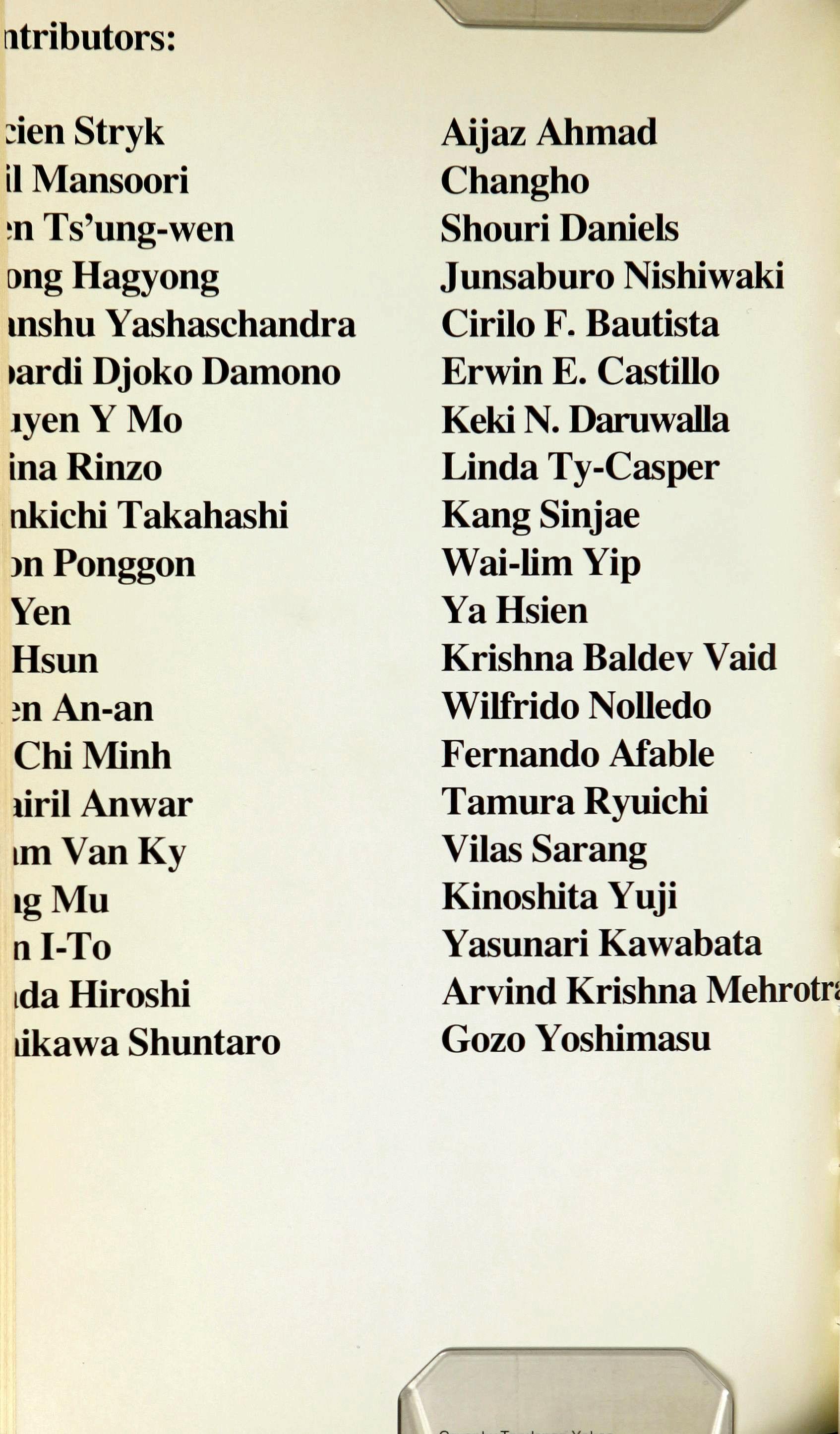




Charles Newman
EDITOR ..••..•..........•••
GUEST CO-EDITOR ....• Lucien Stryk
EXECUTIVE EDITOR
ART DIRECTOR
MANAGING EDITOR
COORDINATING EDITORS
ADVISORY EDITORS:

Elliott Anderson
Lawrence Levy
Theresa Maylone
Timothy O'Grady
Michael McDonnell
CHINA '. Eugene Eoyang
SOUTH ASIA
SOUTHEAST ASIA
KOREA
JAPAN
ASSISTANT EDITORS.
ASSOCIATE EDITORS
PRODUCTION
FULFILLMENT
C. M. Nairn
Burton Raffel
Ko Won
Harold Wright
Debbie Silverman
Lisa Freeman
Susan David
George Mundstock
Mary Elinore Smith
Peter Michelson
Gerald Graff
Cynthia Anderson
Mary Margaret Zakrasek
TriQuarterly is an international journal of arts. letters. and opinion published in the fall. winter, and spring at Northwestern University, Evanston. Illinois 60201. Subscription rates: One year $10.00; two years $15.00; three years $20.00. Foreign subscriptions $],00 per year additional. Single copies usually $3.50. Back issue prices on request. Contributions. correspondence. and subscriptions should be addressed to TriQuarterly, University Hall 101. Northwestern University. E\ anston, Illinois 6020 I. The editors invite submissions, but queries are strongly suggested. No manuscript will be returned unless accompanied by a stamped, self-addressed envelope. All manuscripts accepted for publication become the property of TriQuarterly, unless otherwise indicated. Copyright © 1974 by TriQuarterly. All rights reserved. The views expressed in this magazine are to be attributed to the writers, not the editors or sponsors. Printed in the United States of America. Claims for missing numbers will be honored only within the four-month period after month of issue.
NATIONAL DISTRIBUTOR TO RETAIL TRADE: B. DEBOER. 188 HIGH STREET. NUTLEY. NEW JFRSEY 07110. DISTRIBUTOR FOR GREAT BRITAIN AND EUROPE: B. F. STEVENS & BROWN, LTD ARDON nOUSE. MII.L LANE, GODALMING. SURREY, ENGLAND.
R[PRINTS OF RACK ISSUES OF TriQuarterly ARE NOW AVAILABLE IN �ULL FORMAT FROM KRAUS REPRINT COMPANY. ROUTE 100, MILLWOOD. NEW YORK 10546, AND IN MICROFILM FROM UNIV[,RSITY MICROFIL"S. A XEROX COMPANY, ANN ARBOR. MICHIGAN 48106.
LUCIEN STRYK
ADIL MANSOORI
SHEN TS'UNG-WEN
CH�NG HAGY(:)NG
SITANSHU YASHASCHANDRA
SA PARDI DJOKO DAMONO
NGUYEN Y MO
SHIINA RINZO ANONYMOUS
SHINKICHI TAKAHASHI
CH�N PONGG�N
SHANG CHIN (LO YEN)
LU HSUN
CIlEN AN-AN
HO CHI MINH
CHAIRIL ANWAR
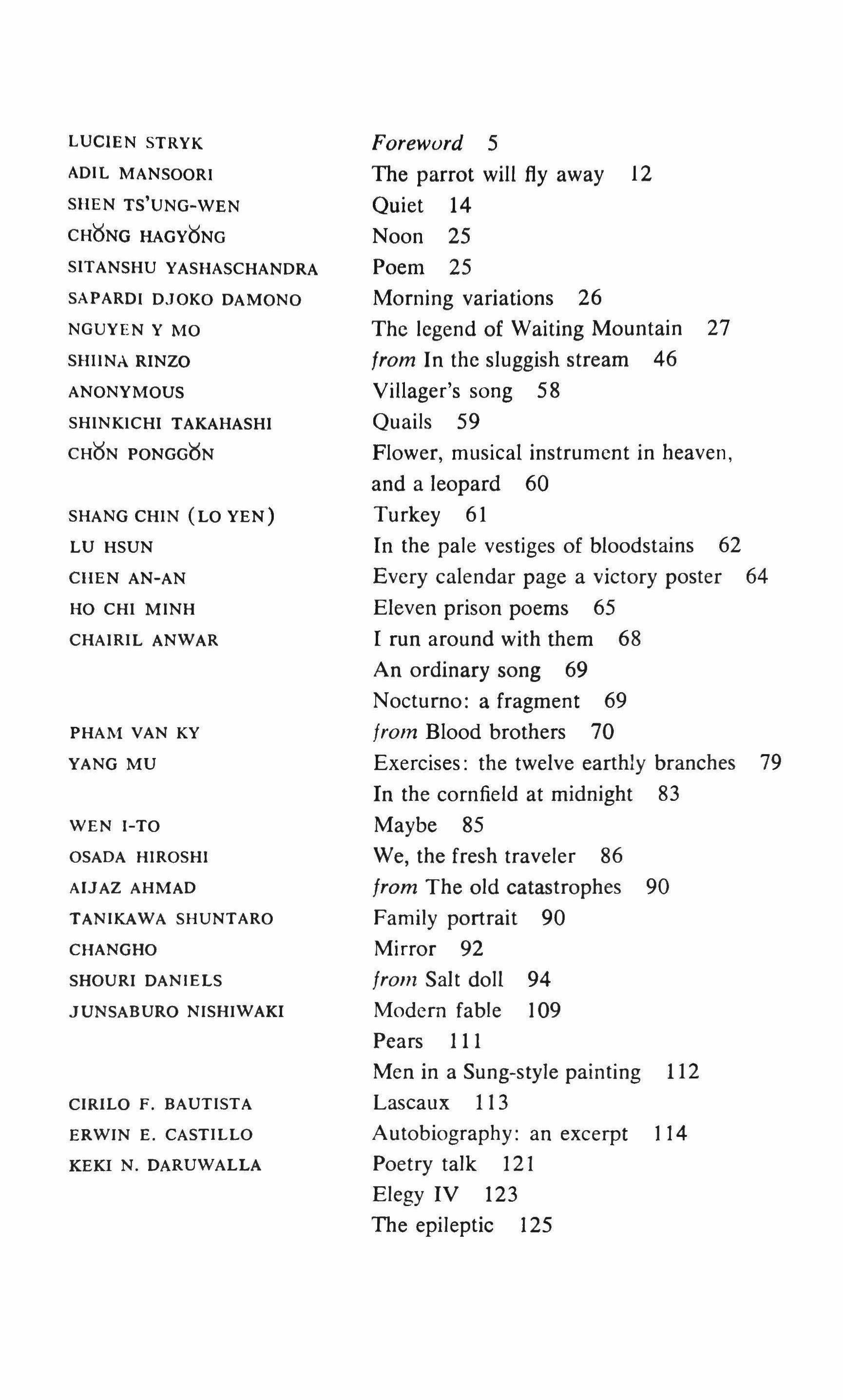
PHAM VAN KY
YANG MU
WEN I-TO
OSADA HIROSHI
AIJAZ AHMAD
TANIKAWA SHUNTARO
CHANGHO
SHOURI DANIELS
JUNSABURO NISHIWAKI
CIRILO F. BAUTISTA
ERWIN E. CASTILLO
KEKI N. DARUWALLA
Foreword 5
The parrot will flyaway 12
Quiet 14 Noon 25
Poem 25
Morning variations 26
The legend of Waiting Mountain 27
from In the sluggish stream 46
Villager's song 58
Quails 59
Flower, musical instrument in heaven, and a leopard 60 Turkey 61
In the pale vestiges of bloodstains 62
Every calendar page a victory poster 64
Eleven prison poems 65 I run around with them 68
An ordinary song 69
Nocturno: a fragment 69 from Blood brothers 70
Exercises: the twelve earthly branches 79 In the cornfield at midnight 83 Maybe 85
We, the fresh traveler 86 from The old catastrophes 90
Family portrait 90 Mirror 92 from Salt doll 94
Modern fable 109 Pears III
Men in a Sung-style painting 112 Lascaux 113
Autobiography: an excerpt 114 Poetry talk 121
Elegy IV 123
The epileptic 125
LINDA TY-CASPER
KANG SINJAE
WAI-LIM YIP
YA HSIEN
KRISHNA BALDEV VAID
WILFRIDO NOLLEDO
FERNANDO AFABLE
TAMURA RYUICHI
VILAS SARANG
KINOSHITA YU JI
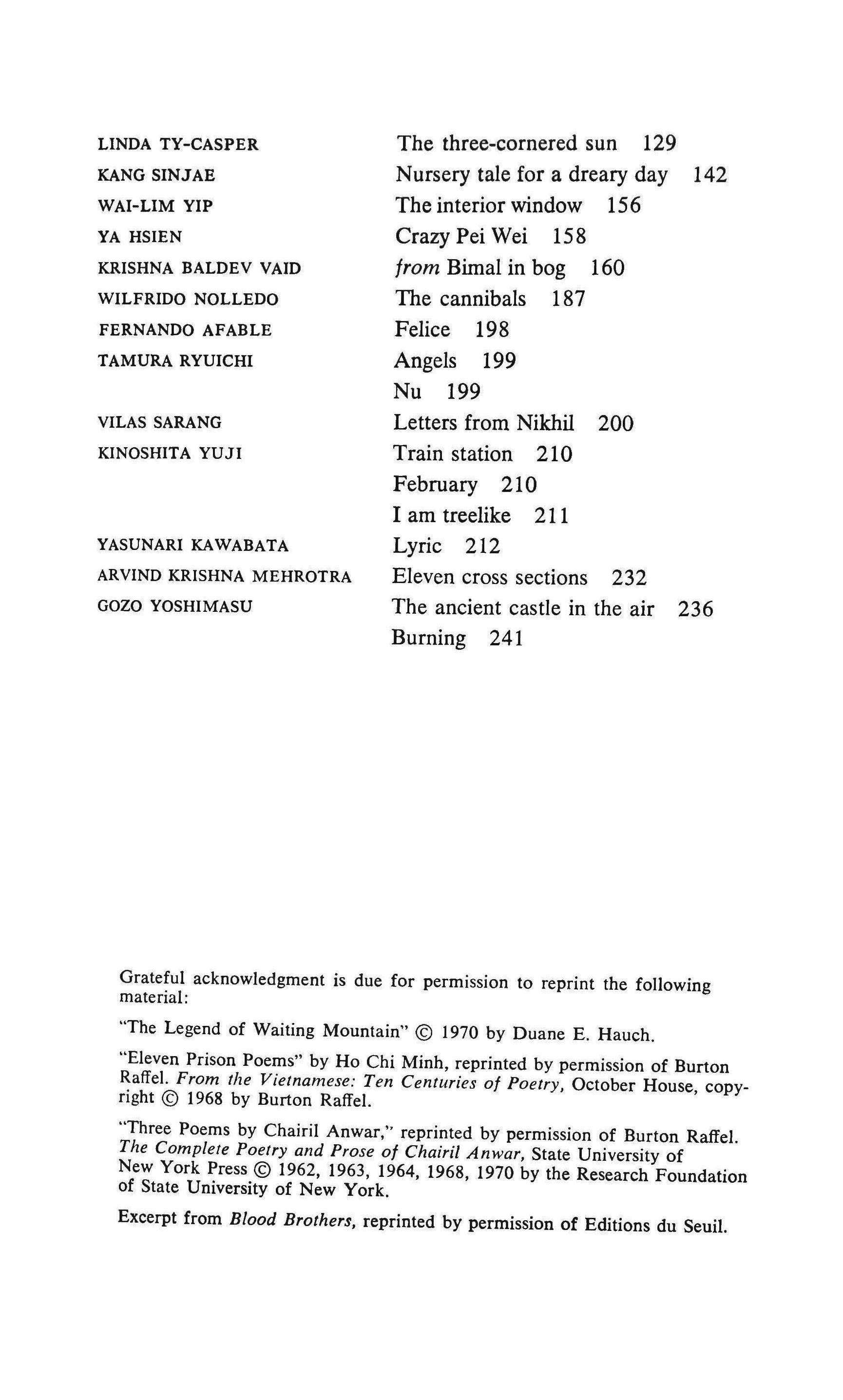
YASUNARI KAWABATA
ARVIND KRISHNA MEHROTRA
GOZO YOSHIMASU
The three-cornered sun 129
Nursery tale for a dreary day 142
The interior window 156
Crazy Pei Wei 158
from Bimal in bog 160
The cannibals 187
Felice 198
Angels 199
Nu 199
Letters from Nikhil 200
Train station 210
February 210
I am treelike 211
Lyric 212
Eleven cross sections 232
The ancient castle in the air 236
Burning 241
Grateful acknowledgment is due for permission to reprint the following material:
"The Legend of Waiting Mountain" © 1970 by Duane E. Hauch.
"Eleven Prison Poems" by Ho Chi Minh, reprinted by permission of Burton Raffel. From the Vietnamese: Ten Centuries of Poetry, October House, copy right © 1968 by Burton Raffel.
"Three Poems by Chairil Anwar," reprinted by permission of Burton Raffel. The Complete Poetry and Prose of Chairil Anwar, State University of New York Press © 1962, 1963, 1964, 1968, 1970 by the Research Foundation of State University of New York.
Excerpt from Blood Brothers, reprinted by permission of Editions du Seuil.
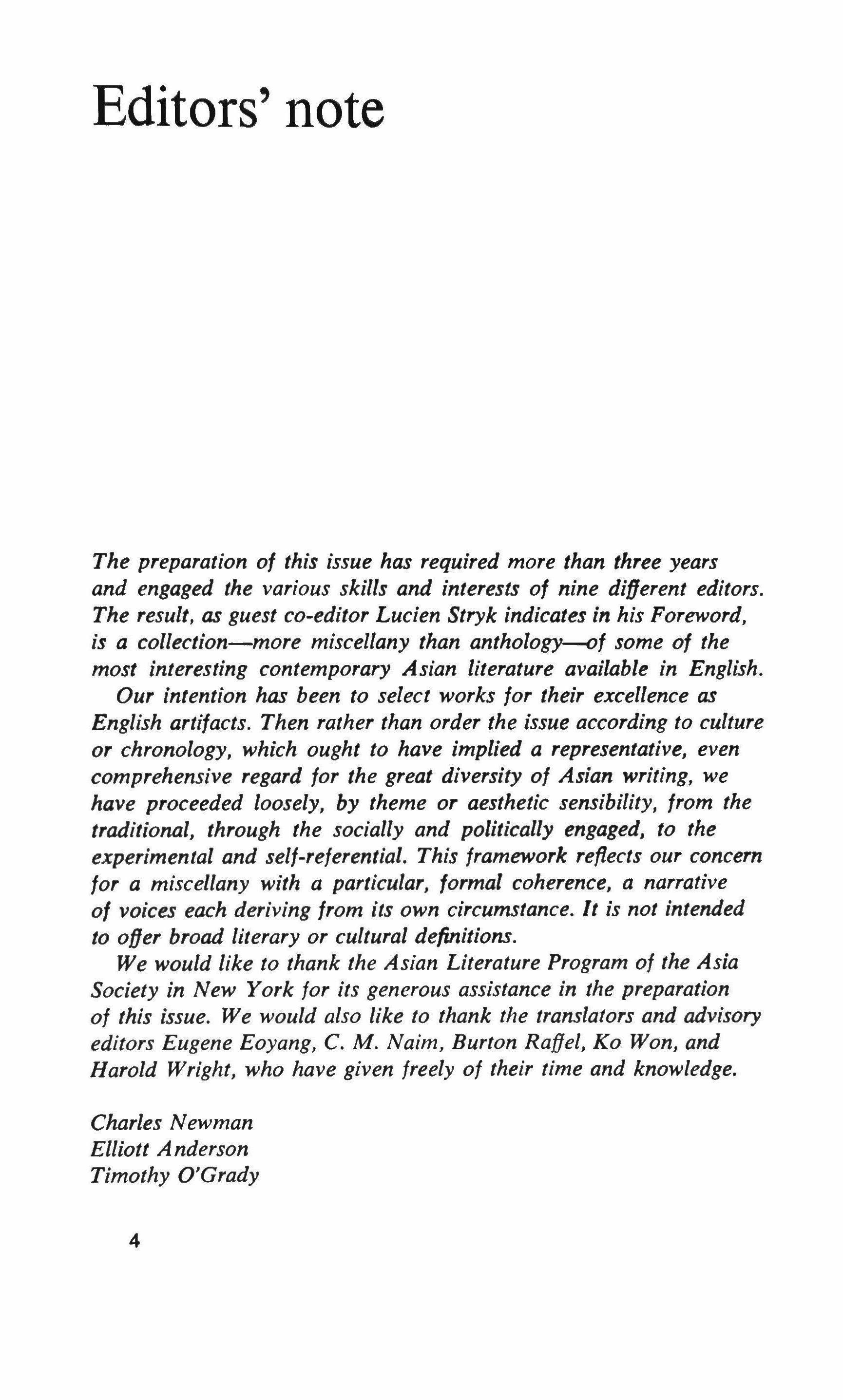
The preparation of this issue has required more than three years and engaged the various skills and interests of nine different editors. The result, as guest co-editor Lucien Stryk indicates in his Foreword, is a collection-more miscellany than anthology--of some of the most interesting contemporary Asian literature available in English. Our intention has been to select works for their excellence as English artifacts. Then rather than order the issue according to culture or chronology, which ought to have implied a representative, even comprehensive regard for the great diversity of Asian writing, we have proceeded loosely, by theme or aesthetic sensibility, from the traditional, through the socially and politically engaged, to the experimental and self-referential. This framework reflects our concern for a miscellany with a particular, formal coherence, a narrative of voices each deriving from its own circumstance. It is not intended to offer broad literary or cultural definitions.
We would like to thank the Asian Literature Program of the Asia Society in New York for its generous assistance in the preparation of this issue. We would also like to thank the translators and advisory editors Eugene Eoyang, C. M. Naim, Burton Raffel, Ko Won, and Harold Wright, who have given freely of their time and knowledge.
Charles Newman
Elliott Anderson
Timothy O'Grady
4
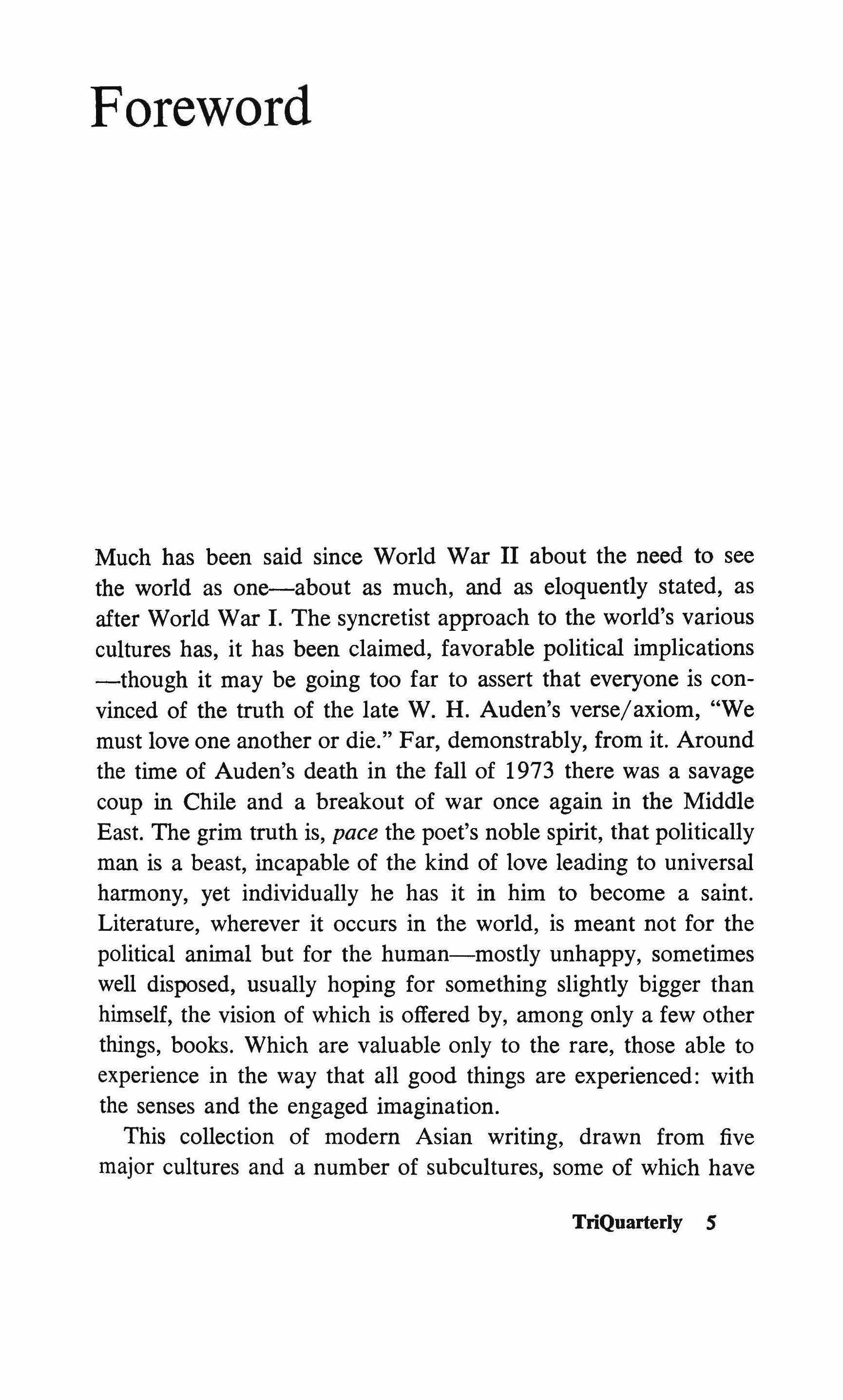
Much has been said since World War II about the need to see the world as one-about as much, and as eloquently stated, as after World War 1. The syncretist approach to the world's various cultures has, it has been claimed, favorable political implications -though it may be going too far to assert that everyone is convinced of the truth of the late W. H. Auden's verse/axiom, "We must love one another or die." Far, demonstrably, from it. Around the time of Auden's death in the fall of 1973 there was a savage coup in Chile and a breakout of war once again in the Middle East. The grim truth is, pace the poet's noble spirit, that politically man is a beast, incapable of the kind of love leading to universal harmony, yet individually he has it in him to become a saint. Literature, wherever it occurs in the world, is meant not for the political animal but for the human-mostly unhappy, sometimes well disposed, usually hoping for something slightly bigger than himself, the vision of which is offered by, among only a few other things, books. Which are valuable only to the rare, those able to experience in the way that all good things are experienced: with the senses and the engaged imagination.
This collection of modern Asian writing, drawn from five major cultures and a number of subcultures, some of which have
TriQuarterly S
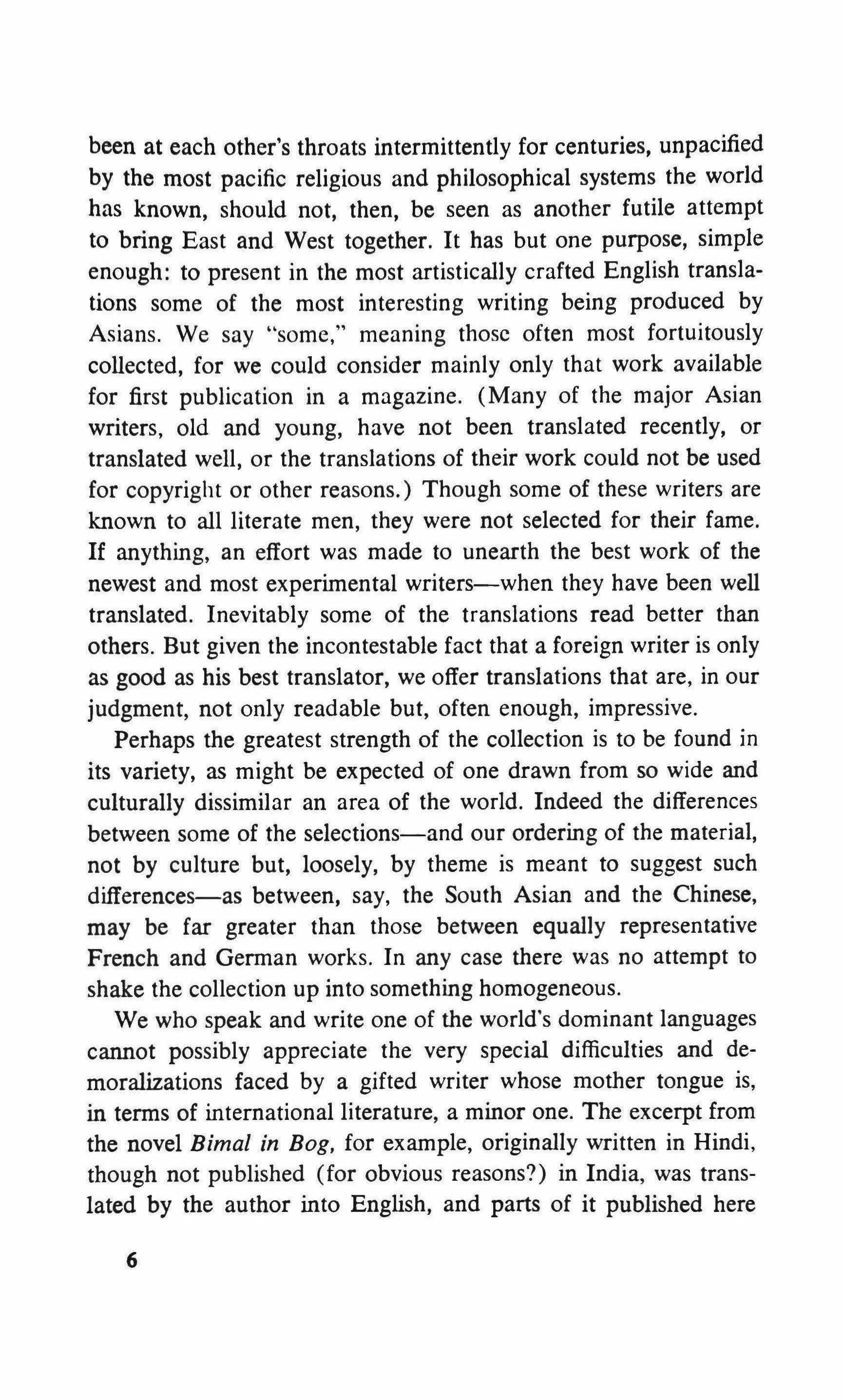
been at each other's throats intermittently for centuries, unpacified by the most pacific religious and philosophical systems the world has known, should not, then, be seen as another futile attempt to bring East and West together. It has but one purpose, simple enough: to present in the most artistically crafted English translations some of the most interesting writing being produced by Asians. We say "some," meaning those often most fortuitously collected, for we could consider mainly only that work available for first publication in a magazine. (Many of the major Asian writers, old and young, have not been translated recently, or translated well, or the translations of their work could not be used for copyright or other reasons.) Though some of these writers are known to all literate men, they were not selected for their fame. If anything, an effort was made to unearth the best work of the newest and most experimental writers-when they have been well translated. Inevitably some of the translations read better than others. But given the incontestable fact that a foreign writer is only as good as his best translator, we offer translations that are, in our judgment, not only readable but, often enough, impressive.
Perhaps the greatest strength of the collection is to be found in its variety, as might be expected of one drawn from so wide and culturally dissimilar an area of the world. Indeed the differences between some of the selections-and our ordering of the material, not by culture but, loosely, by theme is meant to suggest such differences-as between, say, the South Asian and the Chinese, may be far greater than those between equally representative French and German works. In any case there was no attempt to shake the collection up into something homogeneous.
We who speak and write one of the world's dominant languages cannot possibly appreciate the very special difficulties and demoralizations faced by a gifted writer whose mother tongue is, in terms of international literature, a minor one. The excerpt from the novel Bimal in Bog, for example, originally written in Hindi, though not published (for obvious reasons?) in India, was translated by the author into English, and parts of it published here
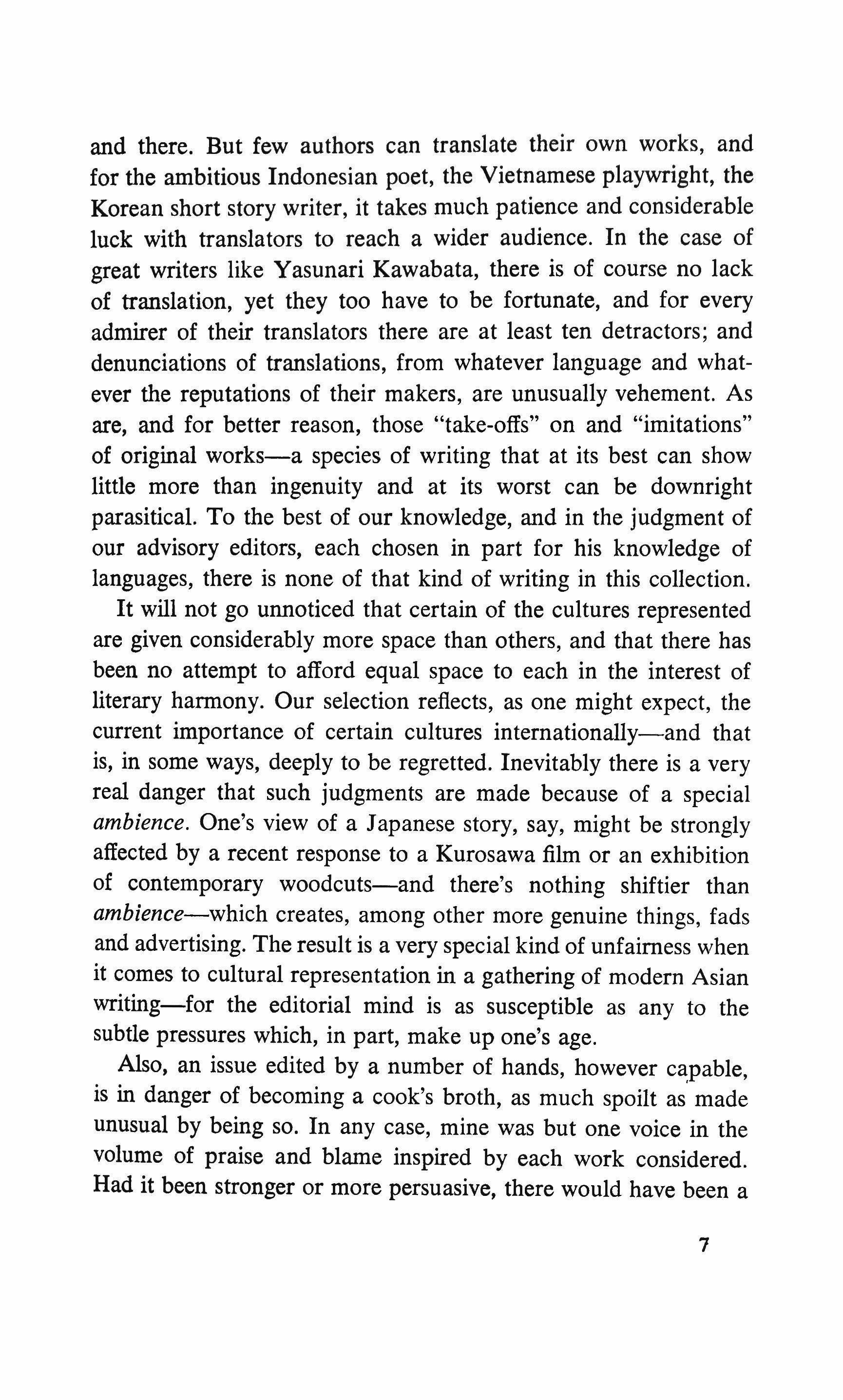
and there. But few authors can translate their own works, and for the ambitious Indonesian poet, the Vietnamese playwright, the Korean short story writer, it takes much patience and considerable luck with translators to reach a wider audience. In the case of great writers like Yasunari Kawabata, there is of course no lack of translation, yet they too have to be fortunate, and for every admirer of their translators there are at least ten detractors; and denunciations of translations, from whatever language and whatever the reputations of their makers, are unusually vehement. As are, and for better reason, those "take-offs" on and "imitations" of original works-a species of writing that at its best can show little more than ingenuity and at its worst can be downright parasitical. To the best of our knowledge, and in the judgment of our advisory editors, each chosen in part for his knowledge of languages, there is none of that kind of writing in this collection. It will not go unnoticed that certain of the cultures represented are given considerably more space than others, and that there has been no attempt to afford equal space to each in the interest of literary harmony. Our selection reflects, as one might expect, the current importance of certain cultures internationally-and that is, in some ways, deeply to be regretted. Inevitably there is a very real danger that such judgments are made because of a special ambience. One's view of a Japanese story, say, might be strongly affected by a recent response to a Kurosawa film or an exhibition of contemporary woodcuts-and there's nothing shiftier than ambience-which creates, among other more genuine things, fads and advertising. The result is a very special kind of unfairness when it comes to cultural representation in a gathering of modern Asian writing-for the editorial mind is as susceptible as any to the subtle pressures which, in part, make up one's age. Also, an issue edited by a number of hands, however capable, is in danger of becoming a cook's broth, as much spoilt as made unusual by being so. In any case, mine was but one voice in the volume of praise and blame inspired by each work considered. Had it been stronger or more persuasive, there would have been a
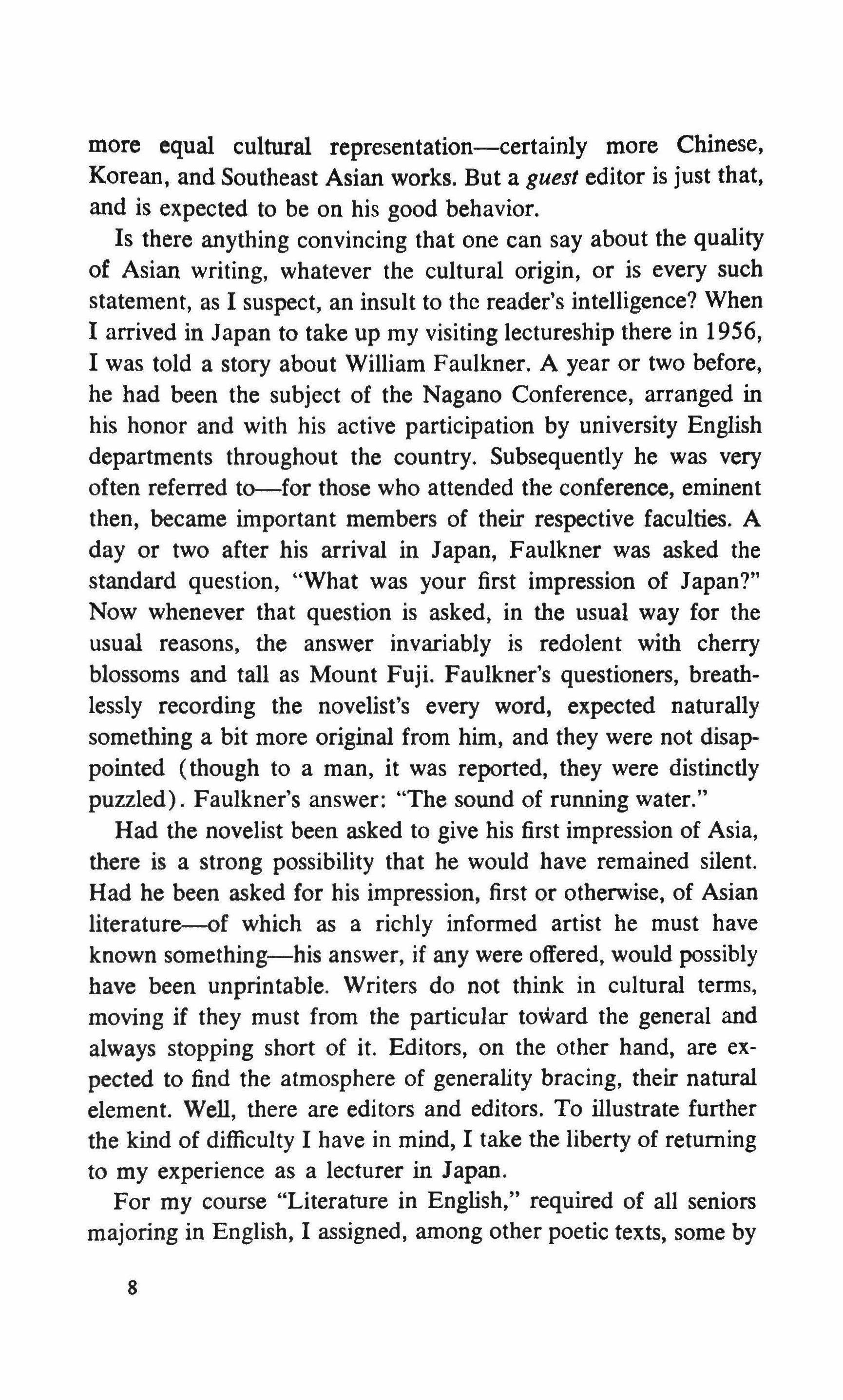
more equal cultural representation-certainly more Chinese, Korean, and Southeast Asian works. But a guest editor is just that, and is expected to be on his good behavior. Is there anything convincing that one can say about the quality of Asian writing, whatever the cultural origin, or is every such statement, as I suspect, an insult to the reader's intelligence? When I arrived in Japan to take up my visiting lectureship there in 1956, I was told a story about William Faulkner. A year or two before, he had been the subject of the Nagano Conference, arranged in his honor and with his active participation by university English departments throughout the country. Subsequently he was very often referred to-for those who attended the conference, eminent then, became important members of their respective faculties. A day or two after his arrival in Japan, Faulkner was asked the standard question, "What was your first impression of Japan?" Now whenever that question is asked, in the usual way for the usual reasons, the answer invariably is redolent with cherry blossoms and tall as Mount Fuji. Faulkner's questioners, breathlessly recording the novelist's every word, expected naturally something a bit more original from him, and they were not disappointed (though to a man, it was reported, they were distinctly puzzled). Faulkner's answer: "The sound of running water."
Had the novelist been asked to give his first impression of Asia, there is a strong possibility that he would have remained silent. Had he been asked for his impression, first or otherwise, of Asian literature-of which as a richly informed artist he must have known something-his answer, if any were offered, would possibly have been unprintable. Writers do not think in cultural terms, moving if they must from the particular toward the general and always stopping short of it. Editors, on the other hand, are expected to find the atmosphere of generality bracing, their natural element. Well, there are editors and editors. To illustrate further the kind of difficulty I have in mind, I take the liberty of returning to my experience as a lecturer in Japan. For my course "Literature in English," required of all seniors majoring in English, I assigned, among other poetic texts, some by
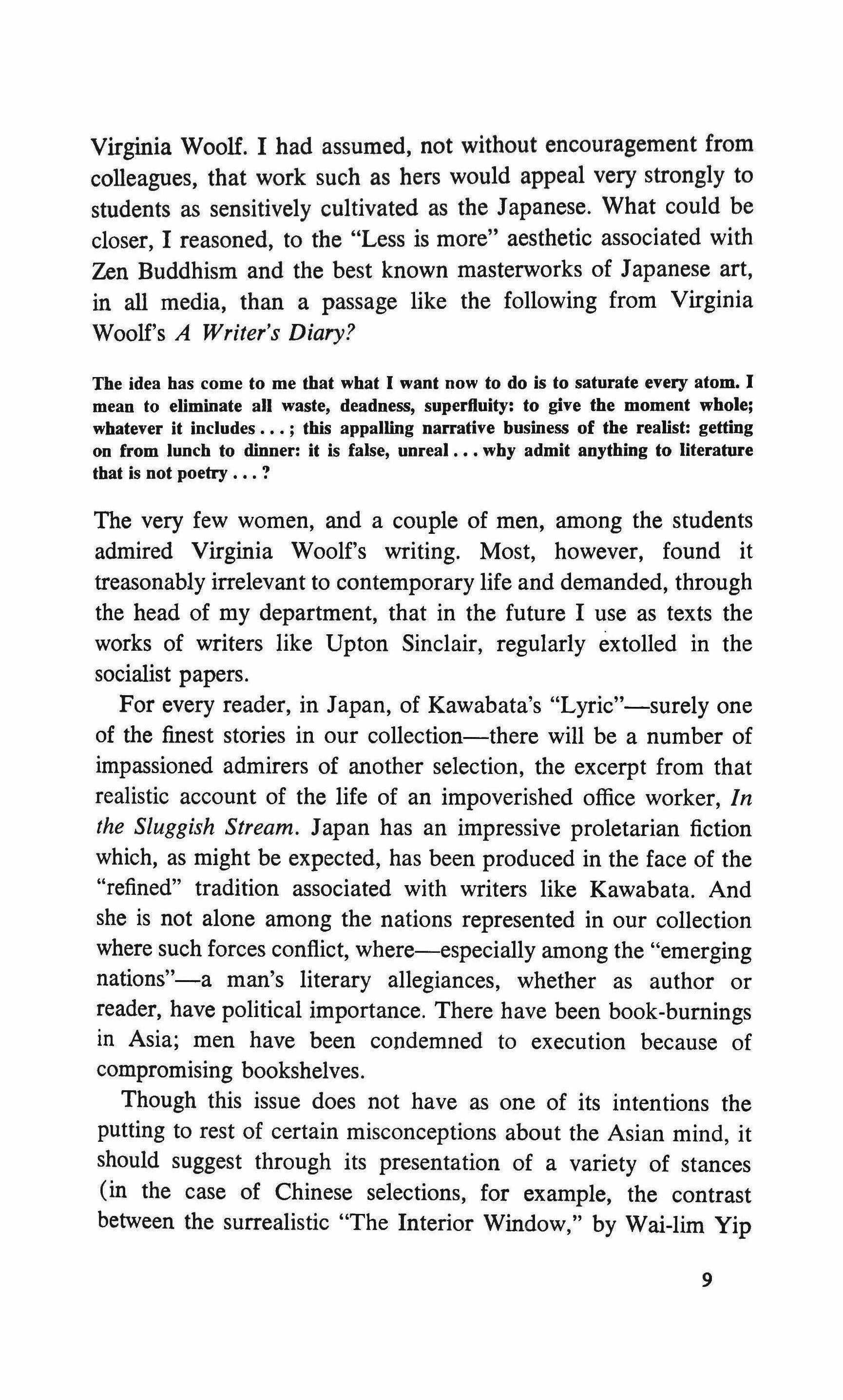
Virginia Woolf. I had assumed, not without encouragement from colleagues, that work such as hers would appeal very strongly to students as sensitively cultivated as the Japanese. What could be closer, I reasoned, to the "Less is more" aesthetic associated with Zen Buddhism and the best known masterworks of Japanese art, in all media, than a passage like the following from Virginia Woolf's A Writer's Diary?
The idea has come to me that what I want now to do is to saturate every atom. I mean to eliminate all waste, deadness, superfluity: to give the moment whole; whatever it includes ; this appalling narrative business of the realist: getting on from lunch to dinner: it is false, unreal why admit anything to literature that is not poetry ••. ?
The very few women, and a couple of men, among the students admired Virginia Woolf's writing. Most, however, found it treasonably irrelevant to contemporary life and demanded, through the head of my department, that in the future I use as texts the works of writers like Upton Sinclair, regularly extolled in the socialist papers.
For every reader, in Japan, of Kawabata's "Lyric"-surely one of the finest stories in our collection-there will be a number of impassioned admirers of another selection, the excerpt from that realistic account of the life of an impoverished office worker, In the Sluggish Stream. Japan has an impressive proletarian fiction which, as might be expected, has been produced in the face of the "refined" tradition associated with writers like Kawabata. And she is not alone among the nations represented in our collection where such forces conflict, where-especially among the "emerging nations"-a man's literary allegiances, whether as author or reader, have political importance. There have been book-burnings in Asia; men have been condemned to execution because of compromising bookshelves.
Though this issue does not have as one of its intentions the putting to rest of certain misconceptions about the Asian mind, it should suggest through its presentation of a variety of stances (in the case of Chinese selections, for example, the contrast between the surrealistic "The Interior Window," by Wai-lim Yip
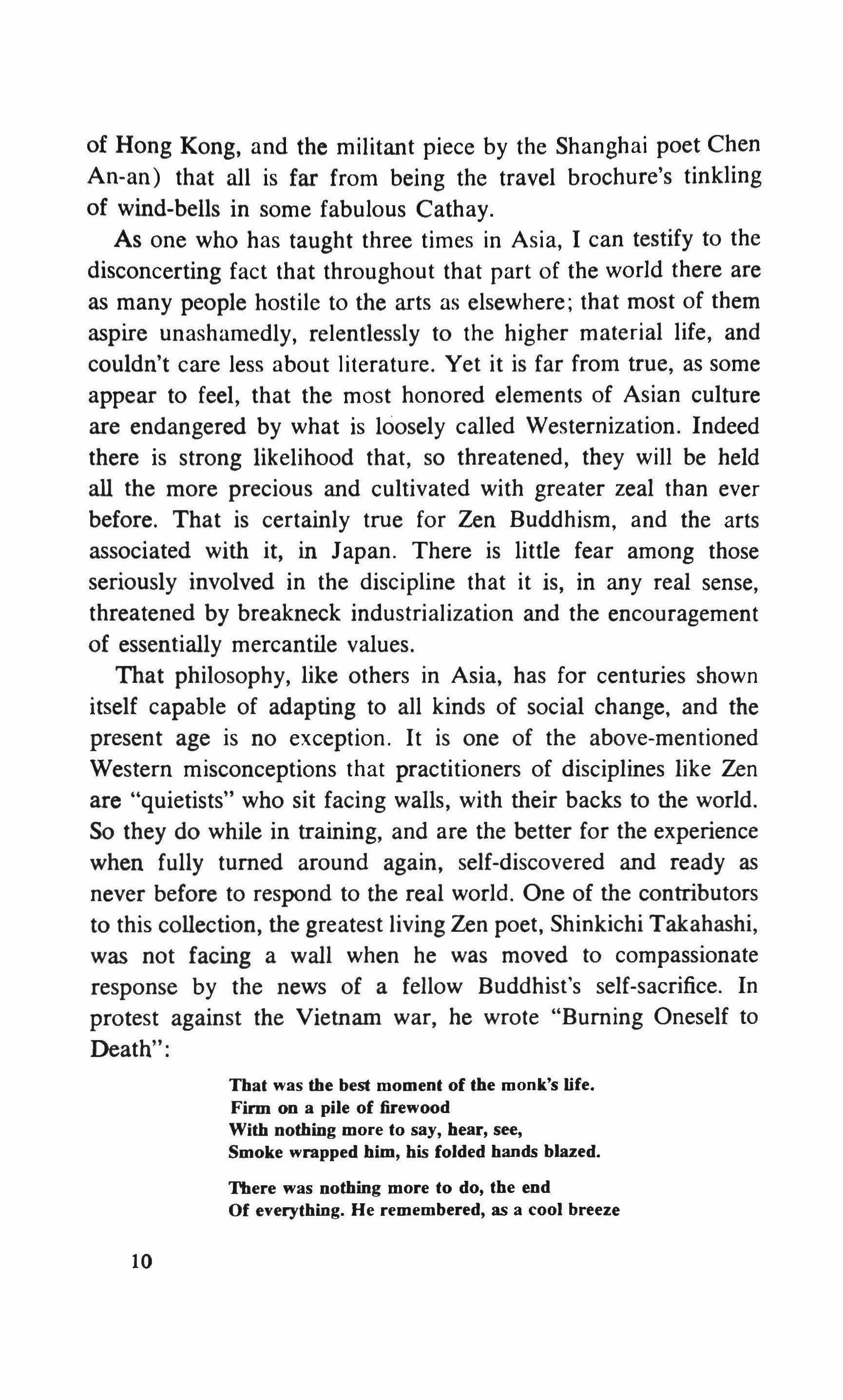
of Hong Kong, and the militant piece by the Shanghai poet Chen An-an) that all is far from being the travel brochure's tinkling of wind-bells in some fabulous Cathay.
As one who has taught three times in Asia, I can testify to the disconcerting fact that throughout that part of the world there are as many people hostile to the arts as elsewhere; that most of them aspire unashamedly, relentlessly to the higher material life, and couldn't care less about literature. Yet it is far from true, as some appear to feel, that the most honored elements of Asian culture are endangered by what is loosely called Westernization. Indeed there is strong likelihood that, so threatened, they will be held all the more precious and cultivated with greater zeal than ever before. That is certainly true for Zen Buddhism, and the arts associated with it, in Japan. There is little fear among those seriously involved in the discipline that it is, in any real sense, threatened by breakneck industrialization and the encouragement of essentially mercantile values.
That philosophy, like others in Asia, has for centuries shown itself capable of adapting to all kinds of social change, and the present age is no exception. It is one of the above-mentioned Western misconceptions that practitioners of disciplines like Zen are "quietists" who sit facing walls, with their backs to the world. So they do while in training, and are the better for the experience when fully turned around again, self-discovered and ready as never before to respond to the real world. One of the contributors to this collection, the greatest living Zen poet, Shinkichi Takahashi, was not facing a wall when he was moved to compassionate response by the news of a fellow Buddhist's self-sacrifice. In protest against the Vietnam war, he wrote "Burning Oneself to Death":
Tbat was the best moment of the monk's life.
Firm on a pile of firewood
With nothing more to say, bear, see, Smoke wrapped bim, bis folded bands blazed.
There was nothing more to do, the end Of everytbing. He remembered, as a cool breeze
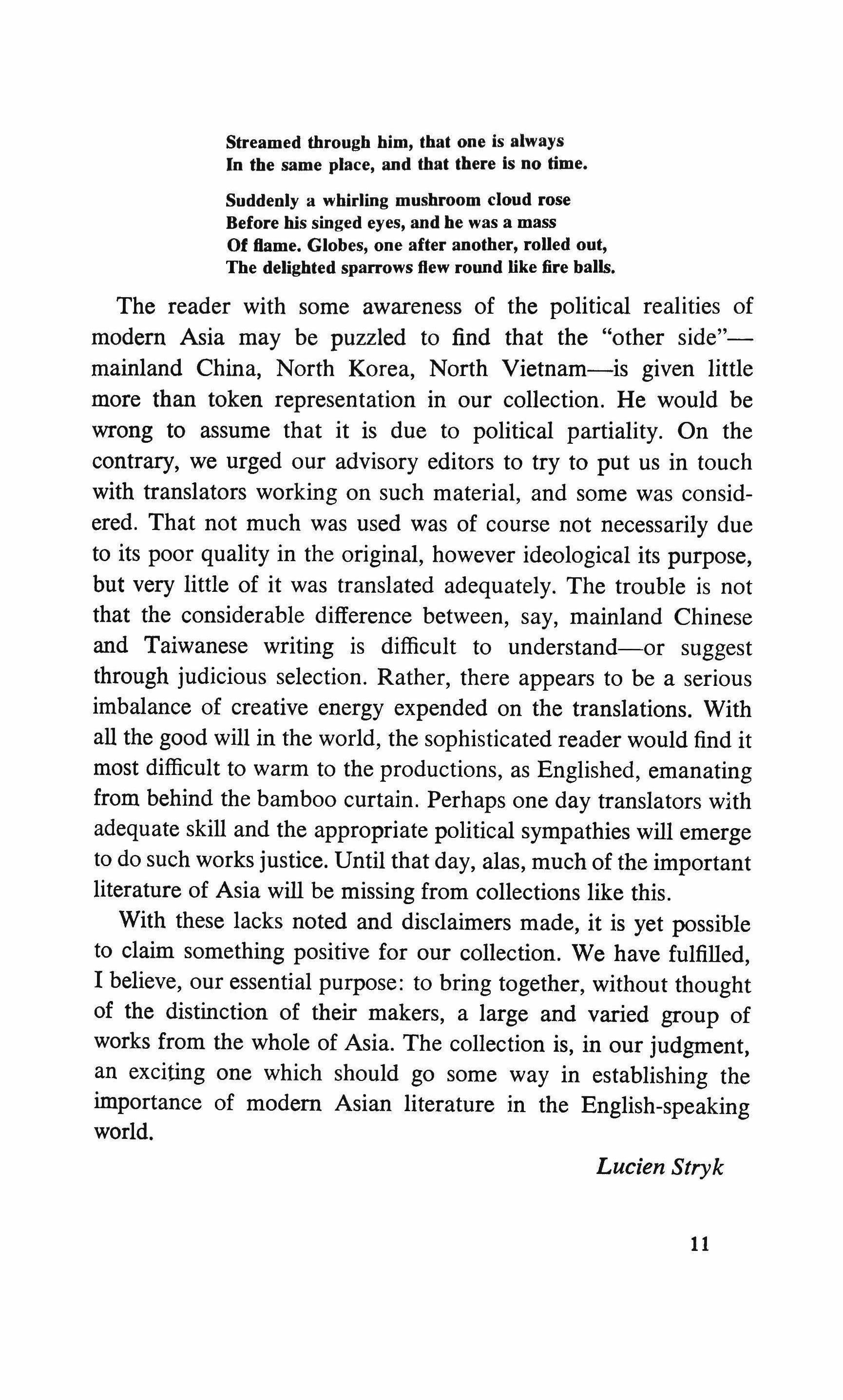
Streamed through him, that one is always In the same place, and that there is no time.
Suddenly a whirling mushroom cloud rose Before his singed eyes, and he was a mass Of flame. Globes, one after another, rolled out, The delighted sparrows flew round like fire balls.
The reader with some awareness of the political realities of modern Asia may be puzzled to find that the "other side"mainland China, North Korea, North Vietnam-is given little more than token representation in our collection. He would be wrong to assume that it is due to political partiality. On the contrary, we urged our advisory editors to try to put us in touch with translators working on such material, and some was considered. That not much was used was of course not necessarily due to its poor quality in the original, however ideological its purpose, but very little of it was translated adequately. The trouble is not that the considerable difference between, say, mainland Chinese and Taiwanese writing is difficult to understand-or suggest through judicious selection. Rather, there appears to be a serious imbalance of creative energy expended on the translations. With all the good will in the world, the sophisticated reader would find it most difficult to warm to the productions, as Englished, emanating from behind the bamboo curtain. Perhaps one day translators with adequate skill and the appropriate political sympathies will emerge to do such works justice. Until that day, alas, much of the important literature of Asia will be missing from collections like this. With these lacks noted and disclaimers made, it is yet possible to claim something positive for our collection. We have fulfilled, I believe, our essential purpose: to bring together, without thought of the distinction of their makers, a large and varied group of works from the whole of Asia. The collection is, in our judgment, an exciting one which should go some way in establishing the importance of modem Asian literature in the English-speaking world.
Lucien Stryk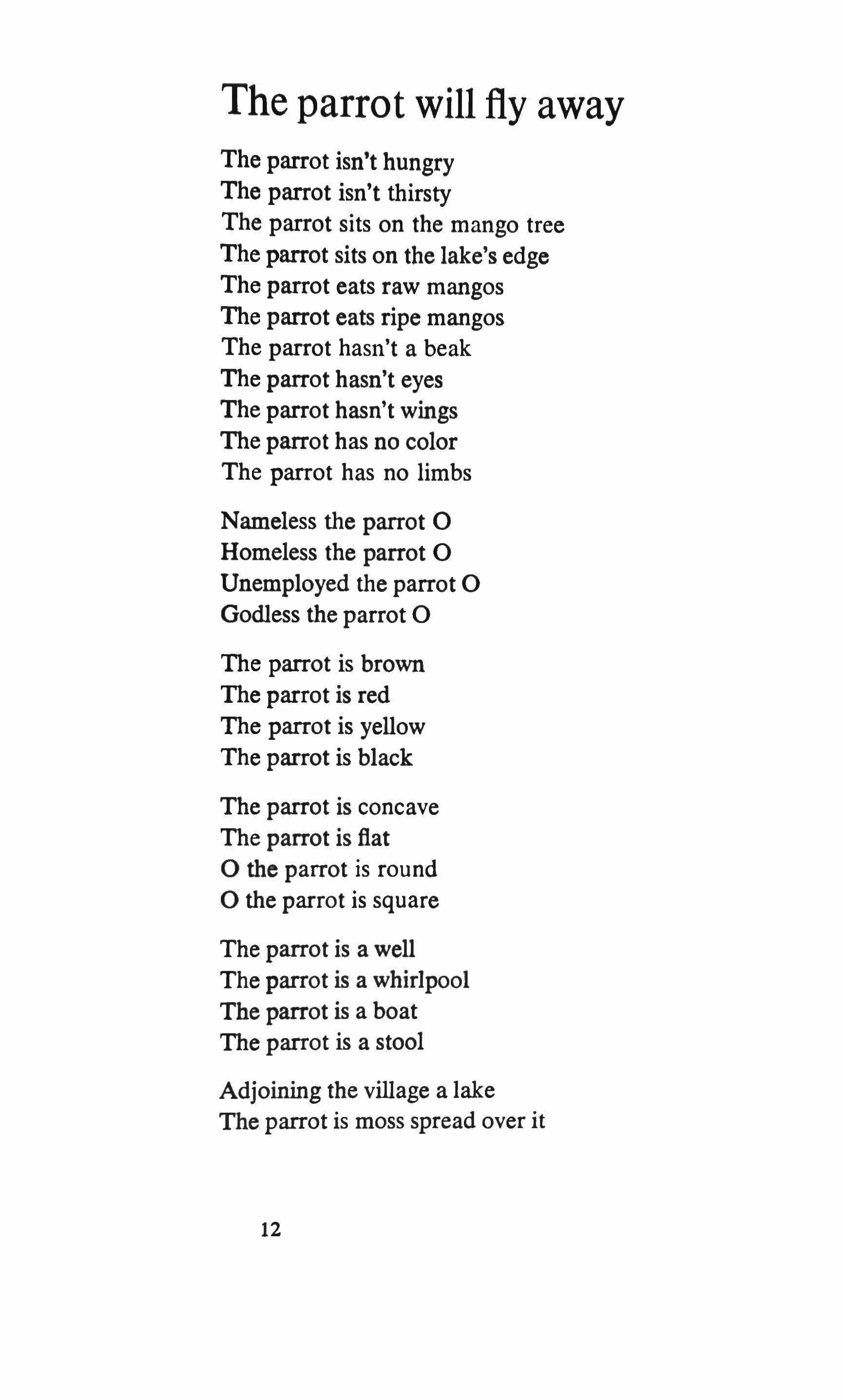
The parrot isn't hungry
The parrot isn't thirsty
The parrot sits on the mango tree
The parrot sits on the lake's edge
The parrot eats raw mangos
The parrot eats ripe mangos
The parrot hasn't a beak
The parrot hasn't eyes
The parrot hasn't wings
The parrot has no color
The parrot has no limbs
Nameless the parrot 0
Homeless the parrot 0
Unemployed the parrot 0
Godless the parrot 0
The parrot is brown
The parrot is red
The parrot is yellow
The parrot is black
The parrot is concave
The parrot is flat
o the parrot is round
o the parrot is square
The parrot is a well
The parrot is a whirlpool
The parrot is a boat
The parrot is a stool
Adjoining the village a lake
The parrot is moss spread over it 12
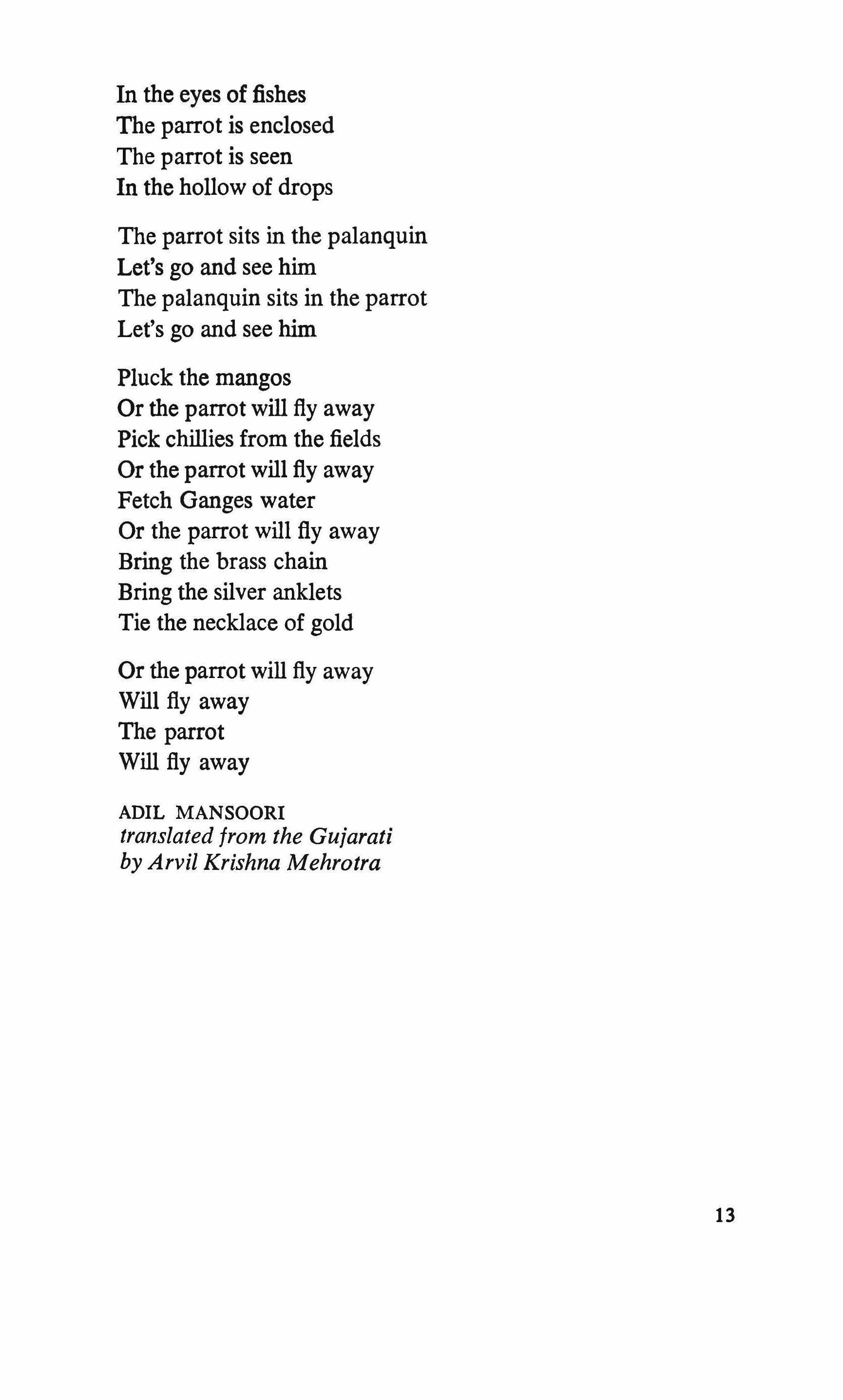
In the eyes of fishes
The parrot is enclosed
The parrot is seen
In the hollow of drops
The parrot sits in the palanquin
Let's go and see him
The palanquin sits in the parrot
Let's go and see him
Pluck the mangos
Or the parrot will flyaway
Pick chillies from the fields
Or the parrot will flyaway
Fetch Ganges water
Or the parrot will flyaway
Bring the brass chain
Bring the silver anklets
Tie the necklace of gold
Or the parrot will flyaway
Will flyaway
The parrot
Will flyaway
ADIL MANSOORI translated from the Gujarati by Arvil Krishna Mehrotra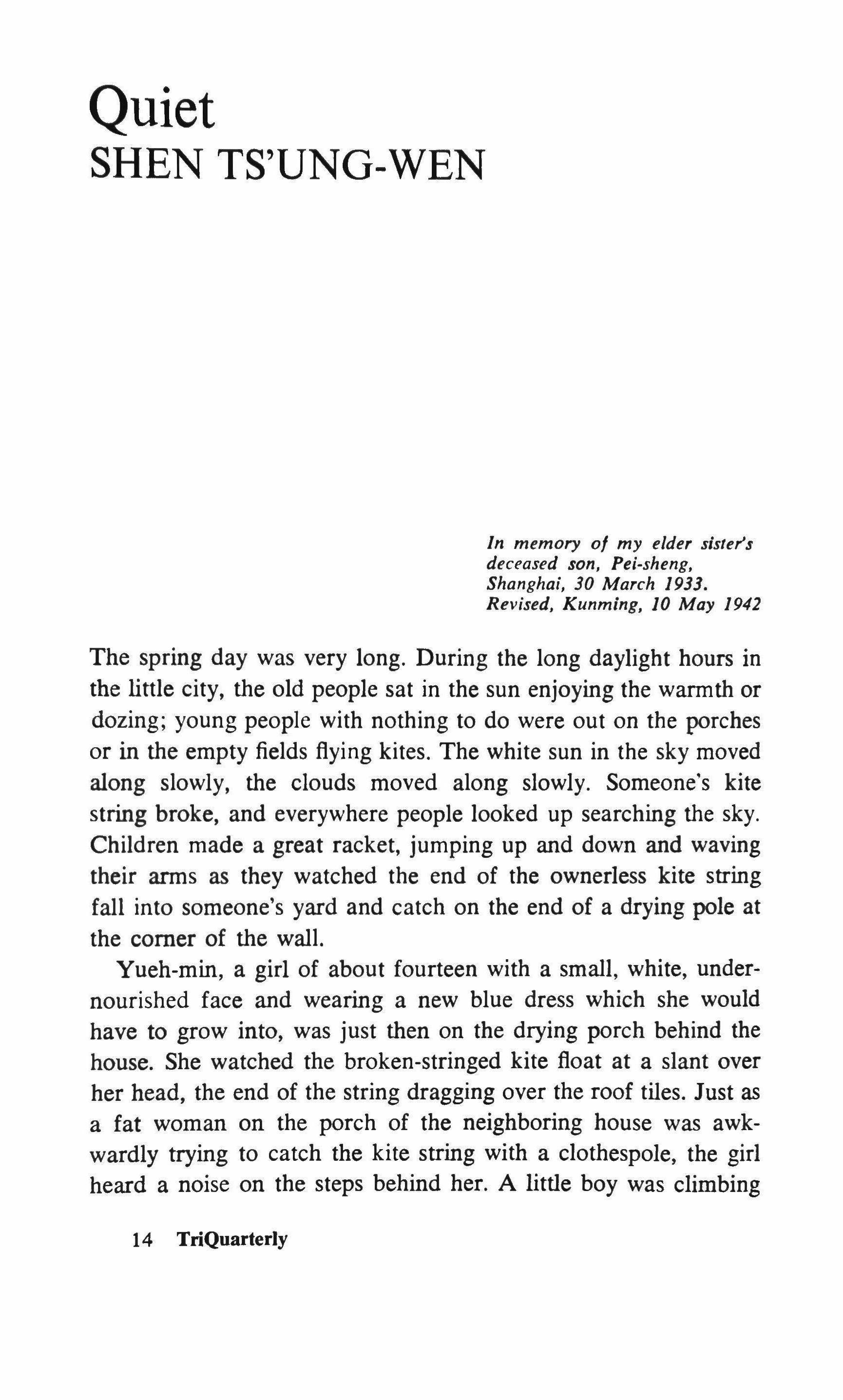
In memory 01 my elder sister's deceased son, Pel-sheng, Shanghai, 30 March 1933. Revised, Kunmlng, 10 May 1942
The spring day was very long. During the long daylight hours in the little city, the old people sat in the sun enjoying the warmth or dozing; young people with nothing to do were out on the porches or in the empty fields flying kites. The white sun in the sky moved along slowly, the clouds moved along slowly. Someone's kite string broke, and everywhere people looked up searching the sky. Children made a great racket, jumping up and down and waving their arms as they watched the end of the ownerless kite string fall into someone's yard and catch on the end of a drying pole at the comer of the wall.
Yueh-min, a girl of about fourteen with a small, white, undernourished face and wearing a new blue dress which she would have to grow into, was just then on the drying porch behind the house. She watched the broken-stringed kite float at a slant over her head, the end of the string dragging over the roof tiles. Just as a fat woman on the porch of the neighboring house was awkwardly trying to catch the kite string with a clothespole, the girl heard a noise on the steps behind her. A little boy was climbing
14 TriQuarterly
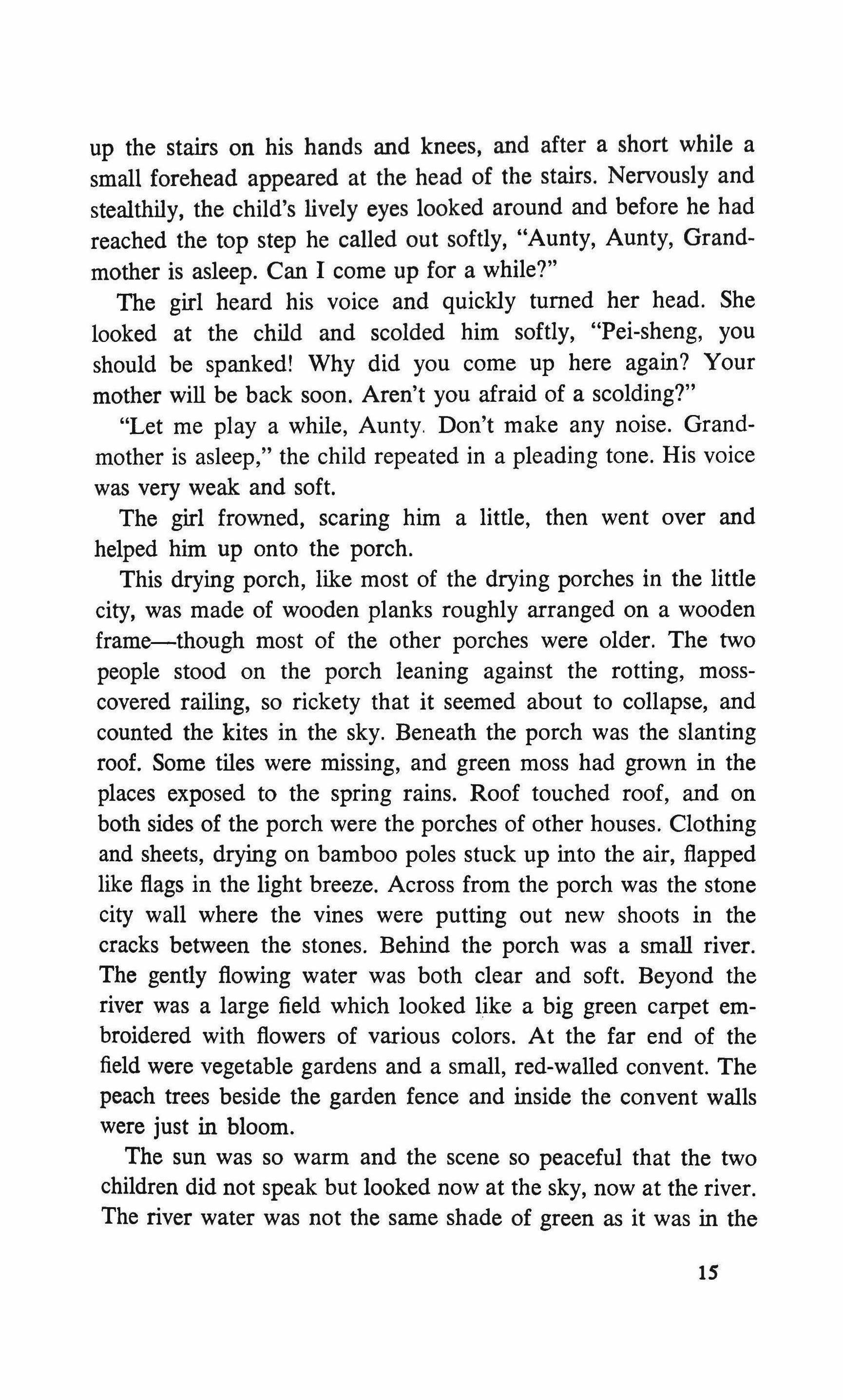
up the stairs on his hands and knees, and after a short while a small forehead appeared at the head of the stairs. Nervously and stealthily, the child's lively eyes looked around and before he had reached the top step he called out softly, "Aunty, Aunty, Grandmother is asleep. Can I come up for a while?"
The girl heard his voice and quickly turned her head. She looked at the child and scolded him softly, "Pei-sheng, you should be spanked! Why did you come up here again? Your mother will be back soon. Aren't you afraid of a scolding?"
"Let me play a while, Aunty. Don't make any noise. Grandmother is asleep," the child repeated in a pleading tone. His voice was very weak and soft.
The girl frowned, scaring him a little, then went over and helped him up onto the porch.
This drying porch, like most of the drying porches in the little city, was made of wooden planks roughly arranged on a wooden frame-though most of the other porches were older. The two people stood on the porch leaning against the rotting, mosscovered railing, so rickety that it seemed about to collapse, and counted the kites in the sky. Beneath the porch was the slanting roof. Some tiles were missing, and green moss had grown in the places exposed to the spring rains. Roof touched roof, and on both sides of the porch were the porches of other houses. Clothing and sheets, drying on bamboo poles stuck up into the air, flapped like flags in the light breeze. Across from the porch was the stone city wall where the vines were putting out new shoots in the cracks between the stones. Behind the porch was a small river.
The gently flowing water was both clear and soft. Beyond the river was a large field which looked like a big green carpet embroidered with flowers of various colors. At the far end of the field were vegetable gardens and a small, red-walled convent. The peach trees beside the garden fence and inside the convent walls were just in bloom.
The sun was so warm and the scene so peaceful that the two children did not speak but looked now at the sky, now at the river. The river water was not the same shade of green as it was in the
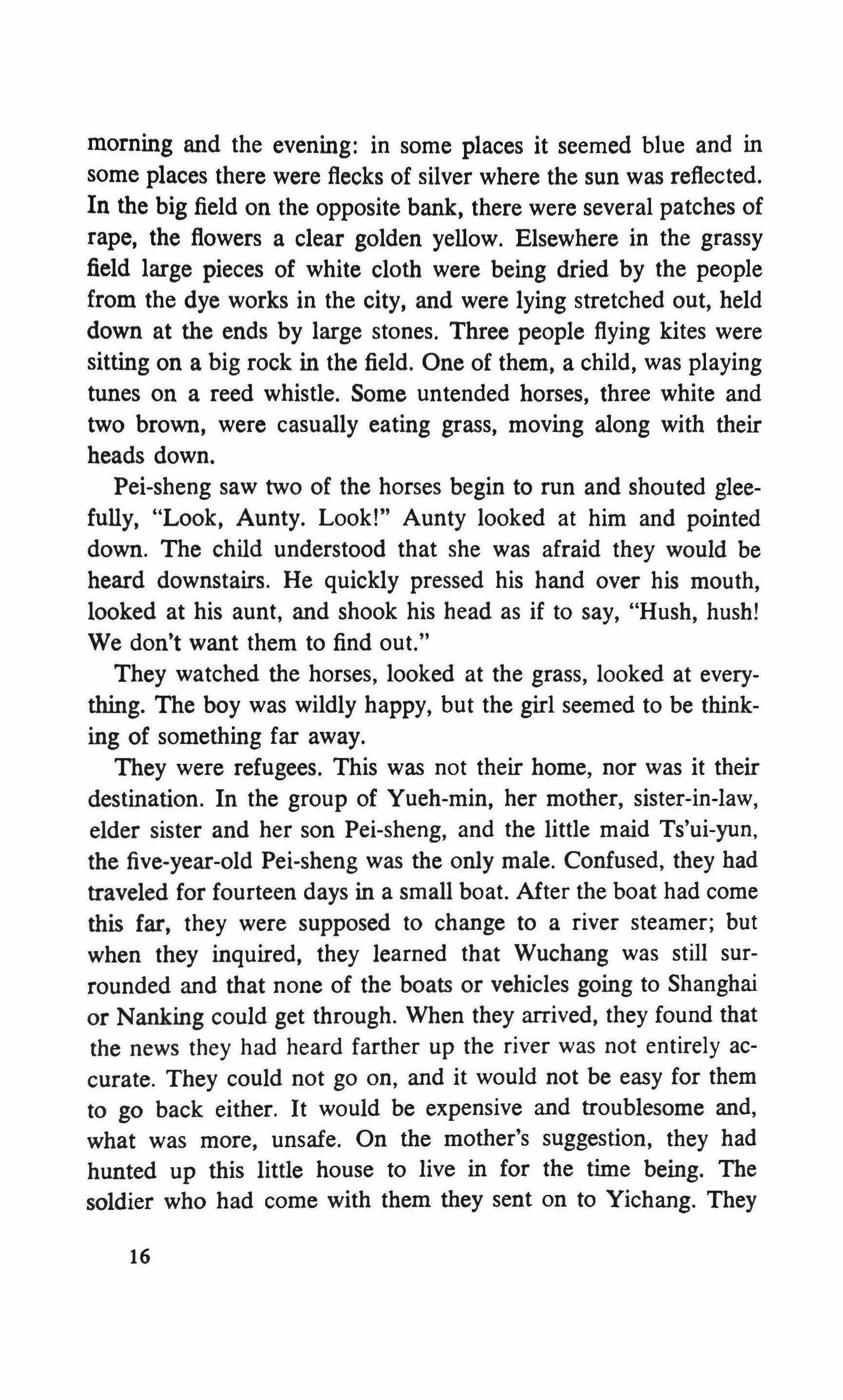
morning and the evening: in some places it seemed blue and in some places there were flecks of silver where the sun was reflected. In the big field on the opposite bank, there were several patches of rape, the flowers a clear golden yellow. Elsewhere in the grassy field large pieces of white cloth were being dried by the people from the dye works in the city, and were lying stretched out, held down at the ends by large stones. Three people flying kites were sitting on a big rock in the field. One of them, a child, was playing tunes on a reed whistle. Some untended horses, three white and two brown, were casually eating grass, moving along with their heads down.
Pei-sheng saw two of the horses begin to run and shouted gleefully, "Look, Aunty. Look!" Aunty looked at him and pointed down. The child understood that she was afraid they would be heard downstairs. He quickly pressed his hand over his mouth, looked at his aunt, and shook his head as if to say, "Hush, hush! We don't want them to find out."
They watched the horses, looked at the grass, looked at everything. The boy was wildly happy, but the girl seemed to be thinking of something far away.
They were refugees. This was not their home, nor was it their destination. In the group of Yueh-min, her mother, sister-in-law, elder sister and her son Pei-sheng, and the little maid Ts'ui-yun, the five-year-old Pei-sheng was the only male. Confused, they had traveled for fourteen days in a small boat. After the boat had come this far, they were supposed to change to a river steamer; but when they inquired, they learned that Wuchang was still surrounded and that none of the boats or vehicles going to Shanghai or Nanking could get through. When they arrived, they found that the news they had heard farther up the river was not entirely accurate. They could not go on, and it would not be easy for them to go back either. It would be expensive and troublesome and, what was more, unsafe. On the mother's suggestion, they had hunted up this little house to live in for the time being. The soldier who had come with them they sent on to Yichang. They
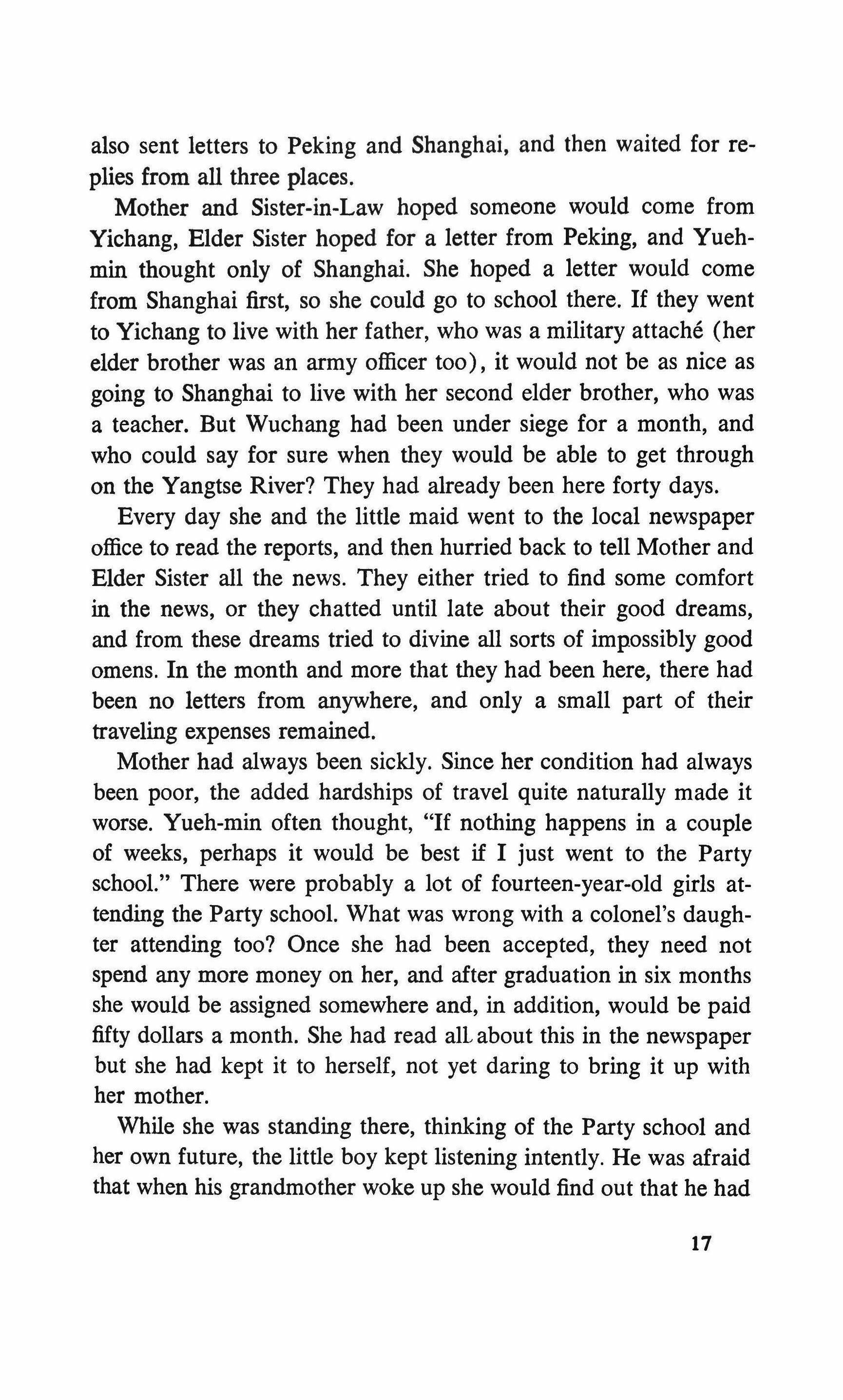
also sent letters to Peking and Shanghai, and then waited for replies from all three places.
Mother and Sister-in-Law hoped someone would come from Yichang, Elder Sister hoped for a letter from Peking, and Yuehmin thought only of Shanghai. She hoped a letter would come from Shanghai first, so she could go to school there. If they went to Yichang to live with her father, who was a military attache (her elder brother was an army officer too), it would not be as nice as going to Shanghai to live with her second elder brother, who was a teacher. But Wuchang had been under siege for a month, and who could say for sure when they would be able to get through on the Yangtse River? They had already been here forty days.
Every day she and the little maid went to the local newspaper office to read the reports, and then hurried back to tell Mother and Elder Sister all the news. They either tried to find some comfort in the news, or they chatted until late about their good dreams, and from these dreams tried to divine all sorts of impossibly good omens. In the month and more that they had been here, there had been no letters from anywhere, and only a small part of their traveling expenses remained.
Mother had always been sickly. Since her condition had always been poor, the added hardships of travel quite naturally made it worse. Yueh-min often thought, "If nothing happens in a couple of weeks, perhaps it would be best if I just went to the Party school." There were probably a lot of fourteen-year-old girls attending the Party school. What was wrong with a colonel's daughter attending too? Once she had been accepted, they need not spend any more money on her, and after graduation in six months she would be assigned somewhere and, in addition, would be paid fifty dollars a month. She had read alL about this in the newspaper but she had kept it to herself, not yet daring to bring it up with her mother.
While she was standing there, thinking of the Party school and her own future, the little boy kept listening intently. He was afraid that when his grandmother woke up she would find out that he had

climbed up onto the porch by himself, and then she would say that he could have fallen into the yard and broken his arm. Just now he heard his grandmother coughing, and he pulled at the edge of the girl's dress. "Aunty, let me go down now. Grandmother's awake," he said softly. Though the child had climbed the steps by himself, he didn't quite know how to get down and had to have some help.
As Yueh-min took the child down the steps, she saw that the maid was in the yard washing clothes. She went over and squatted down beside the basin and scrubbed at a couple of things, but didn't find it to her liking.
"Ts'ui-yun, you're awful busy. I'll go up on the porch and hang the clothes up for you." She took some damp clothes that had been wrung out and went back up onto the porch. In a short while she had hung the clothes on bamboo poles.
Since the bridge over the middle part of the river was rather far away, for convenience there was a ferry boat, about as wide as a wooden bench, which was just now pulled to the shore. The ferry did not connect with the road, so often for long periods of time not a single person was seen riding it across the river, except for people from the dye works drying cloth and a few laborers carrying earth. At the moment, the ferryman was lying asleep on a big stone in the field. The boat was gray and worn, as though thoroughly bored and fatigued with being blown in the direction of the current by the gentle wind.
"Why is it so quiet?" Yueh-min wondered. On the opposite bank, some boat builders were hammering on the side of a boat. In the little village on the other side of the river, a peddler selling needles and thread was beating his small drum. The sounds floating on the air intensified the feeling of unusual quiet.
A little nun wearing a gray robe and black skullcap and carrying a new bamboo basket came out of the convent where the peach trees were. With broad steps she crossed the field and headed for the riverbank. She walked up to the bank a little above the ferry, stopped, then squatted down on a stone and slowly rolled up her
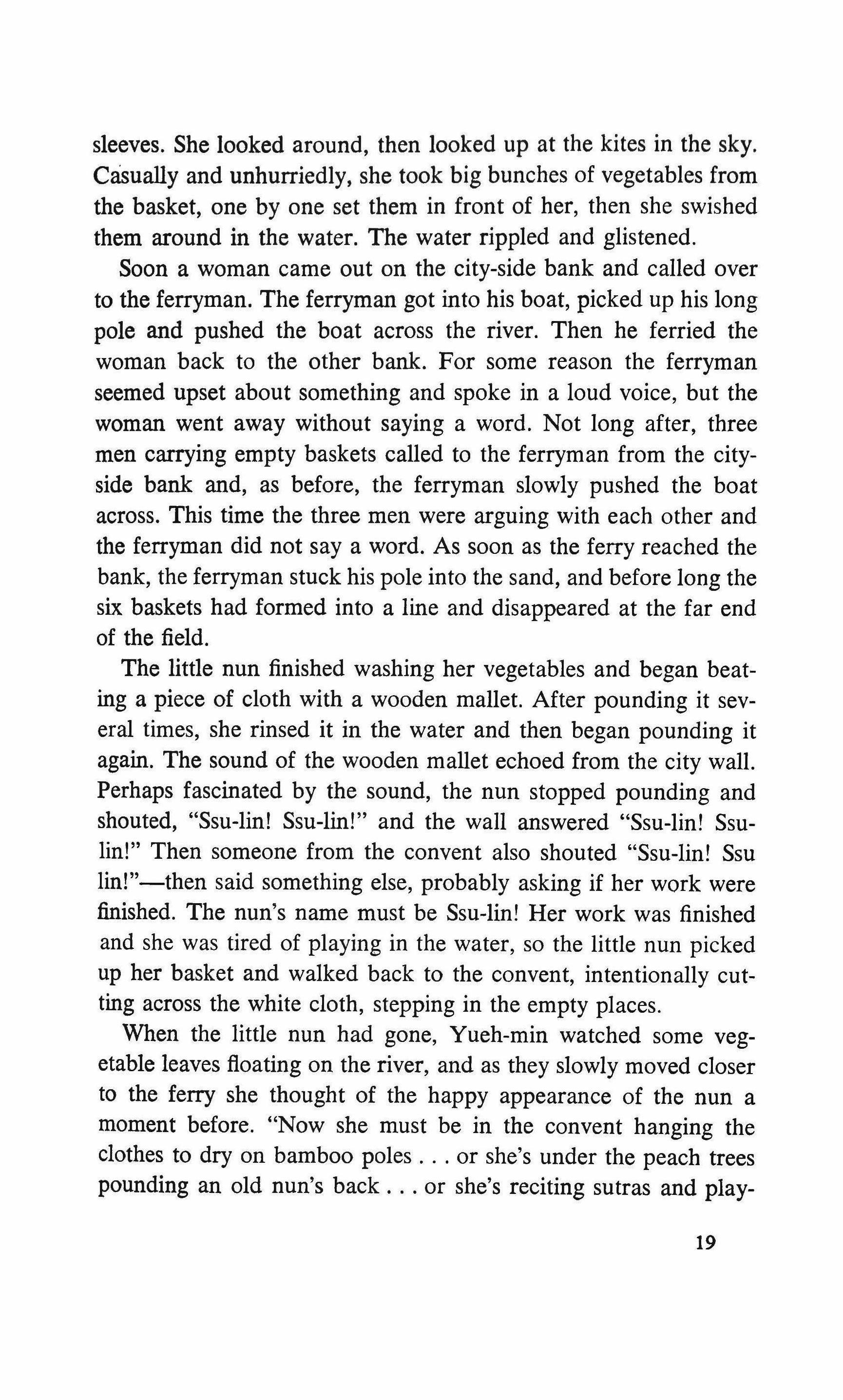
sleeves. She looked around, then looked up at the kites in the sky. Casually and unhurriedly, she took big bunches of vegetables from the basket, one by one set them in front of her, then she swished them around in the water. The water rippled and glistened.
Soon a woman came out on the city-side bank and called over to the ferryman. The ferryman got into his boat, picked up his long pole and pushed the boat across the river. Then he ferried the woman back to the other bank. For some reason the ferryman seemed upset about something and spoke in a loud voice, but the woman went away without saying a word. Not long after, three men carrying empty baskets called to the ferryman from the cityside bank and, as before, the ferryman slowly pushed the boat across. This time the three men were arguing with each other and the ferryman did not say a word. As soon as the ferry reached the bank, the ferryman stuck his pole into the sand, and before long the six baskets had formed into a line and disappeared at the far end of the field.
The little nun finished washing her vegetables and began beating a piece of cloth with a wooden mallet. After pounding it several times, she rinsed it in the water and then began pounding it again. The sound of the wooden mallet echoed from the city wall. Perhaps fascinated by the sound, the nun stopped pounding and shouted, "Ssu-lin! Ssu-lin!" and the wall answered "Ssu-lin! Ssulin!" Then someone from the convent also shouted "Ssu-lin! Ssu lin!"-then said something else, probably asking if her work were finished. The nun's name must be Ssu-lin! Her work was finished and she was tired of playing in the water, so the little nun picked up her basket and walked back to the convent, intentionally cutting across the white cloth, stepping in the empty places.
When the little nun had gone, Yueh-min watched some vegetable leaves floating on the river, and as they slowly moved closer to the ferry she thought of the happy appearance of the nun a moment before. "Now she must be in the convent hanging the clothes to dry on bamboo poles or she's under the peach trees pounding an old nun's back or she's reciting sutras and play-
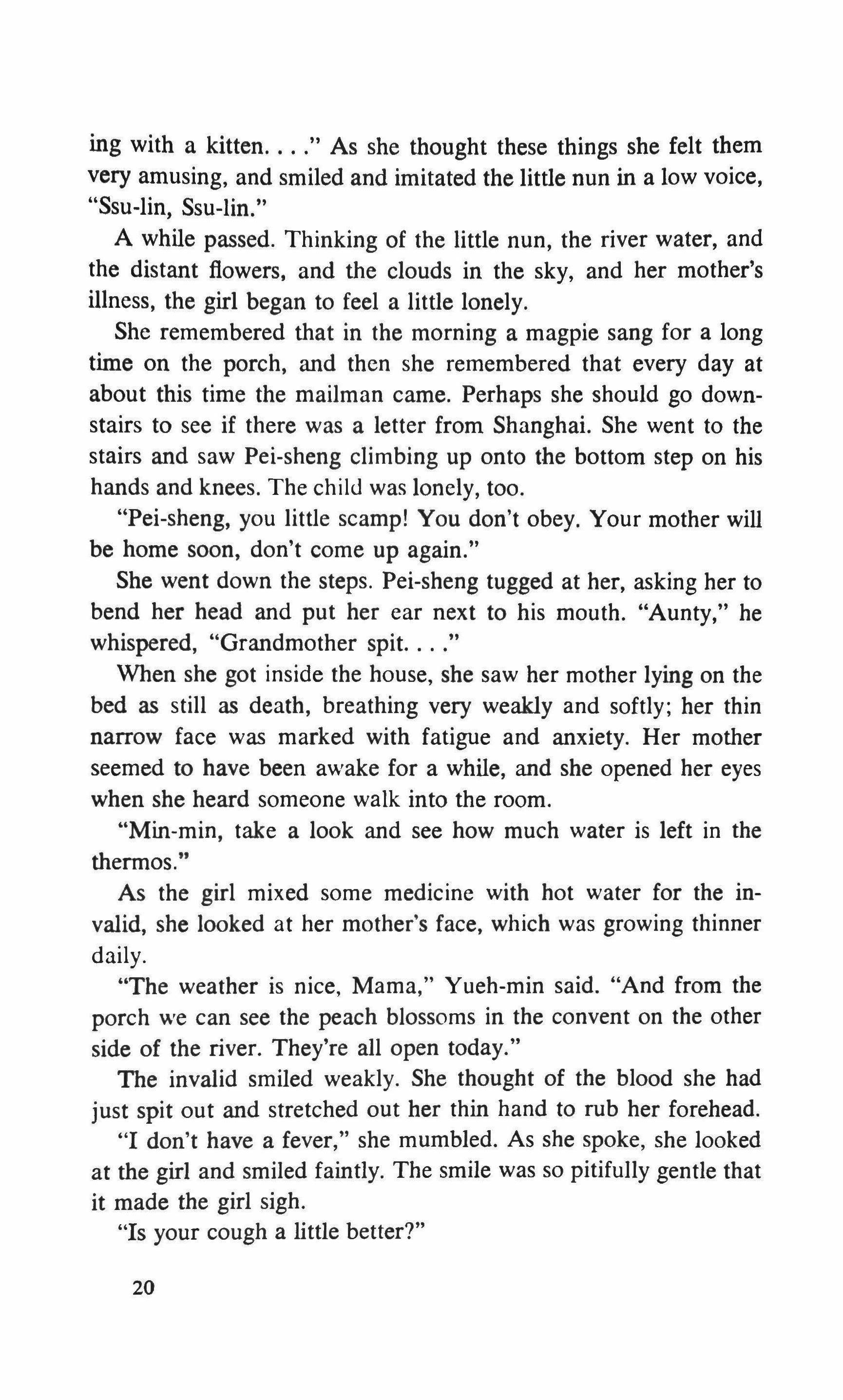
ing with a kitten As she thought these things she felt them very amusing, and smiled and imitated the little nun in a low voice, "Ssu-lin, Ssu-lin."
A while passed. Thinking of the little nun, the river water, and the distant flowers, and the clouds in the sky, and her mother's illness, the girl began to feel a little lonely.
She remembered that in the morning a magpie sang for a long time on the porch, and then she remembered that every day at about this time the mailman came. Perhaps she should go downstairs to see if there was a letter from Shanghai. She went to the stairs and saw Pei-sheng climbing up onto the bottom step on his hands and knees. The child was lonely, too.
"Pei-sheng, you little scamp! You don't obey. Your mother will be home soon, don't come up again."
She went down the steps. Pei-sheng tugged at her, asking her to bend her head and put her ear next to his mouth. "Aunty," he whispered, "Grandmother spit.
When she got inside the house, she saw her mother lying on the bed as still as death, breathing very weakly and softly; her thin narrow face was marked with fatigue and anxiety. Her mother seemed to have been awake for a while, and she opened her eyes when she heard someone walk into the room.
"Min-min, take a look and see how much water is left in the thermos."
As the girl mixed some medicine with hot water for the invalid, she looked at her mother's face, which was growing thinner daily.
"The weather is nice, Mama," Yueh-min said. "And from the porch we can see the peach blossoms in the convent on the other side of the river. They're all open today."
The invalid smiled weakly. She thought of the blood she had just spit out and stretched out her thin hand to rub her forehead.
"I don't have a fever," she mumbled. As she spoke, she looked at the girl and smiled faintly. The smile was so pitifully gentle that it made the girl sigh.
"Is your cough a little better?"
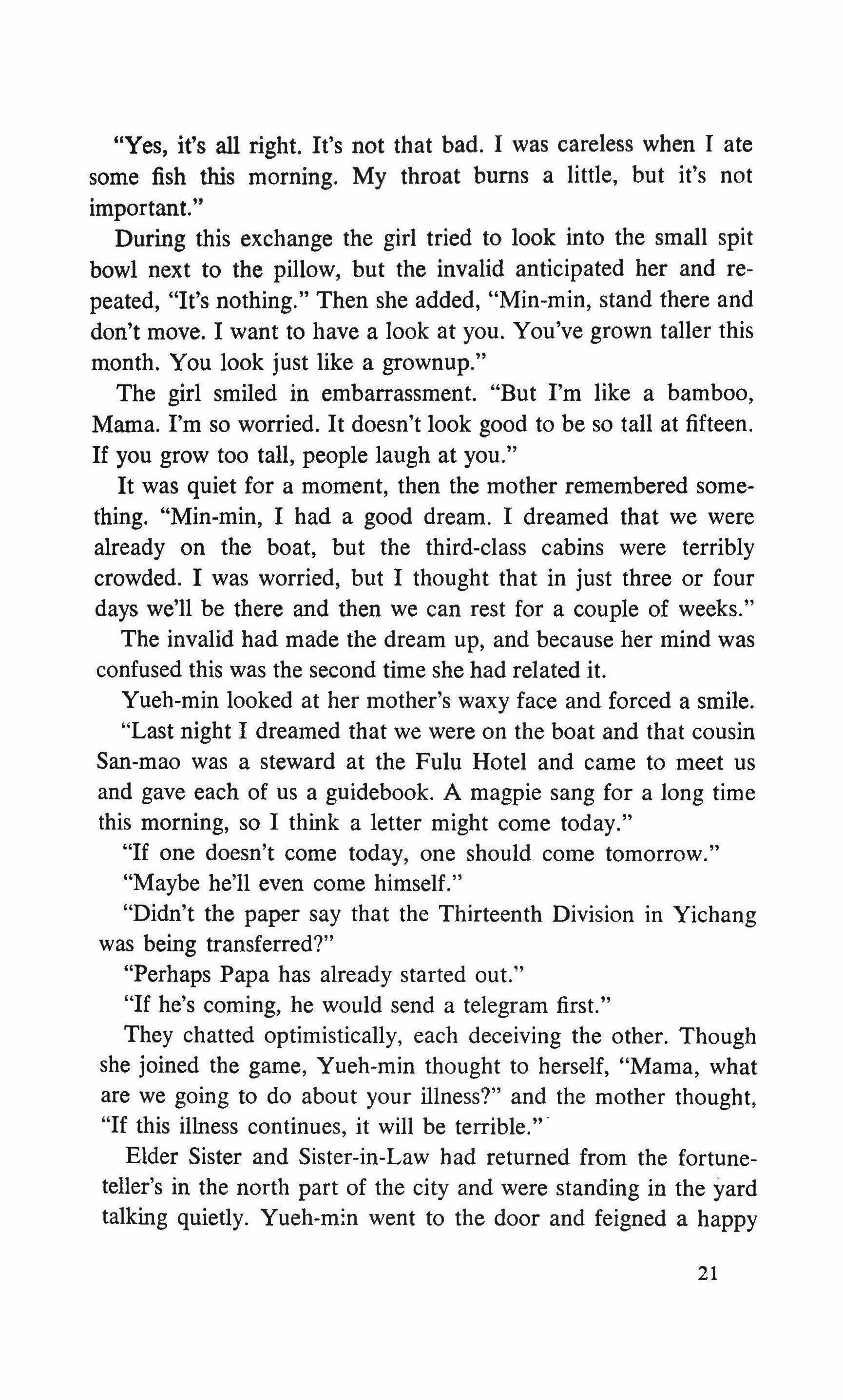
"Yes, it's all right. It's not that bad. I was careless when I ate some :fish this morning. My throat burns a little, but it's not important."
During this exchange the girl tried to look into the small spit bowl next to the pillow, but the invalid anticipated her and repeated, "It's nothing." Then she added, "Min-min, stand there and don't move. I want to have a look at you. You've grown taller this month. You look just like a grownup."
The girl smiled in embarrassment. "But I'm like a bamboo, Mama. I'm so worried. It doesn't look good to be so tall at fifteen. If you grow too tall, people laugh at you."
It was quiet for a moment, then the mother remembered something. "Min-min, I had a good dream. I dreamed that we were already on the boat, but the third-class cabins were terribly crowded. I was worried, but I thought that in just three or four days we'll be there and then we can rest for a couple of weeks."
The invalid had made the dream up, and because her mind was confused this was the second time she had related it.
Yueh-min looked at her mother's waxy face and forced a smile.
"Last night I dreamed that we were on the boat and that cousin San-mao was a steward at the Fulu Hotel and came to meet us and gave each of us a guidebook. A magpie sang for a long time this morning, so I think a letter might come today."
"If one doesn't come today, one should come tomorrow."
"Maybe he'll even come himself."
"Didn't the paper say that the Thirteenth Division in Yichang was being transferred?"
"Perhaps Papa has already started out."
"If he's coming, he would send a telegram first."
They chatted optimistically, each deceiving the other. Though she joined the game, Yueh-min thought to herself, "Mama, what are we going to do about your illness?" and the mother thought, "If this illness continues, it will be terrible."·
Elder Sister and Sister-in-Law had returned from the fortuneteller's in the north part of the city and were standing in the yard talking quietly. Yueh-min went to the door and feigned a happy
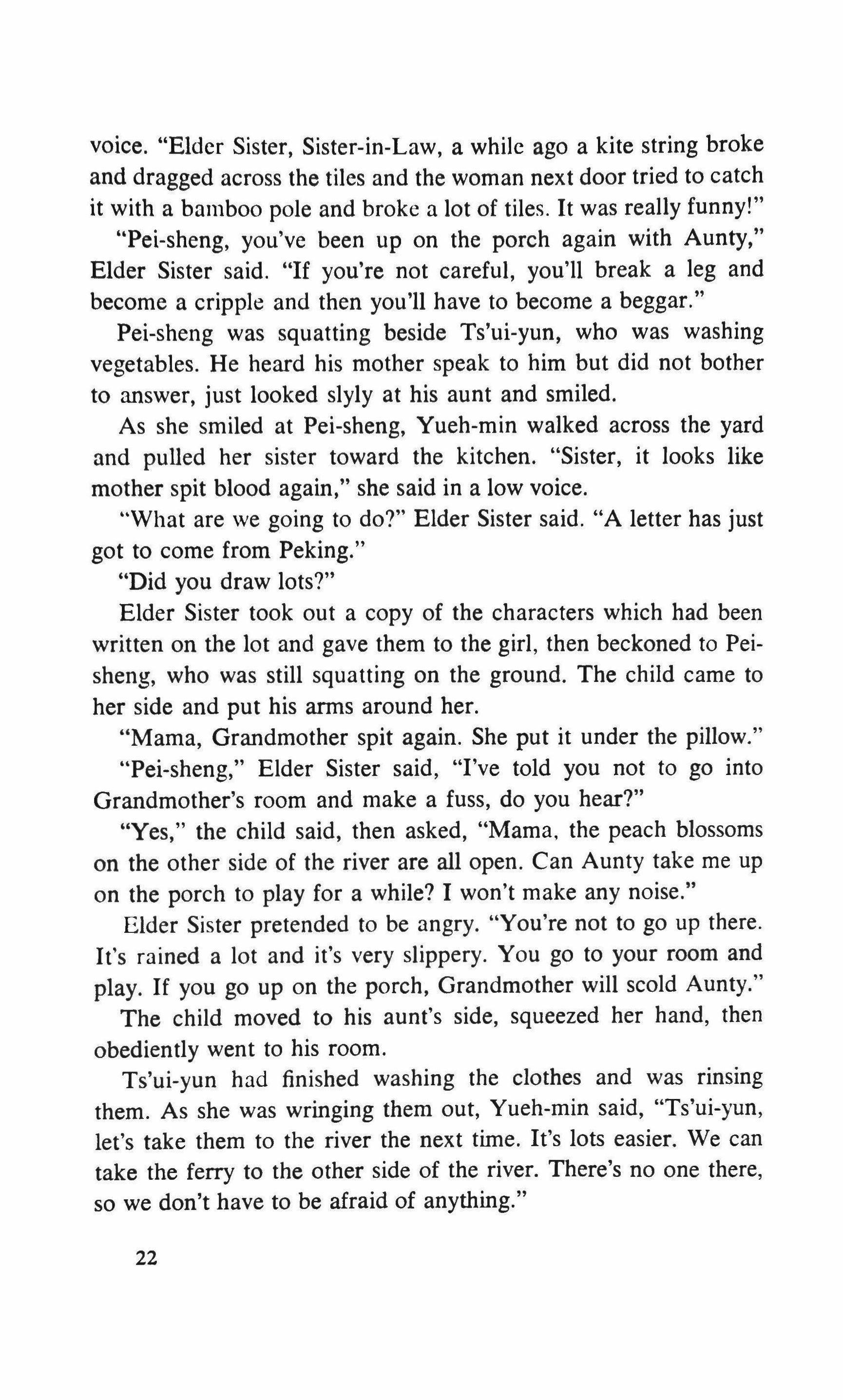
voice. "Elder Sister, Sister-in-Law, a while ago a kite string broke and dragged across the tiles and the woman next door tried to catch it with a bamboo pole and broke a lot of tiles. It was really funny!"
"Pei-sheng, you've been up on the porch again with Aunty," Elder Sister said. "If you're not careful, you'll break a leg and become a cripple and then you'll have to become a beggar."
Pei-sheng was squatting beside Ts'ui-yun, who was washing vegetables. He heard his mother speak to him but did not bother to answer, just looked slyly at his aunt and smiled.
As she smiled at Pei-sheng, Yueh-min walked across the yard and pulled her sister toward the kitchen. "Sister, it looks like mother spit blood again," she said in a low voice.
"What are we going to do?" Elder Sister said. "A letter has just got to come from Peking."
"Did you draw lots?"
Elder Sister took out a copy of the characters which had been written on the lot and gave them to the girl, then beckoned to Peisheng, who was still squatting on the ground. The child came to her side and put his arms around her.
"Mama, Grandmother spit again. She put it under the pillow."
"Pei-sheng," Elder Sister said, "I've told you not to go into Grandmother's room and make a fuss, do you hear?"
"Yes," the child said, then asked, "Mama, the peach blossoms on the other side of the river are all open. Can Aunty take me up on the porch to play for a while? I won't make any noise."
Elder Sister pretended to be angry. "You're not to go up there. It's rained a lot and it's very slippery. You go to your room and play. If you go up on the porch, Grandmother will scold Aunty."
The child moved to his aunt's side, squeezed her hand, then obediently went to his room.
Ts'ui-yun had finished washing the clothes and was rinsing them. As she was wringing them out, Yueh-min said, "Ts'ui-yun, let's take them to the river the next time. It's lots easier. We can take the ferry to the other side of the river. There's no one there, so we don't have to be afraid of anything."
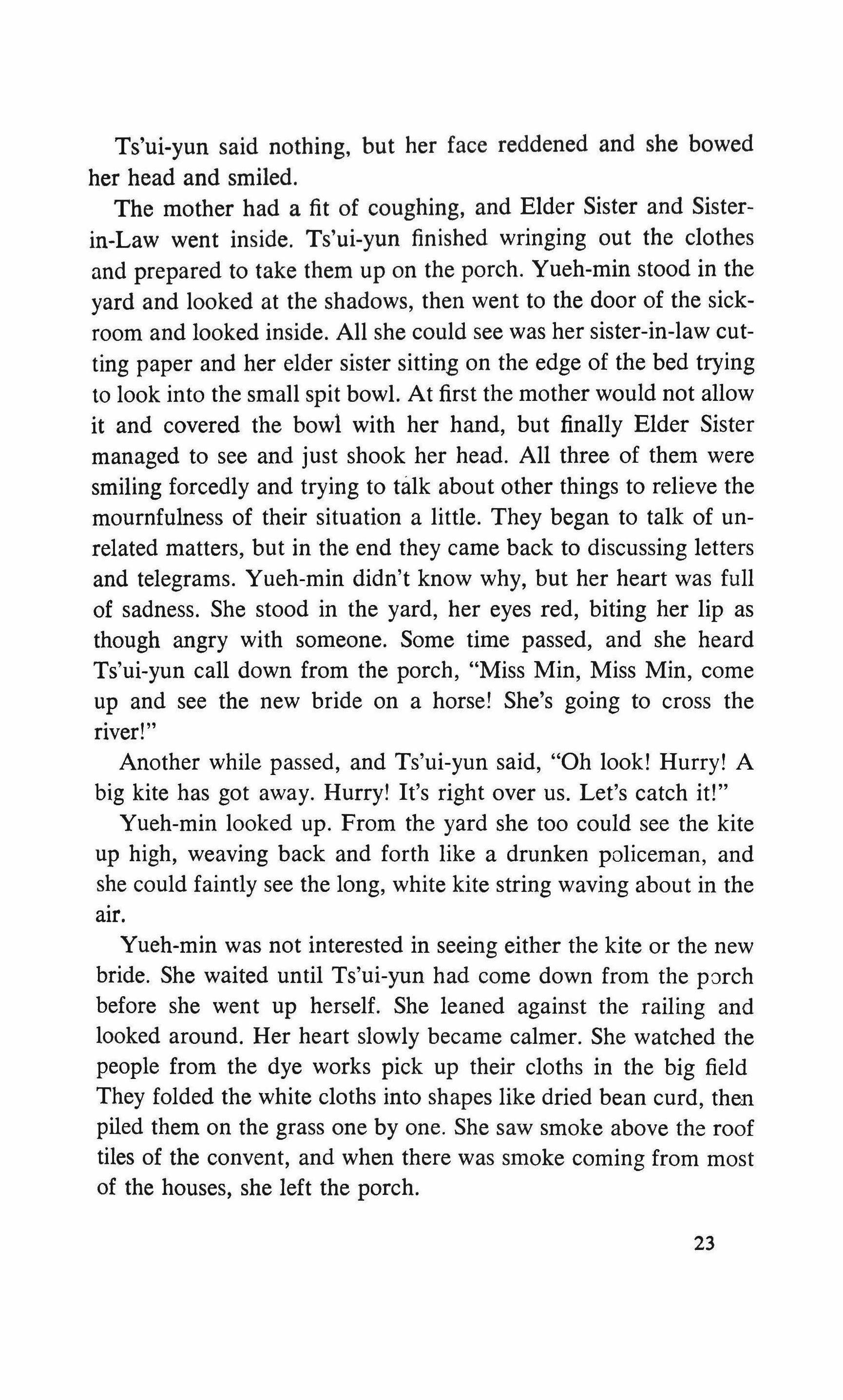
Ts'ui-yun said nothing, but her face reddened and she bowed her head and smiled.
The mother had a fit of coughing, and Elder Sister and Sisterin-Law went inside. Ts'ui-yun finished wringing out the clothes and prepared to take them up on the porch. Yueh-min stood in the yard and looked at the shadows, then went to the door of the sickroom and looked inside. All she could see was her sister-in-law cutting paper and her elder sister sitting on the edge of the bed trying to look into the small spit bowl. At first the mother would not allow it and covered the bowl with her hand, but finally Elder Sister managed to see and just shook her head. All three of them were smiling forcedly and trying to talk about other things to relieve the mournfulness of their situation a little. They began to talk of unrelated matters, but in the end they came back to discussing letters and telegrams. Yueh-min didn't know why, but her heart was full of sadness. She stood in the yard, her eyes red, biting her lip as though angry with someone. Some time passed, and she heard Ts'ui-yun call down from the porch, "Miss Min, Miss Min, come up and see the new bride on a horse! She's going to cross the river!"
Another while passed, and Ts'ui-yun said, "Oh look! Hurry! A big kite has got away. Hurry! It's right over us. Let's catch it!"
Yueh-min looked up. From the yard she too could see the kite up high, weaving back and forth like a drunken policeman, and she could faintly see the long, white kite string waving about in the air.
Yueh-min was not interested in seeing either the kite or the new bride. She waited until Ts'ui-yun had come down from the porch before she went up herself. She leaned against the railing and looked around. Her heart slowly became calmer. She watched the people from the dye works pick up their cloths in the big field They folded the white cloths into shapes like dried bean curd, then piled them on the grass one by one. She saw smoke above the roof tiles of the convent, and when there was smoke coming from most of the houses, she left the porch.
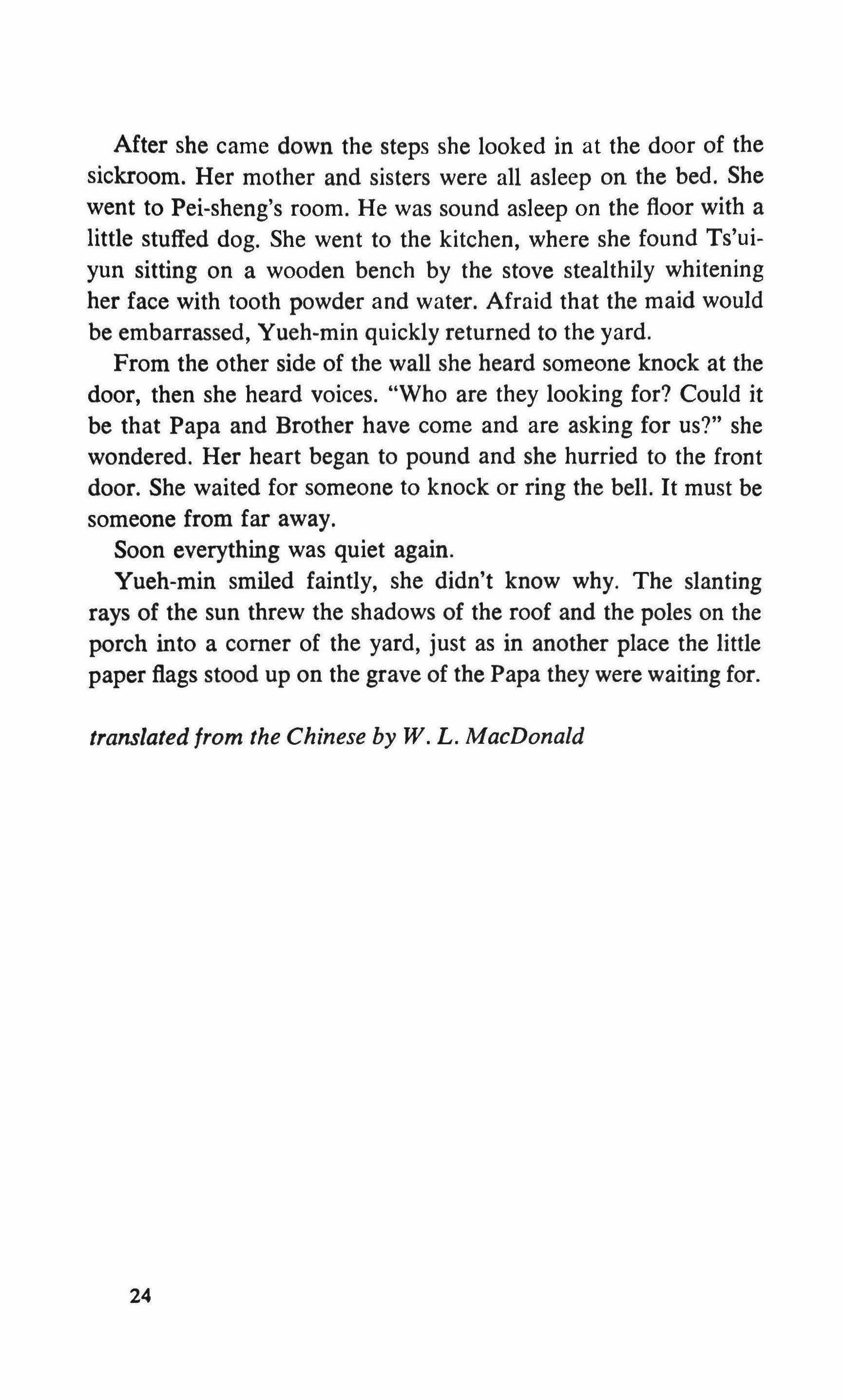
After she came down the steps she looked in at the door of the sickroom. Her mother and sisters were all asleep on the bed. She went to Pei-sheng's room. He was sound asleep on the floor with a little stuffed dog. She went to the kitchen, where she found Ts'uiyun sitting on a wooden bench by the stove stealthily whitening her face with tooth powder and water. Afraid that the maid would be embarrassed, Yueh-min quickly returned to the yard.
From the other side of the wall she heard someone knock at the door, then she heard voices. "Who are they looking for? Could it be that Papa and Brother have come and are asking for us?" she wondered. Her heart began to pound and she hurried to the front door. She waited for someone to knock or ring the bell. It must be someone from far away.
Soon everything was quiet again.
Yueh-min smiled faintly, she didn't know why. The slanting rays of the sun threw the shadows of the roof and the poles on the porch into a corner of the yard, just as in another place the little paper flags stood up on the grave of the Papa they were waiting for.
translated from the Chinese by W.
L. MacDonaldIn the blotchy shade of the green vineyard at high noon, Sleeping without a pillow, a naked child with a hand like a fern shoot. A dragonfly settles there and tickles the hand with its purple wings.
CHONG HAGYONG translated from the Korean by Richard Rutt
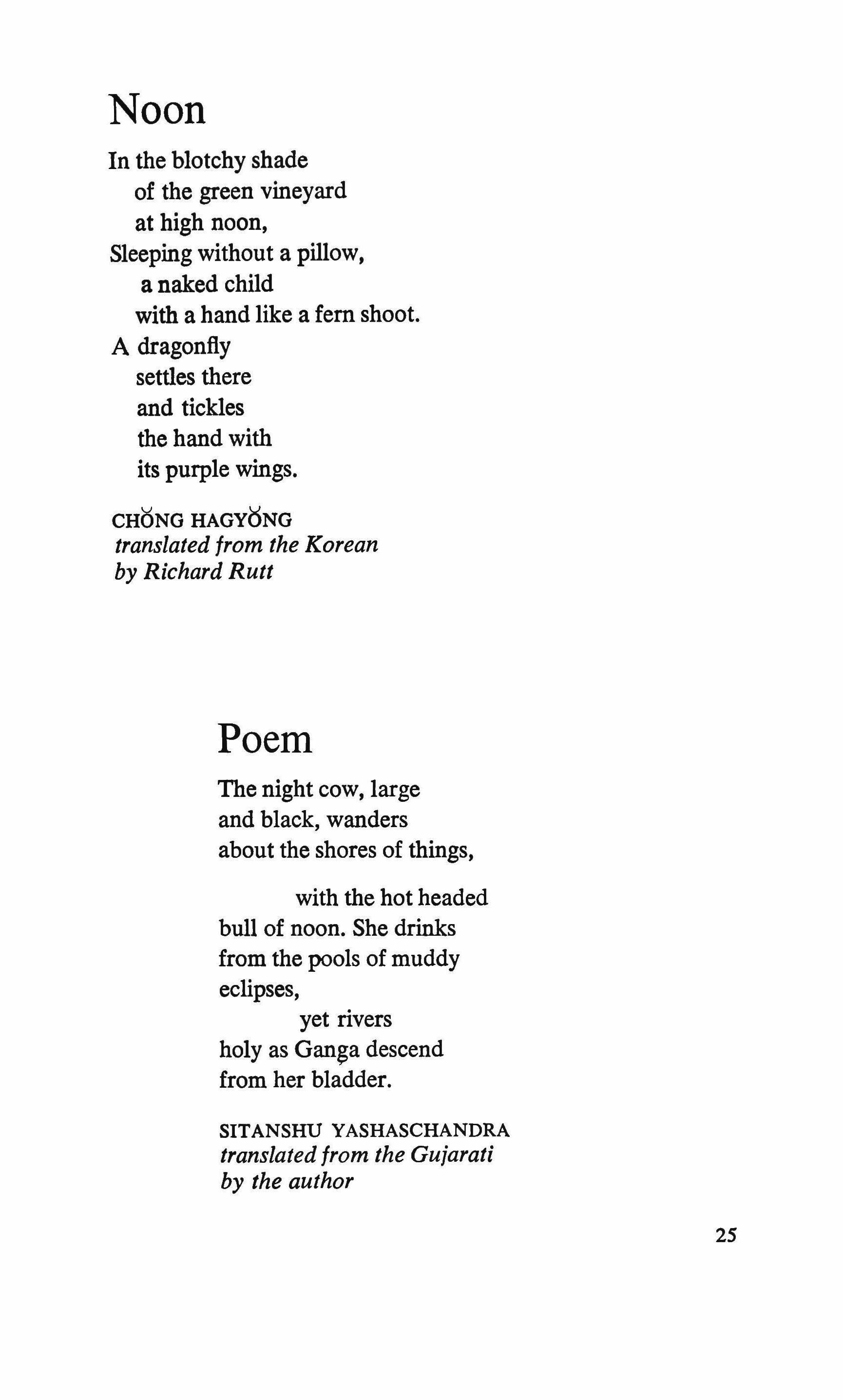
The night cow, large and black, wanders about the shores of things, with the hot headed bull of noon. She drinks from the pools of muddy eclipses, yet rivers holy as Ganga descend from her bladder.
SITANSHU YASHASCHANDRA translated from the Gujarati by the author
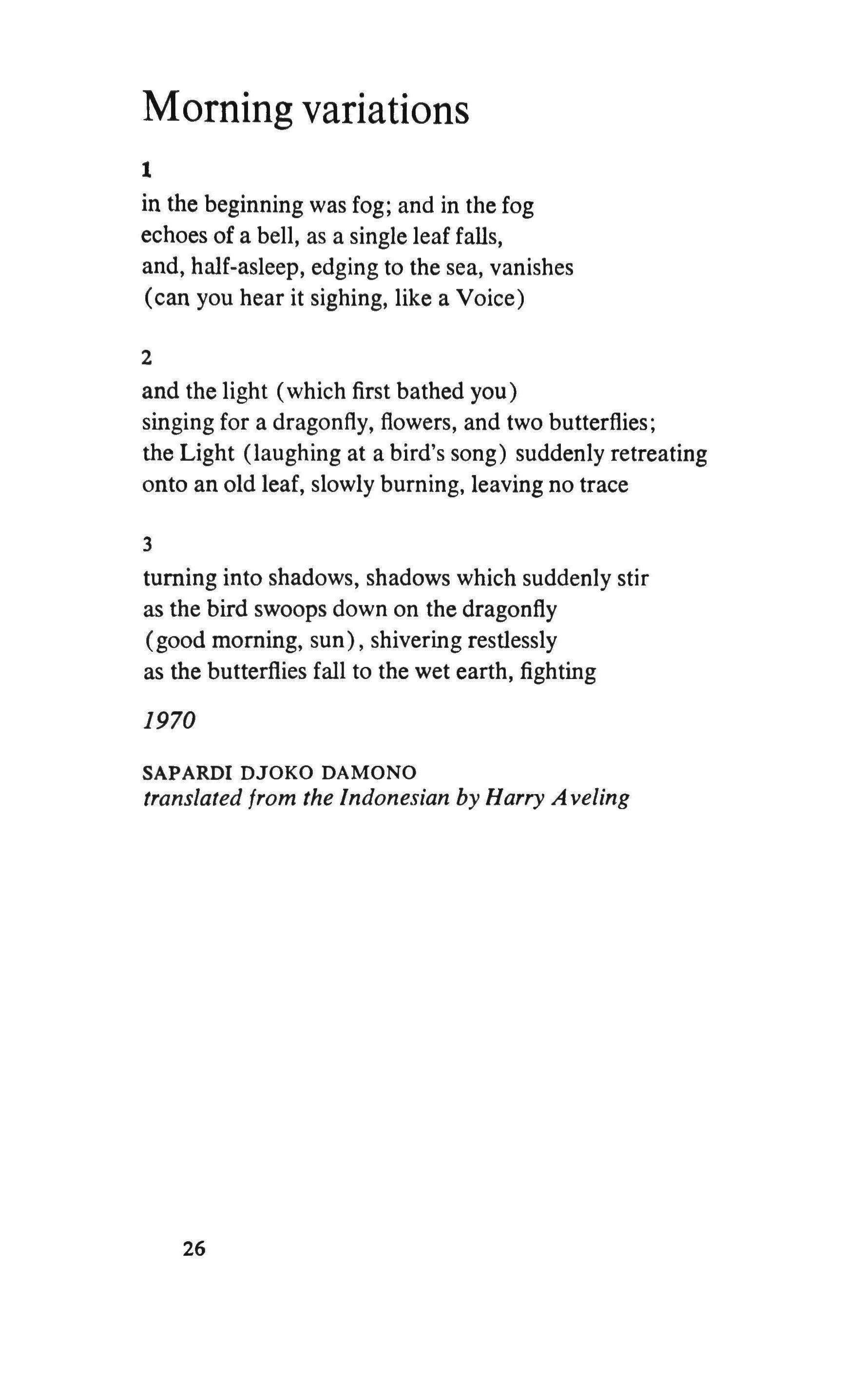
1
in the beginning was fog; and in the fog echoes of a bell, as a single leaf falls, and, half-asleep, edging to the sea, vanishes (can you hear it sighing, like a Voice)
2 and the light (which first bathed you) singing for a dragonfly, flowers, and two butterflies; the Light (laughing at a bird's song) suddenly retreating onto an old leaf, slowly burning, leaving no trace
3
turning into shadows, shadows which suddenly stir as the bird swoops down on the dragonfly (good morning, sun), shivering restlessly as the butterflies fall to the wet earth, fighting
1970
SAPARDI DJOKO DAMONO
translated from the Indonesian by Harry Aveling
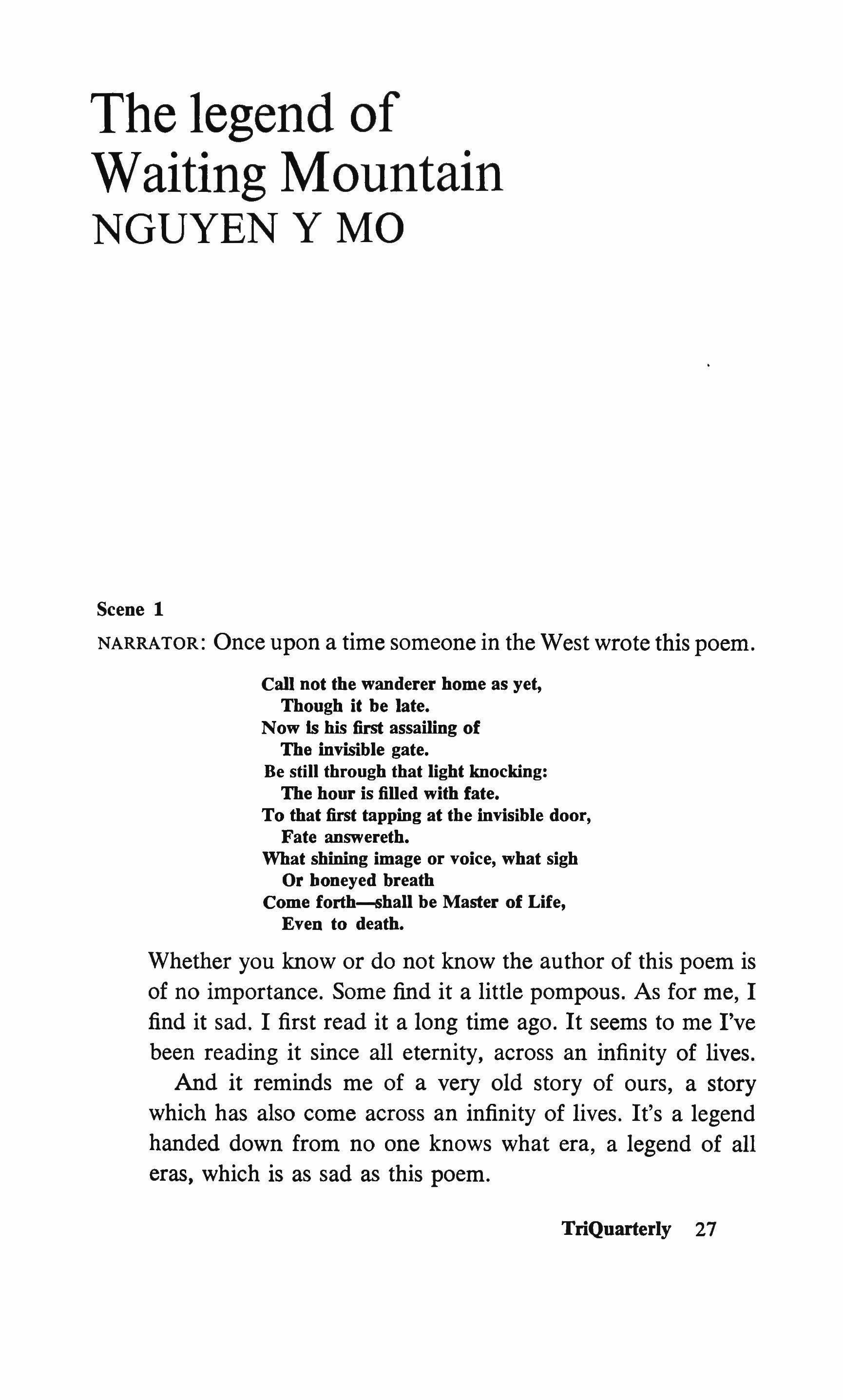
Scene 1
NARRATOR: Once upon a time someone in the West wrote this poem.
Call not the wanderer home as yet, Though it be late. Now Is his first assailing of The invisible gate.
Be still through that light knocking: The hour is filled with fate.
To that first tapping at the invisible door, Fate answereth.
What shining image or voice, what sigh Or boneyed breath
Come forth-shall be Master of Life, Even to death.
Whether you know or do not know the author of this poem is of no importance. Some find it a little pompous. As for me, I find it sad. I first read it a long time ago. It seems to me I've been reading it since all eternity, across an infinity of lives. And it reminds me of a very old story of ours, a story which has also come across an infinity of lives. It's a legend handed down from no one knows what era, a legend of all eras, which is as sad as this poem.
TriQuarterly 27
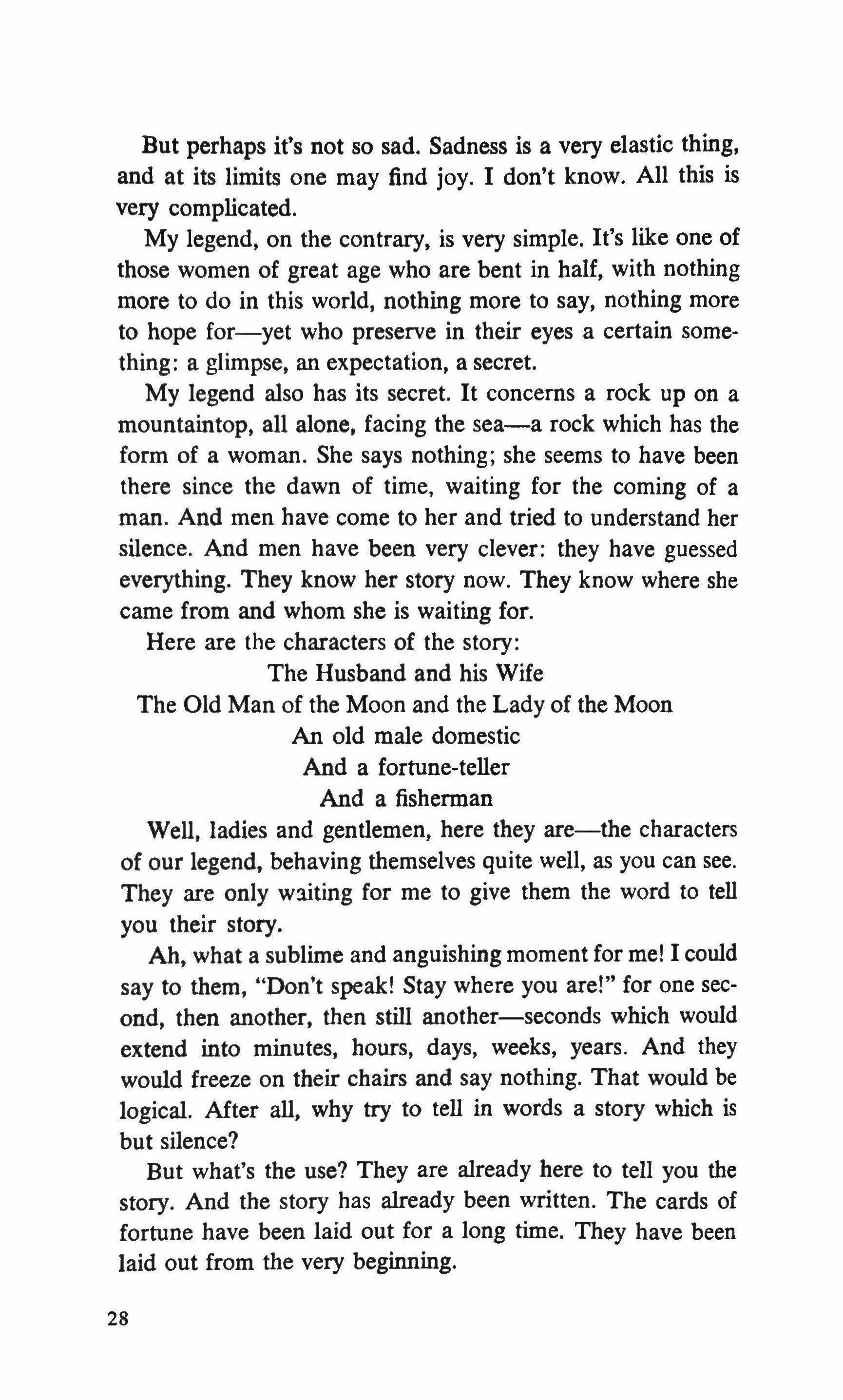
But perhaps it's not so sad. Sadness is a very elastic thing, and at its limits one may find joy. I don't know. All this is very complicated.
My legend, on the contrary, is very simple. It's like one of those women of great age who are bent in half, with nothing more to do in this world, nothing more to say, nothing more to hope for-yet who preserve in their eyes a certain something: a glimpse, an expectation, a secret.
My legend also has its secret. It concerns a rock up on a mountaintop, all alone, facing the sea-a rock which has the form of a woman. She says nothing; she seems to have been there since the dawn of time, waiting for the coming of a man. And men have come to her and tried to understand her silence. And men have been very clever: they have guessed everything. They know her story now. They know where she came from and whom she is waiting for.
Here are the characters of the story:
The Husband and his Wife
The Old Man of the Moon and the Lady of the Moon
An old male domestic And a fortune-teller
And a fisherman
Well, ladies and gentlemen, here they are-the characters of our legend, behaving themselves quite well, as you can see. They are only waiting for me to give them the word to tell you their story.
Ah, what a sublime and anguishing moment for me! I could say to them, "Don't speak! Stay where you are!" for one second, then another, then still another-seconds which would extend into minutes, hours, days, weeks, years. And they would freeze on their chairs and say nothing. That would be logical. After all, why try to tell in words a story which is but silence?
But what's the use? They are already here to tell you the story. And the story has already been written. The cards of fortune have been laid out for a long time. They have been laid out from the very beginning.
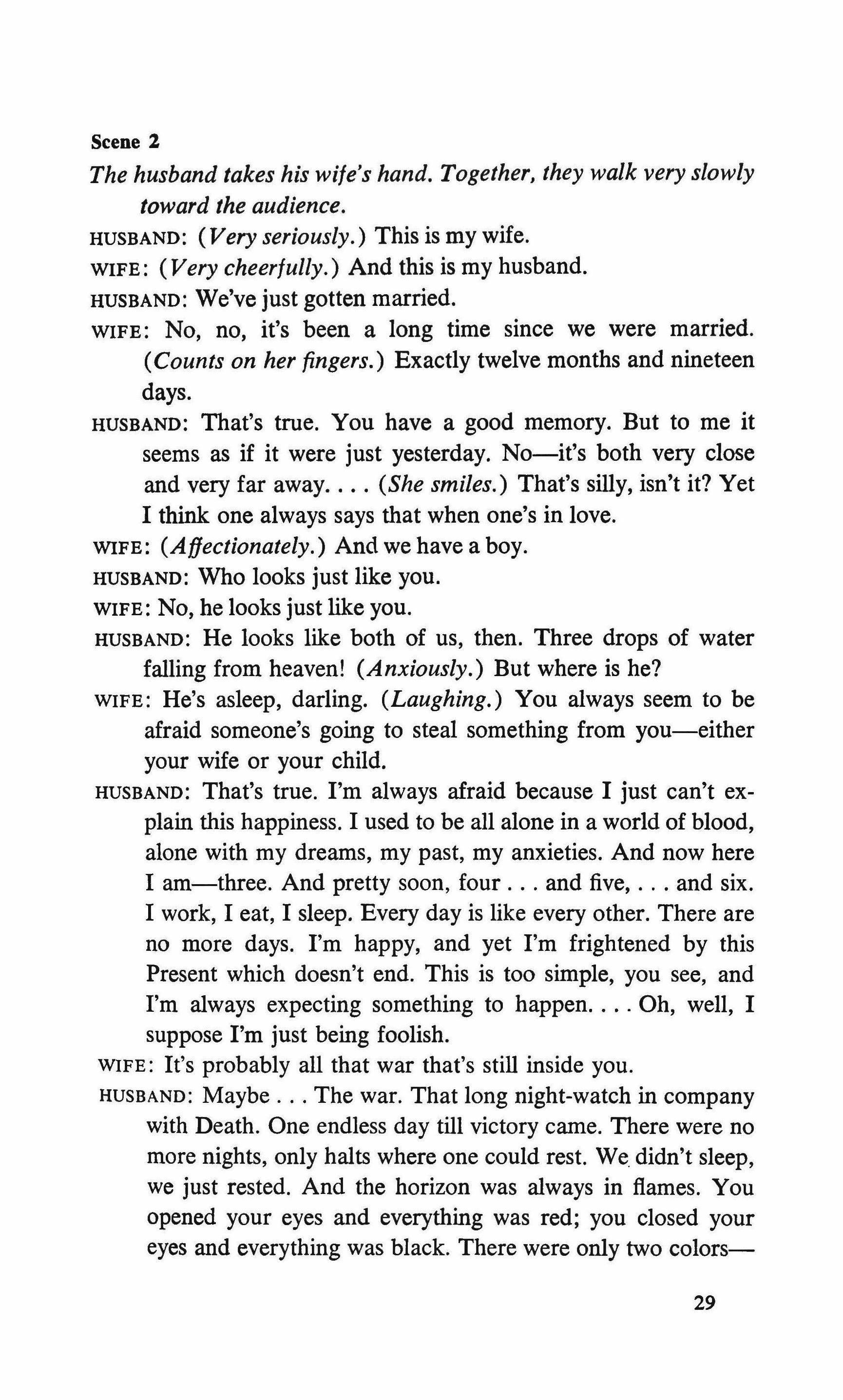
The husband takes his wife's hand. Together, they walk very slowly toward the audience.
HUSBAND: (Very seriously.) This is my wife.
WIFE: (Very cheerjully.) And this is my husband.
HUSBAND: We've just gotten married.
WIFE: No, no, it's been a long time since we were married. (Counts on her fingers.) Exactly twelve months and nineteen days.
HUSBAND: That's true. You have a good memory. But to me it seems as if it were just yesterday. No-it's both very close and very far away (She smiles.) That's silly, isn't it? Yet I think one always says that when one's in love.
WIFE: (Affectionately.) And we have a boy.
HUSBAND: Who looks just like you.
WIFE: No, he looks just like you.
HUSBAND: He looks like both of us, then. Three drops of water falling from heaven! (Anxiously.) But where is he?
WIFE: He's asleep, darling. (Laughing.) You always seem to be afraid someone's going to steal something from you-either your wife or your child.
HUSBAND: That's true. I'm always afraid because I just can't explain this happiness. I used to be all alone in a world of blood, alone with my dreams, my past, my anxieties. And now here I am-three. And pretty soon, four and five, and six. I work, I eat, I sleep. Every day is like every other. There are no more days. I'm happy, and yet I'm frightened by this Present which doesn't end. This is too simple, you see, and I'm always expecting something to happen Oh, well, I suppose I'm just being foolish.
WIFE: It's probably all that war that's still inside you.
HUSBAND: Maybe The war. That long night-watch in company with Death. One endless day till victory came. There were no more nights, only halts where one could rest. We. didn't sleep, we just rested. And the horizon was always in flames. You opened your eyes and everything was red; you closed your eyes and everything was black. There were only two colors-
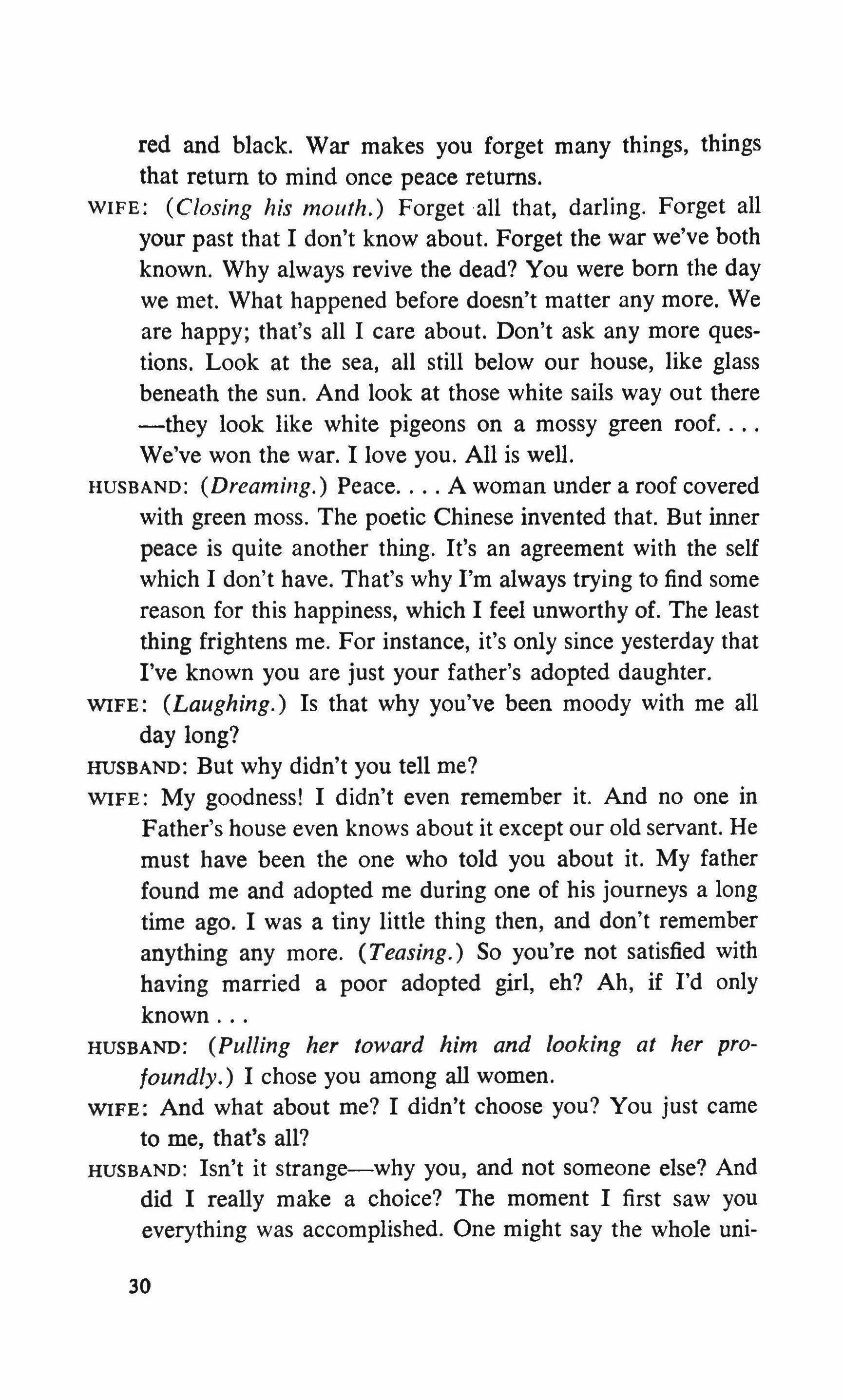
red and black. War makes you forget many things, things that return to mind once peace returns.
WIFE: (Closing his mouth.) Forget all that, darling. Forget all your past that I don't know about. Forget the war we've both known. Why always revive the dead? You were born the day we met. What happened before doesn't matter any more. We are happy; that's all I care about. Don't ask any more questions. Look at the sea, all still below our house, like glass beneath the sun. And look at those white sails way out there -they look like white pigeons on a mossy green roof We've won the war. I love you. All is well.
HUSBAND: (Dreaming.) Peace A woman under a roof covered with green moss. The poetic Chinese invented that. But inner peace is quite another thing. It's an agreement with the self which I don't have. That's why I'm always trying to find some reason for this happiness, which I feel unworthy of. The least thing frightens me. For instance, it's only since yesterday that I've known you are just your father's adopted daughter.
WIFE: (Laughing.) Is that why you've been moody with me all day long?
HUSBAND: But why didn't you tell me?
WIFE: My goodness! I didn't even remember it. And no one in Father's house even knows about it except our old servant. He must have been the one who told you about it. My father found me and adopted me during one of his journeys a long time ago. I was a tiny little thing then, and don't remember anything any more. (Teasing.) So you're not satisfied with having married a poor adopted girl, eh? Ah, if I'd only known
HUSBAND: (Pulling her toward him and looking at her pro[oundly.) I chose you among all women.
WIFE: And what about me? I didn't choose you? You just came to me, that's all?
HUSBAND: Isn't it strange-why you, and not someone else? And did I really make a choice? The moment I first saw you everything was accomplished. One might say the whole uni-
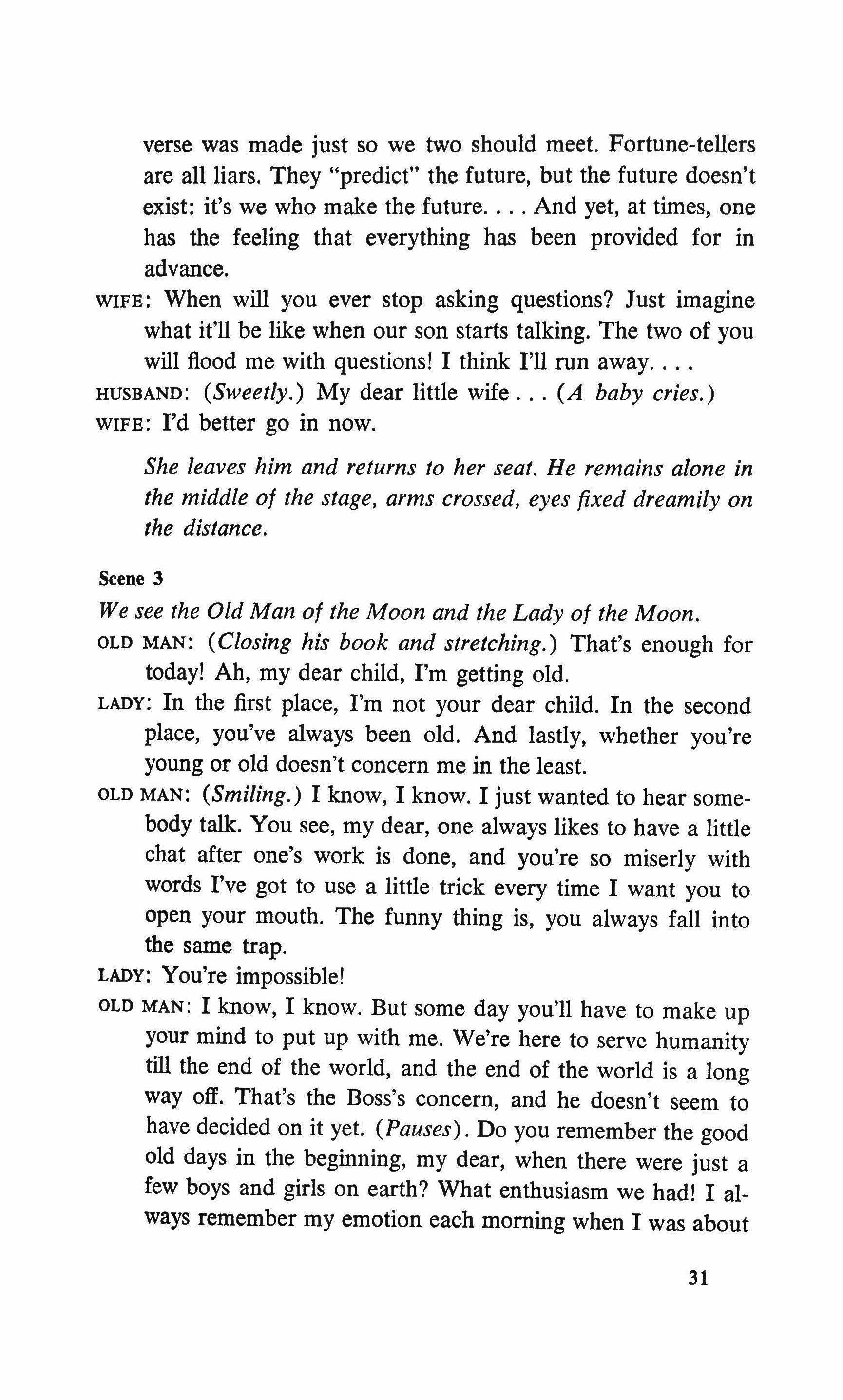
verse was made just so we two should meet. Fortune-tellers are all liars. They "predict" the future, but the future doesn't exist: it's we who make the future And yet, at times, one has the feeling that everything has been provided for in advance.
WIFE: When will you ever stop asking questions? Just imagine what it'll be like when our son starts talking. The two of you will flood me with questions! I think I'll run away
HUSBAND: (Sweetly.) My dear little wife (A baby cries.)
WIFE: I'd better go in now.
She leaves him and returns to her seat. He remains alone in the middle of the stage, arms crossed, eyes fixed dreamily on the distance.
Scene 3
We see the Old Man of the Moon and the Lady of the Moon.
OLD MAN: (Closing his book and stretching.) That's enough for today! Ah, my dear child, I'm getting old.
LADY: In the first place, I'm not your dear child. In the second place, you've always been old. And lastly, whether you're young or old doesn't concern me in the least.
OLD MAN: (Smiling.) I know, I know. I just wanted to hear somebody talk. You see, my dear, one always likes to have a little chat after one's work is done, and you're so miserly with words I've got to use a little trick every time I want you to open your mouth. The funny thing is, you always fall into the same trap.
LADY: You're impossible!
OLD MAN: I know, I know. But some day you'll have to make up your mind to put up with me. We're here to serve humanity till the end of the world, and the end of the world is a long way off. That's the Boss's concern, and he doesn't seem to have decided on it yet. (Pauses). Do you remember the good old days in the beginning, my dear, when there were just a few boys and girls on earth? What enthusiasm we had! I always remember my emotion each morning when I was about
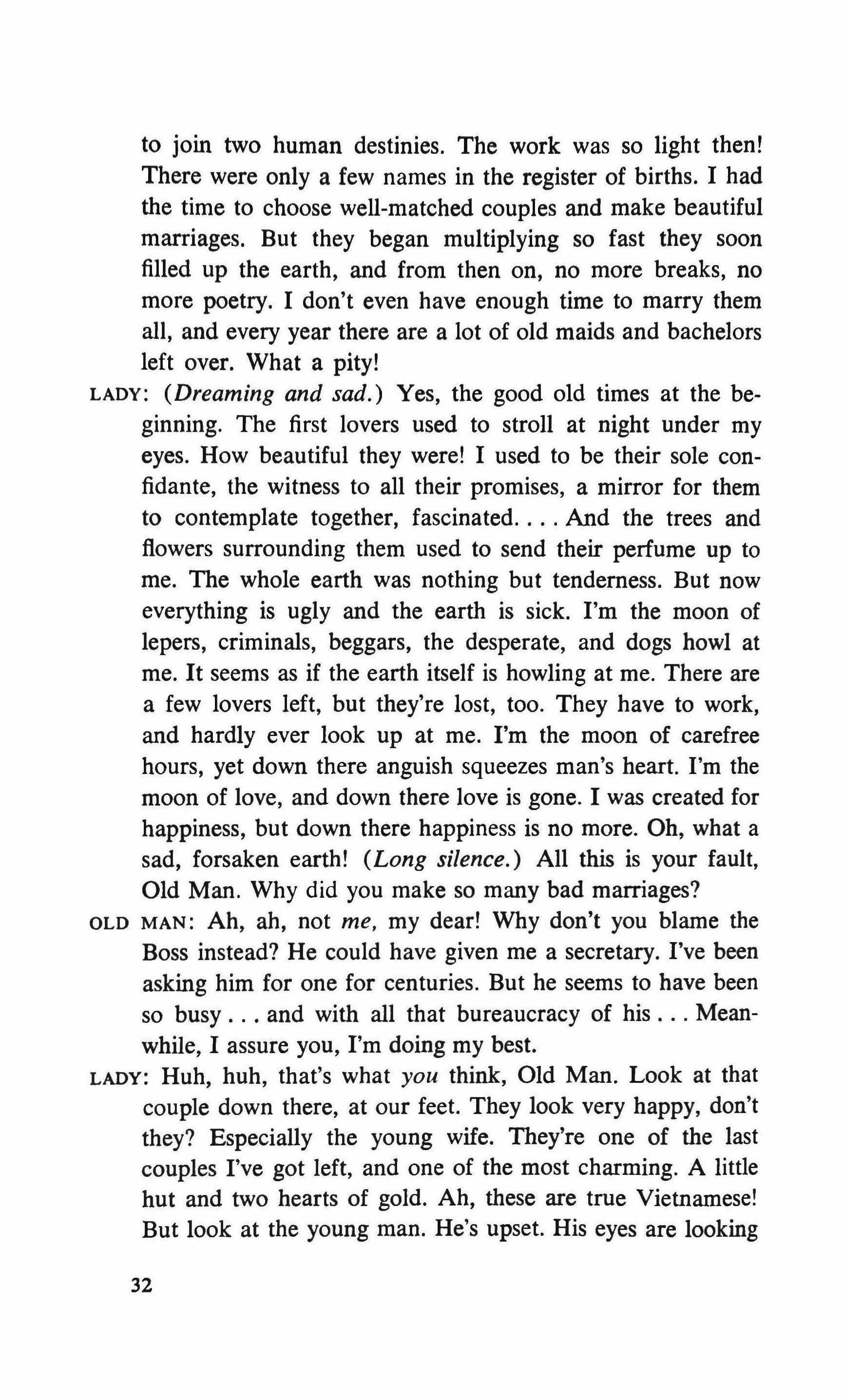
to join two human destinies. The work was so light then! There were only a few names in the register of births. I had the time to choose well-matched couples and make beautiful marriages. But they began multiplying so fast they soon filled Up the earth, and from then on, no more breaks, no more poetry. I don't even have enough time to marry them all, and every year there are a lot of old maids and bachelors left over. What a pity!
LADY: (Dreaming and sad.) Yes, the good old times at the beginning. The first lovers used to stroll at night under my eyes. How beautiful they were! I used to be their sole confidante, the witness to all their promises, a mirror for them to contemplate together, fascinated And the trees and flowers surrounding them used to send their perfume up to me. The whole earth was nothing but tenderness. But now everything is ugly and the earth is sick. I'm the moon of lepers, criminals, beggars, the desperate, and dogs howl at me. It seems as if the earth itself is howling at me. There are a few lovers left, but they're lost, too. They have to work, and hardly ever look up at me. I'm the moon of carefree hours, yet down there anguish squeezes man's heart. I'm the moon of love, and down there love is gone. I was created for happiness, but down there happiness is no more. Oh, what a sad, forsaken earth! (Long silence.) All this is your fault, Old Man. Why did you make so many bad marriages?
OLD MAN: Ah, ah, not me, my dear! Why don't you blame the Boss instead? He could have given me a secretary. I've been asking him for one for centuries. But he seems to have been so busy and with all that bureaucracy of his Meanwhile, I assure you, I'm doing my best.
LADY: Huh, huh, that's what you think, Old Man. Look at that couple down there, at our feet. They look very happy, don't they? Especially the young wife. They're one of the last couples I've got left, and one of the most charming. A little hut and two hearts of gold. Ah, these are true Vietnamese! But look at the young man. He's upset. His eyes are looking
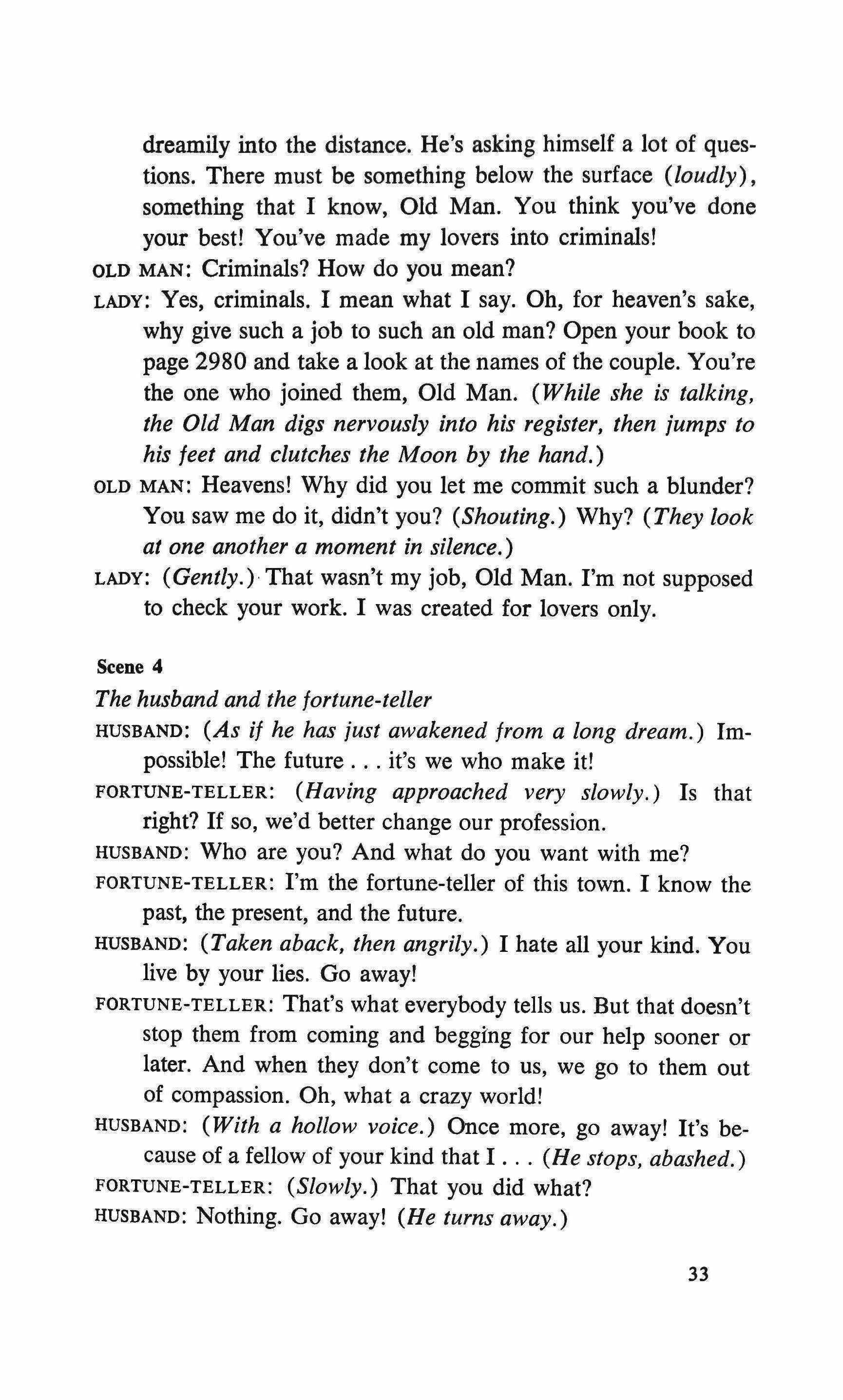
dreamily into the distance. He's asking himself a lot of questions. There must be something below the surface (loudly), something that I know, Old Man. You think you've done your best! You've made my lovers into criminals!
OLD MAN: Criminals? How do you mean?
LADY: Yes, criminals. I mean what I say. Oh, for heaven's sake, why give such a job to such an old man? Open your book to page 2980 and take a look at the names of the couple. You're the one who joined them, Old Man. (While she is talking, the Old Man digs nervously into his register, then jumps to his feet and clutches the Moon by the hand.)
OLD MAN: Heavens! Why did you let me commit such a blunder? You saw me do it, didn't you? (Shouting.) Why? (They look at one another a moment in silence.)
LADY: (Gently.) That wasn't my job, Old Man. I'm not supposed to check your work. I was created for lovers only.
The husband and the fortune-teller
HUSBAND: (As if he has just awakened from a long dream.) Impossible! The future it's we who make it!
FORTUNE-TELLER: (Having approached very slowly.) Is that right? If so, we'd better change our profession.
HUSBAND: Who are you? And what do you want with me?
FORTUNE-TELLER: I'm the fortune-teller of this town. I know the past, the present, and the future.
HUSBAND: (Taken aback, then angrily.) I hate all your kind. You live by your lies. Go away!
FORTUNE-TELLER: That's what everybody tells us. But that doesn't stop them from coming and begging for our help sooner or later. And when they don't come to us, we go to them out of compassion. Oh, what a crazy world!
HUSBAND: (With a hollow voice.) Once more, go away! It's because of a fellow of your kind that I (He stops, abashed.)
FORTUNE-TELLER: (Slowly.) That you did what?
HUSBAND: Nothing. Go away! (He turns away.)
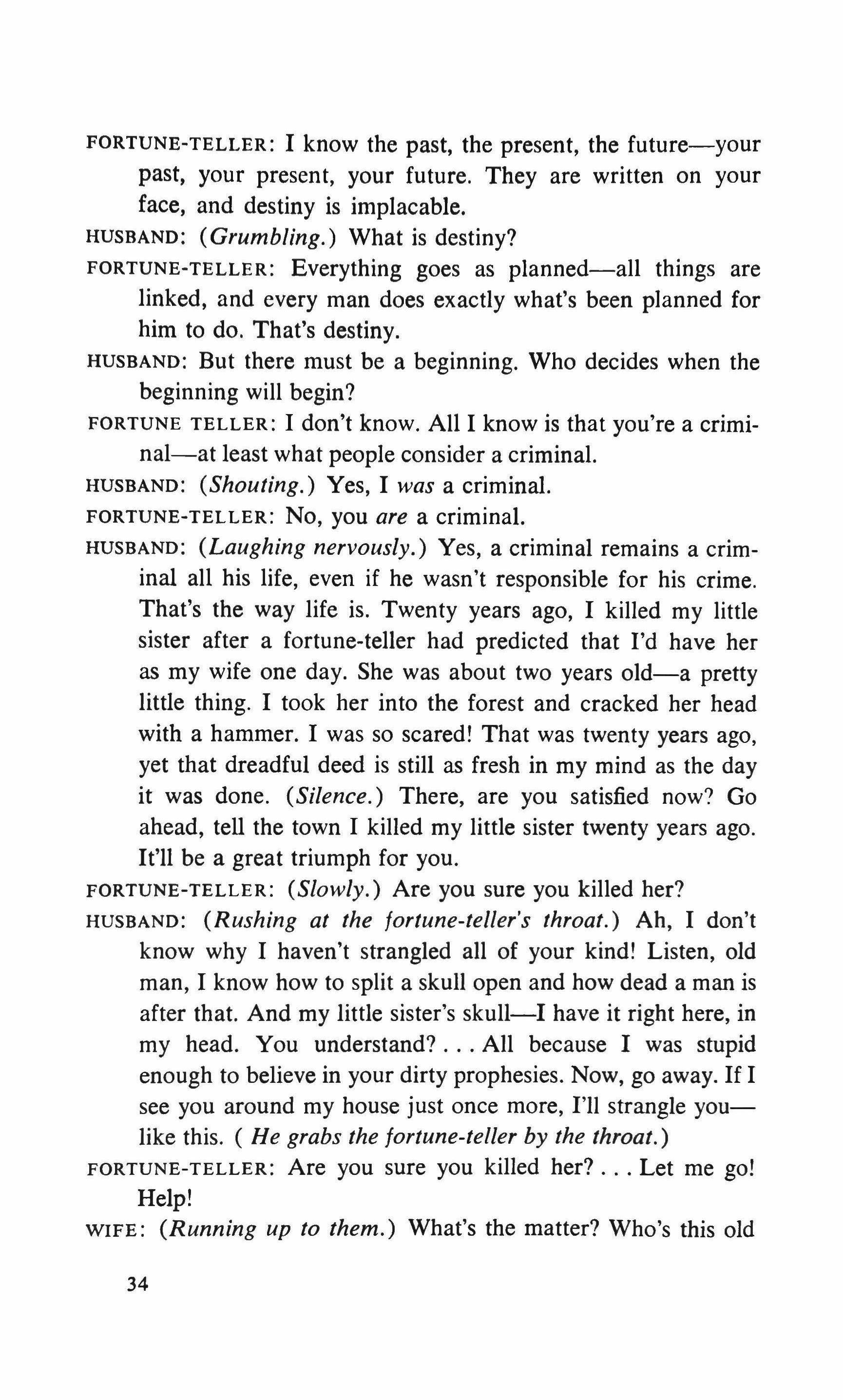
FORTUNE-TELLER: I know the past, the present, the future-your past, your present, your future. They are written on your face, and destiny is implacable.
HUSBAND: (Grumbling.) What is destiny?
FORTUNE-TELLER: Everything goes as planned-all things are linked, and every man does exactly what's been planned for him to do. That's destiny.
HUSBAND: But there must be a beginning. Who decides when the beginning will begin?
FORTUNE TELLER: I don't know. All I know is that you're a criminal-at least what people consider a criminal.
HUSBAND: (Shouting.) Yes, I was a criminal.
FORTUNE-TELLER: No, you are a criminal.
HUSBAND: (Laughing nervously.) Yes, a criminal remains a criminal all his life, even if he wasn't responsible for his crime. That's the way life is. Twenty years ago, I killed my little sister after a fortune-teller had predicted that I'd have her as my wife one day. She was about two years old-a pretty little thing. I took her into the forest and cracked her head with a hammer. I was so scared! That was twenty years ago, yet that dreadful deed is still as fresh in my mind as the day it was done. (Silence.) There, are you satisfied now? Go ahead, tell the town I killed my little sister twenty years ago. It'll be a great triumph for you.
FORTUNE-TELLER: (Slowly.) Are you sure you killed her?
HUSBAND: (Rushing at the fortune-teller's throat.) Ah, I don't know why I haven't strangled all of your kind! Listen, old man, I know how to split a skull open and how dead a man is after that. And my little sister's skull-I have it right here, in my head. You understand? All because I was stupid enough to believe in your dirty prophesies. Now, go away. If I see you around my house just once more, I'll strangle youlike this. ( He grabs the fortune-teller by the throat.)
FORTUNE-TELLER: Are you sure you killed her? Let me go! Help!
WIFE: (Running up to them.) What's the matter? Who's this old
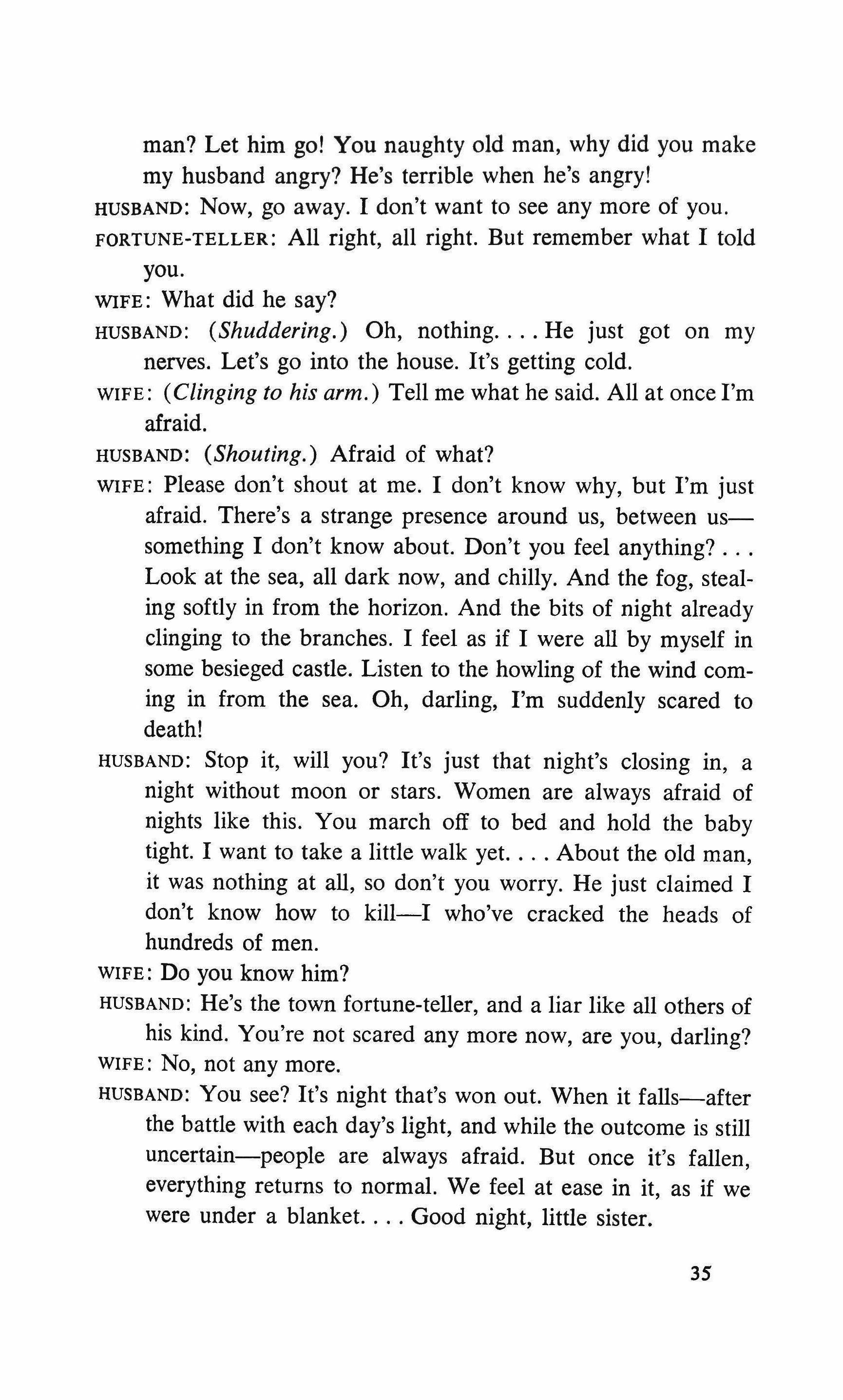
man? Let him go! You naughty old man, why did you make my husband angry? He's terrible when he's angry!
HUSBAND: Now, go away. I don't want to see any more of you.
FORTUNE-TELLER: All right, all right. But remember what I told you.
WIFE: What did he say?
HUSBAND: (Shuddering.) Oh, nothing He just got on my nerves. Let's go into the house. It's getting cold.
WIFE: (Clinging to his arm.) Tell me what he said. All at once I'm afraid.
HUSBAND: (Shouting.) Afraid of what?
WIFE: Please don't shout at me. I don't know why, but I'm just afraid. There's a strange presence around us, between ussomething I don't know about. Don't you feel anything? Look at the sea, all dark now, and chilly. And the fog, stealing softly in from the horizon. And the bits of night already clinging to the branches. I feel as if I were all by myself in some besieged castle. Listen to the howling of the wind coming in from the sea. Oh, darling, I'm suddenly scared to death!
HUSBAND: Stop it, will you? It's just that night's closing in, a night without moon or stars. Women are always afraid of nights like this. You march off to bed and hold the baby tight. I want to take a little walk yet About the. old man, it was nothing at all, so don't you worry. He just claimed I don't know how to kill-I who've cracked the heads of hundreds of men.
WIFE: Do you know him?
HUSBAND: He's the town fortune-teller, and a liar like all others of his kind. You're not scared any more now, are you, darling?
WIFE: No, not any more.
HUSBAND: You see? It's night that's won out. When it falls-after the battle with each day's light, and while the outcome is still uncertain-people are always afraid. But once it's fallen, everything returns to normal. We feel at ease in it, as if we were under a blanket. Good night, little sister.
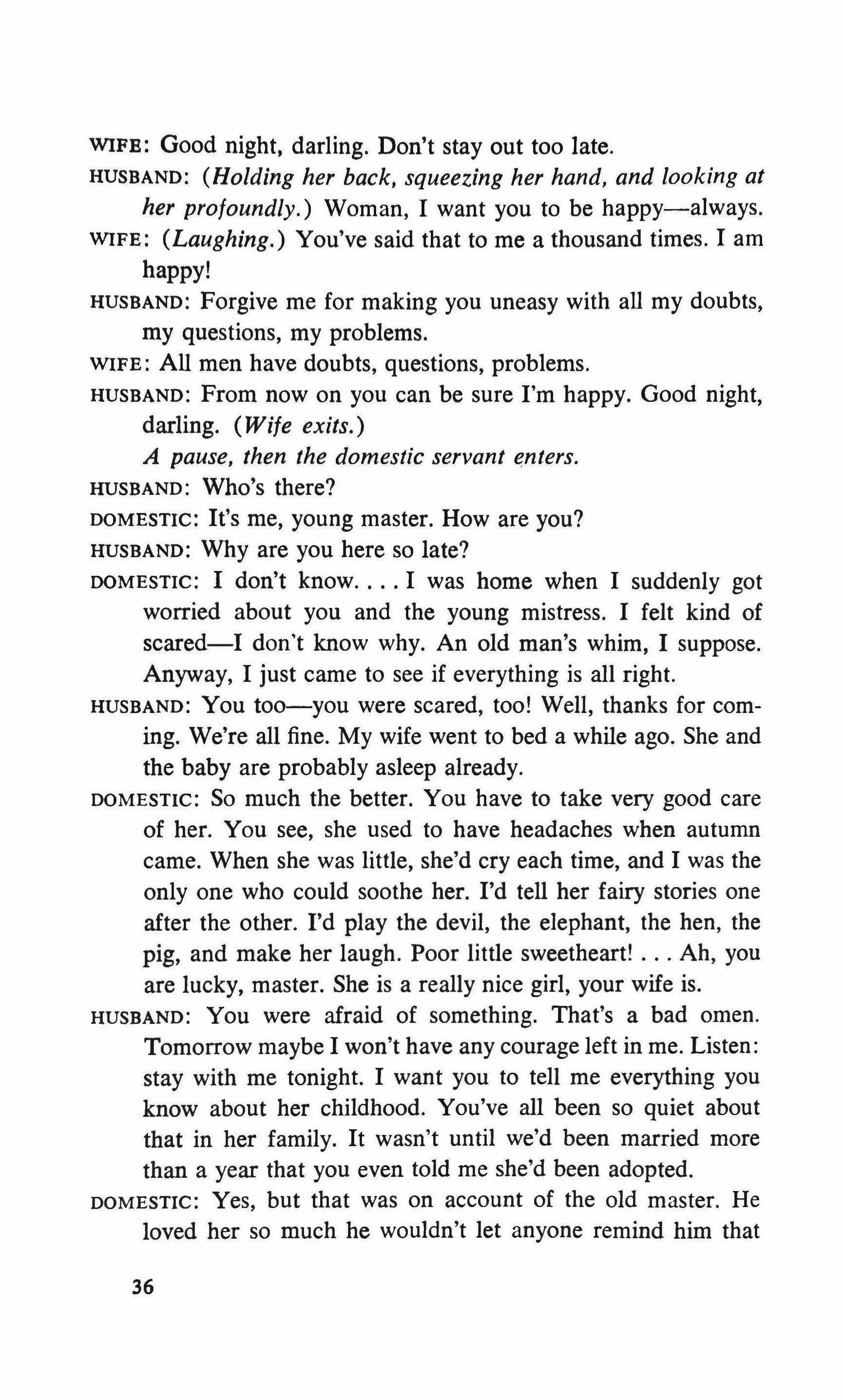
WIFE: Good night, darling. Don't stay out too late.
HUSBAND: (Holding her back. squeezing her hand. and looking at her profoundly.) Woman, I want you to be happy-always.
WIFE: (Laughing.) You've said that to me a thousand times. I am happy!
HUSBAND: Forgive me for making you uneasy with all my doubts, my questions, my problems.
WIFE: All men have doubts, questions, problems.
HUSBAND: From now on you can be sure I'm happy. Good night, darling. (Wife exits.)
A pause. then the domestic servant enters.
HUSBAND: Who's there?
DOMESTIC: It's me, young master. How are you?
HUSBAND: Why are you here so late?
DOMESTIC: I don't know I was home when I suddenly got worried about you and the young mistress. I felt kind of scared-I don't know why. An old man's whim, I suppose. Anyway, I just came to see if everything is all right.
HUSBAND: You too-you were scared, too! Well, thanks for coming. We're all fine. My wife went to bed a while ago. She and the baby are probably asleep already.
DOMESTIC: SO much the better. You have to take very good care of her. You see, she used to have headaches when autumn came. When she was little, she'd cry each time, and I was the only one who could soothe her. I'd tell her fairy stories one after the other. I'd play the devil, the elephant, the hen, the pig, and make her laugh. Poor little sweetheart! Ah, you are lucky, master. She is a really nice girl, your wife is.
HUSBAND: You were afraid of something. That's a bad omen. Tomorrow maybe I won't have any courage left in me. Listen: stay with me tonight. I want you to tell me everything you know about her childhood. You've all been so quiet about that in her family. It wasn't until we'd been married more than a year that you even told me she'd been adopted.
DOMESTIC: Yes, but that was on account of the old master. He loved her so much he wouldn't let anyone remind him that
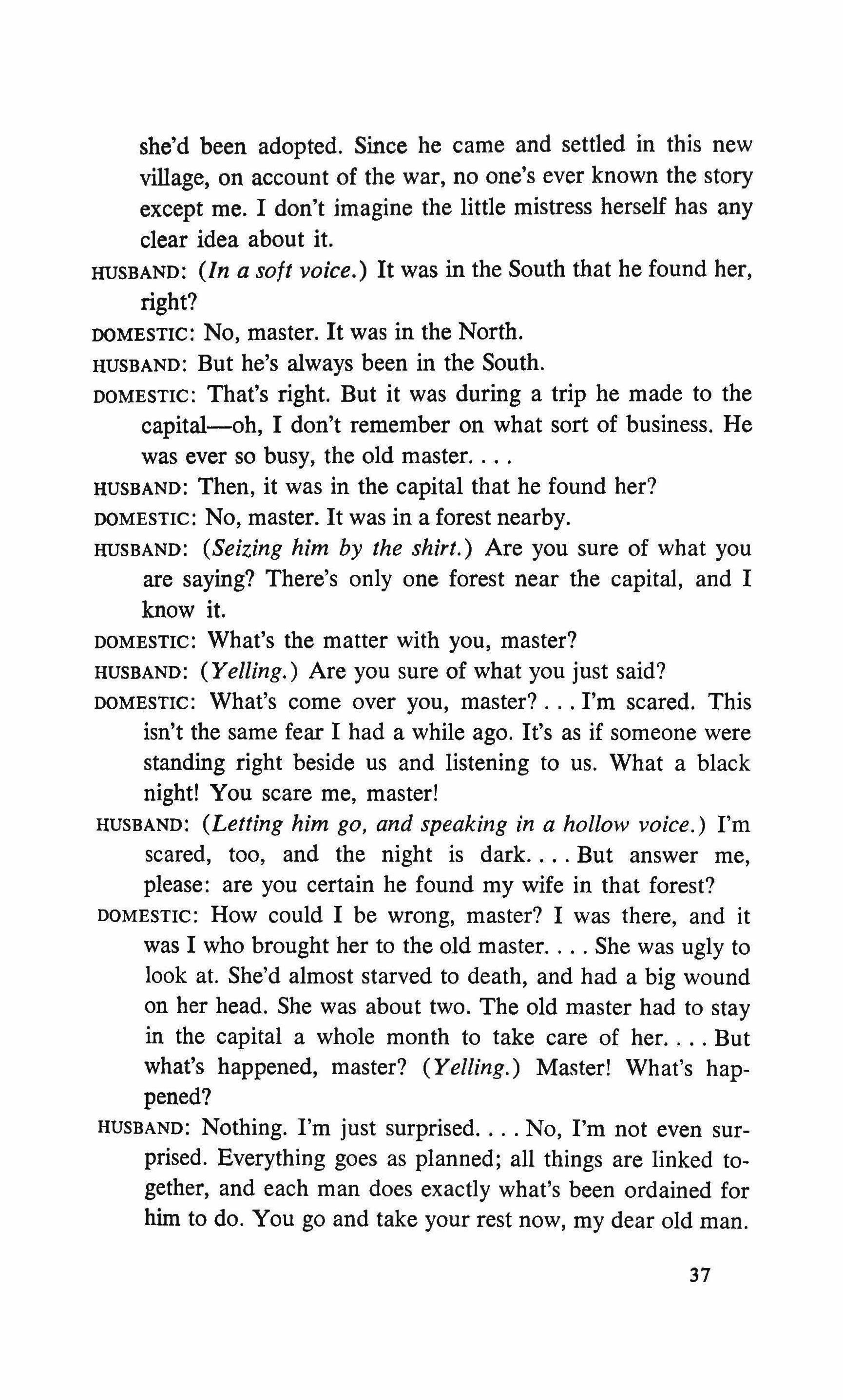
she'd been adopted. Since he came and settled in this new village, on account of the war, no one's ever known the story except me. I don't imagine the little mistress herself has any clear idea about it.
HUSBAND: (In a soft voice.) It was in the South that he found her, right?
DOMESTIC: No, master. It was in the North.
HUSBAND: But he's always been in the South.
DOMESTIC: That's right. But it was during a trip he made to the capital-oh, I don't remember on what sort of business. He was ever so busy, the old master
HUSBAND: Then, it was in the capital that he found her?
DOMESTIC: No, master. It was in a forest nearby.
HUSBAND: (Seizing him by the shirt.) Are you sure of what you are saying? There's only one forest near the capital, and I know it.
DOMESTIC: What's the matter with you, master?
HUSBAND: (Yelling.) Are you sure of what you just said?
DOMESTIC: What's come over you, master? I'm scared. This isn't the same fear I had a while ago. It's as if someone were standing right beside us and listening to us. What a black night! You scare me, master!
HUSBAND: (Letting him go, and speaking in a hollow voice.) I'm scared, too, and the night is dark But answer me, please: are you certain he found my wife in that forest?
DOMESTIC: How could I be wrong, master? I was there, and it was I who brought her to the old master She was ugly to look at. She'd almost starved to death, and had a big wound on her head. She was about two. The old master had to stay in the capital a whole month to take care of her But what's happened, master? (Yelling.) Master! What's happened?
HUSBAND: Nothing. I'm just surprised No, I'm not even surprised. Everything goes as planned; all things are linked together, and each man does exactly what's been ordained for him to do. You go and take your rest now, my dear old man.
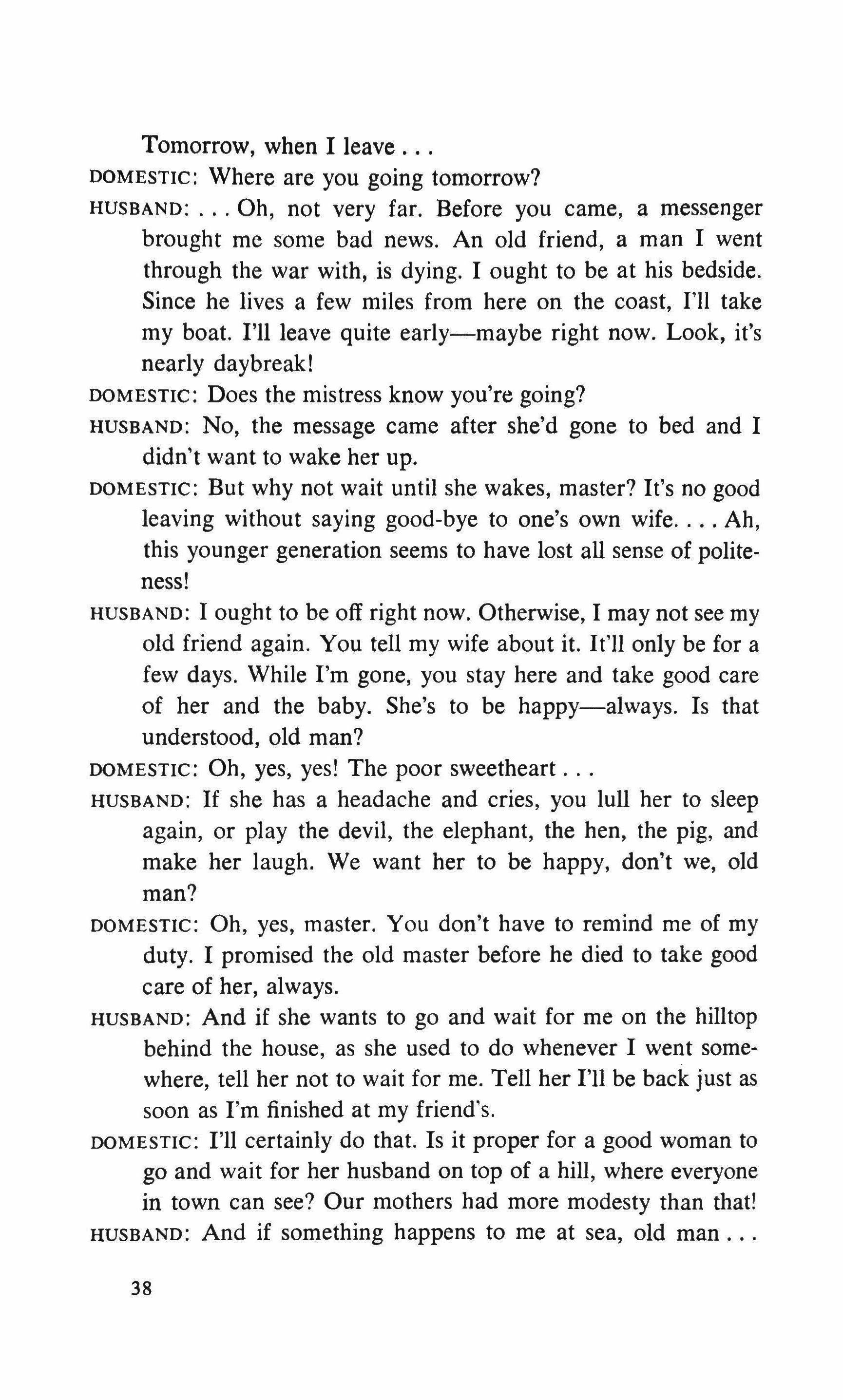
DOMESTIC: Where are you going tomorrow?
HUSBAND: Oh, not very far. Before you came, a messenger brought me some bad news. An old friend, a man I went through the war with, is dying. I ought to be at his bedside. Since he lives a few miles from here on the coast, I'll take my boat. I'll leave quite early-maybe right now. Look, it's nearly daybreak!
DOMESTIC: Does the mistress know you're going?
HUSBAND: No, the message came after she'd gone to bed and I didn't want to wake her up.
DOMESTIC: But why not wait until she wakes, master? It's no good leaving without saying good-bye to one's own wife Ah, this younger generation seems to have lost all sense of politeness!
HUSBAND: I ought to be off right now. Otherwise, I may not see my old friend again. You tell my wife about it. It'll only be for a few days. While I'm gone, you stay here and take good care of her and the baby. She's to be happy-always. Is that understood, old man?
DOMESTIC: Oh, yes, yes! The poor sweetheart
HUSBAND: If she has a headache and cries, you lull her to sleep again, or play the devil, the elephant, the hen, the pig, and make her laugh. We want her to be happy, don't we, old man?
DOMESTIC: Oh, yes, master. You don't have to remind me of my duty. I promised the old master before he died to take good care of her, always.
HUSBAND: And if she wants to go and wait for me on the hilltop behind the house, as she used to do whenever I went somewhere, tell her not to wait for me. Tell her I'll be back just as soon as I'm finished at my friend's.
DOMESTIC: I'll certainly do that. Is it proper for a good woman to go and wait for her husband on top of a hill, where everyone in town can see? Our mothers had more modesty than that!
HUSBAND: And if something happens to me at sea, old man
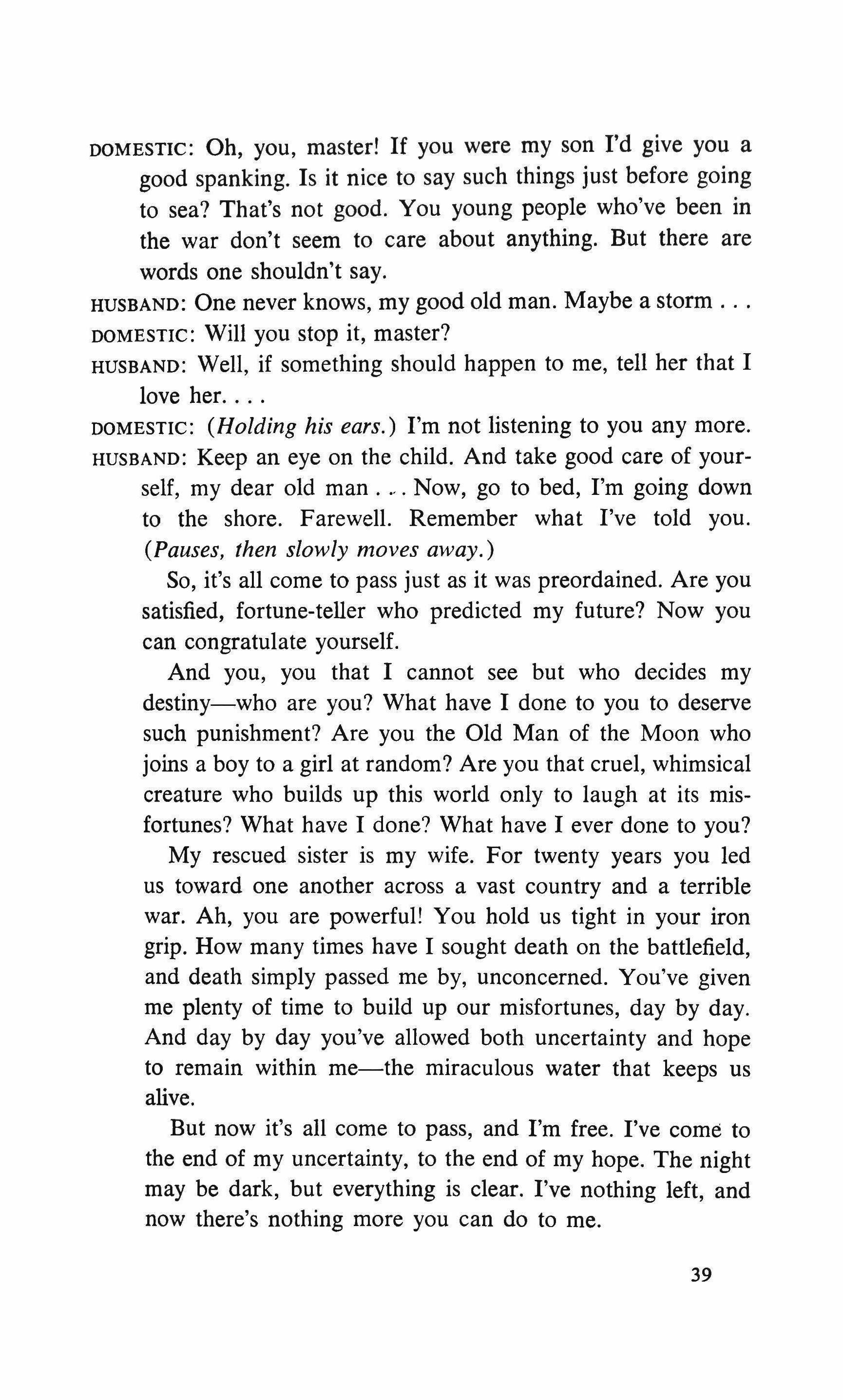
DOMESTIC: Oh, you, master! If you were my son I'd give you a good spanking. Is it nice to say such things just before going to sea? That's not good. You young people who've been in the war don't seem to care about anything. But there are words one shouldn't say.
HUSBAND: One never knows, my good old man. Maybe a storm
DOMESTIC: Will you stop it, master?
HUSBAND: Well, if something should happen to me, tell her that I love her
DOMESTIC: (Holding his ears.) I'm not listening to you any more.
HUSBAND: Keep an eye on the child. And take good care of yourself, my dear old man. Now, go to bed, I'm going down to the shore. Farewell. Remember what I've told you. (Pauses, then slowly moves away.)
So, it's all come to pass just as it was preordained. Are you satisfied, fortune-teller who predicted my future? Now you can congratulate yourself.
And you, you that I cannot see but who decides my destiny-who are you? What have I done to you to deserve such punishment? Are you the Old Man of the Moon who joins a boy to a girl at random? Are you that cruel, whimsical creature who builds up this world only to laugh at its misfortunes? What have I done? What have I ever done to you? My rescued sister is my wife. For twenty years you led us toward one another across a vast country and a terrible war. Ah, you are powerful! You hold us tight in your iron grip. How many times have I sought death on the battlefield, and death simply passed me by, unconcerned. You've given me plenty of time to build up our misfortunes, day by day. And day by day you've allowed both uncertainty and hope to remain within me-the miraculous water that keeps us alive.
But now it's all come to pass, and I'm free. I've come to the end of my uncertainty, to the end of my hope. The night may be dark, but everything is clear. I've nothing left, and now there's nothing more you can do to me.
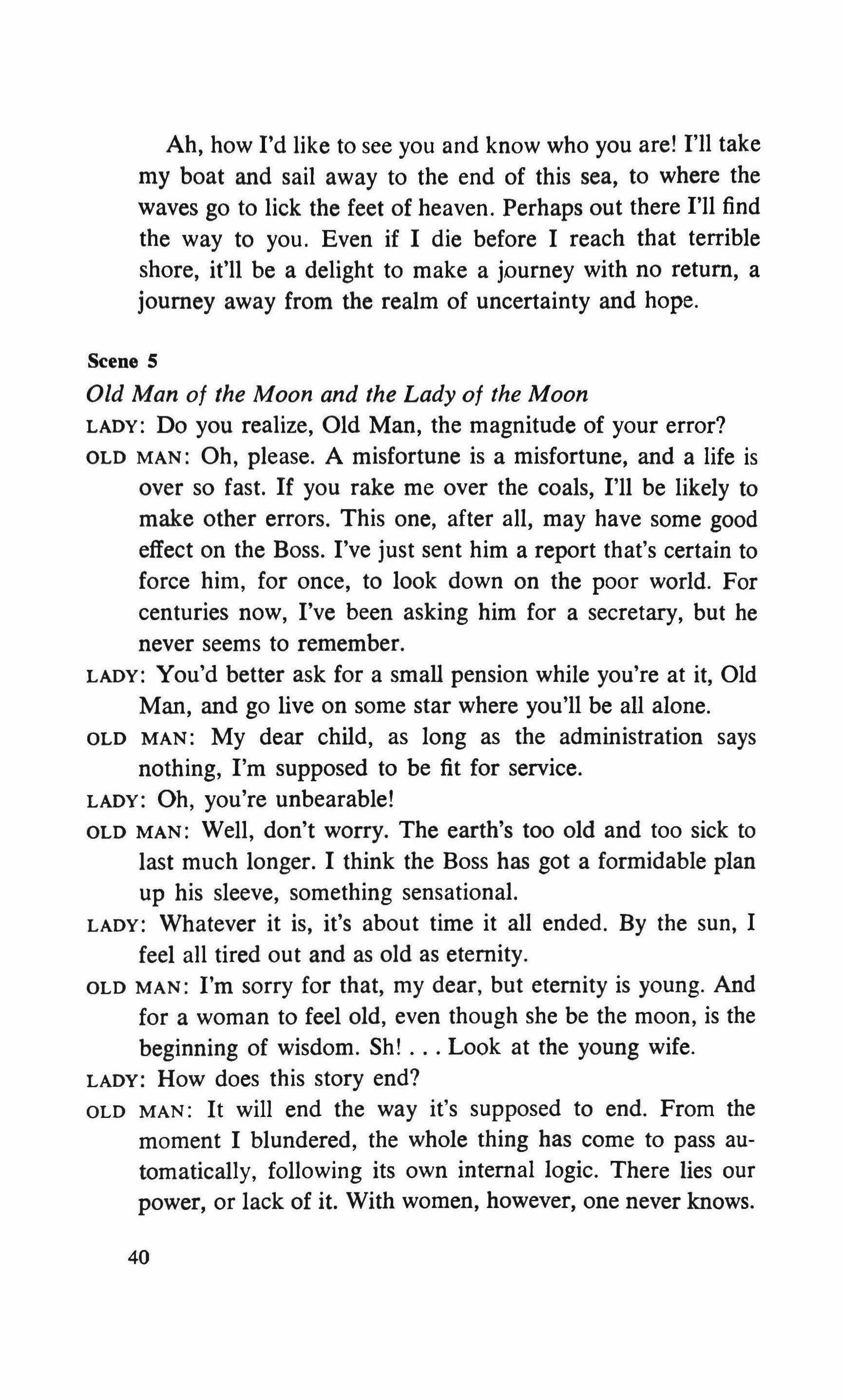
Ah, how I'd like to see you and know who you are! I'll take my boat and sail away to the end of this sea, to where the waves go to lick the feet of heaven. Perhaps out there I'll find the way to you. Even if I die before I reach that terrible shore, it'll be a delight to make a journey with no return, a journey away from the realm of uncertainty and hope.
Old Man 0/ the Moon and the Lady 0/ the Moon
LADY: Do you realize, Old Man, the magnitude of your error?
OLD MAN: Oh, please. A misfortune is a misfortune, and a life is over so fast. If you rake me over the coals, I'll be likely to make other errors. This one, after all, may have some good effect on the Boss. I've just sent him a report that's certain to force him, for once, to look down on the poor world. For centuries now, I've been asking him for a secretary, but he never seems to remember.
LADY: You'd better ask for a small pension while you're at it, Old Man, and go live on some star where you'll be all alone.
OLD MAN: My dear child, as long as the administration says nothing, I'm supposed to be fit for service.
LADY: Oh, you're unbearable!
OLD MAN: Well, don't worry. The earth's too old and too sick to last much longer. I think the Boss has got a formidable plan up his sleeve, something sensational.
LADY: Whatever it is, it's about time it all ended. By the sun, I feel all tired out and as old as eternity.
OLD MAN: I'm sorry for that, my dear, but eternity is young. And for a woman to feel old, even though she be the moon, is the beginning of wisdom. Sh! Look at the young wife.
LADY: How does this story end?
OLD MAN: It will end the way it's supposed to end. From the moment I blundered, the whole thing has come to pass automatically, following its own internal logic. There lies our power, or lack of it. With women, however, one never knows.
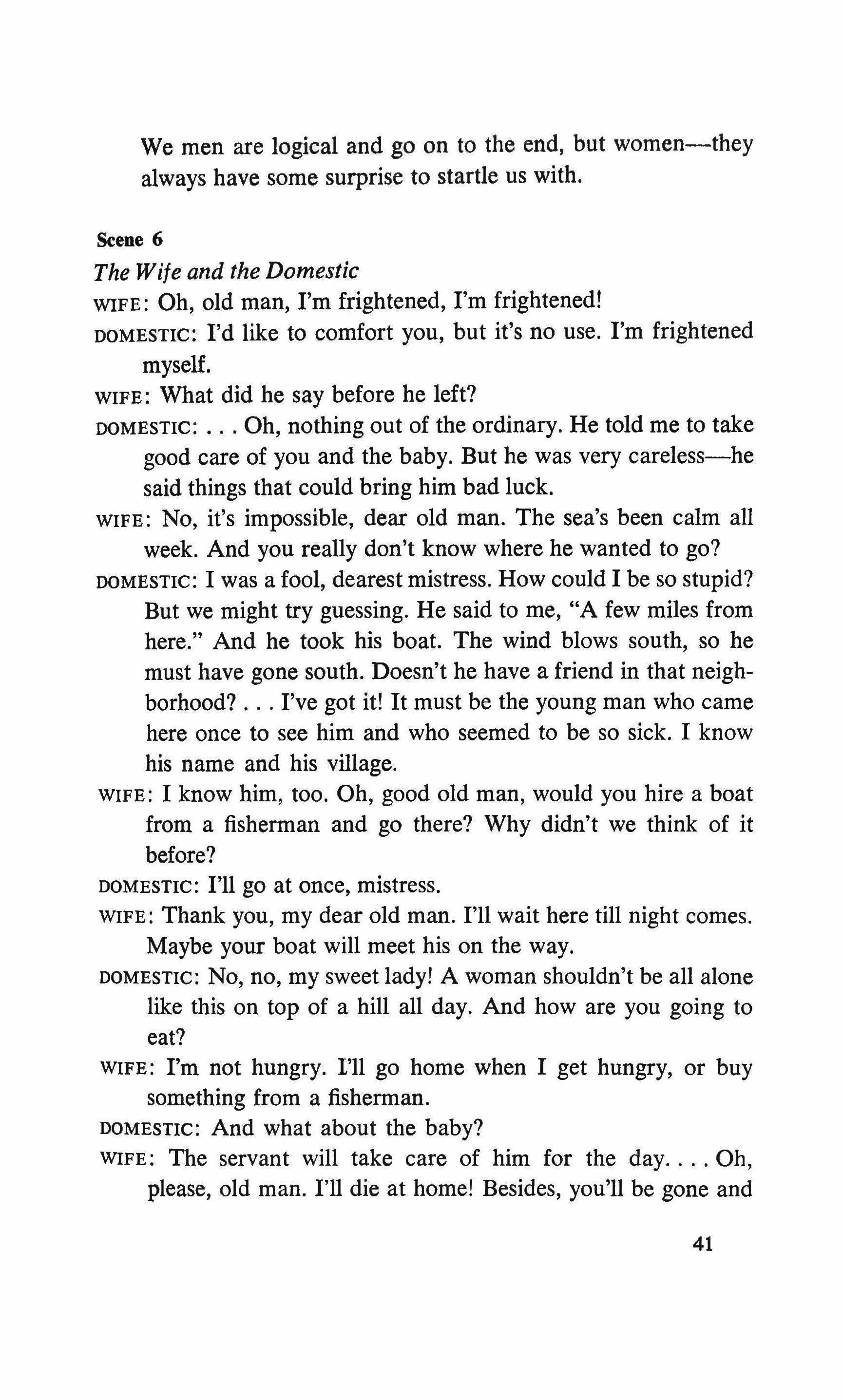
We men are logical and go on to the end, but women-they always have some surprise to startle us with.
WIFE: Oh, old man, I'm frightened, I'm frightened!
DOMESTIC: I'd like to comfort you, but it's no use. I'm frightened myself.
WIFE: What did he say before he left?
DOMESTIC: •.. Oh, nothing out of the ordinary. He told me to take good care of you and the baby. But he was very careless-he said things that could bring him bad luck.
WIFE: No, it's impossible, dear old man. The sea's been calm all week. And you really don't know where he wanted to go?
DOMESTIC: I was a fool, dearest mistress. How could I be so stupid? But we might try guessing. He said to me, "A few miles from here." And he took his boat. The wind blows south, so he must have gone south. Doesn't he have a friend in that neighborhood? I've got it! It must be the young man who came here once to see him and who seemed to be so sick. I know his name and his village.
WIFE: I know him, too. Oh, good old man, would you hire a boat from a fisherman and go there? Why didn't we think of it before?
DOMESTIC: I'll go at once, mistress.
WIFE: Thank you, my dear old man. I'll wait here till night comes. Maybe your boat will meet his on the way.
DOMESTIC: No, no, my sweet lady! A woman shouldn't be all alone like this on top of a hill all day. And how are you going to eat?
WIFE: I'm not hungry. I'll go home when I get hungry, or buy something from a fisherman.
DOMESTIC: And what about the baby?
WIFE: The servant will take care of him for the day Oh, please, old man. I'll die at home! Besides, you'll be gone and
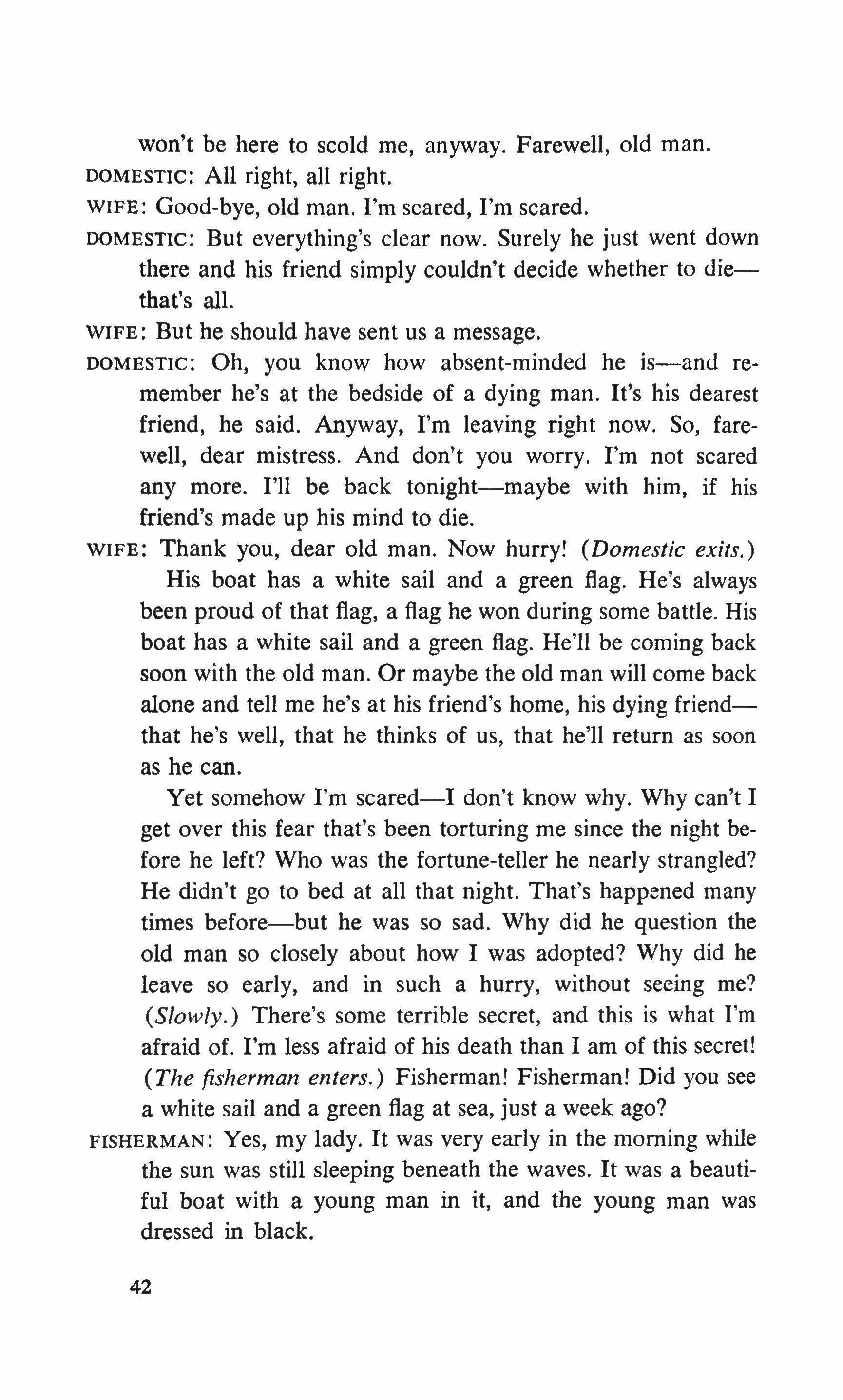
won't be here to scold me, anyway. Farewell, old man.
DOMESTIC: All right, all right.
WIFE: Good-bye, old man. I'm scared, I'm scared.
DOMESTIC: But everything's clear now. Surely he just went down there and his friend simply couldn't decide whether to diethat's all.
WIFE: But he should have sent us a message.
DOMESTIC: Oh, you know how absent-minded he is-and remember he's at the bedside of a dying man. It's his dearest friend, he said. Anyway, I'm leaving right now. So, farewell, dear mistress. And don't you worry. I'm not scared any more. I'll be back tonight-maybe with him, if his friend's made up his mind to die.
WIFE: Thank you, dear old man. Now hurry! (Domestic exits.)
His boat has a white sail and a green flag. He's always been proud of that flag, a flag he won during some battle. His boat has a white sail and a green flag. He'll be coming back soon with the old man. Or maybe the old man will come back alone and tell me he's at his friend's home, his dying friendthat he's well, that he thinks of us, that he'll return as soon as he can.
Yet somehow I'm scared-I don't know why. Why can't I get over this fear that's been torturing me since the night before he left? Who was the fortune-teller he nearly strangled? He didn't go to bed at all that night. That's happened many times before-but he was so sad. Why did he question the old man so closely about how I was adopted? Why did he leave so early, and in such a hurry, without seeing me?
(Slowly.) There's some terrible secret, and this is what I'm afraid of. I'm less afraid of his death than I am of this secret! (The fisherman enters.) Fisherman! Fisherman! Did you see a white sail and a green flag at sea, just a week ago?
FISHERMAN: Yes, my lady. It was very early in the morning while the sun was still sleeping beneath the waves. It was a beautiful boat with a young man in it, and the young man was dressed in black.
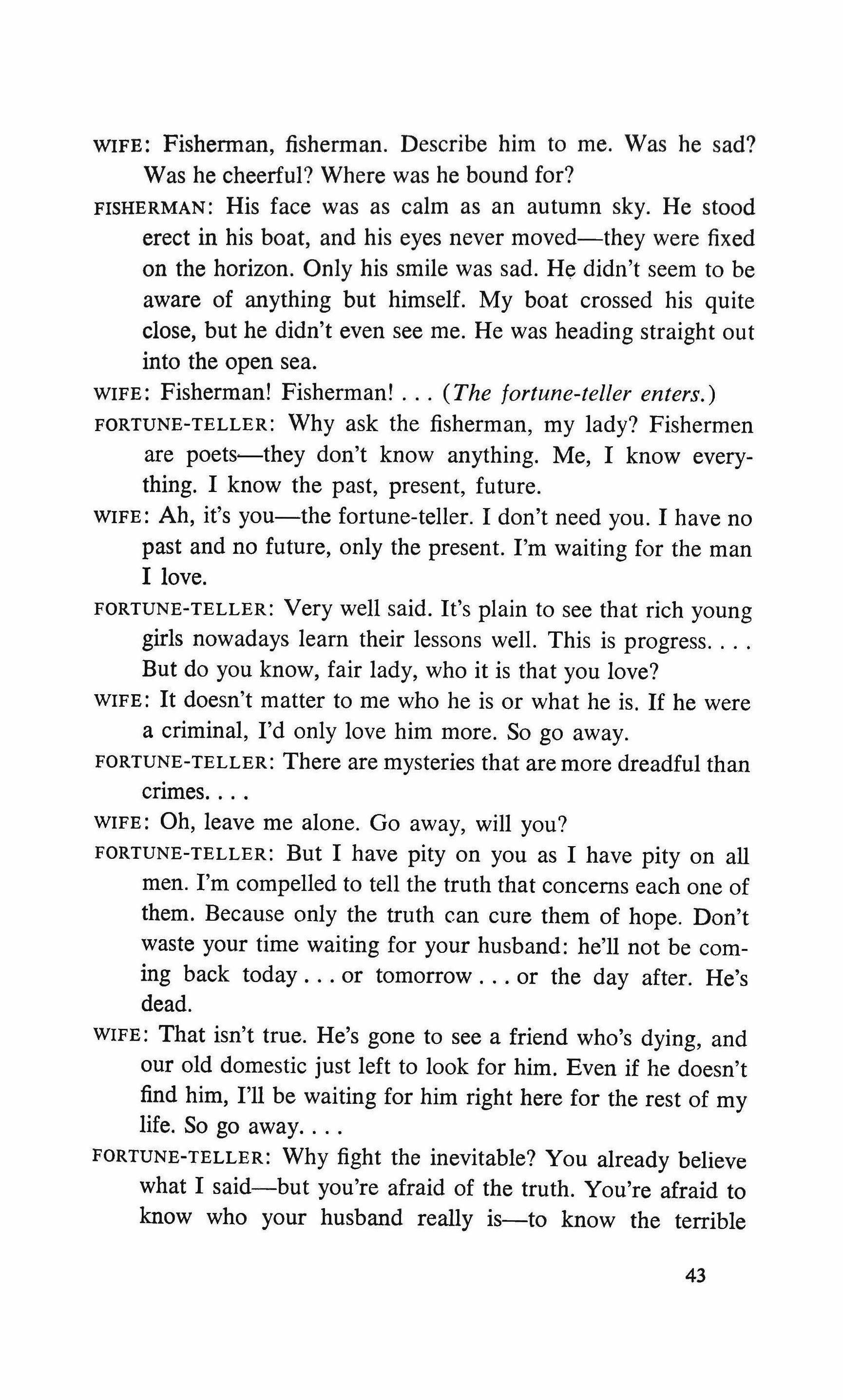
WIFE: Fisherman, fisherman. Describe him to me. Was he sad? Was he cheerful? Where was he bound for?
FISHERMAN: His face was as calm as an autumn sky. He stood erect in his boat, and his eyes never moved-they were fixed on the horizon. Only his smile was sad. He didn't seem to be aware of anything but himself. My boat crossed his quite close, but he didn't even see me. He was heading straight out into the open sea.
WIFE: Fisherman! Fisherman! (The fortune-teller enters.)
FORTUNE-TELLER: Why ask the fisherman, my lady? Fishermen are poets-they don't know anything. Me, I know everything. I know the past, present, future.
WIFE: Ah, it's you-the fortune-teller. I don't need you. I have no past and no future, only the present. I'm waiting for the man I love.
FORTUNE-TELLER: Very well said. It's plain to see that rich young girls nowadays learn their lessons well. This is progress But do you know, fair lady, who it is that you love?
WIFE: It doesn't matter to me who he is or what he is. If he were a criminal, I'd only love him more. So go away.
FORTUNE-TELLER: There are mysteries that are more dreadful than crimes
WIFE: Oh, leave me alone. Go away, will you?
FORTUNE-TELLER: But I have pity on you as I have pity on all men. I'm compelled to tell the truth that concerns each one of them. Because only the truth can cure them of hope. Don't waste your time waiting for your husband: he'll not be coming back today or tomorrow or the day after. He's dead.
WIFE: That isn't true. He's gone to see a friend who's dying, and our old domestic just left to look for him. Even if he doesn't find him, I'll be waiting for him right here for the rest of my life. So go away
FORTUNE-TELLER: Why fight the inevitable? You already believe what I said-but you're afraid of the truth. You're afraid to know who your husband really is-to know the terrible
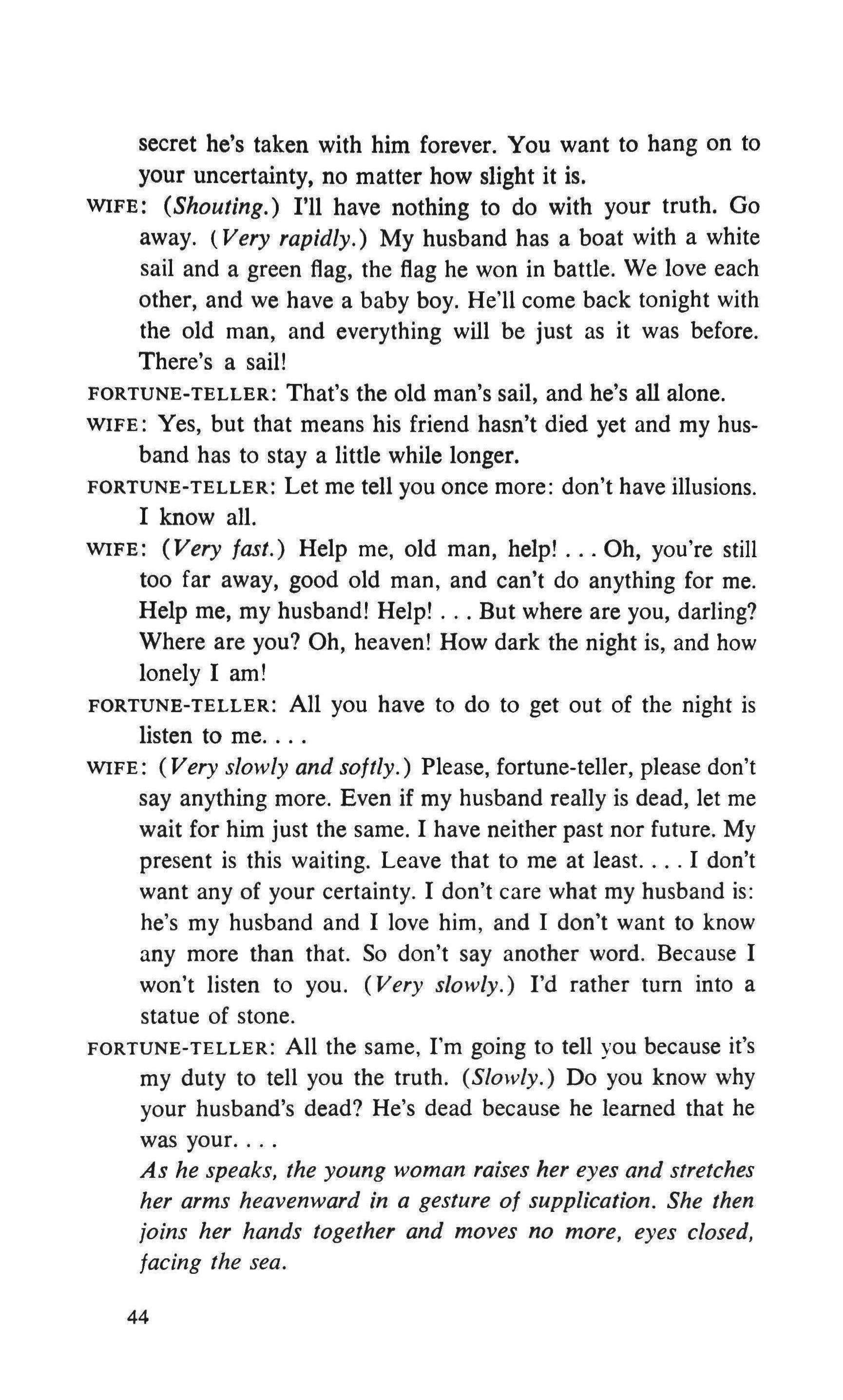
secret he's taken with him forever. You want to hang on to your uncertainty, no matter how slight it is.
WIFE: (Shouting.) I'll have nothing to do with your truth. Go away. (Very rapidly.) My husband has a boat with a white sail and a green flag, the flag he won in battle. We love each other, and we have a baby boy. He'll come back tonight with the old man, and everything will be just as it was before. There's a sail!
FORTUNE-TELLER: That's the old man's sail, and he's all alone.
WIFE: Yes, but that means his friend hasn't died yet and my husband has to stay a little while longer.
FORTUNE-TELLER: Let me tell you once more: don't have illusions. I know all.
WIFE: (Very fast.) Help me, old man, help! Oh, you're still too far away, good old man, and can't do anything for me. Help me, my husband! Help! But where are you, darling? Where are you? Oh, heaven! How dark the night is, and how lonely I am!
FORTUNE-TELLER: All you have to do to get out of the night is listen to me.
WIFE: (Very slowly and softly.) Please, fortune-teller, please don't say anything more. Even if my husband really is dead, let me wait for him just the same. I have neither past nor future. My present is this waiting. Leave that to me at least. I don't want any of your certainty. I don't care what my husband is: he's my husband and I love him, and I don't want to know any more than that. So don't say another word. Because I won't listen to you. (Very slowly.) I'd rather turn into a statue of stone.
FORTUNE-TELLER: All the same, I'm going to tell you because it's my duty to tell you the truth. (Slowly.) Do you know why your husband's dead? He's dead because he learned that he was your. As he speaks, the young woman raises her eyes and stretches her arms heavenward in a gesture of supplication. She then joins her hands together and moves no more, eyes closed, facing the sea.
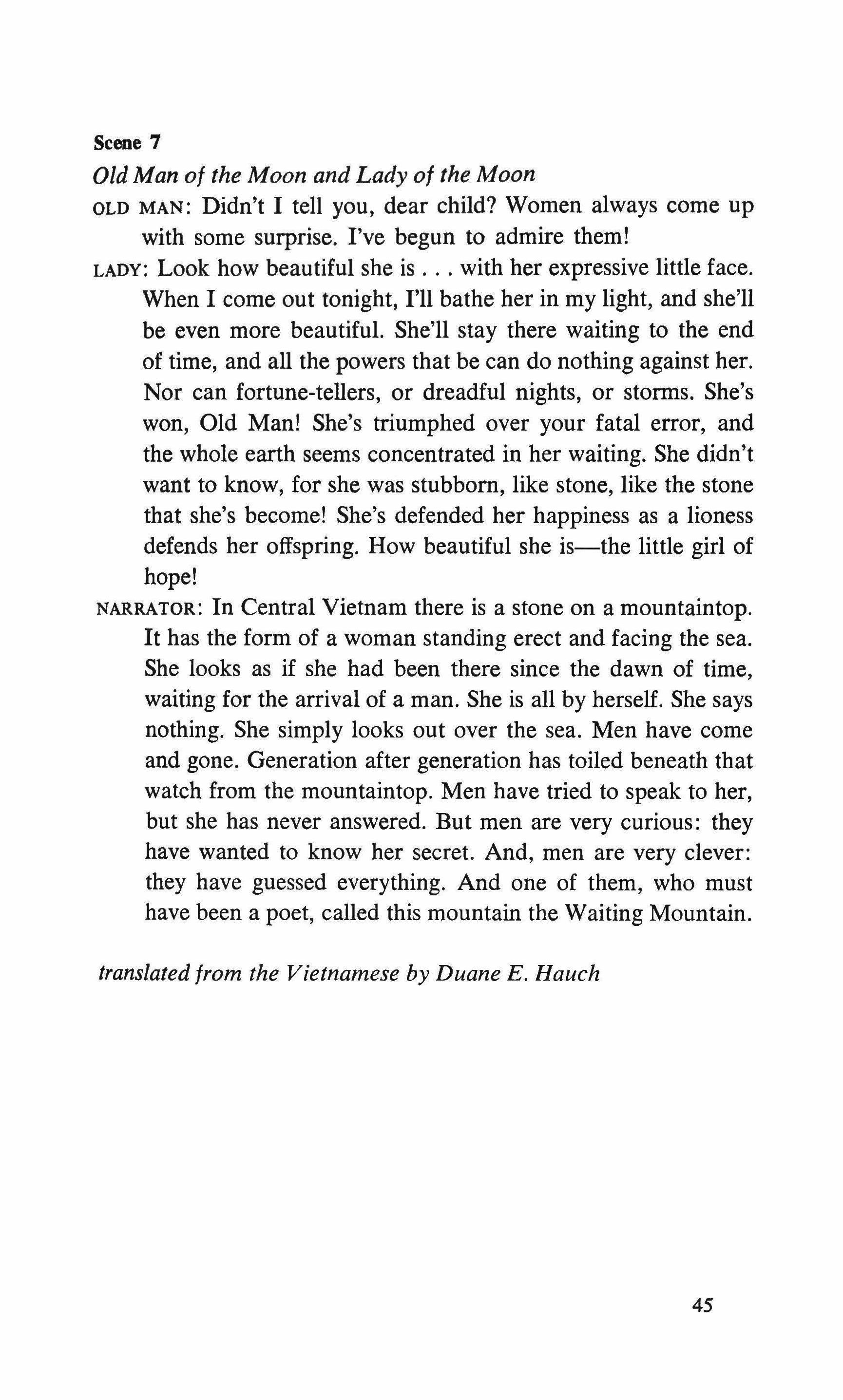
Scene 7
Old Man of the Moon and Lady of the Moon
OLD MAN: Didn't I tell you, dear child? Women always come up with some surprise. I've begun to admire them!
LADY: Look how beautiful she is with her expressive little face. When I come out tonight, I'll bathe her in my light, and she'll be even more beautiful. She'll stay there waiting to the end of time, and all the powers that be can do nothing against her. Nor can fortune-tellers, or dreadful nights, or storms. She's won, Old Man! She's triumphed over your fatal error, and the whole earth seems concentrated in her waiting. She didn't want to know, for she was stubborn, like stone, like the stone that she's become! She's defended her happiness as a lioness defends her offspring. How beautiful she is-the little girl of hope!
NARRATOR: In Central Vietnam there is a stone on a mountaintop. It has the form of a woman standing erect and facing the sea. She looks as if she had been there since the dawn of time, waiting for the arrival of a man. She is all by herself. She says nothing. She simply looks out over the sea. Men have come and gone. Generation after generation has toiled beneath that watch from the mountaintop. Men have tried to speak to her, but she has never answered. But men are very curious: they have wanted to know her secret. And, men are very clever: they have guessed everything. And one of them, who must have been a poet, called this mountain the Waiting Mountain.
translated from the Vietnamese by Duane
E. Hauch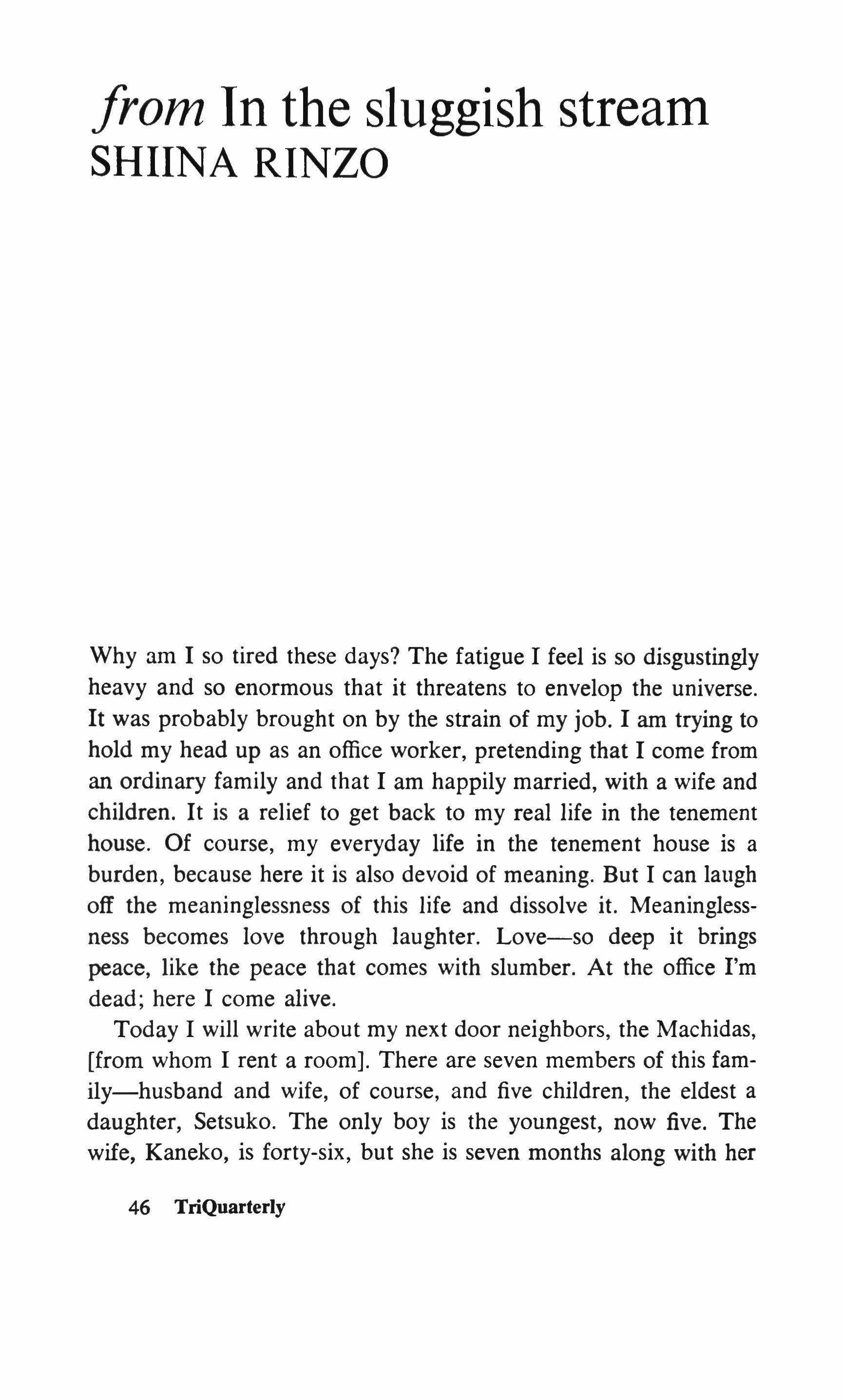
Why am I so tired these days? The fatigue I feel is so disgustingly heavy and so enormous that it threatens to envelop the universe. It was probably brought on by the strain of my job. I am trying to hold my head up as an office worker, pretending that I come from an ordinary family and that I am happily married, with a wife and children. It is a relief to get back to my real life in the tenement house. Of course, my everyday life in the tenement house is a burden, because here it is also devoid of meaning. But I can laugh off the meaninglessness of this life and dissolve it. Meaninglessness becomes love through laughter. Love-so deep it brings peace, like the peace that comes with slumber. At the office I'm dead; here I come alive.
Today I will write about my next door neighbors, the Machidas, [from whom I rent a room]. There are seven members of this family-husband and wife, of course, and five children, the eldest a daughter, Setsuko. The only boy is the youngest, now five. The wife, Kaneko, is forty-six, but she is seven months along with her
46 TriQuarterly
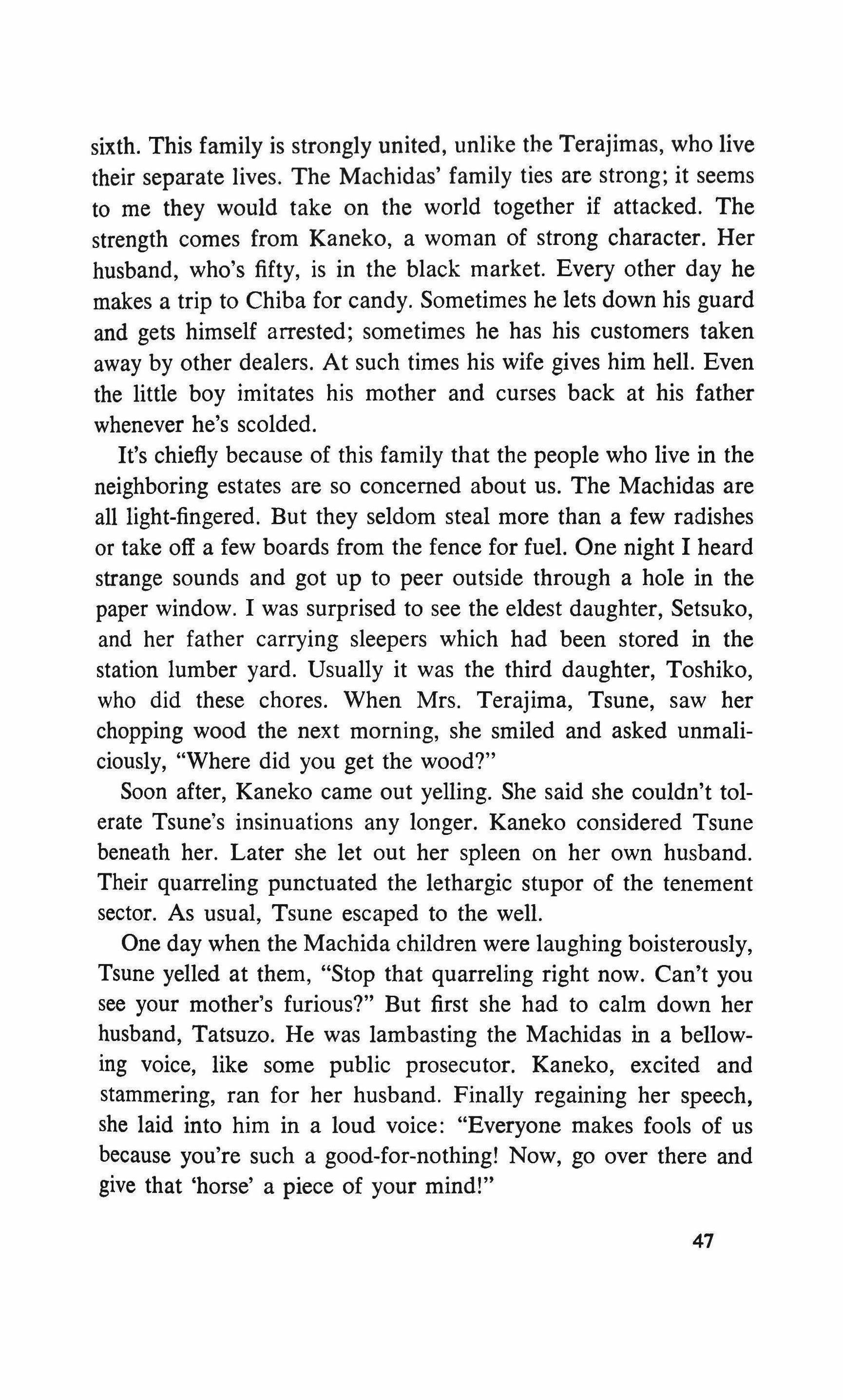
sixth. This family is strongly united, unlike the Terajimas, who live their separate lives. The Machidas' family ties are strong; it seems to me they would take on the world together if attacked. The strength comes from Kaneko, a woman of strong character. Her husband, who's fifty, is in the black market. Every other day he makes a trip to Chiba for candy. Sometimes he lets down his guard and gets himself arrested; sometimes he has his customers taken away by other dealers. At such times his wife gives him hell. Even the little boy imitates his mother and curses back at his father whenever he's scolded.
It's chiefly because of this family that the people who live in the neighboring estates are so concerned about us. The Machidas are all light-fingered. But they seldom steal more than a few radishes or take off a few boards from the fence for fuel. One night I heard strange sounds and got up to peer outside through a hole in the paper window. I was surprised to see the eldest daughter, Setsuko, and her father carrying sleepers which had been stored in the station lumber yard. Usually it was the third daughter, Toshiko, who did these chores. When Mrs. Terajima, Tsune, saw her chopping wood the next morning, she smiled and asked unmaliciously, "Where did you get the wood?"
Soon after, Kaneko came out yelling. She said she couldn't tolerate Tsune's insinuations any longer. Kaneko considered Tsune beneath her. Later she let out her spleen on her own husband. Their quarreling punctuated the lethargic stupor of the tenement sector. As usual, Tsune escaped to the well.
One day when the Machida children were laughing boisterously, Tsune yelled at them, "Stop that quarreling right now. Can't you see your mother's furious?" But first she had to calm down her husband, Tatsuzo. He was lambasting the Machidas in a bellowing voice, like some public prosecutor. Kaneko, excited and stammering, ran for her husband. Finally regaining her speech, she laid into him in a loud voice: "Everyone makes fools of us because you're such a good-for-nothing! Now, go over there and give that 'horse' a piece of your mind!"
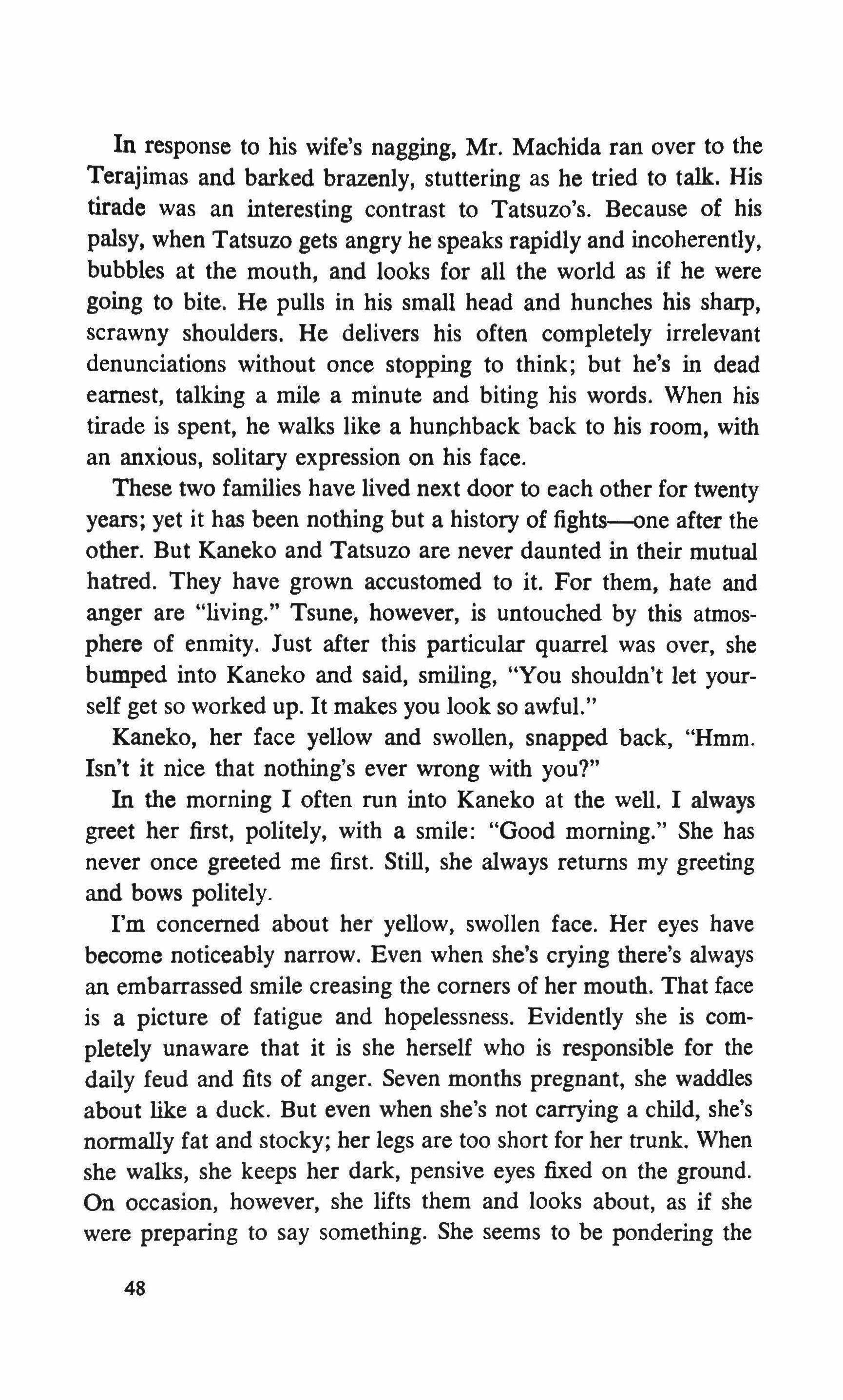
In response to his wife's nagging, Mr. Machida ran over to the Terajimas and barked brazenly, stuttering as he tried to talk. His tirade was an interesting contrast to Tatsuzo's. Because of his palsy, when Tatsuzo gets angry he speaks rapidly and incoherently, bubbles at the mouth, and looks for all the world as if he were going to bite. He pulls in his small head and hunches his sharp, scrawny shoulders. He delivers his often completely irrelevant denunciations without once stopping to think; but he's in dead earnest, talking a mile a minute and biting his words. When his tirade is spent, he walks like a hunchback back to his room, with an anxious, solitary expression on his face.
These two families have lived next door to each other for twenty years; yet it has been nothing but a history of fights--one after the other. But Kaneko and Tatsuzo are never daunted in their mutual hatred. They have grown accustomed to it. For them, hate and anger are "living." Tsune, however, is untouched by this atmosphere of enmity. Just after this particular quarrel was over, she bumped into Kaneko and said, smiling, "You shouldn't let yourself get so worked up. It makes you look so awful."
Kaneko, her face yellow and swollen, snapped back, "Hmm. Isn't it nice that nothing's ever wrong with you?"
In the morning I often run into Kaneko at the well. I always greet her first, politely, with a smile: "Good morning." She has never once greeted me first. Still, she always returns my greeting and bows politely.
I'm concerned about her yellow, swollen face. Her eyes have become noticeably narrow. Even when she's crying there's always an embarrassed smile creasing the comers of her mouth. That face is a picture of fatigue and hopelessness. Evidently she is completely unaware that it is she herself who is responsible for the daily feud and fits of anger. Seven months pregnant, she waddles about like a duck. But even when she's not carrying a child, she's normally fat and stocky; her legs are too short for her trunk. When she walks, she keeps her dark, pensive eyes fixed on the ground. On occasion, however, she lifts them and looks about, as if she were preparing to say something. She seems to be pondering the
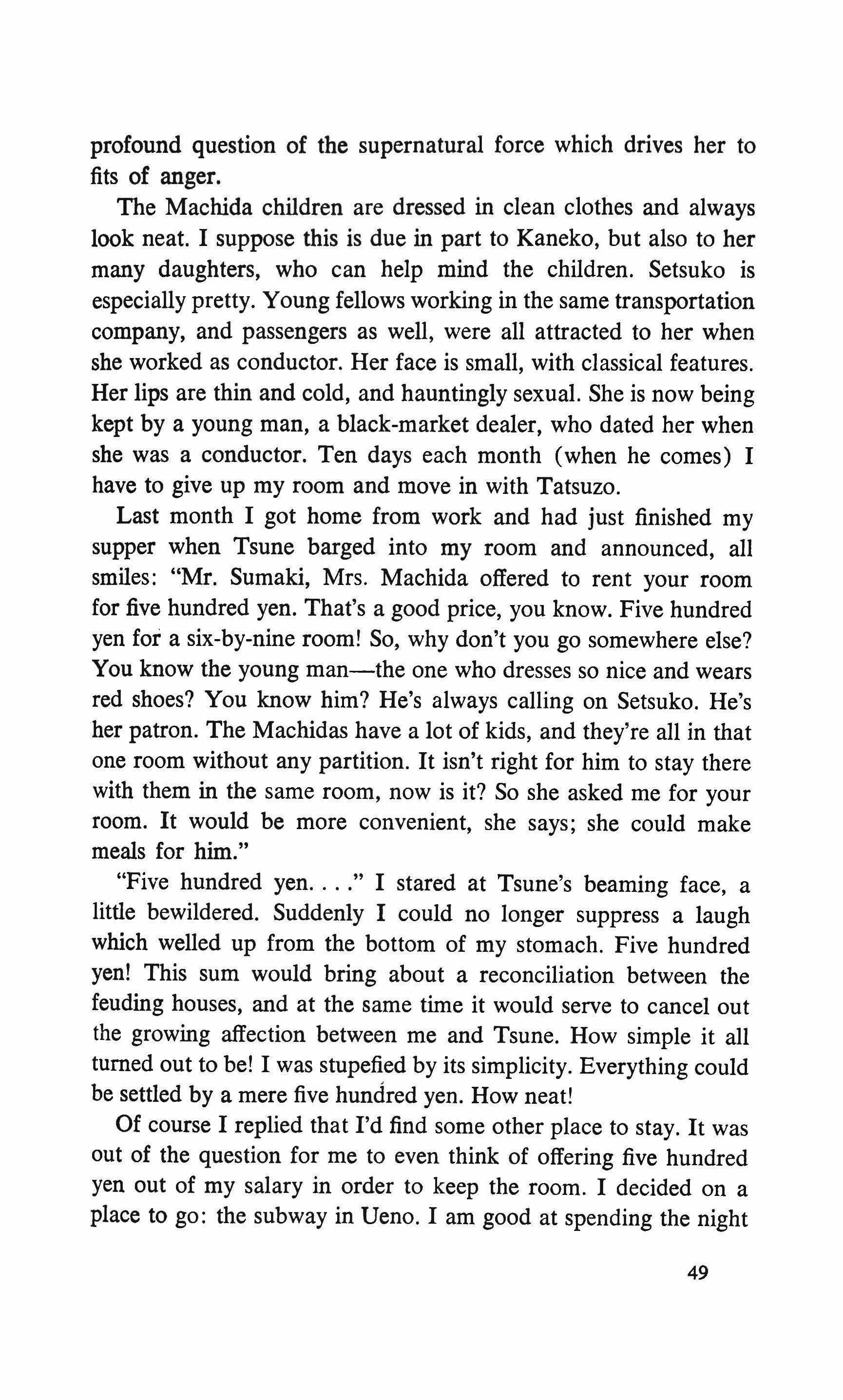
profound question of the supernatural force which drives her to fits of anger.
The Machida children are dressed in clean clothes and always look neat. I suppose this is due in part to Kaneko, but also to her many daughters, who can help mind the children. Setsuko is especially pretty. Young fellows working in the same transportation company, and passengers as well, were all attracted to her when she worked as conductor. Her face is small, with classical features. Her lips are thin and cold, and hauntingly sexual. She is now being kept by a young man, a black-market dealer, who dated her when she was a conductor. Ten days each month (when he comes) I have to give up my room and move in with Tatsuzo.
Last month I got home from work and had just finished my supper when Tsune barged into my room and announced, all smiles: "Mr. Sumaki, Mrs. Machida offered to rent your room for five hundred yen. That's a good price, you know. Five hundred yen for a six-by-nine room! So, why don't you go somewhere else? You know the young man-the one who dresses so nice and wears red shoes? You know him? He's always calling on Setsuko. He's her patron. The Machidas have a lot of kids, and they're all in that one room without any partition. It isn't right for him to stay there with them in the same room, now is it? So she asked me for your room. It would be more convenient, she says; she could make meals for him."
"Five hundred yen " I stared at Tsune's beaming face, a little bewildered. Suddenly I could no longer suppress a laugh which welled up from the bottom of my stomach. Five hundred yen! This sum would bring about a reconciliation between the feuding houses, and at the same time it would serve to cancel out the growing affection between me and Tsune. How simple it all turned out to be! I was stupefied by its simplicity. Everything could be settled by a mere five hundred yen. How neat!
Of course I replied that I'd find some other place to stay. It was out of the question for me to even think of offering five hundred yen out of my salary in order to keep the room. I decided on a place to go: the subway in Ueno. I am good at spending the night
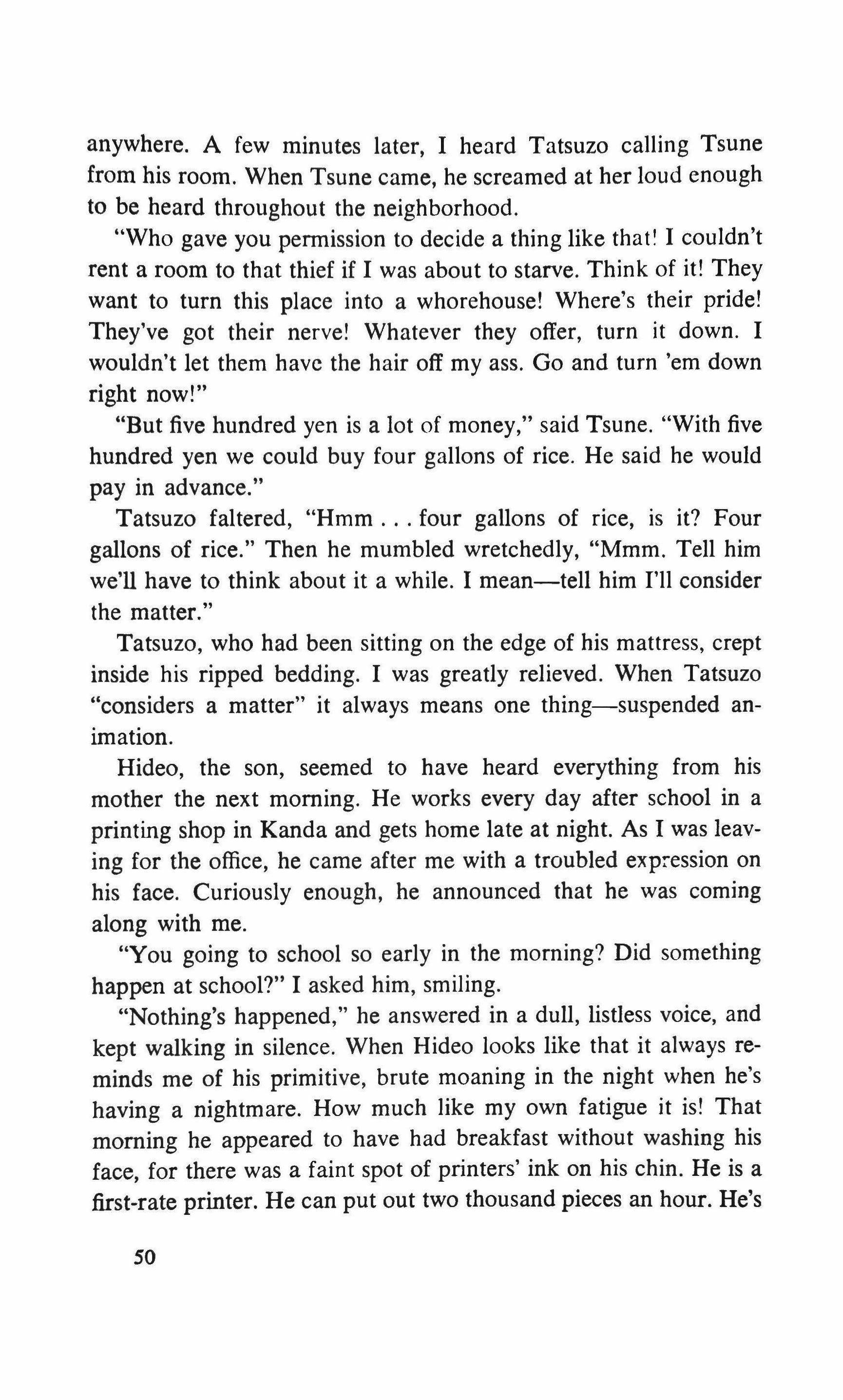
anywhere. A few minutes later, I heard Tatsuzo calling Tsune from his room. When Tsune came, he screamed at her loud enough to be heard throughout the neighborhood.
"Who gave you permission to decide a thing like that! I couldn't rent a room to that thief if I was about to starve. Think of it! They want to turn this place into a whorehouse! Where's their pride! They've got their nerve! Whatever they offer, turn it down. I WOUldn't let them have the hair off my ass. Go and turn 'em down right now!"
"But five hundred yen is a lot of money," said Tsune. "With five hundred yen we could buy four gallons of rice. He said he would pay in advance."
Tatsuzo faltered, "Hmm four gallons of rice, is it? Four gallons of rice." Then he mumbled wretchedly, "Mmm. Tell him we'll have to think about it a while. I mean-tell him I'll consider the matter."
Tatsuzo, who had been sitting on the edge of his mattress, crept inside his ripped bedding. I was greatly relieved. When Tatsuzo "considers a matter" it always means one thing-suspended animation.
Hideo, the son, seemed to have heard everything from his mother the next morning. He works every day after school in a printing shop in Kanda and gets home late at night. As I was leaving for the office, he came after me with a troubled expression on his face. Curiously enough, he announced that he was coming along with me.
"You going to school so early in the morning? Did something happen at school?" I asked him, smiling.
"Nothing's happened," he answered in a dull, listless voice, and kept walking in silence. When Hideo looks like that it always reminds me of his primitive, brute moaning in the night when he's having a nightmare. How much like my own fatigue it is! That morning he appeared to have had breakfast without washing his face, for there was a faint spot of printers' ink on his chin. He is a first-rate printer. He can put out two thousand pieces an hour. He's
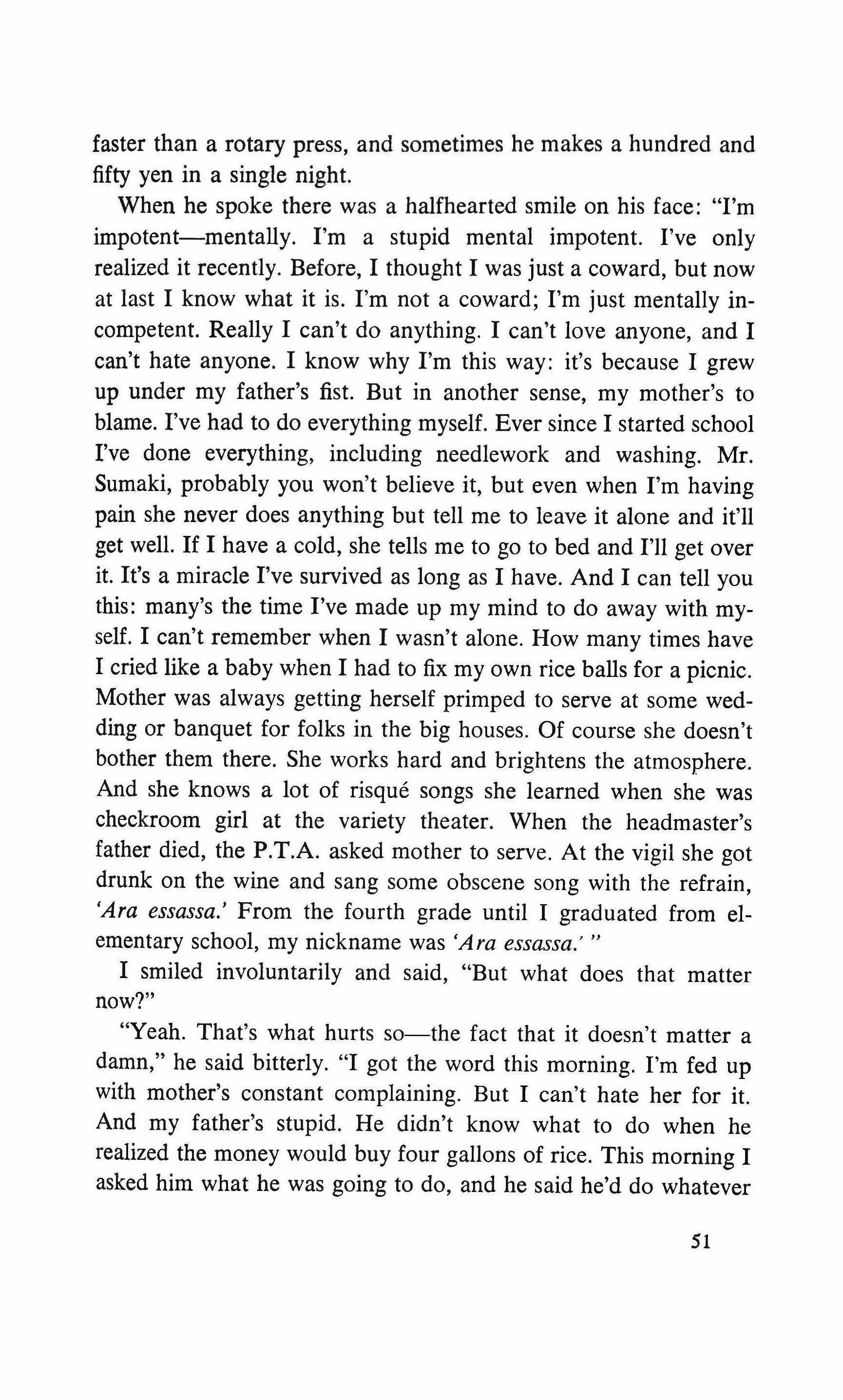
faster than a rotary press, and sometimes he makes a hundred and fifty yen in a single night.
When he spoke there was a halfhearted smile on his face: "I'm impotent-mentally. I'm a stupid mental impotent. I've only realized it recently. Before, I thought I was just a coward, but now at last I know what it is. I'm not a coward; I'm just mentally incompetent. Really I can't do anything. I can't love anyone, and I can't hate anyone. I know why I'm this way: it's because I grew up under my father's fist. But in another sense, my mother's to blame. I've had to do everything myself. Ever since I started school I've done everything, including needlework and washing. Mr. Sumaki, probably you won't believe it, but even when I'm having pain she never does anything but tell me to leave it alone and it'll get well. If I have a cold, she tells me to go to bed and I'll get over it. It's a miracle I've survived as long as I have. And I can tell you this: many's the time I've made up my mind to do away with myself. I can't remember when I wasn't alone. How many times have I cried like a baby when I had to fix my own rice balls for a picnic. Mother was always getting herself primped to serve at some wedding or banquet for folks in the big houses. Of course she doesn't bother them there. She works hard and brightens the atmosphere. And she knows a lot of risque songs she learned when she was checkroom girl at the variety theater. When the headmaster's father died, the P.T.A. asked mother to serve. At the vigil she got drunk on the wine and sang some obscene song with the refrain, tAra essassa,' From the fourth grade until I graduated from elementary school, my nickname was tAra essassa:' I smiled involuntarily and said, "But what does that matter now?"
"Yeah. That's what hurts so-the fact that it doesn't matter a damn," he said bitterly. "I got the word this morning. I'm fed up with mother's constant complaining. But I can't hate her for it. And my father's stupid. He didn't know what to do when he realized the money would buy four gallons of rice. This morning I asked him what he was going to do, and he said he'd do whatever
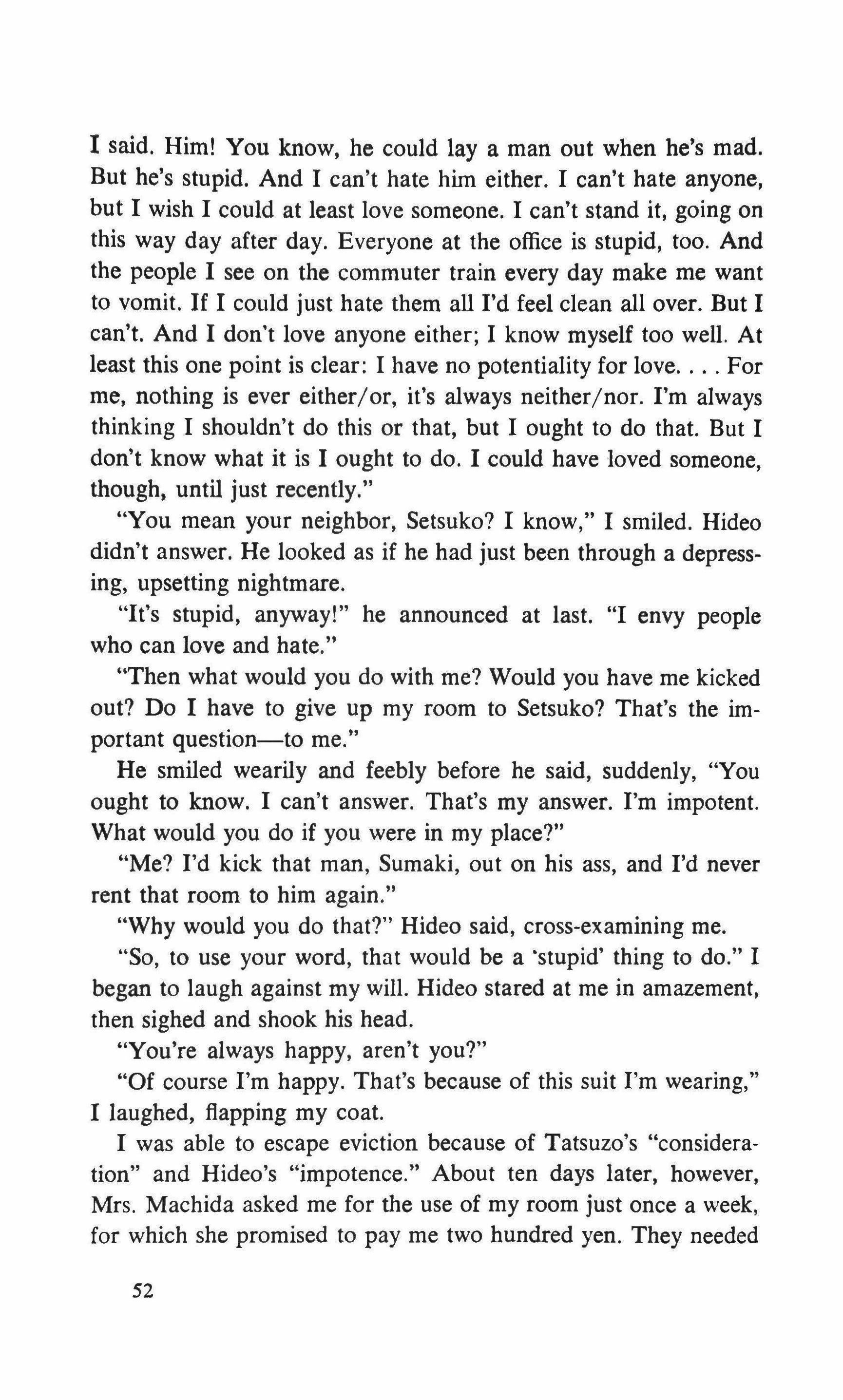
I said. Him! You know, he could lay a man out when he's mad. But he's stupid. And I can't hate him either. I can't hate anyone, but I wish I could at least love someone. I can't stand it, going on this way day after day. Everyone at the office is stupid, too. And the people I see on the commuter train every day make me want to vomit. If I could just hate them all I'd feel clean allover. But I can't. And I don't love anyone either; I know myself too well. At least this one point is clear: I have no potentiality for love For me, nothing is ever either/or, it's always neither/nor. I'm always thinking I shouldn't do this or that, but I ought to do that. But I don't know what it is I ought to do. I could have loved someone, though, until just recently."
"You mean your neighbor, Setsuko? I know," I smiled. Hideo didn't answer. He looked as if he had just been through a depressing, upsetting nightmare.
"It's stupid, anyway!" he announced at last. "I envy people who can love and hate."
"Then what would you do with me? Would you have me kicked out? Do I have to give up my room to Setsuko? That's the important question-to me."
He smiled wearily and feebly before he said, suddenly, "You ought to know. I can't answer. That's my answer. I'm impotent. What would you do if you were in my place?"
"Me? I'd kick that man, Sumaki, out on his ass, and I'd never rent that room to him again."
"Why would you do that?" Hideo said, cross-examining me.
"So, to use your word, that would be a 'stupid' thing to do." I began to laugh against my will. Hideo stared at me in amazement, then sighed and shook his head.
"You're always happy, aren't you?"
"Of course I'm happy. That's because of this suit I'm wearing," I laughed, flapping my coat.
I was able to escape eviction because of Tatsuzo's "consideration" and Hideo's "impotence." About ten days later, however, Mrs. Machida asked me for the use of my room just once a week, for which she promised to pay me two hundred yen. They needed
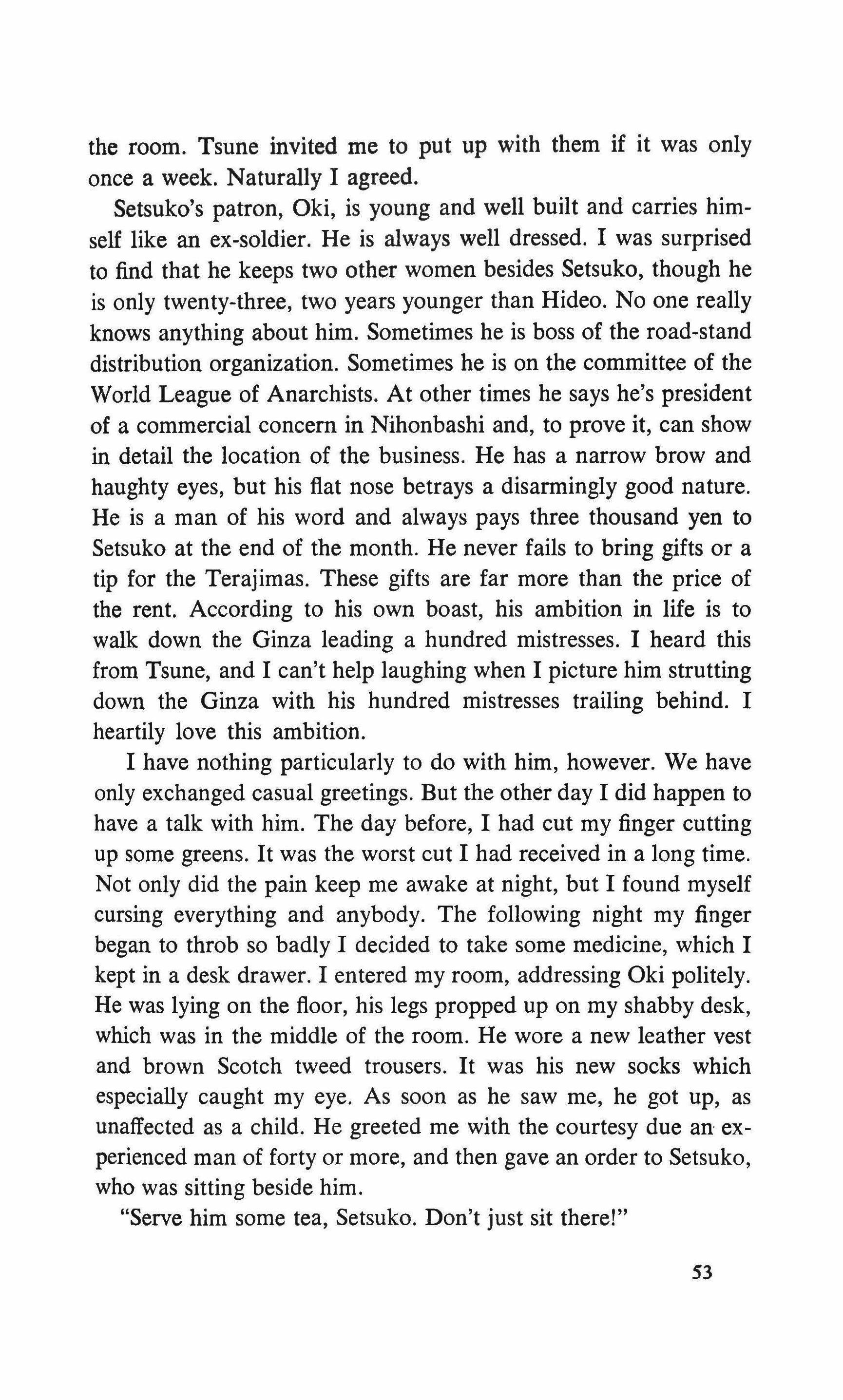
the room. Tsune invited me to put up with them if it was only once a week. Naturally I agreed.
Setsuko's patron, Oki, is young and well built and carries himself like an ex-soldier. He is always well dressed. I was surprised to find that he keeps two other women besides Setsuko, though he is only twenty-three, two years younger than Hideo. No one really knows anything about him. Sometimes he is boss of the road-stand distribution organization. Sometimes he is on the committee of the World League of Anarchists. At other times he says he's president of a commercial concern in Nihonbashi and, to prove it, can show in detail the location of the business. He has a narrow brow and haughty eyes, but his flat nose betrays a disarmingly good nature. He is a man of his word and always pays three thousand yen to Setsuko at the end of the month. He never fails to bring gifts or a tip for the Terajimas. These gifts are far more than the price of the rent. According to his own boast, his ambition in life is to walk down the Ginza leading a hundred mistresses. I heard this from Tsune, and I can't help laughing when I picture him strutting down the Ginza with his hundred mistresses trailing behind. I heartily love this ambition.
I have nothing particularly to do with him, however. We have only exchanged casual greetings. But the other day I did happen to have a talk with him. The day before, I had cut my finger cutting up some greens. It was the worst cut I had received in a long time. Not only did the pain keep me awake at night, but I found myself cursing everything and anybody. The following night my finger began to throb so badly I decided to take some medicine, which I kept in a desk drawer. I entered my room, addressing Oki politely. He was lying on the floor, his legs propped up on my shabby desk, which was in the middle of the room. He wore a new leather vest and brown Scotch tweed trousers. It was his new socks which especially caught my eye. As soon as he saw me, he got up, as unaffected as a child. He greeted me with the courtesy due an experienced man of forty or more, and then gave an order to Setsuko, who was sitting beside him.
"Serve him some tea, Setsuko. Don't just sit there!"
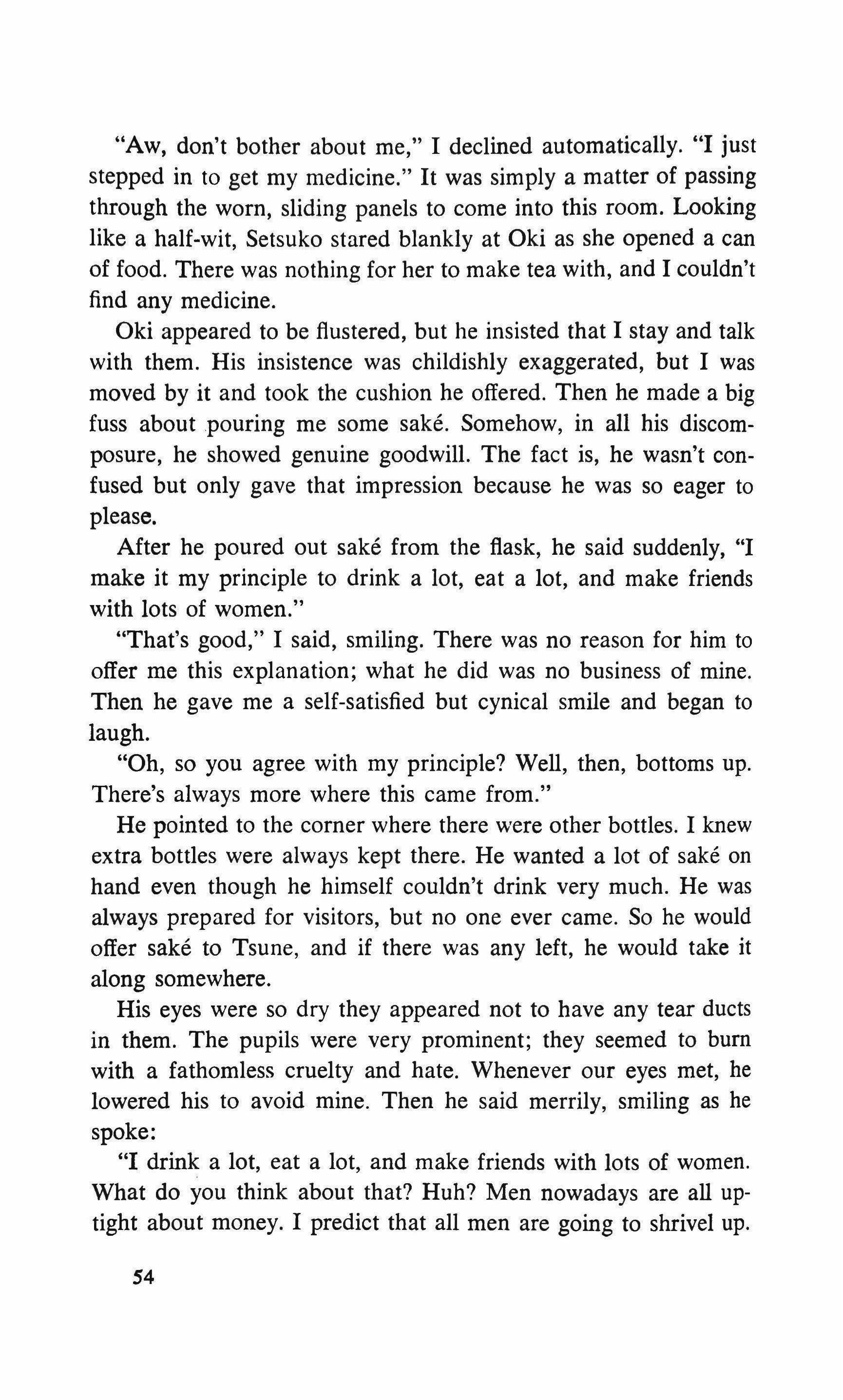
"Aw, don't bother about me," I declined automatically. "I just stepped in to get my medicine." It was simply a matter of passing through the worn, sliding panels to come into this room. Looking like a half-wit, Setsuko stared blankly at Oki as she opened a can of food. There was nothing for her to make tea with, and I couldn't find any medicine.
Oki appeared to be flustered, but he insisted that I stay and talk with them. His insistence was childishly exaggerated, but I was moved by it and took the cushion he offered. Then he made a big fuss about pouring me some sake. Somehow, in all his discomposure, he showed genuine goodwill. The fact is, he wasn't confused but only gave that impression because he was so eager to please.
After he poured out sake from the flask, he said suddenly, "I make it my principle to drink a lot, eat a lot, and make friends with lots of women."
"That's good," I said, smiling. There was no reason for him to offer me this explanation; what he did was no business of mine. Then he gave me a self-satisfied but cynical smile and began to laugh.
"Oh, so you agree with my principle? Well, then, bottoms up. There's always more where this came from."
He pointed to the corner where there were other bottles. I knew extra bottles were always kept there. He wanted a lot of sake on hand even though he himself couldn't drink very much. He was always prepared for visitors, but no one ever came. So he would offer sake to Tsune, and if there was any left, he would take it along somewhere.
His eyes were so dry they appeared not to have any tear ducts in them. The pupils were very prominent; they seemed to burn with a fathomless cruelty and hate. Whenever our eyes met, he lowered his to avoid mine. Then he said merrily, smiling as he spoke:
"1 drink a lot, eat a lot, and make friends with lots of women. What do you think about that? Huh? Men nowadays are all uptight about money. I predict that all men are going to shrivel up.
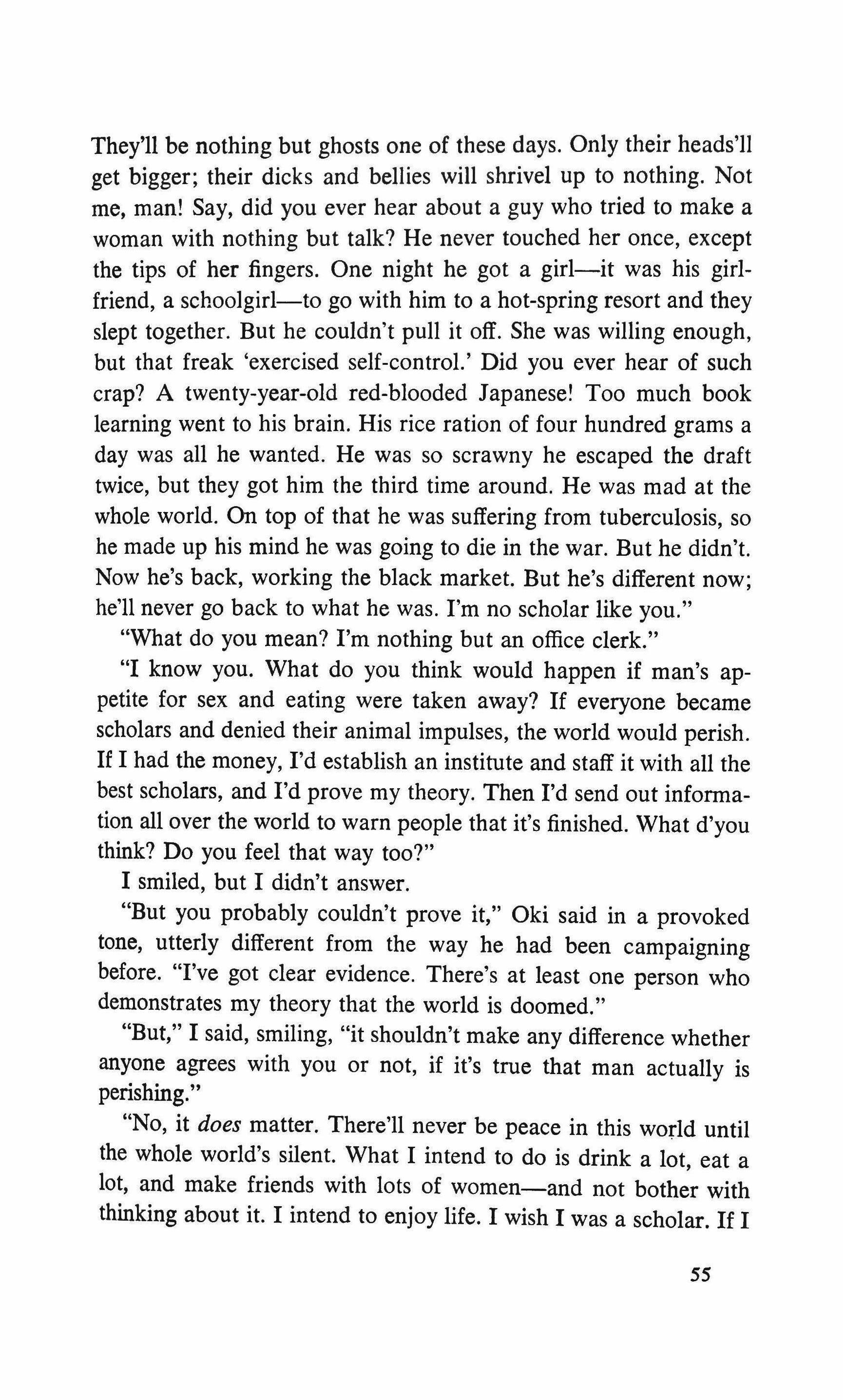
They'll be nothing but ghosts one of these days. Only their heads'll get bigger; their dicks and bellies will shrivel up to nothing. Not me, man! Say, did you ever hear about a guy who tried to make a woman with nothing but talk? He never touched her once, except the tips of her fingers. One night he got a girl-it was his girlfriend, a schoolgirl-to go with him to a hot-spring resort and they slept together. But he couldn't pull it off. She was willing enough, but that freak 'exercised self-control.' Did you ever hear of such crap? A twenty-year-old red-blooded Japanese! Too much book learning went to his brain. His rice ration of four hundred grams a day was all he wanted. He was so scrawny he escaped the draft twice, but they got him the third time around. He was mad at the whole world. On top of that he was suffering from tuberculosis, so he made up his mind he was going to die in the war. But he didn't. Now he's back, working the black market. But he's different now; he'll never go back to what he was. I'm no scholar like you."
"What do you mean? I'm nothing but an office clerk."
"I know you. What do you think would happen if man's appetite for sex and eating were taken away? If everyone became scholars and denied their animal impulses, the world would perish. If I had the money, I'd establish an institute and staff it with all the best scholars, and I'd prove my theory. Then I'd send out information allover the world to warn people that it's finished. What d'you think? Do you feel that way too?"
I smiled, but I didn't answer.
"But you probably couldn't prove it," Oki said in a provoked tone, utterly different from the way he had been campaigning before. "I've got clear evidence. There's at least one person who demonstrates my theory that the world is doomed."
"But," I said, smiling, "it shouldn't make any difference whether anyone agrees with you or not, if it's true that man actually is perishing. "
"No, it does matter. There'll never be peace in this world until the whole world's silent. What I intend to do is drink a lot, eat a lot, and make friends with lots of women-and not bother with thinking about it. I intend to enjoy life. I wish I was a scholar. If I
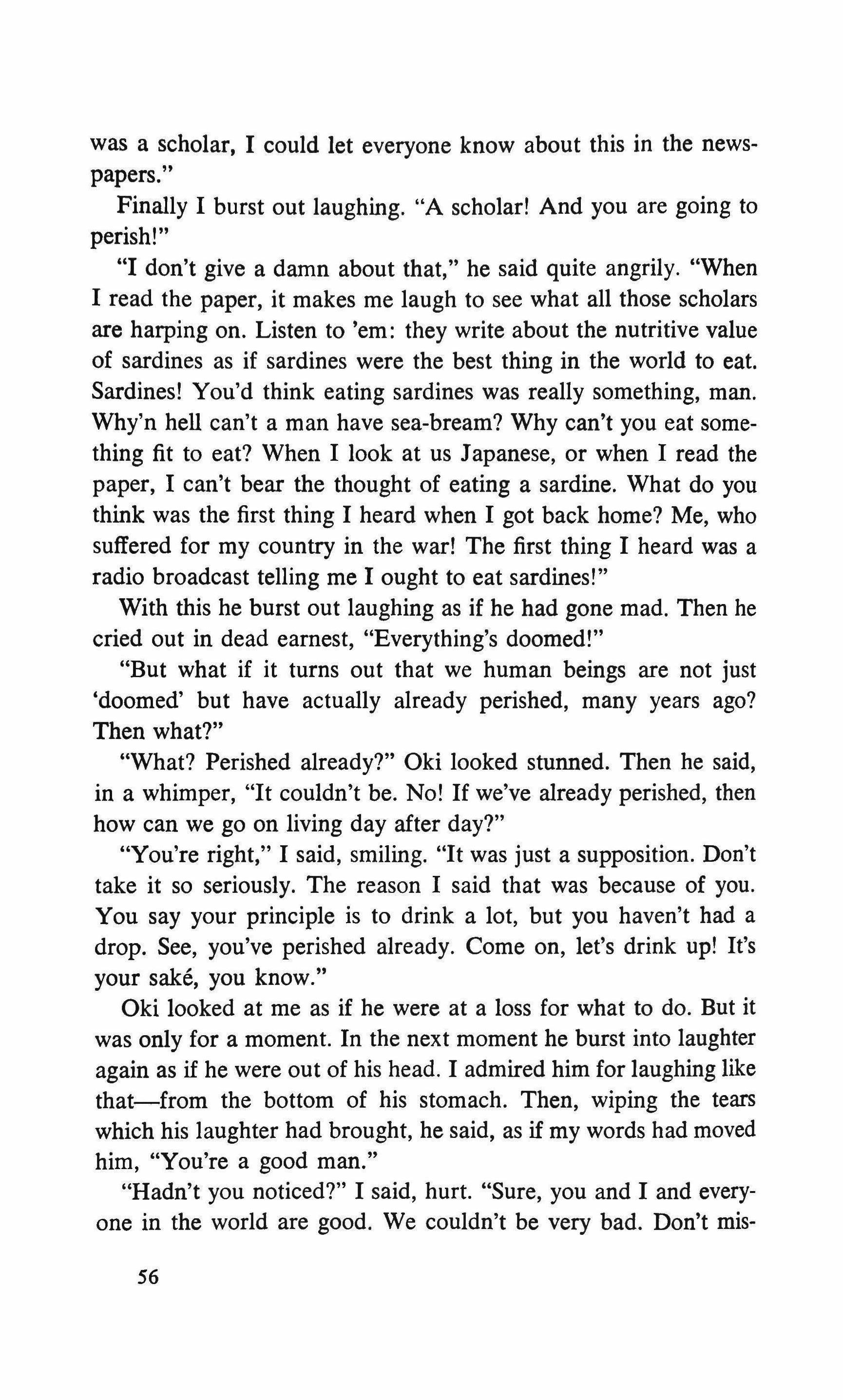
was a scholar, I could let everyone know about this in the newspapers."
Finally I burst out laughing. "A scholar! And you are going to perish!"
"I don't give a damn about that," he said quite angrily. "When I read the paper, it makes me laugh to see what all those scholars are harping on. Listen to 'em: they write about the nutritive value of sardines as if sardines were the best thing in the world to eat. Sardines! You'd think eating sardines was really something, man. Why'n hell can't a man have sea-bream? Why can't you eat something fit to eat? When I look at us Japanese, or when I read the paper, I can't bear the thought of eating a sardine. What do you think was the first thing I heard when I got back home? Me, who suffered for my country in the war! The first thing I heard was a radio broadcast telling me I ought to eat sardines!"
With this he burst out laughing as if he had gone mad. Then he cried out in dead earnest, "Everything's doomed!"
"But what if it turns out that we human beings are not just 'doomed' but have actually already perished, many years ago? Then what?"
"What? Perished already?" Oki looked stunned. Then he said, in a whimper, "It couldn't be. No! If we've already perished, then how can we go on living day after day?"
"You're right," I said, smiling. "It was just a supposition. Don't take it so seriously. The reason I said that was because of you. You say your principle is to drink a lot, but you haven't had a drop. See, you've perished already. Come on, let's drink up! It's your sake, you know."
Oki looked at me as if he were at a loss for what to do. But it was only for a moment. In the next moment he burst into laughter again as if he were out of his head. I admired him for laughing like that-from the bottom of his stomach. Then, wiping the tears which his laughter had brought, he said, as if my words had moved him, "You're a good man."
"Hadn't you noticed?" I said, hurt. "Sure, you and I and everyone in the world are good. We couldn't be very bad. Don't mis-
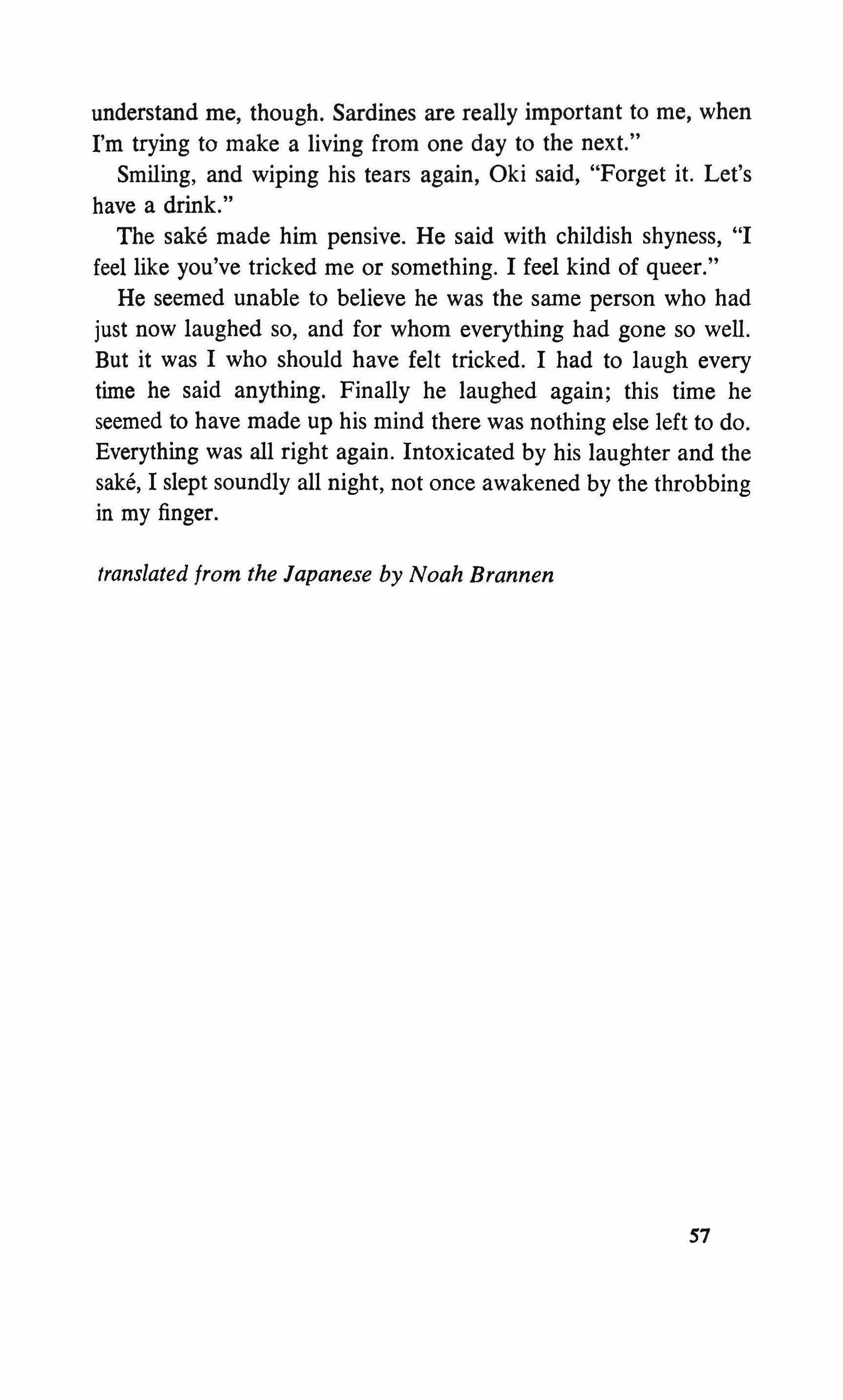
understand me, though. Sardines are really important to me, when I'm trying to make a living from one day to the next."
Smiling, and wiping his tears again, Oki said, "Forget it. Let's have a drink."
The sake made him pensive. He said with childish shyness, "I feel like you've tricked me or something. I feel kind of queer." He seemed unable to believe he was the same person who had just now laughed so, and for whom everything had gone so well. But it was I who should have felt tricked. I had to laugh every time he said anything. Finally he laughed again; this time he seemed to have made up his mind there was nothing else left to do.
Everything was all right again. Intoxicated by his laughter and the sake, I slept soundly all night, not once awakened by the throbbing in my finger.
translated from the Japanese by Noah Brannen
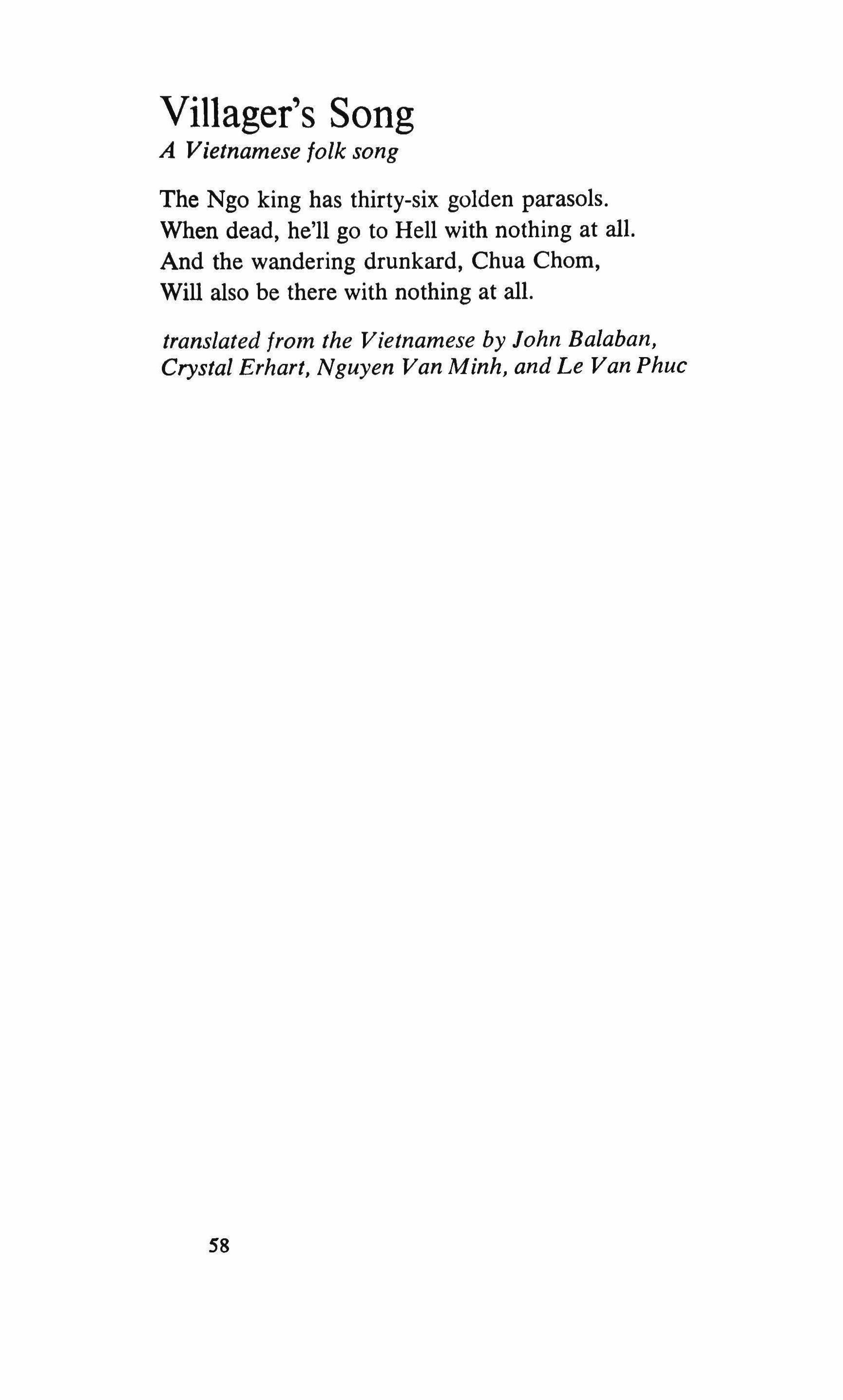
A Vietnamese folk song
The Ngo king has thirty-six golden parasols. When dead, he'll go to Hell with nothing at all. And the wandering drunkard, Chua Chom, Will also be there with nothing at all.
translated from the Vietnamese by John Balaban, Crystal Erhart, Nguyen Van Minh, and Le Van Phuc
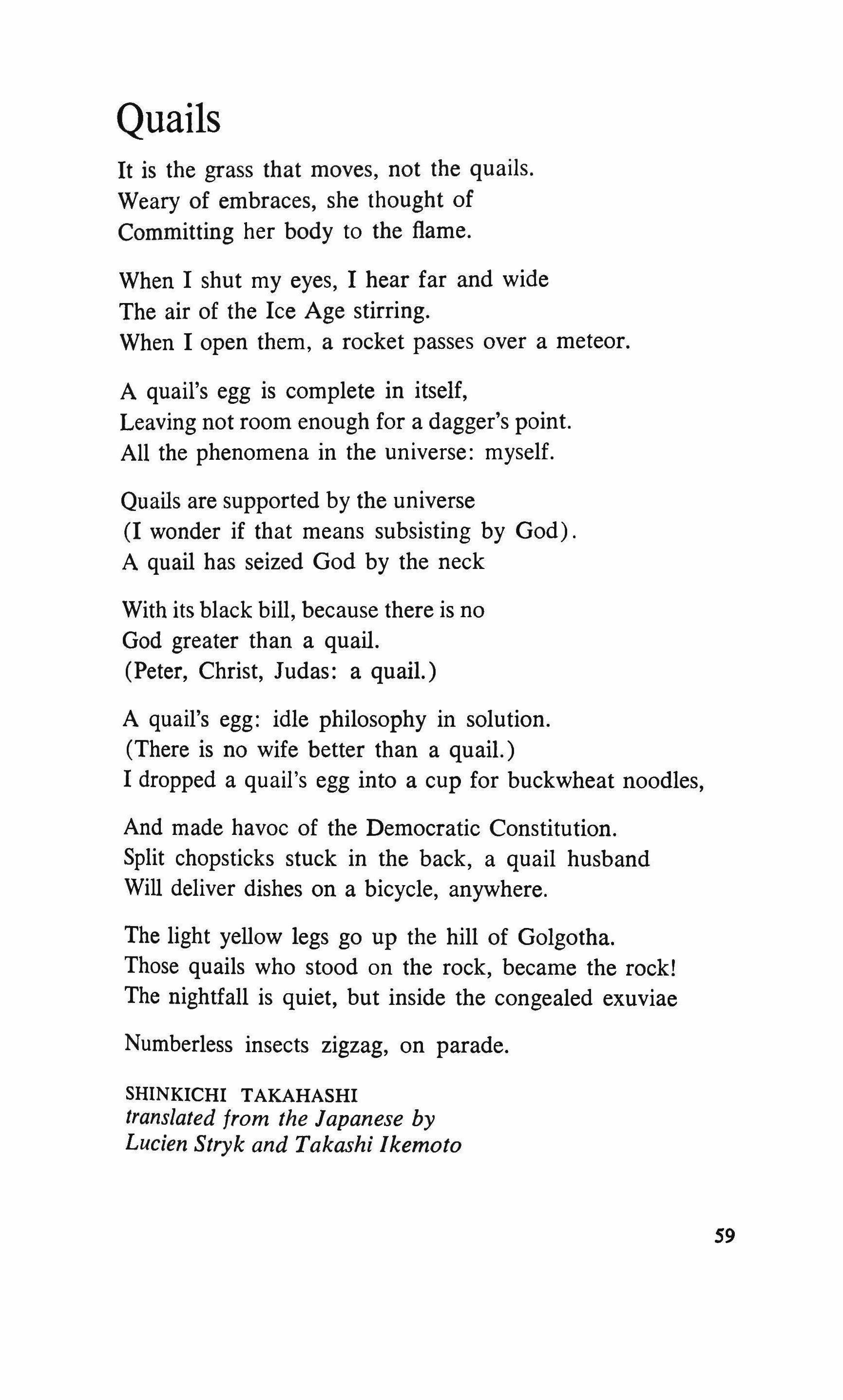
It is the grass that moves, not the quails. Weary of embraces, she thought of Committing her body to the flame.
When I shut my eyes, I hear far and wide The air of the Ice Age stirring. When I open them, a rocket passes over a meteor.
A quail's egg is complete in itself, Leaving not room enough for a dagger's point. All the phenomena in the universe: myself.
Quails are supported by the universe (I wonder if that means subsisting by God).
A quail has seized God by the neck
With its black bill, because there is no God greater than a quail.
(Peter, Christ, Judas: a quail.)
A quail's egg: idle philosophy in solution. (There is no wife better than a quail.)
I dropped a quail's egg into a cup for buckwheat noodles, And made havoc of the Democratic Constitution.
Split chopsticks stuck in the back, a quail husband Will deliver dishes on a bicycle, anywhere.
The light yellow legs go up the hill of Golgotha. Those quails who stood on the rock, became the rock! The nightfall is quiet, but inside the congealed exuviae
Numberless insects zigzag, on parade.
SHINKICHI TAKAHASHI
translated from the Japanese by Lucien Stryk and Takashi Ikemoto
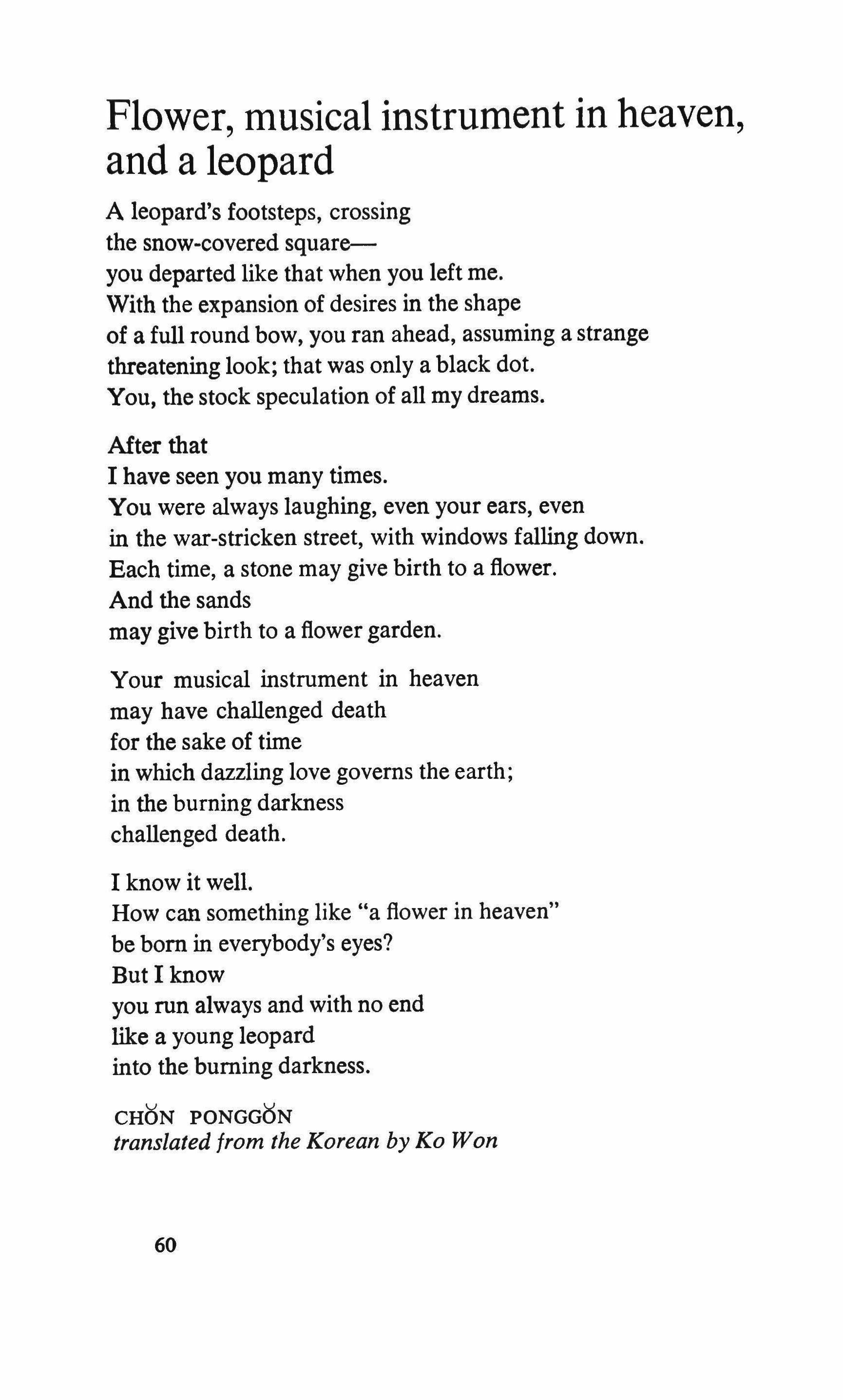
A leopard's footsteps, crossing the snow-covered squareyou departed like that when you left me. With the expansion of desires in the shape of a full round bow, you ran ahead, assuming a strange threatening look; that was only a black dot. You, the stock speculation of all my dreams.
After that I have seen you many times. You were always laughing, even your ears, even in the war-stricken street, with windows falling down. Each time, a stone may give birth to a flower. And the sands may give birth to a flower garden. Your musical instrument in heaven may have challenged death for the sake of time in which dazzling love governs the earth; in the burning darkness challenged death.
I know it well. How can something like "a flower in heaven" be born in everybody's eyes? But I know you run always and with no end like a young leopard into the burning darkness.
CHON PONGGON
translated from the Korean by Ko Won
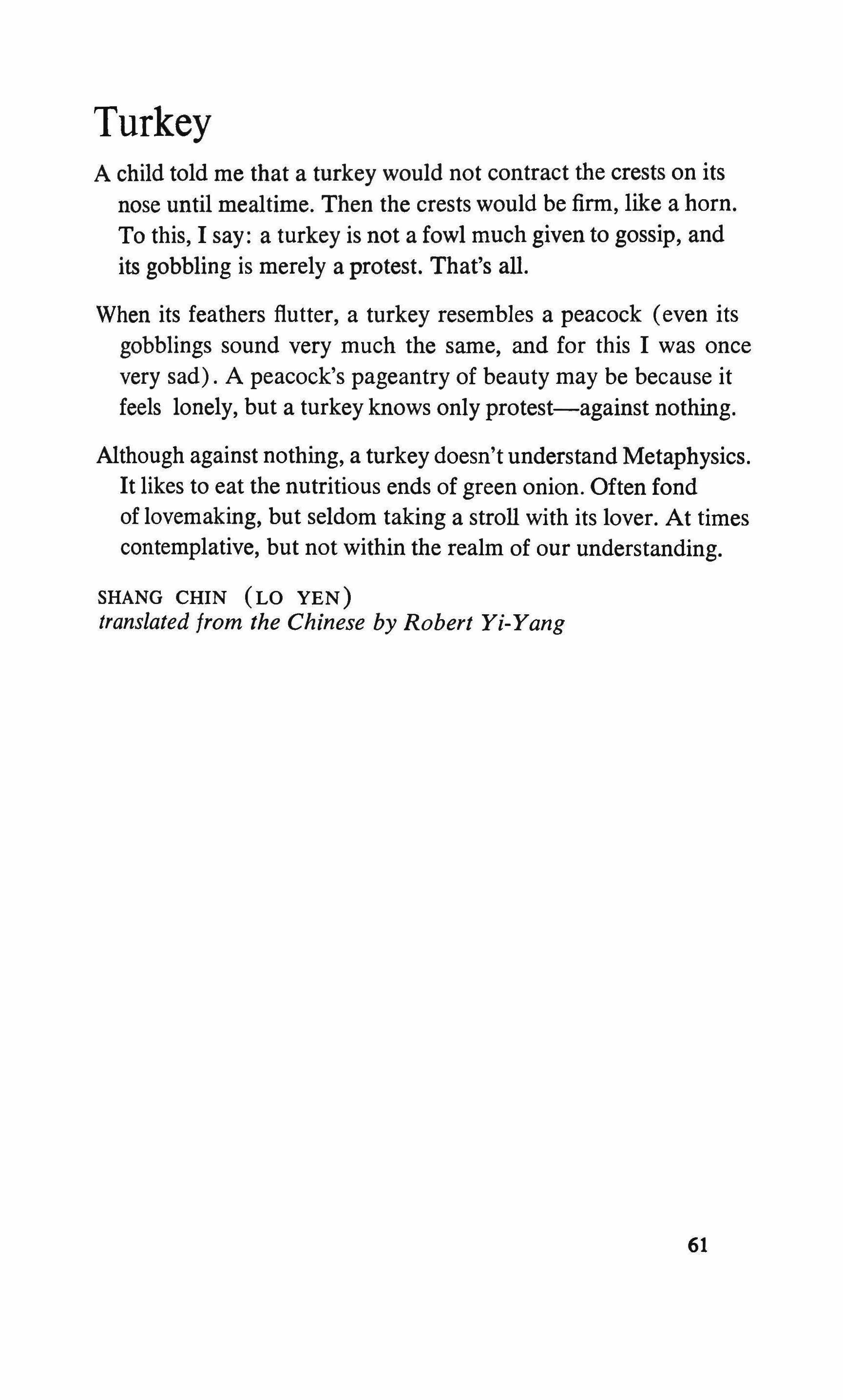
A child told me that a turkey would not contract the crests on its nose until mealtime. Then the crests would be firm, like a horn.
To this, I say: a turkey is not a fowl much given to gossip, and its gobbling is merely a protest. That's all.
When its feathers flutter, a turkey resembles a peacock (even its gobblings sound very much the same, and for this I was once very sad). A peacock's pageantry of beauty may be because it feels lonely, but a turkey knows only protest-against nothing.
Although against nothing, a turkey doesn't understand Metaphysics. It likes to eat the nutritious ends of green onion. Often fond of lovemaking, but seldom taking a stroll with its lover. At times contemplative, but not within the realm of our understanding.
SHANG CHIN (LO YEN)
translated from the Chinese by Robert Yi-Yang
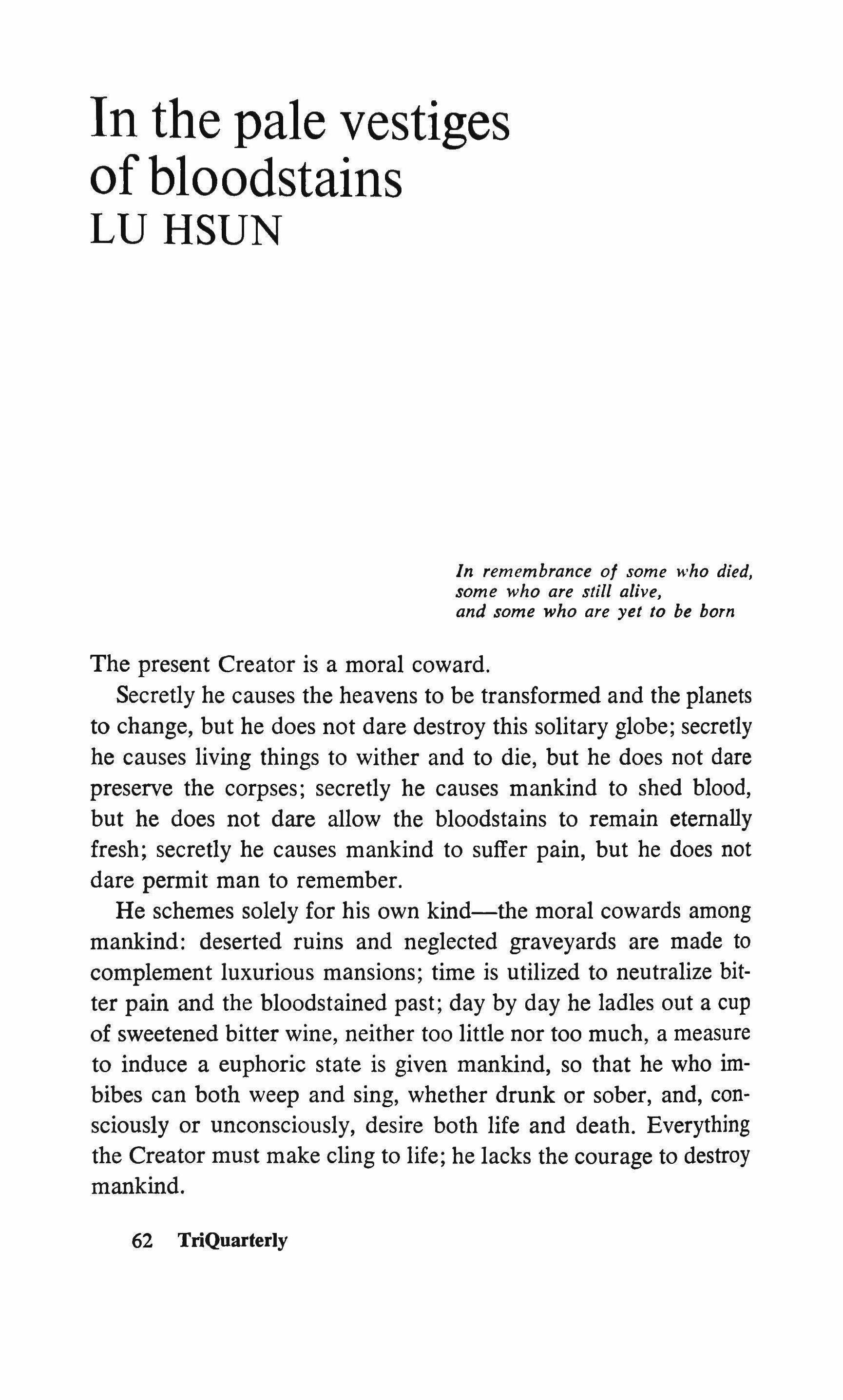
In remembrance of some who died, some who are still alive, and some who are yet to be born
The present Creator is a moral coward. Secretly he causes the heavens to be transformed and the planets to change, but he does not dare destroy this solitary globe; secretly he causes living things to wither and to die, but he does not dare preserve the corpses; secretly he causes mankind to shed blood, but he does not dare allow the bloodstains to remain eternally fresh; secretly he causes mankind to suffer pain, but he does not dare permit man to remember.
He schemes solely for his own kind-the moral cowards among mankind: deserted ruins and neglected graveyards are made to complement luxurious mansions; time is utilized to neutralize bitter pain and the bloodstained past; day by day he ladles out a cup of sweetened bitter wine, neither too little nor too much, a measure to induce a euphoric state is given mankind, so that he who imbibes can both weep and sing, whether drunk or sober, and, consciously or unconsciously, desire both life and death. Everything the Creator must make cling to life; he lacks the courage to destroy mankind.
62 TriQuarterly
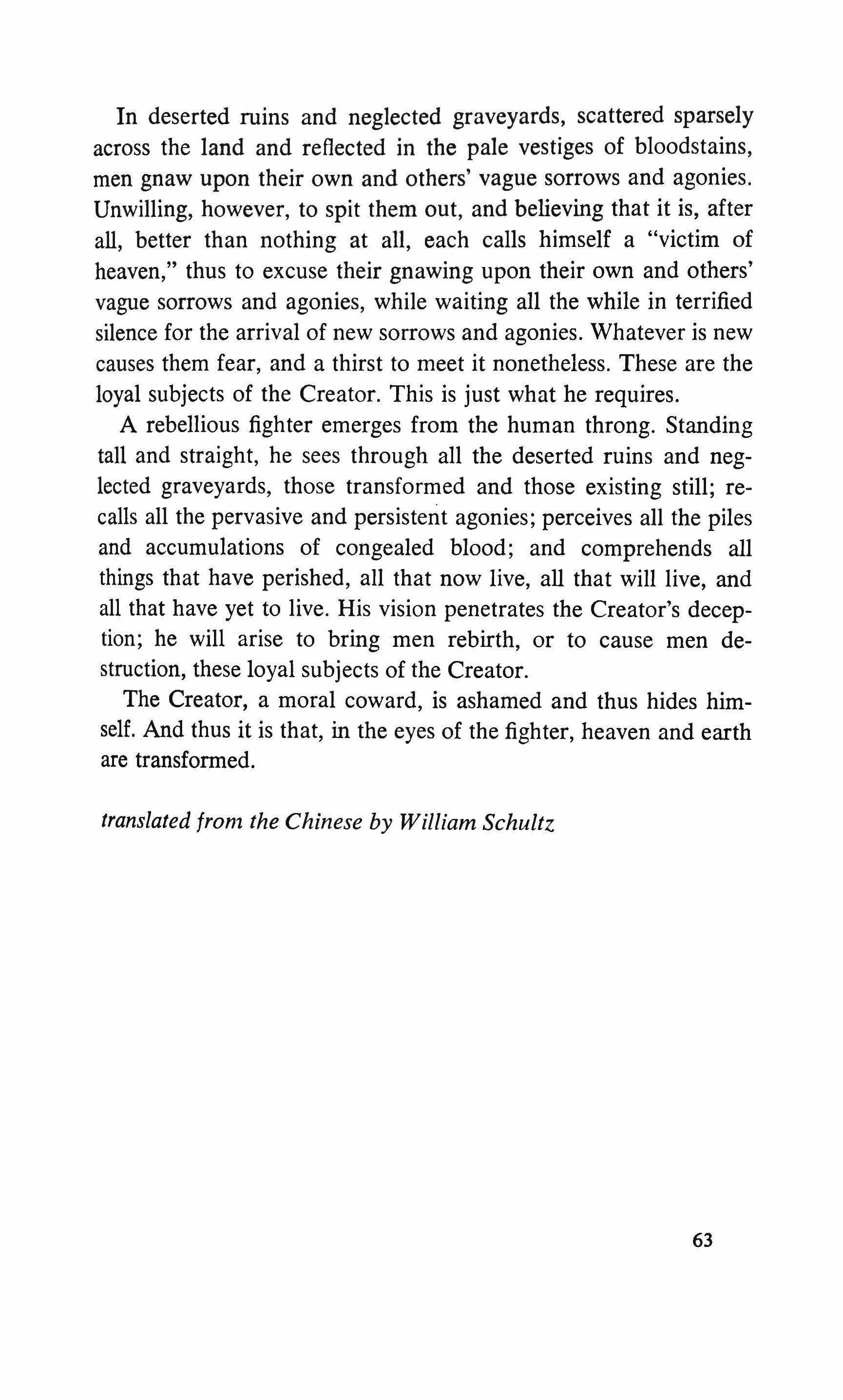
In deserted ruins and neglected graveyards, scattered sparsely across the land and reflected in the pale vestiges of bloodstains, men gnaw upon their own and others' vague sorrows and agonies. Unwilling, however, to spit them out, and believing that it is, after all, better than nothing at all, each calls himself a "victim of heaven," thus to excuse their gnawing upon their own and others' vague sorrows and agonies, while waiting all the while in terrified silence for the arrival of new sorrows and agonies. Whatever is new causes them fear, and a thirst to meet it nonetheless. These are the loyal subjects of the Creator. This is just what he requires.
A rebellious fighter emerges from the human throng. Standing tall and straight, he sees through all the deserted ruins and neglected graveyards, those transformed and those existing still; recalls all the pervasive and persistent agonies; perceives all the piles and accumulations of congealed blood; and comprehends all things that have perished, all that now live, all that will live, and all that have yet to live. His vision penetrates the Creator's deception; he will arise to bring men rebirth, or to cause men destruction, these loyal subjects of the Creator.
The Creator, a moral coward, is ashamed and thus hides himself. And thus it is that, in the eyes of the fighter, heaven and earth are transformed.
translated from the Chinese by William Schultz
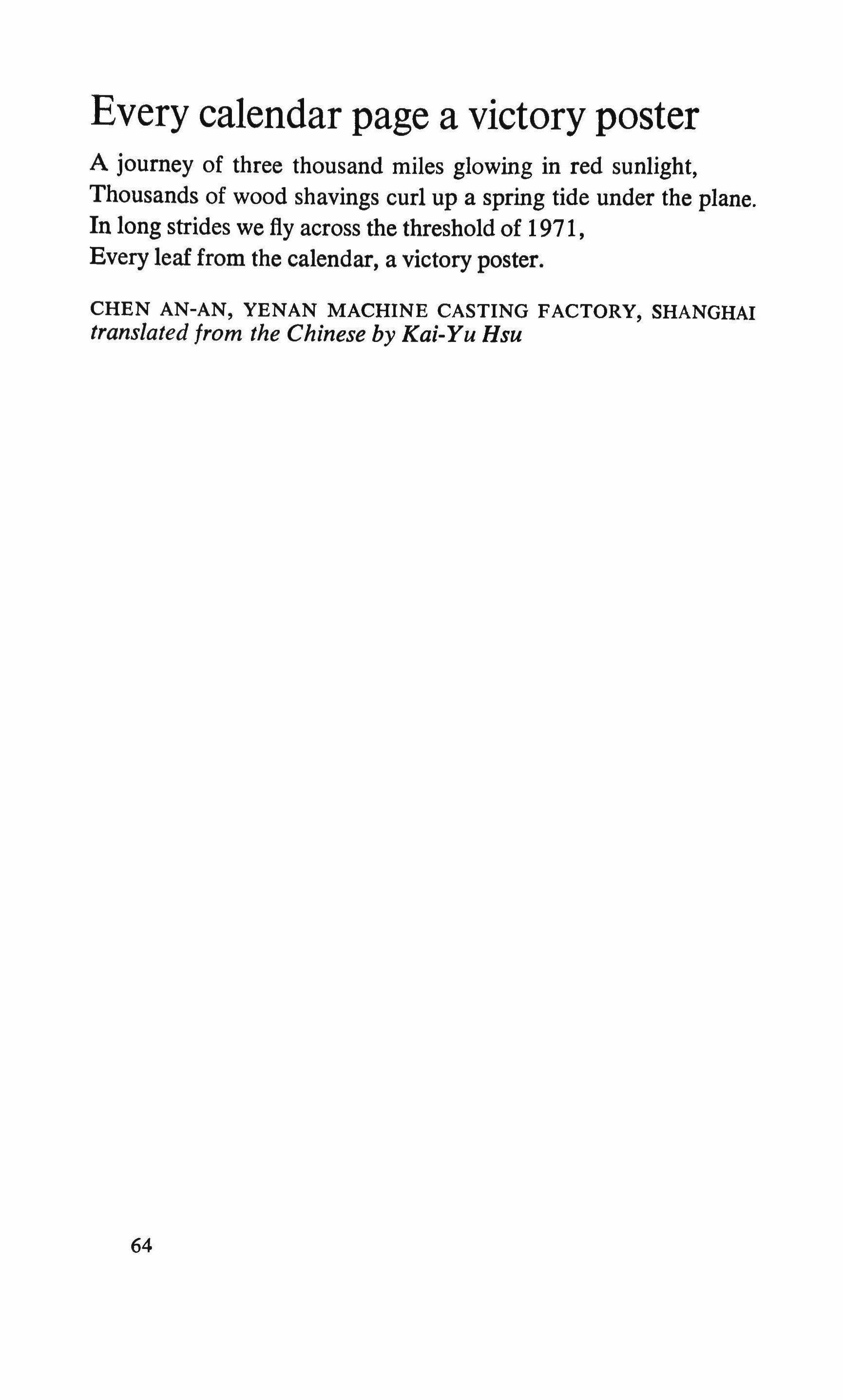
A journey of three thousand miles glowing in red sunlight, Thousands of wood shavings curl up a spring tide under the plane. In long strides we fly across the threshold of 1971, Every leaf from the calendar, a victory poster.
AN-AN, YENAN
SHANGHAI translated from the Chinese by Kai-Yu Hsu
translated from the Chinese by Burton Raffel
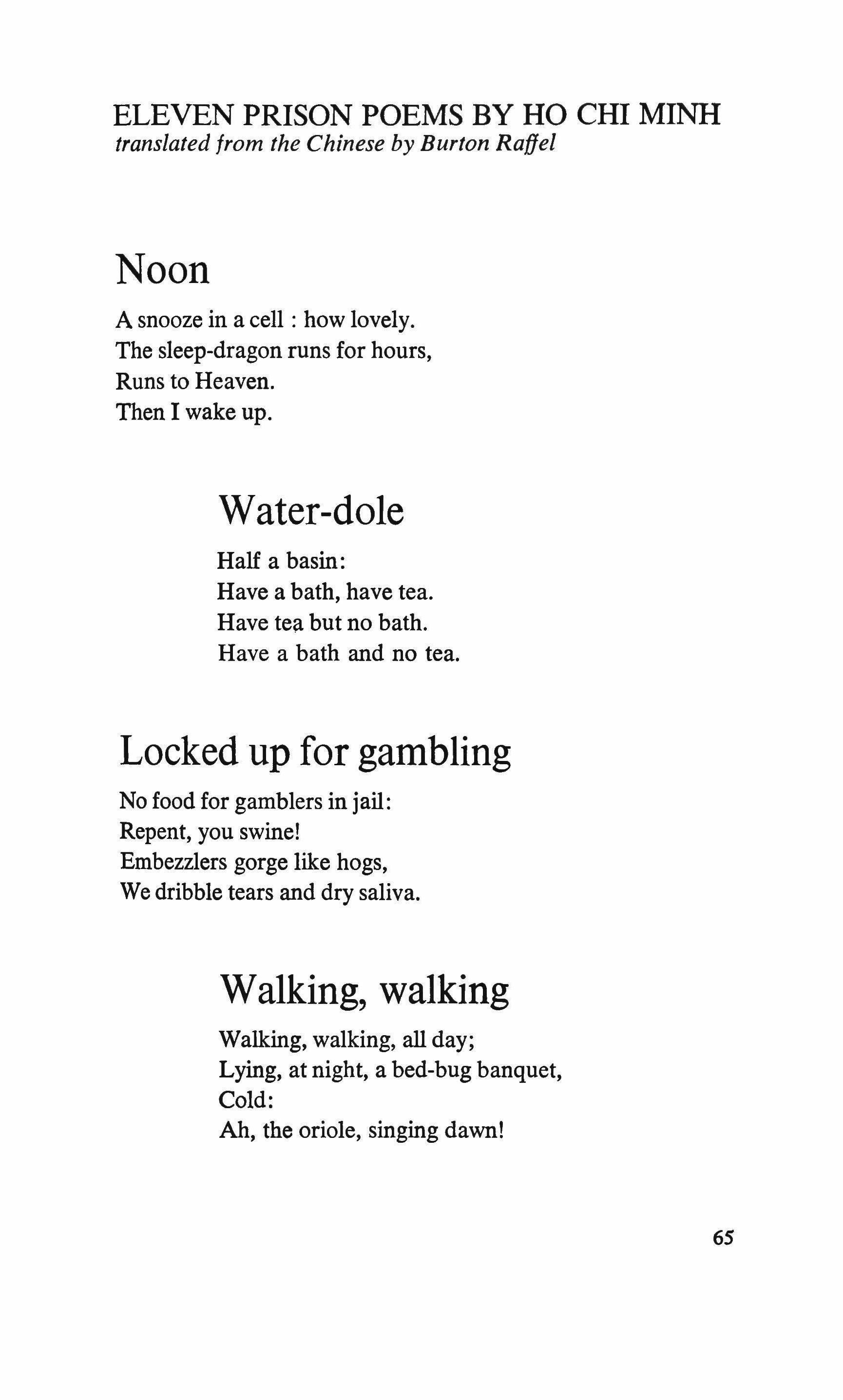
Noon
A snooze in a cell: how lovely. The sleep-dragon runs for hours, Runs to Heaven. Then I wake up.
Half a basin: Have a bath, have tea. Have tea but no bath. Have a bath and no tea.
No food for gamblers in jail: Repent, you swine! Embezzlers gorge like hogs, We dribble tears and dry saliva.
Walking, walking, all day; Lying, at night, a bed-bug banquet, Cold:
Ah, the oriole, singing dawn!
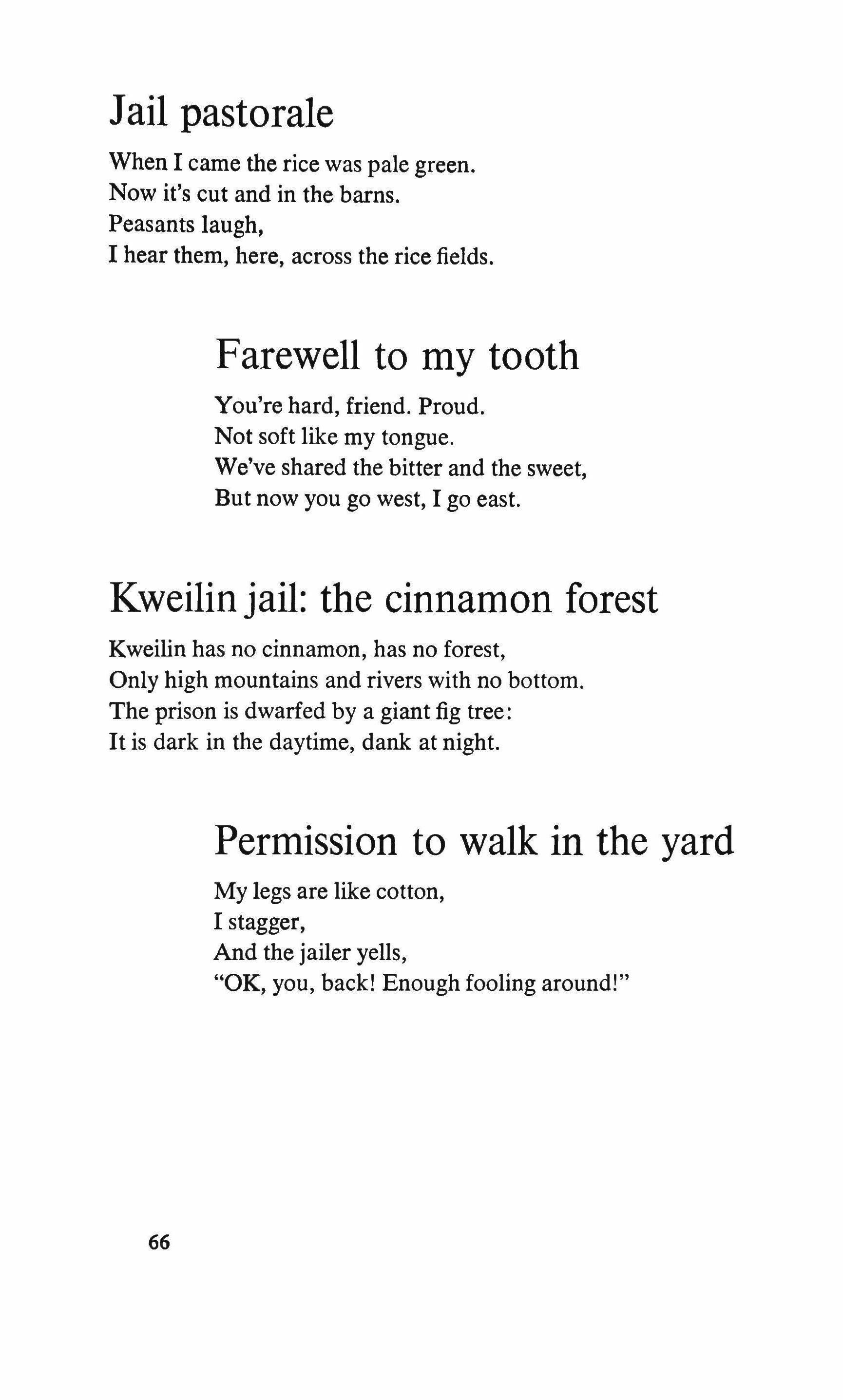
When I came the rice was pale green. Now it's cut and in the barns.
Peasants laugh, I hear them, here, across the rice fields.
You're hard, friend. Proud. Not soft like my tongue. We've shared the bitter and the sweet, But now you go west, I go east.
Kweilin has no cinnamon, has no forest, Only high mountains and rivers with no bottom. The prison is dwarfed by a giant fig tree: It is dark in the daytime, dank at night.
My legs are like cotton, I stagger, And the jailer yells, "OK, you, back! Enough fooling around!"
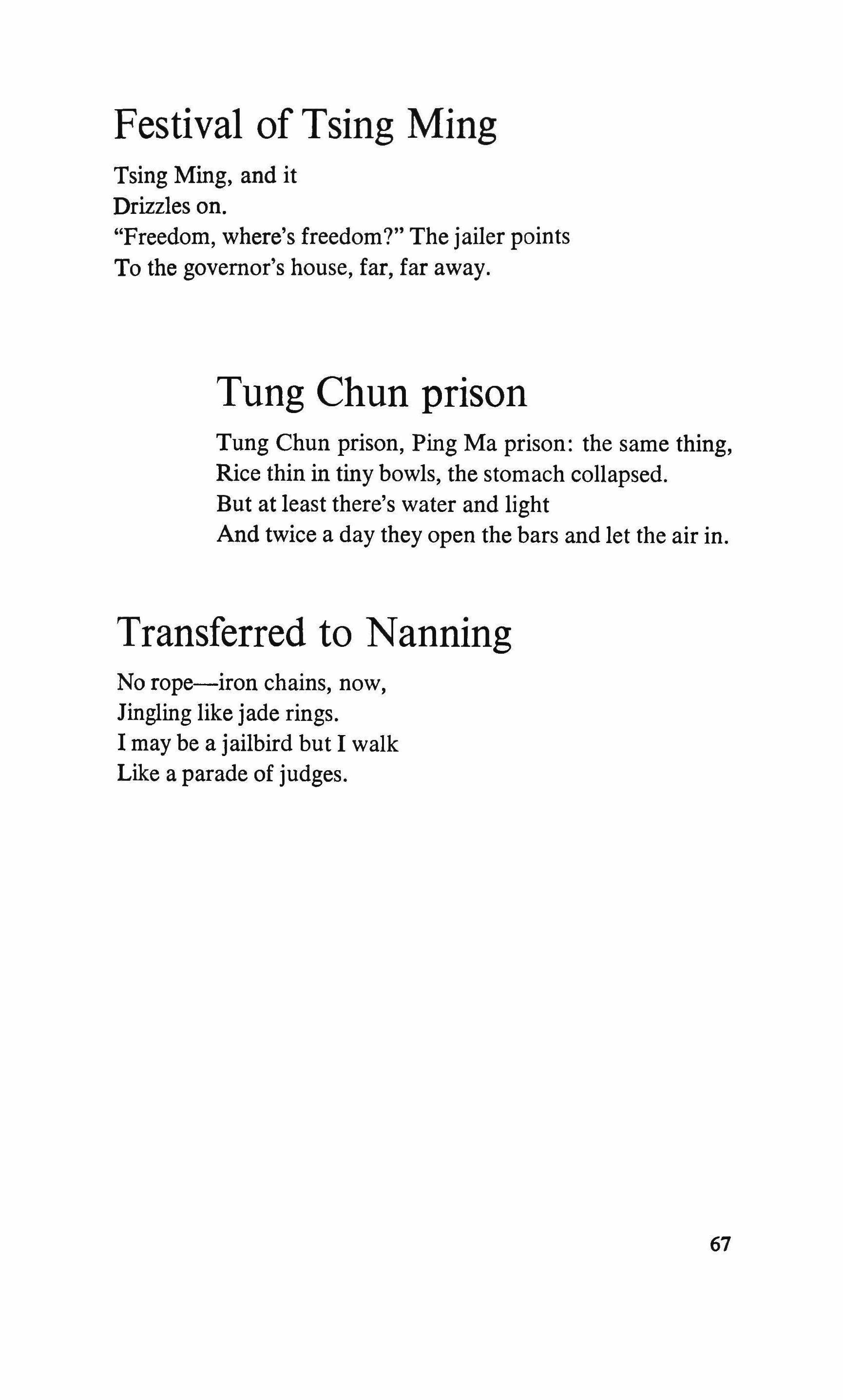
Tsing Ming, and it Drizzles on.
"Freedom, where's freedom?" The jailer points To the governor's house, far, far away.
Tung Chun prison, Ping Ma prison: the same thing, Rice thin in tiny bowls, the stomach collapsed. But at least there's water and light And twice a day they open the bars and let the air in.
No rope-iron chains, now, Jingling like jade rings.
I may be a jailbird but I walk Like a parade of judges.
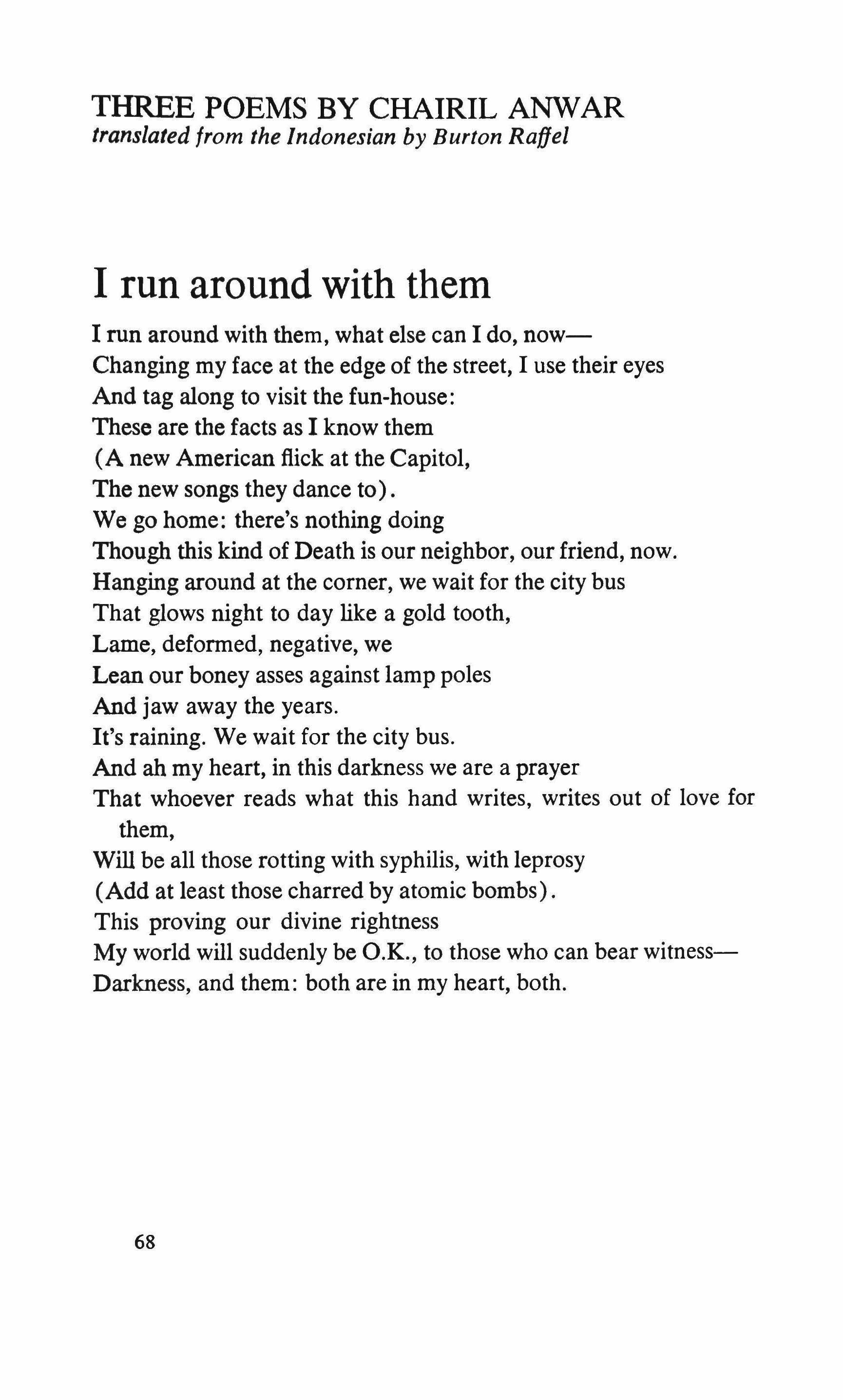
translated from the Indonesian by
Burton RaffelI run around with them, what else can I do, now
Changing my face at the edge of the street, I use their eyes
And tag along to visit the fun-house:
These are the facts as I know them
(A new American flick at the Capitol, The new songs they dance to)
We go home: there's nothing doing
Though this kind of Death is our neighbor, our friend, now.
Hanging around at the corner, we wait for the city bus
That glows night to day like a gold tooth, Lame, deformed, negative, we
Lean our boney asses against lamp poles
And jaw away the years.
It's raining. We wait for the city bus.
And ah my heart, in this darkness we are a prayer
That whoever reads what this hand writes, writes out of love for them,
Will be all those rotting with syphilis, with leprosy (Add at least those charred by atomic bombs).
This proving our divine rightness
My world will suddenly be O.K., to those who can bear witnessDarkness, and them: both are in my heart, both.
On the restaurant terrace now, we're face to face
Just introduced. We simply stare
Although we've already dived into the ocean of each other's souls
In this first act
We're still only looking
The orchestra plays "Carmen" along with us
She winks. She laughs And the dry grass blazes up. She speaks. Her voice is loud
My blood stops running.
When the orchestra begins the "Ave Maria" I drag her over there
I shouted-but no voice answered, My cry died in the frozen air: died. Desires stretched in me too, Also dead.
The last dream begged for strength, The ax broke, swung hard, in vain, And my heart strangled.
Stranded I taste ashes and dust From a left-over song. A whiff of that haunted Emptiness And the fever that will stiffen me
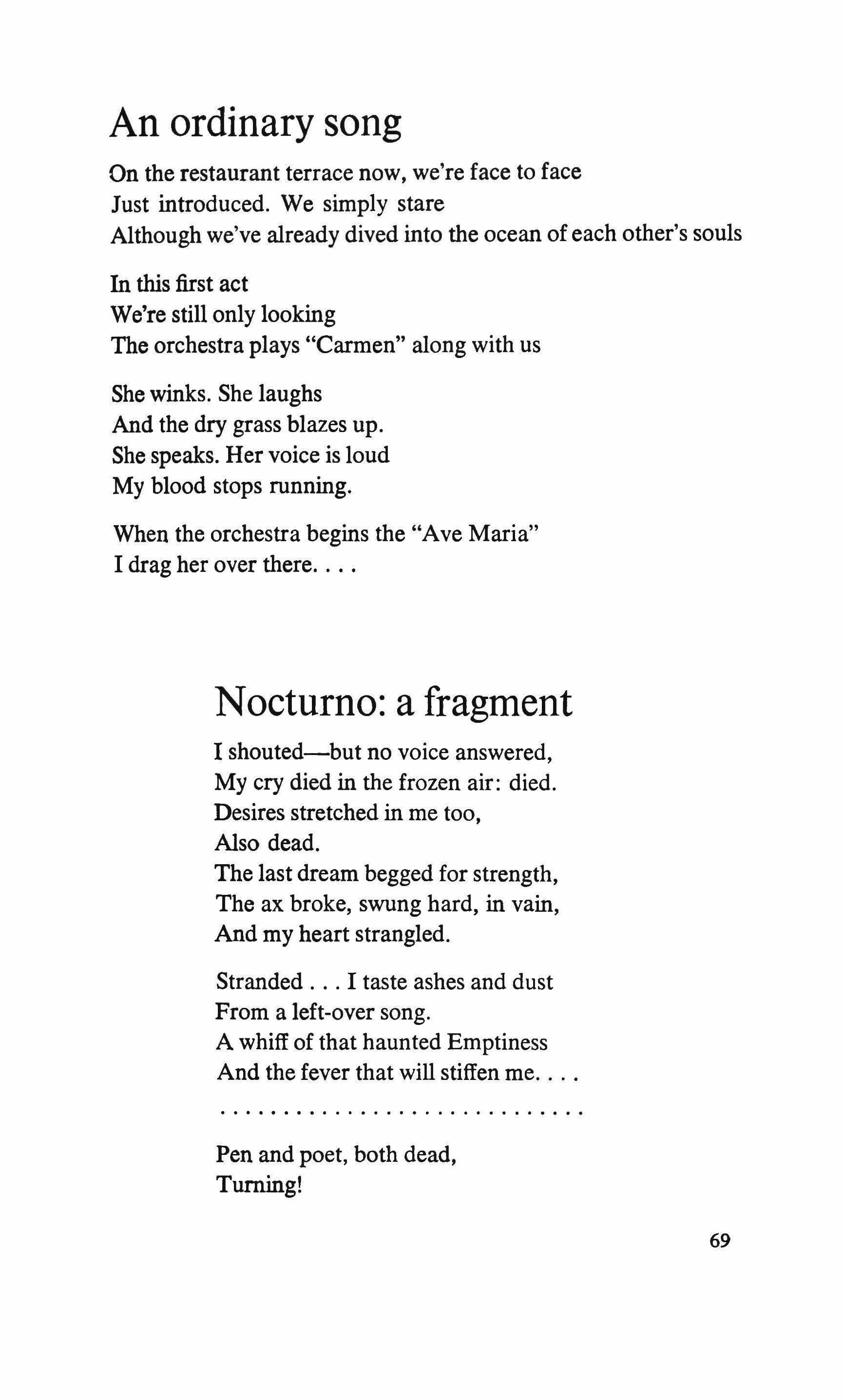
Pen and poet, both dead, Turning!
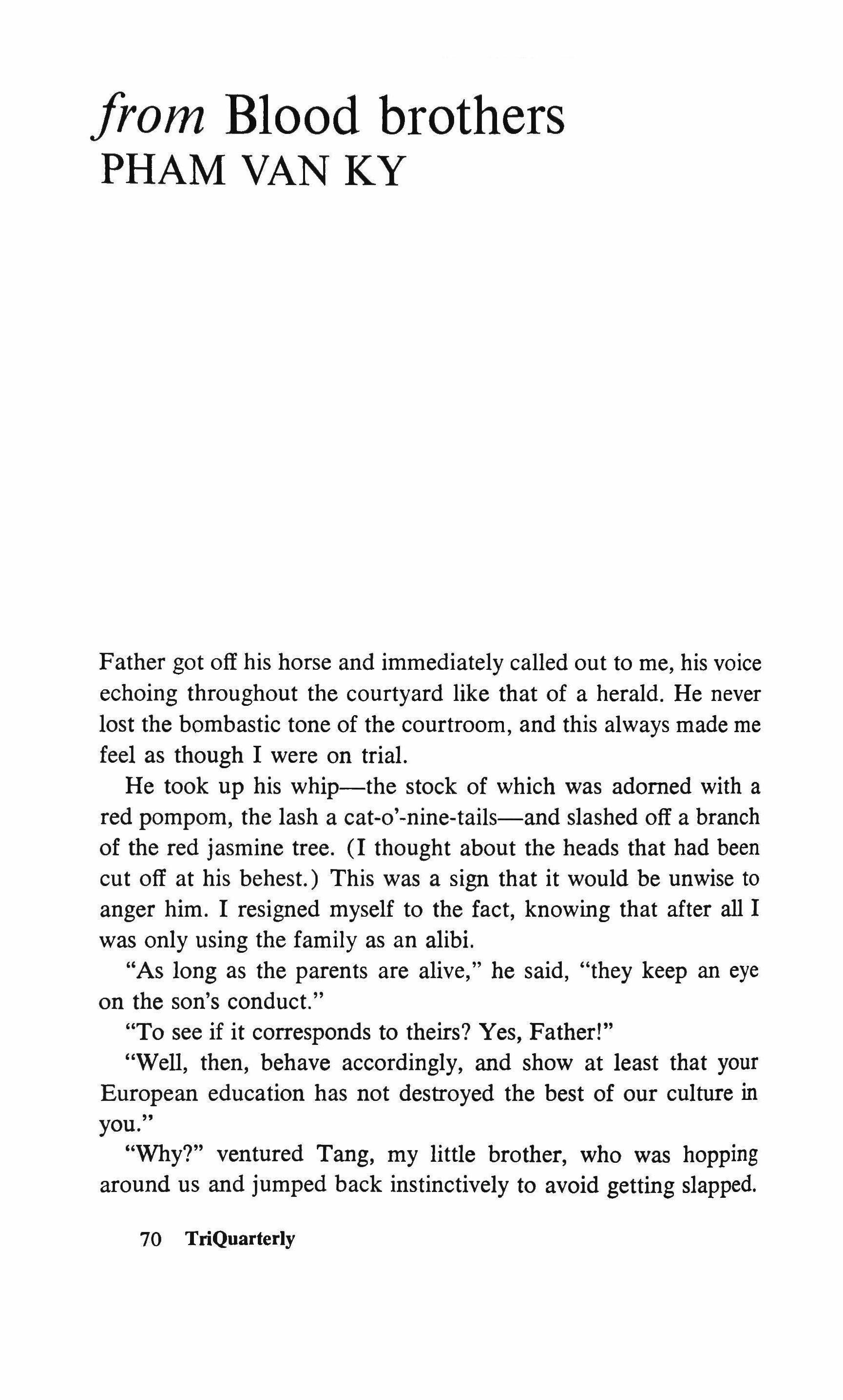
Father got off his horse and immediately called out to me, his voice echoing throughout the courtyard like that of a herald. He never lost the bombastic tone of the courtroom, and this always made me feel as though 1 were on trial.
He took up his whip-the stock of which was adorned with a red pompom, the lash a cat-o'-nine-tails-and slashed off a branch of the red jasmine tree. (I thought about the heads that had been cut off at his behest.) This was a sign that it would be unwise to anger him. 1 resigned myself to the fact, knowing that after all 1 was only using the family as an alibi.
"As long as the parents are alive," he said, "they keep an eye on the son's conduct."
"To see if it corresponds to theirs? Yes, Father!"
"Well, then, behave accordingly, and show at least that your European education has not destroyed the best of our culture in you."
"Why?" ventured Tang, my little brother, who was hopping around us and jumped back instinctively to avoid getting slapped.
70 TriQuarterly
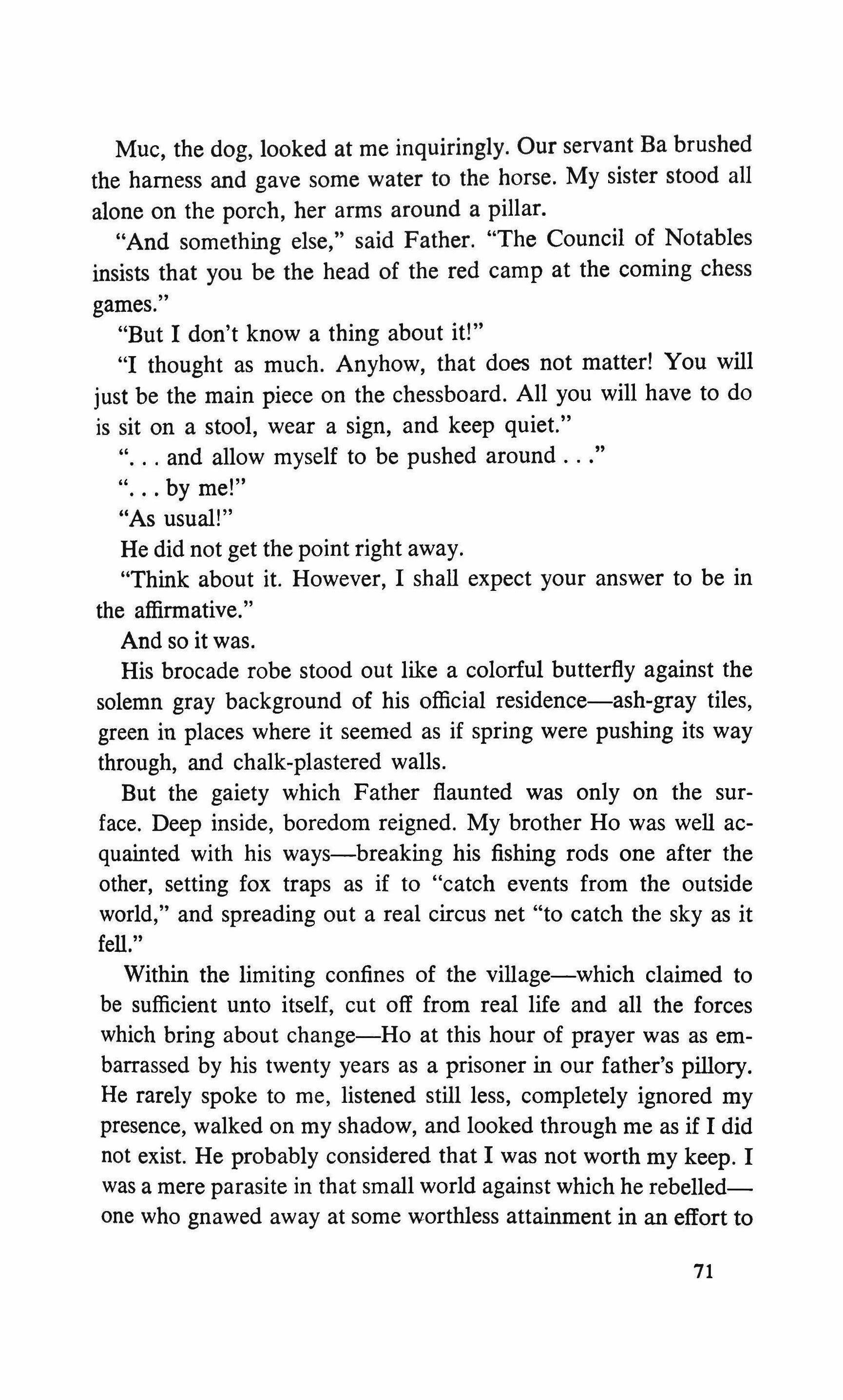
Muc, the dog, looked at me inquiringly. Our servant Ba brushed the harness and gave some water to the horse. My sister stood all alone on the porch, her arms around a pillar.
"And something else," said Father. "The Council of Notables insists that you be the head of the red camp at the coming chess games."
"But I don't know a thing about it!"
"I thought as much. Anyhow, that does not matter! You will just be the main piece on the chessboard. All you will have to do is sit on a stool, wear a sign, and keep quiet." and allow myself to be pushed around by me!"
"As usual!"
He did not get the point right away.
"Think about it. However, I shall expect your answer to be in the affirmative."
And so it was.
His brocade robe stood out like a colorful butterfly against the solemn gray background of his official residence-ash-gray tiles, green in places where it seemed as if spring were pushing its way through, and chalk-plastered walls.
But the gaiety which Father flaunted was only on the surface. Deep inside, boredom reigned. My brother Ho was well acquainted with his ways-breaking his fishing rods one after the other, setting fox traps as if to "catch events from the outside world," and spreading out a real circus net "to catch the sky as it fell."
Within the limiting confines of the village-which claimed to be sufficient unto itself, cut off from real life and all the forces which bring about change-Ho at this hour of prayer was as embarrassed by his twenty years as a prisoner in our father's pillory. He rarely spoke to me, listened still less, completely ignored my presence, walked on my shadow, and looked through me as if I did not exist. He probably considered that I was not worth my keep. I was a mere parasite in that small world against which he rebelledone who gnawed away at some worthless attainment in an effort to
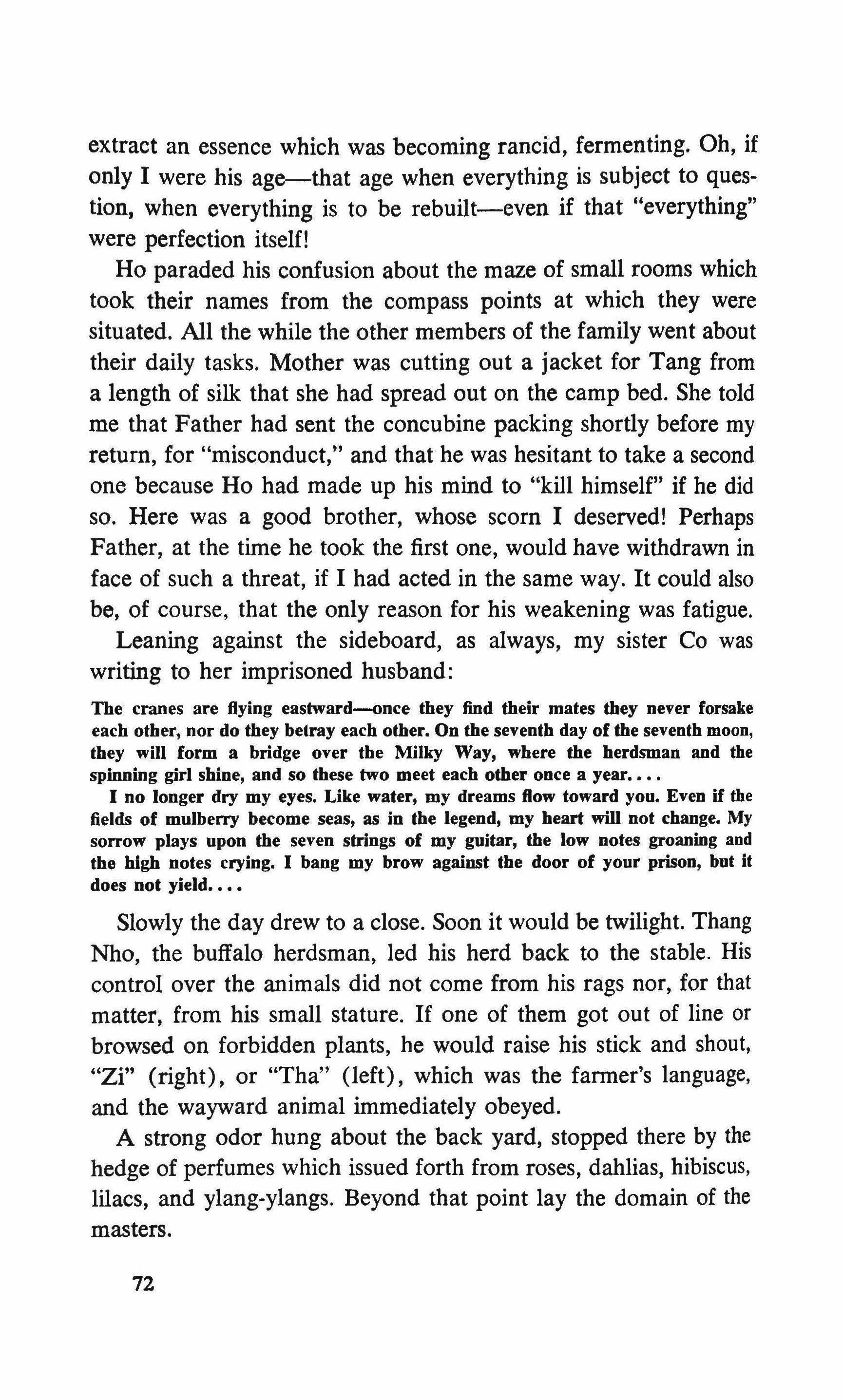
extract an essence which was becoming rancid, fermenting. Oh, if only I were his age-that age when everything is subject to question, when everything is to be rebuilt-even if that "everything" were perfection itself!
Ho paraded his confusion about the maze of small rooms which took their names from the compass points at which they were situated. All the while the other members of the family went about their daily tasks. Mother was cutting out a jacket for Tang from a length of silk that she had spread out on the camp bed. She told me that Father had sent the concubine packing shortly before my return, for "misconduct," and that he was hesitant to take a second one because Ho had made up his mind to "kill himself" if he did so. Here was a good brother, whose scorn I deserved! Perhaps Father, at the time he took the first one, would have withdrawn in face of such a threat, if I had acted in the same way. It could also be, of course, that the only reason for his weakening was fatigue.
Leaning against the sideboard, as always, my sister Co was writing to her imprisoned husband:
The cranes are flying eastward-once they find their mates they never forsake each other, nor do they betray each other. On the seventh day of the seventh moon, they will form a bridge over the Milky Way, where the herdsman and the spinning girl shine, and so these two meet each other once a year
I no longer dry my eyes. Like water, my dreams flow toward you. Even if the fields of mulberry become seas, as in the legend, my heart will not change. My sorrow plays upon the seven strings of my guitar, the low notes groaning and the high notes crying. I bang my brow against the door of your prison, but it does not yield
Slowly the day drew to a close. Soon it would be twilight. Thang Nho, the buffalo herdsman, led his herd back to the stable. His control over the animals did not come from his rags nor, for that matter, from his small stature. If one of them got out of line or browsed on forbidden plants, he would raise his stick and shout, "Zi" (right), or "Tha" (left), which was the farmer's language, and the wayward animal immediately obeyed.
A strong odor hung about the back yard, stopped there by the hedge of perfumes which issued forth from roses, dahlias, hibiscus, lilacs, and ylang-ylangs, Beyond that point lay the domain of the masters.
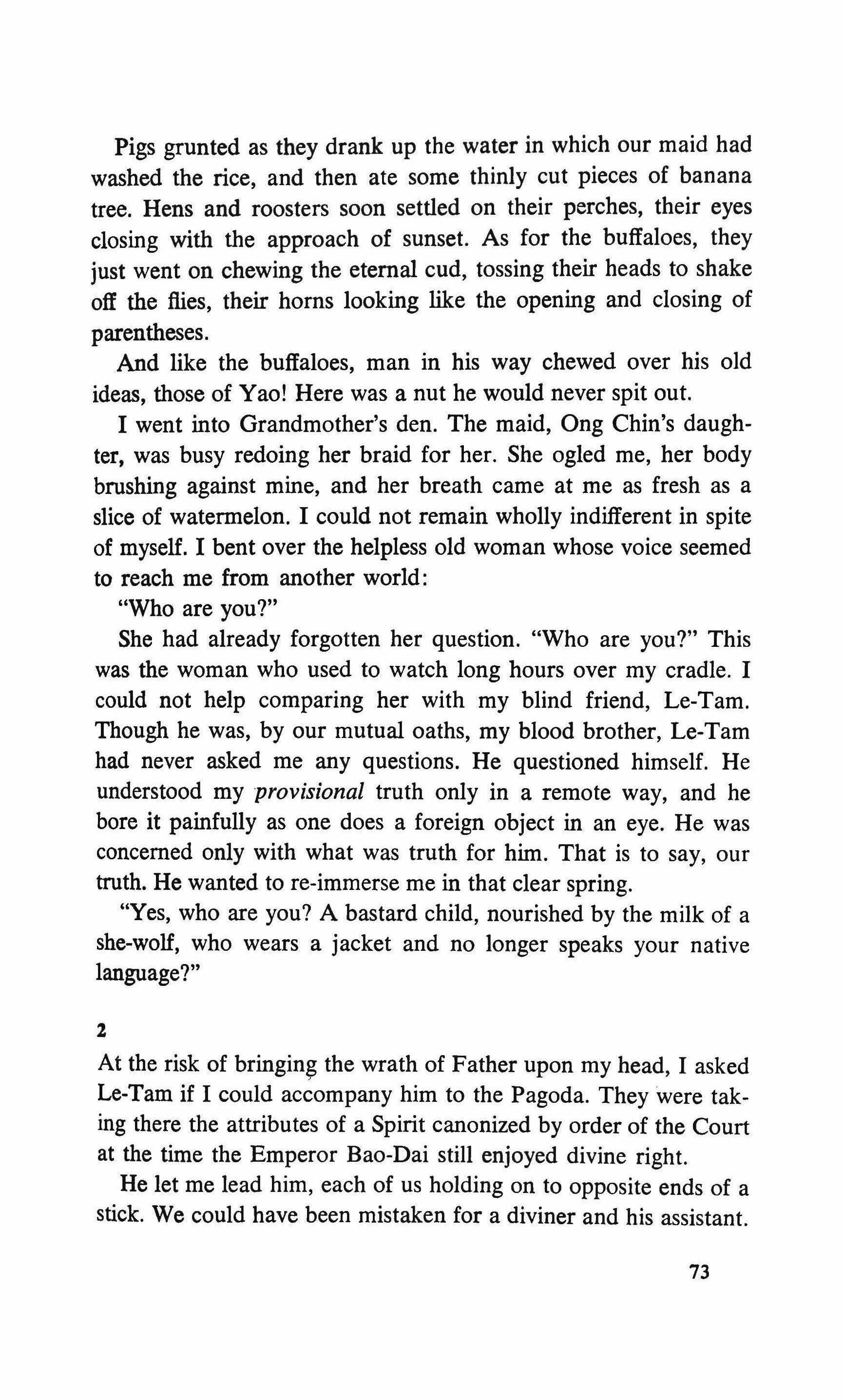
Pigs grunted as they drank up the water in which our maid had washed the rice, and then ate some thinly cut pieces of banana tree. Hens and roosters soon settled on their perches, their eyes closing with the approach of sunset. As for the buffaloes, they just went on chewing the eternal cud, tossing their heads to shake off the flies, their horns looking like the opening and closing of parentheses.
And like the buffaloes, man in his way chewed over his old ideas, those of Yao! Here was a nut he would never spit out.
I went into Grandmother's den. The maid, Ong Chin's daughter, was busy redoing her braid for her. She ogled me, her body brushing against mine, and her breath came at me as fresh as a slice of watermelon. I could not remain wholly indifferent in spite of myself. I bent over the helpless old woman whose voice seemed to reach me from another world:
"Who are you?"
She had already forgotten her question. "Who are you?" This was the woman who used to watch long hours over my cradle. I could not help comparing her with my blind friend, Le-Tam. Though he was, by our mutual oaths, my blood brother, Le-Tam had never asked me any questions. He questioned himself. He understood my provisional truth only in a remote way, and he bore it painfully as one does a foreign object in an eye. He was concerned only with what was truth for him. That is to say, our truth. He wanted to re-immerse me in that clear spring.
"Yes, who are you? A bastard child, nourished by the milk of a she-wolf, who wears a jacket and no longer speaks your native language?"
2
At the risk of bringing the wrath of Father upon my head, I asked Le-Tam if I could accompany him to the Pagoda. They were taking there the attributes of a Spirit canonized by order of the Court at the time the Emperor Bao-Dai still enjoyed divine right. He let me lead him, each of us holding on to opposite ends of a stick. We could have been mistaken for a diviner and his assistant.
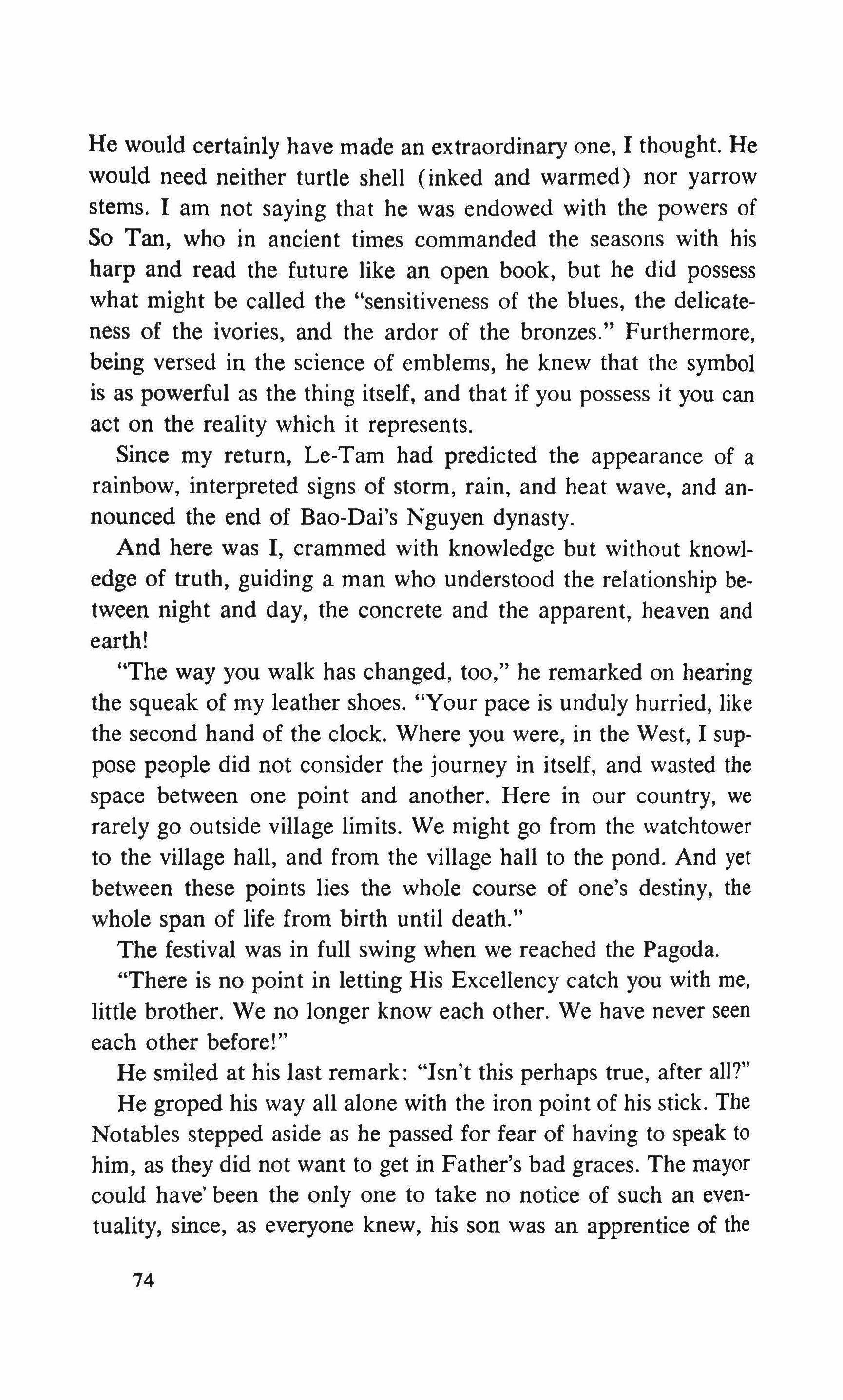
He would certainly have made an extraordinary one, I thought. He would need neither turtle shell (inked and warmed) nor yarrow stems. I am not saying that he was endowed with the powers of So Tan, who in ancient times commanded the seasons with his harp and read the future like an open book, but he did possess what might be called the "sensitiveness of the blues, the delicateness of the ivories, and the ardor of the bronzes." Furthermore, being versed in the science of emblems, he knew that the symbol is as powerful as the thing itself, and that if you possess it you can act on the reality which it represents.
Since my return, Le-Tam had predicted the appearance of a rainbow, interpreted signs of storm, rain, and heat wave, and announced the end of Bao-Dai's Nguyen dynasty.
And here was I, crammed with knowledge but without knowledge of truth, guiding a man who understood the relationship between night and day, the concrete and the apparent, heaven and earth!
"The way you walk has changed, too," he remarked on hearing the squeak of my leather shoes. "Your pace is unduly hurried, like the second hand of the clock. Where you were, in the West, I suppose people did not consider the journey in itself, and wasted the space between one point and another. Here in our country, we rarely go outside village limits. We might go from the watchtower to the village hall, and from the village hall to the pond. And yet between these points lies the whole course of one's destiny, the whole span of life from birth until death."
The festival was in full swing when we reached the Pagoda.
"There is no point in letting His Excellency catch you with me, little brother. We no longer know each other. We have never seen each other before!"
He smiled at his last remark: "Isn't this perhaps true, after all?"
He groped his way all alone with the iron point of his stick. The Notables stepped aside as he passed for fear of having to speak to him, as they did not want to get in Father's bad graces. The mayor could have' been the only one to take no notice of such an eventuality, since, as everyone knew, his son was an apprentice of the
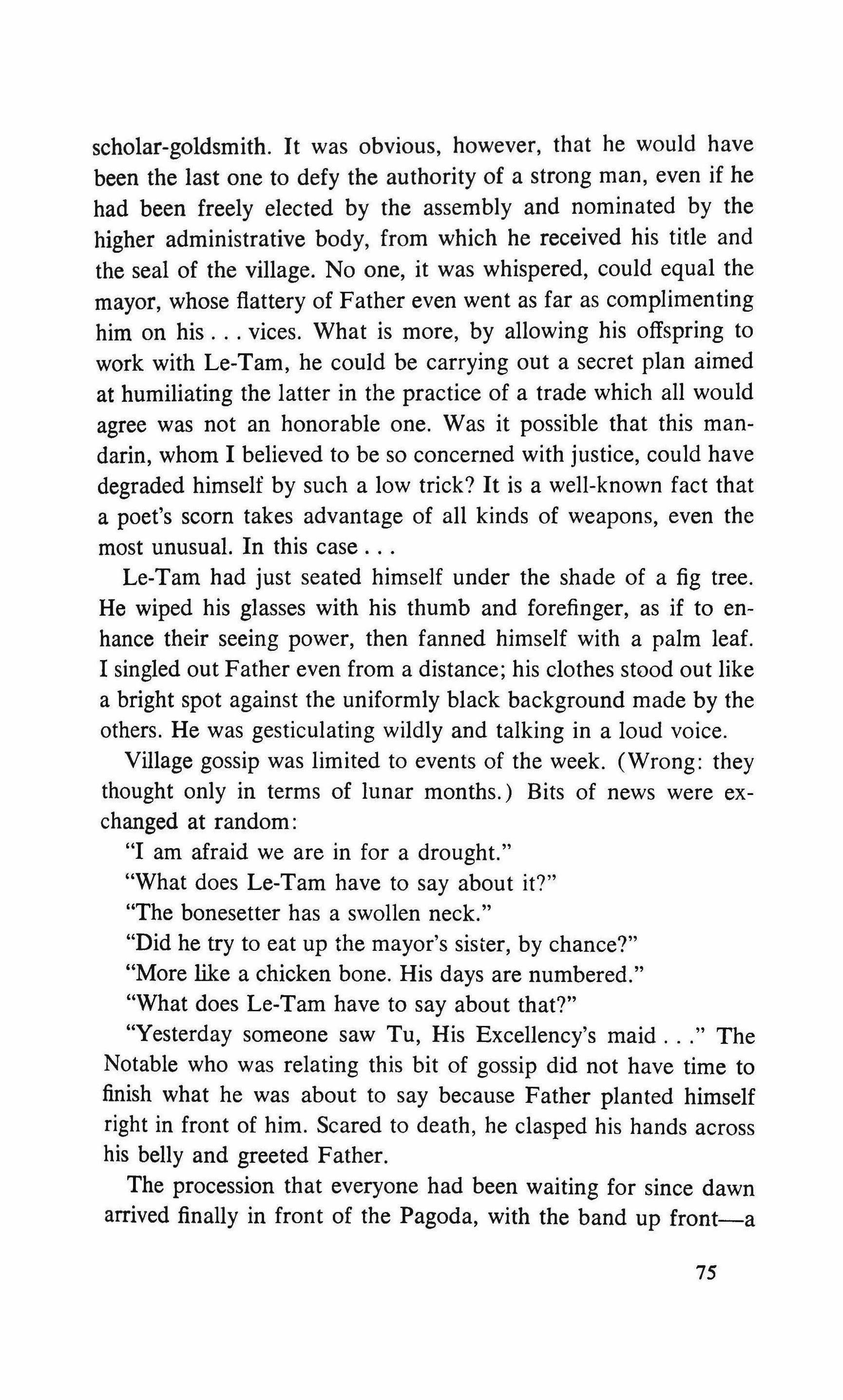
scholar-goldsmith. It was obvious, however, that he would have been the last one to defy the authority of a strong man, even if he had been freely elected by the assembly and nominated by the higher administrative body, from which he received his title and the seal of the village. No one, it was whispered, could equal the mayor, whose flattery of Father even went as far as complimenting him on his vices. What is more, by allowing his offspring to work with Le-Tam, he could be carrying out a secret plan aimed at humiliating the latter in the practice of a trade which all would agree was not an honorable one. Was it possible that this mandarin, whom I believed to be so concerned with justice, could have degraded himself by such a low trick? It is a well-known fact that a poet's scorn takes advantage of all kinds of weapons, even the most unusual. In this case
Le-Tam had just seated himself under the shade of a fig tree. He wiped his glasses with his thumb and forefinger, as if to enhance their seeing power, then fanned himself with a palm leaf. I singled out Father even from a distance; his clothes stood out like a bright spot against the uniformly black background made by the others. He was gesticulating wildly and talking in a loud voice.
Village gossip was limited to events of the week. (Wrong: they thought only in terms of lunar months.) Bits of news were exchanged at random:
"I am afraid we are in for a drought."
"What does Le-Tam have to say about it?"
"The bonesetter has a swollen neck."
"Did he try to eat up the mayor's sister, by chance?"
"More like a chicken bone. His days are numbered."
"What does Le-Tam have to say about that?"
"Yesterday someone saw Tu, His Excellency's maid The Notable who was relating this bit of gossip did not have time to finish what he was about to say because Father planted himself right in front of him. Scared to death, he clasped his hands across his belly and greeted Father.
The procession that everyone had been waiting for since dawn arrived finally in front of the Pagoda, with the band up front-a
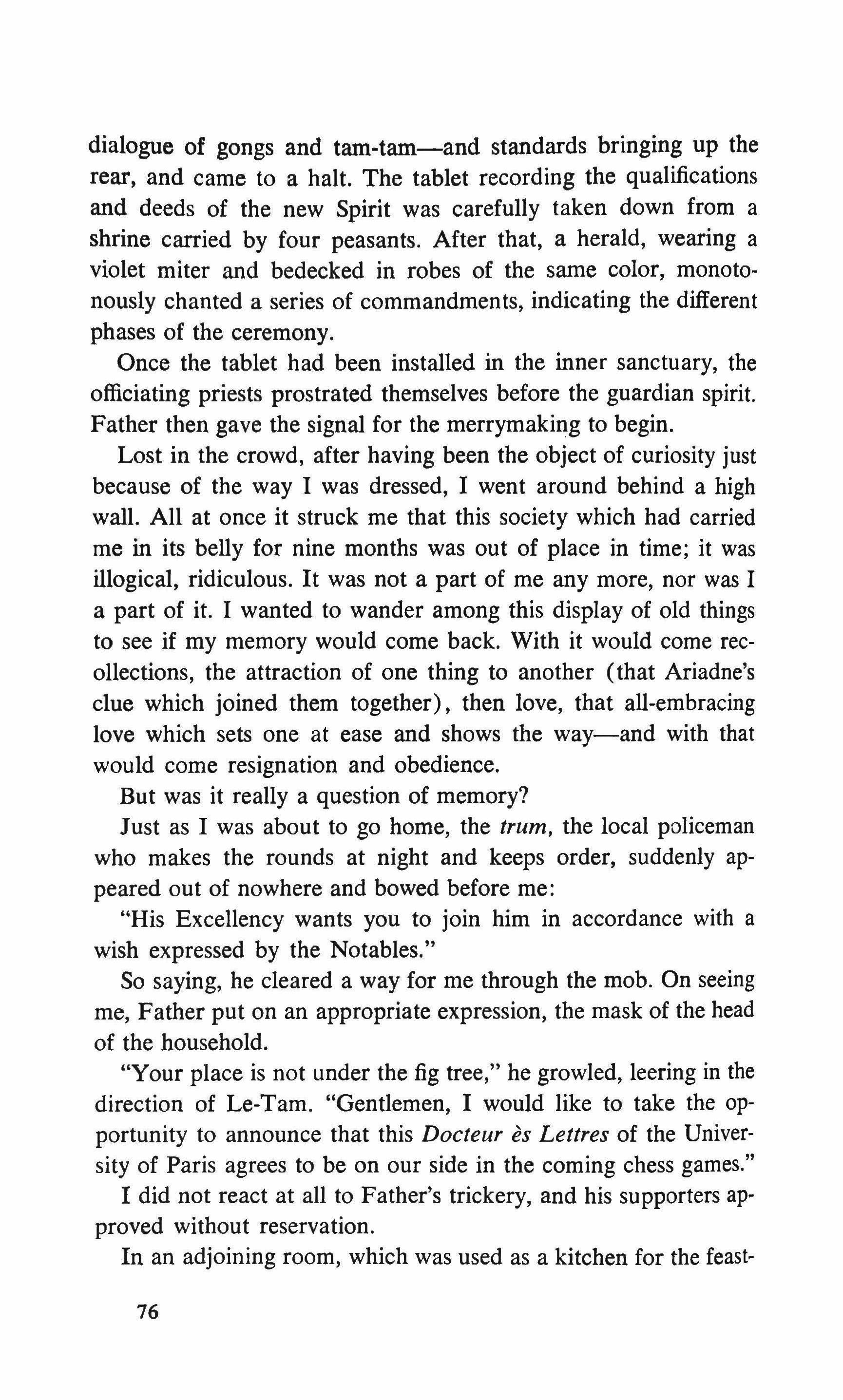
dialogue of gongs and tam-tam-and standards bringing up the rear, and came to a halt. The tablet recording the qualifications and deeds of the new Spirit was carefully taken down from a shrine carried by four peasants. After that, a herald, wearing a violet miter and bedecked in robes of the same color, monotonously chanted a series of commandments, indicating the different phases of the ceremony.
Once the tablet had been installed in the inner sanctuary, the officiating priests prostrated themselves before the guardian spirit. Father then gave the signal for the merrymaking to begin.
Lost in the crowd, after having been the object of curiosity just because of the way I was dressed, I went around behind a high wall. All at once it struck me that this society which had carried me in its belly for nine months was out of place in time; it was illogical, ridiculous. It was not a part of me any more, nor was I a part of it. I wanted to wander among this display of old things to see if my memory would come back. With it would come recollections, the attraction of one thing to another (that Ariadne's clue which joined them together), then love, that all-embracing love which sets one at ease and shows the way-and with that would come resignation and obedience.
But was it really a question of memory?
Just as I was about to go home, the trum, the local policeman who makes the rounds at night and keeps order, suddenly appeared out of nowhere and bowed before me:
"His Excellency wants you to join him in accordance with a wish expressed by the Notables."
So saying, he cleared a way for me through the mob. On seeing me, Father put on an appropriate expression, the mask of the head of the household.
"Your place is not under the fig tree," he growled, leering in the direction of Le-Tam. "Gentlemen, I would like to take the opportunity to announce that this Docteur es Lettres of the University of Paris agrees to be on our side in the coming chess games."
I did not react at all to Father's trickery, and his supporters approved without reservation.
In an adjoining room, which was used as a kitchen for the feast-
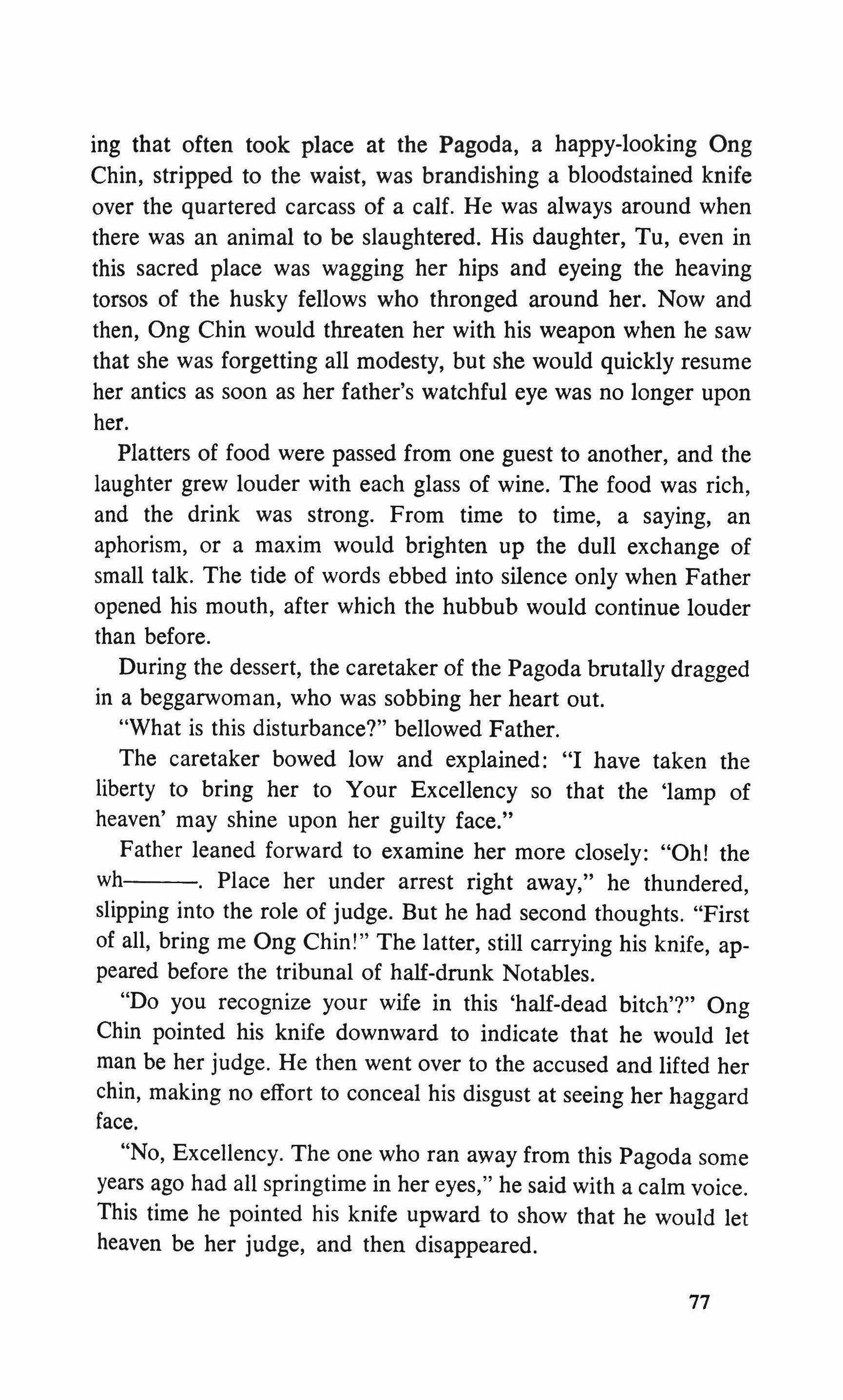
ing that often took place at the Pagoda, a happy-looking Ong Chin, stripped to the waist, was brandishing a bloodstained knife over the quartered carcass of a calf. He was always around when there was an animal to be slaughtered. His daughter, Tu, even in this sacred place was wagging her hips and eyeing the heaving torsos of the husky fellows who thronged around her. Now and then, Ong Chin would threaten her with his weapon when he saw that she was forgetting all modesty, but she would quickly resume her antics as soon as her father's watchful eye was no longer upon her.
Platters of food were passed from one guest to another, and the laughter grew louder with each glass of wine. The food was rich, and the drink was strong. From time to time, a saying, an aphorism, or a maxim would brighten up the dull exchange of small talk. The tide of words ebbed into silence only when Father opened his mouth, after which the hubbub would continue louder than before.
During the dessert, the caretaker of the Pagoda brutally dragged in a beggarwoman, who was sobbing her heart out.
"What is this disturbance?" bellowed Father.
The caretaker bowed low and explained: "I have taken the liberty to bring her to Your Excellency so that the 'lamp of heaven' may shine upon her guilty face."
Father leaned forward to examine her more closely: "Oh! the wh Place her under arrest right away," he thundered, slipping into the role of judge. But he had second thoughts. "First of all, bring me Ong Chin!" The latter, still carrying his knife, appeared before the tribunal of half-drunk Notables.
"Do you recognize your wife in this 'half-dead bitch'?" Ong Chin pointed his knife downward to indicate that he would let man be her judge. He then went over to the accused and lifted her chin, making no effort to conceal his disgust at seeing her haggard face.
"No, Excellency. The one who ran away from this Pagoda some years ago had all springtime in her eyes," he said with a calm voice. This time he pointed his knife upward to show that he would let heaven be her judge, and then disappeared.
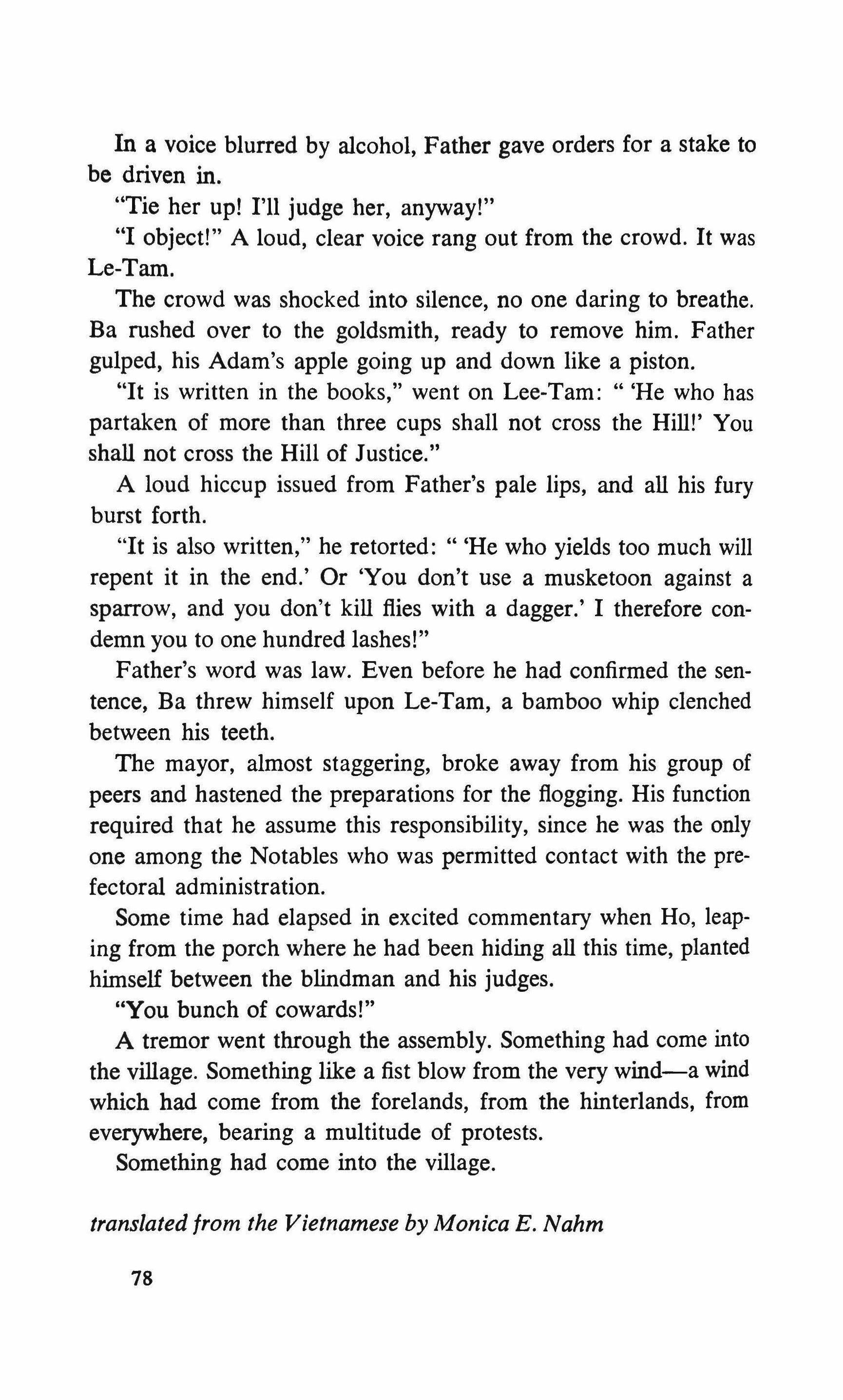
In a voice blurred by alcohol, Father gave orders for a stake to be driven in.
"Tie her up! I'll judge her, anyway!"
"I object!" A loud, clear voice rang out from the crowd. It was Le-Tam.
The crowd was shocked into silence, no one daring to breathe. Ba rushed over to the goldsmith, ready to remove him. Father gulped, his Adam's apple going up and down like a piston.
"It is written in the books," went on Lee-Tam: "'He who has partaken of more than three cups shall not cross the Hill!' You shall not cross the Hill of Justice."
A loud hiccup issued from Father's pale lips, and all his fury burst forth.
"It is also written," he retorted: "'He who yields too much will repent it in the end.' Or 'You don't use a musketoon against a sparrow, and you don't kill flies with a dagger.' I therefore condemn you to one hundred lashes!"
Father's word was law. Even before he had confirmed the sentence, Ba threw himself upon Le-Tam, a bamboo whip clenched between his teeth.
The mayor, almost staggering, broke away from his group of peers and hastened the preparations for the flogging. His function required that he assume this responsibility, since he was the only one among the Notables who was permitted contact with the prefectoral administration.
Some time had elapsed in excited commentary when Ho, leaping from the porch where he had been hiding all this time, planted himself between the blindman and his judges.
"You bunch of cowards!"
A tremor went through the assembly. Something had come into the village. Something like a fist blow from the very wind-a wind which had come from the forelands, from the hinterlands, from everywhere, bearing a multitude of protests.
Something had come into the village.
translated from the Vietnamese by Monica E. Nahm
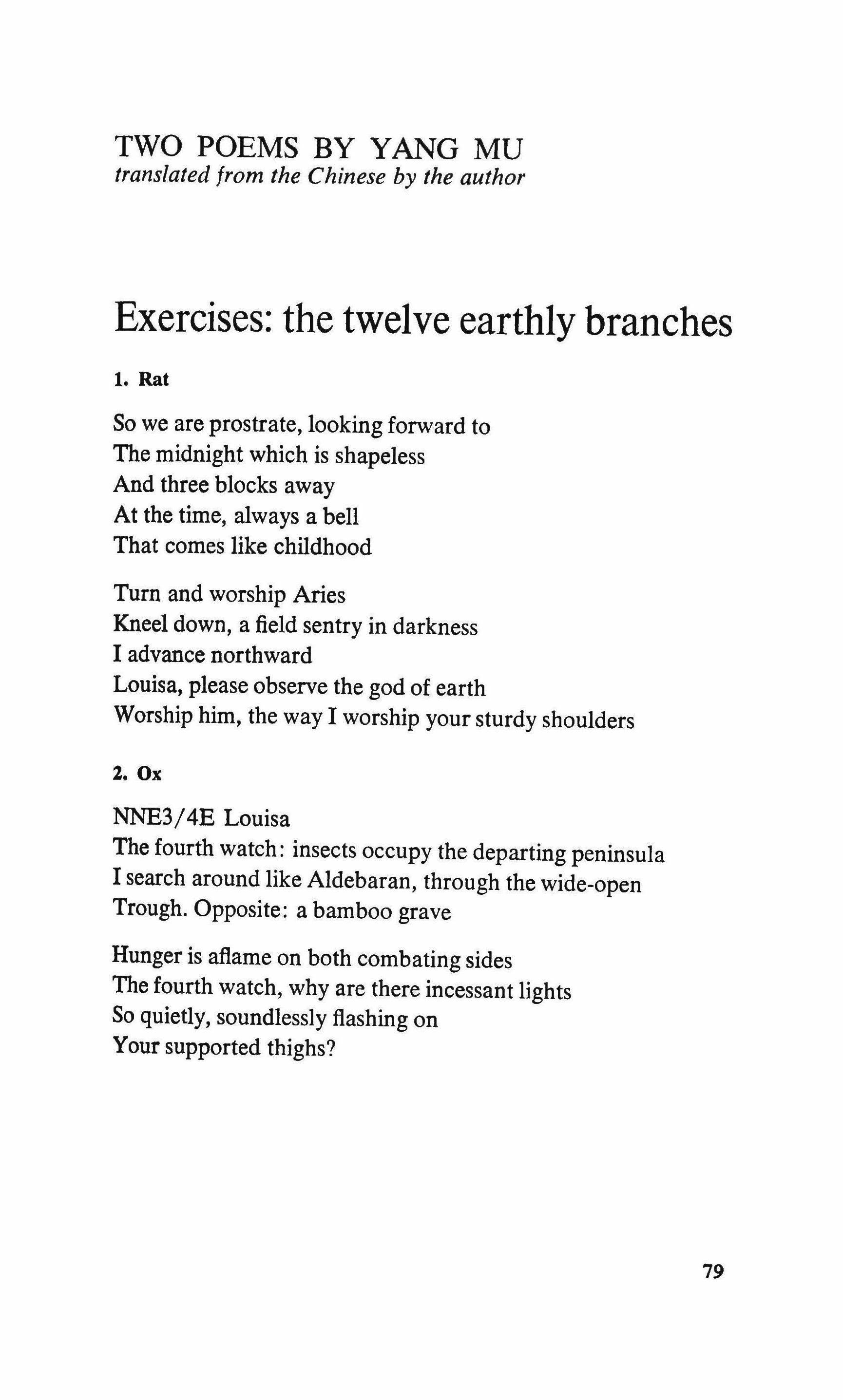
translated from the Chinese by the author
1. Rat
So we are prostrate, looking forward to The midnight which is shapeless
And three blocks away
At the time, always a bell That comes like childhood
Turn and worship Aries
Kneel down, a field sentry in darkness I advance northward
Louisa, please observe the god of earth
Worship him, the way I worship your sturdy shoulders
2. Ox
NNE3/4E Louisa
The fourth watch: insects occupy the departing peninsula I search around like Aldebaran, through the wide-open Trough. Opposite: a bamboo grave
Hunger is aflame on both combating sides
The fourth watch, why are there incessant lights
So quietly, soundlessly flashing on Your supported thighs?
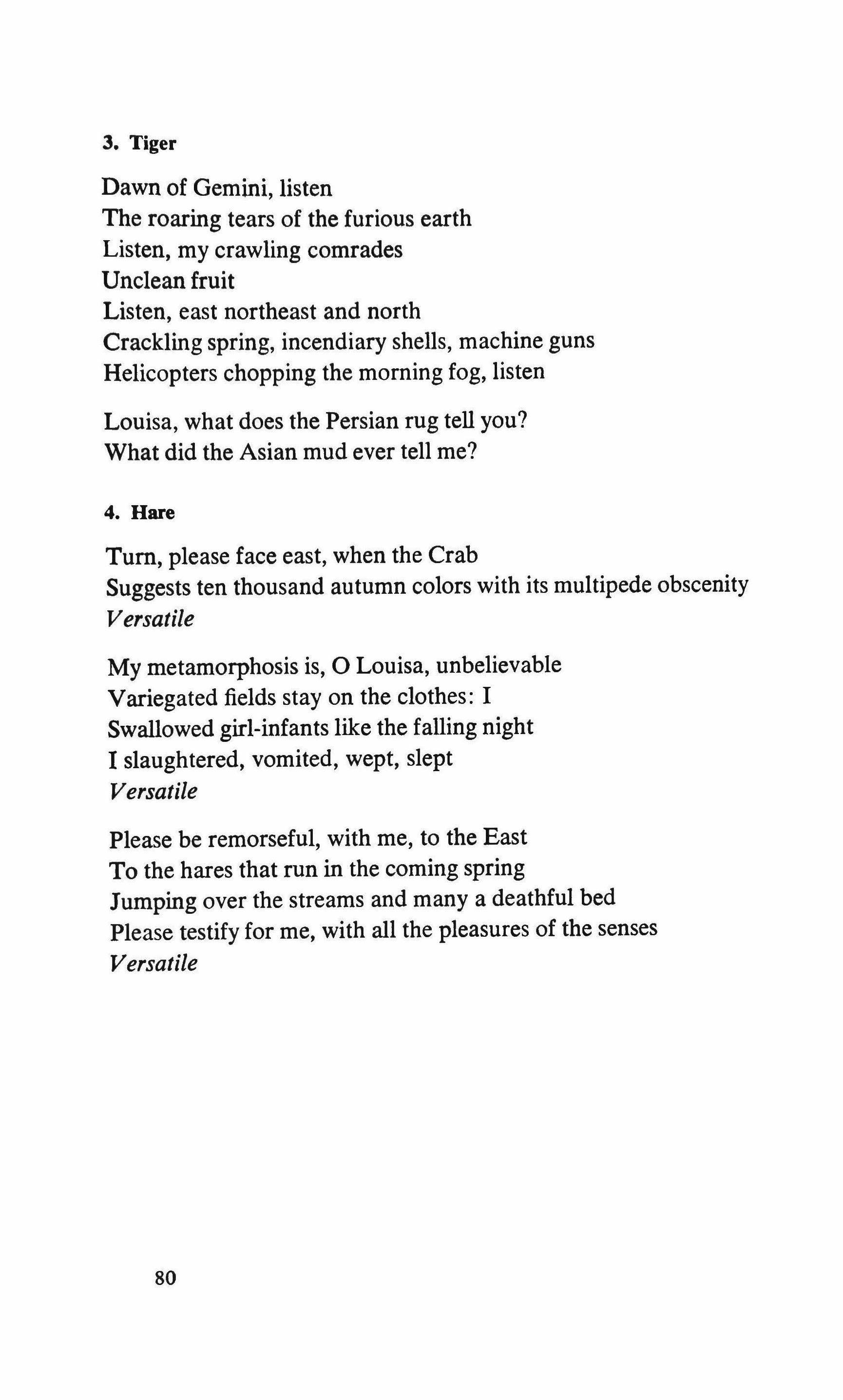
3. Tiger
Dawn of Gemini, listen
The roaring tears of the furious earth
Listen, my crawling comrades
Unclean fruit
Listen, east northeast and north
Crackling spring, incendiary shells, machine guns
Helicopters chopping the morning fog, listen
Louisa, what does the Persian rug tell you?
What did the Asian mud ever tell me?
4. Hare
Turn, please face east, when the Crab
Suggests ten thousand autumn colors with its multipede obscenity
Versatile
My metamorphosis is, 0 Louisa, unbelievable
Variegated fields stay on the clothes: I
Swallowed girl-infants like the falling night
I slaughtered, vomited, wept, slept
Versatile
Please be remorseful, with me, to the East
To the hares that run in the coming spring
Jumping over the streams and many a deathful bed
Please testify for me, with all the pleasures of the senses
Versatile
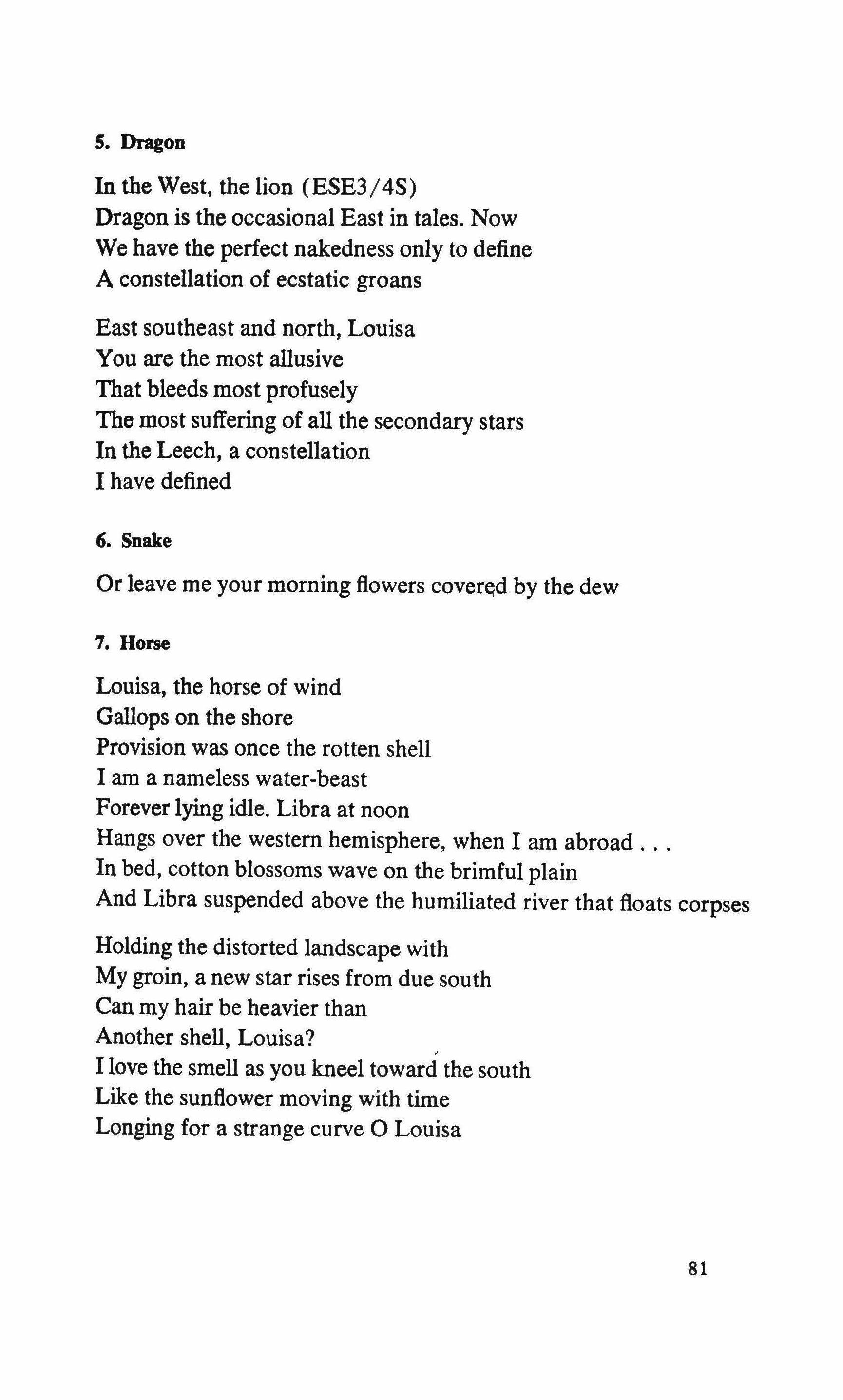
s. Dragon
In the West, the lion (ESE3/4S)
Dragon is the occasional East in tales. Now We have the perfect nakedness only to define A constellation of ecstatic groans
East southeast and north, Louisa
You are the most allusive That bleeds most profusely
The most suffering of all the secondary stars
In the Leech, a constellation
I have defined
6. Snake
Or leave me your morning flowers covered by the dew
7. Horse
Louisa, the horse of wind
Gallops on the shore
Provision was once the rotten shell
I am a nameless water-beast
Forever lying idle. Libra at noon
Hangs over the western hemisphere, when I am abroad
In bed, cotton blossoms wave on the brimful plain
And Libra suspended above the humiliated river that floats corpses
Holding the distorted landscape with My groin, a new star rises from due south
Can my hair be heavier than Another shell, Louisa?
I love the smell as you kneel toward the south
Like the sunflower moving with time
Longing for a strange curve 0 Louisa
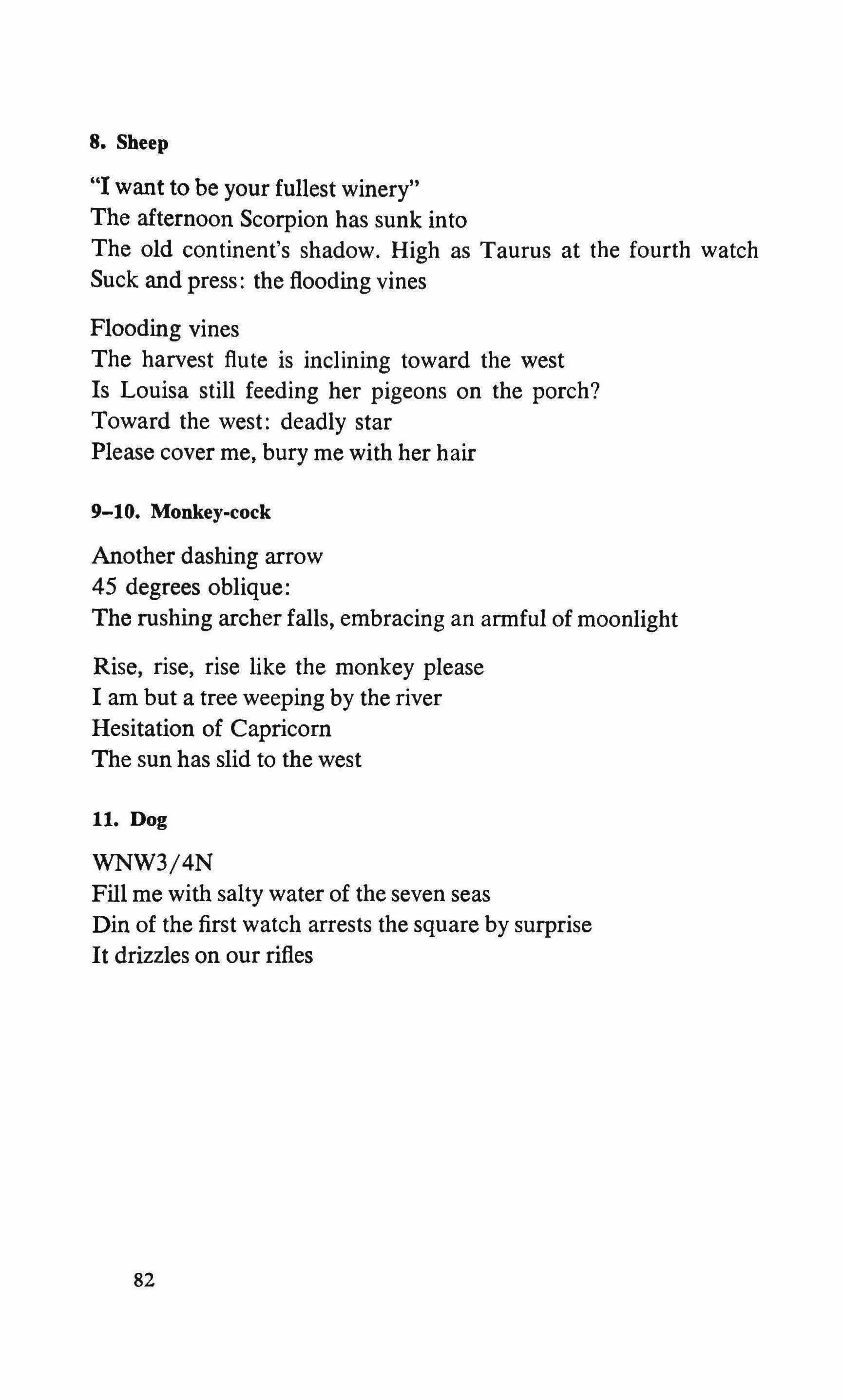
8. Sbeep
"I want to be your fullest winery"
The afternoon Scorpion has sunk into The old continent's shadow. High as Taurus at the fourth watch
Suck and press: the flooding vines
Flooding vines
The harvest flute is inclining toward the west Is Louisa still feeding her pigeons on the porch?
Toward the west: deadly star
Please cover me, bury me with her hair
9-10. Monkey-cock
Another dashing arrow
45 degrees oblique:
The rushing archer falls, embracing an armful of moonlight
Rise, rise, rise like the monkey please I am but a tree weeping by the river
Hesitation of Capricorn
The sun has slid to the west
11. Dog
WNW3/4N
Fill me with salty water of the seven seas
Din of the first watch arrests the square by surprise It drizzles on our rifles
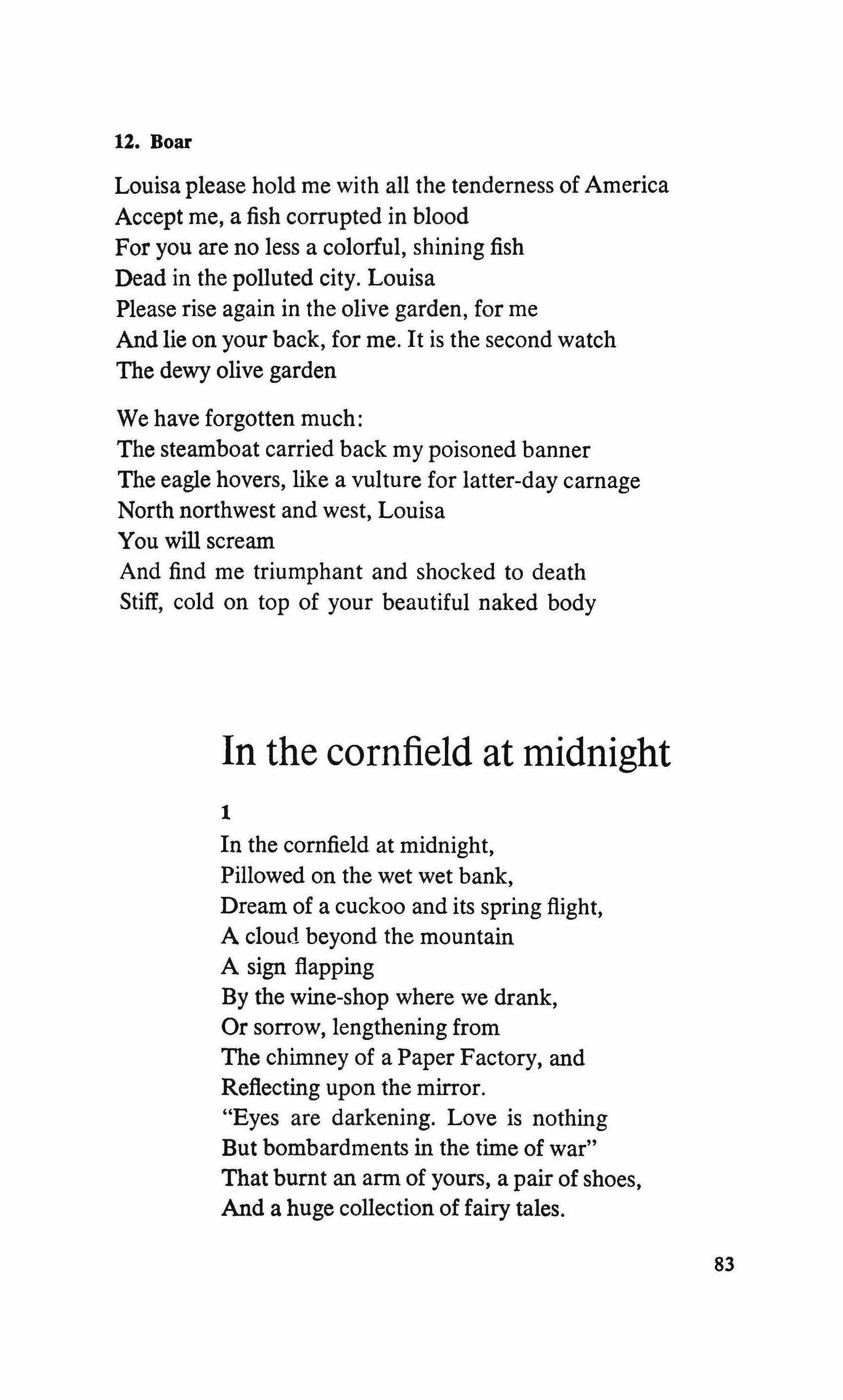
12. Boar
Louisa please hold me with all the tenderness of America
Accept me, a fish corrupted in blood
For you are no less a colorful, shining fish
Dead in the polluted city. Louisa
Please rise again in the olive garden, for me
And lie on your back, for me. It is the second watch
The dewy olive garden
We have forgotten much:
The steamboat carried back my poisoned banner
The eagle hovers, like a vulture for latter-day carnage
North northwest and west, Louisa
You will scream
And find me triumphant and shocked to death
Stiff, cold on top of your beautiful naked body
1
In the cornfield at midnight, Pillowed on the wet wet bank, Dream of a cuckoo and its spring flight, A cloud beyond the mountain A sign flapping
By the wine-shop where we drank, Or sorrow, lengthening from The chimney of a Paper Factory, and Reflecting upon the mirror. "Eyes are darkening. Love is nothing But bombardments in the time of war"
That burnt an arm of yours, a pair of shoes, And a huge collection of fairy tales.
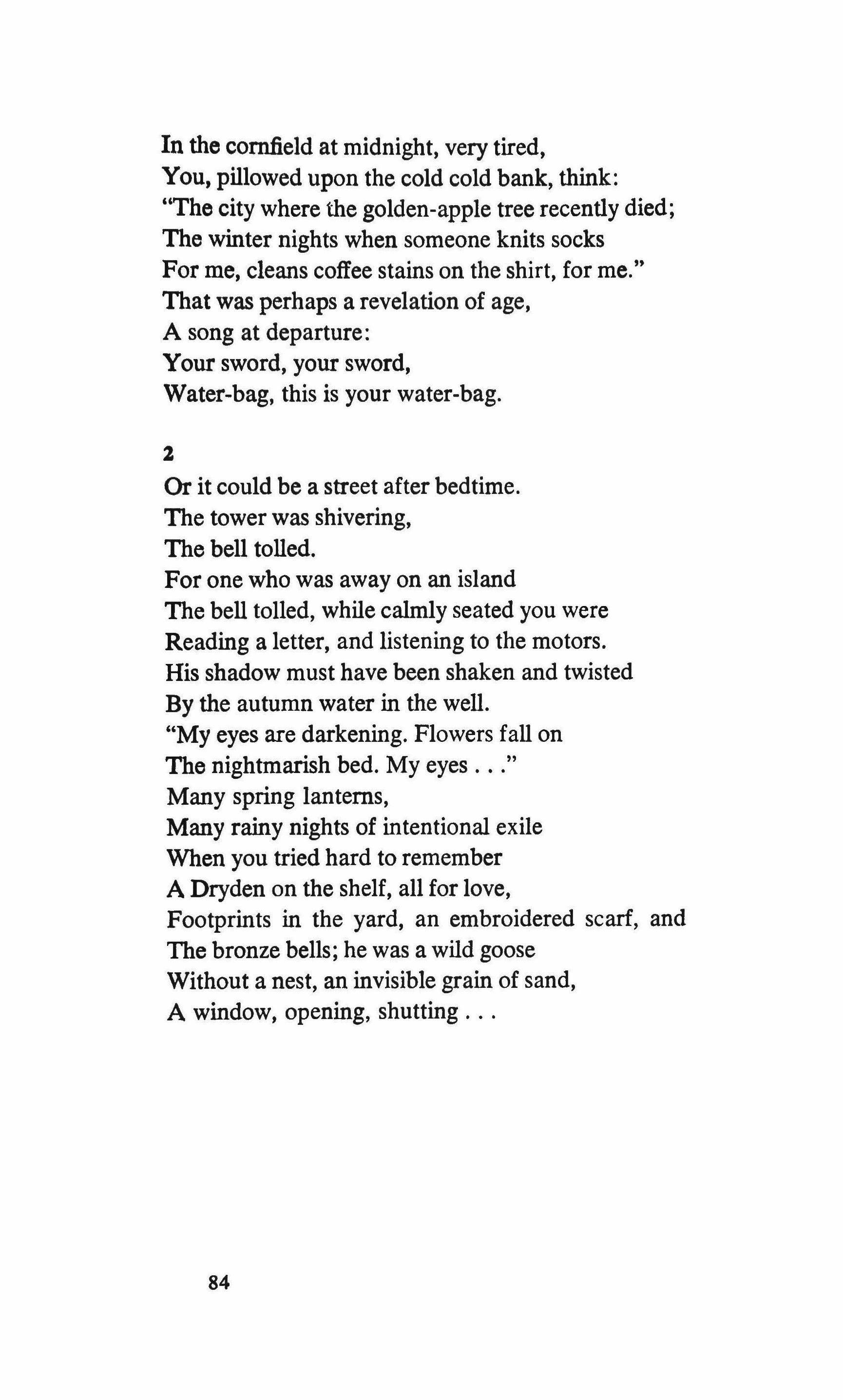
In the cornfield at midnight, very tired, You, pillowed upon the cold cold bank, think: "The city where the golden-apple tree recently died; The winter nights when someone knits socks For me, cleans coffee stains on the shirt, for me."
That was perhaps a revelation of age, A song at departure: Your sword, your sword, Water-bag, this is your water-bag.
2
Or it could be a street after bedtime. The tower was shivering, The bell tolled.
For one who was away on an island The bell tolled, while calmly seated you were Reading a letter, and listening to the motors. His shadow must have been shaken and twisted By the autumn water in the well.
"My eyes are darkening. Flowers fall on The nightmarish bed. My eyes Many spring lanterns, Many rainy nights of intentional exile When you tried hard to remember A Dryden on the shelf, all for love, Footprints in the yard, an embroidered scarf, and The bronze bells; he was a wild goose Without a nest, an invisible grain of sand, A window, opening, shutting
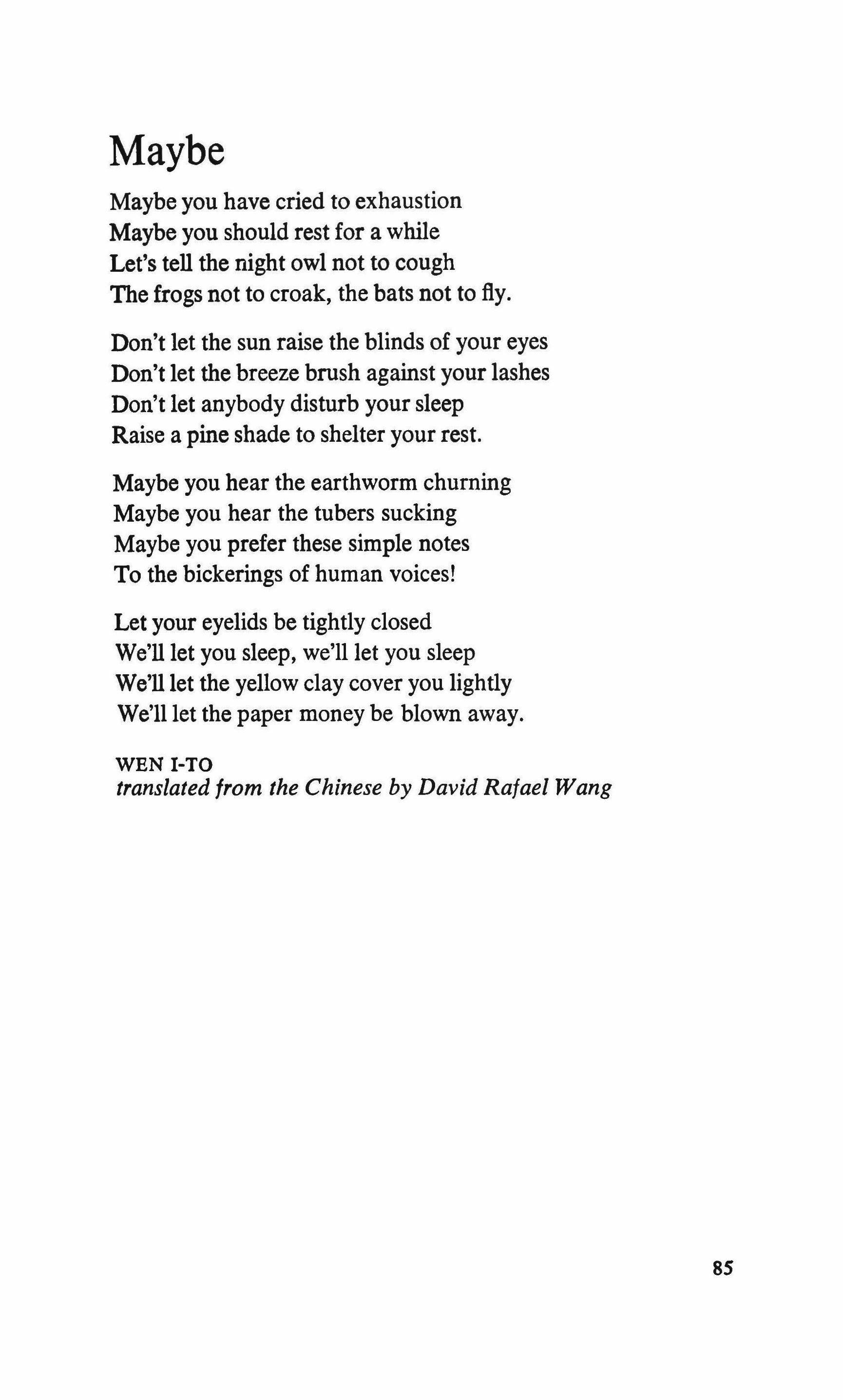
Maybe you have cried to exhaustion
Maybe you should rest for a while
Let's tell the night owl not to cough
The frogs not to croak, the bats not to fly.
Don't let the sun raise the blinds of your eyes
Don't let the breeze brush against your lashes
Don't let anybody disturb your sleep
Raise a pine shade to shelter your rest.
Maybe you hear the earthworm churning
Maybe you hear the tubers sucking
Maybe you prefer these simple notes
To the bickerings of human voices!
Let your eyelids be tightly closed
We'll let you sleep, we'll let you sleep
We'll let the yellow clay cover you lightly
We'll let the paper money be blown away.
WEN I-TO
translated from the Chinese by David Rafael Wang
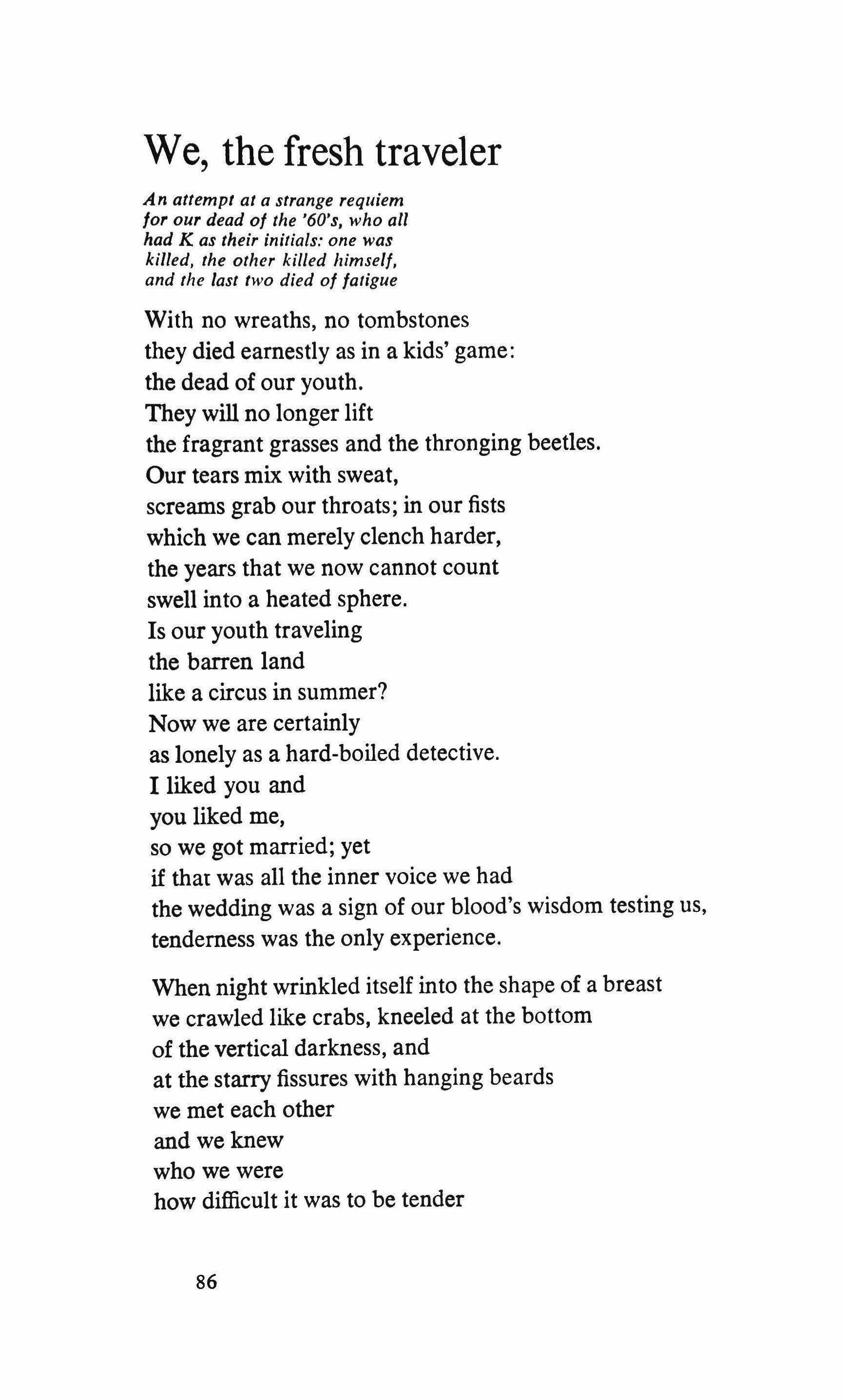
An attempt at a strange requiem lor our dead of the '60's, who all had K as their initials; one was killed. the other killed himself. and the last two died of fatigue
With no wreaths, no tombstones they died earnestly as in a kids' game: the dead of our youth. They will no longer lift the fragrant grasses and the thronging beetles. Our tears mix with sweat, screams grab our throats; in our fists which we can merely clench harder, the years that we now cannot count swell into a heated sphere. Is our youth traveling the barren land like a circus in summer?
Now we are certainly as lonely as a hard-boiled detective. I liked you and you liked me, so we got married; yet if that was all the inner voice we had the wedding was a sign of our blood's wisdom testing us, tenderness was the only experience.
When night wrinkled itself into the shape of a breast we crawled like crabs, kneeled at the bottom of the vertical darkness, and at the starry fissures with hanging beards we met each other and we knew who we were how difficult it was to be tender
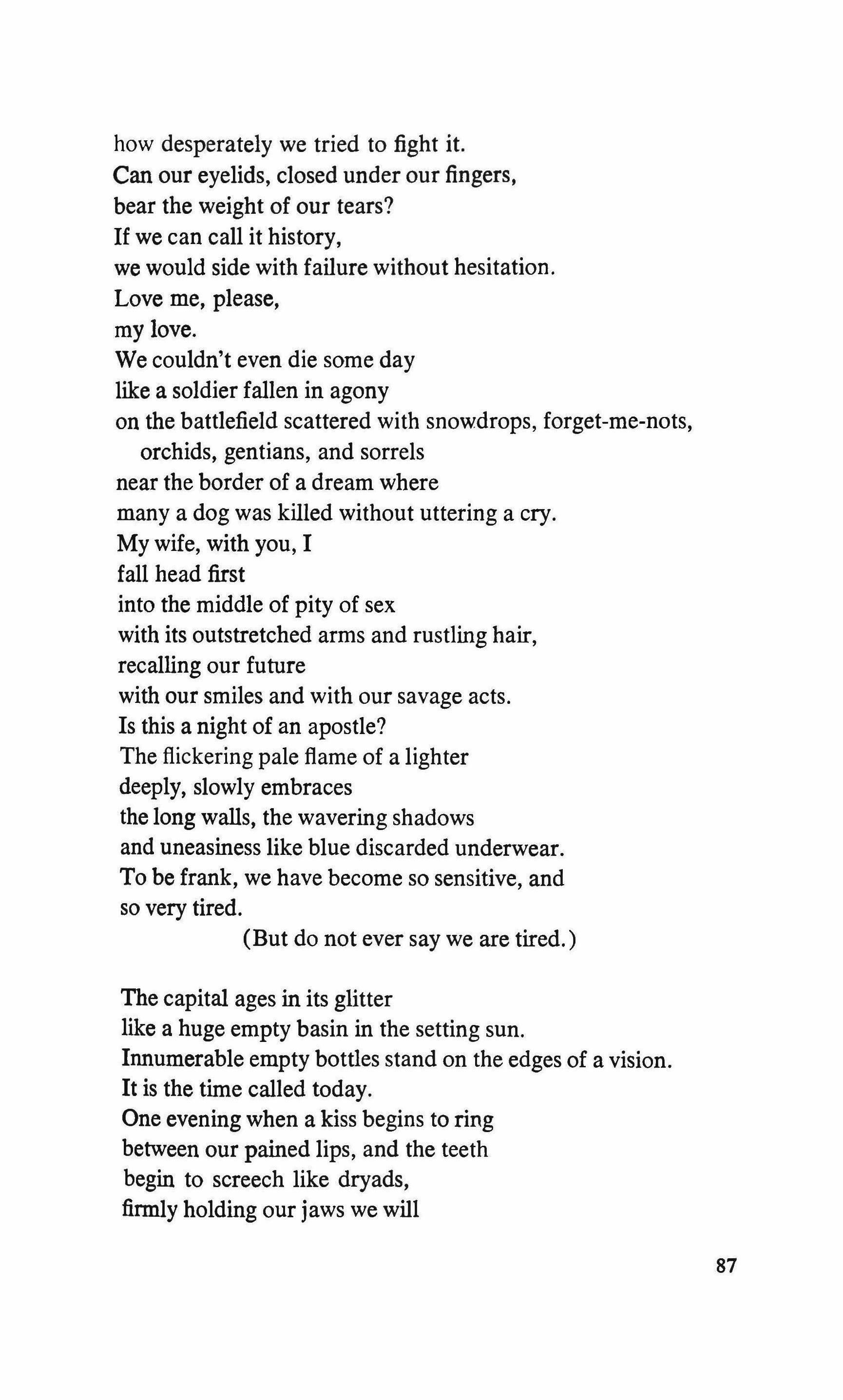
how desperately we tried to fight it. Can our eyelids, closed under our fingers, bear the weight of our tears?
If we can call it history, we would side with failure without hesitation. Love me, please, my love.
We couldn't even die some day like a soldier fallen in agony on the battlefield scattered with snowdrops, forget-me-nots, orchids, gentians, and sorrels near the border of a dream where many a dog was killed without uttering a cry. My wife, with you, I fall head first into the middle of pity of sex with its outstretched arms and rustling hair, recalling our future with our smiles and with our savage acts. Is this a night of an apostle?
The flickering pale flame of a lighter deeply, slowly embraces the long walls, the wavering shadows and uneasiness like blue discarded underwear. To be frank, we have become so sensitive, and so very tired.
(But do not ever say we are tired.)
The capital ages in its glitter like a huge empty basin in the setting sun. Innumerable empty bottles stand on the edges of a vision. It is the time called today. One evening when a kiss begins to ring between our pained lips, and the teeth begin to screech like dryads, firmly holding our jaws we will
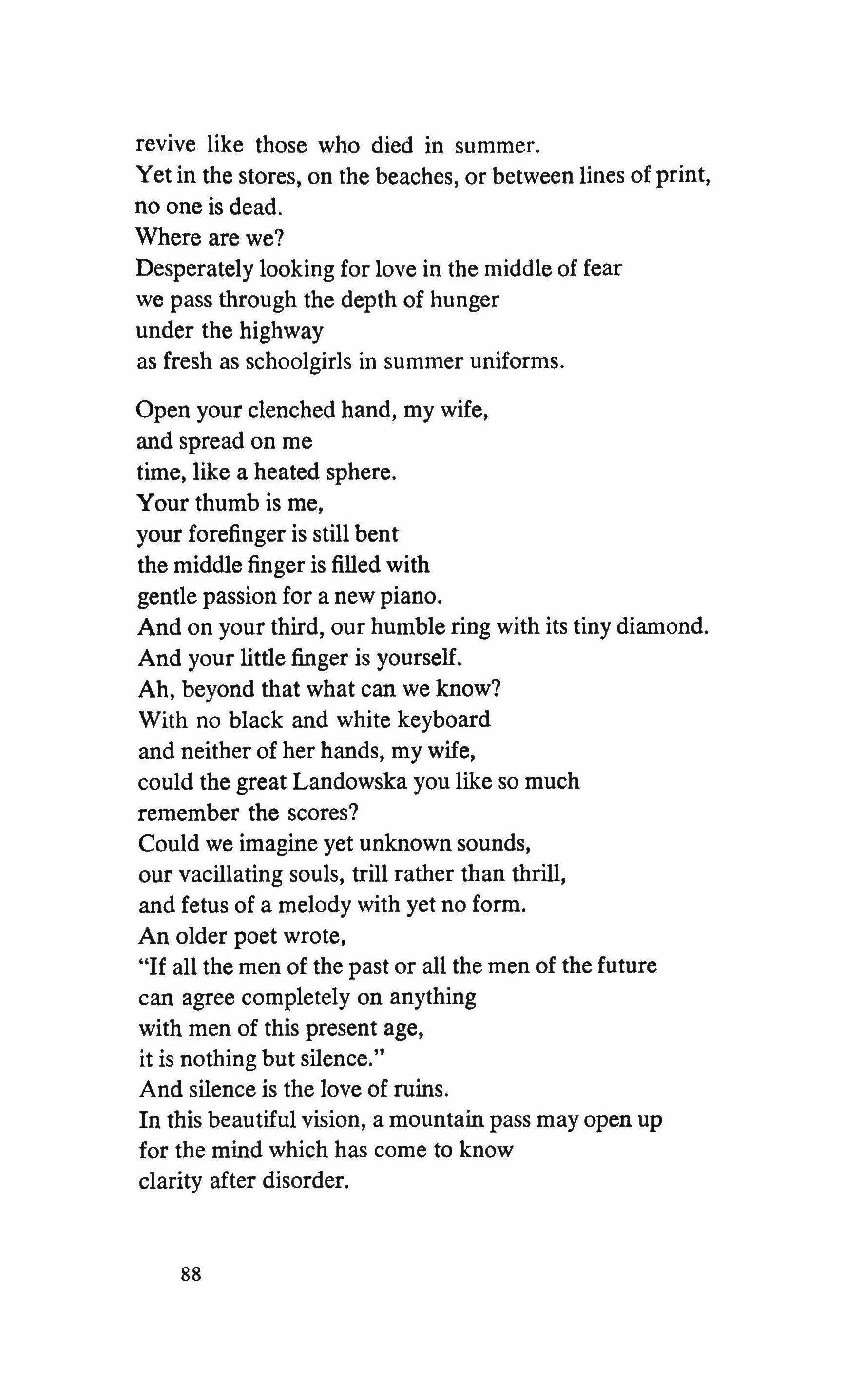
revive like those who died in summer. Yet in the stores, on the beaches, or between lines of print, no one is dead.
Where are we?
Desperately looking for love in the middle of fear we pass through the depth of hunger under the highway as fresh as schoolgirls in summer uniforms.
Open your clenched hand, my wife, and spread on me time, like a heated sphere. Your thumb is me, your forefinger is still bent the middle finger is filled with gentle passion for a new piano. And on your third, our humble ring with its tiny diamond. And your little finger is yourself. Ah, beyond that what can we know?
With no black and white keyboard and neither of her hands, my wife, could the great Landowska you like so much remember the scores?
Could we imagine yet unknown sounds, our vacillating souls, trill rather than thrill, and fetus of a melody with yet no form. An older poet wrote, "If all the men of the past or all the men of the future can agree completely on anything with men of this present age, it is nothing but silence." And silence is the love of ruins. In this beautiful vision, a mountain pass may open up for the mind which has come to know clarity after disorder.
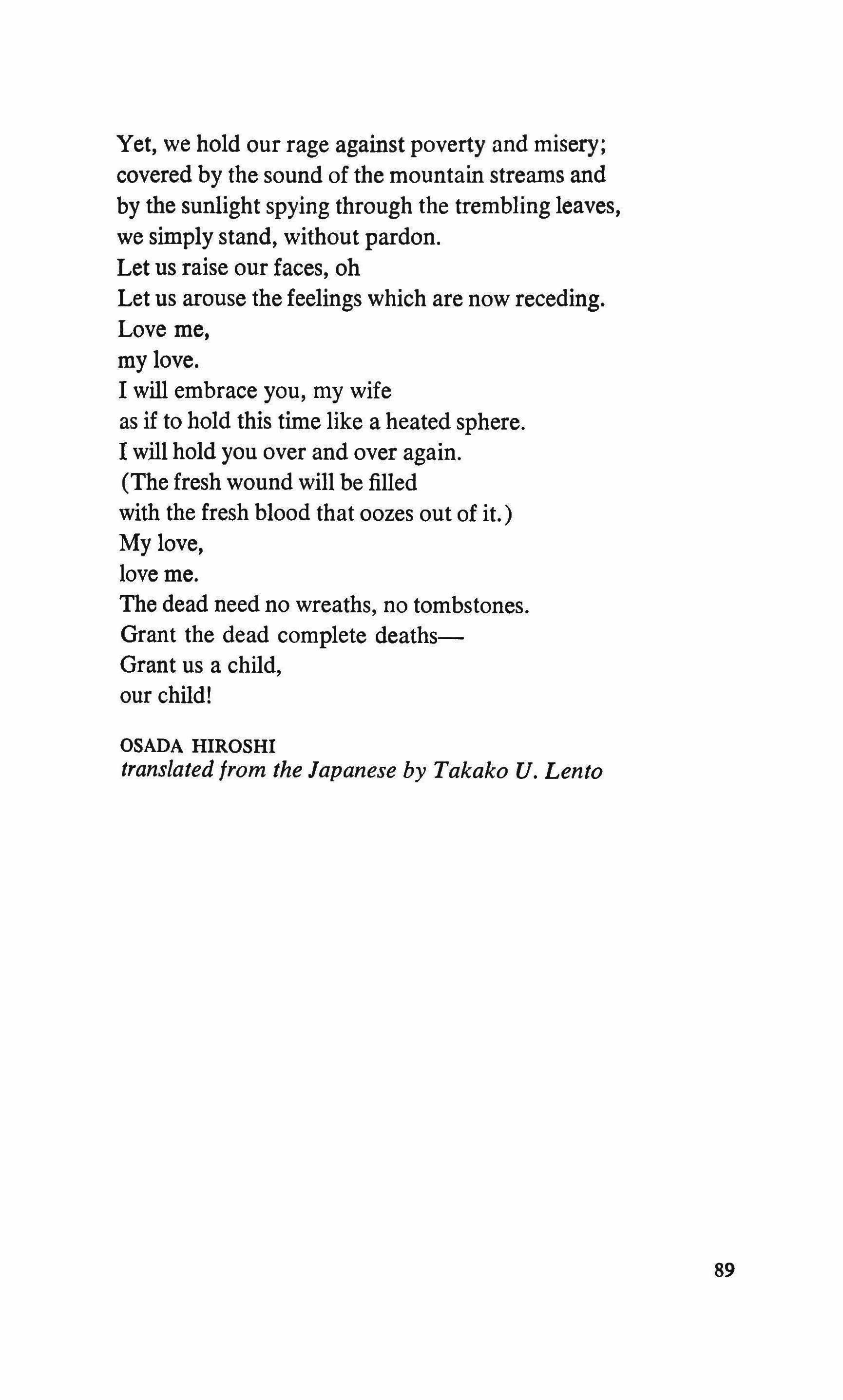
Yet, we hold our rage against poverty and misery; covered by the sound of the mountain streams and by the sunlight spying through the trembling leaves, we simply stand, without pardon.
Let us raise our faces, oh
Let us arouse the feelings which are now receding. Love me, my love.
I will embrace you, my wife as if to hold this time like a heated sphere. I will hold you over and over again.
(The fresh wound will be filled with the fresh blood that oozes out of it.)
My love, love me.
The dead need no wreaths, no tombstones. Grant the dead complete deathsGrant us a child, our child!
OSADA HIROSHI
translated from the Japanese by Takako U. Lento
6
Now that the pain is over those nightmare cages still oppress the eyelids
But we've had to say yes to the oncoming storms know the old catastrophes
We had kept the razor-blades hidden in our sleeves too long Now our wrists are slashed
The house where we found so much safety has had to be given up Now we shall live our lives in open spaces
The wounds shall be private and expected
AIJAZ AHMAD translated from the Urdu by the author
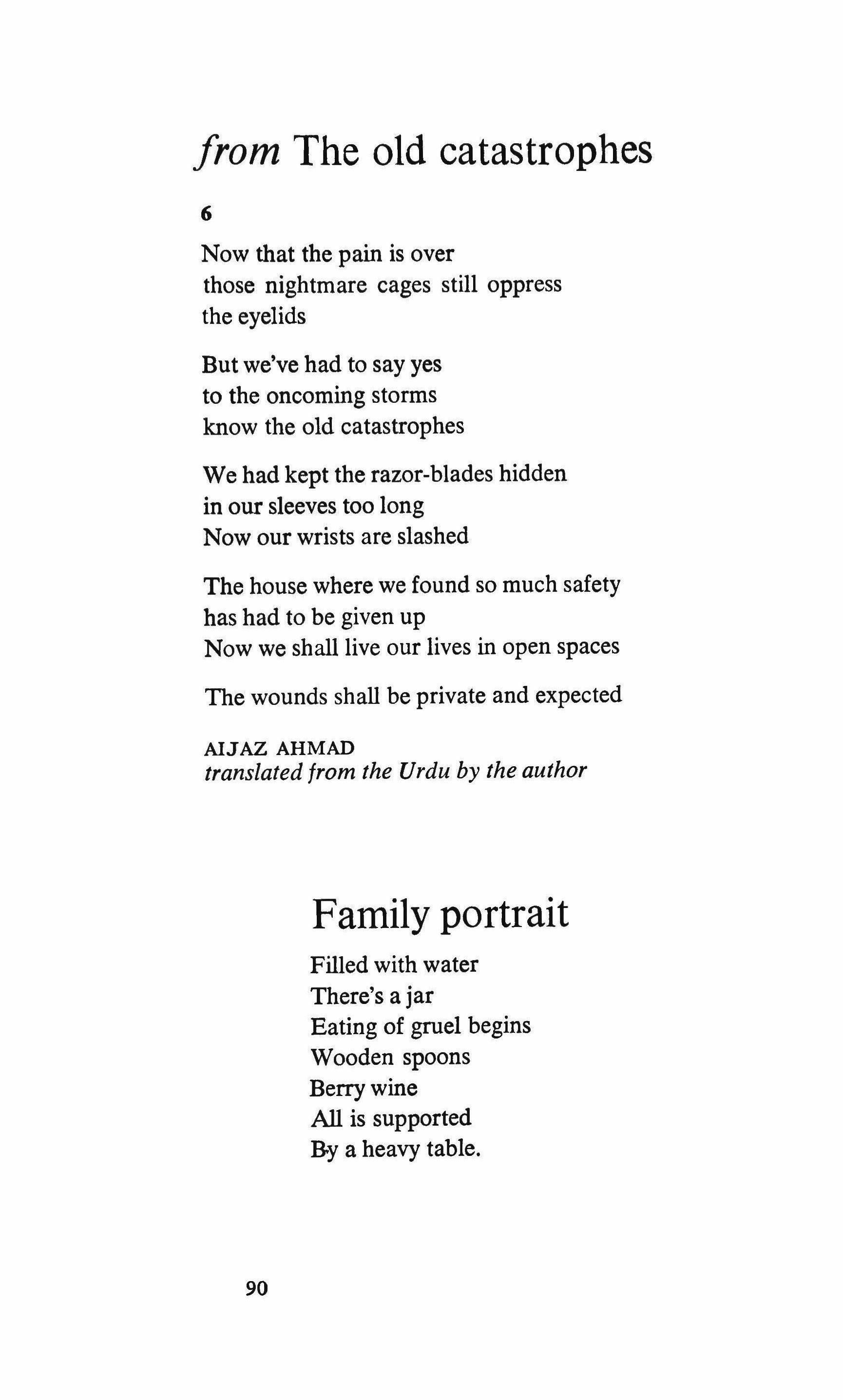
Family portrait
Filled with water
There's a jar Eating of gruel begins Wooden spoons Berry wine
All is supported By a heavy table.
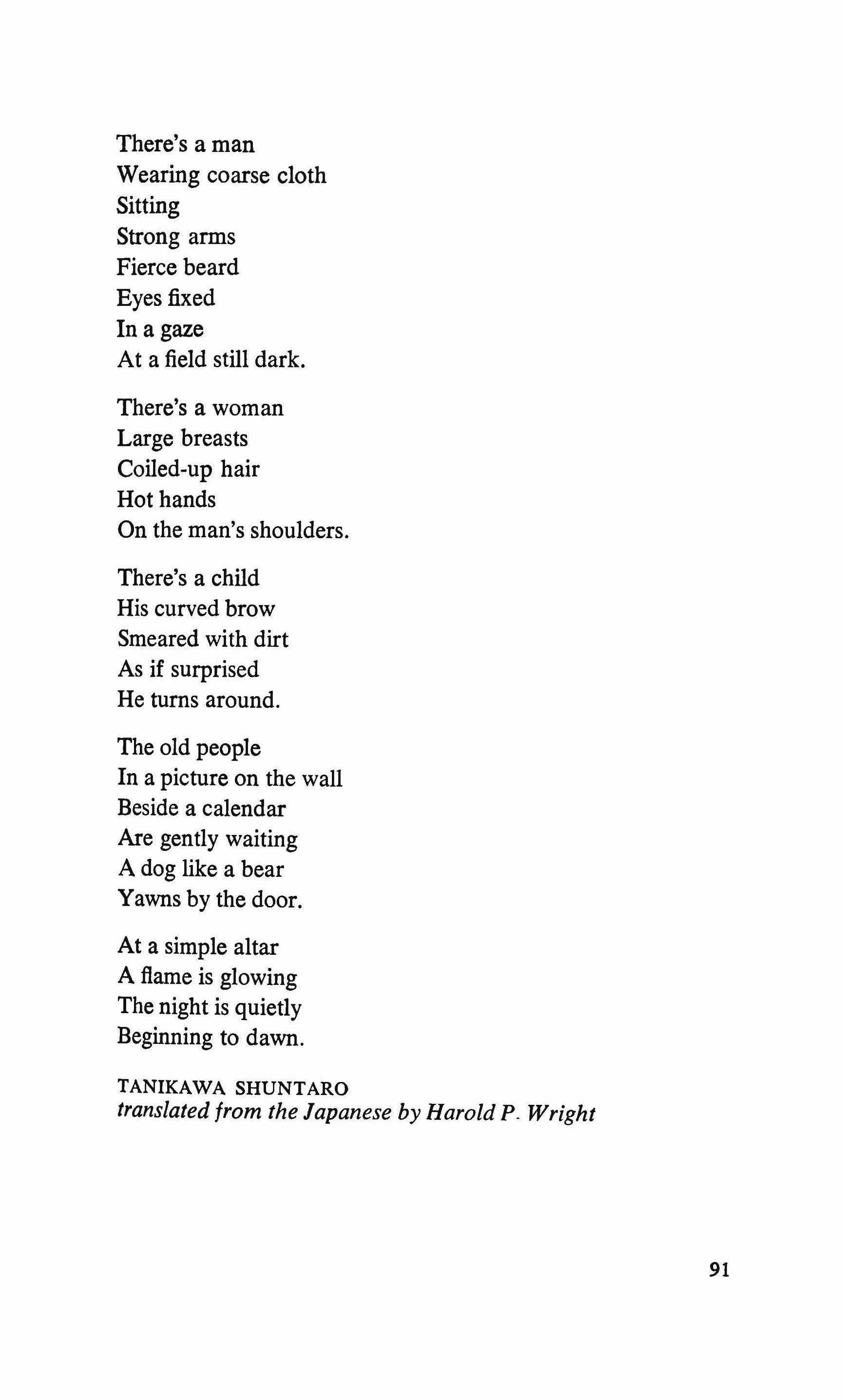
There's a man
Wearing coarse cloth
Sitting
Strong arms
Fierce beard
Eyes fixed
In a gaze
At a field still dark.
There's a woman
Large breasts
Coiled-up hair
Hot hands
On the man's shoulders.
There's a child
His curved brow
Smeared with dirt
As if surprised
He turns around.
The old people
In a picture on the wall
Beside a calendar
Are gently waiting
A dog like a bear
Yawns by the door.
At a simple altar
A flame is glowing
The night is quietly
Beginning to dawn.
TANIKAWA SHUNTARO
translated from the Japanese by Harold P_ Wright
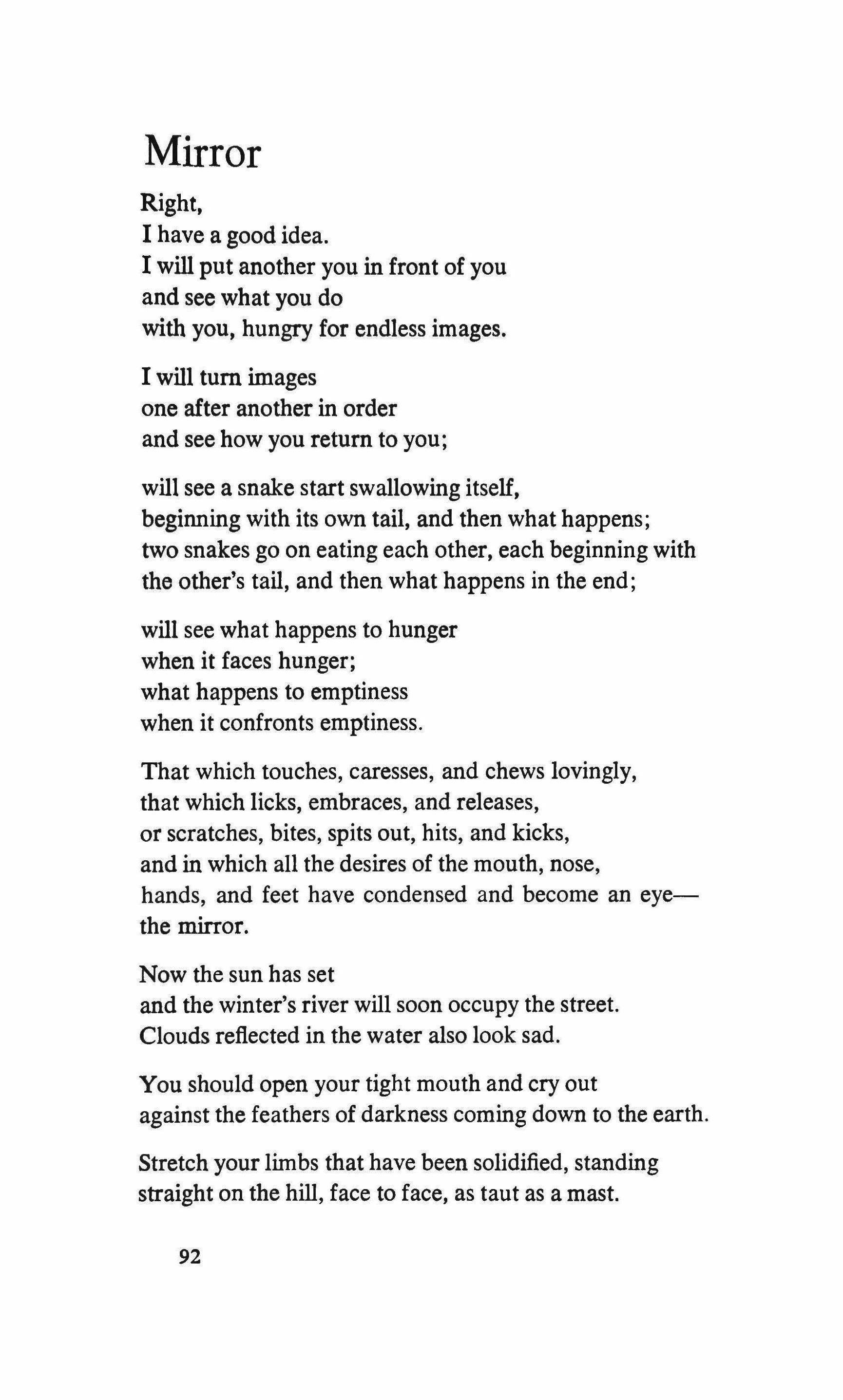
Right, I have a good idea.
I will put another you in front of you and see what you do with you, hungry for endless images.
I will tum images one after another in order and see how you return to you;
will see a snake start swallowing itself, beginning with its own tail, and then what happens; two snakes go on eating each other, each beginning with the other's tail, and then what happens in the end;
will see what happens to hunger when it faces hunger; what happens to emptiness when it confronts emptiness.
That which touches, caresses, and chews lovingly, that which licks, embraces, and releases, or scratches, bites, spits out, hits, and kicks, and in which all the desires of the mouth, nose, hands, and feet have condensed and become an eyethe mirror.
Now the sun has set and the winter's river will soon occupy the street. Clouds reflected in the water also look sad.
You should open your tight mouth and cry out against the feathers of darkness coming down to the earth.
Stretch your limbs that have been solidified, standing straight on the hill, face to face, as taut as a mast.
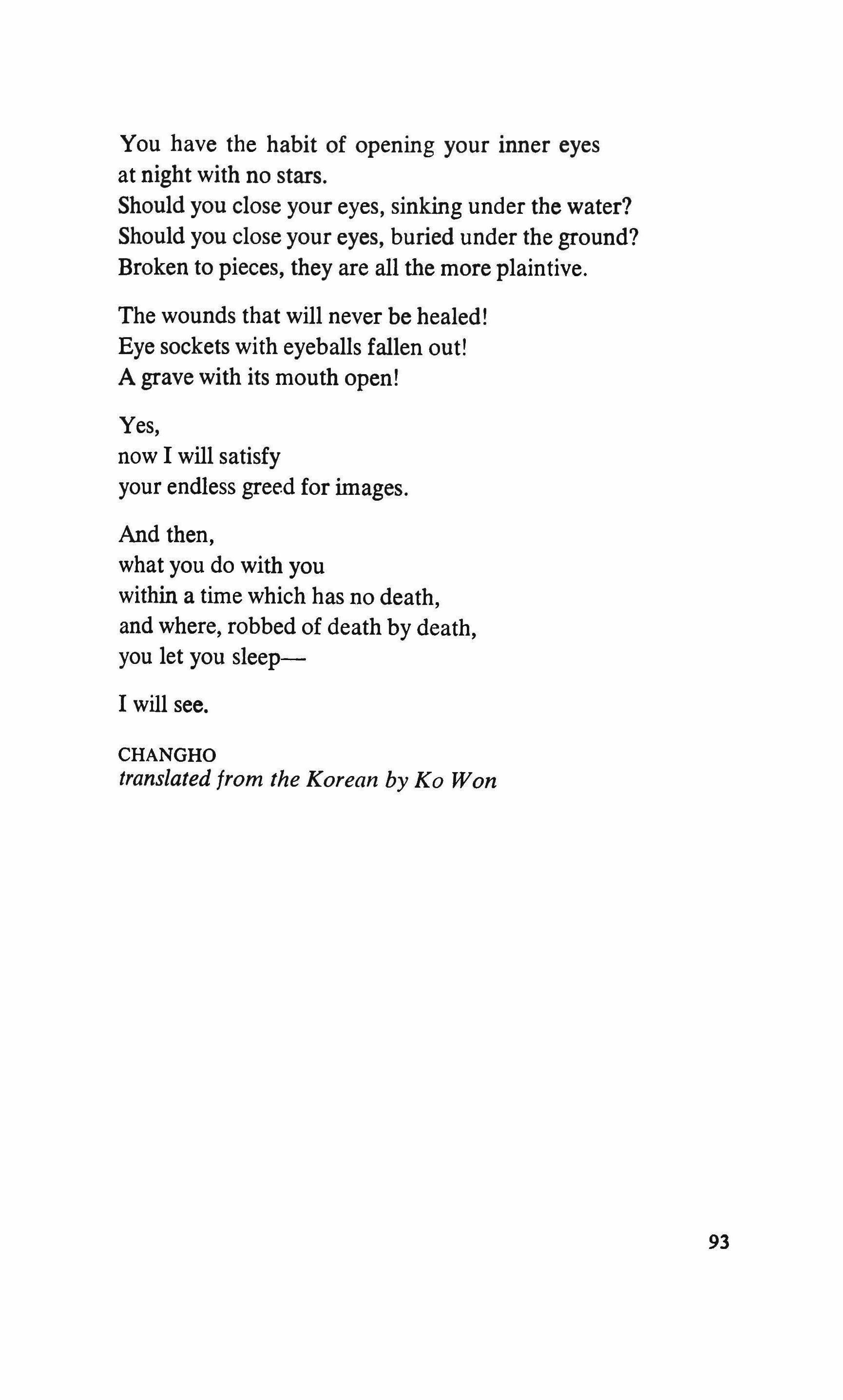
You have the habit of opening your inner eyes at night with no stars. Should you close your eyes, sinking under the water? Should you close your eyes, buried under the ground? Broken to pieces, they are all the more plaintive.
The wounds that will never be healed! Eye sockets with eyeballs fallen out! A grave with its mouth open!
Yes, now I will satisfy your endless greed for images. And then, what you do with you within a time which has no death, and where, robbed of death by death, you let you sleepI will see.
CHANGHO
translated from the Korean by Ko Won
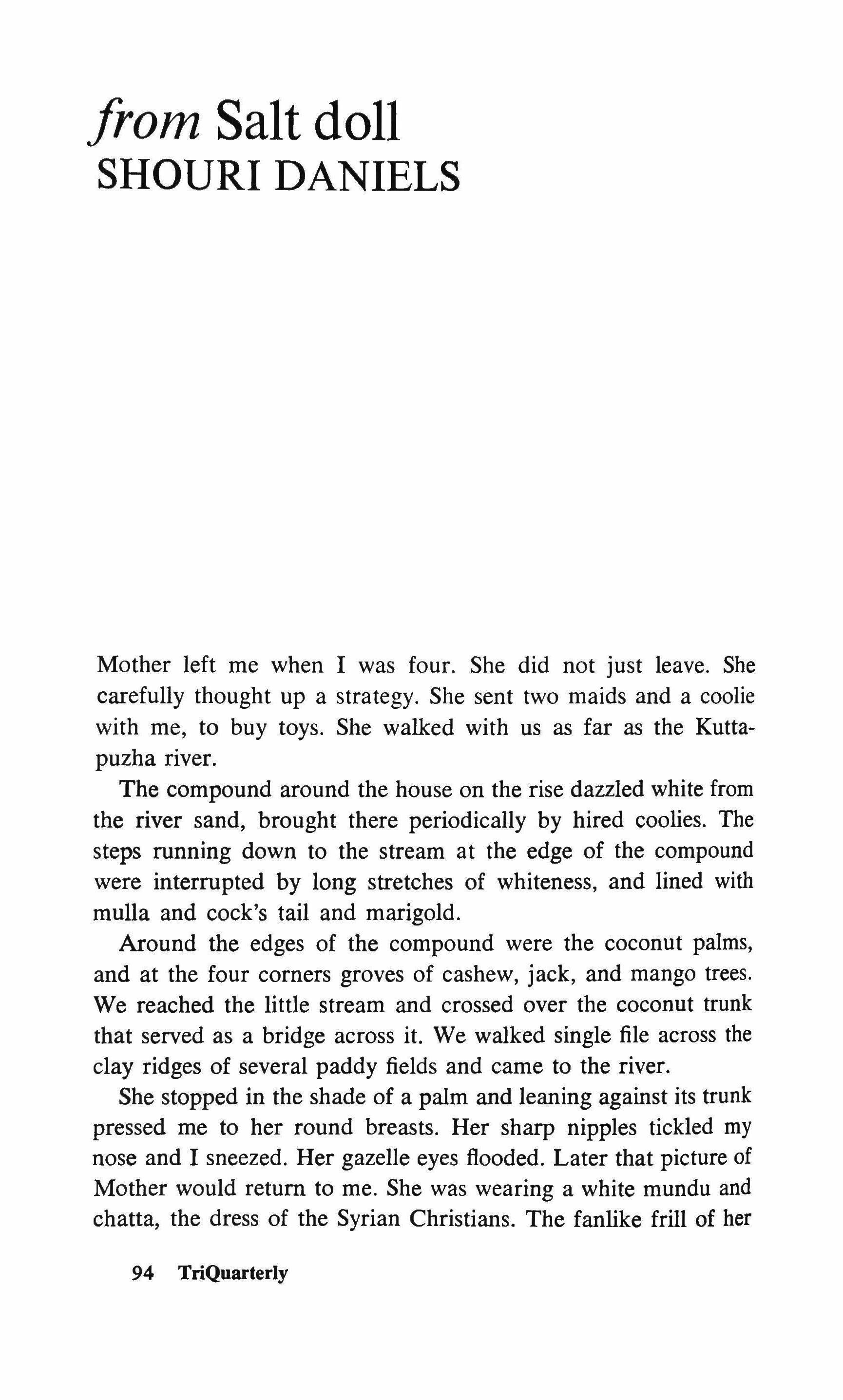
Mother left me when I was four. She did not just leave. She carefully thought up a strategy. She sent two maids and a coolie with me, to buy toys. She walked with us as far as the Kuttapuzha river.
The compound around the house on the rise dazzled white from the river sand, brought there periodically by hired coolies. The steps running down to the stream at the edge of the compound were interrupted by long stretches of whiteness, and lined with mulla and cock's tail and marigold.
Around the edges of the compound were the coconut palms, and at the four corners groves of cashew, jack, and mango trees. We reached the little stream and crossed over the coconut trunk that served as a bridge across it. We walked single file across the clay ridges of several paddy fields and came to the river.
She stopped in the shade of a palm and leaning against its trunk pressed me to her round breasts. Her sharp nipples tickled my nose and I sneezed. Her gazelle eyes flooded. Later that picture of Mother would return to me. She was wearing a white mundu and chatta, the dress of the Syrian Christians. The fanlike frill of her
TriQuarterIy
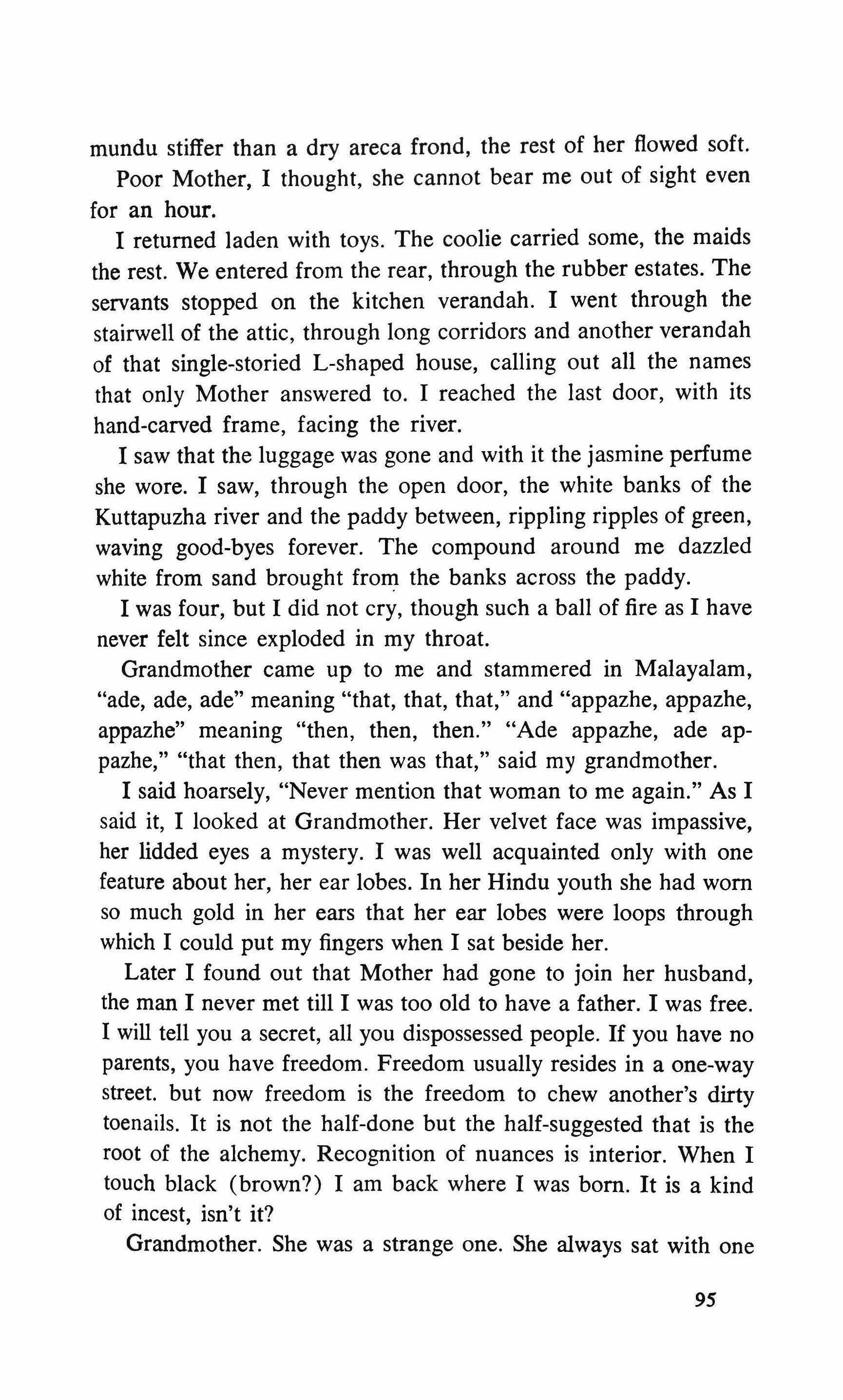
mundu stiffer than a dry areca frond, the rest of her flowed soft.
Poor Mother, I thought, she cannot bear me out of sight even for an hour.
I returned laden with toys. The coolie carried some, the maids the rest. We entered from the rear, through the rubber estates. The servants stopped on the kitchen verandah. I went through the stairwell of the attic, through long corridors and another verandah of that single-storied L-shaped house, calling out all the names that only Mother answered to. I reached the last door, with its hand-carved frame, facing the river.
I saw that the luggage was gone and with it the jasmine perfume she wore. I saw, through the open door, the white banks of the Kuttapuzha river and the paddy between, rippling ripples of green, waving good-byes forever. The compound around me dazzled white from sand brought from the banks across the paddy.
I was four, but I did not cry, though such a ball of fire as I have never felt since exploded in my throat.
Grandmother came up to me and stammered in Malayalam, "ade, ade, ade" meaning "that, that, that," and "appazhe, appazhe, appazhe" meaning "then, then, then." "Ade appazhe, ade appazhe," "that then, that then was that," said my grandmother.
I said hoarsely, "Never mention that woman to me again." As I said it, I looked at Grandmother. Her velvet face was impassive, her lidded eyes a mystery. I was well acquainted only with one feature about her, her ear lobes. In her Hindu youth she had worn so much gold in her ears that her ear lobes were loops through which I could put my fingers when I sat beside her.
Later I found out that Mother had gone to join her husband, the man I never met till I was too old to have a father. I was free. I will tell you a secret, all you dispossessed people. If you have no parents, you have freedom. Freedom usually resides in a one-way street. but now freedom is the freedom to chew another's dirty toenails. It is not the half-done but the half-suggested that is the root of the alchemy. Recognition of nuances is interior. When I touch black (brown?) I am back where I was born. It is a kind of incest, isn't it?
Grandmother. She was a strange one. She always sat with one
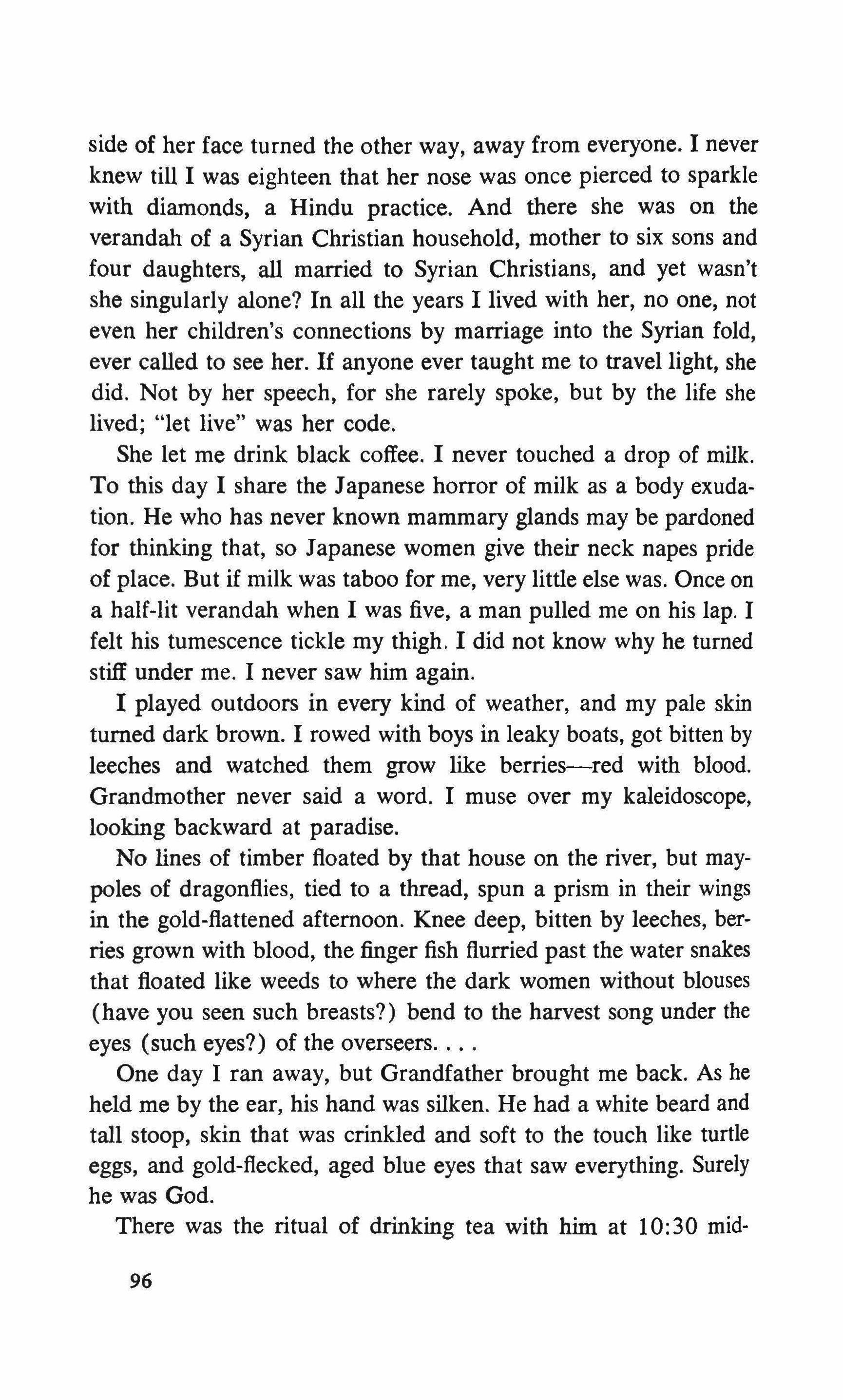
side of her face turned the other way, away from everyone. I never knew till I was eighteen that her nose was once pierced to sparkle with diamonds, a Hindu practice. And there she was on the verandah of a Syrian Christian household, mother to six sons and four daughters, all married to Syrian Christians, and yet wasn't she singularly alone? In all the years I lived with her, no one, not even her children's connections by marriage into the Syrian fold, ever called to see her. If anyone ever taught me to travel light, she did. Not by her speech, for she rarely spoke, but by the life she lived; "let live" was her code.
She let me drink black coffee. I never touched a drop of milk. To this day I share the Japanese horror of milk as a body exudation. He who has never known mammary glands may be pardoned for thinking that, so Japanese women give their neck napes pride of place. But if milk was taboo for me, very little else was. Once on a half-lit verandah when I was five, a man pulled me on his lap. I felt his tumescence tickle my thigh. I did not know why he turned stiff under me. I never saw him again.
I played outdoors in every kind of weather, and my pale skin turned dark brown. I rowed with boys in leaky boats, got bitten by leeches and watched them grow like berries-red with blood. Grandmother never said a word. I muse over my kaleidoscope, looking backward at paradise.
No lines of timber floated by that house on the river, but maypoles of dragonflies, tied to a thread, spun a prism in their wings in the gold-flattened afternoon. Knee deep, bitten by leeches, berries grown with blood, the finger fish flurried past the water snakes that floated like weeds to where the dark women without blouses (have you seen such breasts?) bend to the harvest song under the eyes (such eyes?) of the overseers
One day I ran away, but Grandfather brought me back. As he held me by the ear, his hand was silken. He had a white beard and tall stoop, skin that was crinkled and soft to the touch like turtle eggs, and gold-flecked, aged blue eyes that saw everything. Surely he was God.
There was the ritual of drinking tea with him at 10:30 mid-
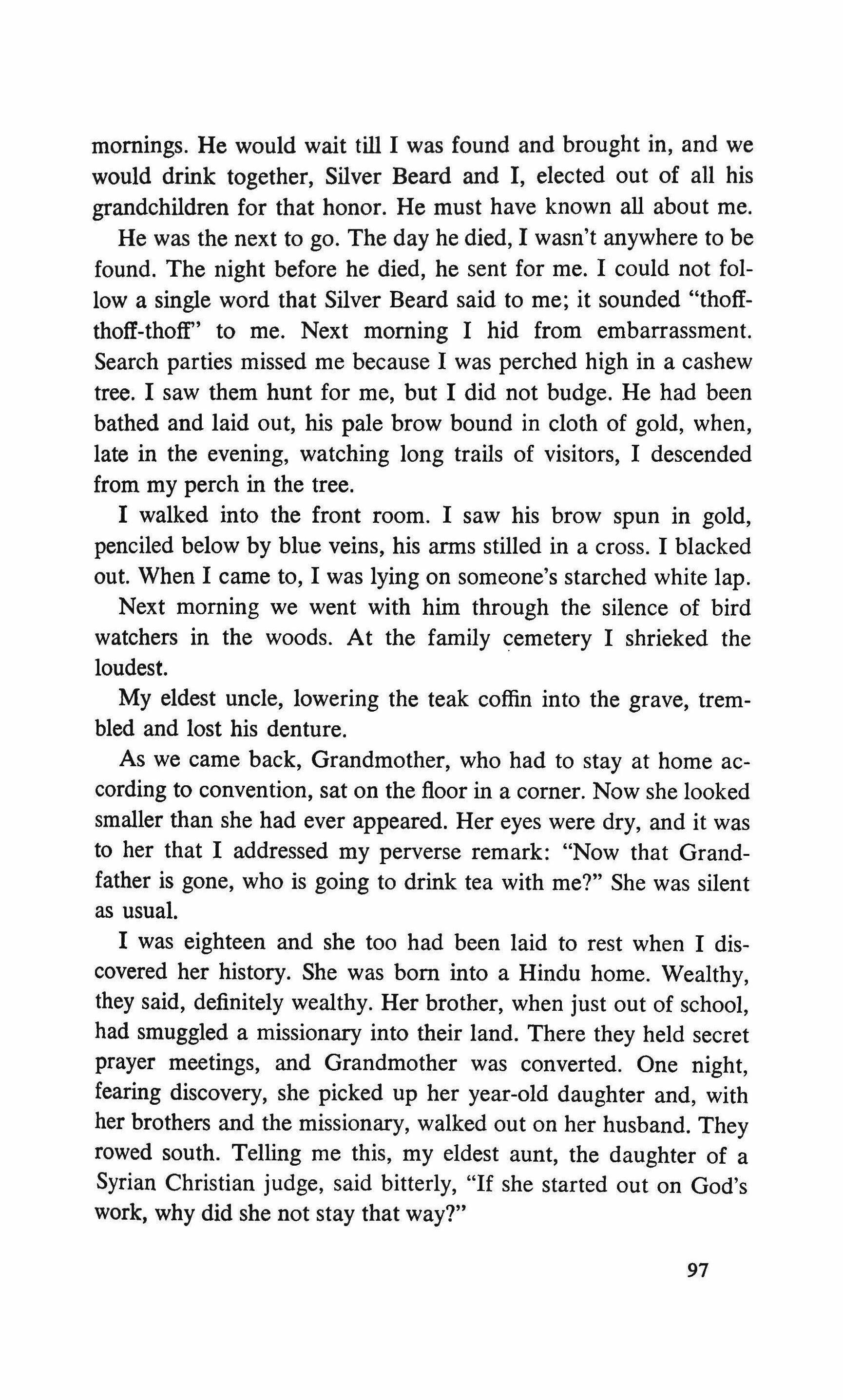
mornings. He would wait till I was found and brought in, and we would drink together, Silver Beard and I, elected out of all his grandchildren for that honor. He must have known all about me. He was the next to go. The day he died, I wasn't anywhere to be found. The night before he died, he sent for me. I could not folIowa single word that Silver Beard said to me; it sounded "thoffthoff-thoff" to me. Next morning I hid from embarrassment. Search parties missed me because I was perched high in a cashew tree. I saw them hunt for me, but I did not budge. He had been bathed and laid out, his pale brow bound in cloth of gold, when, late in the evening, watching long trails of visitors, I descended from my perch in the tree.
I walked into the front room. I saw his brow spun in gold, penciled below by blue veins, his arms stilled in a cross. I blacked out. When I came to, I was lying on someone's starched white lap. Next morning we went with him through the silence of bird watchers in the woods. At the family cemetery I shrieked the loudest.
My eldest uncle, lowering the teak coffin into the grave, trembled and lost his denture.
As we came back, Grandmother, who had to stay at home according to convention, sat on the floor in a comer. Now she looked smaller than she had ever appeared. Her eyes were dry, and it was to her that I addressed my perverse remark: "Now that Grandfather is gone, who is going to drink tea with me?" She was silent as usual.
I was eighteen and she too had been laid to rest when I discovered her history. She was born into a Hindu home. Wealthy, they said, definitely wealthy. Her brother, when just out of school, had smuggled a missionary into their land. There they held secret prayer meetings, and Grandmother was converted. One night, fearing discovery, she picked up her year-old daughter and, with her brothers and the missionary, walked out on her husband. They rowed south. Telling me this, my eldest aunt, the daughter of a Syrian Christian judge, said bitterly, "If she started out on God's work, why did she not stay that way?"
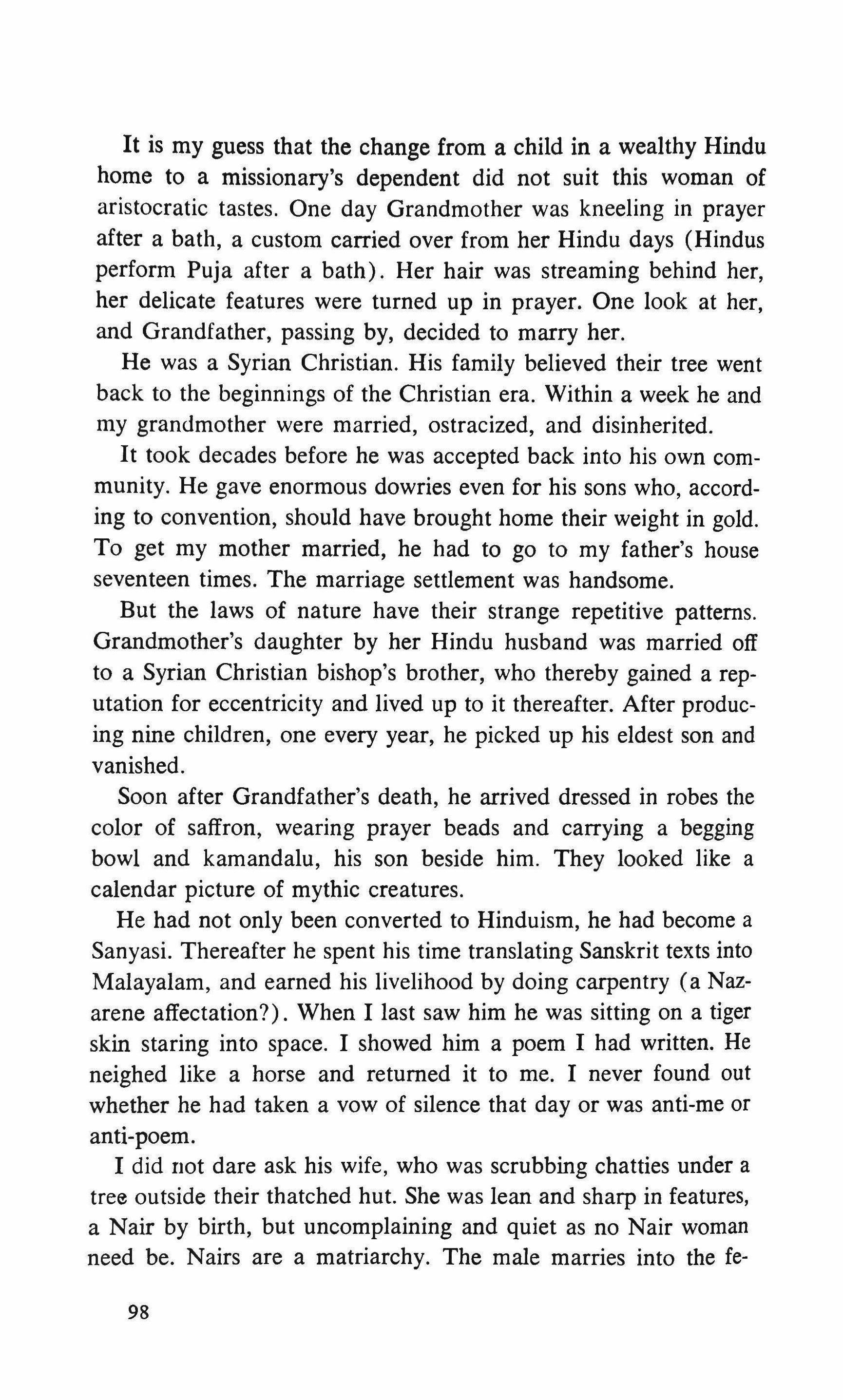
It is my guess that the change from a child in a wealthy Hindu home to a missionary's dependent did not suit this woman of aristocratic tastes. One day Grandmother was kneeling in prayer after a bath, a custom carried over from her Hindu days (Hindus perform Puja after a bath). Her hair was streaming behind her, her delicate features were turned up in prayer. One look at her, and Grandfather, passing by, decided to marry her.
He was a Syrian Christian. His family believed their tree went back to the beginnings of the Christian era. Within a week he and my grandmother were married, ostracized, and disinherited.
It took decades before he was accepted back into his own community. He gave enormous dowries even for his sons who, according to convention, should have brought home their weight in gold. To get my mother married, he had to go to my father's house seventeen times. The marriage settlement was handsome.
But the laws of nature have their strange repetitive patterns. Grandmother's daughter by her Hindu husband was married off to a Syrian Christian bishop's brother, who thereby gained a reputation for eccentricity and lived up to it thereafter. After producing nine children, one every year, he picked up his eldest son and vanished.
Soon after Grandfather's death, he arrived dressed in robes the color of saffron, wearing prayer beads and carrying a begging bowl and kamandalu, his son beside him. They looked like a calendar picture of mythic creatures.
He had not only been converted to Hinduism, he had become a Sanyasi. Thereafter he spent his time translating Sanskrit texts into Malayalam, and earned his livelihood by doing carpentry (a Nazarene affectation?). When I last saw him he was sitting on a tiger skin staring into space. I showed him a poem I had written. He neighed like a horse and returned it to me. I never found out whether he had taken a vow of silence that day or was anti-me or anti-poem.
I did not dare ask his wife, who was scrubbing chatties under a tree outside their thatched hut. She was lean and sharp in features, a Nair by birth, but uncomplaining and quiet as no Nair woman need be. Nairs are a matriarchy. The male marries into the fe-
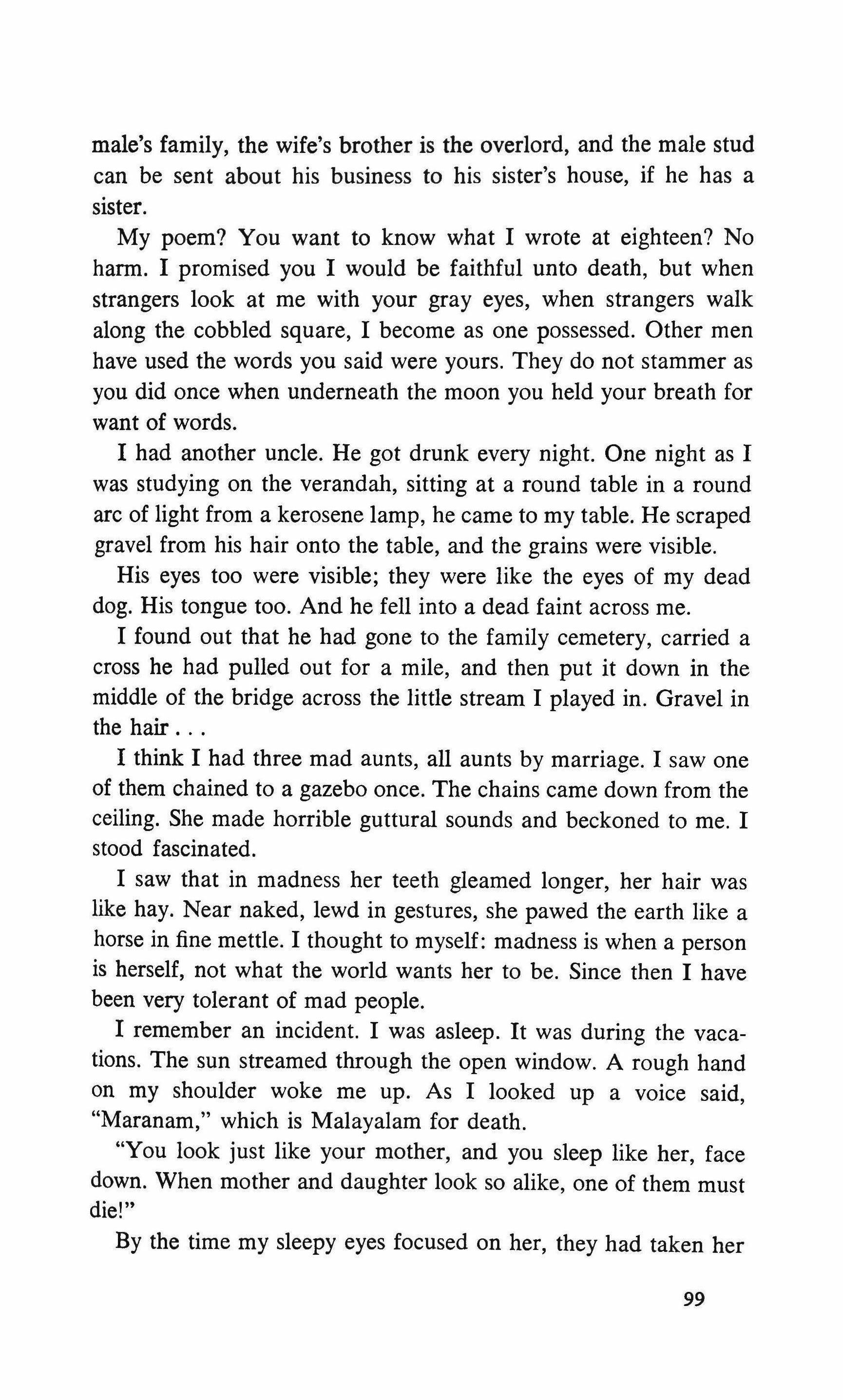
male's family, the wife's brother is the overlord, and the male stud can be sent about his business to his sister's house, if he has a sister.
My poem? You want to know what I wrote at eighteen? No harm. I promised you I would be faithful unto death, but when strangers look at me with your gray eyes, when strangers walk along the cobbled square, I become as one possessed. Other men have used the words you said were yours. They do not stammer as you did once when underneath the moon you held your breath for want of words.
I had another uncle. He got drunk every night. One night as I was studying on the verandah, sitting at a round table in a round arc of light from a kerosene lamp, he came to my table. He scraped gravel from his hair onto the table, and the grains were visible. His eyes too were visible; they were like the eyes of my dead dog. His tongue too. And he fell into a dead faint across me.
I found out that he had gone to the family cemetery, carried a cross he had pulled out for a mile, and then put it down in the middle of the bridge across the little stream I played in. Gravel in the hair
I think I had three mad aunts, all aunts by marriage. I saw one of them chained to a gazebo once. The chains came down from the ceiling. She made horrible guttural sounds and beckoned to me. I stood fascinated.
I saw that in madness her teeth gleamed longer, her hair was like hay. Near naked, lewd in gestures, she pawed the earth like a horse in fine mettle. I thought to myself: madness is when a person is herself, not what the world wants her to be. Since then I have been very tolerant of mad people.
I remember an incident. I was asleep. It was during the vacations. The sun streamed through the open window. A rough hand on my shoulder woke me up. As I looked up a voice said, "Maranam," which is Malayalam for death.
"You look just like your mother, and you sleep like her, face down. When mother and daughter look so alike, one of them must die!"
By the time my sleepy eyes focused on her, they had taken her
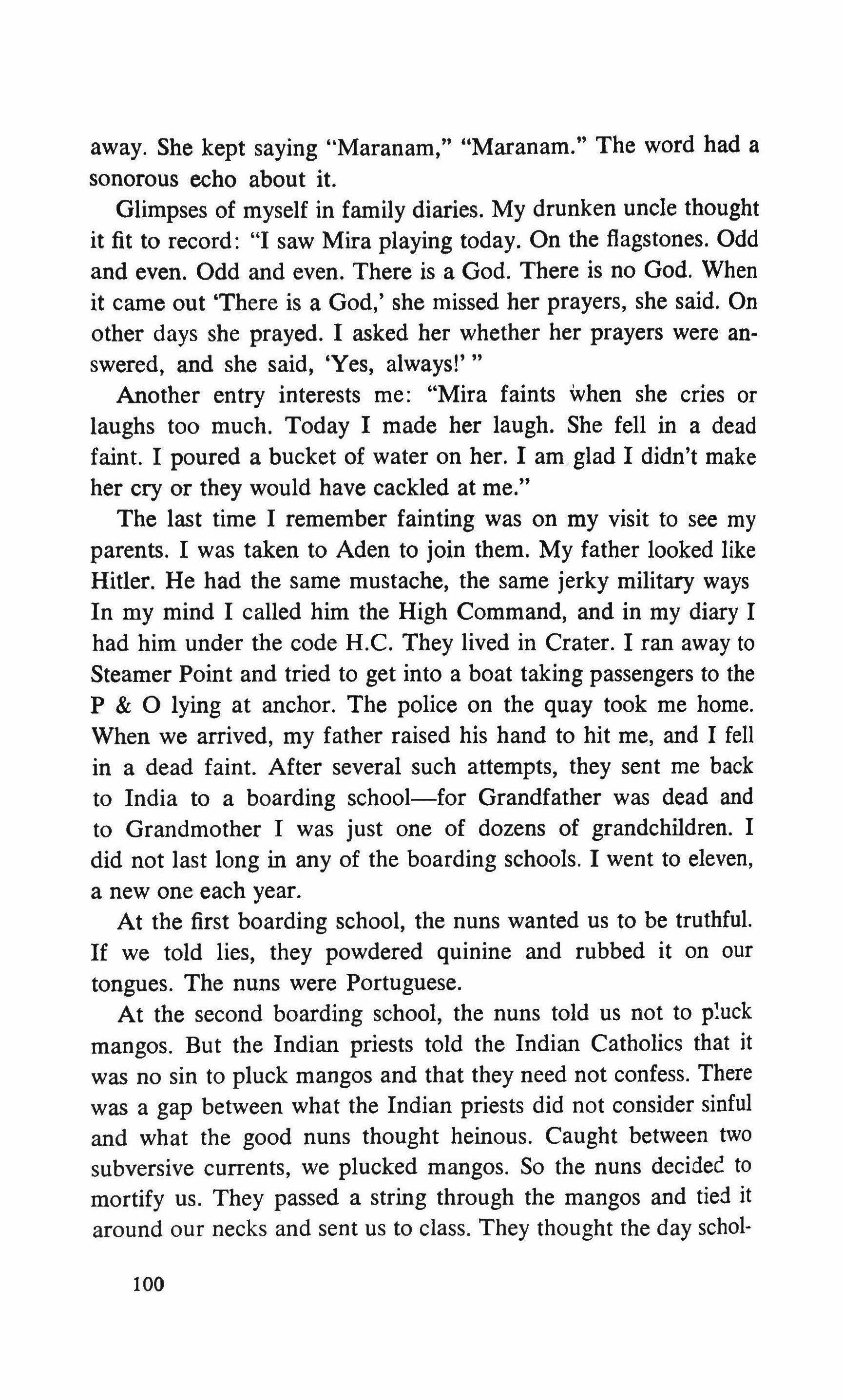
away. She kept saying "Maranam," "Maranam." The word had a sonorous echo about it.
Glimpses of myself in family diaries. My drunken uncle thought it fit to record: "I saw Mira playing today. On the flagstones. Odd and even. Odd and even. There is a God. There is no God. When it came out 'There is a God,' she missed her prayers, she said. On other days she prayed. I asked her whether her prayers were answered, and she said, 'Yes, always!'"
Another entry interests me: "Mira faints when she cries or laughs too much. Today I made her laugh. She fell in a dead faint. I poured a bucket of water on her. I am glad I didn't make her cry or they would have cackled at me."
The last time I remember fainting was on my visit to see my parents. I was taken to Aden to join them. My father looked like Hitler. He had the same mustache, the same jerky military ways In my mind I called him the High Command, and in my diary I had him under the code H.C. They lived in Crater. I ran away to Steamer Point and tried to get into a boat taking passengers to the P & 0 lying at anchor. The police on the quay took me home. When we arrived, my father raised his hand to hit me, and I fell in a dead faint. After several such attempts, they sent me back to India to a boarding school-for Grandfather was dead and to Grandmother I was just one of dozens of grandchildren. I did not last long in any of the boarding schools. I went to eleven, a new one each year.
At the first boarding school, the nuns wanted us to be truthful. If we told lies, they powdered quinine and rubbed it on our tongues. The nuns were Portuguese.
At the second boarding school, the nuns told us not to pluck mangos. But the Indian priests told the Indian Catholics that it was no sin to pluck mangos and that they need not confess. There was a gap between what the Indian priests did not consider sinful and what the good nuns thought heinous. Caught between two subversive currents, we plucked mangos. So the nuns decided to mortify us. They passed a string through the mangos and tied it around our necks and sent us to class. They thought the day schol-
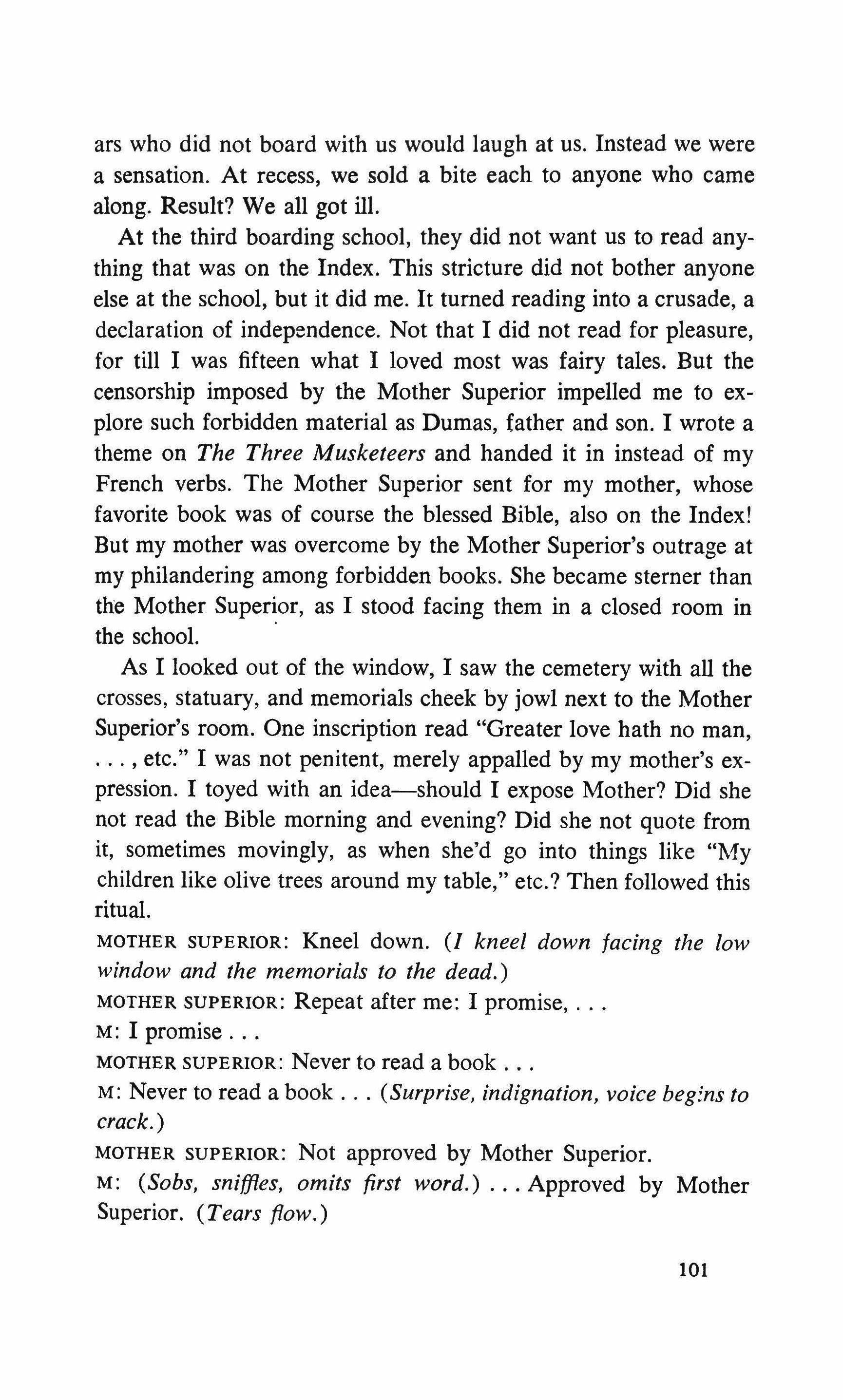
ars who did not board with us would laugh at us. Instead we were a sensation. At recess, we sold a bite each to anyone who came along. Result? We all got ill.
At the third boarding school, they did not want us to read anything that was on the Index. This stricture did not bother anyone else at the school, but it did me. It turned reading into a crusade, a declaration of independence. Not that I did not read for pleasure, for till I was fifteen what I loved most was fairy tales. But the censorship imposed by the Mother Superior impelled me to explore such forbidden material as Dumas, father and son. I wrote a theme on The Three Musketeers and handed it in instead of my French verbs. The Mother Superior sent for my mother, whose favorite book was of course the blessed Bible, also on the Index! But my mother was overcome by the Mother Superior's outrage at my philandering among forbidden books. She became sterner than the Mother Superior, as I stood facing them in a closed room in the school.
As I looked out of the window, I saw the cemetery with all the crosses, statuary, and memorials cheek by jowl next to the Mother Superior's room. One inscription read "Greater love hath no man, etc." I was not penitent, merely appalled by my mother's expression. I toyed with an idea-should I expose Mother? Did she not read the Bible morning and evening? Did she not quote from it, sometimes movingly, as when she'd go into things like "My children like olive trees around my table," etc.? Then followed this ritual.
MOTHER SUPERIOR: Kneel down. (I kneel down facing the low window and the memorials to the dead.)
MOTHER SUPERIOR: Repeat after me: I promise, M: I promise
MOTHER SUPERIOR: Never to read a book
M: Never to read a book (Surprise, indignation, voice begins to crack. )
MOTHER SUPERIOR: Not approved by Mother Superior.
M: (Sobs, sniffles, omits first word.) Approved by Mother Superior. (Tears flow.)
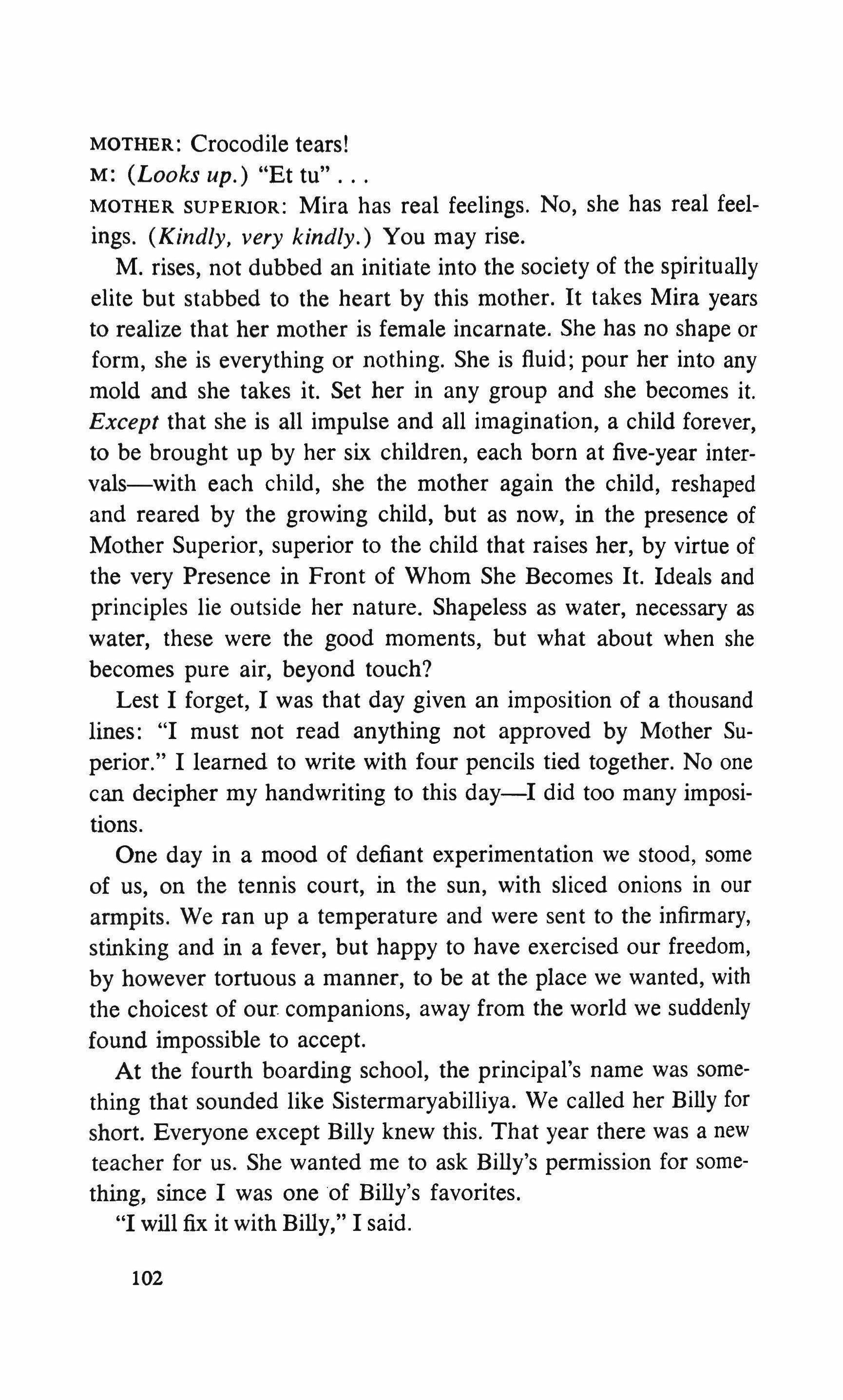
MOTHER: Crocodile tears!
M: (Looks up.) "Et tu"
MOTHER SUPERIOR: Mira has real feelings. No, she has real feelings. (Kindly, very kindly.) You may rise.
M. rises, not dubbed an initiate into the society of the spiritually elite but stabbed to the heart by this mother. It takes Mira years to realize that her mother is female incarnate. She has no shape or form, she is everything or nothing. She is fluid; pour her into any mold and she takes it. Set her in any group and she becomes it. Except that she is all impulse and all imagination, a child forever, to be brought up by her six children, each born at five-year intervals-with each child, she the mother again the child, reshaped and reared by the growing child, but as now, in the presence of Mother Superior, superior to the child that raises her, by virtue of the very Presence in Front of Whom She Becomes It. Ideals and principles lie outside her nature. Shapeless as water, necessary as water, these were the good moments, but what about when she becomes pure air, beyond touch?
Lest I forget, I was that day given an imposition of a thousand lines: "I must not read anything not approved by Mother Superior." I learned to write with four pencils tied together. No one can decipher my handwriting to this day-I did too many impositions.
One day in a mood of defiant experimentation we stood, some of us, on the tennis court, in the sun, with sliced onions in our armpits. We ran up a temperature and were sent to the infirmary, stinking and in a fever, but happy to have exercised our freedom, by however tortuous a manner, to be at the place we wanted, with the choicest of our. companions, away from the world we suddenly found impossible to accept.
At the fourth boarding school, the principal's name was something that sounded like Sistermaryabilliya. We called her Billy for short. Everyone except Billy knew this. That year there was a new teacher for us. She wanted me to ask Billy's permission for something, since I was one of Billy's favorites.
"I will fix it with Billy," I said.
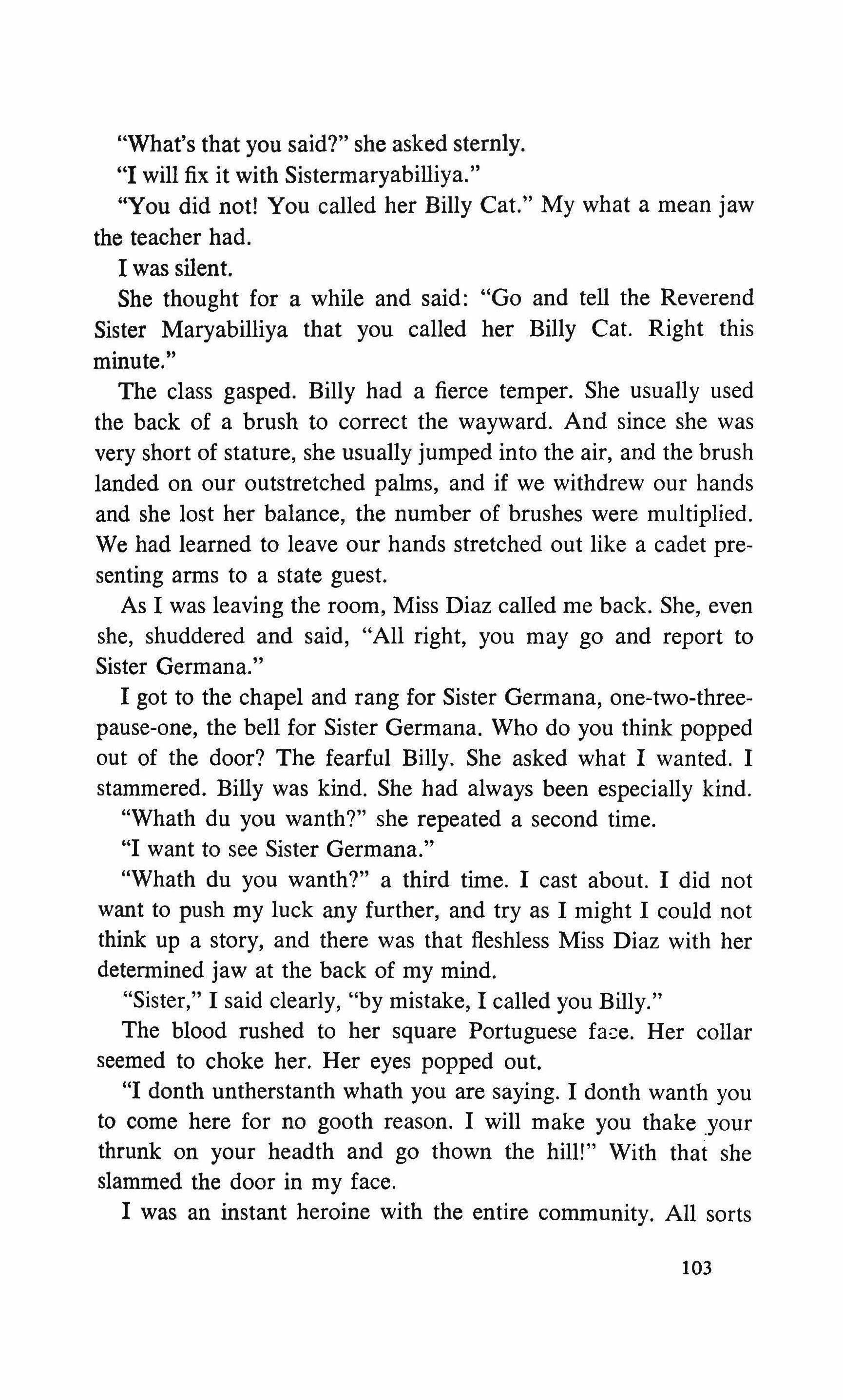
"What's that you said?" she asked sternly.
"I will fix it with Sistermaryabilliya."
"You did not! You called her Billy Cat." My what a mean jaw the teacher had.
1 was silent.
She thought for a while and said: "Go and tell the Reverend Sister Maryabilliya that you called her Billy Cat. Right this minute."
The class gasped. Billy had a fierce temper. She usually used the back of a brush to correct the wayward. And since she was very short of stature, she usually jumped into the air, and the brush landed on our outstretched palms, and if we withdrew our hands and she lost her balance, the number of brushes were multiplied. We had learned to leave our hands stretched out like a cadet presenting arms to a state guest.
As 1 was leaving the room, Miss Diaz called me back. She, even she, shuddered and said, "All right, you may go and report to Sister Germana."
1 got to the chapel and rang for Sister Germana, one-two-threepause-one, the bell for Sister Germana. Who do you think popped out of the door? The fearful Billy. She asked what 1 wanted. 1 stammered. Billy was kind. She had always been especially kind.
"Whath du you wanth?" she repeated a second time.
"I want to see Sister Germana."
"Whath du you wanth?" a third time. 1 cast about. 1 did not want to push my luck any further, and try as 1 might 1 could not think up a story, and there was that fteshless Miss Diaz with her determined jaw at the back of my mind.
"Sister," 1 said clearly, "by mistake, 1 called you Billy."
The blood rushed to her square Portuguese face. Her collar seemed to choke her. Her eyes popped out.
"I donth untherstanth whath you are saying. 1 donth wanth you to come here for no gooth reason. 1 will make you thake your thrunk on your headth and go thown the hill!" With that she slammed the door in my face.
1 was an instant heroine with the entire community. All sorts
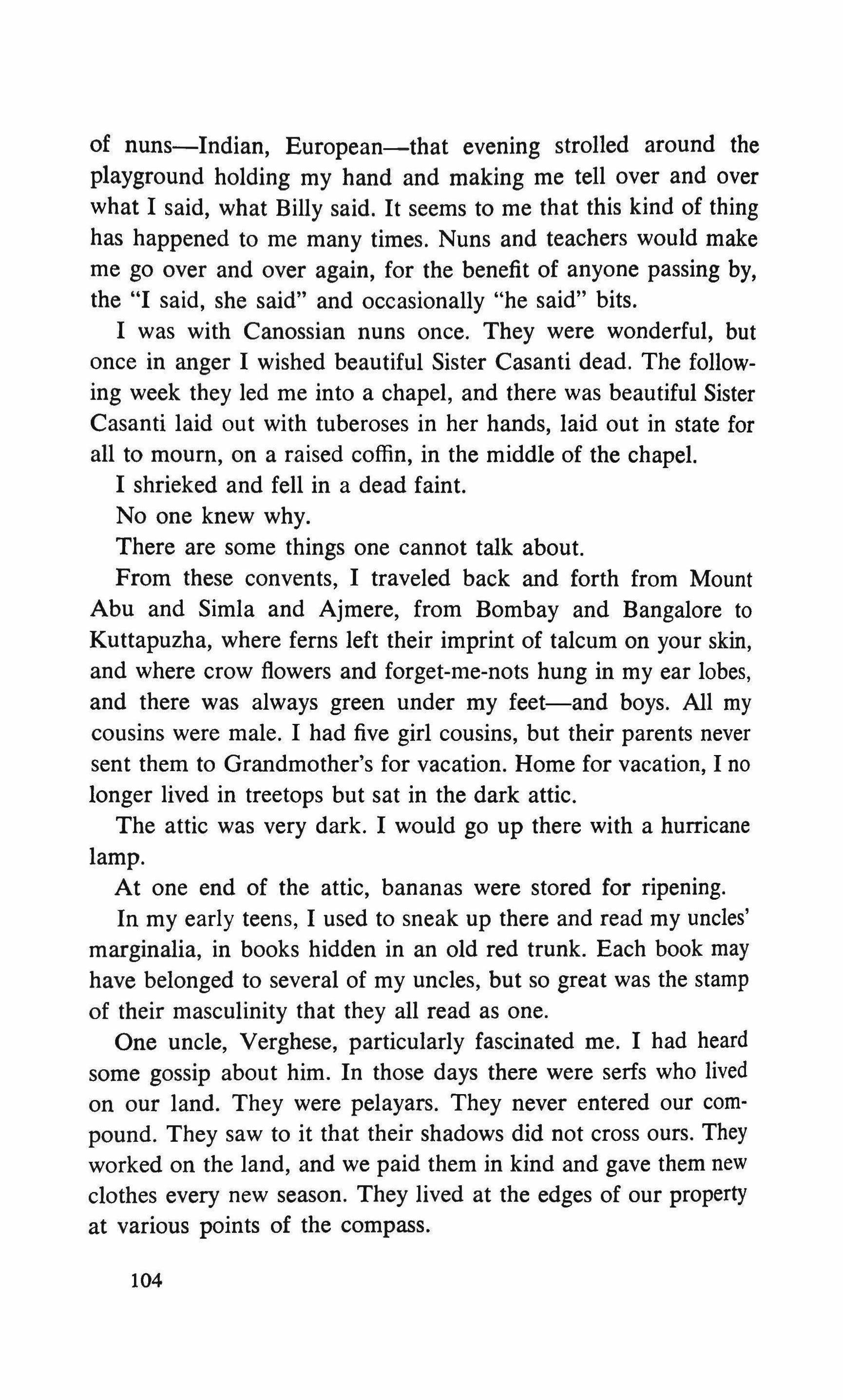
of nuns-Indian, European-that evening strolled around the playground holding my hand and making me tell over and over what I said, what Billy said. It seems to me that this kind of thing has happened to me many times. Nuns and teachers would make me go over and over again, for the benefit of anyone passing by, the "I said, she said" and occasionally "he said" bits.
I was with Canossian nuns once. They were wonderful, but once in anger I wished beautiful Sister Casanti dead. The following week they led me into a chapel, and there was beautiful Sister Casanti laid out with tuberoses in her hands, laid out in state for all to mourn, on a raised coffin, in the middle of the chapel.
I shrieked and fell in a dead faint.
No one knew why.
There are some things one cannot talk about.
From these convents, I traveled back and forth from Mount Abu and Simla and Ajmere, from Bombay and Bangalore to Kuttapuzha, where ferns left their imprint of talcum on your skin, and where crow flowers and forget-me-nots hung in my ear lobes, and there was always green under my feet-and boys. All my cousins were male. I had five girl cousins, but their parents never sent them to Grandmother's for vacation. Home for vacation, I no longer lived in treetops but sat in the dark attic.
The attic was very dark. I would go up there with a hurricane lamp.
At one end of the attic, bananas were stored for ripening.
In my early teens, I used to sneak up there and read my uncles' marginalia, in books hidden in an old red trunk. Each book may have belonged to several of my uncles, but so great was the stamp of their masculinity that they all read as one.
One uncle, Verghese, particularly fascinated me. I had heard some gossip about him. In those days there were serfs who lived on our land. They were pelayars. They never entered our compound. They saw to it that their shadows did not cross ours. They worked on the land, and we paid them in kind and gave them new clothes every new season. They lived at the edges of our property at various points of the compass.
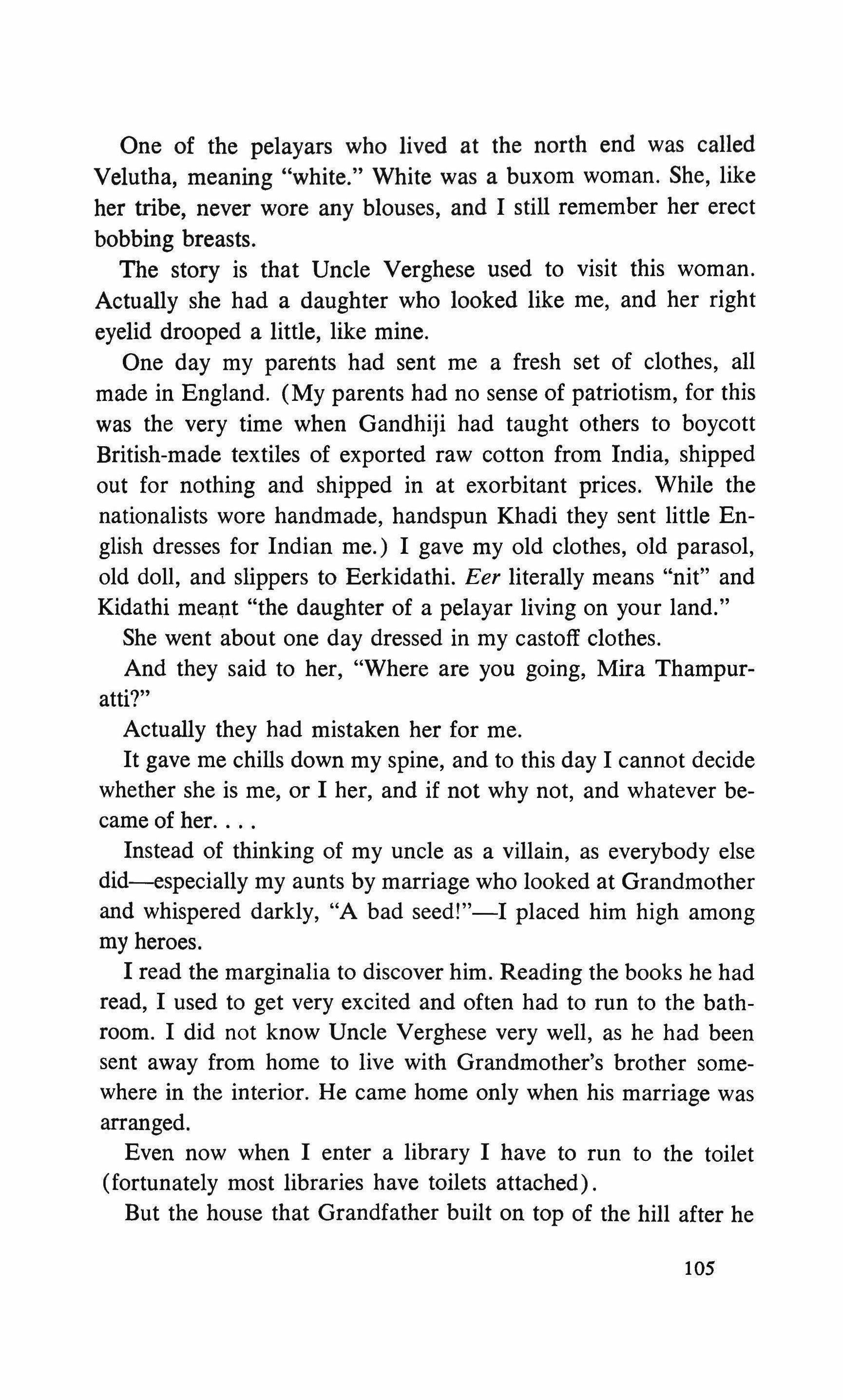
One of the pelayars who lived at the north end was called Velutha, meaning "white." White was a buxom woman. She, like her tribe, never wore any blouses, and I still remember her erect bobbing breasts.
The story is that Uncle Verghese used to visit this woman. Actually she had a daughter who looked like me, and her right eyelid drooped a little, like mine.
One day my parents had sent me a fresh set of clothes, all made in England. (My parents had no sense of patriotism, for this was the very time when Gandhiji had taught others to boycott British-made textiles of exported raw cotton from India, shipped out for nothing and shipped in at exorbitant prices. While the nationalists wore handmade, handspun Khadi they sent little English dresses for Indian me.) I gave myoid clothes, old parasol, old doll, and slippers to Eerkidathi. Eer literally means "nit" and Kidathi meant "the daughter of a pelayar living on your land."
She went about one day dressed in my castoff clothes.
And they said to her, "Where are you going, Mira Thampuratti?"
Actually they had mistaken her for me.
lt gave me chills down my spine, and to this day I cannot decide whether she is me, or I her, and if not why not, and whatever became of her
Instead of thinking of my uncle as a villain, as everybody else did-especially my aunts by marriage who looked at Grandmother and whispered darkly, "A bad seed!"-I placed him high among my heroes.
I read the marginalia to discover him. Reading the books he had read, I used to get very excited and often had to run to the bathroom. I did not know Uncle Verghese very well, as he had been sent away from home to live with Grandmother's brother somewhere in the interior. He came home only when his marriage was arranged.
Even now when I enter a library I have to run to the toilet (fortunately most libraries have toilets attached).
But the house that Grandfather built on top of the hill after he
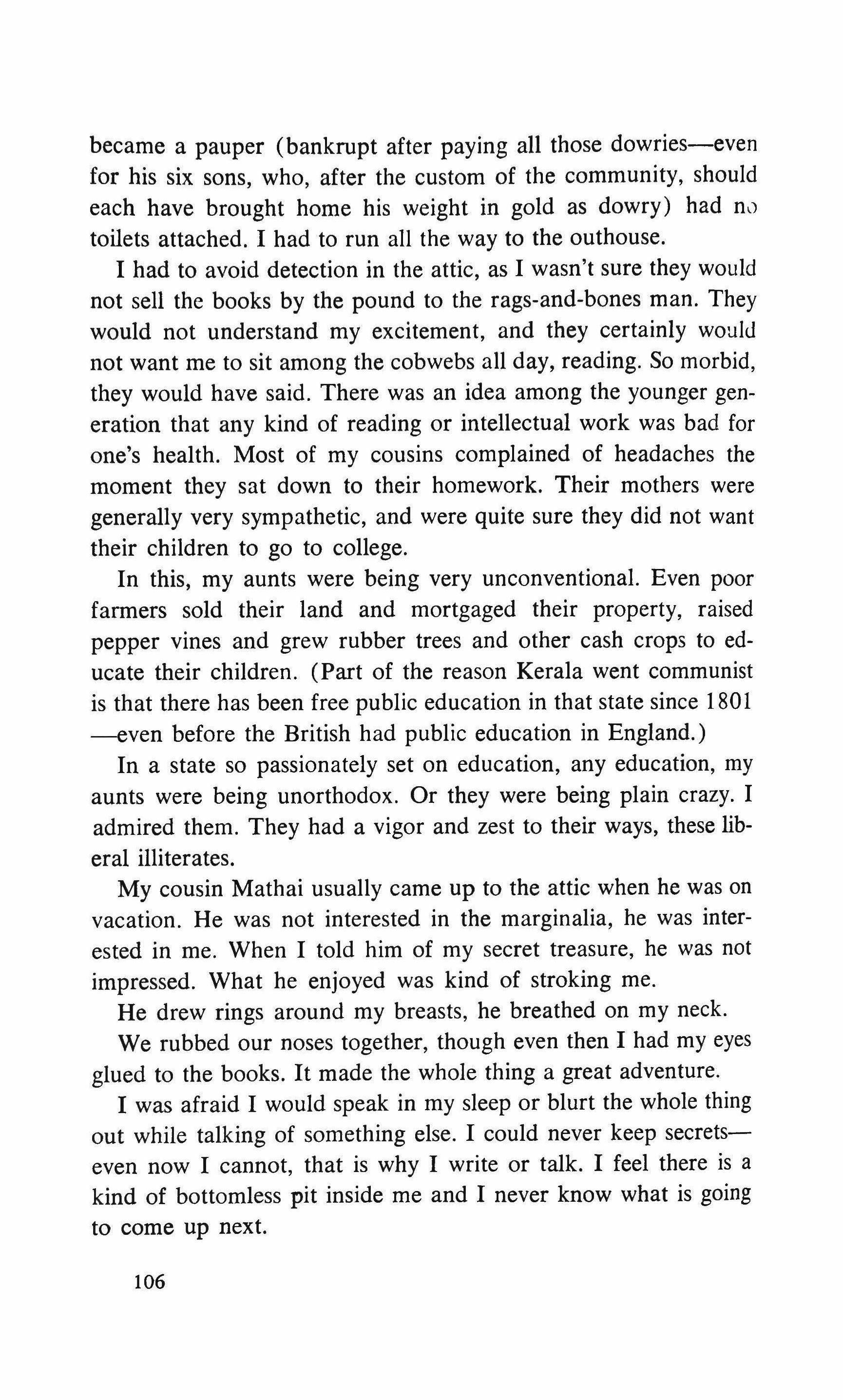
became a pauper (bankrupt after paying all those dowries-even for his six sons, who, after the custom of the community, should each have brought home his weight in gold as dowry) had no toilets attached. I had to run all the way to the outhouse.
I had to avoid detection in the attic, as I wasn't sure they would not sell the books by the pound to the rags-and-bones man. They would not understand my excitement, and they certainly would not want me to sit among the cobwebs all day, reading. So morbid, they would have said. There was an idea among the younger generation that any kind of reading or intellectual work was bad for one's health. Most of my cousins complained of headaches the moment they sat down to their homework. Their mothers were generally very sympathetic, and were quite sure they did not want their children to go to college.
In this, my aunts were being very unconventional. Even poor farmers sold their land and mortgaged their property, raised pepper vines and grew rubber trees and other cash crops to educate their children. (Part of the reason Kerala went communist is that there has been free public education in that state since 1801 --even before the British had public education in England.)
In a state so passionately set on education, any education, my aunts were being unorthodox. Or they were being plain crazy. I admired them. They had a vigor and zest to their ways, these liberal illiterates.
My cousin Mathai usually came up to the attic when he was on vacation. He was not interested in the marginalia, he was interested in me. When I told him of my secret treasure, he was not impressed. What he enjoyed was kind of stroking me.
He drew rings around my breasts, he breathed on my neck.
We rubbed our noses together, though even then I had my eyes glued to the books. It made the whole thing a great adventure.
I was afraid I would speak in my sleep or blurt the whole thing out while talking of something else. I could never keep secretseven now I cannot, that is why I write or talk. I feel there is a kind of bottomless pit inside me and I never know what is going to come up next.
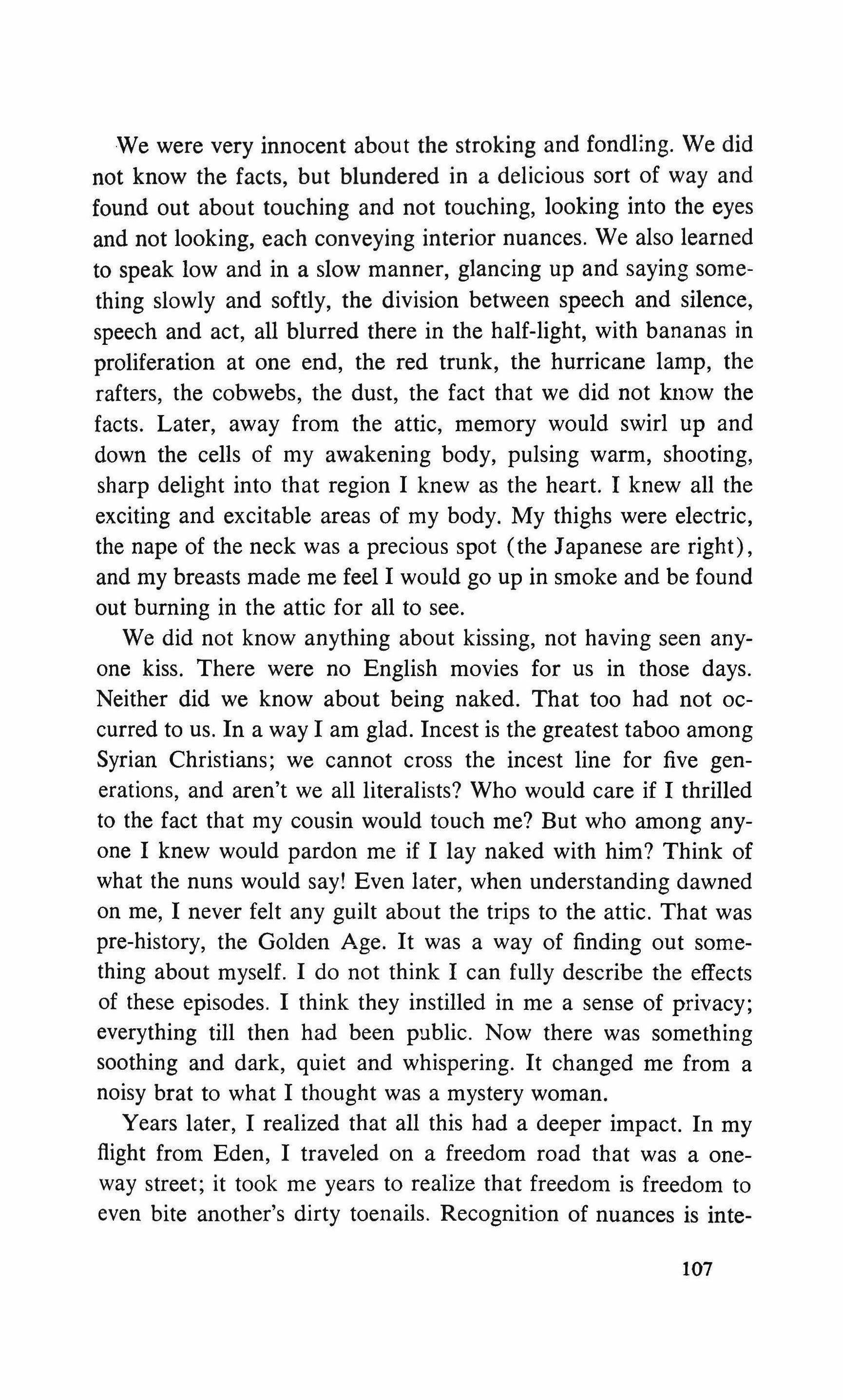
We were very innocent about the stroking and fondling, We did not know the facts, but blundered in a delicious sort of way and found out about touching and not touching, looking into the eyes and not looking, each conveying interior nuances. We also learned to speak low and in a slow manner, glancing up and saying something slowly and softly, the division between speech and silence, speech and act, all blurred there in the half-light, with bananas in proliferation at one end, the red trunk, the hurricane lamp, the rafters, the cobwebs, the dust, the fact that we did not know the facts. Later, away from the attic, memory would swirl up and down the cells of my awakening body, pulsing warm, shooting, sharp delight into that region I knew as the heart. I knew all the exciting and excitable areas of my body. My thighs were electric, the nape of the neck was a precious spot (the Japanese are right), and my breasts made me feel I would go up in smoke and be found out burning in the attic for all to see.
We did not know anything about kissing, not having seen anyone kiss. There were no English movies for us in those days. Neither did we know about being naked. That too had not occurred to us. In a way I am glad. Incest is the greatest taboo among Syrian Christians; we cannot cross the incest line for five generations, and aren't we all literalists? Who would care if I thrilled to the fact that my cousin would touch me? But who among anyone I knew would pardon me if I lay naked with him? Think of what the nuns would say! Even later, when understanding dawned on me, I never felt any guilt about the trips to the attic. That was pre-history, the Golden Age. It was a way of finding out something about myself. I do not think I can fully describe the effects of these episodes. I think they instilled in me a sense of privacy; everything till then had been public. Now there was something soothing and dark, quiet and whispering. It changed me from a noisy brat to what I thought was a mystery woman.
Years later, I realized that all this had a deeper impact. In my flight from Eden, I traveled on a freedom road that was a oneway street; it took me years to realize that freedom is freedom to even bite another's dirty toenails. Recognition of nuances is inte-
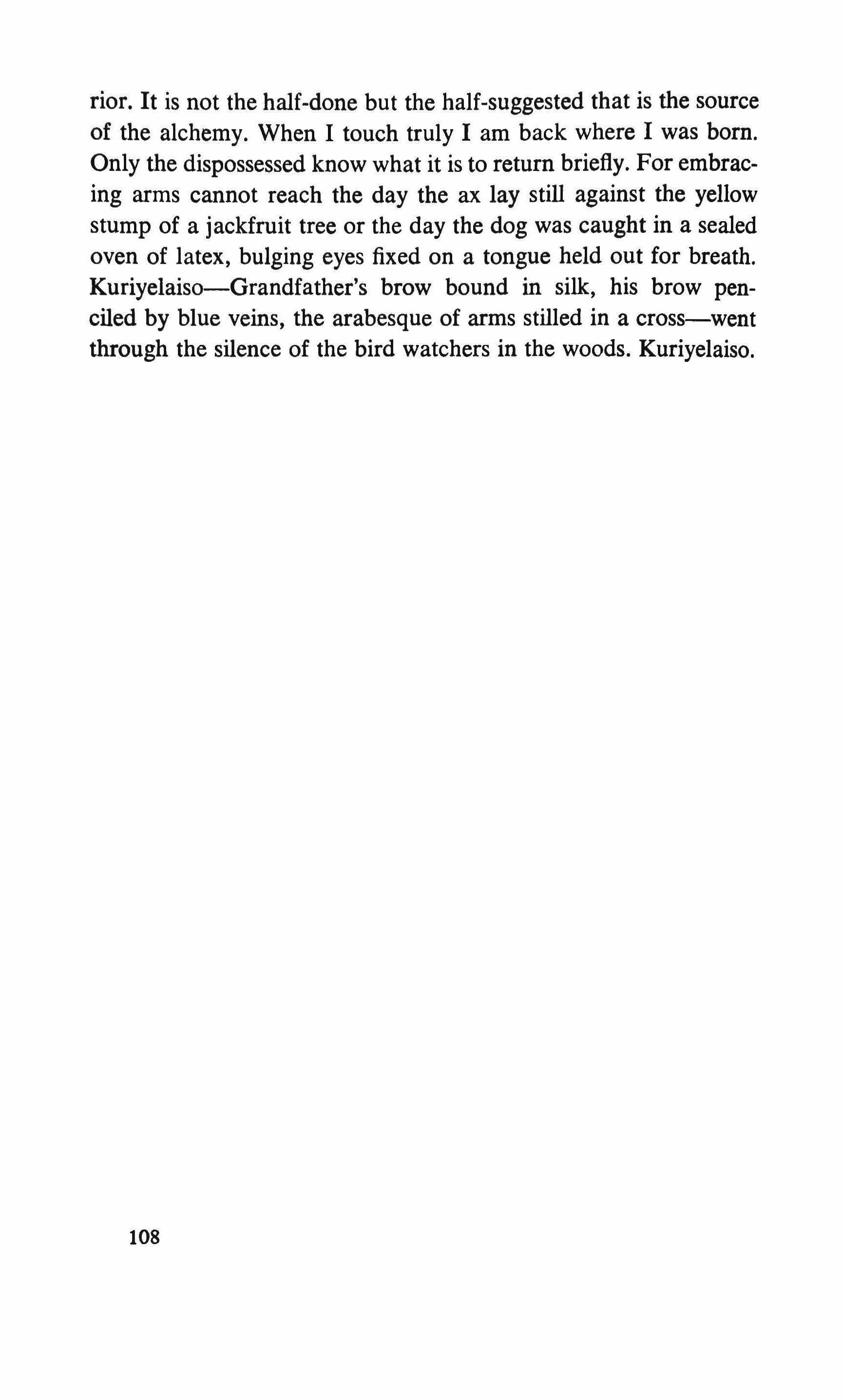
rior. It is not the half-done but the half-suggested that is the source of the alchemy. When I touch truly I am back where I was born. Only the dispossessed know what it is to return briefly. For embracing arms cannot reach the day the ax lay still against the yellow stump of a jackfruit tree or the day the dog was caught in a sealed oven of latex, bulging eyes fixed on a tongue held out for breath. Kuriyelaiso-Grandfather's brow bound in silk, his brow penciled by blue veins, the arabesque of arms stilled in a cross-went through the silence of the bird watchers in the woods. Kuriyelaiso.
translated from the Japanese by
J. T. Rimer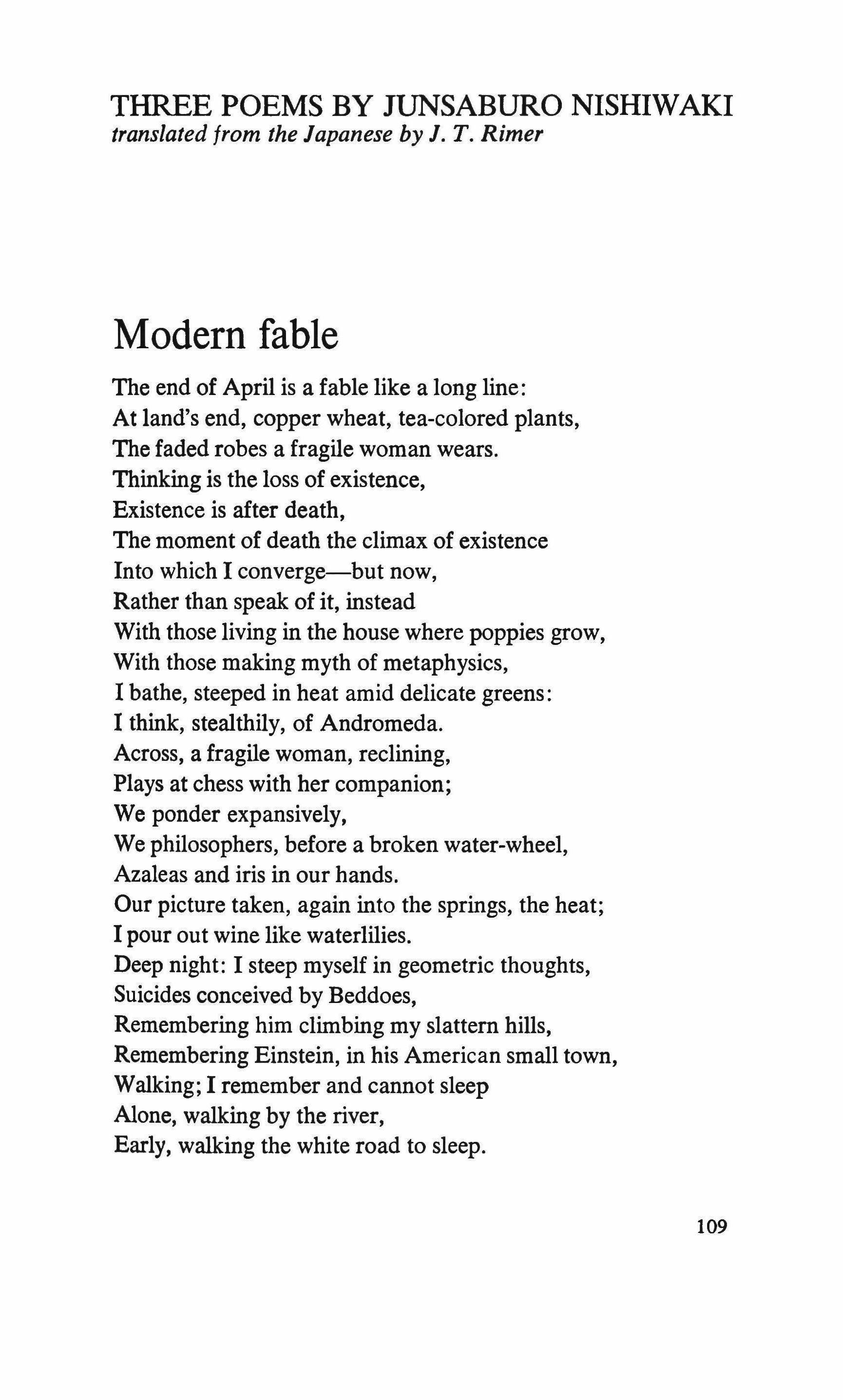
The end of April is a fable like a long line: At land's end, copper wheat, tea-colored plants, The faded robes a fragile woman wears. Thinking is the loss of existence, Existence is after death, The moment of death the climax of existence Into which I converge-but now, Rather than speak of it, instead With those living in the house where poppies grow, With those making myth of metaphysics, I bathe, steeped in heat amid delicate greens: I think, stealthily, of Andromeda.
Across, a fragile woman, reclining, Plays at chess with her companion; We ponder expansively, We philosophers, before a broken water-wheel, Azaleas and iris in our hands.
Our picture taken, again into the springs, the heat; I pour out wine like waterlilies.
Deep night: I steep myself in geometric thoughts, Suicides conceived by Beddoes, Remembering him climbing my slattern hills, Remembering Einstein, in his American small town, Walking; I remember and cannot sleep
Alone, walking by the river, Early, walking the white road to sleep.
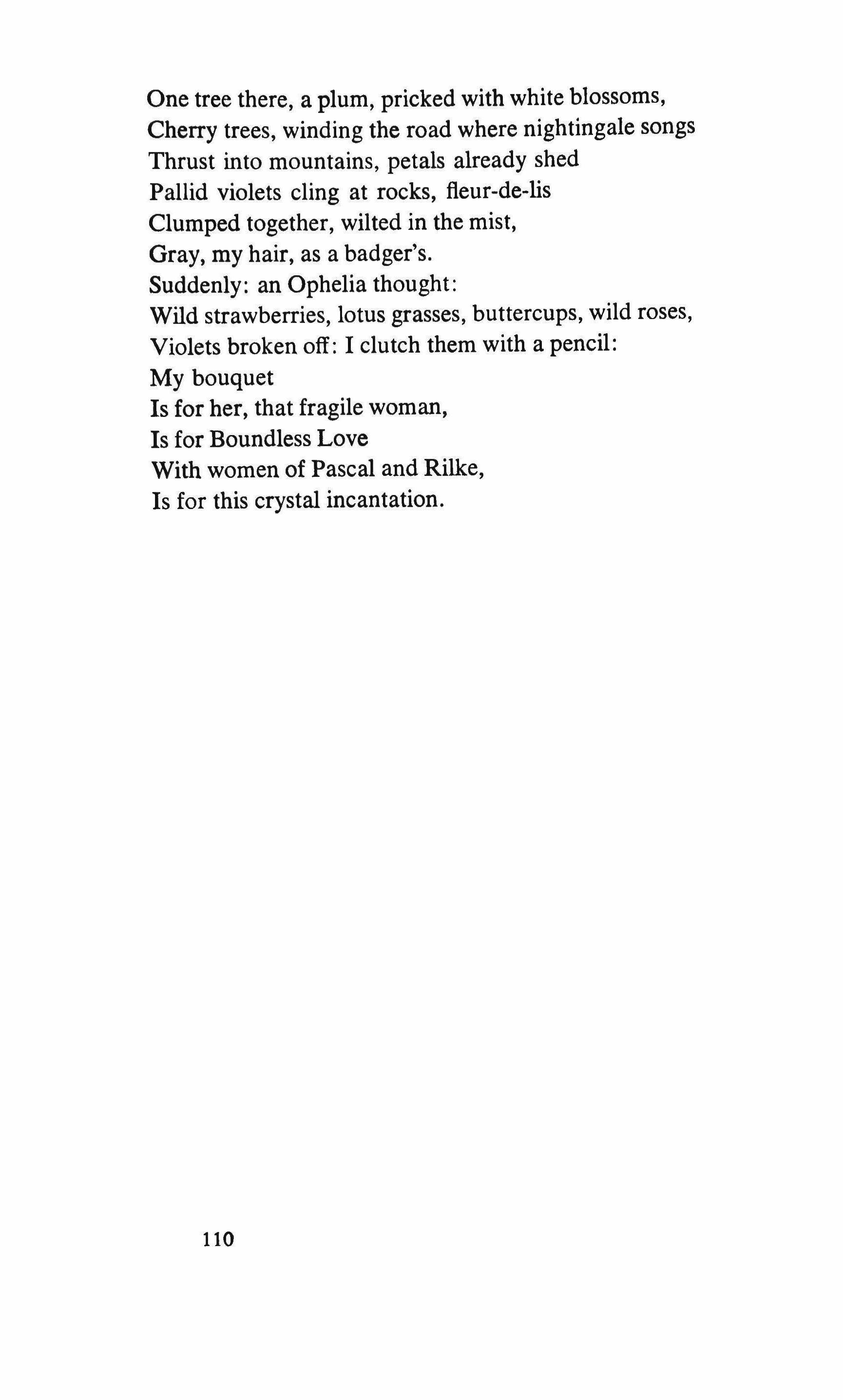
One tree there, a plum, pricked with white blossoms, Cherry trees, winding the road where nightingale songs Thrust into mountains, petals already shed Pallid violets cling at rocks, fleur-de-lis
Clumped together, wilted in the mist, Gray, my hair, as a badger's.
Suddenly: an Ophelia thought: Wild strawberries, lotus grasses, buttercups, wild roses, Violets broken off: I clutch them with a pencil: My bouquet Is for her, that fragile woman, Is for Boundless Love
With women of Pascal and Rilke, Is for this crystal incantation.
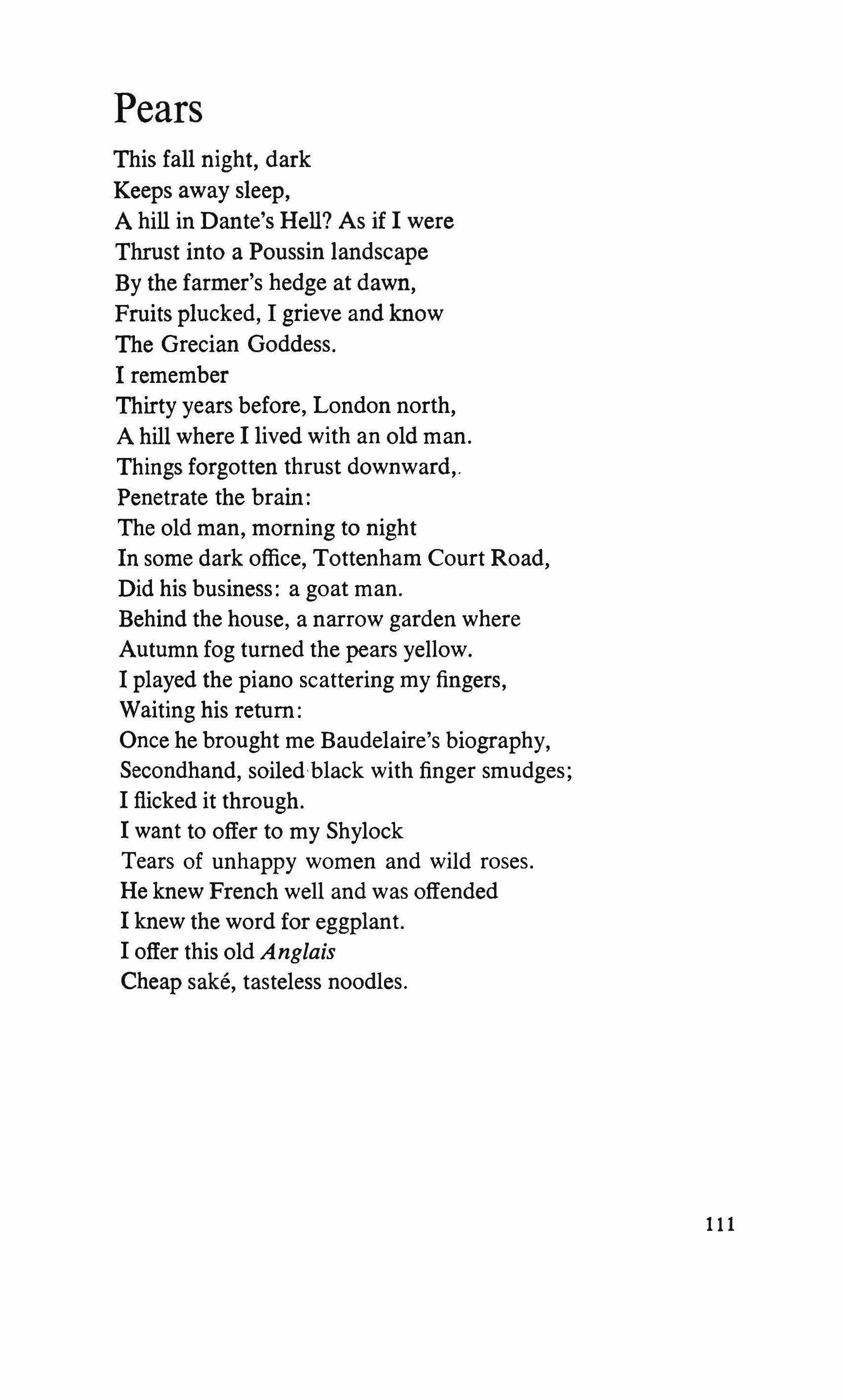
This fall night, dark Keeps away sleep, A hill in Dante's Hell? As if I were Thrust into a Poussin landscape
By the farmer's hedge at dawn, Fruits plucked, I grieve and know The Grecian Goddess.
I remember
Thirty years before, London north, A hill where I lived with an old man. Things forgotten thrust downward,.
Penetrate the brain:
The old man, morning to night
In some dark office, Tottenham Court Road, Did his business: a goat man.
Behind the house, a narrow garden where Autumn fog turned the pears yellow.
I played the piano scattering my fingers,
Waiting his return:
Once he brought me Baudelaire's biography, Secondhand, soiled black with finger smudges; I flicked it through.
I want to offer to my Shylock
Tears of unhappy women and wild roses.
He knew French well and was offended
I knew the word for eggplant.
I offer this old Anglais
Cheap sake, tasteless noodles.
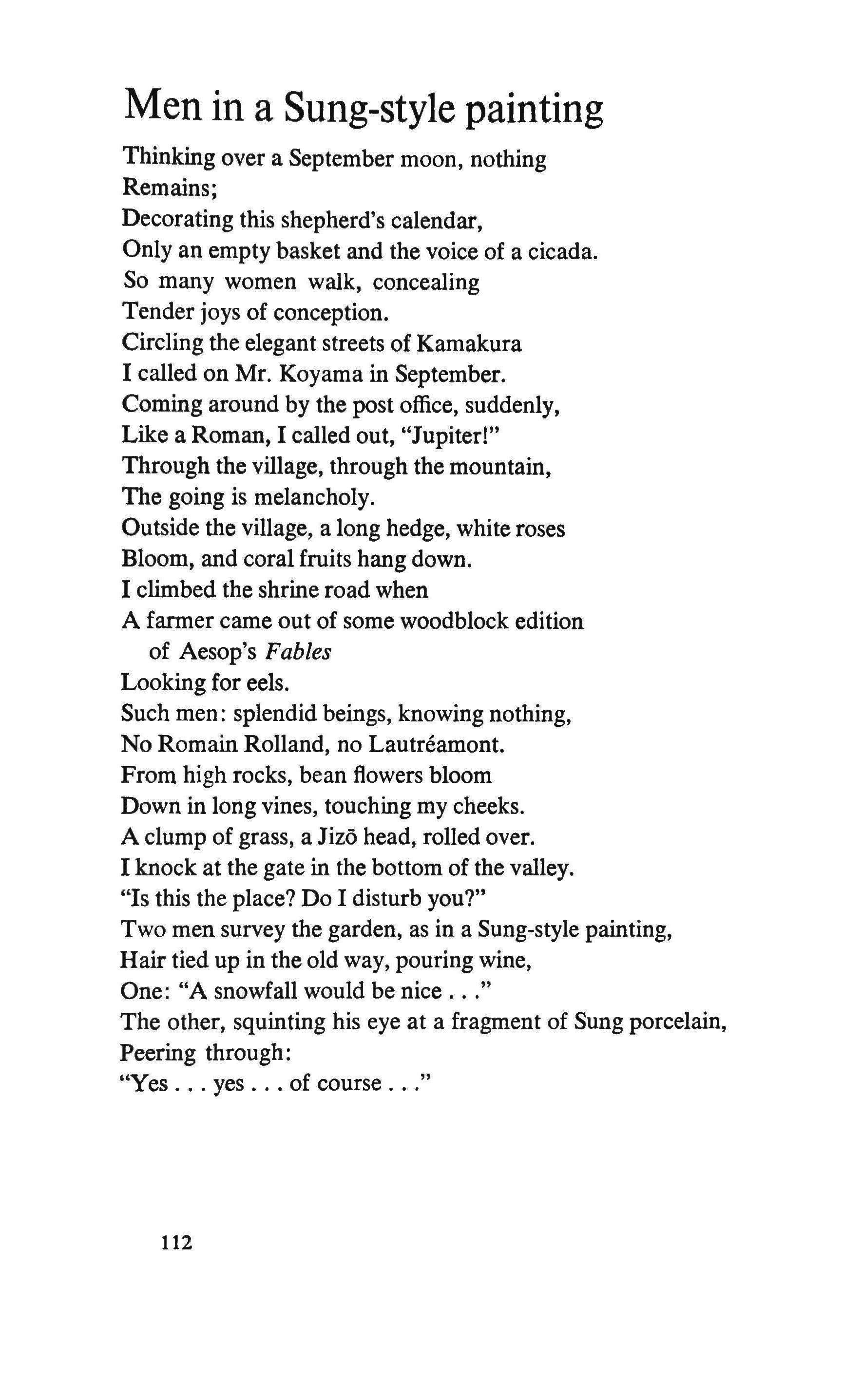
Thinking over a September moon, nothing Remains;
Decorating this shepherd's calendar, Only an empty basket and the voice of a cicada.
So many women walk, concealing Tender joys of conception.
Circling the elegant streets of Kamakura
I called on Mr. Koyama in September.
Coming around by the post office, suddenly, Like a Roman, I called out, "Jupiter!"
Through the village, through the mountain, The going is melancholy.
Outside the village, a long hedge, white roses Bloom, and coral fruits hang down.
I climbed the shrine road when
A farmer came out of some woodblock edition of Aesop's Fables
Looking for eels.
Such men: splendid beings, knowing nothing, No Romain Rolland, no Lautreamont, From high rocks, bean flowers bloom Down in long vines, touching my cheeks.
A clump of grass, a Jizo head, rolled over.
I knock at the gate in the bottom of the valley.
"Is this the place? Do I disturb you?"
Two men survey the garden, as in a Sung-style painting, Hair tied up in the old way, pouring wine, One: "A snowfall would be nice
The other, squinting his eye at a fragment of Sung porcelain, Peering through:
"Yes yes of course
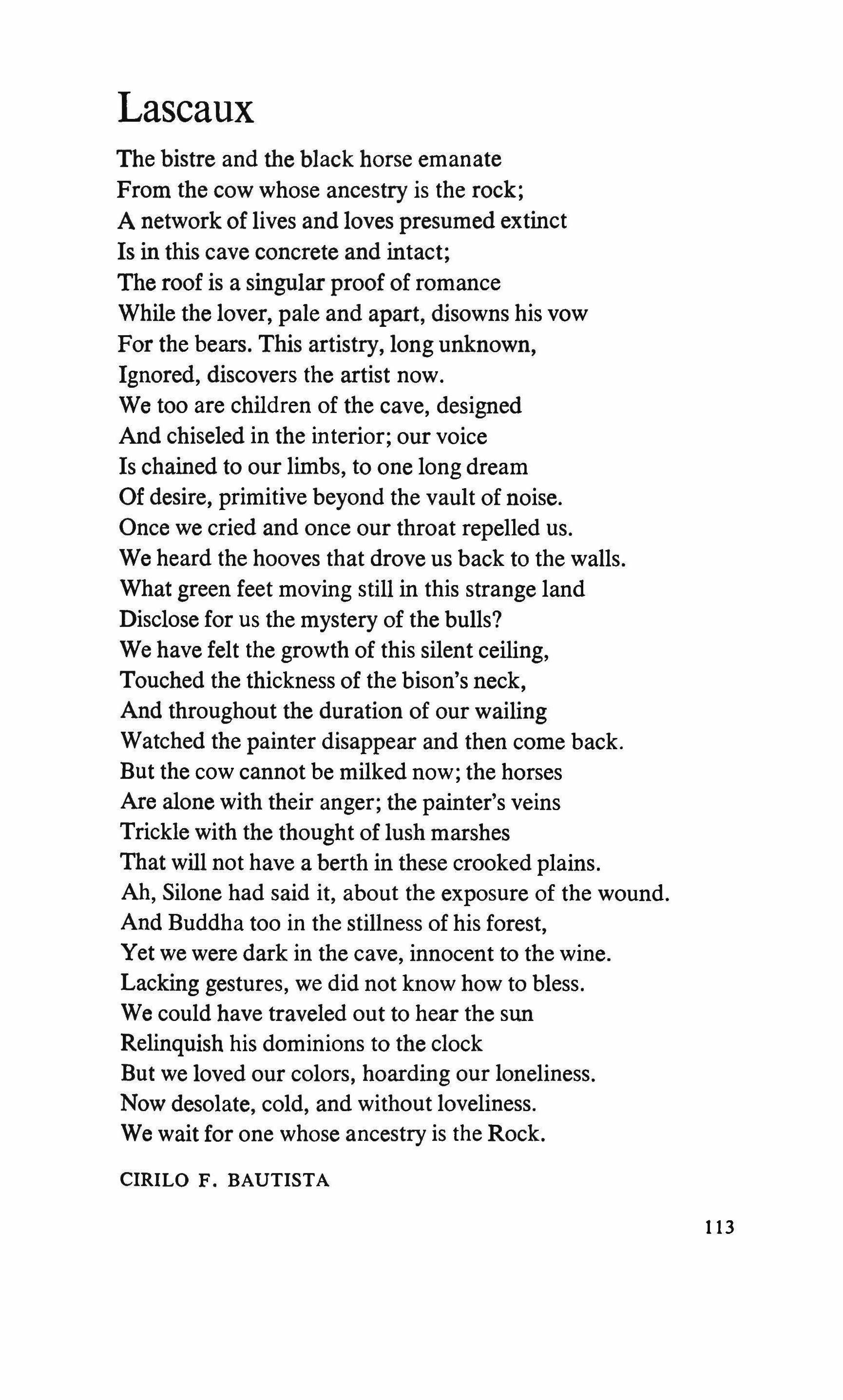
The bistre and the black horse emanate
From the cow whose ancestry is the rock; A network of lives and loves presumed extinct Is in this cave concrete and intact;
The roof is a singular proof of romance
While the lover, pale and apart, disowns his vow For the bears. This artistry, long unknown, Ignored, discovers the artist now.
We too are children of the cave, designed And chiseled in the interior; our voice Is chained to our limbs, to one long dream
Of desire, primitive beyond the vault of noise.
Once we cried and once our throat repelled us.
We heard the hooves that drove us back to the walls.
What green feet moving still in this strange land
Disclose for us the mystery of the bulls?
We have felt the growth of this silent ceiling, Touched the thickness of the bison's neck, And throughout the duration of our wailing Watched the painter disappear and then come back.
But the cow cannot be milked now; the horses Are alone with their anger; the painter's veins
Trickle with the thought of lush marshes
That will not have a berth in these crooked plains. Ah, Silone had said it, about the exposure of the wound. And Buddha too in the stillness of his forest, Yet we were dark in the cave, innocent to the wine.
Lacking gestures, we did not know how to bless.
We could have traveled out to hear the sun
Relinquish his dominions to the clock
But we loved our colors, hoarding our loneliness.
Now desolate, cold, and without loveliness.
We wait for one whose ancestry is the Rock.
CIRILO F. BAUTISTA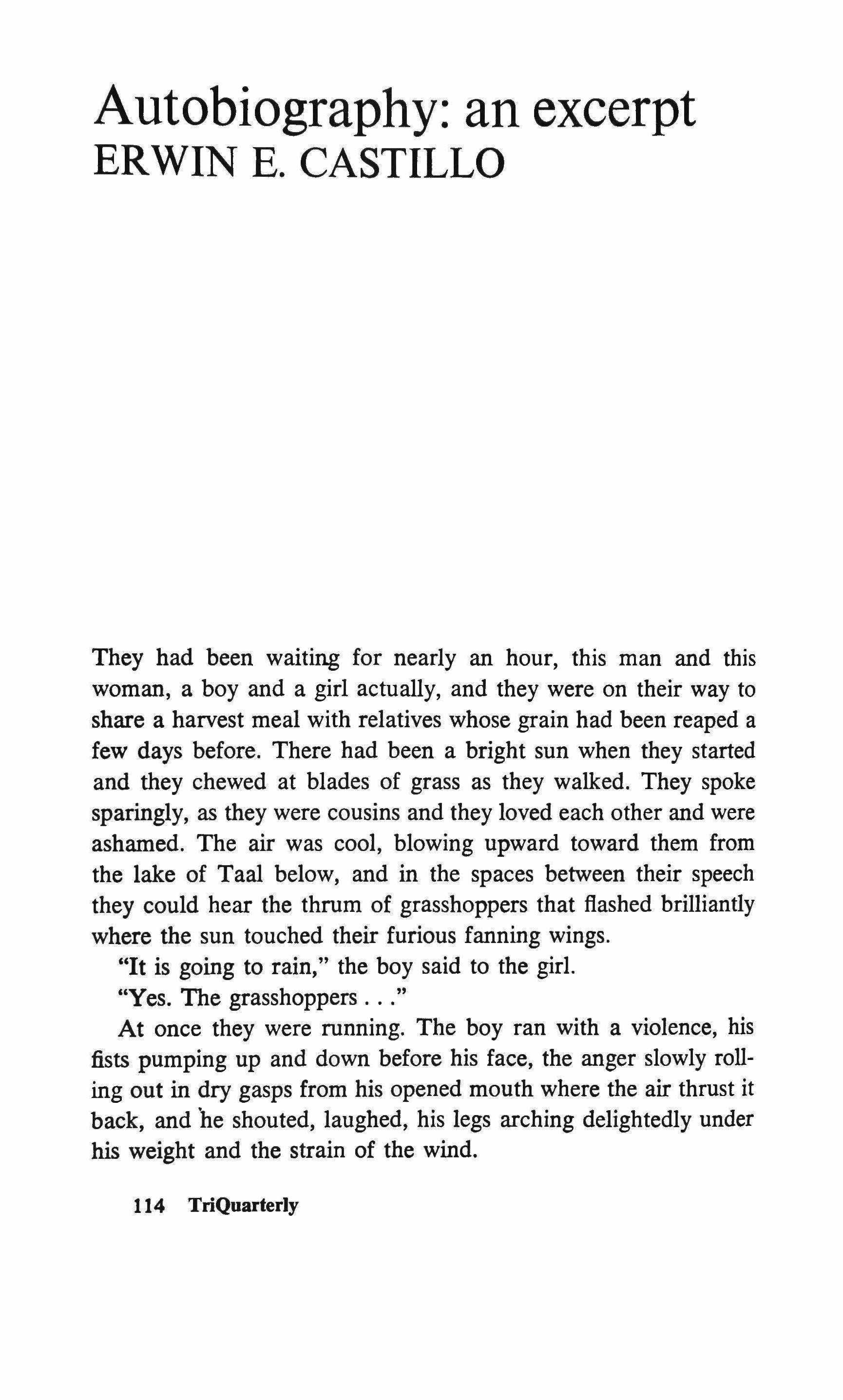
They had been waiting for nearly an hour, this man and this woman, a boy and a girl actually, and they were on their way to share a harvest meal with relatives whose grain had been reaped a few days before. There had been a bright sun when they started and they chewed at blades of grass as they walked. They spoke sparingly, as they were cousins and they loved each other and were ashamed. The air was cool, blowing upward toward them from the lake of Taal below, and in the spaces between their speech they could hear the thrum of grasshoppers that flashed brilliantly where the sun touched their furious fanning wings.
"It is going to rain," the boy said to the girl.
"Yes. The grasshoppers
At once they were running. The boy ran with a violence, his fists pumping up and down before his face, the anger slowly rolling out in dry gasps from his opened mouth where the air thrust it back, and he shouted, laughed, his legs arching delightedly under his weight and the strain of the wind.
114 TrlQuarterly
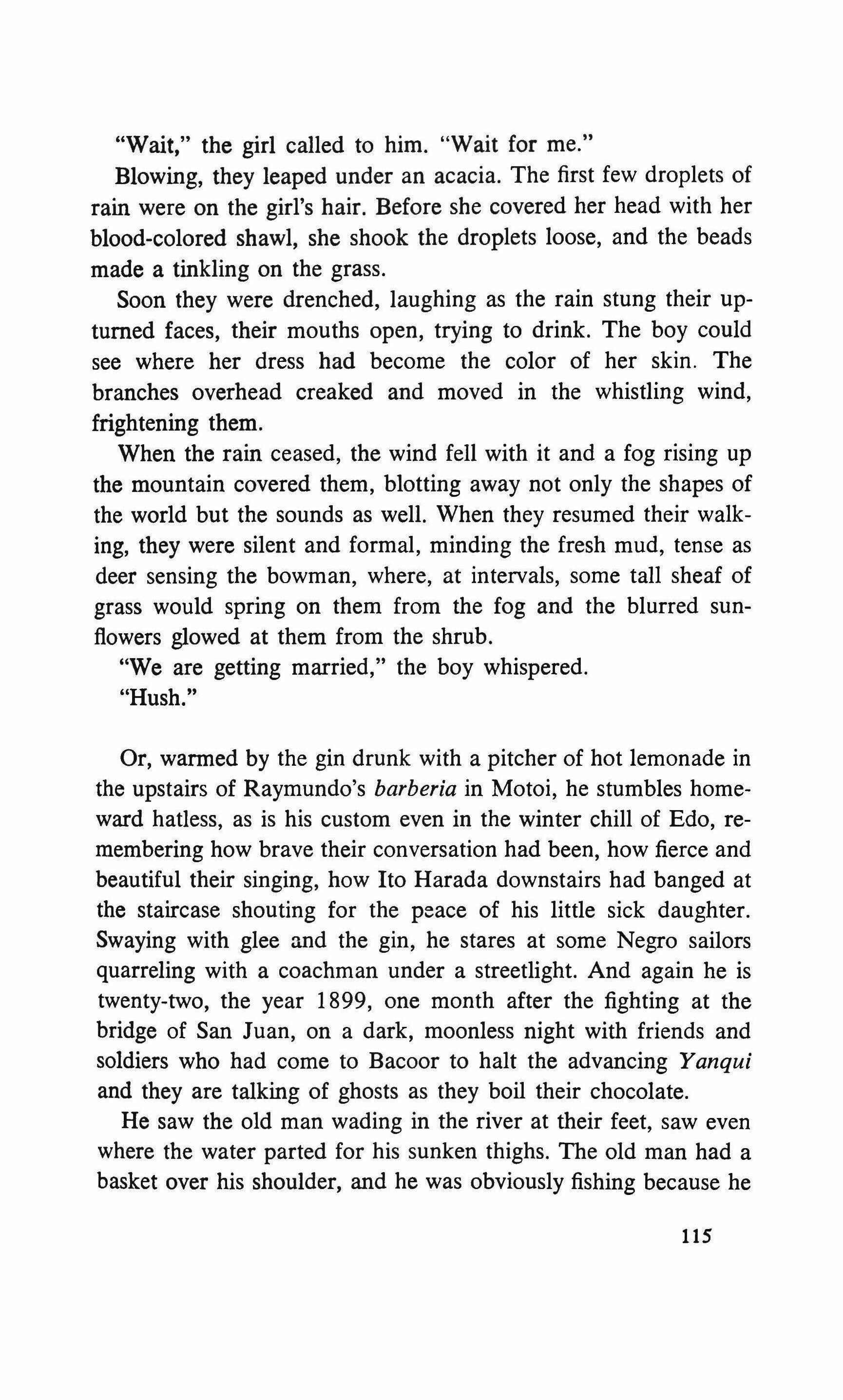
"Wait," the girl called to him. "Wait for me."
Blowing, they leaped under an acacia. The first few droplets of rain were on the girl's hair. Before she covered her head with her blood-colored shawl, she shook the droplets loose, and the beads made a tinkling on the grass.
Soon they were drenched, laughing as the rain stung their upturned faces, their mouths open, trying to drink. The boy could see where her dress had become the color of her skin. The branches overhead creaked and moved in the whistling wind, frightening them.
When the rain ceased, the wind fell with it and a fog rising up the mountain covered them, blotting away not only the shapes of the world but the sounds as well. When they resumed their walking, they were silent and formal, minding the fresh mud, tense as deer sensing the bowman, where, at intervals, some tall sheaf of grass would spring on them from the fog and the blurred sunflowers glowed at them from the shrub.
"We are getting married," the boy whispered. "Hush."
Or, warmed by the gin drunk with a pitcher of hot lemonade in the upstairs of Raymundo's barberia in Motoi, he stumbles homeward hatless, as is his custom even in the winter chill of Edo, remembering how brave their conversation had been, how fierce and beautiful their singing, how Ito Harada downstairs had banged at the staircase shouting for the peace of his little sick daughter. Swaying with glee and the gin, he stares at some Negro sailors quarreling with a coachman under a streetlight. And again he is twenty-two, the year 1899, one month after the fighting at the bridge of San Juan, on a dark, moonless night with friends and soldiers who had come to Bacoor to halt the advancing Yanqui and they are talking of ghosts as they boil their chocolate.
He saw the old man wading in the river at their feet, saw even where the water parted for his sunken thighs. The old man had a basket over his shoulder, and he was obviously fishing because he
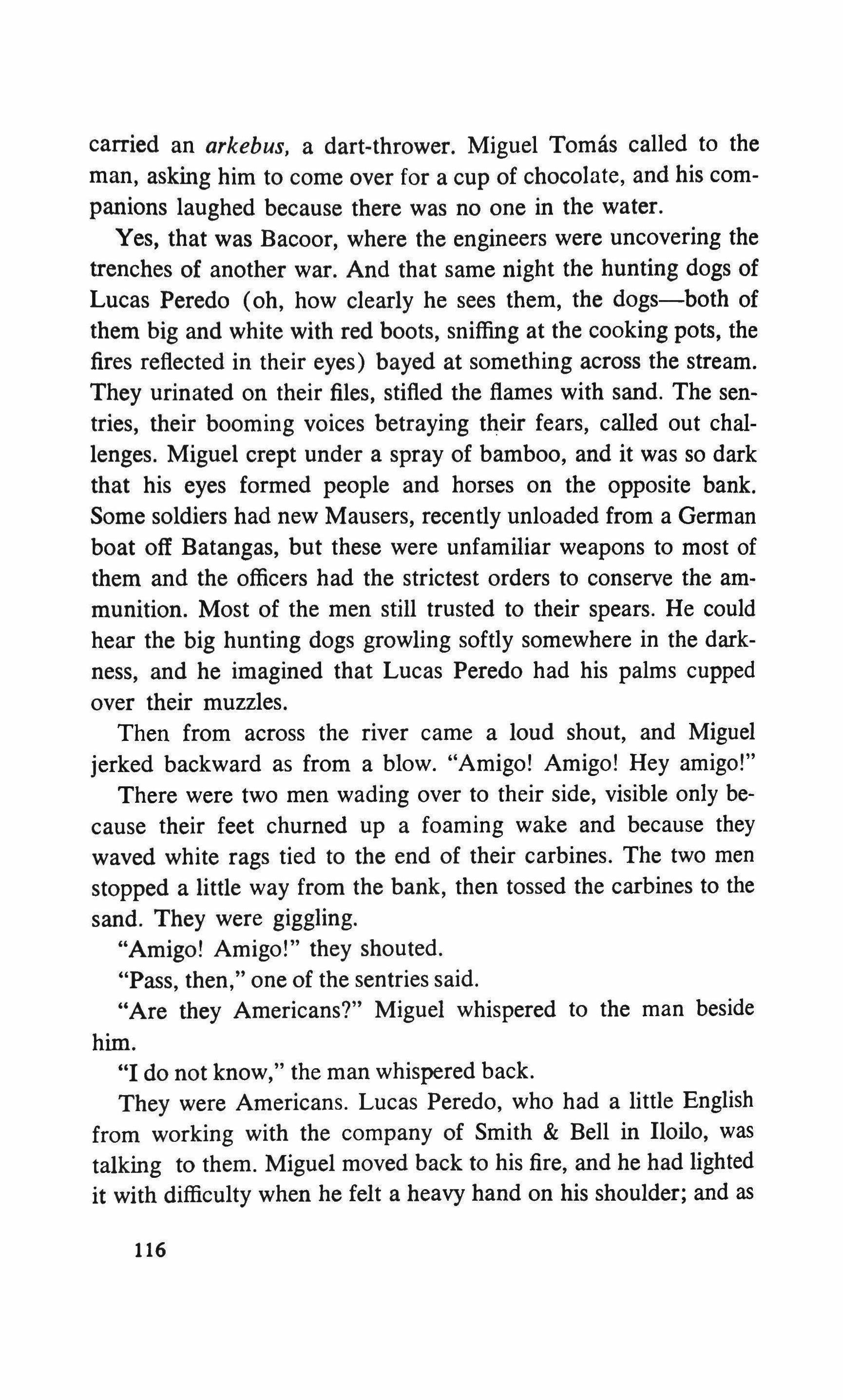
carried an arkebus, a dart-thrower. Miguel Tomas called to the man, asking him to come over for a cup of chocolate, and his companions laughed because there was no one in the water.
Yes, that was Bacoor, where the engineers were uncovering the trenches of another war. And that same night the hunting dogs of Lucas Peredo (oh, how clearly he sees them, the dogs-both of them big and white with red boots, sniffing at the cooking pots, the fires reflected in their eyes) bayed at something across the stream. They urinated on their files, stifled the flames with sand. The sentries, their booming voices betraying their fears, called out challenges. Miguel crept under a spray of bamboo, and it was so dark that his eyes formed people and horses on the opposite bank. Some soldiers had new Mausers, recently unloaded from a German boat off Batangas, but these were unfamiliar weapons to most of them and the officers had the strictest orders to conserve the ammunition. Most of the men still trusted to their spears. He could hear the big hunting dogs growling softly somewhere in the darkness, and he imagined that Lucas Peredo had his palms cupped over their muzzles.
Then from across the river came a loud shout, and Miguel jerked backward as from a blow. "Amigo! Amigo! Hey amigo!"
There were two men wading over to their side, visible only because their feet churned up a foaming wake and because they waved white rags tied to the end of their carbines. The two men stopped a little way from the bank, then tossed the carbines to the sand. They were giggling.
"Amigo! Amigo!" they shouted.
"Pass, then," one of the sentries said.
"Are they Americans?" Miguel whispered to the man beside him.
"I do not know," the man whispered back. They were Americans. Lucas Peredo, who had a little English from working with the company of Smith & Bell in Iloilo, was talking to them. Miguel moved back to his fire, and he had lighted it with difficulty when he felt a heavy hand on his shoulder; and as
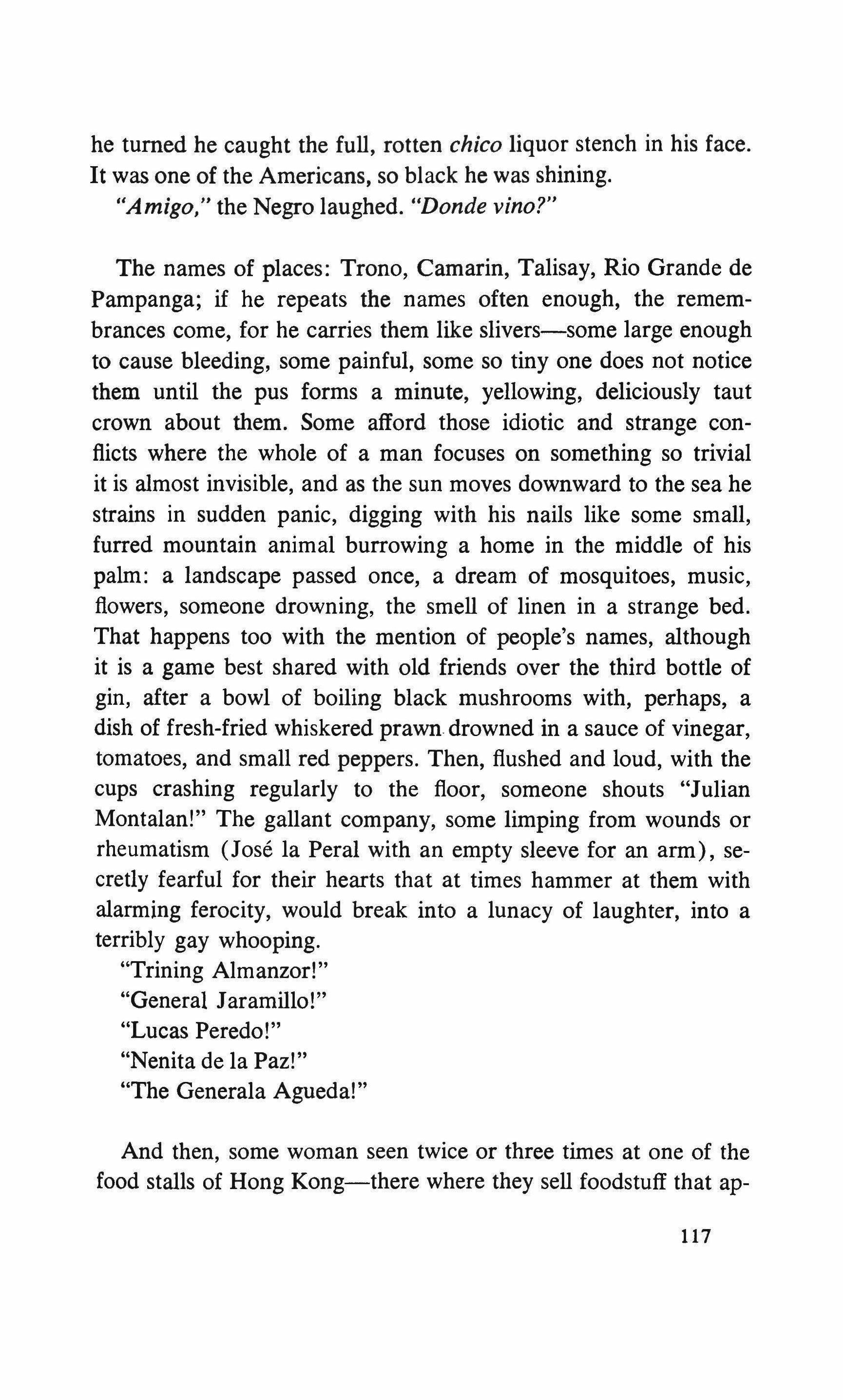
he turned he caught the full, rotten chico liquor stench in his face. It was one of the Americans, so black he was shining.
"Amigo," the Negro laughed. "Donde vino?''
The names of places: Trono, Camarin, Talisay, Rio Grande de Pampanga; if he repeats the names often enough, the remembrances come, for he carries them like slivers-some large enough to cause bleeding, some painful, some so tiny one does not notice them until the pus forms a minute, yellowing, deliciously taut crown about them. Some afford those idiotic and strange conflicts where the whole of a man focuses on something so trivial it is almost invisible, and as the sun moves downward to the sea he strains in sudden panic, digging with his nails like some small, furred mountain animal burrowing a home in the middle of his palm: a landscape passed once, a dream of mosquitoes, music, flowers, someone drowning, the smell of linen in a strange bed. That happens too with the mention of people's names, although it is a game best shared with old friends over the third bottle of gin, after a bowl of boiling black mushrooms with, perhaps, a dish of fresh-fried whiskered prawn drowned in a sauce of vinegar, tomatoes, and small red peppers. Then, flushed and loud, with the cups crashing regularly to the floor, someone shouts "Julian Montalan!" The gallant company, some limping from wounds or rheumatism (Jose la Peral with an empty sleeve for an arm), secretly fearful for their hearts that at times hammer at them with alarming ferocity, would break into a lunacy of laughter, into a terribly gay whooping.
"Trining Almanzor!"
"General Jaramillo!"
"Lucas Peredo!"
"Nenita de la Paz!"
"The Generala Agueda!"
And then, some woman seen twice or three times at one of the food stalls of Hong Kong-there where they sell foodstuff that ap-
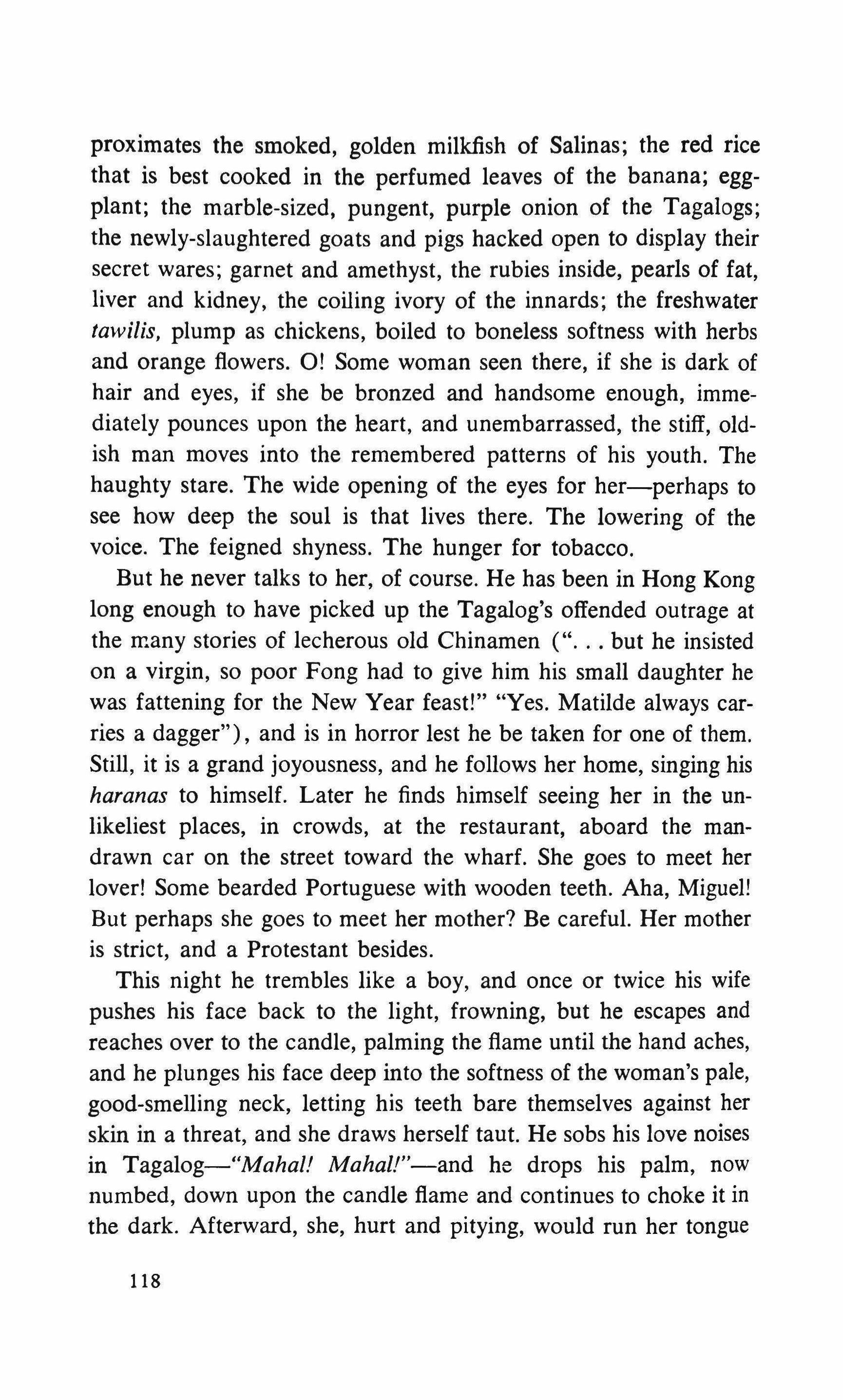
proximates the smoked, golden milkfish of Salinas; the red rice that is best cooked in the perfumed leaves of the banana; eggplant; the marble-sized, pungent, purple onion of the Tagalogs; the newly-slaughtered goats and pigs hacked open to display their secret wares; garnet and amethyst, the rubies inside, pearls of fat, liver and kidney, the coiling ivory of the innards; the freshwater tawilis, plump as chickens, boiled to boneless softness with herbs and orange flowers. O! Some woman seen there, if she is dark of hair and eyes, if she be bronzed and handsome enough, immediately pounces upon the heart, and unembarrassed, the stiff, oldish man moves into the remembered patterns of his youth. The haughty stare. The wide opening of the eyes for her-perhaps to see how deep the soul is that lives there. The lowering of the voice. The feigned shyness. The hunger for tobacco.
But he never talks to her, of course. He has been in Hong Kong long enough to have picked up the Tagalog's offended outrage at the many stories of lecherous old Chinamen (" but he insisted on a virgin, so poor Fang had to give him his small daughter he was fattening for the New Year feast!" "Yes. Matilde always carries a dagger"), and is in horror lest he be taken for one of them. Still, it is a grand joyousness, and he follows her home, singing his haranas to himself. Later he finds himself seeing her in the unlikeliest places, in crowds, at the restaurant, aboard the mandrawn car on the street toward the wharf. She goes to meet her lover! Some bearded Portuguese with wooden teeth. Aha, Miguel! But perhaps she goes to meet her mother? Be careful. Her mother is strict, and a Protestant besides.
This night he trembles like a boy, and once or twice his wife pushes his face back to the light, frowning, but he escapes and reaches over to the candle, palming the flame until the hand aches, and he plunges his face deep into the softness of the woman's pale, good-smelling neck, letting his teeth bare themselves against her skin in a threat, and she draws herself taut. He sobs his love noises in Tagalog-"MahaJ! Maha/!"-and he drops his palm, now numbed, down upon the candle flame and continues to choke it in the dark. Afterward, she, hurt and pitying, would run her tongue
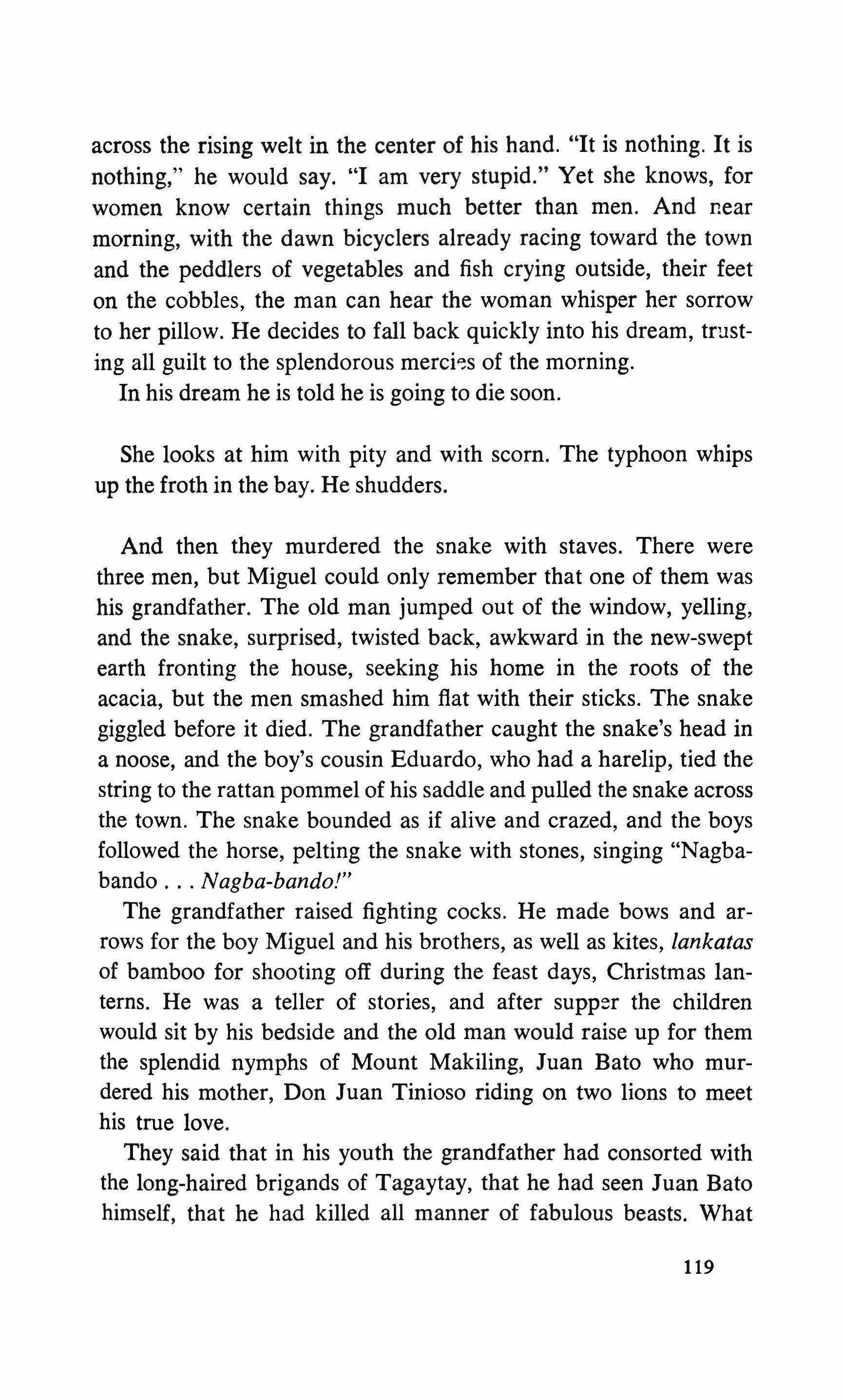
across the rising welt in the center of his hand. "It is nothing. It is nothing," he would say. "I am very stupid." Yet she knows, for women know certain things much better than men. And near morning, with the dawn bicyclers already racing toward the town and the peddlers of vegetables and fish crying outside, their feet on the cobbles, the man can hear the woman whisper her sorrow to her pillow. He decides to fall back quickly into his dream, trusting all guilt to the splendorous mercies of the morning.
In his dream he is told he is going to die soon.
She looks at him with pity and with scorn. The typhoon whips up the froth in the bay. He shudders.
And then they murdered the snake with staves. There were three men, but Miguel could only remember that one of them was his grandfather. The old man jumped out of the window, yelling, and the snake, surprised, twisted back, awkward in the new-swept earth fronting the house, seeking his home in the roots of the acacia, but the men smashed him flat with their sticks. The snake giggled before it died. The grandfather caught the snake's head in a noose, and the boy's cousin Eduardo, who had a harelip, tied the string to the rattan pommel of his saddle and pulled the snake across the town. The snake bounded as if alive and crazed, and the boys followed the horse, pelting the snake with stones, singing "Nagbabando Nagba-bando!"
The grandfather raised fighting cocks. He made bows and arrows for the boy Miguel and his brothers, as well as kites, lankatas of bamboo for shooting off during the feast days, Christmas lanterns. He was a teller of stories, and after supper the children would sit by his bedside and the old man would raise up for them the splendid nymphs of Mount Makiling, Juan Bato who murdered his mother, Don Juan Tinioso riding on two lions to meet his true love.
They said that in his youth the grandfather had consorted with the long-haired brigands of Tagaytay, that he had seen Juan Bato himself, that he had killed all manner of fabulous beasts. What
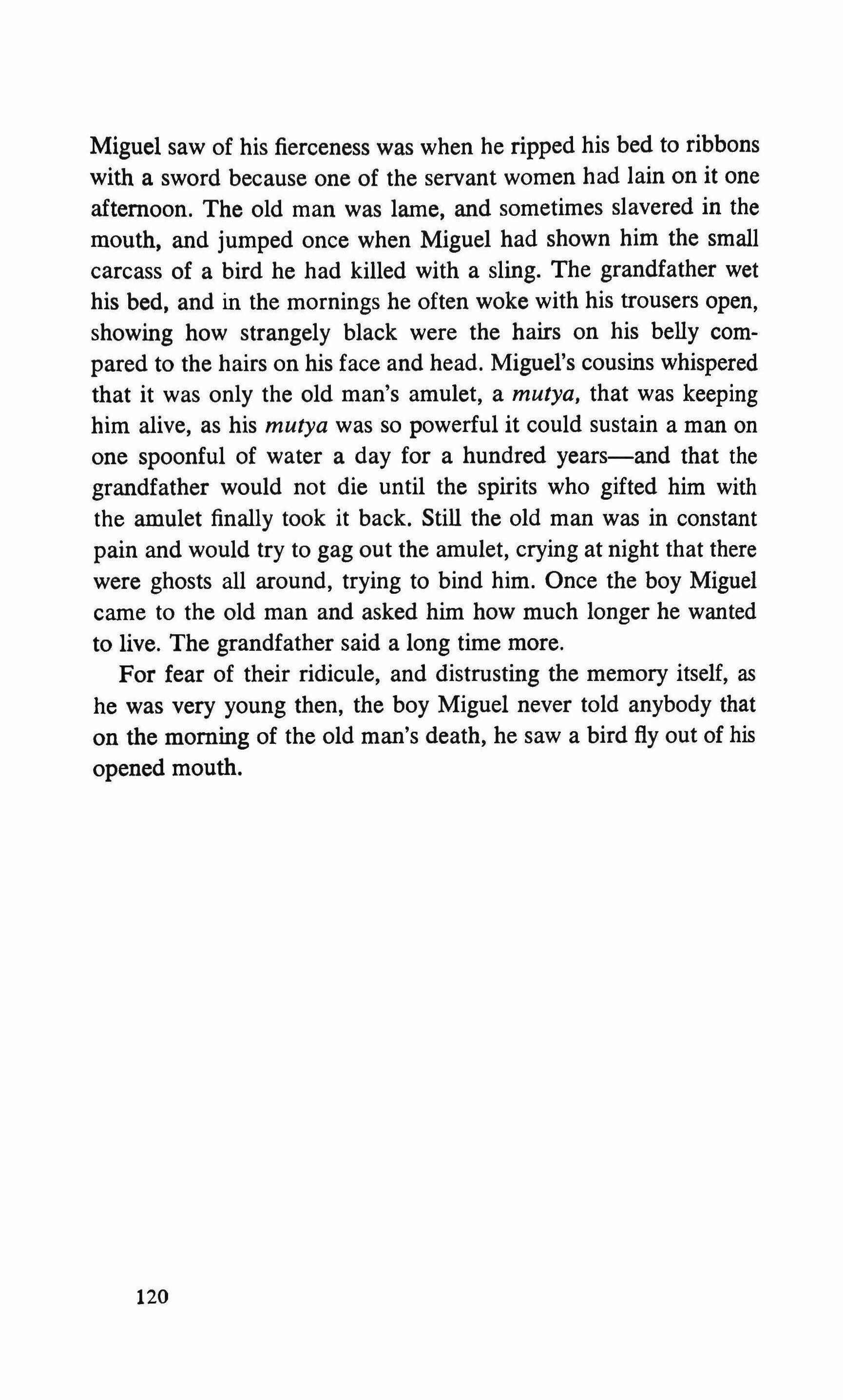
Miguel saw of his fierceness was when he ripped his bed to ribbons with a sword because one of the servant women had lain on it one afternoon. The old man was lame, and sometimes slavered in the mouth, and jumped once when Miguel had shown him the small carcass of a bird he had killed with a sling. The grandfather wet his bed, and in the mornings he often woke with his trousers open, showing how strangely black were the hairs on his belly compared to the hairs on his face and head. Miguel's cousins whispered that it was only the old man's amulet, a mutya, that was keeping him alive, as his mutya was so powerful it could sustain a man on one spoonful of water a day for a hundred years-and that the grandfather would not die until the spirits who gifted him with the amulet finally took it back. Still the old man was in constant pain and would try to gag out the amulet, crying at night that there were ghosts all around, trying to bind him. Once the boy Miguel came to the old man and asked him how much longer he wanted to live. The grandfather said a long time more.
For fear of their ridicule, and distrusting the memory itself, as he was very young then, the boy Miguel never told anybody that on the morning of the old man's death, he saw a bird fly out of his opened mouth.
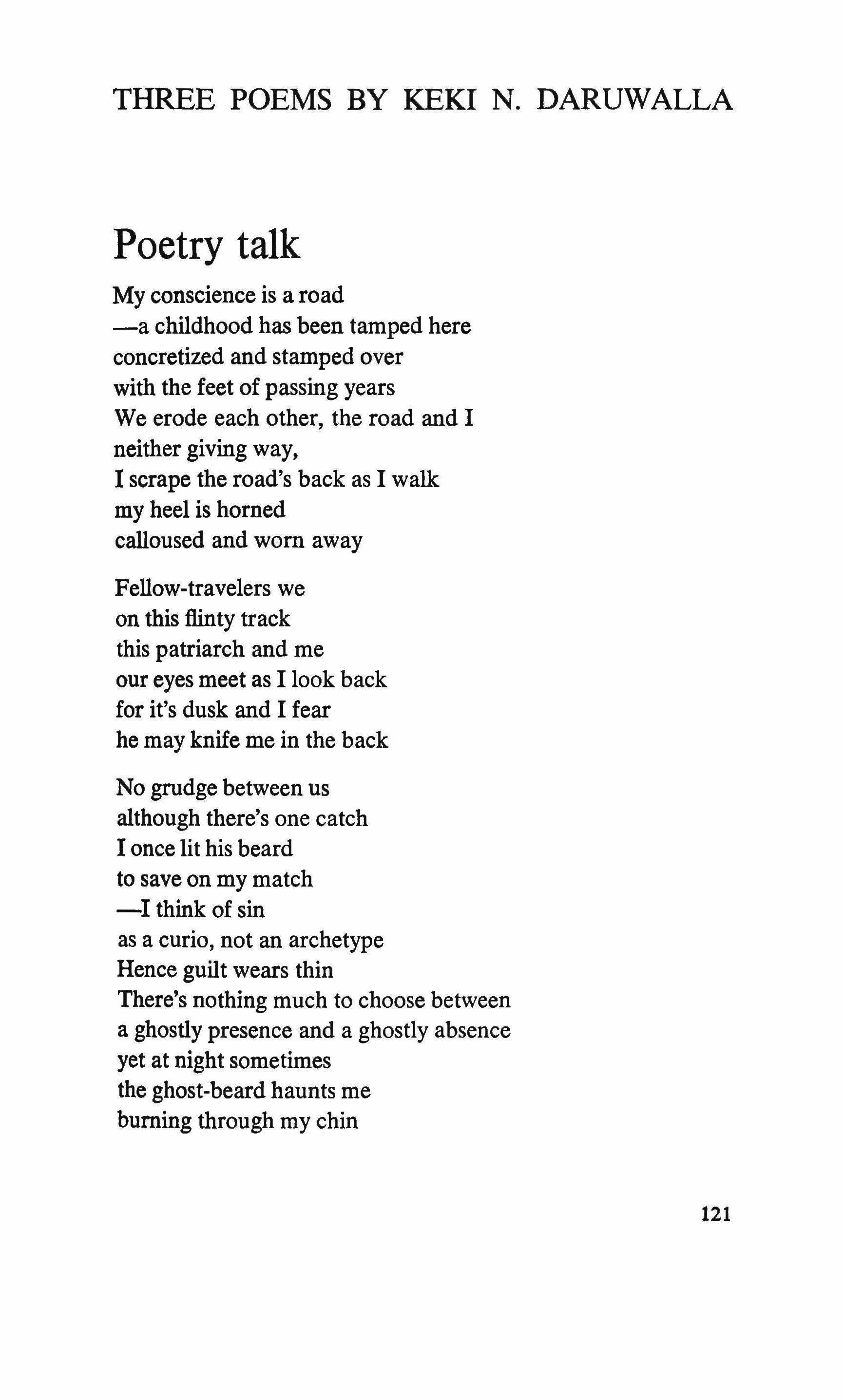
My conscience is a road -a childhood has been tamped here concretized and stamped over with the feet of passing years We erode each other, the road and I neither giving way, I scrape the road's back as I walk my heel is horned calloused and worn away
Fellow-travelers we on this flinty track this patriarch and me our eyes meet as I look back for it's dusk and I fear he may knife me in the back
No grudge between us although there's one catch I once lit his beard to save on my match -I think of sin as a curio, not an archetype Hence guilt wears thin
There's nothing much to choose between a ghostly presence and a ghostly absence yet at night sometimes the ghost-beard haunts me burning through my chin
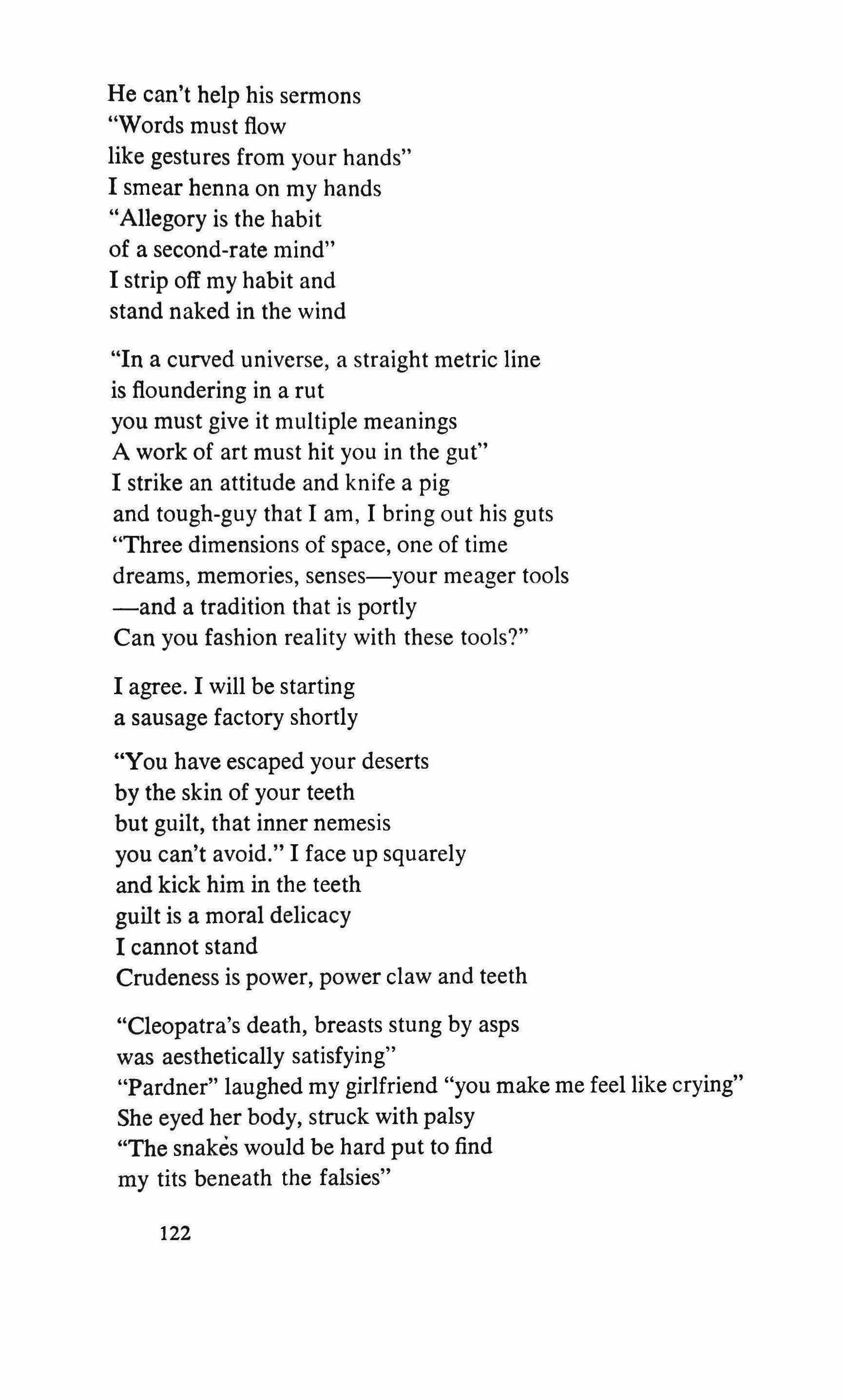
He can't help his sermons
"Words must flow like gestures from your hands"
I smear henna on my hands
"Allegory is the habit of a second-rate mind"
I strip off my habit and stand naked in the wind
"In a curved universe, a straight metric line is floundering in a rut you must give it multiple meanings A work of art must hit you in the gut" I strike an attitude and knife a pig and tough-guy that I am, I bring out his guts
"Three dimensions of space, one of time dreams, memories, senses-your meager tools -and a tradition that is portly Can you fashion reality with these tools?"
I agree. I will be starting a sausage factory shortly
"You have escaped your deserts by the skin of your teeth but guilt, that inner nemesis you can't avoid." I face up squarely and kick him in the teeth guilt is a moral delicacy
I cannot stand
Crudeness is power, power claw and teeth
"Cleopatra's death, breasts stung by asps was aesthetically satisfying"
"Pardner" laughed my girlfriend "you make me feel like crying" She eyed her body, struck with palsy "The snakes would be hard put to find my tits beneath the falsies"
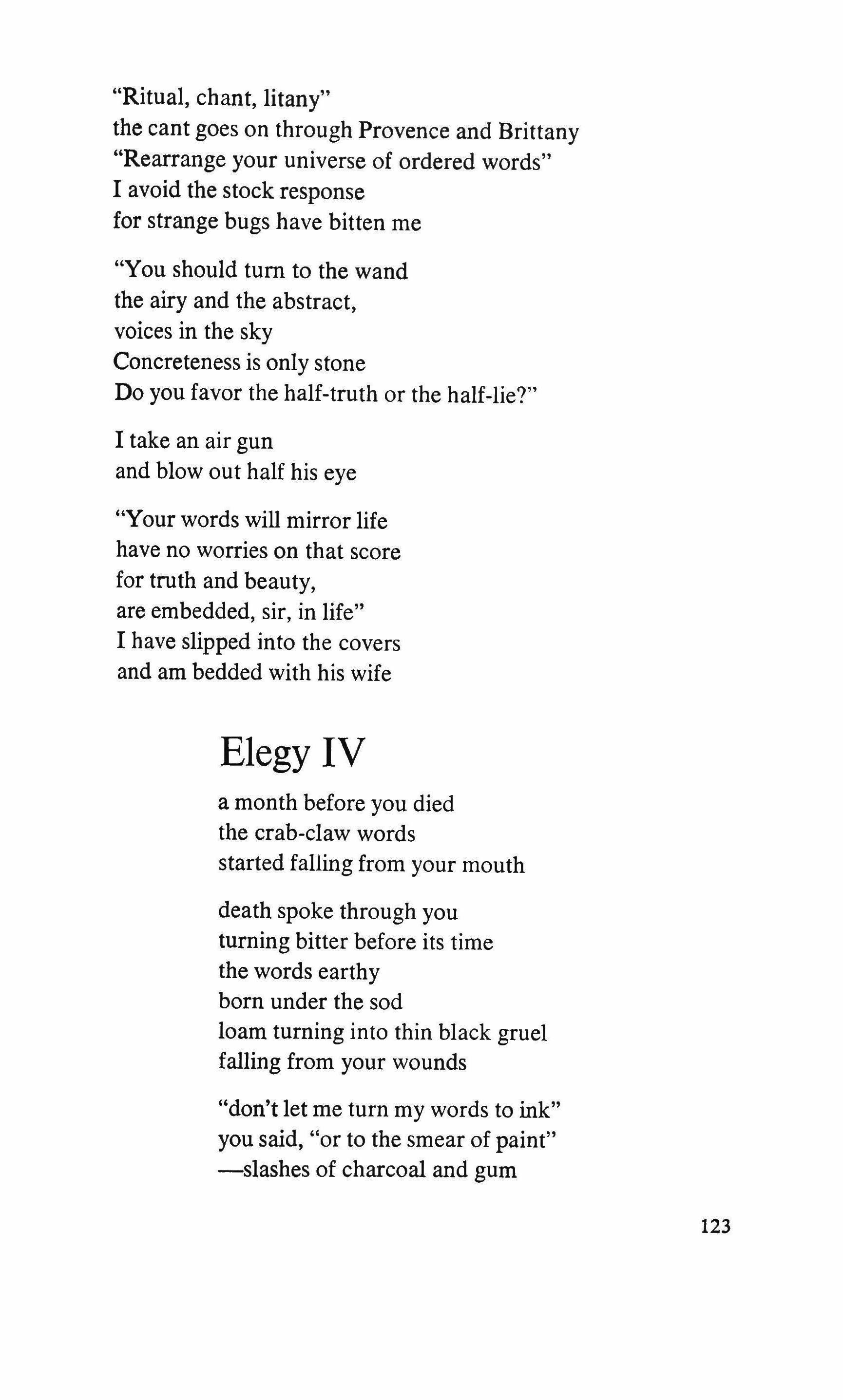
"Ritual, chant, litany"
the cant goes on through Provence and Brittany
"Rearrange your universe of ordered words" I avoid the stock response for strange bugs have bitten me
"You should tum to the wand the airy and the abstract, voices in the sky Concreteness is only stone Do you favor the half-truth or the half-lie?"
I take an air gun and blowout half his eye
"Your words will mirror life have no worries on that score for truth and beauty, are embedded, sir, in life" I have slipped into the covers and am bedded with his wife
a month before you died the crab-claw words started falling from your mouth death spoke through you turning bitter before its time the words earthy born under the sod loam turning into thin black gruel falling from your wounds
"don't let me turn my words to ink" you said, "or to the smear of paint" -slashes of charcoal and gum
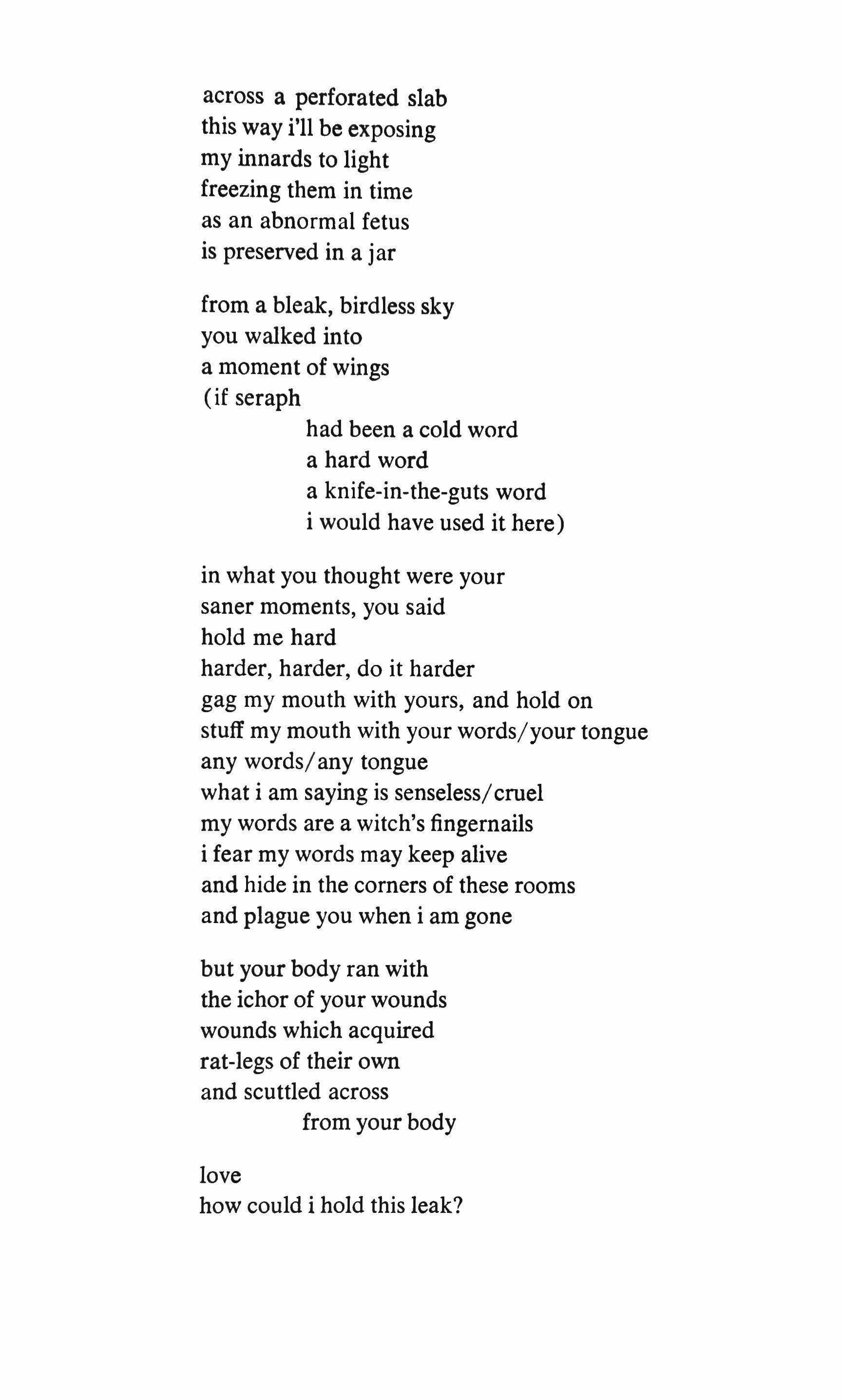
across a perforated slab this way i'll be exposing my innards to light freezing them in time as an abnormal fetus is preserved in ajar from a bleak, birdless sky you walked into a moment of wings (if seraph had been a cold word a hard word a knife-in-the-guts word i would have used it here) in what you thought were your saner moments, you said hold me hard harder, harder, do it harder gag my mouth with yours, and hold on stuff my mouth with your words/your tongue any words/any tongue what i am saying is senseless/cruel my words are a witch's fingernails i fear my words may keep alive and hide in the corners of these rooms and plague you when i am gone but your body ran with the ichor of your wounds wounds which acquired rat-legs of their own and scuttled across from your body love how could i hold this leak?
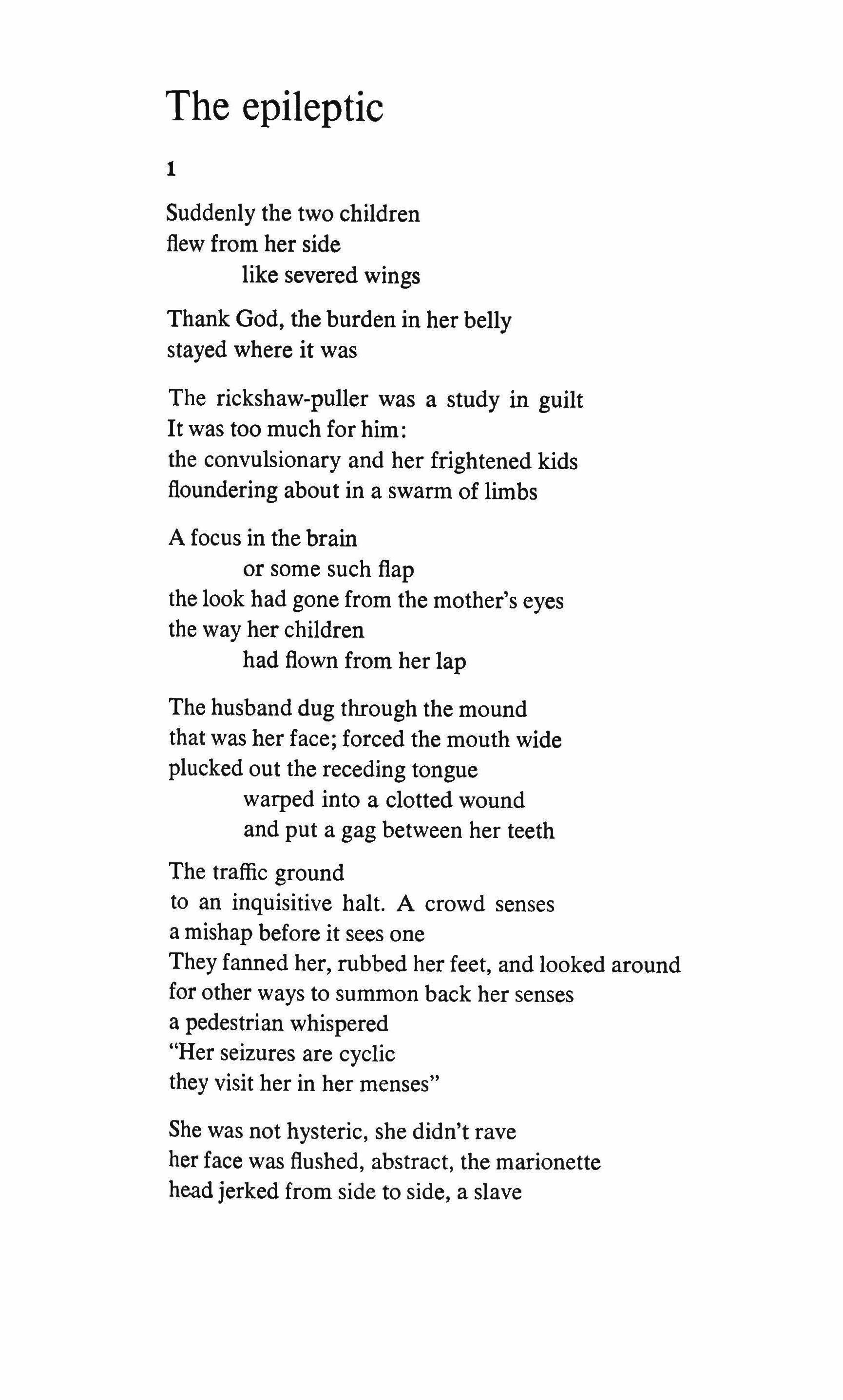
1
Suddenly the two children flew from her side like severed wings
Thank God, the burden in her belly stayed where it was
The rickshaw-puller was a study in guilt It was too much for him: the convulsionary and her frightened kids floundering about in a swarm of limbs
A focus in the brain or some such flap the look had gone from the mother's eyes the way her children had flown from her lap
The husband dug through the mound that was her face; forced the mouth wide plucked out the receding tongue warped into a clotted wound and put a gag between her teeth
The traffic ground to an inquisitive halt. A crowd senses a mishap before it sees one They fanned her, rubbed her feet, and looked around for other ways to summon back her senses a pedestrian whispered "Her seizures are cyclic they visit her in her menses"
She was not hysteric, she didn't rave her face was flushed, abstract, the marionette head jerked from side to side, a slave
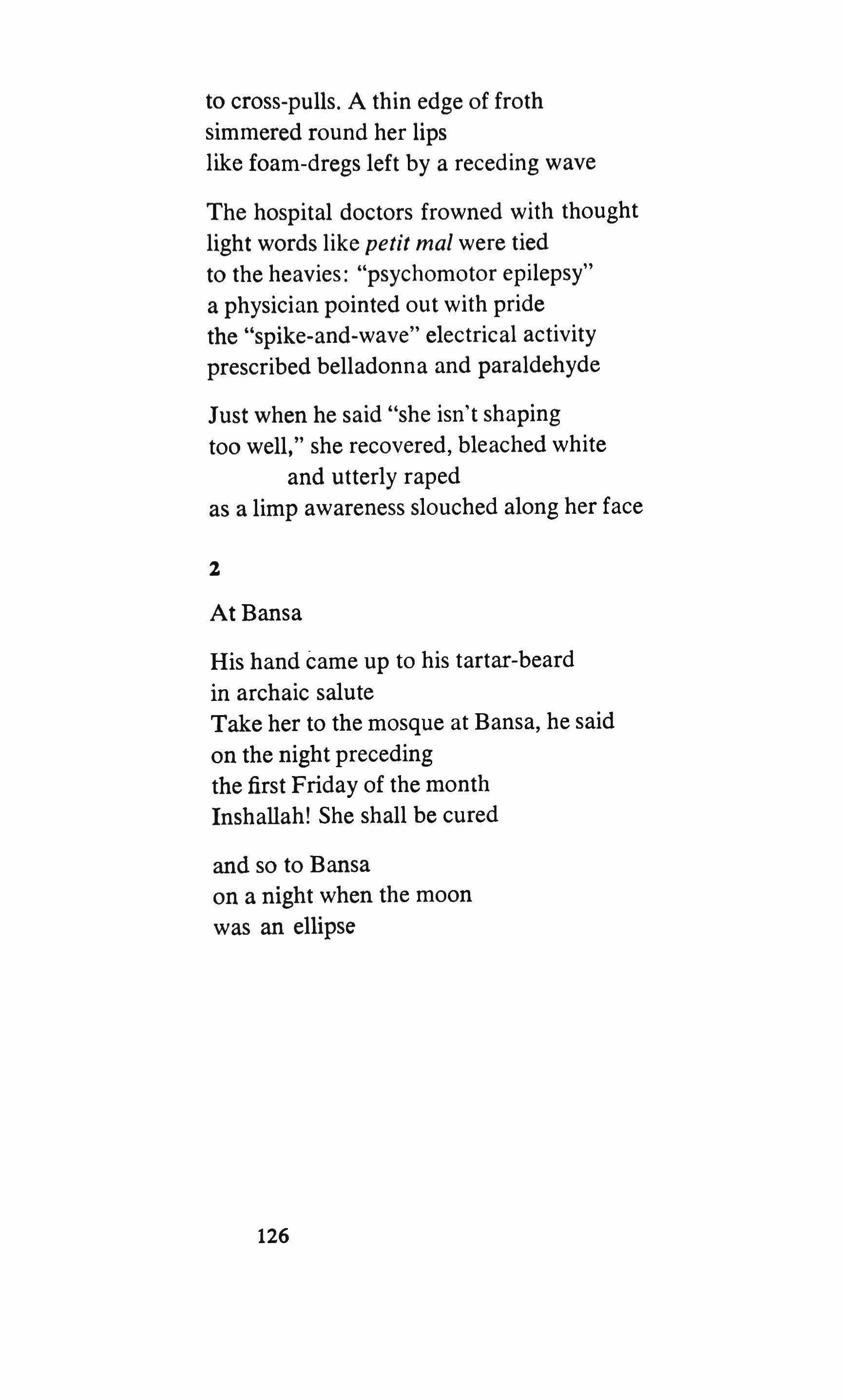
to cross-pulls. A thin edge of froth simmered round her lips like foam-dregs left by a receding wave
The hospital doctors frowned with thought light words like petit mal were tied to the heavies: "psychomotor epilepsy" a physician pointed out with pride the "spike-and-wave" electrical activity prescribed belladonna and paraldehyde
Just when he said "she isn't shaping too well," she recovered, bleached white and utterly raped as a limp awareness slouched along her face
2 At Bansa
His hand came up to his tartar-beard in archaic salute
Take her to the mosque at Bansa, he said on the night preceding the first Friday of the month Inshallah! She shall be cured and so to Bansa on a night when the moon was an ellipse
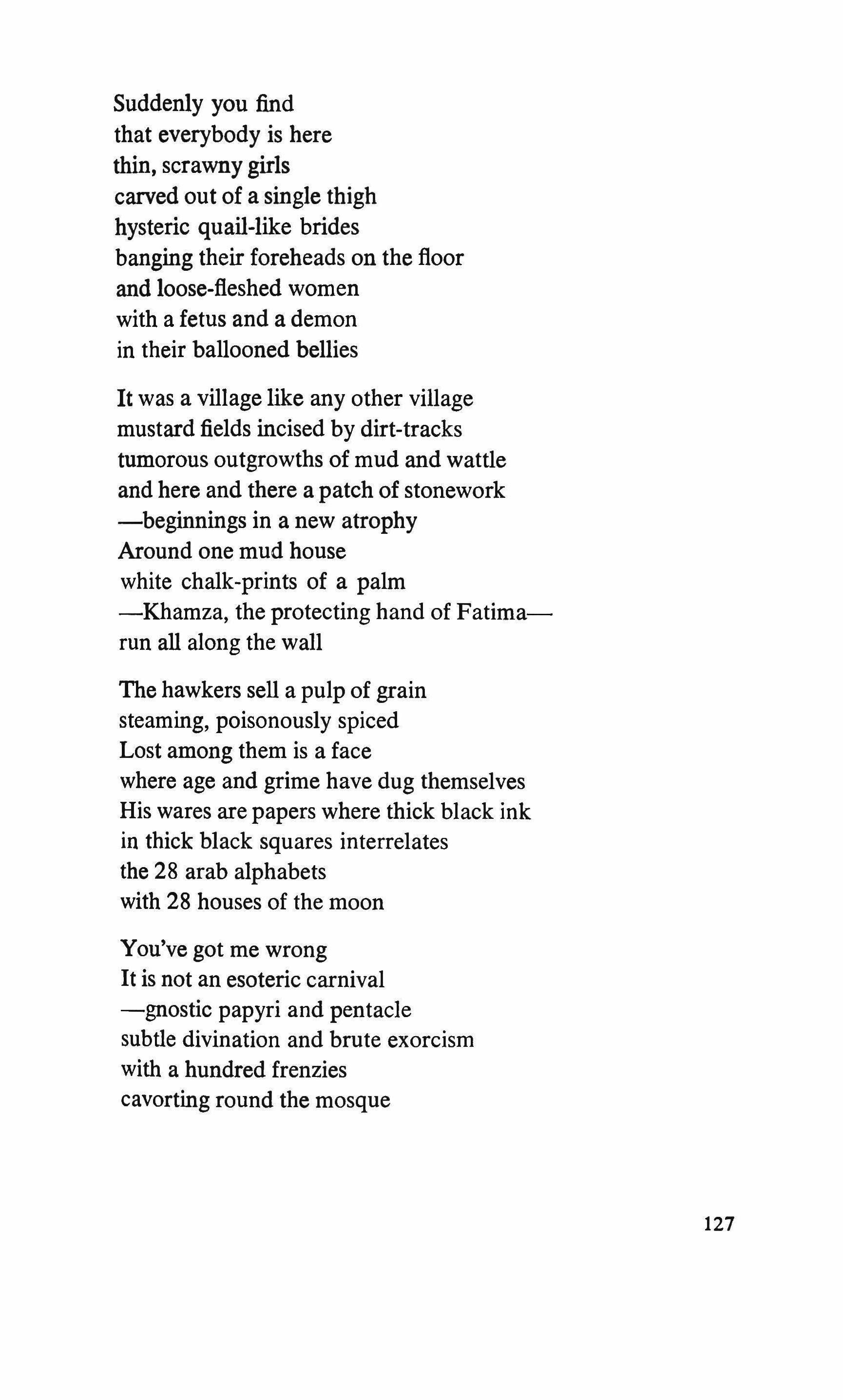
Suddenly you find that everybody is here thin, scrawny girls carved out of a single thigh hysteric quail-like brides banging their foreheads on the floor and loose-fleshed women with a fetus and a demon in their ballooned bellies
It was a village like any other village mustard fields incised by dirt-tracks tumorous outgrowths of mud and wattle and here and there a patch of stonework -beginnings in a new atrophy Around one mud house white chalk-prints of a palm -Khamza, the protecting hand of Fatimarun all along the wall
The hawkers sell a pulp of grain steaming, poisonously spiced
Lost among them is a face where age and grime have dug themselves His wares are papers where thick black ink in thick black squares interrelates the 28 arab alphabets with 28 houses of the moon
You've got me wrong It is not an esoteric carnival -gnostic papyri and pentacle subtle divination and brute exorcism with a hundred frenzies cavorting round the mosque
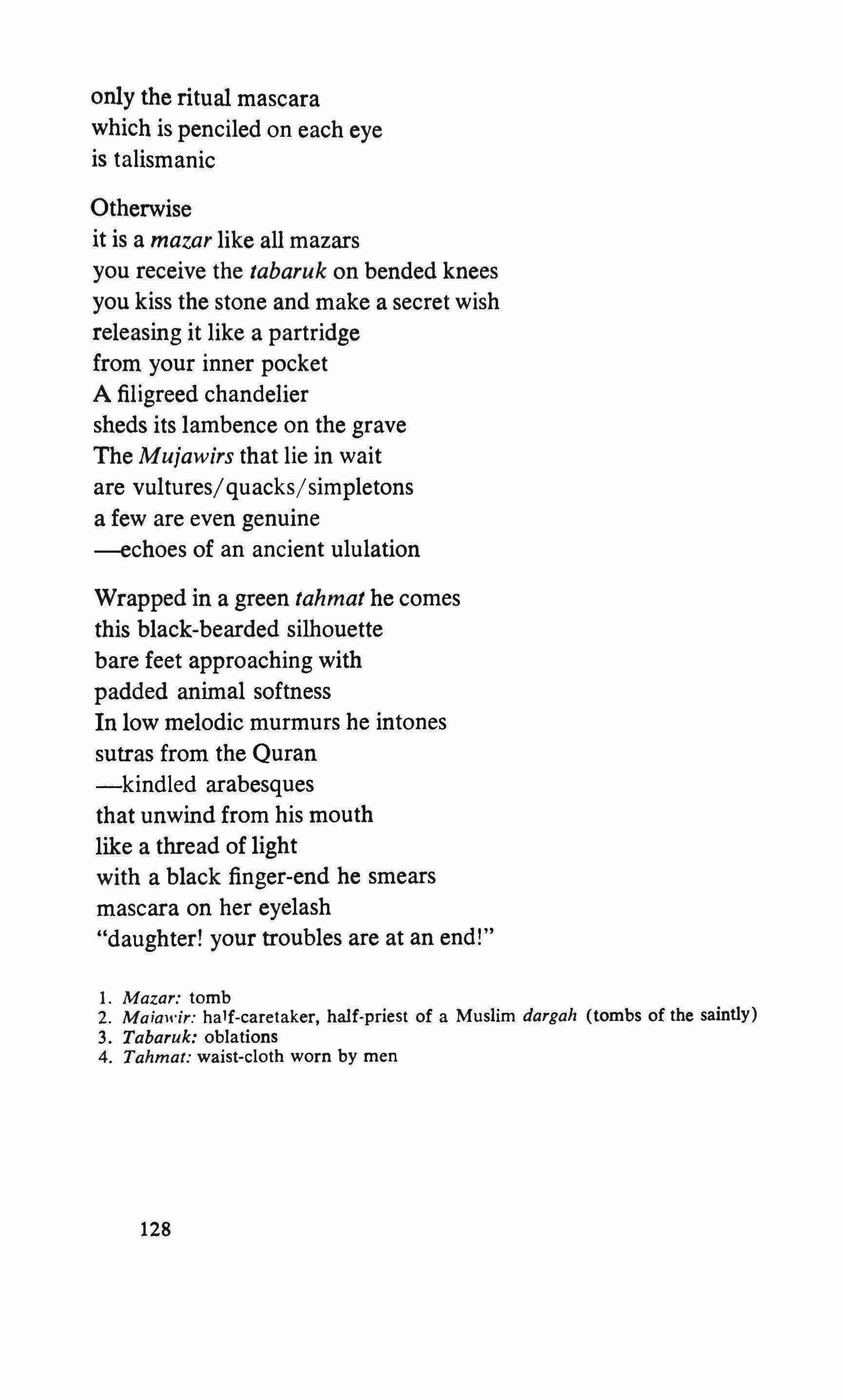
only the ritual mascara which is penciled on each eye is talismanic
Otherwise it is a mazar like all mazars you receive the tabaruk on bended knees you kiss the stone and make a secret wish releasing it like a partridge from your inner pocket A filigreed chandelier sheds its lambence on the grave The Muiawirs that lie in wait are vultures/quacks/simpletons a few are even genuine --echoes of an ancient ululation
Wrapped in a green tahmat he comes this black-bearded silhouette bare feet approaching with padded animal softness
In low melodic murmurs he intones sutras from the Quran -kindled arabesques that unwind from his mouth like a thread of light with a black finger-end he smears mascara on her eyelash "daughter! your troubles are at an end!"
1. Mazar: tomb
2. Maiawir: half-caretaker, half-priest of a Muslim dargah (tombs of the saintly)
3. Tabaruk: oblations
4. Tahmat: waist-cloth worn by men
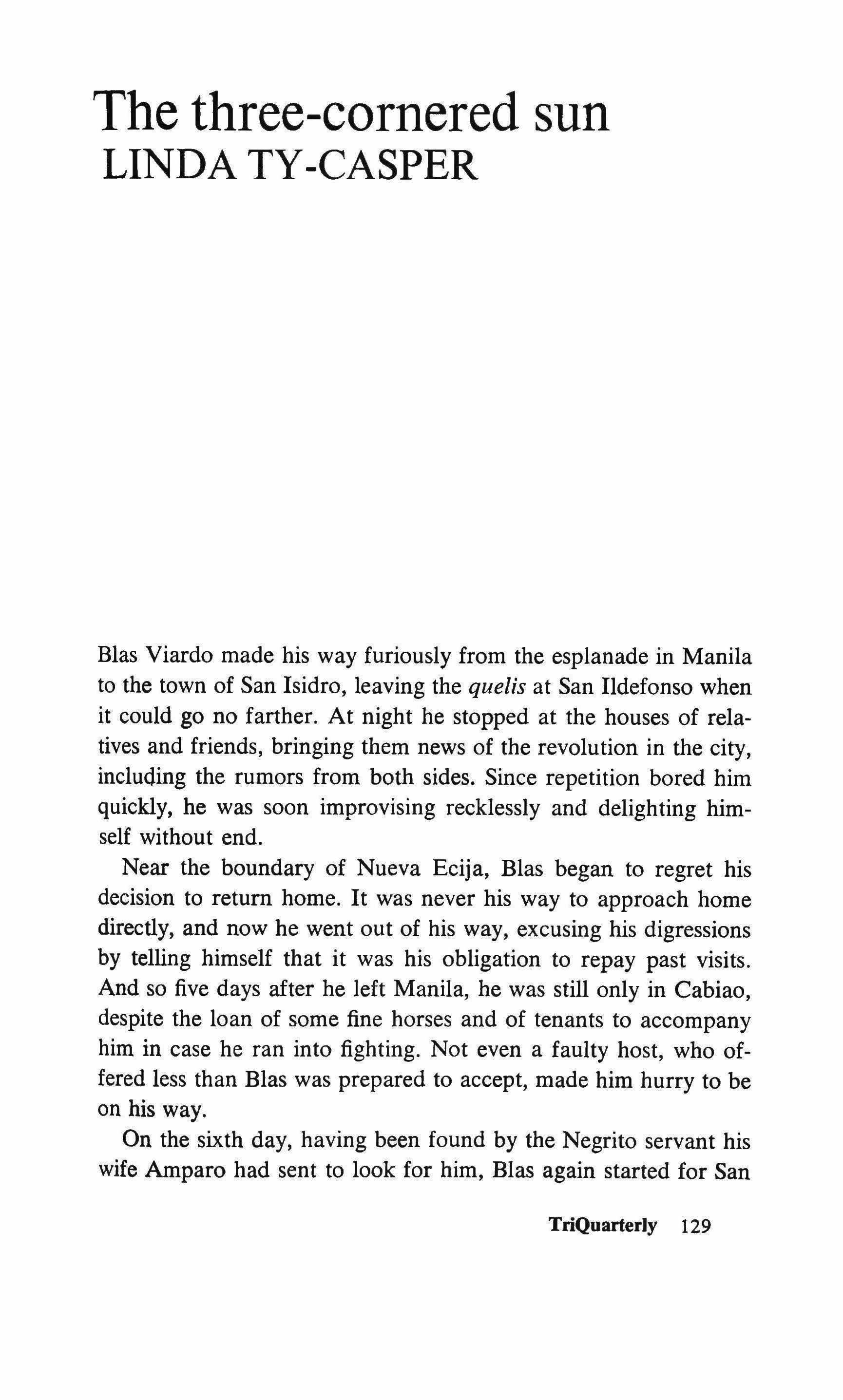
BIas Viardo made his way furiously from the esplanade in Manila to the town of San Isidro, leaving the quelis at San Ildefonso when it could go no farther. At night he stopped at the houses of relatives and friends, bringing them news of the revolution in the city, including the rumors from both sides. Since repetition bored him quickly, he was soon improvising recklessly and delighting himself without end.
Near the boundary of Nueva Ecija, BIas began to regret his decision to return home. It was never his way to approach home directly, and now he went out of his way, excusing his digressions by telling himself that it was his obligation to repay past visits. And so five days after he left Manila, he was still only in Cabiao, despite the loan of some fine horses and of tenants to accompany him in case he ran into fighting. Not even a faulty host, who offered less than BIas was prepared to accept, made him hurry to be on his way.
On the sixth day, having been found by the Negrito servant his wife Amparo had sent to look for him, BIas again started for San
TriQuarterly 129
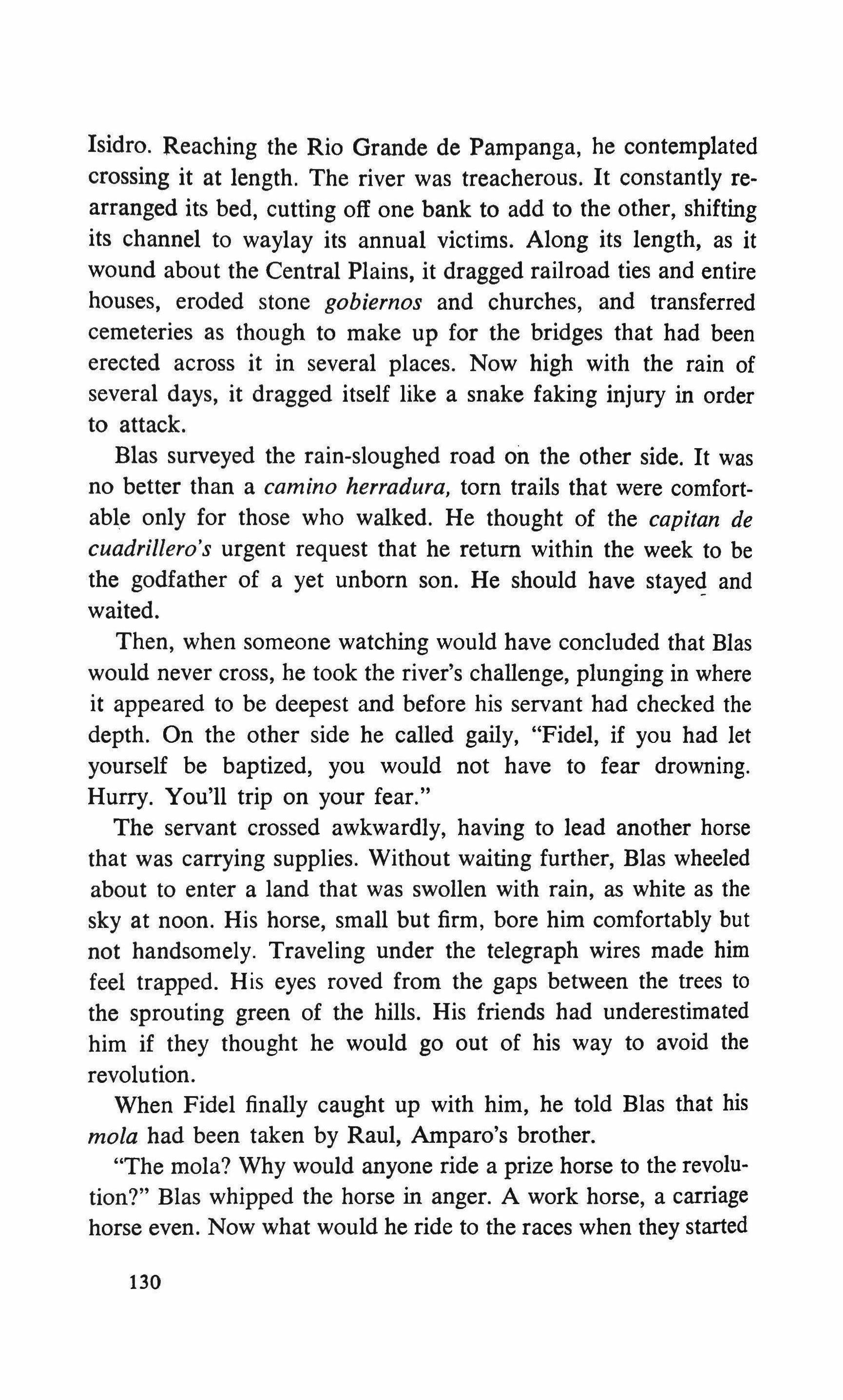
Isidro. Reaching the Rio Grande de Pampanga, he contemplated crossing it at length. The river was treacherous. It constantly rearranged its bed, cutting off one bank to add to the other, shifting its channel to waylay its annual victims. Along its length, as it wound about the Central Plains, it dragged railroad ties and entire houses, eroded stone gobiernos and churches, and transferred cemeteries as though to make up for the bridges that had been erected across it in several places. Now high with the rain of several days, it dragged itself like a snake faking injury in order to attack.
BIas surveyed the rain-sloughed road on the other side. It was no better than a camino herradura, torn trails that were comfortable only for those who walked. He thought of the capitan de cuadrillero's urgent request that he return within the week to be the godfather of a yet unborn SOD. He should have stayed and waited.
Then, when someone watching would have concluded that BIas would never cross, he took the river's challenge, plunging in where it appeared to be deepest and before his servant had checked the depth. On the other side he called gaily, "Fidel, if you had let yourself be baptized, you would not have to fear drowning. Hurry. You'll trip on your fear."
The servant crossed awkwardly, having to lead another horse that was carrying supplies. Without waiting further, BIas wheeled about to enter a land that was swollen with rain, as white as the sky at noon. His horse, small but firm, bore him comfortably but not handsomely. Traveling under the telegraph wires made him feel trapped. His eyes roved from the gaps between the trees to the sprouting green of the hills. His friends had underestimated him if they thought he would go out of his way to avoid the revolution.
When Fidel finally caught up with him, he told BIas that his mola had been taken by Raul, Amparo's brother.
"The mola? Why would anyone ride a prize horse to the revolution?" BIas whipped the horse in anger. A work horse, a carriage horse even. Now what would he ride to the races when they started
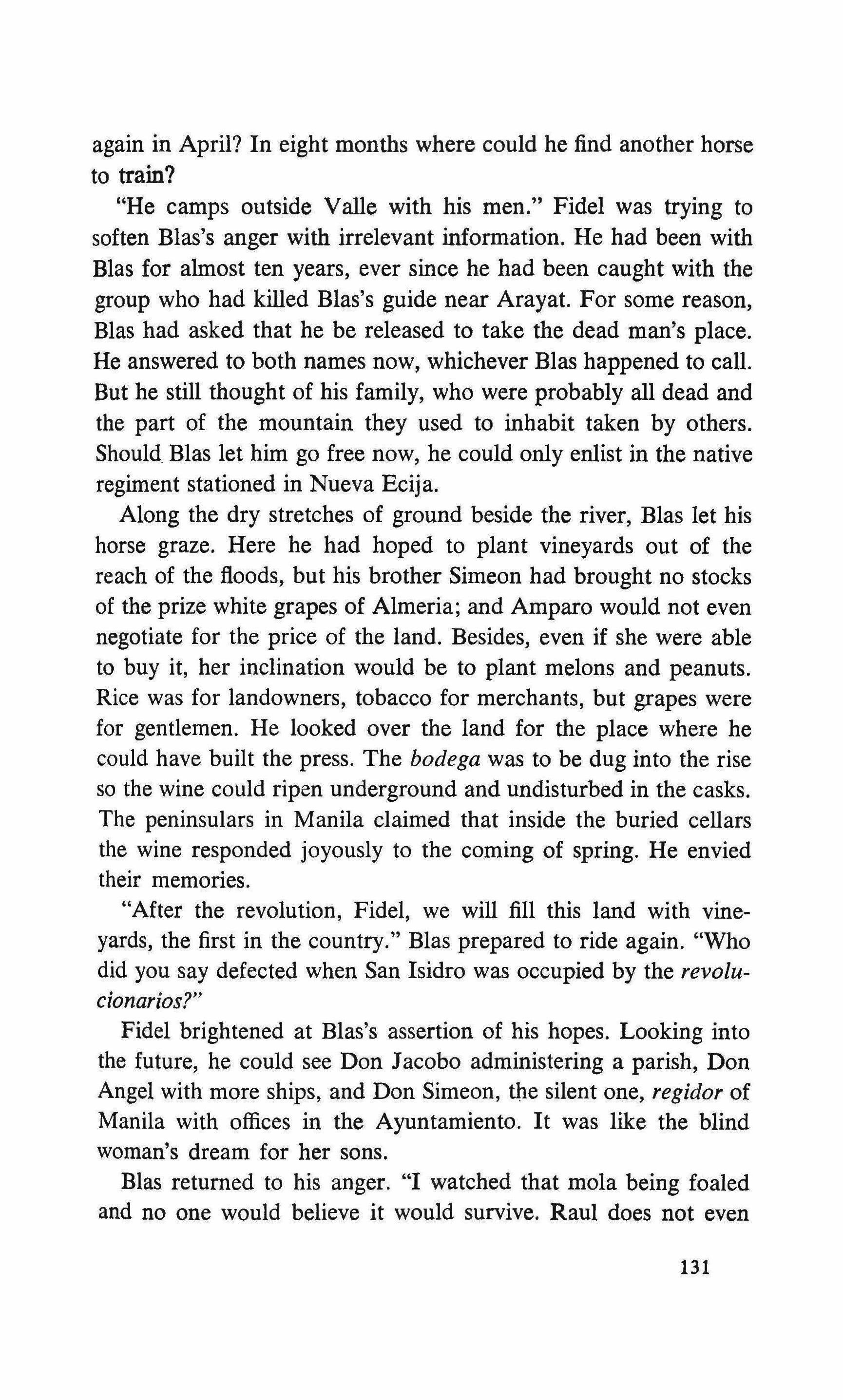
again in April? In eight months where could he find another horse to train?
"He camps outside Valle with his men." Fidel was trying to soften BIas's anger with irrelevant information. He had been with BIas for almost ten years, ever since he had been caught with the group who had killed BIas's guide near Arayat. For some reason, BIas had asked that he be released to take the dead man's place. He answered to both names now, whichever BIas happened to call. But he still thought of his family, who were probably all dead and the part of the mountain they used to inhabit taken by others. Should BIas let him go free now, he could only enlist in the native regiment stationed in Nueva Ecija.
Along the dry stretches of ground beside the river, BIas let his horse graze. Here he had hoped to plant vineyards out of the reach of the floods, but his brother Simeon had brought no stocks of the prize white grapes of Almeria; and Amparo would not even negotiate for the price of the land. Besides, even if she were able to buy it, her inclination would be to plant melons and peanuts. Rice was for landowners, tobacco for merchants, but grapes were for gentlemen. He looked over the land for the place where he could have built the press. The bodega was to be dug into the rise so the wine could ripen underground and undisturbed in the casks. The peninsulars in Manila claimed that inside the buried cellars the wine responded joyously to the coming of spring. He envied their memories.
"After the revolution, Fidel, we will fill this land with vineyards, the first in the country." BIas prepared to ride again. "Who did you say defected when San Isidro was occupied by the revolucionarios?"
Fidel brightened at BIas's assertion of his hopes. Looking into the future, he could see Don Jacobo administering a parish, Don Angel with more ships, and Don Simeon, the silent one, regidor of Manila with offices in the Ayuntamiento. It was like the blind woman's dream for her sons.
BIas returned to his anger. "I watched that mola being foaled and no one would believe it would survive. Raul does not even
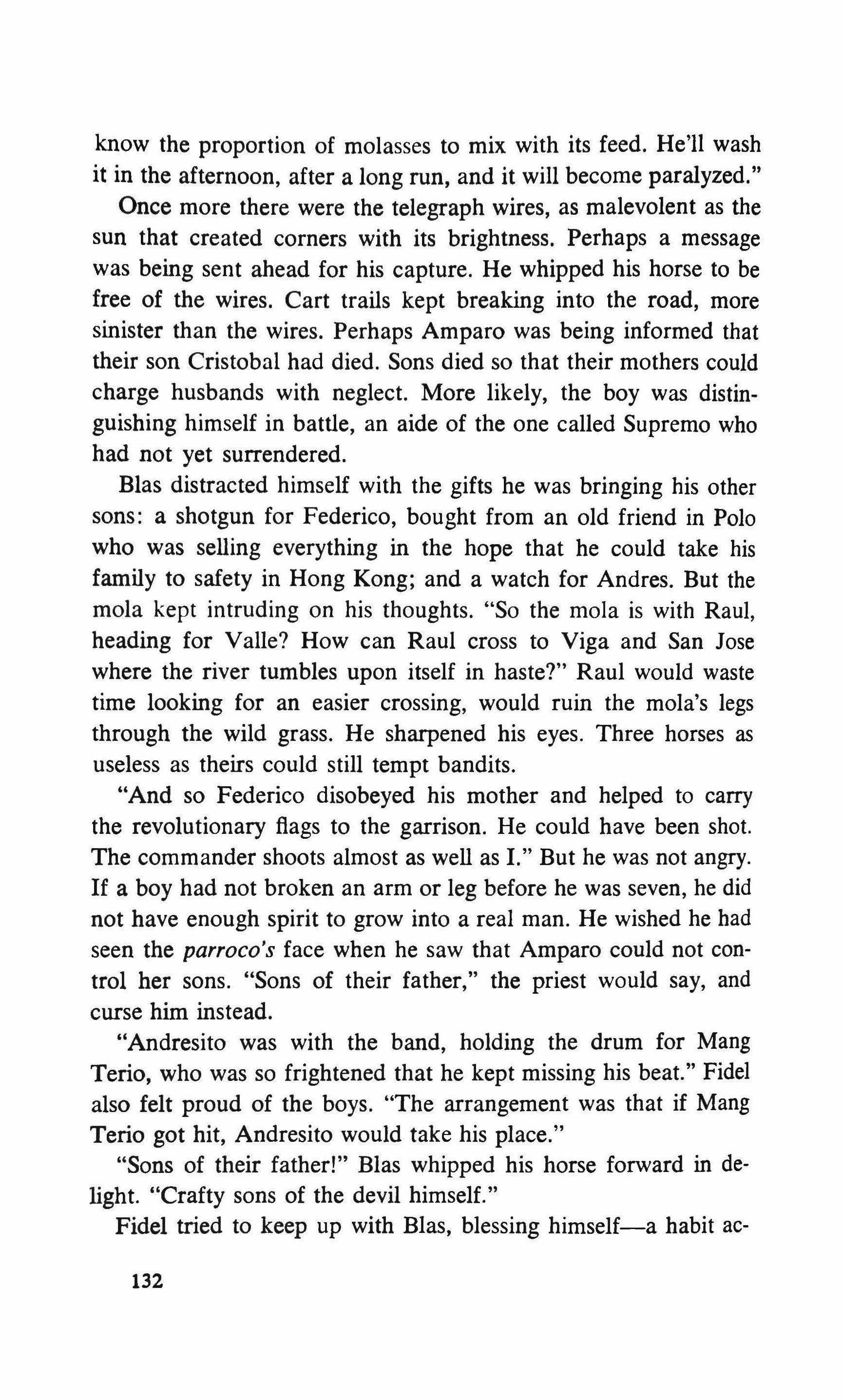
know the proportion of molasses to mix with its feed. He'll wash it in the afternoon, after a long run, and it will become paralyzed."
Once more there were the telegraph wires, as malevolent as the sun that created corners with its brightness. Perhaps a message was being sent ahead for his capture. He whipped his horse to be free of the wires. Cart trails kept breaking into the road, more sinister than the wires. Perhaps Amparo was being informed that their son Cristobal had died. Sons died so that their mothers could charge husbands with neglect. More likely, the boy was distinguishing himself in battle, an aide of the one called Supremo who had not yet surrendered.
BIas distracted himself with the gifts he was bringing his other sons: a shotgun for Federico, bought from an old friend in Polo who was selling everything in the hope that he could take his family to safety in Hong Kong; and a watch for Andres. But the mola kept intruding on his thoughts. "So the mola is with Raul, heading for Valle? How can Raul cross to Viga and San Jose where the river tumbles upon itself in haste?" Raul would waste time looking for an easier crossing, would ruin the mola's legs through the wild grass. He sharpened his eyes. Three horses as useless as theirs could still tempt bandits.
"And so Federico disobeyed his mother and helped to carry the revolutionary flags to the garrison. He could have been shot. The commander shoots almost as well as 1," But he was not angry. If a boy had not broken an arm or leg before he was seven, he did not have enough spirit to grow into a real man. He wished he had seen the parroco's face when he saw that Amparo could not control her sons. "Sons of their father," the priest would say, and curse him instead.
"Andresito was with the band, holding the drum for Mang Terio, who was so frightened that he kept missing his beat." Fidel also felt proud of the boys. "The arrangement was that if Mang Terio got hit, Andresito would take his place."
"Sons of their father!" BIas whipped his horse forward in delight. "Crafty sons of the devil himself."
Fidel tried to keep up with BIas, blessing himself-a habit ac-
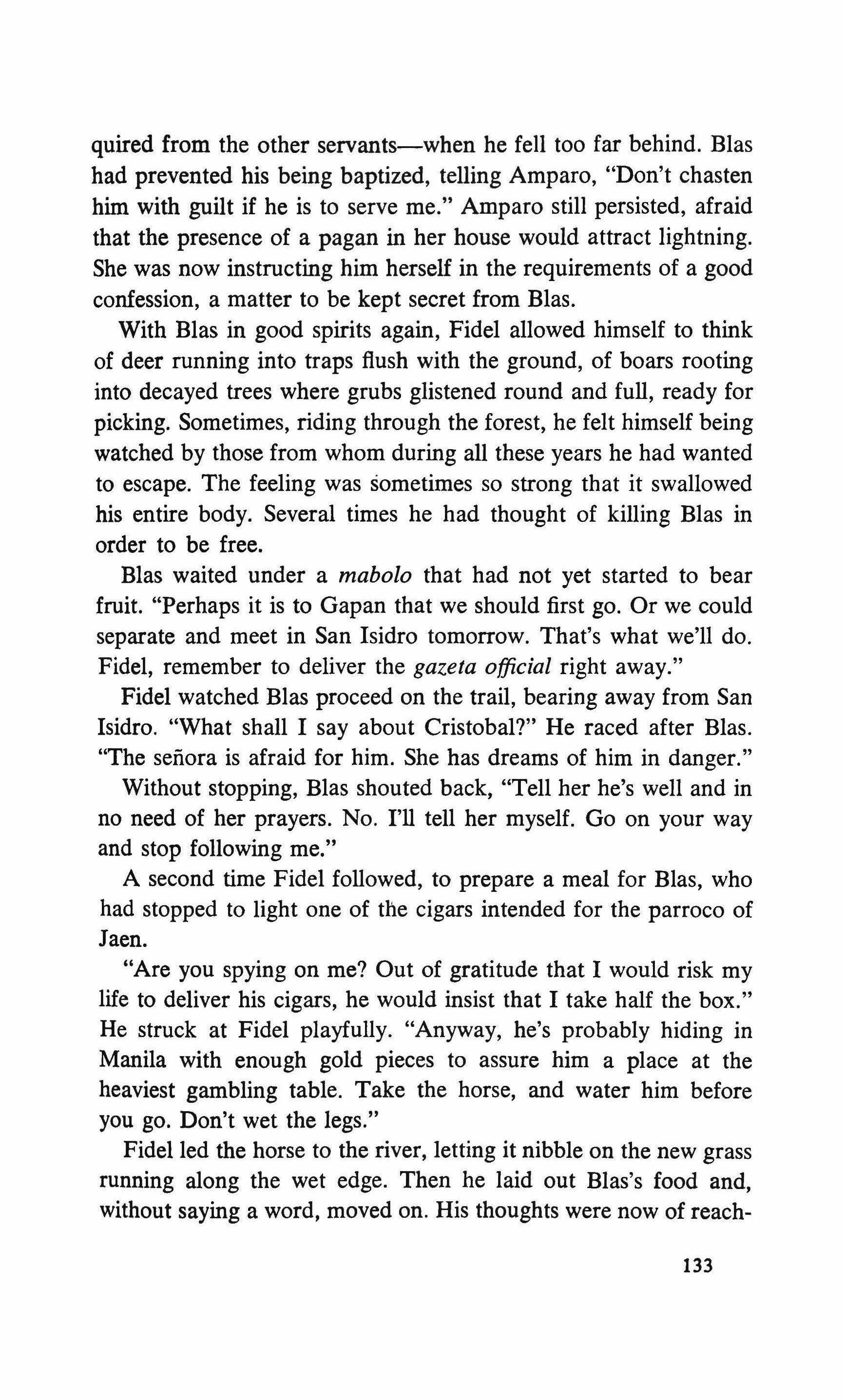
quired from the other servants-when he fell too far behind. Bias had prevented his being baptized, telling Amparo, "Don't chasten him with guilt if he is to serve me." Amparo still persisted, afraid that the presence of a pagan in her house would attract lightning. She was now instructing him herself in the requirements of a good confession, a matter to be kept secret from BIas.
With BIas in good spirits again, Fidel allowed himself to think of deer running into traps flush with the ground, of boars rooting into decayed trees where grubs glistened round and full, ready for picking. Sometimes, riding through the forest, he felt himself being watched by those from whom during all these years he had wanted to escape. The feeling was sometimes so strong that it swallowed his entire body. Several times he had thought of killing Bias in order to be free.
BIas waited under a mabolo that had not yet started to bear fruit. "Perhaps it is to Gapan that we should first go. Or we could separate and meet in San Isidro tomorrow. That's what we'll do. Fidel, remember to deliver the gazeta official right away."
Fidel watched BIas proceed on the trail, bearing away from San Isidro. "What shall I say about Cristobal?" He raced after Bias. "The senora is afraid for him. She has dreams of him in danger."
Without stopping, BIas shouted back, "Tell her he's well and in no need of her prayers. No. I'll tell her myself. Go on your way and stop following me."
A second time Fidel followed, to prepare a meal for Bias, who had stopped to light one of the cigars intended for the parroco of Jaen.
"Are you spying on me? Out of gratitude that I would risk my life to deliver his cigars, he would insist that I take half the box." He struck at Fidel playfully. "Anyway, he's probably hiding in Manila with enough gold pieces to assure him a place at the heaviest gambling table. Take the horse, and water him before you go. Don't wet the legs."
Fidel led the horse to the river, letting it nibble on the new grass running along the wet edge. Then he laid out Bias's food and, without saying a word, moved on. His thoughts were now of reach-
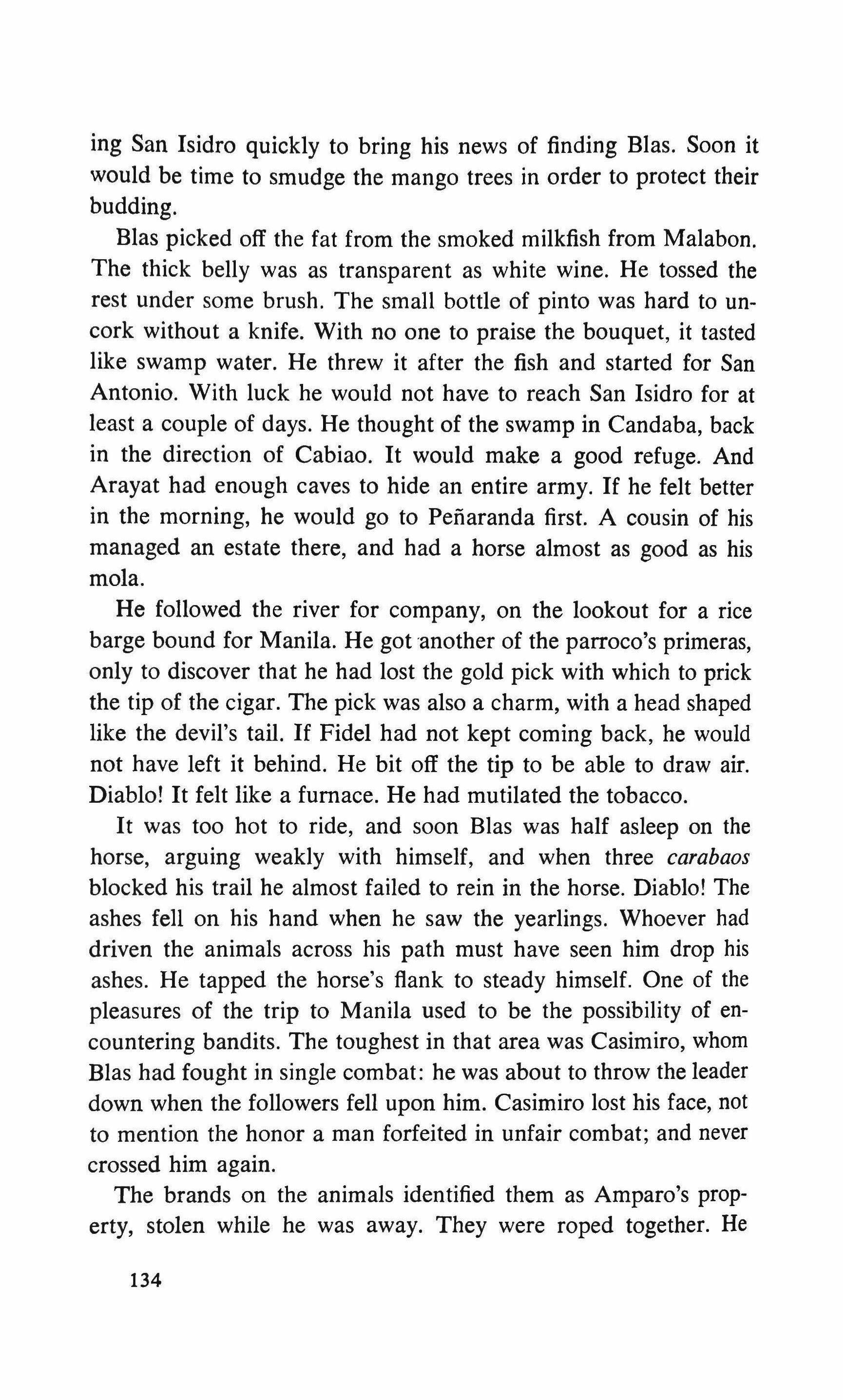
ing San Isidro quickly to bring his news of finding BIas. Soon it would be time to smudge the mango trees in order to protect their budding.
BIas picked off the fat from the smoked milkfish from Malabon. The thick belly was as transparent as white wine. He tossed the rest under some brush. The small bottle of pinto was hard to uncork without a knife. With no one to praise the bouquet, it tasted like swamp water. He threw it after the fish and started for San Antonio. With luck he would not have to reach San Isidro for at least a couple of days. He thought of the swamp in Candaba, back in the direction of Cabiao. It would make a good refuge. And Arayat had enough caves to hide an entire army. If he felt better in the morning, he would go to Pefiaranda first. A cousin of his managed an estate there, and had a horse almost as good as his mola.
He followed the river for company, on the lookout for a rice barge bound for Manila. He got another of the parroco's primeras, only to discover that he had lost the gold pick with which to prick the tip of the cigar. The pick was also a charm, with a head shaped like the devil's tail. If Fidel had not kept coming back, he would not have left it behind. He bit off the tip to be able to draw air. Diablo! It felt like a furnace. He had mutilated the tobacco.
It was too hot to ride, and soon BIas was half asleep on the horse, arguing weakly with himself, and when three carabaos blocked his trail he almost failed to rein in the horse. Diablo! The ashes fell on his hand when he saw the yearlings. Whoever had driven the animals across his path must have seen him drop his ashes. He tapped the horse's flank to steady himself. One of the pleasures of the trip to Manila used to be the possibility of encountering bandits. The toughest in that area was Casimiro, whom BIas had fought in single combat: he was about to throw the leader down when the followers fell upon him. Casimiro lost his face, not to mention the honor a man forfeited in unfair combat; and never crossed him again.
The brands on the animals identified them as Amparo's property, stolen while he was away. They were roped together. He
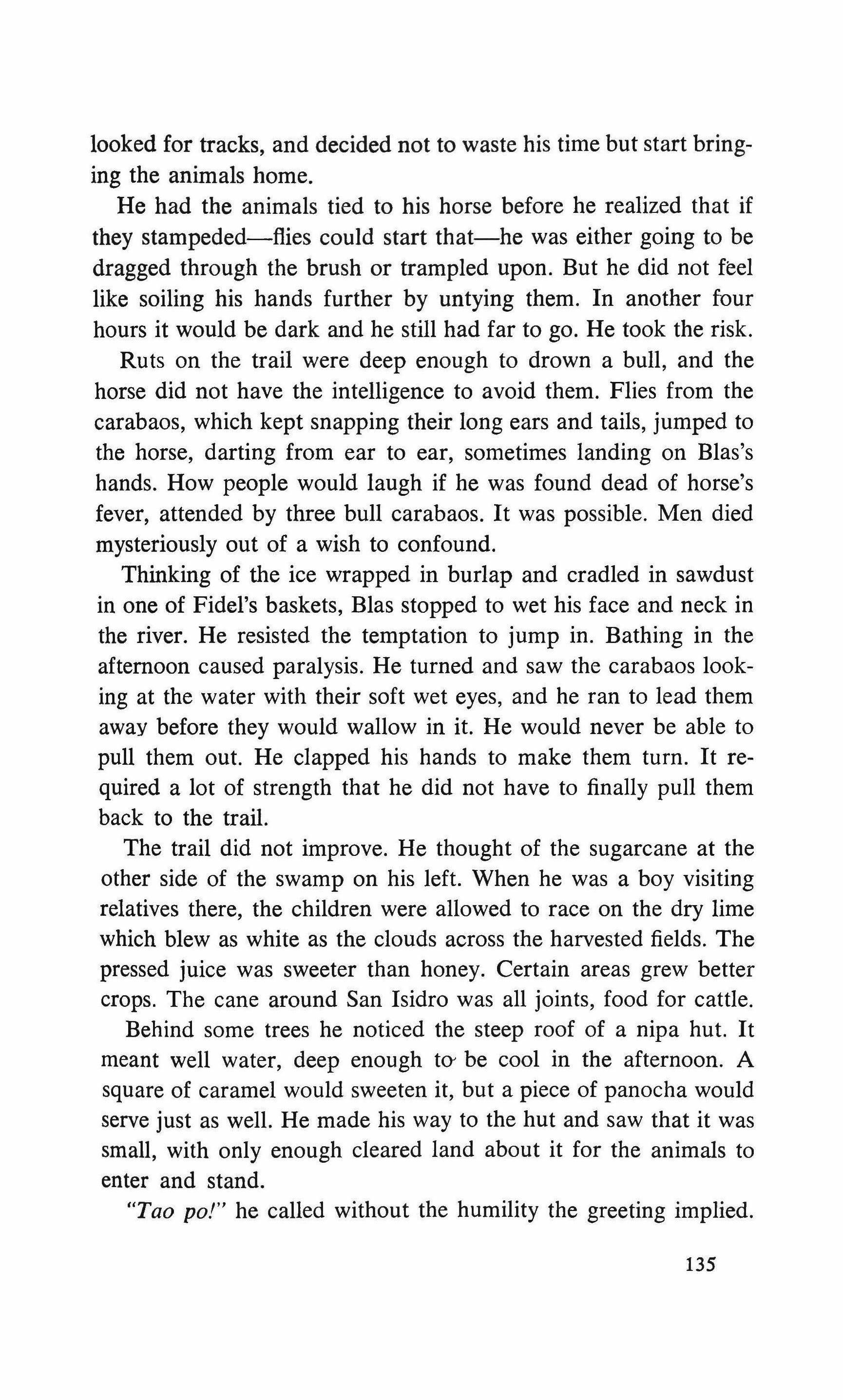
looked for tracks, and decided not to waste his time but start bringing the animals home.
He had the animals tied to his horse before he realized that if they stampeded-flies could start that-he was either going to be dragged through the brush or trampled upon. But he did not feel like soiling his hands further by untying them. In another four hours it would be dark and he still had far to go. He took the risk.
Ruts on the trail were deep enough to drown a bull, and the horse did not have the intelligence to avoid them. Flies from the carabaos, which kept snapping their long ears and tails, jumped to the horse, darting from ear to ear, sometimes landing on BIas's hands. How people would laugh if he was found dead of horse's fever, attended by three bull carabaos. It was possible. Men died mysteriously out of a wish to confound.
Thinking of the ice wrapped in burlap and cradled in sawdust in one of Fidel's baskets, BIas stopped to wet his face and neck in the river. He resisted the temptation to jump in. Bathing in the afternoon caused paralysis. He turned and saw the carabaos looking at the water with their soft wet eyes, and he ran to lead them away before they would wallow in it. He would never be able to pull them out. He clapped his hands to make them turn. It required a lot of strength that he did not have to finally pull them back to the trail.
The trail did not improve. He thought of the sugarcane at the other side of the swamp on his left. When he was a boy visiting relatives there, the children were allowed to race on the dry lime which blew as white as the clouds across the harvested fields. The pressed juice was sweeter than honey. Certain areas grew better crops. The cane around San Isidro was all joints, food for cattle. Behind some trees he noticed the steep roof of a nipa hut. It meant well water, deep enough to' be cool in the afternoon. A square of caramel would sweeten it, but a piece of panocha would serve just as well. He made his way to the hut and saw that it was small, with only enough cleared land about it for the animals to enter and stand.
"Tao po!" he called without the humility the greeting implied.
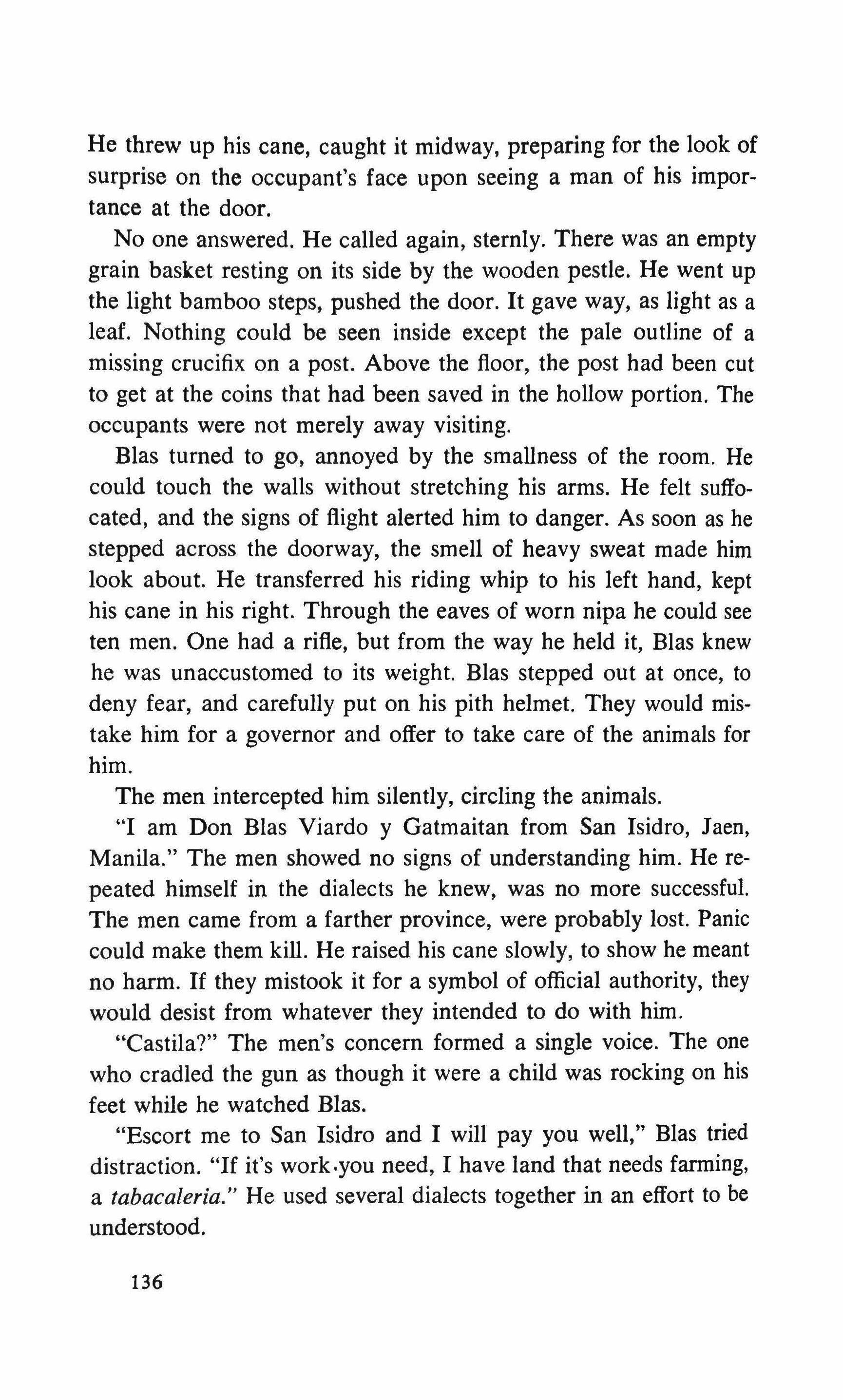
He threw up his cane, caught it midway, preparing for the look of surprise on the occupant's face upon seeing a man of his importance at the door.
No one answered. He called again, sternly. There was an empty grain basket resting on its side by the wooden pestle. He went up the light bamboo steps, pushed the door. It gave way, as light as a leaf. Nothing could be seen inside except the pale outline of a missing crucifix on a post. Above the floor, the post had been cut to get at the coins that had been saved in the hollow portion. The occupants were not merely away visiting.
BIas turned to go, annoyed by the smallness of the room. He could touch the walls without stretching his arms. He felt suffocated, and the signs of flight alerted him to danger. As soon as he stepped across the doorway, the smell of heavy sweat made him look about. He transferred his riding whip to his left hand, kept his cane in his right. Through the eaves of worn nipa he could see ten men. One had a rifle, but from the way he held it, BIas knew he was unaccustomed to its weight. BIas stepped out at once, to deny fear, and carefully put on his pith helmet. They would mistake him for a governor and offer to take care of the animals for him.
The men intercepted him silently, circling the animals.
"I am Don BIas Viardo y Gatmaitan from San Isidro, Jaen, Manila." The men showed no signs of understanding him. He repeated himself in the dialects he knew, was no more successful. The men came from a farther province, were probably lost. Panic could make them kill. He raised his cane slowly, to show he meant no harm. If they mistook it for a symbol of official authority, they would desist from whatever they intended to do with him.
"Castila?" The men's concern formed a single voice. The one who cradled the gun as though it were a child was rocking on his feet while he watched BIas.
"Escort me to San Isidro and I will pay you well," BIas tried distraction. "If it's work-you need, I have land that needs farming, a tabacaleria." He used several dialects together in an effort to be understood.
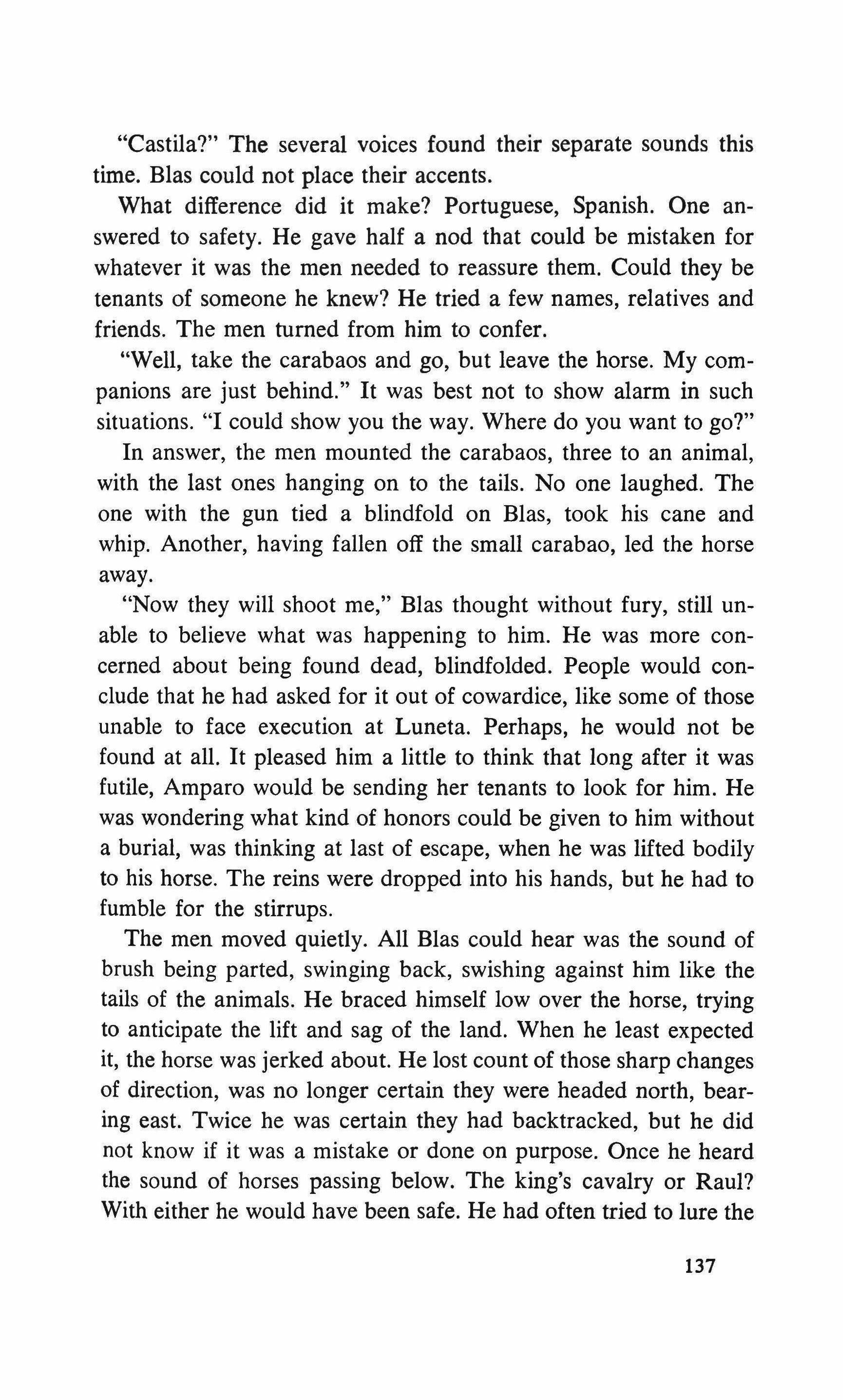
"Castila?" The several voices found their separate sounds this time. BIas could not place their accents.
What difference did it make? Portuguese, Spanish. One answered to safety. He gave half a nod that could be mistaken for whatever it was the men needed to reassure them. Could they be tenants of someone he knew? He tried a few names, relatives and friends. The men turned from him to confer.
"Well, take the carabaos and go, but leave the horse. My companions are just behind." It was best not to show alarm in such situations. "I could show you the way. Where do you want to goT'
In answer, the men mounted the carabaos, three to an animal, with the last ones hanging on to the tails. No one laughed. The one with the gun tied a blindfold on BIas, took his cane and whip. Another, having fallen off the small carabao, led the horse away.
"Now they will shoot me," BIas thought without fury, still unable to believe what was happening to him. He was more concerned about being found dead, blindfolded. People would conclude that he had asked for it out of cowardice, like some of those unable to face execution at Luneta. Perhaps, he would not be found at all. It pleased him a little to think that long after it was futile, Amparo would be sending her tenants to look for him. He was wondering what kind of honors could be given to him without a burial, was thinking at last of escape, when he was lifted bodily to his horse. The reins were dropped into his hands, but he had to fumble for the stirrups.
The men moved quietly. All BIas could hear was the sound of brush being parted, swinging back, swishing against him like the tails of the animals. He braced himself low over the horse, trying to anticipate the lift and sag of the land. When he least expected it, the horse was jerked about. He lost count of those sharp changes of direction, was no longer certain they were headed north, bearing east. Twice he was certain they had backtracked, but he did not know if it was a mistake or done on purpose. Once he heard the sound of horses passing below. The king's cavalry or Raul? With either he would have been safe. He had often tried to lure the
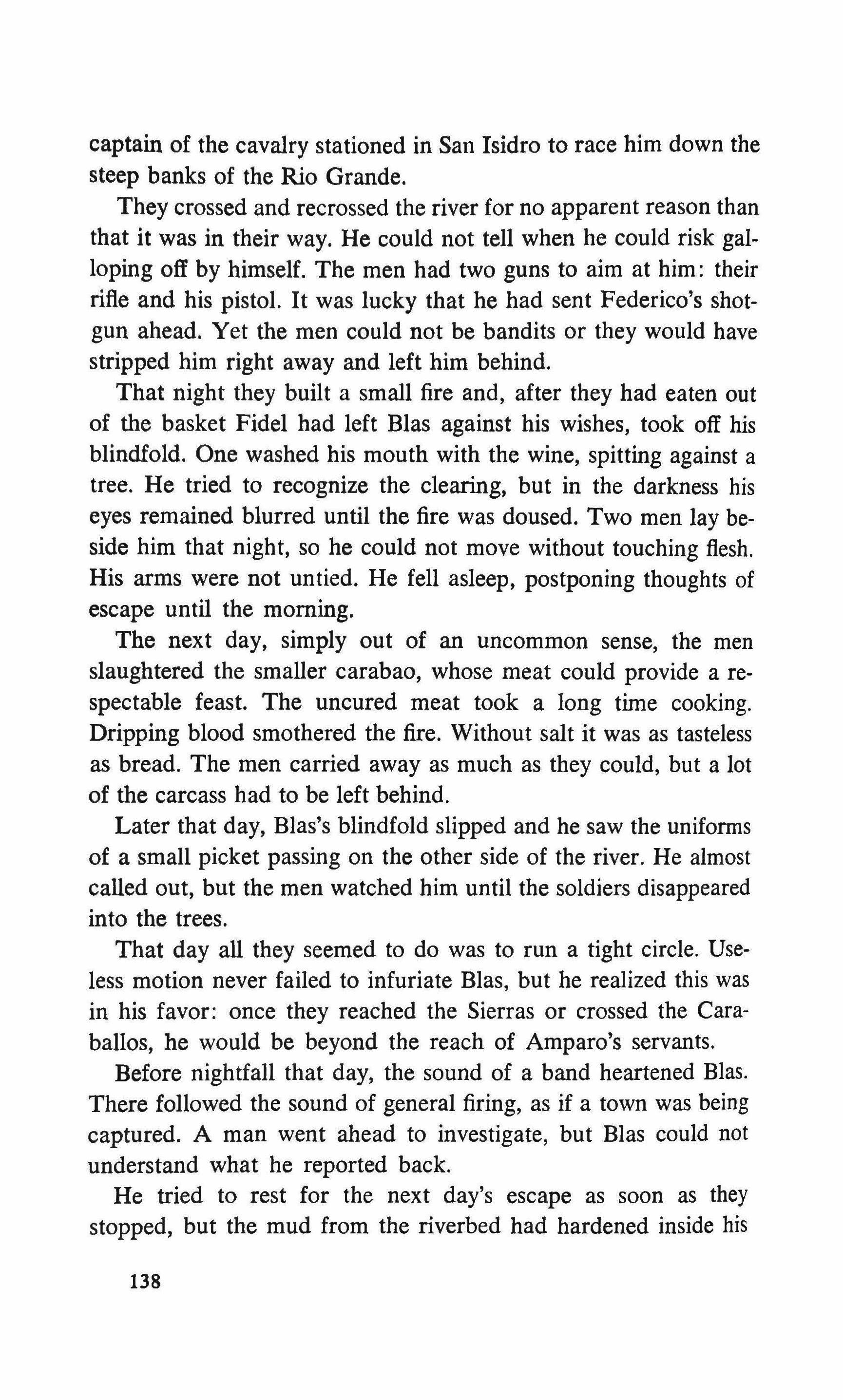
captain of the cavalry stationed in San Isidro to race him down the steep banks of the Rio Grande.
They crossed and recrossed the river for no apparent reason than that it was in their way. He could not tell when he could risk galloping off by himself. The men had two guns to aim at him: their rifle and his pistol. It was lucky that he had sent Federico's shotgun ahead. Yet the men could not be bandits or they would have stripped him right away and left him behind.
That night they built a small fire and, after they had eaten out of the basket Fidel had left BIas against his wishes, took off his blindfold. One washed his mouth with the wine, spitting against a tree. He tried to recognize the clearing, but in the darkness his eyes remained blurred until the fire was doused. Two men lay beside him that night, so he could not move without touching flesh. His arms were not untied. He fell asleep, postponing thoughts of escape until the morning.
The next day, simply out of an uncommon sense, the men slaughtered the smaller carabao, whose meat could provide a respectable feast. The uncured meat took a long time cooking. Dripping blood smothered the fire. Without salt it was as tasteless as bread. The men carried away as much as they could, but a lot of the carcass had to be left behind.
Later that day, BIas's blindfold slipped and he saw the uniforms of a small picket passing on the other side of the river. He almost called out, but the men watched him until the soldiers disappeared into the trees.
That day all they seemed to do was to run a tight circle. Useless motion never failed to infuriate BIas, but he realized this was in his favor: once they reached the Sierras or crossed the Caraballos, he would be beyond the reach of Amparo's servants.
Before nightfall that day, the sound of a band heartened BIas. There followed the sound of general firing, as if a town was being captured. A man went ahead to investigate, but BIas could not understand what he reported back.
He tried to rest for the next day's escape as soon as they stopped, but the mud from the riverbed had hardened inside his
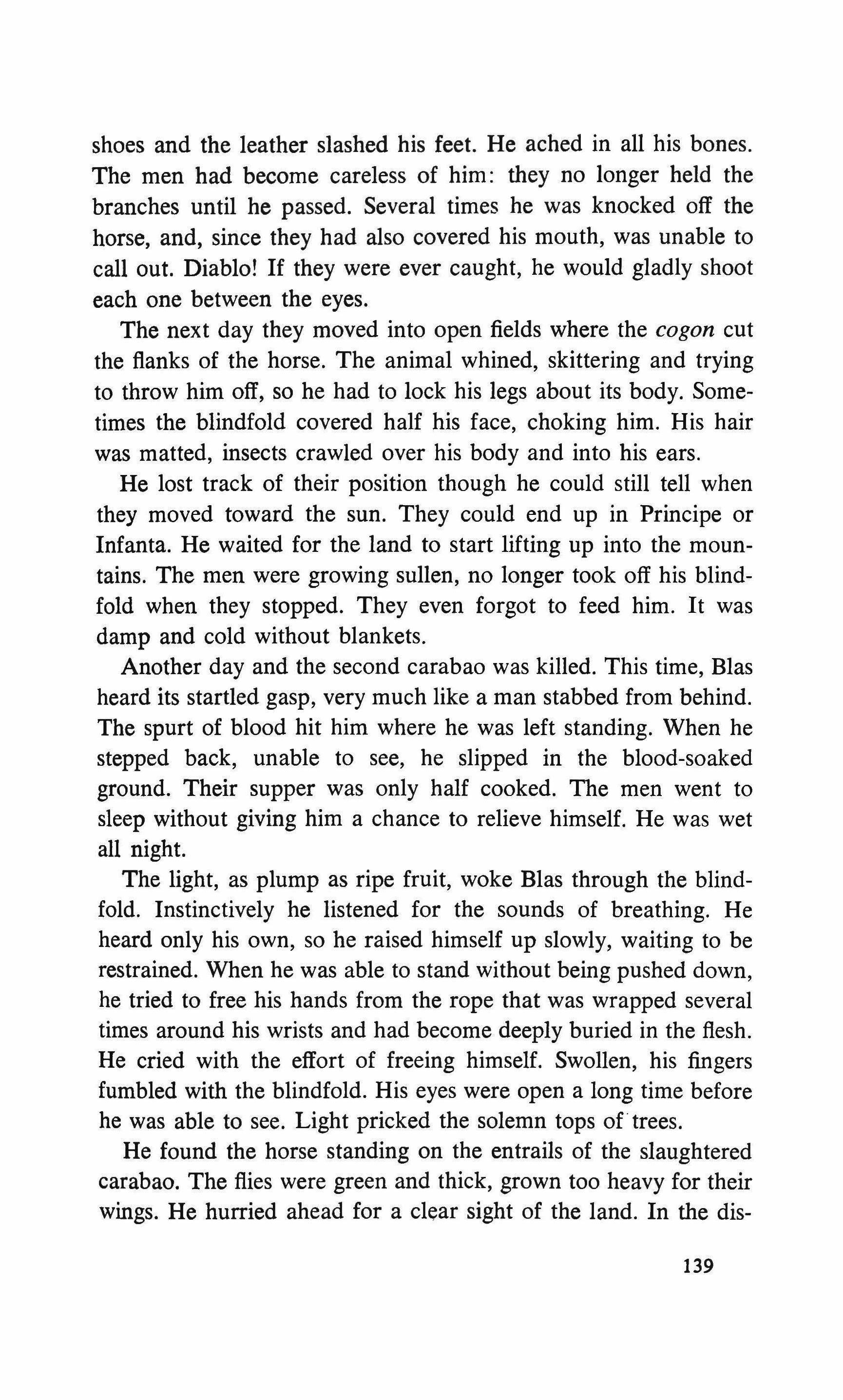
shoes and the leather slashed his feet. He ached in all his bones. The men had become careless of him: they no longer held the branches until he passed. Several times he was knocked off the horse, and, since they had also covered his mouth, was unable to callout. Diablo! If they were ever caught, he would gladly shoot each one between the eyes.
The next day they moved into open fields where the cogan cut the flanks of the horse. The animal whined, skittering and trying to throw him off, so he had to lock his legs about its body. Sometimes the blindfold covered half his face, choking him. His hair was matted, insects crawled over his body and into his ears.
He lost track of their position though he could still tell when they moved toward the sun. They could end up in Principe or Infanta. He waited for the land to start lifting up into the mountains. The men were growing sullen, no longer took off his blindfold when they stopped. They even forgot to feed him. It was damp and cold without blankets.
Another day and the second carabao was killed. This time, BIas heard its startled gasp, very much like a man stabbed from behind. The spurt of blood hit him where he was left standing. When he stepped back, unable to see, he slipped in the blood-soaked ground. Their supper was only half cooked. The men went to sleep without giving him a chance to relieve himself. He was wet all night.
The light, as plump as ripe fruit, woke Bias through the blindfold. Instinctively he listened for the sounds of breathing. He heard only his own, so he raised himself up slowly, waiting to be restrained. When he was able to stand without being pushed down, he tried to free his hands from the rope that was wrapped several times around his wrists and had become deeply buried in the flesh. He cried with the effort of freeing himself. Swollen, his fingers fumbled with the blindfold. His eyes were open a long time before he was able to see. Light pricked the solemn tops of trees. He found the horse standing on the entrails of the slaughtered carabao. The flies were green and thick, grown too heavy for their wings. He hurried ahead for a clear sight of the land. In the dis-
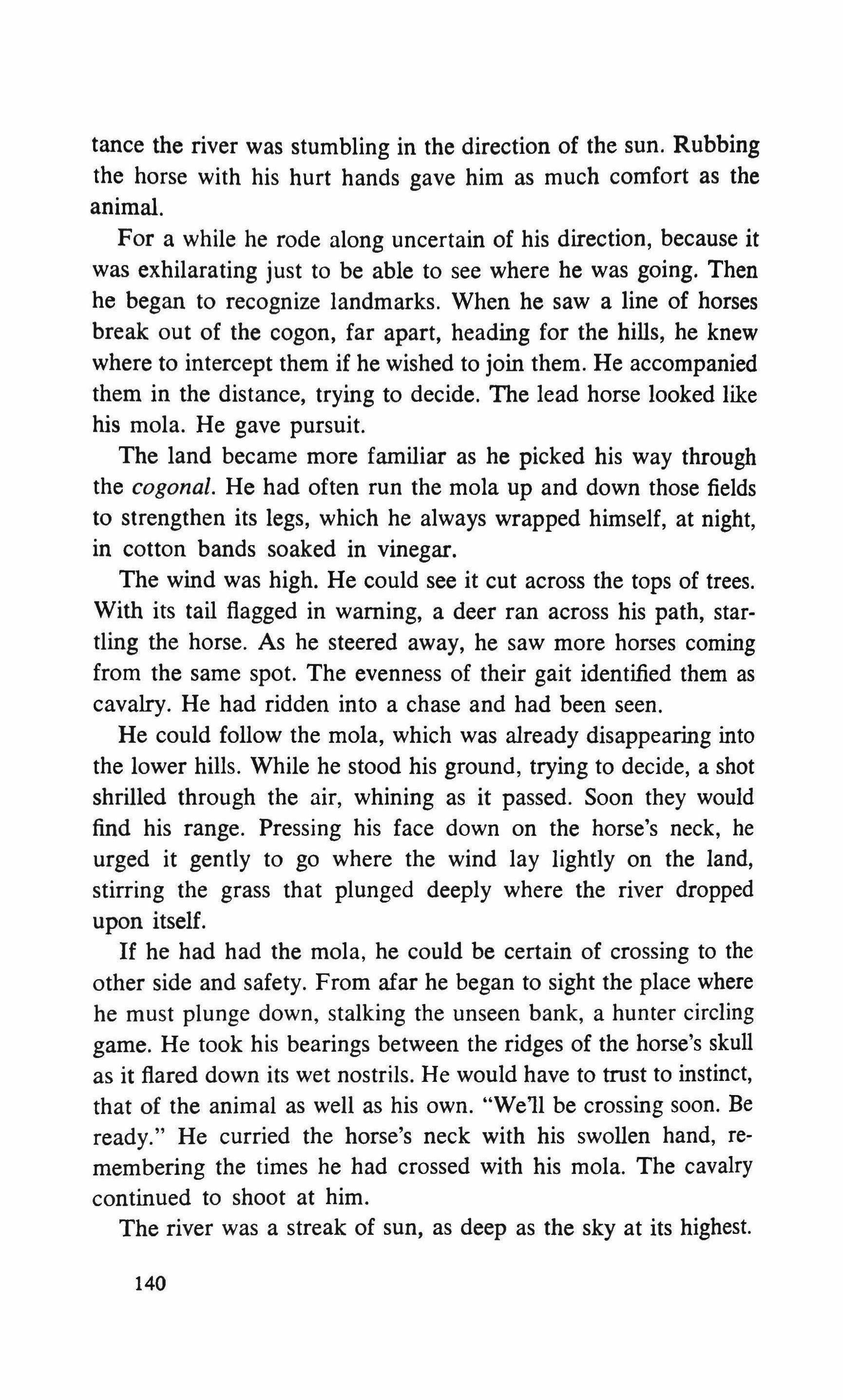
tance the river was stumbling in the direction of the sun. Rubbing the horse with his hurt hands gave him as much comfort as the animal.
For a while he rode along uncertain of his direction, because it was exhilarating just to be able to see where he was going. Then he began to recognize landmarks. When he saw a line of horses break out of the cogon, far apart, heading for the hills, he knew where to intercept them if he wished to join them. He accompanied them in the distance, trying to decide. The lead horse looked like his mola. He gave pursuit.
The land became more familiar as he picked his way through the cogonal. He had often run the mola up and down those fields to strengthen its legs, which he always wrapped himself, at night, in cotton bands soaked in vinegar.
The wind was high. He could see it cut across the tops of trees. With its tail flagged in warning, a deer ran across his path, startling the horse. As he steered away, he saw more horses coming from the same spot. The evenness of their gait identified them as cavalry. He had ridden into a chase and had been seen.
He could follow the mola, which was already disappearing into the lower hills. While he stood his ground, trying to decide, a shot shrilled through the air, whining as it passed. Soon they would find his range. Pressing his face down on the horse's neck, he urged it gently to go where the wind lay lightly on the land, stirring the grass that plunged deeply where the river dropped upon itself.
If he had had the mola, he could be certain of crossing to the other side and safety. From afar he began to sight the place where he must plunge down, stalking the unseen bank, a hunter circling game. He took his bearings between the ridges of the horse's skull as it flared down its wet nostrils. He would have to trust to instinct, that of the animal as well as his own. "Well be crossing soon. Be ready." He curried the horse's neck with his swollen hand, remembering the times he had crossed with his mola. The cavalry continued to shoot at him.
The river was a streak of sun, as deep as the sky at its highest.
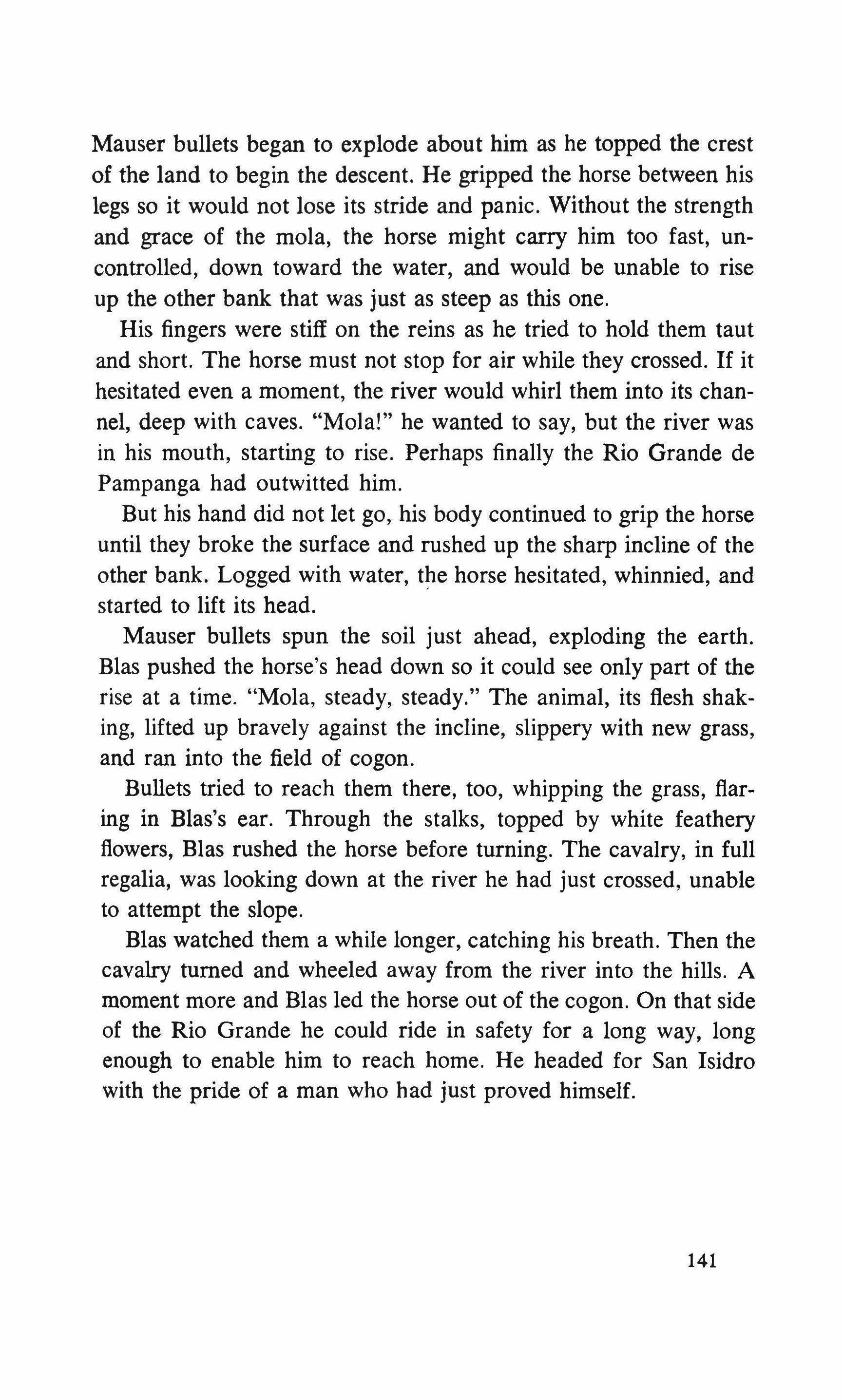
Mauser bullets began to explode about him as he topped the crest of the land to begin the descent. He gripped the horse between his legs so it would not lose its stride and panic. Without the strength and grace of the mola, the horse might carry him too fast, uncontrolled, down toward the water, and would be unable to rise up the other bank that was just as steep as this one.
His fingers were stiff on the reins as he tried to hold them taut and short. The horse must not stop for air while they crossed. If it hesitated even a moment, the river would whirl them into its channel, deep with caves. "Mola!" he wanted to say, but the river was in his mouth, starting to rise. Perhaps finally the Rio Grande de Pampanga had outwitted him.
But his hand did not let go, his body continued to grip the horse until they broke the surface and rushed up the sharp incline of the other bank. Logged with water, the horse hesitated, whinnied, and started to lift its head.
Mauser bullets spun the soil just ahead, exploding the earth. BIas pushed the horse's head down so it could see only part of the rise at a time. "Mola, steady, steady." The animal, its flesh shaking, lifted up bravely against the incline, slippery with new grass, and ran into the field of cogon.
Bullets tried to reach them there, too, whipping the grass, flaring in BIas's ear. Through the stalks, topped by white feathery flowers, BIas rushed the horse before turning. The cavalry, in full regalia, was looking down at the river he had just crossed, unable to attempt the slope.
BIas watched them a while longer, catching his breath. Then the cavalry turned and wheeled away from the river into the hills. A moment more and BIas led the horse out of the cogon. On that side of the Rio Grande he could ride in safety for a long way, long enough to enable him to reach home. He headed for San Isidro with the pride of a man who had just proved himself.
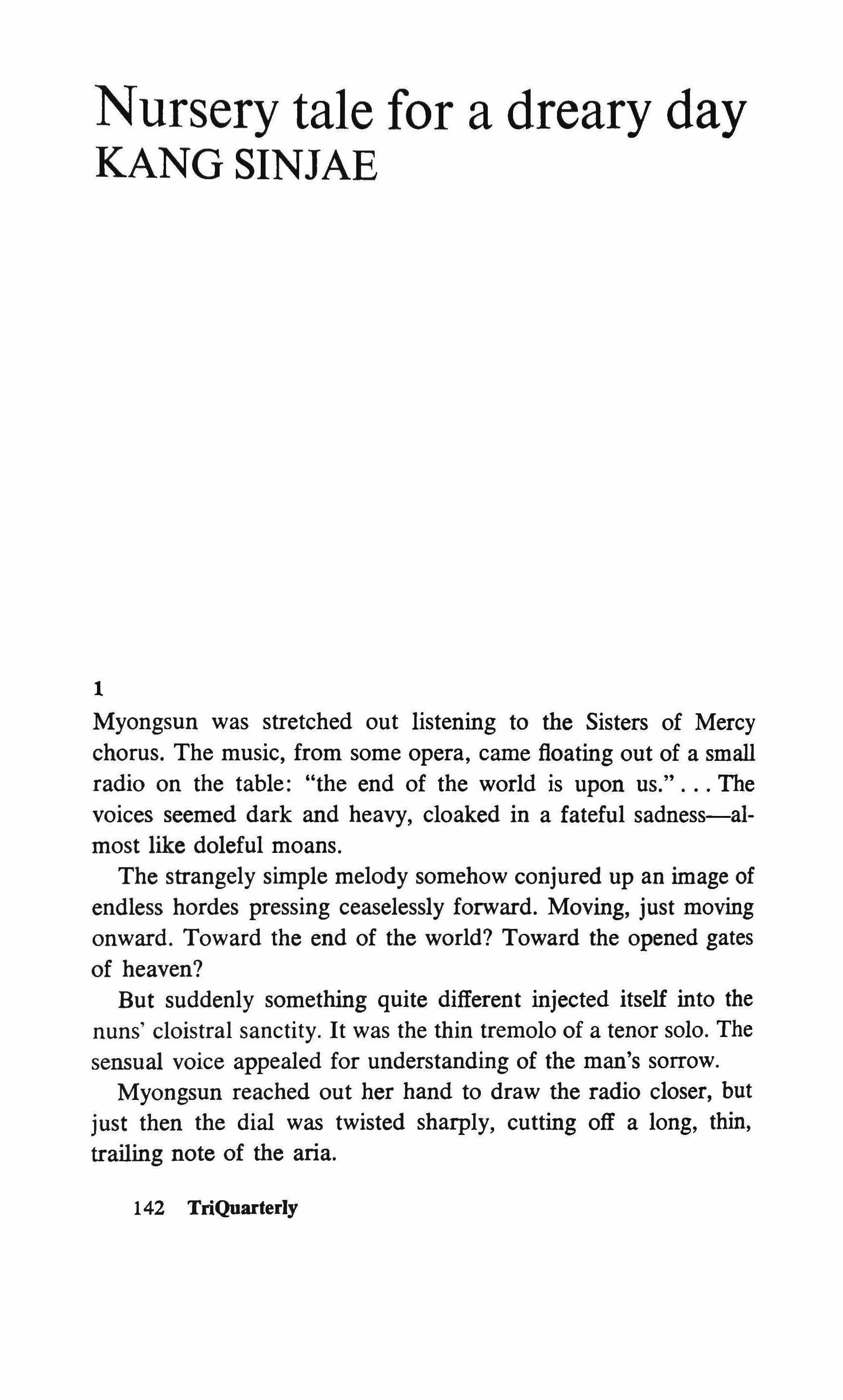
1
Myongsun was stretched out listening to the Sisters of Mercy chorus. The music, from some opera, came floating out of a small radio on the table: "the end of the world is upon us." The voices seemed dark and heavy, cloaked in a fateful sadness-almost like doleful moans.
The strangely simple melody somehow conjured up an image of endless hordes pressing ceaselessly forward. Moving, just moving onward. Toward the end of the world? Toward the opened gates of heaven?
But suddenly something quite different injected itself into the nuns' cloistral sanctity. It was the thin tremolo of a tenor solo. The sensual voice appealed for understanding of the man's sorrow.
Myongsun reached out her hand to draw the radio closer, but just then the dial was twisted sharply, cutting off a long, thin, trailing note of the aria.
142 TrlQuarterly
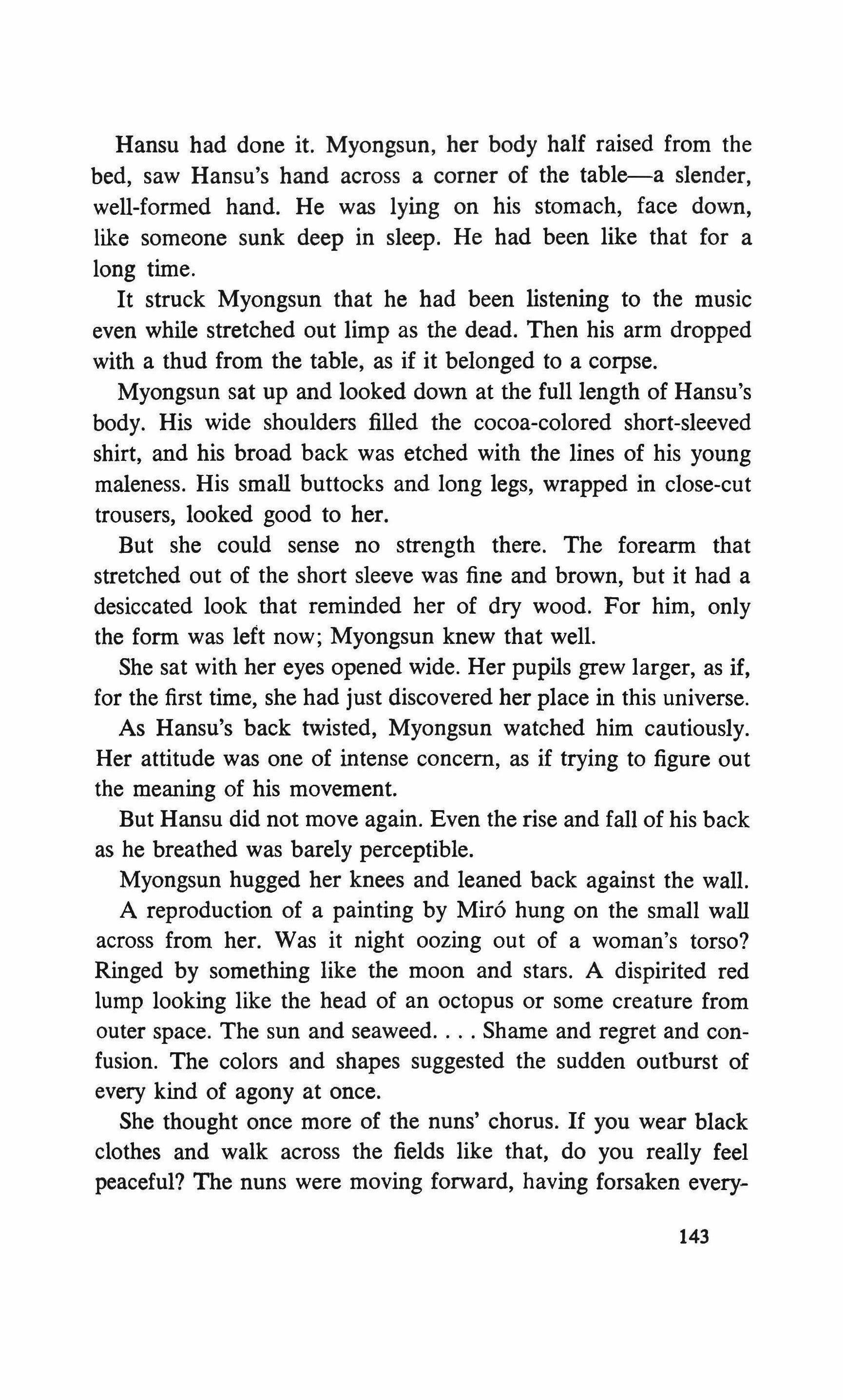
Hansu had done it. Myongsun, her body half raised from the bed, saw Hansu's hand across a corner of the table-a slender, well-formed hand. He was lying on his stomach, face down, like someone sunk deep in sleep. He had been like that for a long time.
It struck Myongsun that he had been listening to the music even while stretched out limp as the dead. Then his arm dropped with a thud from the table, as if it belonged to a corpse.
Myongsun sat up and looked down at the full length of Hansu's body. His wide shoulders filled the cocoa-colored short-sleeved shirt, and his broad back was etched with the lines of his young maleness. His small buttocks and long legs, wrapped in close-cut trousers, looked good to her.
But she could sense no strength there. The forearm that stretched out of the short sleeve was fine and brown, but it had a desiccated look that reminded her of dry wood. For him, only the form was left now; Myongsun knew that welL
She sat with her eyes opened wide. Her pupils grew larger, as if, for the first time, she had just discovered her place in this universe.
As Hansu's back twisted, Myongsun watched him cautiously. Her attitude was one of intense concern, as if trying to figure out the meaning of his movement.
But Hansu did not move again. Even the rise and fall of his back as he breathed was barely perceptible.
Myongsun hugged her knees and leaned back against the wall. A reproduction of a painting by Mira hung on the small wall across from her. Was it night oozing out of a woman's torso? Ringed by something like the moon and stars. A dispirited red lump looking like the head of an octopus or some creature from outer space. The sun and seaweed Shame and regret and confusion. The colors and shapes suggested the sudden outburst of every kind of agony at once.
She thought once more of the nuns' chorus. If you wear black clothes and walk across the fields like that, do you really feel peaceful? The nuns were moving forward, having forsaken every-
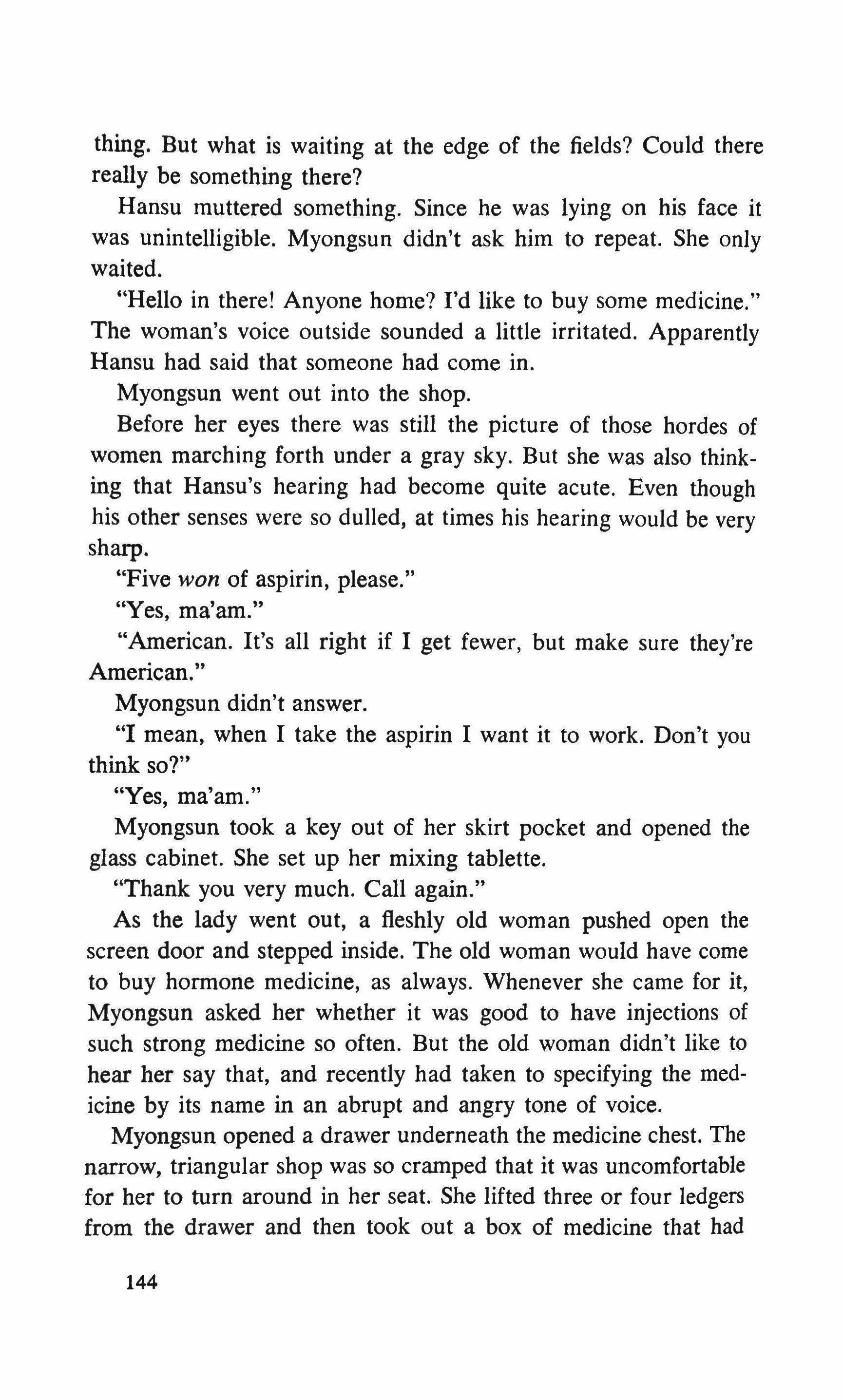
thing. But what is waiting at the edge of the fields? Could there really be something there?
Hansu muttered something. Since he was lying on his face it was unintelligible. Myongsun didn't ask him to repeat. She only waited.
"Hello in there! Anyone home? I'd like to buy some medicine." The woman's voice outside sounded a little irritated. Apparently Hansu had said that someone had come in.
Myongsun went out into the shop.
Before her eyes there was still the picture of those hordes of women marching forth under a gray sky. But she was also thinking that Hansu's hearing had become quite acute. Even though his other senses were so dulled, at times his hearing would be very sharp.
"Five won of aspirin, please."
"Yes, ma'am."
"American. It's all right if I get fewer, but make sure they're American.
Myongsun didn't answer.
"I mean, when I take the aspirin I want it to work. Don't you think so?"
"Yes, ma'am."
Myongsun took a key out of her skirt pocket and opened the glass cabinet. She set up her mixing tablette.
"Thank you very much. Call again."
As the lady went out, a fleshly old woman pushed open the screen door and stepped inside. The old woman would have come to buy hormone medicine, as always. Whenever she came for it, Myongsun asked her whether it was good to have injections of such strong medicine so often. But the old woman didn't like to hear her say that, and recently had taken to specifying the medicine by its name in an abrupt and angry tone of voice.
Myongsun opened a drawer underneath the medicine chest. The narrow, triangular shop was so cramped that it was uncomfortable for her to turn around in her seat. She lifted three or four ledgers from the drawer and then took out a box of medicine that had

been concealed under them. Contraband like that had to be kept hidden.
The old woman bought two kinds of vitamins and a bottle of plasma as well as the hormones. She had neither husband nor children. She was alone with nothing to live for but the care of her own body.
"Have a good day."
"Thank you. Come again."
Then Sunja, all smiles, came into the shop.
"How've you been? Your husband well? Give me a couple of terramycin tablets and something to make a plaster with. My oldest has another boil, for heaven's sake. And I guess I'll need two packets of Alkopa. Let's see, for children it's a half-packet each, isn't it? So, I'll split one between the two children and give one to their father. Shall I buy three? Since everyone's needing it, I might as well, too. No one in our family seems to have any appetite these days You know, I cook special dishes for them, but it's only a waste of time. Perhaps we should be taking some vitamins, so we won't get anemic later in the summer.
Sunja had an active life; she was all a woman could be. And on top of that, she was very happy, Myongsun thought. Myongsun managed to hear her out, but all her talk had little meaning for Myongsun.
Sunja left, and Myongsun went back into the room. Hansu was no longer stretched out where he had been. It looked as if he had gotten up quickly and might already be up to something.
Myongsun opened the kitchen door and glanced quickly around the shelves, in front of the food cabinets, and in the corners near the floor. Hansu had cleaned up well. He had become so careless lately, unable to manage the least deception. He had only to remember to hide the absorbent cotton and ampule caps from Myongsun, but still he kept slipping up and getting caught.
But this time he had dropped nothing on the kitchen floor. Myongusn went into the bedroom and slipped her hand in behind the Mira reproduction.
It was morphine that Hansu always had to hide, and this de-
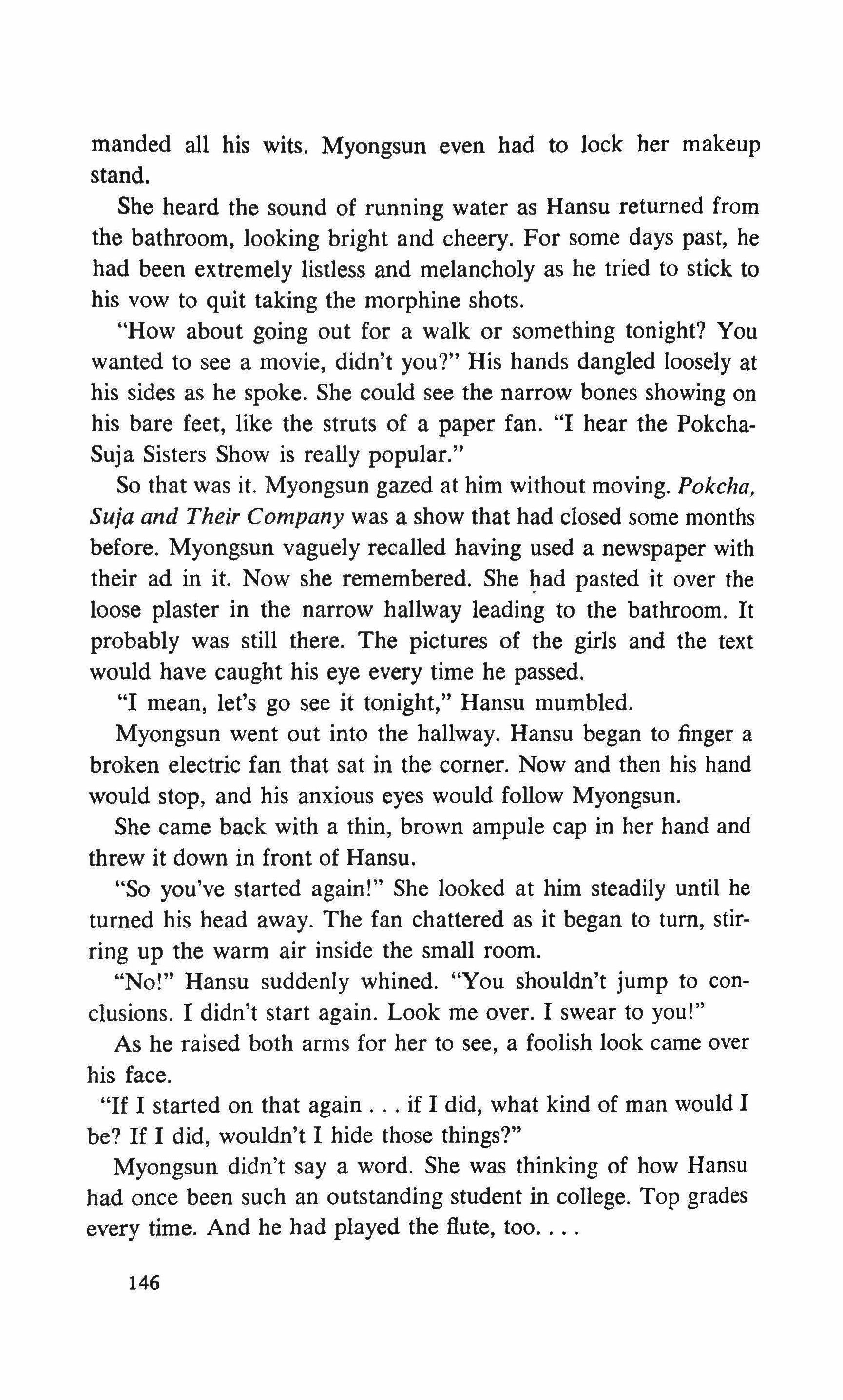
manded all his wits. Myongsun even had to lock her makeup stand.
She heard the sound of running water as Hansu returned from the bathroom, looking bright and cheery. For some days past, he had been extremely listless and melancholy as he tried to stick to his vow to quit taking the morphine shots.
"How about going out for a walk or something tonight? You wanted to see a movie, didn't you?" His hands dangled loosely at his sides as he spoke. She could see the narrow bones showing on his bare feet, like the struts of a paper fan. "I hear the PokchaSuja Sisters Show is really popular."
So that was it. Myongsun gazed at him without moving. Pokcha, Suja and Their Company was a show that had closed some months before. Myongsun vaguely recalled having used a newspaper with their ad in it. Now she remembered. She had pasted it over the loose plaster in the narrow hallway leading to the bathroom. It probably was still there. The pictures of the girls and the text would have caught his eye every time he passed.
"I mean, let's go see it tonight," Hansu mumbled.
Myongsun went out into the hallway. Hansu began to finger a broken electric fan that sat in the corner. Now and then his hand would stop, and his anxious eyes would follow Myongsun.
She came back with a thin, brown ampule cap in her hand and threw it down in front of Hansu.
"So you've started again!" She looked at him steadily until he turned his head away. The fan chattered as it began to turn, stirring up the warm air inside the small room.
"No!" Hansu suddenly whined. "You shouldn't jump to conclusions. I didn't start again. Look me over. I swear to you!"
As he raised both arms for her to see, a foolish look came over his face.
"If I started on that again if I did, what kind of man would I be? If I did, wouldn't I hide those things?"
Myongsun didn't say a word. She was thinking of how Hansu had once been such an outstanding student in college. Top grades every time. And he had played the flute, too
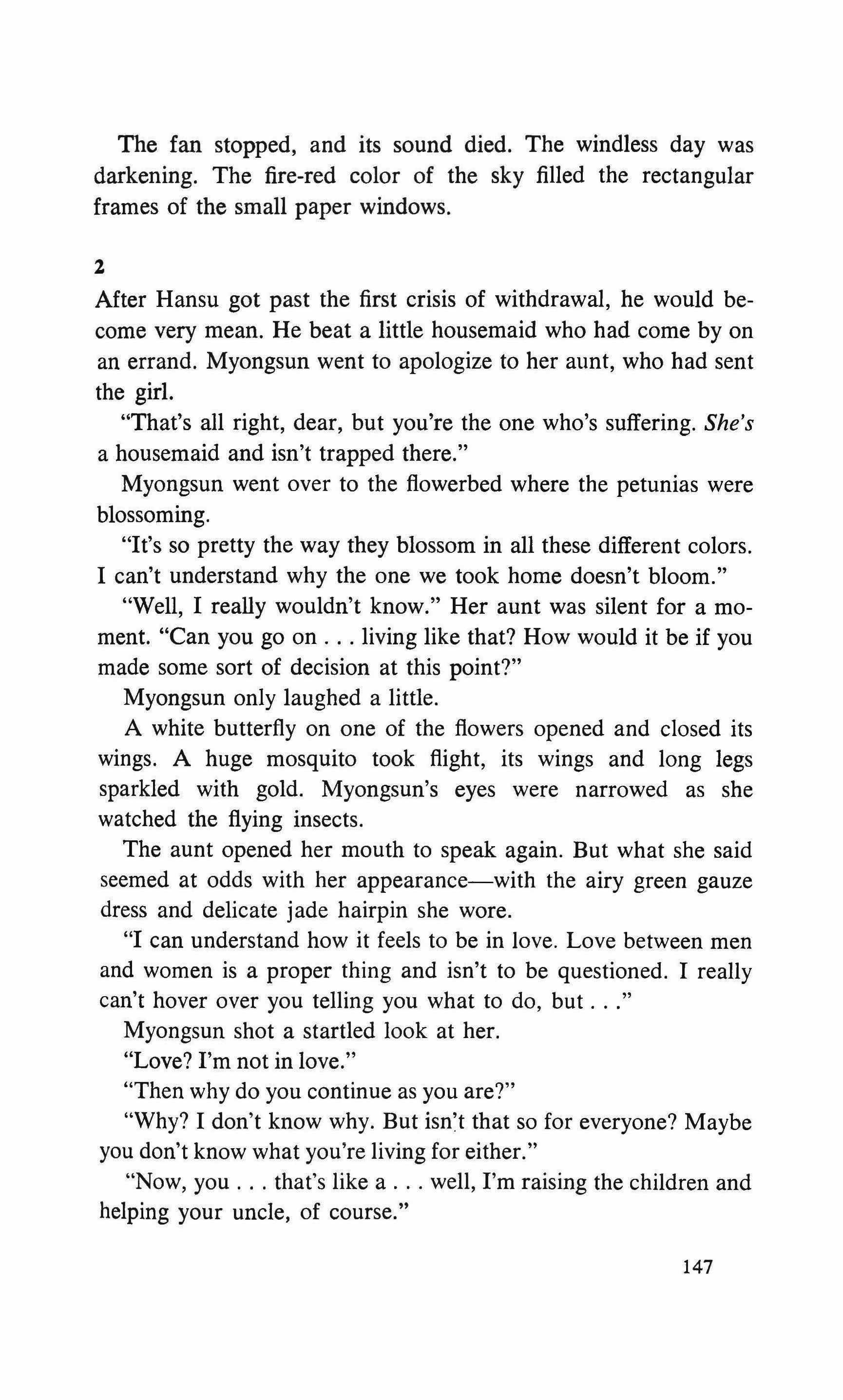
The fan stopped, and its sound died. The windless day was darkening. The fire-red color of the sky filled the rectangular frames of the small paper windows.
2
After Hansu got past the first crisis of withdrawal, he would become very mean. He beat a little housemaid who had come by on an errand. Myongsun went to apologize to her aunt, who had sent the girl.
"That's all right, dear, but you're the one who's suffering. She's a housemaid and isn't trapped there."
Myongsun went over to the flowerbed where the petunias were blossoming.
"It's so pretty the way they blossom in all these different colors. I can't understand why the one we took home doesn't bloom."
"Well, I really wouldn't know." Her aunt was silent for a moment. "Can you go on living like that? How would it be if you made some sort of decision at this point?"
Myongsun only laughed a little.
A white butterfly on one of the flowers opened and closed its wings. A huge mosquito took flight, its wings and long legs sparkled with gold. Myongsun's eyes were narrowed as she watched the flying insects.
The aunt opened her mouth to speak again. But what she said seemed at odds with her appearance-with the airy green gauze dress and delicate jade hairpin she wore.
"I can understand how it feels to be in love. Love between men and women is a proper thing and isn't to be questioned. I really can't hover over you telling you what to do, but "
Myongsun shot a startled look at her.
"Love? I'm not in love."
"Then why do you continue as you are?"
"Why? I don't know why. But isn't that so for everyone? Maybe you don't know what you're living for either."
"Now, you that's like a well, I'm raising the children and helping your uncle, of course."
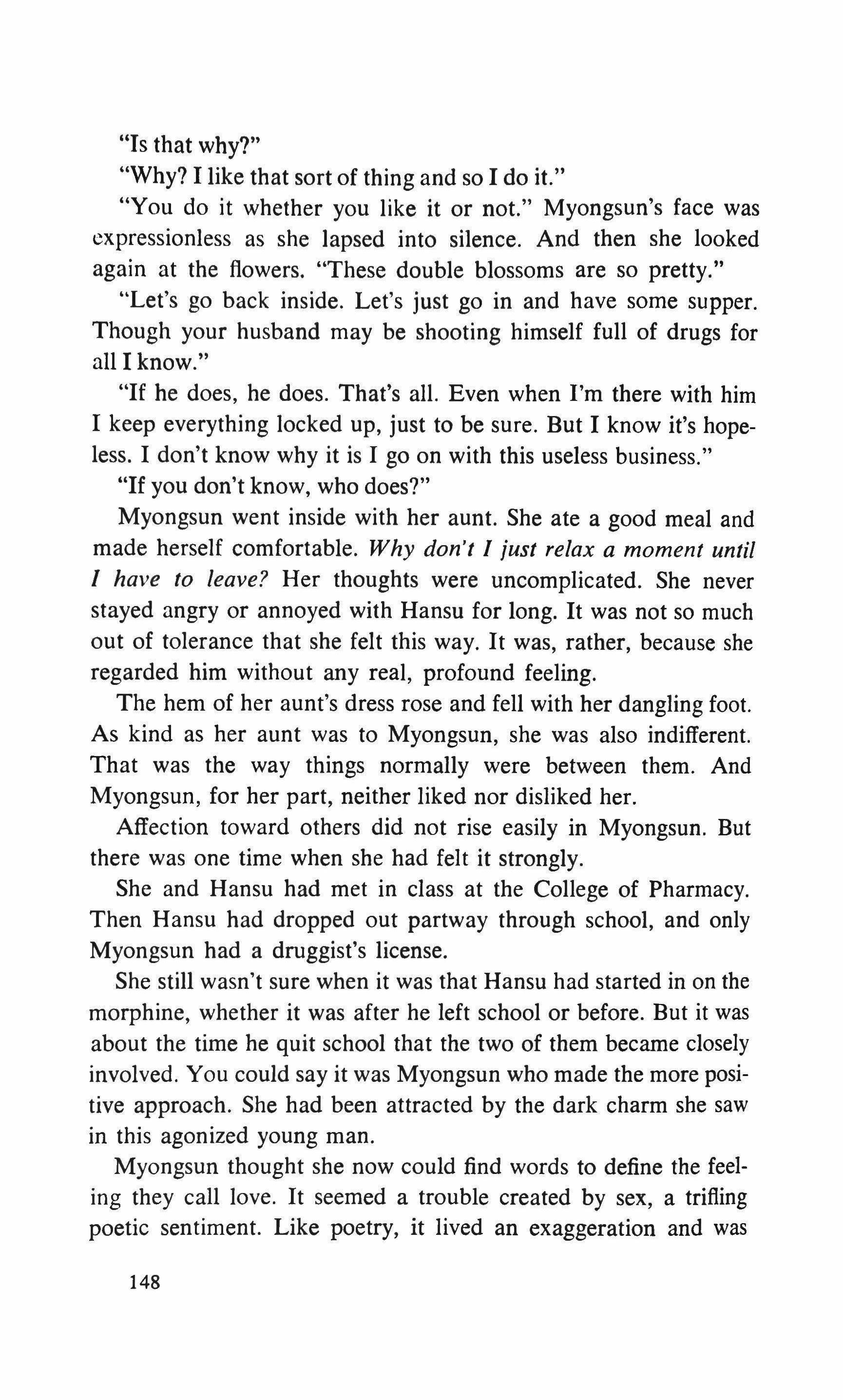
"Is that why?"
"Why? I like that sort of thing and so I do it."
"You do it whether you like it or not." Myongsun's face was expressionless as she lapsed into silence. And then she looked again at the flowers. "These double blossoms are so pretty."
"Let's go back inside. Let's just go in and have some supper. Though your husband may be shooting himself full of drugs for all I know."
"If he does, he does. That's all. Even when I'm there with him I keep everything locked up, just to be sure. But I know it's hopeless. I don't know why it is I go on with this useless business."
"If you don't know, who does?"
Myongsun went inside with her aunt. She ate a good meal and made herself comfortable. Why don't 1 just relax a moment until 1 have to leave? Her thoughts were uncomplicated. She never stayed angry or annoyed with Hansu for long. It was not so much out of tolerance that she felt this way. It was, rather, because she regarded him without any real, profound feeling.
The hem of her aunt's dress rose and fell with her dangling foot. As kind as her aunt was to Myongsun, she was also indifferent. That was the way things normally were between them. And Myongsun, for her part, neither liked nor disliked her.
Affection toward others did not rise easily in Myongsun. But there was one time when she had felt it strongly.
She and Hansu had met in class at the College of Pharmacy. Then Hansu had dropped out partway through school, and only Myongsun had a druggist's license.
She still wasn't sure when it was that Hansu had started in on the morphine, whether it was after he left school or before. But it was about the time he quit school that the two of them became closely involved. You could say it was Myongsun who made the more positive approach. She had been attracted by the dark charm she saw in this agonized young man.
Myongsun thought she now could find words to define the feeling they call love. It seemed a trouble created by sex, a trifling poetic sentiment. Like poetry, it lived an exaggeration and was
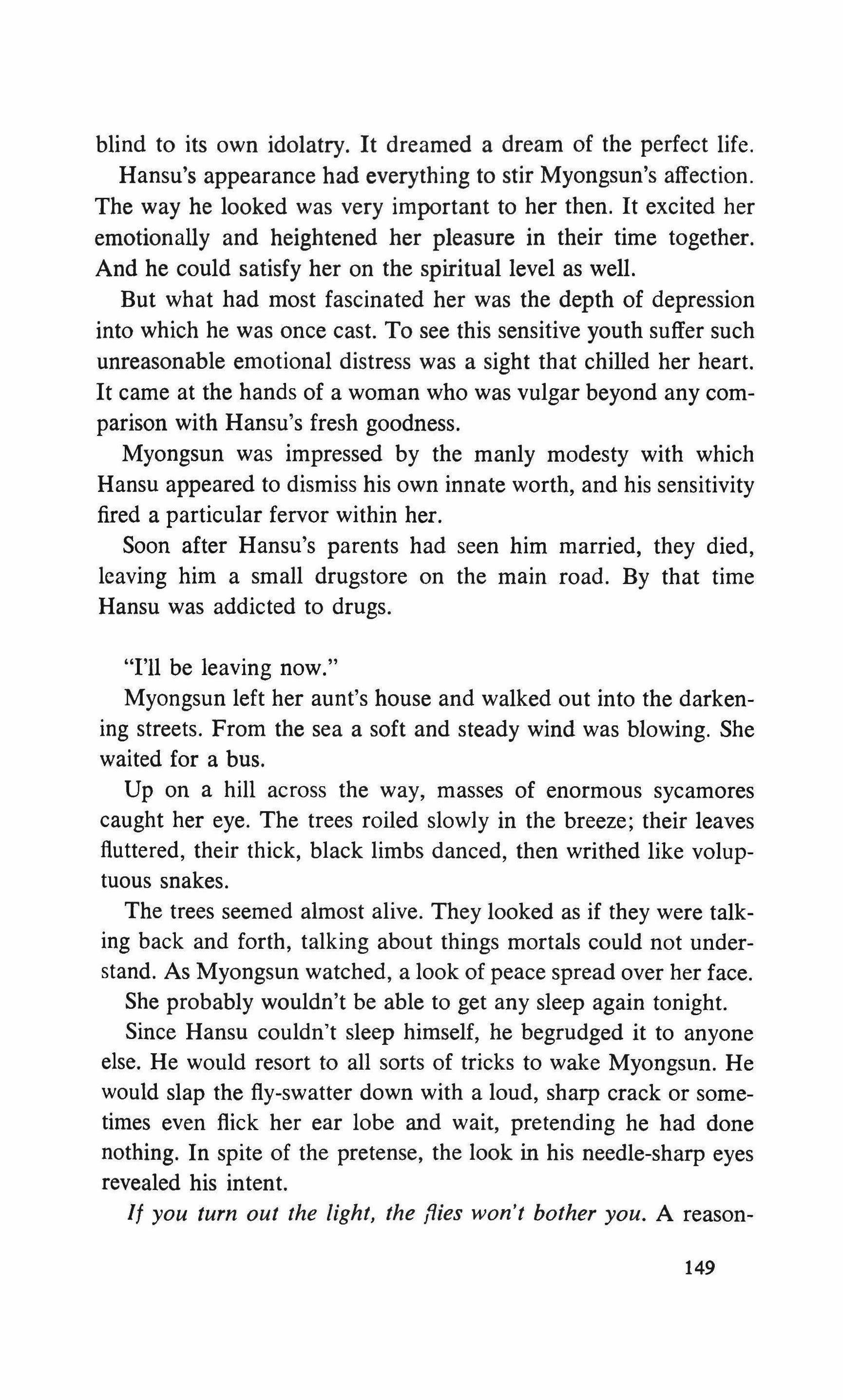
blind to its own idolatry. It dreamed a dream of the perfect life.
Hansu's appearance had everything to stir Myongsun's affection. The way he looked was very important to her then. It excited her emotionally and heightened her pleasure in their time together. And he could satisfy her on the spiritual level as well.
But what had most fascinated her was the depth of depression into which he was once cast. To see this sensitive youth suffer such unreasonable emotional distress was a sight that chilled her heart. It came at the hands of a woman who was vulgar beyond any comparison with Hansu's fresh goodness.
Myongsun was impressed by the manly modesty with which Hansu appeared to dismiss his own innate worth, and his sensitivity fired a particular fervor within her.
Soon after Hansu's parents had seen him married, they died, leaving him a small drugstore on the main road. By that time Hansu was addicted to drugs.
"I'll be leaving now."
Myongsun left her aunt's house and walked out into the darkening streets. From the sea a soft and steady wind was blowing. She waited for a bus.
Up on a hill across the way, masses of enormous sycamores caught her eye. The trees roiled slowly in the breeze; their leaves fluttered, their thick, black limbs danced, then writhed like voluptuous snakes.
The trees seemed almost alive. They looked as if they were talking back and forth, talking about things mortals could not understand. As Myongsun watched, a look of peace spread over her face.
She probably wouldn't be able to get any sleep again tonight.
Since Hansu couldn't sleep himself, he begrudged it to anyone else. He would resort to all sorts of tricks to wake Myongsun. He would slap the fly-swatter down with a loud, sharp crack or sometimes even flick her ear lobe and wait, pretending he had done nothing. In spite of the pretense, the look in his needle-sharp eyes revealed his intent.
If you turn out the light, the fiies won't bother you. A reason-
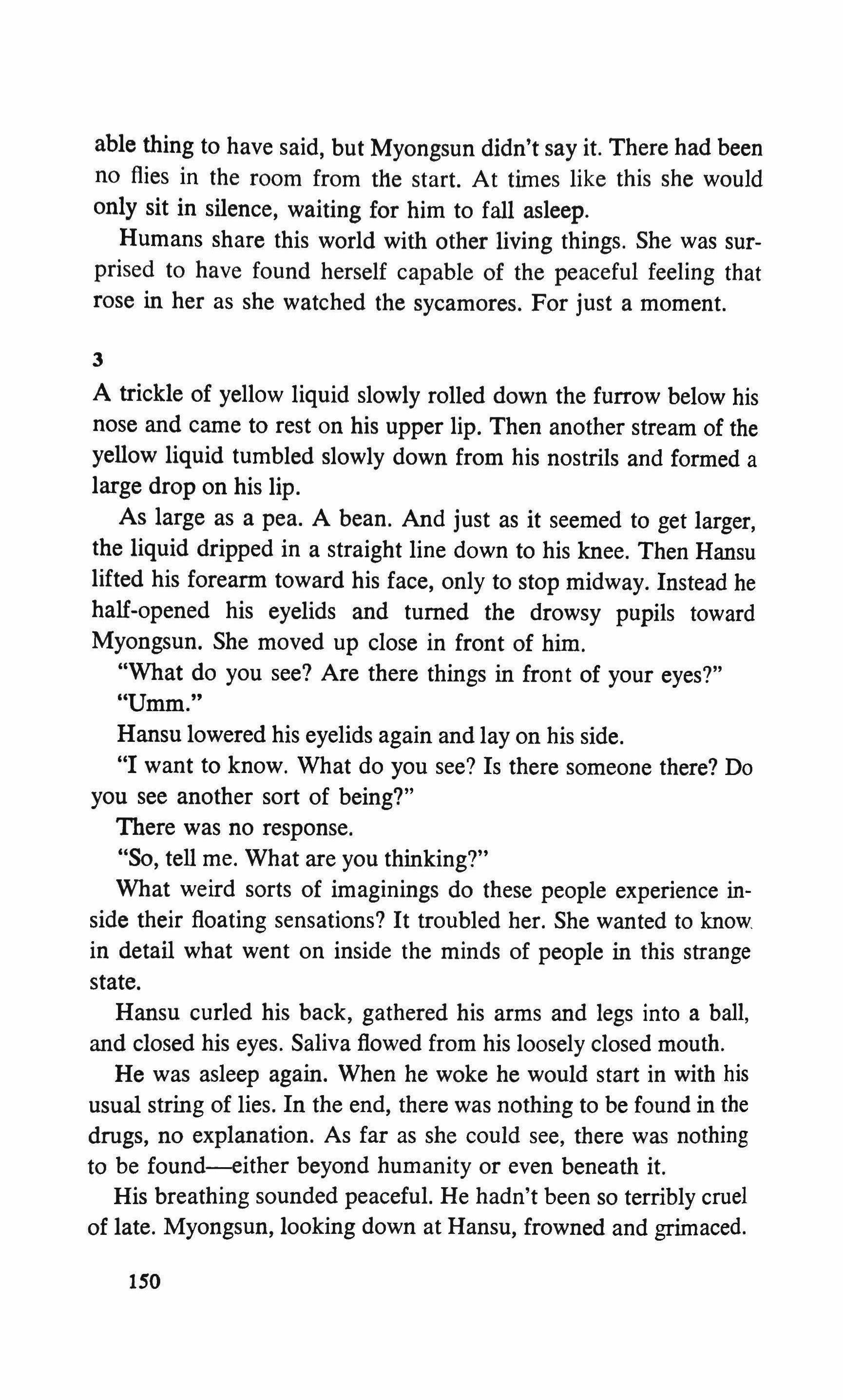
able thing to have said, but Myongsun didn't say it. There had been no flies in the room from the start. At times like this she would only sit in silence, waiting for him to fall asleep.
Humans share this world with other living things. She was surprised to have found herself capable of the peaceful feeling that rose in her as she watched the sycamores. For just a moment.
3
A trickle of yellow liquid slowly rolled down the furrow below his nose and came to rest on his upper lip. Then another stream of the yellow liquid tumbled slowly down from his nostrils and formed a large drop on his lip.
As large as a pea. A bean. And just as it seemed to get larger, the liquid dripped in a straight line down to his knee. Then Hansu lifted his forearm toward his face, only to stop midway. Instead he half-opened his eyelids and turned the drowsy pupils toward Myongsun. She moved up close in front of him.
"What do you see? Are there things in front of your eyes?" "Umm."
Hansu lowered his eyelids again and lay on his side.
"I want to know. What do you see? Is there someone there? Do you see another sort of being?"
There was no response.
"So, tell me. What are you thinking?"
What weird sorts of imaginings do these people experience inside their floating sensations? It troubled her. She wanted to know in detail what went on inside the minds of people in this strange state.
Hansu curled his back, gathered his arms and legs into a ball, and closed his eyes. Saliva flowed from his loosely closed mouth. He was asleep again. When he woke he would start in with his usual string of lies. In the end, there was nothing to be found in the drugs, no explanation. As far as she could see, there was nothing to be found-either beyond humanity or even beneath it.
His breathing sounded peaceful. He hadn't been so terribly cruel of late. Myongsun, looking down at Hansu, frowned and grimaced.
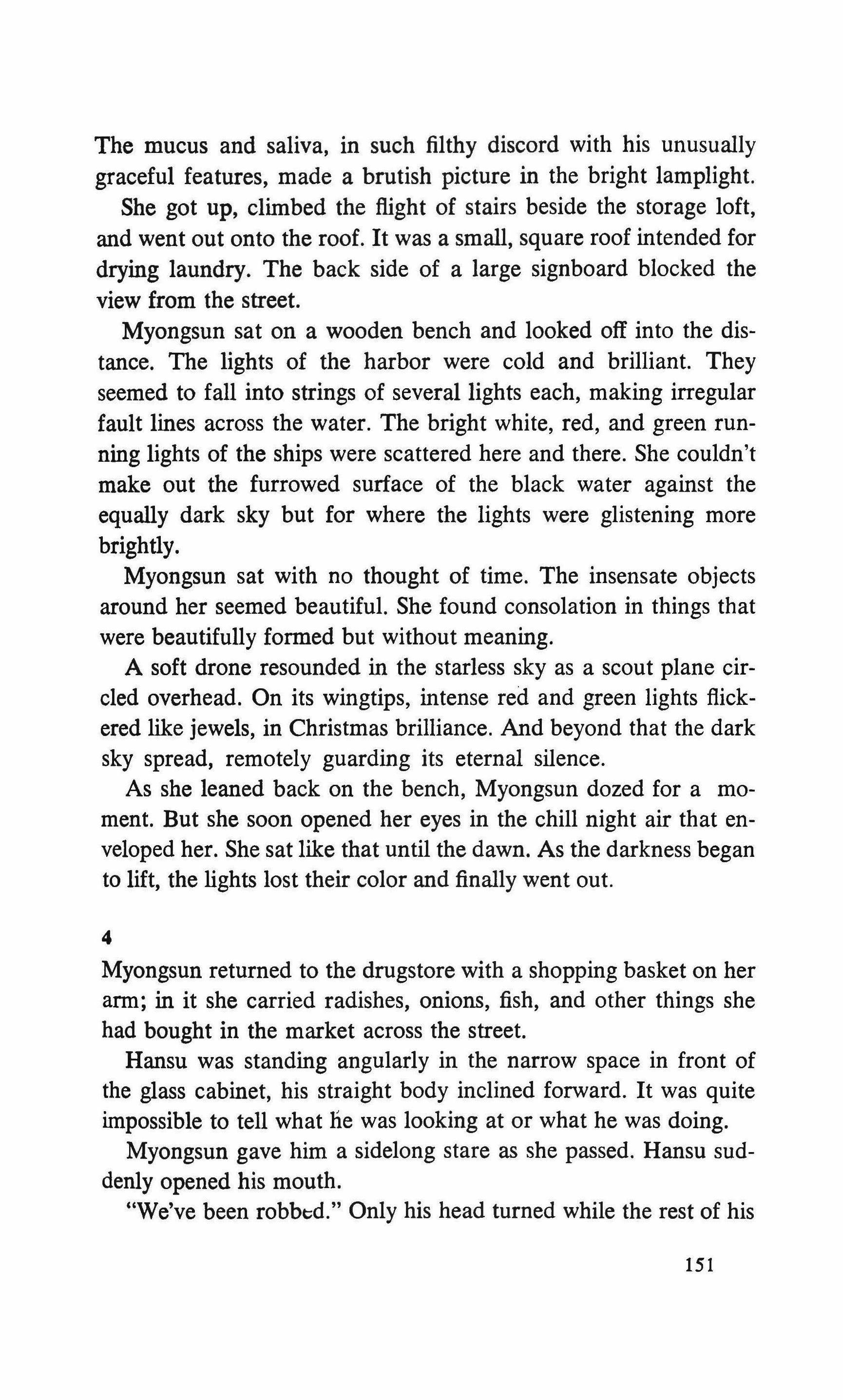
The mucus and saliva, in such filthy discord with his unusually graceful features, made a brutish picture in the bright lamplight. She got up, climbed the flight of stairs beside the storage loft, and went out onto the roof. It was a small, square roof intended for drying laundry. The back side of a large signboard blocked the view from the street.
Myongsun sat on a wooden bench and looked off into the distance. The lights of the harbor were cold and brilliant. They seemed to fall into strings of several lights each, making irregular fault lines across the water. The bright white, red, and green running lights of the ships were scattered here and there. She couldn't make out the furrowed surface of the black water against the equally dark sky but for where the lights were glistening more brightly.
Myongsun sat with no thought of time. The insensate objects around her seemed beautiful. She found consolation in things that were beautifully formed but without meaning.
A soft drone resounded in the starless sky as a scout plane circled overhead. On its wingtips, intense red and green lights flickered like jewels, in Christmas brilliance. And beyond that the dark sky spread, remotely guarding its eternal silence.
As she leaned back on the bench, Myongsun dozed for a moment. But she soon opened her eyes in the chill night air that enveloped her. She sat like that until the dawn. As the darkness began to lift, the lights lost their color and finally went out.
4
Myongsun returned to the drugstore with a shopping basket on her arm; in it she carried radishes, onions, fish, and other things she had bought in the market across the street.
Hansu was standing angularly in the narrow space in front of the glass cabinet, his straight body inclined forward. It was quite impossible to tell what lie was looking at or what he was doing.
Myongsun gave him a sidelong stare as she passed. Hansu suddenly opened his mouth.
"We've been robbed." Only his head turned while the rest of his
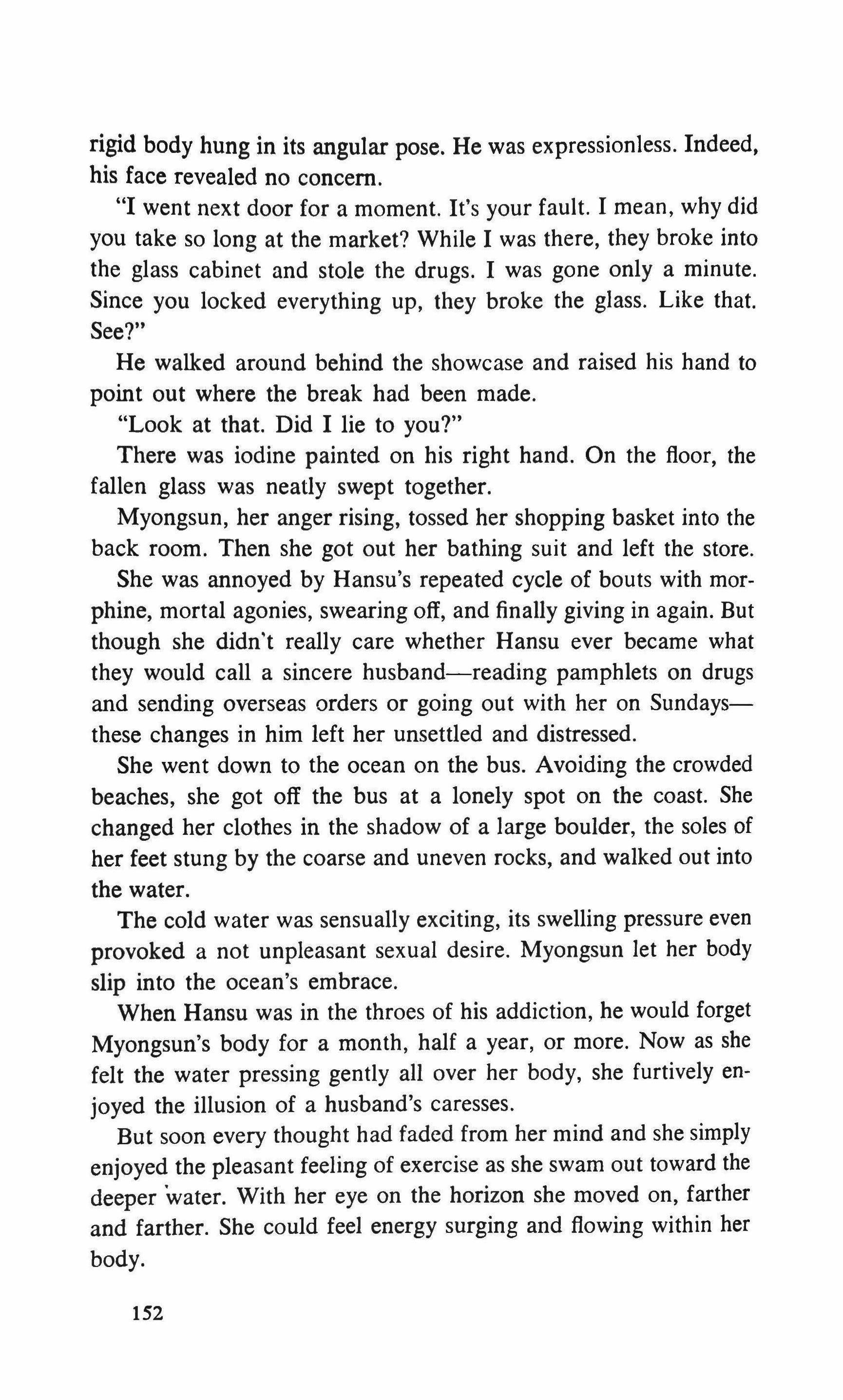
rigid body hung in its angular pose. He was expressionless. Indeed. his face revealed no concern.
"I went next door for a moment. It's your fault. I mean, why did you take so long at the market? While I was there, they broke into the glass cabinet and stole the drugs. I was gone only a minute. Since you locked everything up, they broke the glass. Like that. See?"
He walked around behind the showcase and raised his hand to point out where the break had been made.
"Look at that. Did I lie to you?"
There was iodine painted on his right hand. On the floor, the fallen glass was neatly swept together.
Myongsun, her anger rising, tossed her shopping basket into the back room. Then she got out her bathing suit and left the store.
She was annoyed by Hansu's repeated cycle of bouts with morphine, mortal agonies, swearing off, and finally giving in again. But though she didn't really care whether Hansu ever became what they would call a sincere husband-reading pamphlets on drugs and sending overseas orders or going out with her on Sundaysthese changes in him left her unsettled and distressed.
She went down to the ocean on the bus. Avoiding the crowded beaches, she got off the bus at a lonely spot on the coast. She changed her clothes in the shadow of a large boulder, the soles of her feet stung by the coarse and uneven rocks, and walked out into the water.
The cold water was sensually exciting, its swelling pressure even provoked a not unpleasant sexual desire. Myongsun let her body slip into the ocean's embrace.
When Hansu was in the throes of his addiction, he would forget Myongsun's body for a month, half a year, or more. Now as she felt the water pressing gently all over her body, she furtively enjoyed the illusion of a husband's caresses.
But soon every thought had faded from her mind and she simply enjoyed the pleasant feeling of exercise as she swam out toward the deeper water. With her eye on the horizon she moved on, farther and farther. She could feel energy surging and flowing within her body.
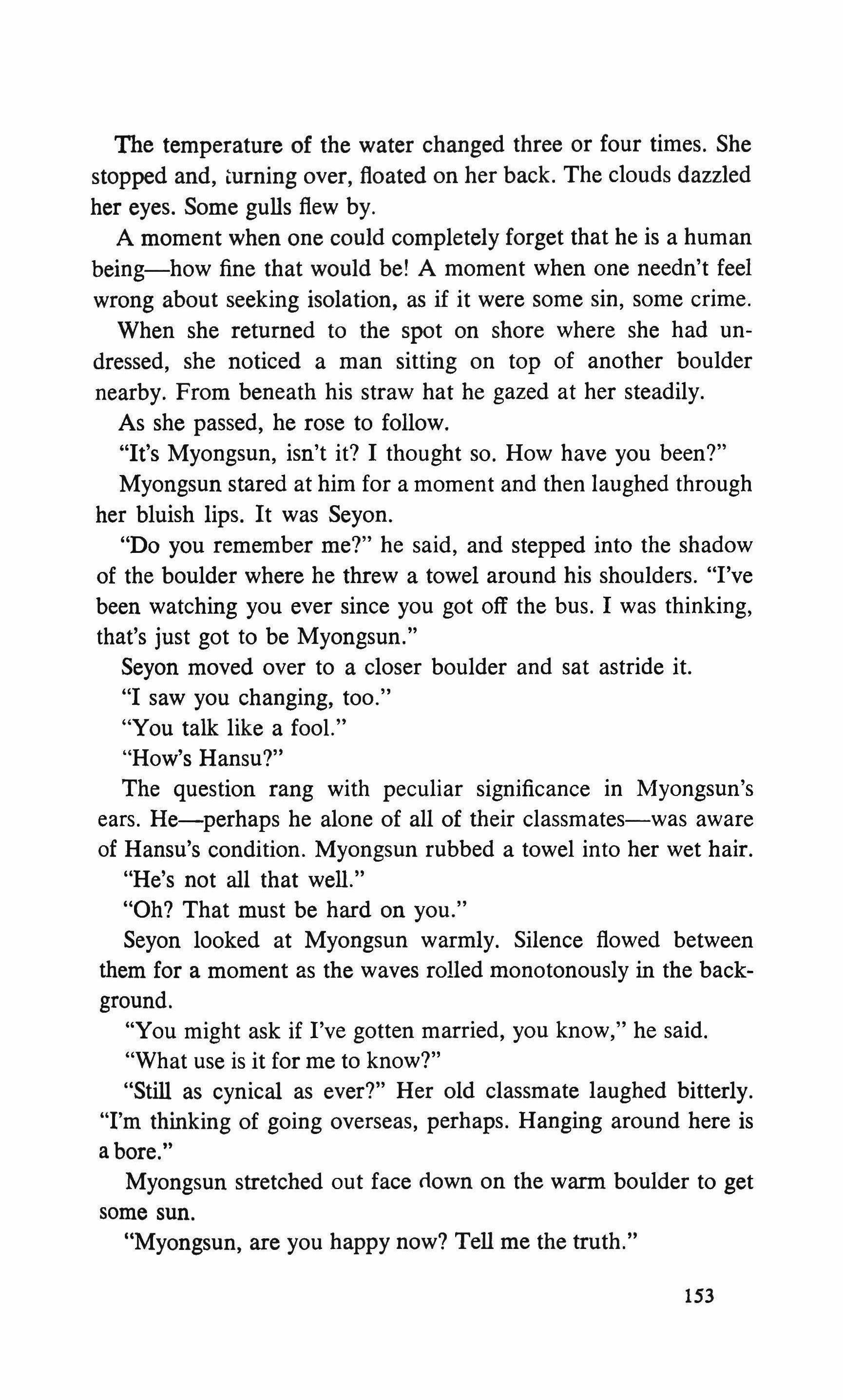
The temperature of the water changed three or four times. She stopped and, turning over, floated on her back. The clouds dazzled her eyes. Some gulls flew by.
A moment when one could completely forget that he is a human being-how fine that would be! A moment when one needn't feel wrong about seeking isolation, as if it were some sin, some crime.
When she returned to the spot on shore where she had undressed, she noticed a man sitting on top of another boulder nearby. From beneath his straw hat he gazed at her steadily.
As she passed, he rose to follow.
"It's Myongsun, isn't it? I thought so. How have you been?"
Myongsun stared at him for a moment and then laughed through her bluish lips. It was Seyon.
"Do you remember me?" he said, and stepped into the shadow of the boulder where he threw a towel around his shoulders. "I've been watching you ever since you got off the bus. 1 was thinking, that's just got to be Myongsun."
Seyon moved over to a closer boulder and sat astride it.
"I saw you changing, too."
"You talk like a fool."
"How's Hansu?"
The question rang with peculiar significance in Myongsun's ears. He-perhaps he alone of all of their classmates-was aware of Hansu's condition. Myongsun rubbed a towel into her wet hair.
"He's not all that well."
"Oh? That must be hard on you."
Seyon looked at Myongsun warmly. Silence flowed between them for a moment as the waves rolled monotonously in the background.
"You might ask if I've gotten married, you know," he said.
"What use is it for me to know?"
"Still as cynical as ever?" Her old classmate laughed bitterly. "I'm thinking of going overseas, perhaps. Hanging around here is a bore."
Myongsun stretched out face clown on the warm boulder to get some sun.
"Myongsun, are you happy now? Tell me the truth."
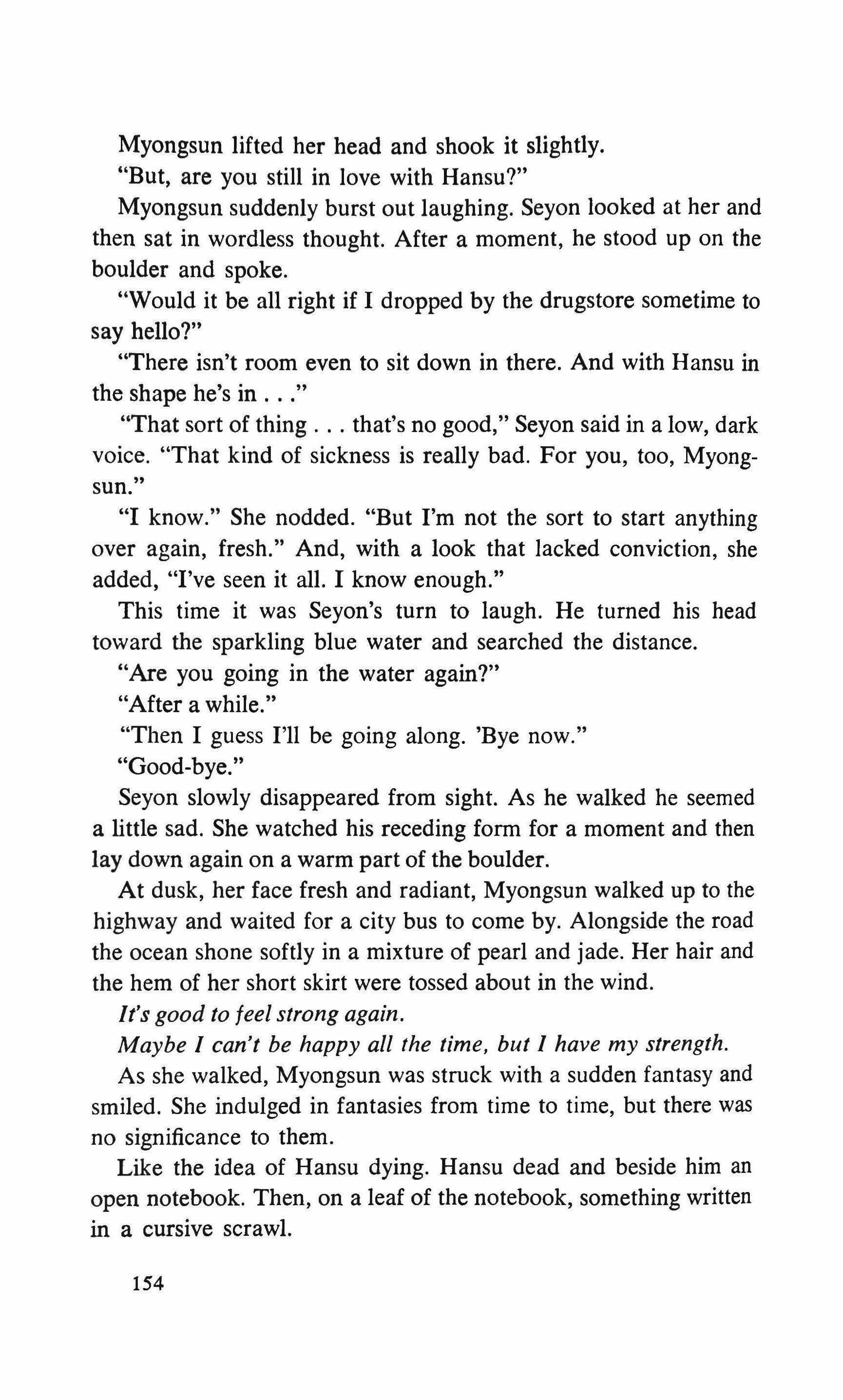
Myongsun lifted her head and shook it slightly.
"But, are you still in love with Hansu?"
Myongsun suddenly burst out laughing. Seyon looked at her and then sat in wordless thought. After a moment, he stood up on the boulder and spoke.
"Would it be all right if I dropped by the drugstore sometime to say hello?"
"There isn't room even to sit down in there. And with Hansu in the shape he's in
"That sort of thing that's no good," Seyon said in a low, dark voice. "That kind of sickness is really bad. For you, too, Myongsun."
"I know." She nodded. "But I'm not the sort to start anything over again, fresh." And, with a look that lacked conviction, she added, "I've seen it all. I know enough."
This time it was Seyon's turn to laugh. He turned his head toward the sparkling blue water and searched the distance.
"Are you going in the water again?"
"After a while."
"Then I guess I'll be going along. 'Bye now."
Seyon slowly disappeared from sight. As he walked he seemed a little sad. She watched his receding form for a moment and then lay down again on a warm part of the boulder.
At dusk, her face fresh and radiant, Myongsun walked up to the highway and waited for a city bus to come by. Alongside the road the ocean shone softly in a mixture of pearl and jade. Her hair and the hem of her short skirt were tossed about in the wind.
It's good to feel strong again.
Maybe I can't be happy all the time, but I have my strength.
As she walked, Myongsun was struck with a sudden fantasy and smiled. She indulged in fantasies from time to time, but there was no significance to them.
Like the idea of Hansu dying. Hansu dead and beside him an open notebook. Then, on a leaf of the notebook, something written in a cursive scrawl.
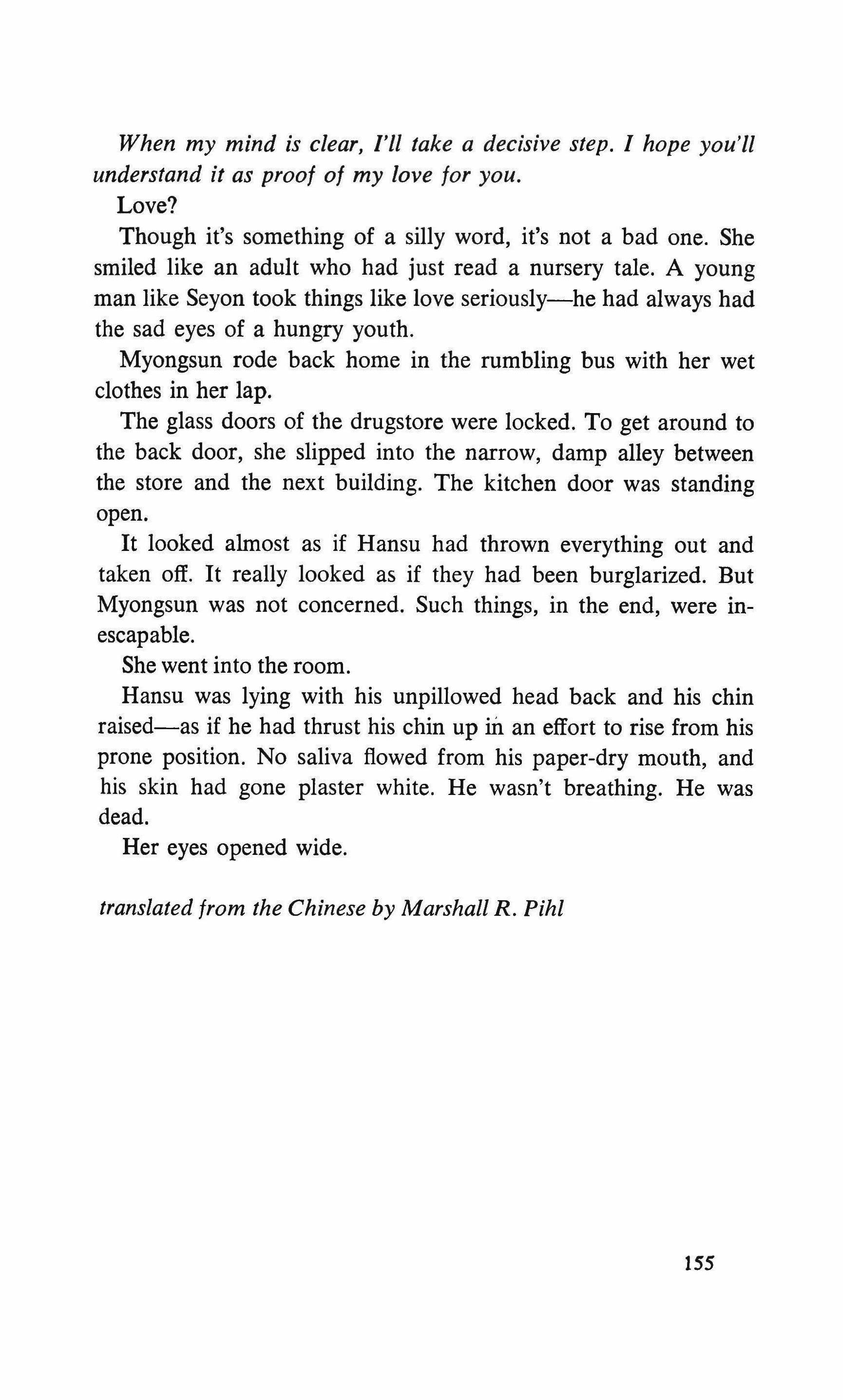
When my mind is clear, I'll take a decisive step. I hope you'll understand it as proof of my love for you.
Though it's something of a silly word, it's not a bad one. She smiled like an adult who had just read a nursery tale. A young man like Seyon took things like love seriously-he had always had the sad eyes of a hungry youth.
Myongsun rode back home in the rumbling bus with her wet clothes in her lap.
The glass doors of the drugstore were locked. To get around to the back door, she slipped into the narrow, damp alley between the store and the next building. The kitchen door was standing open.
It looked almost as if Hansu had thrown everything out and taken off. It really looked as if they had been burglarized. But Myongsun was not concerned. Such things, in the end, were inescapable.
She went into the room.
Hansu was lying with his unpillowed head back and his chin raised-as if he had thrust his chin up ill an effort to rise from his prone position. No saliva flowed from his paper-dry mouth, and his skin had gone plaster white. He wasn't breathing. He was dead.
Her eyes opened wide.
translated from the Chinese by Marshall R. Pihl
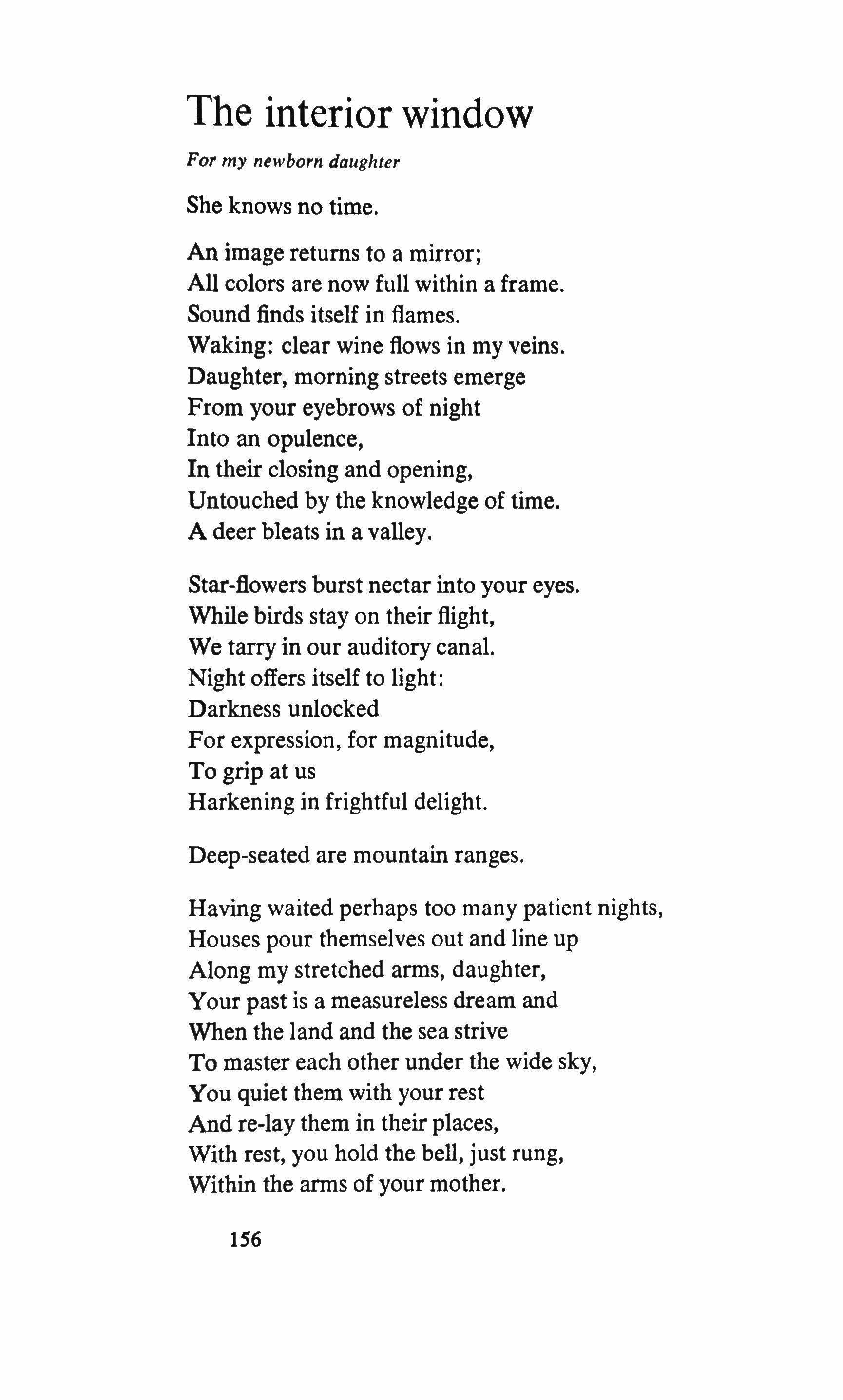
For my newborn daughter
She knows no time.
An image returns to a mirror; All colors are now full within a frame. Sound finds itself in flames.
Waking: clear wine flows in my veins. Daughter, morning streets emerge From your eyebrows of night Into an opulence, In their closing and opening, Untouched by the knowledge of time. A deer bleats in a valley.
Star-flowers burst nectar into your eyes. While birds stay on their flight, We tarry in our auditory canal.
Night offers itself to light: Darkness unlocked For expression, for magnitude, To grip at us
Harkening in frightful delight.
Deep-seated are mountain ranges.
Having waited perhaps too many patient nights, Houses pour themselves out and line up
Along my stretched arms, daughter, Your past is a measureless dream and When the land and the sea strive To master each other under the wide sky, You quiet them with your rest And re-lay them in their places, With rest, you hold the bell, just rung, Within the arms of your mother.
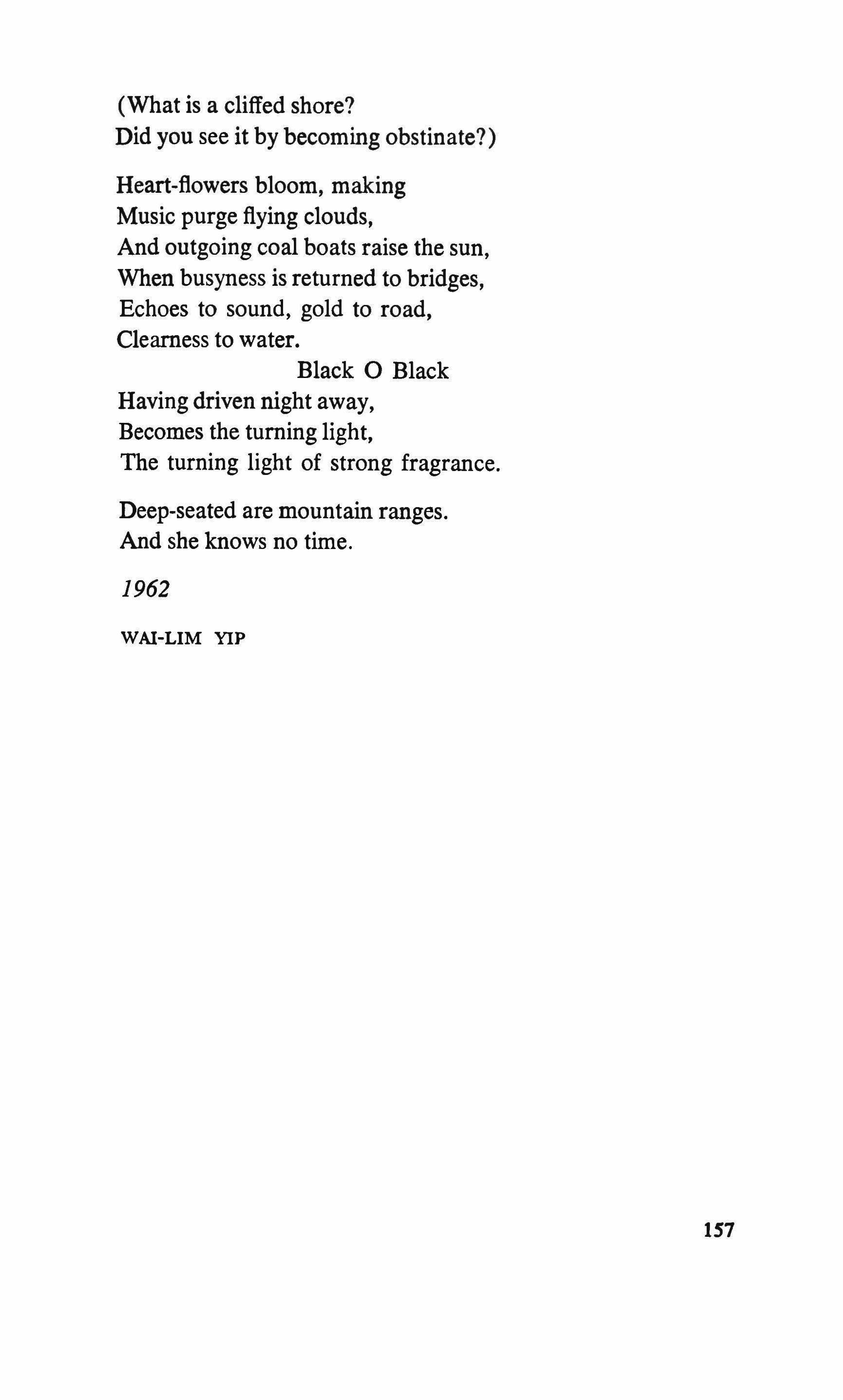
(What is a cliffed shore? Did you see it by becoming obstinate?)
Heart-flowers bloom, making Music purge flying clouds, And outgoing coal boats raise the sun, When busyness is returned to bridges, Echoes to sound, gold to road, Clearness to water.
Having driven night away, Becomes the turning light, The turning light of strong fragrance.
Deep-seated are mountain ranges. And she knows no time.
1962
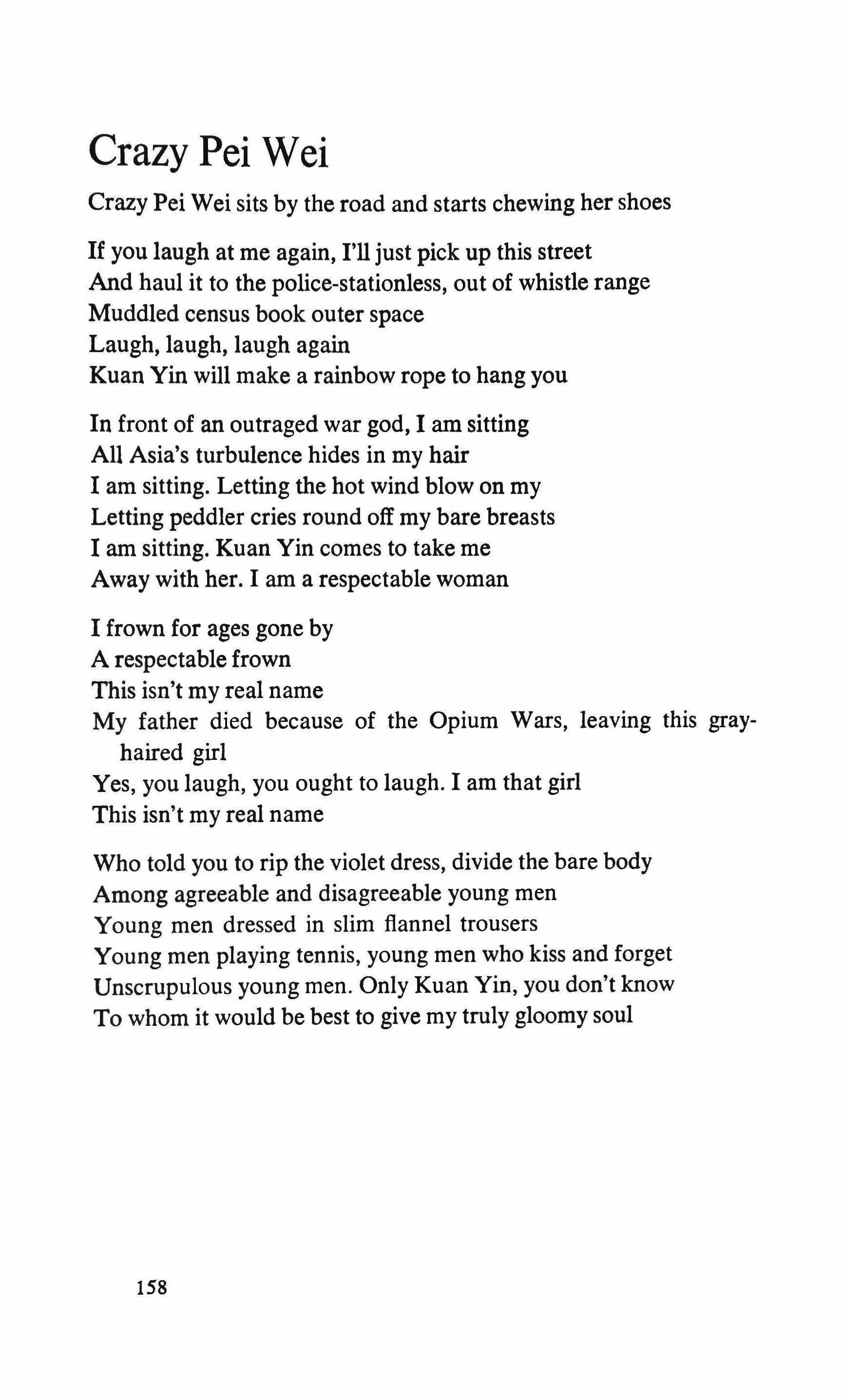
Crazy Pei Wei sits by the road and starts chewing her shoes
If you laugh at me again, I'll just pick up this street
And haul it to the police-stationless, out of whistle range
Muddled census book outer space
Laugh, laugh, laugh again
Kuan Yin will make a rainbow rope to hang you
In front of an outraged war god, I am sitting
All Asia's turbulence hides in my hair
I am sitting. Letting the hot wind blow on my
Letting peddler cries round off my bare breasts
I am sitting. Kuan Yin comes to take me
Away with her. I am a respectable woman
I frown for ages gone by
A respectable frown
This isn't my real name
My father died because of the Opium Wars, leaving this grayhaired girl
Yes, you laugh, you ought to laugh. I am that girl
This isn't my real name
Who told you to rip the violet dress, divide the bare body
Among agreeable and disagreeable young men
Young men dressed in slim flannel trousers
Young men playing tennis, young men who kiss and forget
Unscrupulous young men. Only Kuan Yin, you don't know
To whom it would be best to give my truly gloomy soul
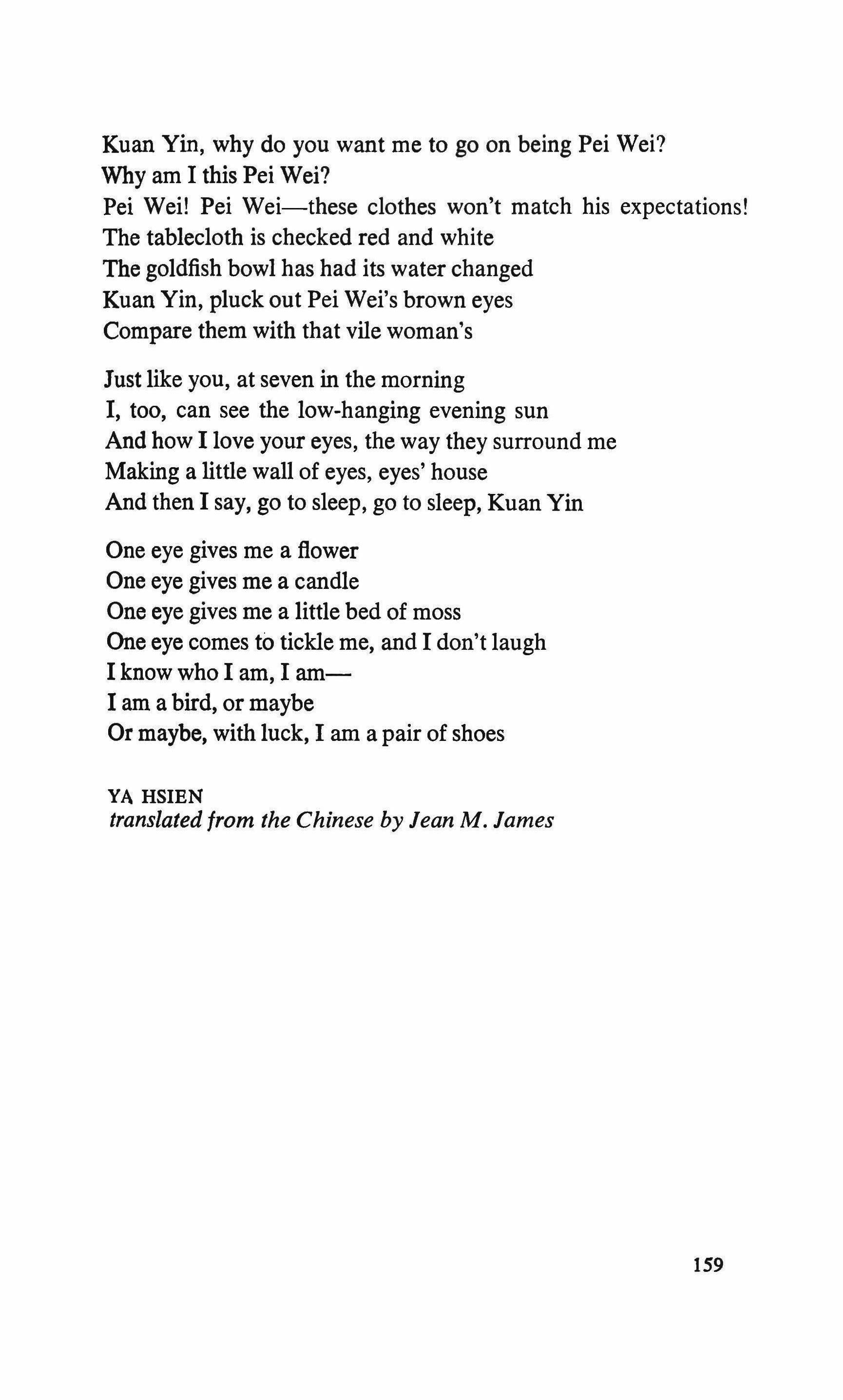
Kuan Yin, why do you want me to go on being Pei Wei?
Why am I this Pei Wei?
Pei Wei! Pei Wei-these clothes won't match his expectations!
The tablecloth is checked red and white
The goldfish bowl has had its water changed
Kuan Yin, pluck out Pei Wei's brown eyes
Compare them with that vile woman's
Just like you, at seven in the morning
I, too, can see the low-hanging evening sun
And how I love your eyes, the way they surround me
Making a little wall of eyes, eyes' house
And then I say, go to sleep, go to sleep, Kuan Yin
One eye gives me a flower
One eye gives me a candle
One eye gives me a little bed of moss
One eye comes to tickle me, and I don't laugh
I know who I am, I am-
I am a bird, or maybe
Or maybe, with luck, I am a pair of shoes
YA HSIENtranslated from the Chinese by Jean M. James
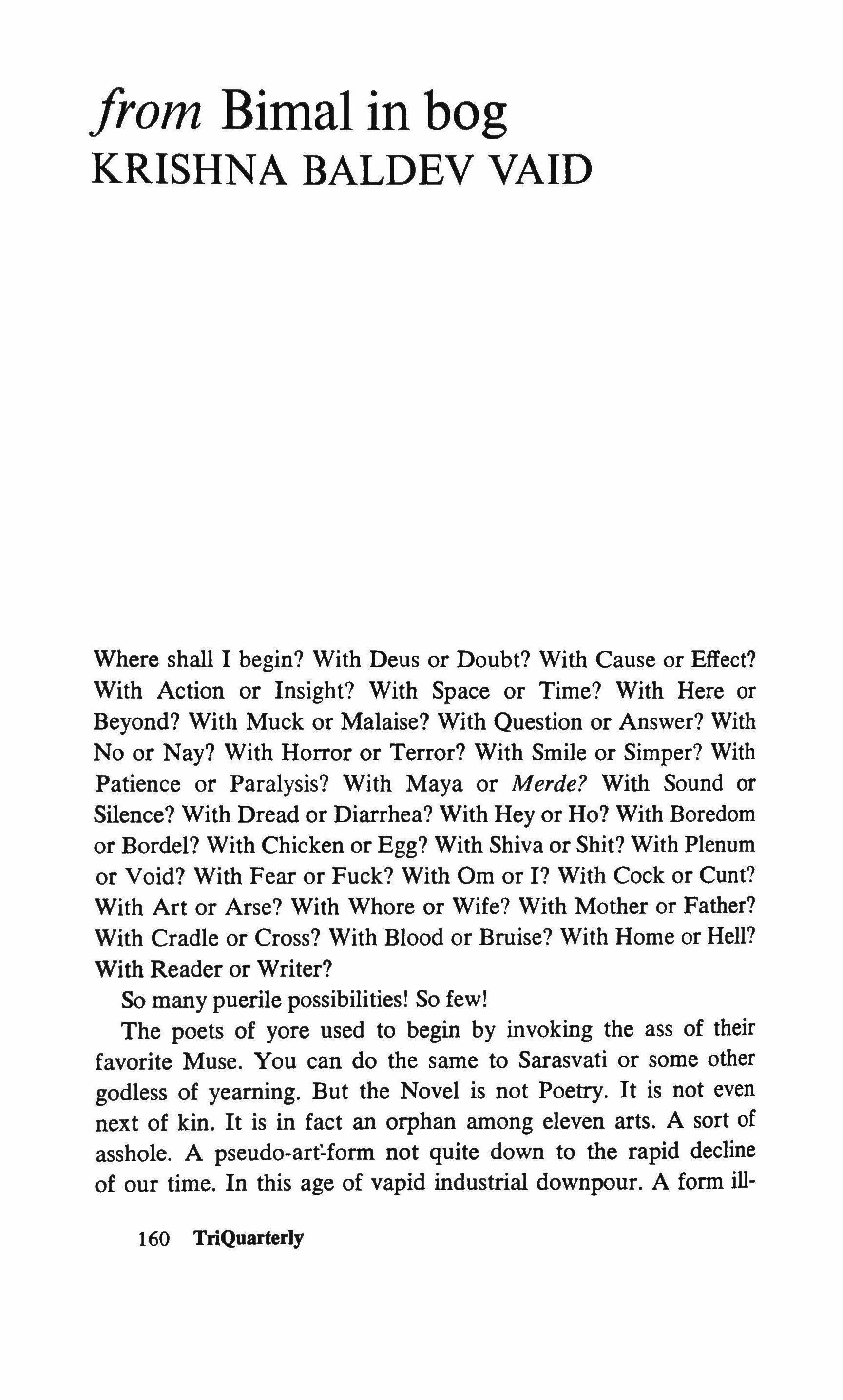
Where shall I begin? With Deus or Doubt? With Cause or Effect? With Action or Insight? With Space or Time? With Here or Beyond? With Muck or Malaise? With Question or Answer? With No or Nay? With Horror or Terror? With Smile or Simper? With Patience or Paralysis? With Maya or Merde? With Sound or Silence? With Dread or Diarrhea? With Hey or Ho? With Boredom or Bordel? With Chicken or Egg? With Shiva or Shit? With Plenum or Void? With Fear or Fuck? With Om or I? With Cock or Cunt? With Art or Arse? With Whore or Wife? With Mother or Father? With Cradle or Cross? With Blood or Bruise? With Home or Hell? With Reader or Writer?
So many puerile possibilities! So few! The poets of yore used to begin by invoking the ass of their favorite Muse. You can do the same to Sarasvati or some other godless of yearning. But the Novel is not Poetry. It is not even next of kin. It is in fact an orphan among eleven arts. A sort of asshole. A pseudo-art-form not quite down to the rapid decline of our time. In this age of vapid industrial downpour. A form ill-
160 TrlQuarterly
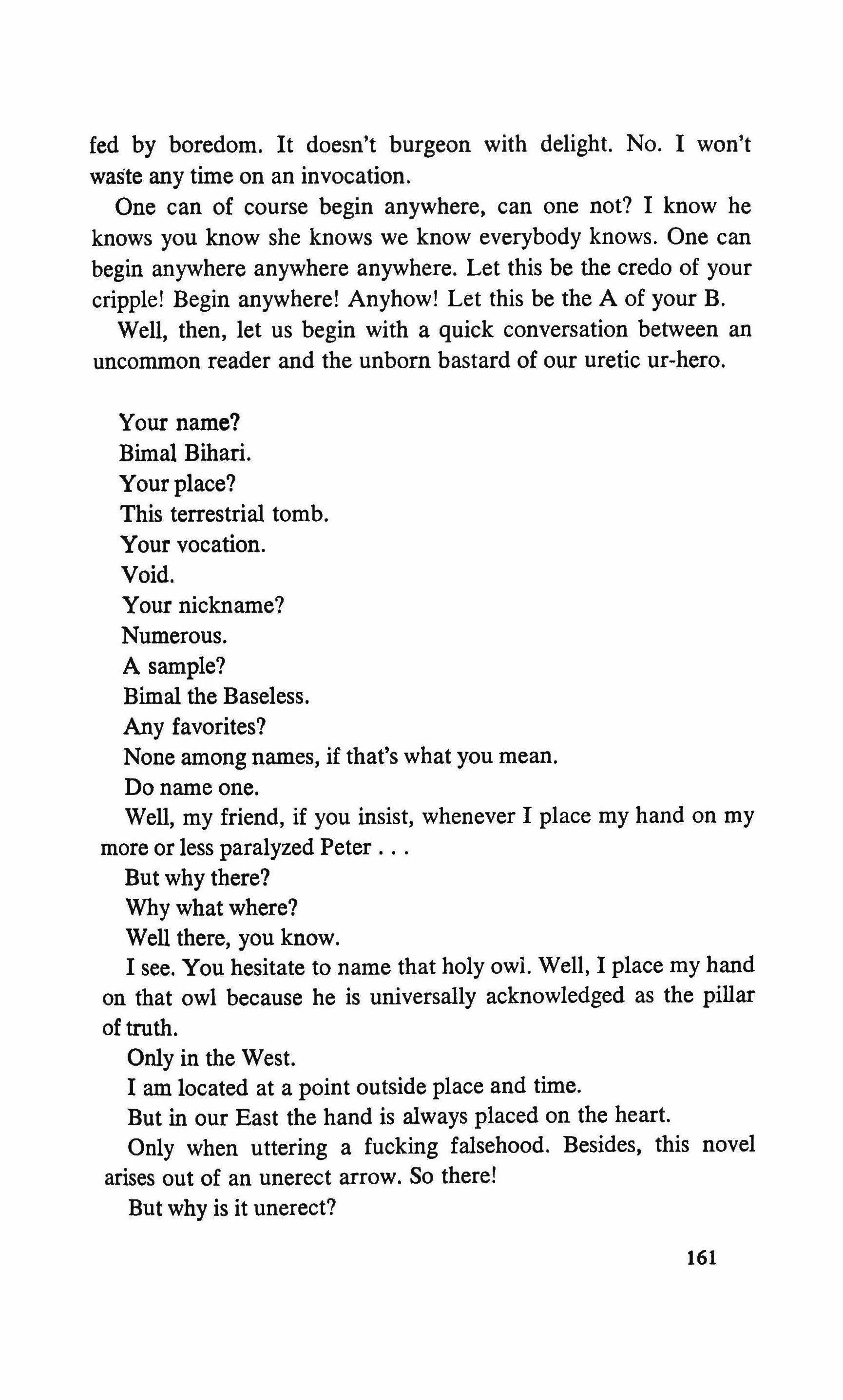
fed by boredom. It doesn't burgeon with delight. No. I won't waste any time on an invocation.
One can of course begin anywhere, can one not? I know he knows you know she knows we know everybody knows. One can begin anywhere anywhere anywhere. Let this be the credo of your cripple! Begin anywhere! Anyhow! Let this be the A of your B. Well, then, let us begin with a quick conversation between an uncommon reader and the unborn bastard of our uretic ur-hero.
Your name?
Bimal Bihari. Your place?
This terrestrial tomb. Your vocation. Void.
Your nickname? Numerous.
A sample?
Bimal the Baseless. Any favorites?
None among names, if that's what you mean. Do name one.
Well, my friend, if you insist, whenever I place my hand on my more or less paralyzed Peter
But why there?
Why what where?
Well there, you know.
I see. You hesitate to name that holy owl. Well, I place my hand on that owl because he is universally acknowledged as the pillar of truth.
Only in the West.
I am located at a point outside place and time. But in our East the hand is always placed on the heart. Only when uttering a fucking falsehood. Besides, this novel arises out of an unerect arrow. So there!
But why is it unerect?
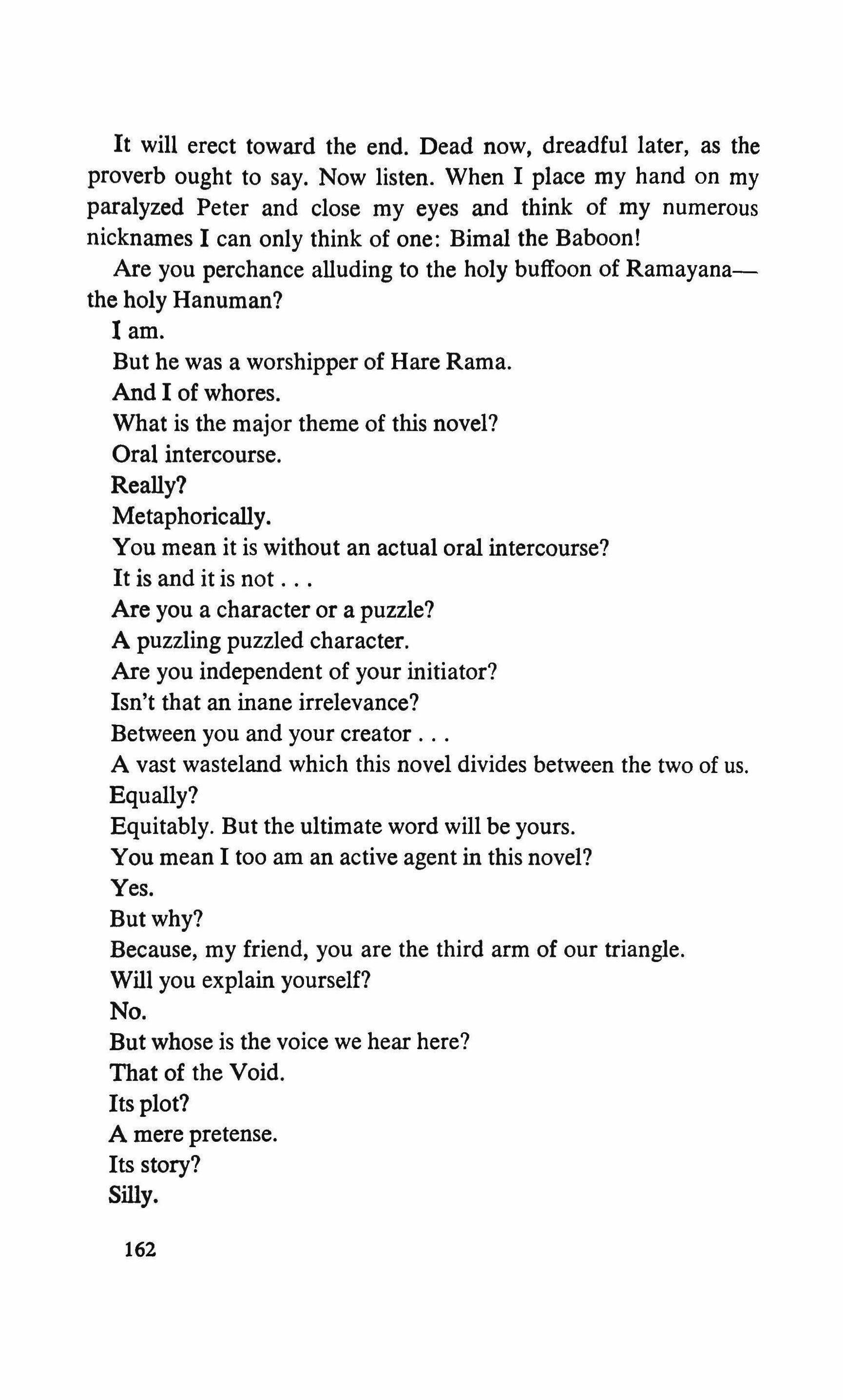
It will erect toward the end. Dead now, dreadful later, as the proverb ought to say. Now listen. When I place my hand on my paralyzed Peter and close my eyes and think of my numerous nicknames I can only think of one: Bimal the Baboon!
Are you perchance alluding to the holy buffoon of Ramayanathe holy Hanuman?
I am.
But he was a worshipper of Hare Rama. And I of whores.
What is the major theme of this novel?
Oral intercourse.
Really?
Metaphorically.
You mean it is without an actual oral intercourse? It is and it is not
Are you a character or a puzzle?
A puzzling puzzled character. Are you independent of your initiator? Isn't that an inane irrelevance?
Between you and your creator
A vast wasteland which this novel divides between the two of us.
Equally?
Equitably. But the ultimate word will be yours. You mean I too am an active agent in this novel? Yes.
But why?
Because, my friend, you are the third arm of our triangle.
Will you explain yourself? No.
But whose is the voice we hear here?
That of the Void. Its plot?
A mere pretense. Its story?
Silly.
162
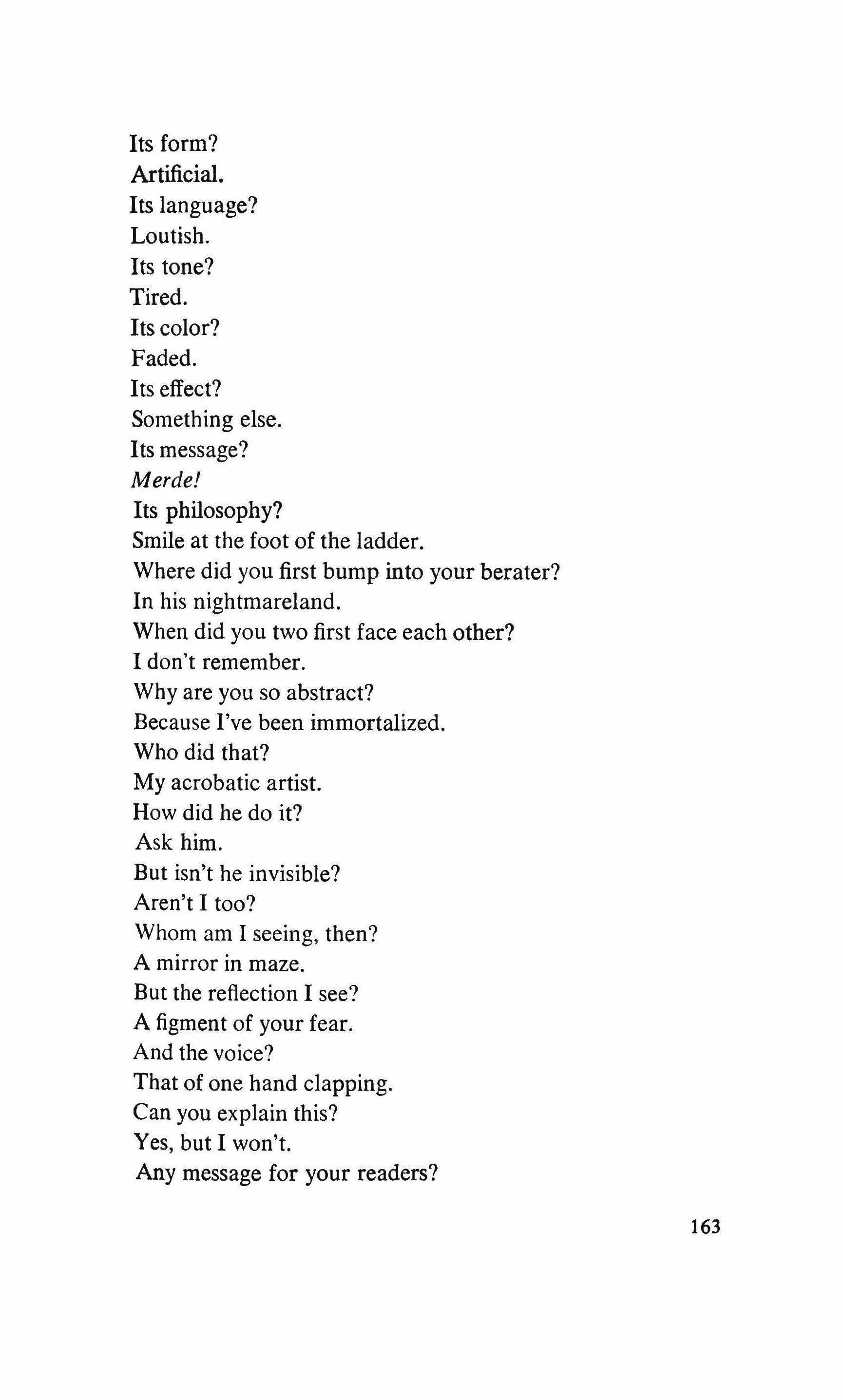
Its form?
Artificial. Its language? Loutish.
Its tone? Tired.
Its color? Faded.
Its effect?
Something else. Its message? Merde!
Its philosophy?
Smile at the foot of the ladder.
Where did you first bump into your berater? In his nightmareland. When did you two first face each other? I don't remember.
Why are you so abstract?
Because I've been immortalized. Who did that?
My acrobatic artist. How did he do it? Ask him.
But isn't he invisible? Aren't I too?
Whom am I seeing, then?
A mirror in maze.
But the reflection I see?
A figment of your fear. And the voice?
That of one hand clapping. Can you explain this?
Yes, but I won't.
Any message for your readers?
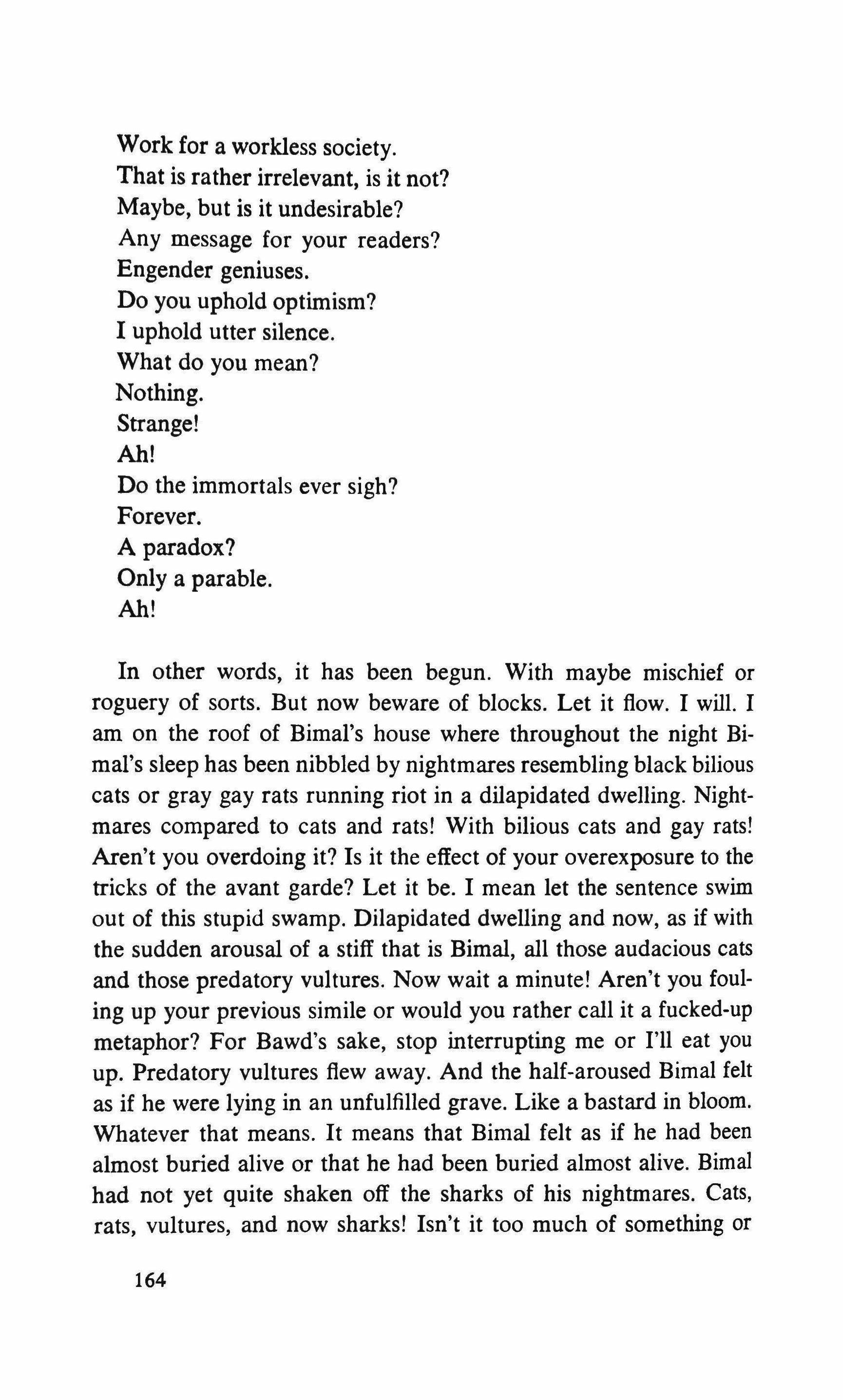
Work for a workless society.
That is rather irrelevant, is it not?
Maybe, but is it undesirable?
Any message for your readers?
Engender geniuses.
Do you uphold optimism?
I uphold utter silence.
What do you mean?
Nothing. Strange!
Ah!
Do the immortals ever sigh? Forever. A paradox?
Only a parable. Ah!
In other words, it has been begun. With maybe mischief or roguery of sorts. But now beware of blocks. Let it flow. I will. I am on the roof of Bimal's house where throughout the night Bimal's sleep has been nibbled by nightmares resembling black bilious cats or gray gay rats running riot in a dilapidated dwelling. Nightmares compared to cats and rats! With bilious cats and gay rats! Aren't you overdoing it? Is it the effect of your overexposure to the tricks of the avant garde? Let it be. I mean let the sentence swim out of this stupid swamp. Dilapidated dwelling and now, as if with the sudden arousal of a stiff that is Bimal, all those audacious cats and those predatory vultures. Now wait a minute! Aren't you fouling up your previous simile or would you rather call it a fucked-up metaphor? For Bawd's sake, stop interrupting me or I'll eat you up. Predatory vultures flew away. And the half-aroused Bimal felt as if he were lying in an unfulfilled grave. Like a bastard in bloom. Whatever that means. It means that Bimal felt as if he had been almost buried alive or that he had been buried almost alive. Bimal had not yet quite shaken off the sharks of his nightmares. Cats, rats, vultures, and now sharks! Isn't it too much of something or
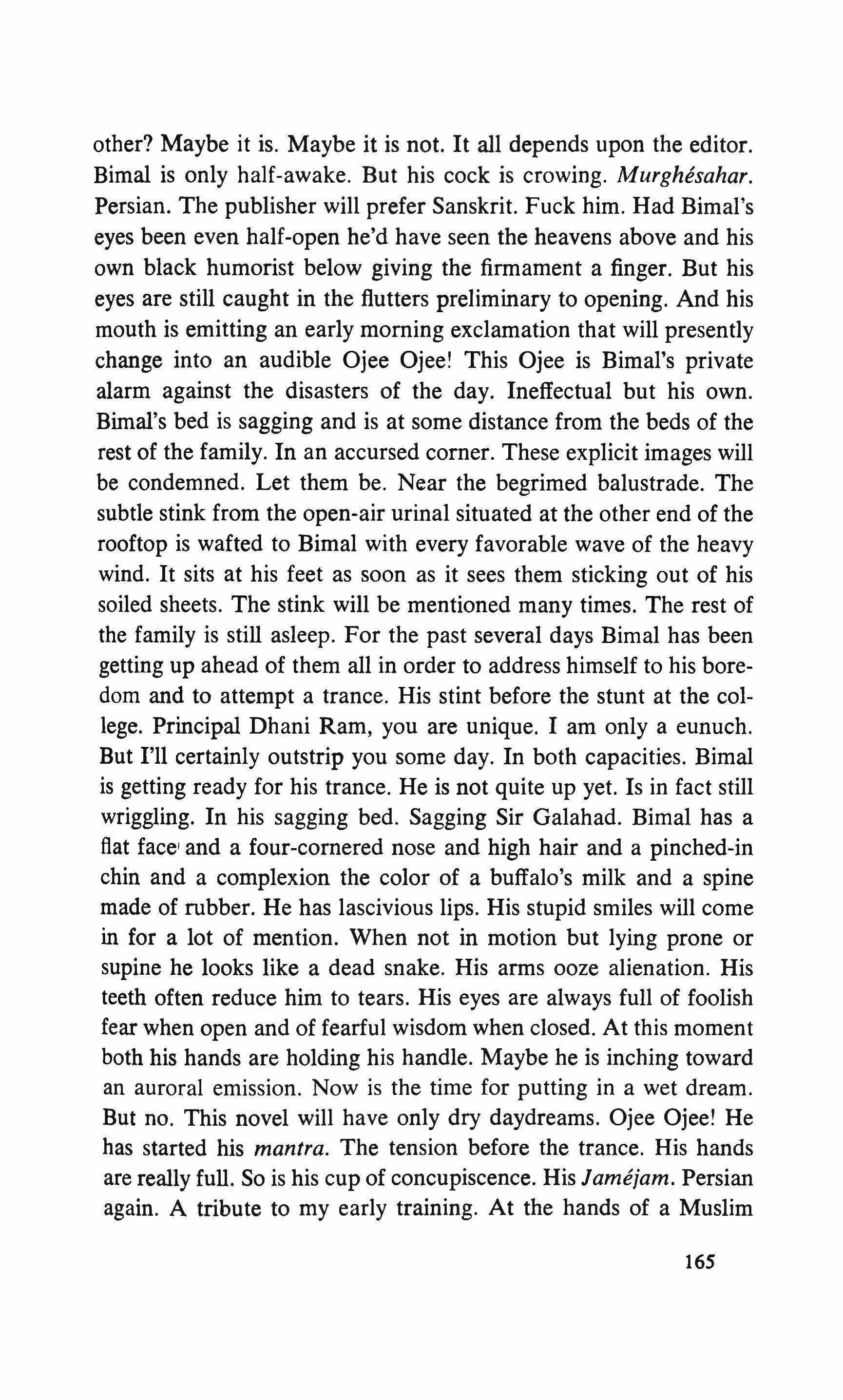
other? Maybe it is. Maybe it is not. It all depends upon the editor. Bimal is only half-awake. But his cock is crowing. Murghesahar. Persian. The publisher will prefer Sanskrit. Fuck him. Had Bimal's eyes been even half-open he'd have seen the heavens above and his own black humorist below giving the firmament a finger. But his eyes are still caught in the flutters preliminary to opening. And his mouth is emitting an early morning exclamation that will presently change into an audible Ojee Ojee! This Ojee is Bimal's private alarm against the disasters of the day. Ineffectual but his own. Bimal's bed is sagging and is at some distance from the beds of the rest of the family. In an accursed comer. These explicit images will be condemned. Let them be. Near the begrimed balustrade. The subtle stink from the open-air urinal situated at the other end of the rooftop is wafted to Bimal with every favorable wave of the heavy wind. It sits at his feet as soon as it sees them sticking out of his soiled sheets. The stink will be mentioned many times. The rest of the family is still asleep. For the past several days Bimal has been getting up ahead of them all in order to address himself to his boredom and to attempt a trance. His stint before the stunt at the college. Principal Dhani Ram, you are unique. I am only a eunuch. But I'll certainly outstrip you some day. In both capacities. Bimal is getting ready for his trance. He is not quite up yet. Is in fact still wriggling. In his sagging bed. Sagging Sir Galahad. Bimal has a flat faceI and a four-cornered nose and high hair and a pinched-in chin and a complexion the color of a buffalo's milk and a spine made of rubber. He has lascivious lips. His stupid smiles will come in for a lot of mention. When not in motion but lying prone or supine he looks like a dead snake. His arms ooze alienation. His teeth often reduce him to tears. His eyes are always full of foolish fear when open and of fearful wisdom when closed. At this moment both his hands are holding his handle. Maybe he is inching toward an auroral emission. Now is the time for putting in a wet dream. But no. This novel will have only dry daydreams. Ojee Ojee! He has started his mantra. The tension before the trance. His hands are really full. So is his cup of concupiscence. His Jameiam. Persian again. A tribute to my early training. At the hands of a Muslim
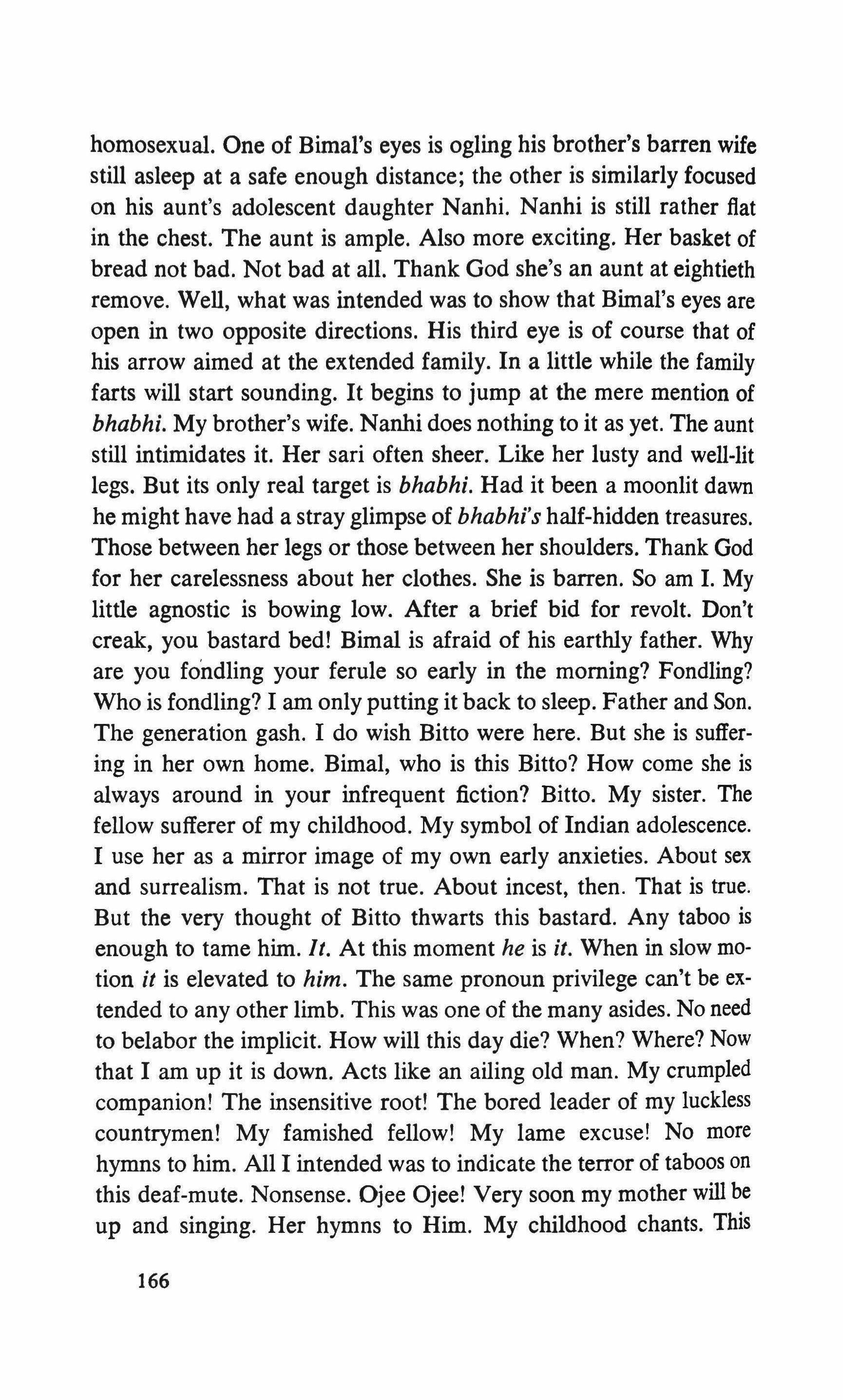
homosexual. One of Bimal's eyes is ogling his brother's barren wife still asleep at a safe enough distance; the other is similarly focused on his aunt's adolescent daughter Nanhi. Nanhi is still rather flat in the chest. The aunt is ample. Also more exciting. Her basket of bread not bad. Not bad at all. Thank God she's an aunt at eightieth remove. Well, what was intended was to show that Bimal's eyes are open in two opposite directions. His third eye is of course that of his arrow aimed at the extended family. In a little while the family farts will start sounding. It begins to jump at the mere mention of bhabhi. My brother's wife. Nanhi does nothing to it as yet. The aunt still intimidates it. Her sari often sheer. Like her lusty and well-lit legs. But its only real target is bhabhi. Had it been a moonlit dawn he might have had a stray glimpse of bhabhi's half-hidden treasures. Those between her legs or those between her shoulders. Thank God for her carelessness about her clothes. She is barren. So am I. My little agnostic is bowing low. After a brief bid for revolt. Don't creak, you bastard bed! Bimal is afraid of his earthly father. Why are you fondling your ferule so early in the morning? Fondling? Who is fondling? I am onlyputting it back to sleep. Father and Son. The generation gash. I do wish Bitto were here. But she is suffering in her own home. Bimal, who is this Bitto? How come she is always around in your infrequent fiction? Bitto. My sister. The fellow sufferer of my childhood. My symbol of Indian adolescence. I use her as a mirror image of my own early anxieties. About sex and surrealism. That is not true. About incest, then. That is true. But the very thought of Bitto thwarts this bastard. Any taboo is enough to tame him. It. At this moment he is it. When in slow motion it is elevated to him. The same pronoun privilege can't be extended to any other limb. This was one of the many asides. No need to belabor the implicit. How will this day die? When? Where? Now that I am up it is down. Acts like an ailing old man. My crumpled companion! The insensitive root! The bored leader of my luckless countrymen! My famished fellow! My lame excuse! No more hymns to him. All I intended was to indicate the terror of taboos on this deaf-mute. Nonsense. Ojee Ojee! Very soon my mother will be up and singing. Her hymns to Him. My childhood chants. This
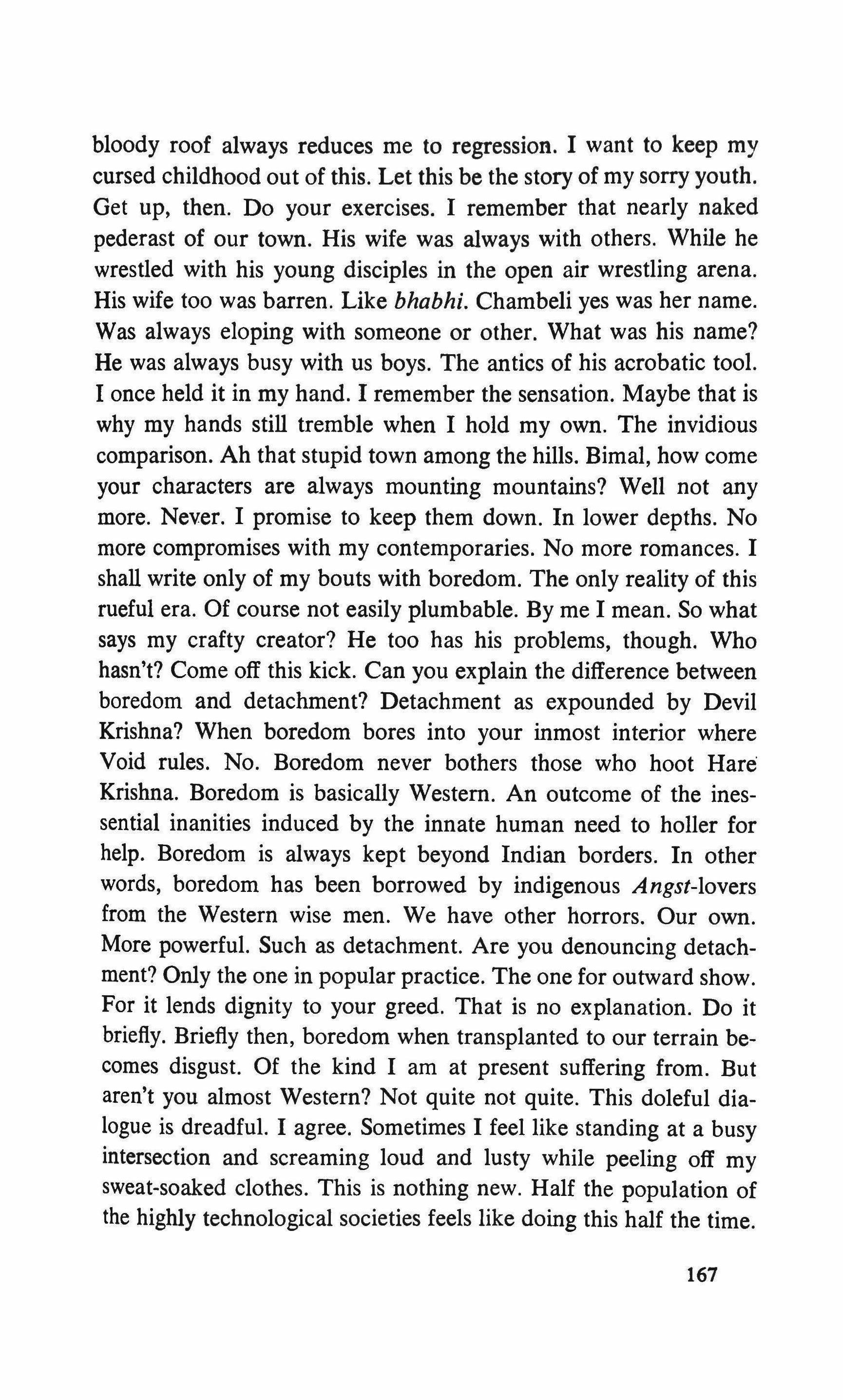
bloody roof always reduces me to regression. I want to keep my cursed childhood out of this. Let this be the story of my sorry youth. Get up, then. Do your exercises. I remember that nearly naked pederast of our town. His wife was always with others. While he wrestled with his young disciples in the open air wrestling arena. His wife too was barren. Like bhabhi. Chambeli yes was her name. Was always eloping with someone or other. What was his name? He was always busy with us boys. The antics of his acrobatic tool. I once held it in my hand. I remember the sensation. Maybe that is why my hands still tremble when I hold my own. The invidious comparison. Ah that stupid town among the hills. Bimal, how come your characters are always mounting mountains? Well not any more. Never. I promise to keep them down. In lower depths. No more compromises with my contemporaries. No more romances. I shall write only of my bouts with boredom. The only reality of this rueful era. Of course not easily plumbable. By me I mean. So what says my crafty creator? He too has his problems, though. Who hasn't? Come off this kick. Can you explain the difference between boredom and detachment? Detachment as expounded by Devil Krishna? When boredom bores into your inmost interior where Void rules. No. Boredom never bothers those who hoot Hare' Krishna. Boredom is basically Western. An outcome of the inessential inanities induced by the innate human need to holler for help. Boredom is always kept beyond Indian borders. In other words, boredom has been borrowed by indigenous Angst-lovers from the Western wise men. We have other horrors. Our own. More powerful. Such as detachment. Are you denouncing detachment? Only the one in popular practice. The one for outward show. For it lends dignity to your greed. That is no explanation. Do it briefly. Briefly then, boredom when transplanted to our terrain becomes disgust. Of the kind I am at present suffering from. But aren't you almost Western? Not quite not quite. This doleful dialogue is dreadful. I agree. Sometimes I feel like standing at a busy intersection and screaming loud and lusty while peeling off my sweat-soaked clothes. This is nothing new. Half the population of the highly technological societies feels like doing this half the time.
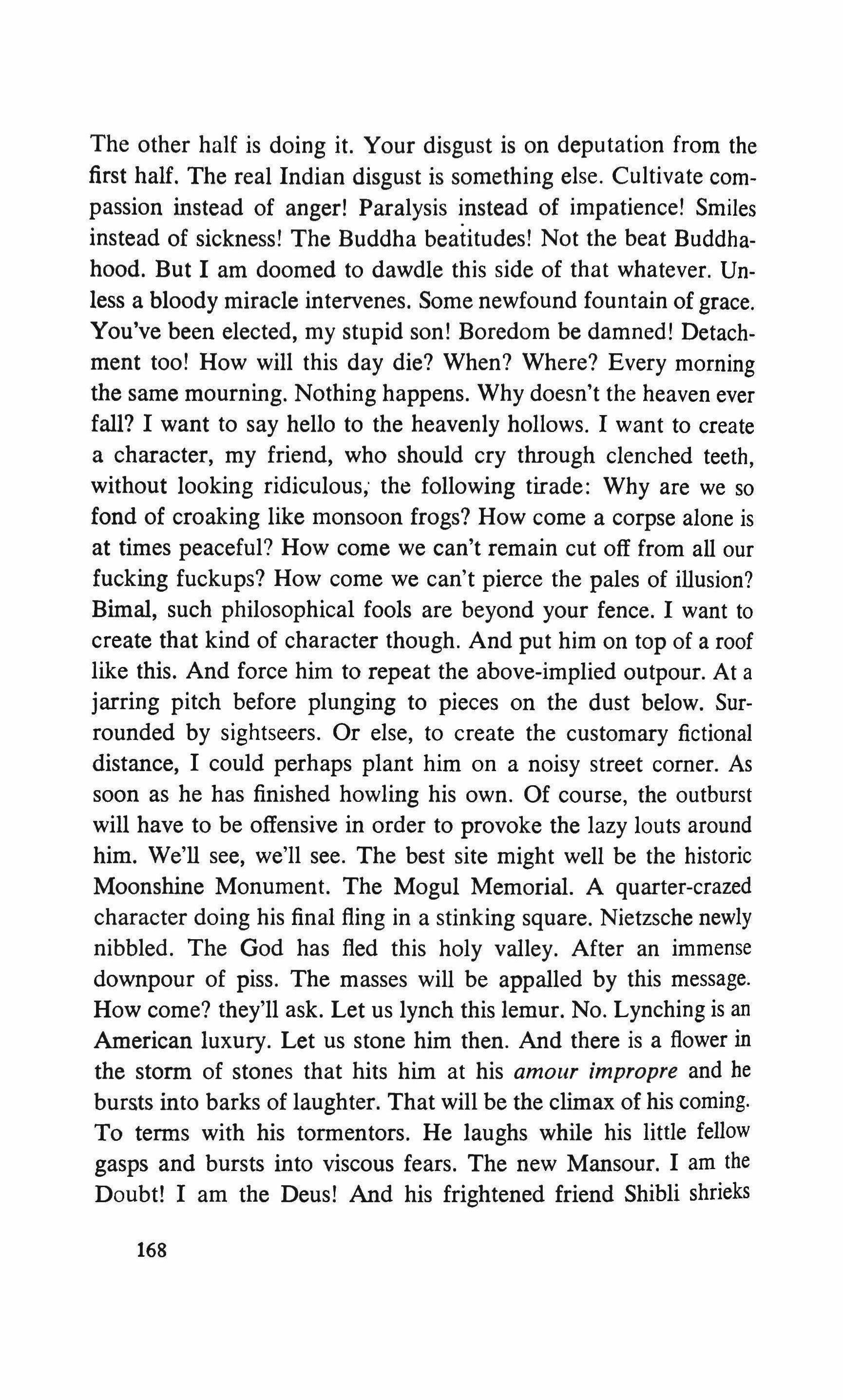
The other half is doing it. Your disgust is on deputation from the first half. The real Indian disgust is something else. Cultivate compassion instead of anger! Paralysis instead of impatience! Smiles instead of sickness! The Buddha beatitudes! Not the beat Buddhahood. But I am doomed to dawdle this side of that whatever. Unless a bloody miracle intervenes. Some newfound fountain of grace. You've been elected, my stupid son! Boredom be damned! Detachment too! How will this day die? When? Where? Every morning the same mourning. Nothing happens. Why doesn't the heaven ever fall? I want to say hello to the heavenly hollows. I want to create a character, my friend, who should cry through clenched teeth, without looking ridiculous; the following tirade: Why are we so fond of croaking like monsoon frogs? How come a corpse alone is at times peaceful? How come we can't remain cut off from all our fucking fuckups? How come we can't pierce the pales of illusion? Bimal, such philosophical fools are beyond your fence. I want to create that kind of character though. And put him on top of a roof like this. And force him to repeat the above-implied outpour. At a jarring pitch before plunging to pieces on the dust below. Surrounded by sightseers. Or else, to create the customary fictional distance, I could perhaps plant him on a noisy street corner. As soon as he has finished howling his own. Of course, the outburst will have to be offensive in order to provoke the lazy louts around him. We'll see, we'll see. The best site might well be the historic Moonshine Monument. The Mogul Memorial. A quarter-crazed character doing his final fling in a stinking square. Nietzsche newly nibbled. The God has fled this holy Valley. After an immense downpour of piss. The masses will be appalled by this message. How come? they'll ask. Let us lynch this lemur. No. Lynching is an American luxury. Let us stone him then. And there is a flower in the storm of stones that hits him at his amour impropre and he bursts into barks of laughter. That will be the climax of his coming. To terms with his tormentors. He laughs while his little fellow gasps and bursts into viscous fears. The new Mansour. I am the Doubt! I am the Deus! And his frightened friend Shibli shrieks
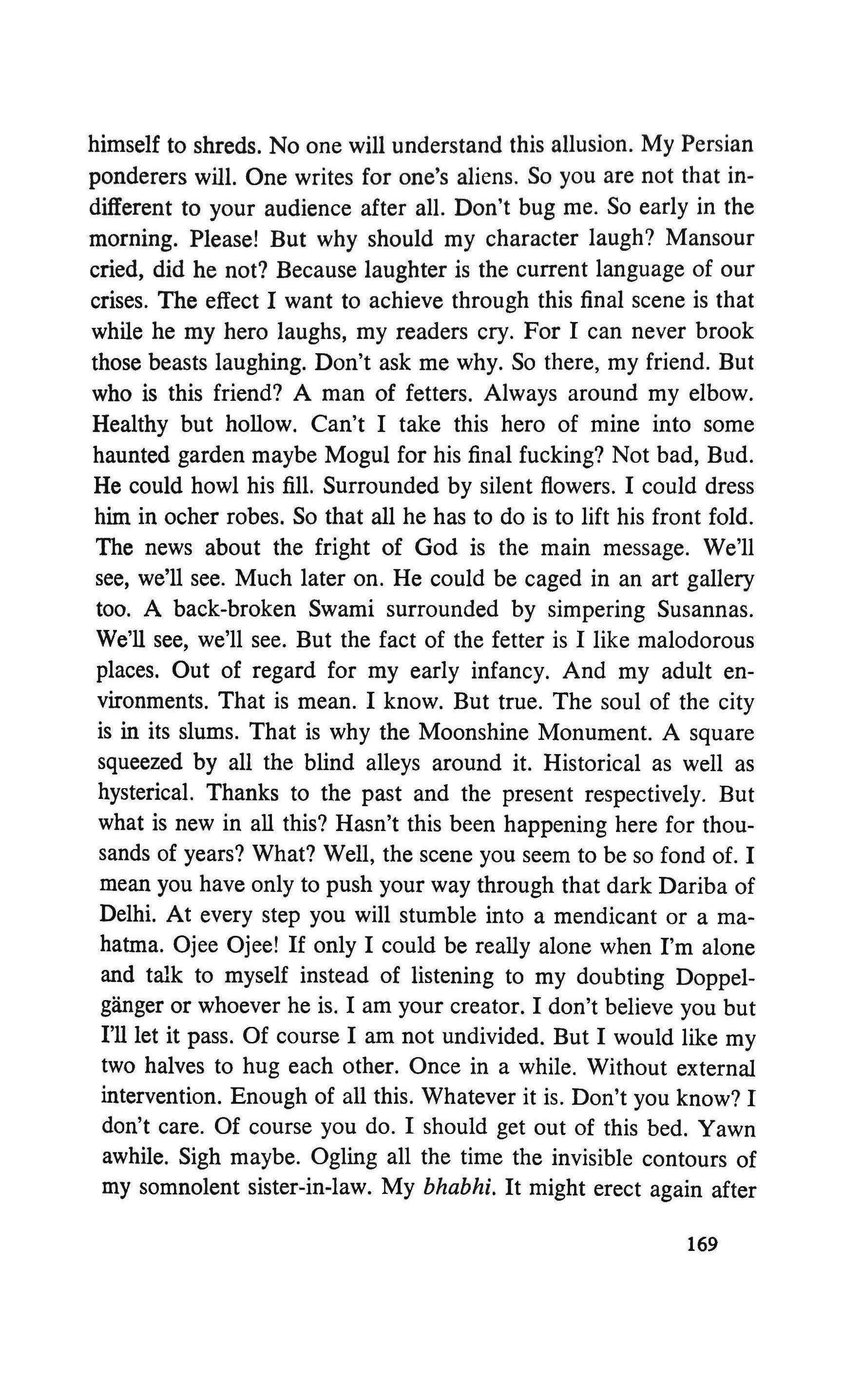
himself to shreds. No one will understand this allusion. My Persian ponderers will. One writes for one's aliens. So you are not that indifferent to your audience after all. Don't bug me. So early in the morning. Please! But why should my character laugh? Mansour cried, did he not? Because laughter is the current language of our crises. The effect I want to achieve through this final scene is that while he my hero laughs, my readers cry. For I can never brook those beasts laughing. Don't ask me why. So there, my friend. But who is this friend? A man of fetters. Always around my elbow. Healthy but hollow. Can't I take this hero of mine into some haunted garden maybe Mogul for his final fucking? Not bad, Bud. He could howl his fill. Surrounded by silent flowers. I could dress him in ocher robes. So that all he has to do is to lift his front fold. The news about the fright of God is the main message. We'll see, we'll see. Much later on. He could be caged in an art gallery too. A back-broken Swami surrounded by simpering Susannas. We'll see, we'll see. But the fact of the fetter is I like malodorous places. Out of regard for my early infancy. And my adult environments. That is mean. I know. But true. The soul of the city is in its slums. That is why the Moonshine Monument. A square squeezed by all the blind alleys around it. Historical as well as hysterical. Thanks to the past and the present respectively. But what is new in all this? Hasn't this been happening here for thousands of years? What? Well, the scene you seem to be so fond of. I mean you have only to push your way through that dark Dariba of Delhi. At every step you will stumble into a mendicant or a mahatma. Ojee Ojee! If only I could be really alone when I'm alone and talk to myself instead of listening to my doubting Doppelganger or whoever he is. I am your creator. I don't believe you but I'll let it pass. Of course I am not undivided. But I would like my two halves to hug each other. Once in a while. Without external intervention. Enough of all this. Whatever it is. Don't you know? I don't care. Of course you do. I should get out of this bed. Yawn awhile. Sigh maybe. Ogling all the time the invisible contours of my somnolent sister-in-law. My bhabhi. It might erect again after
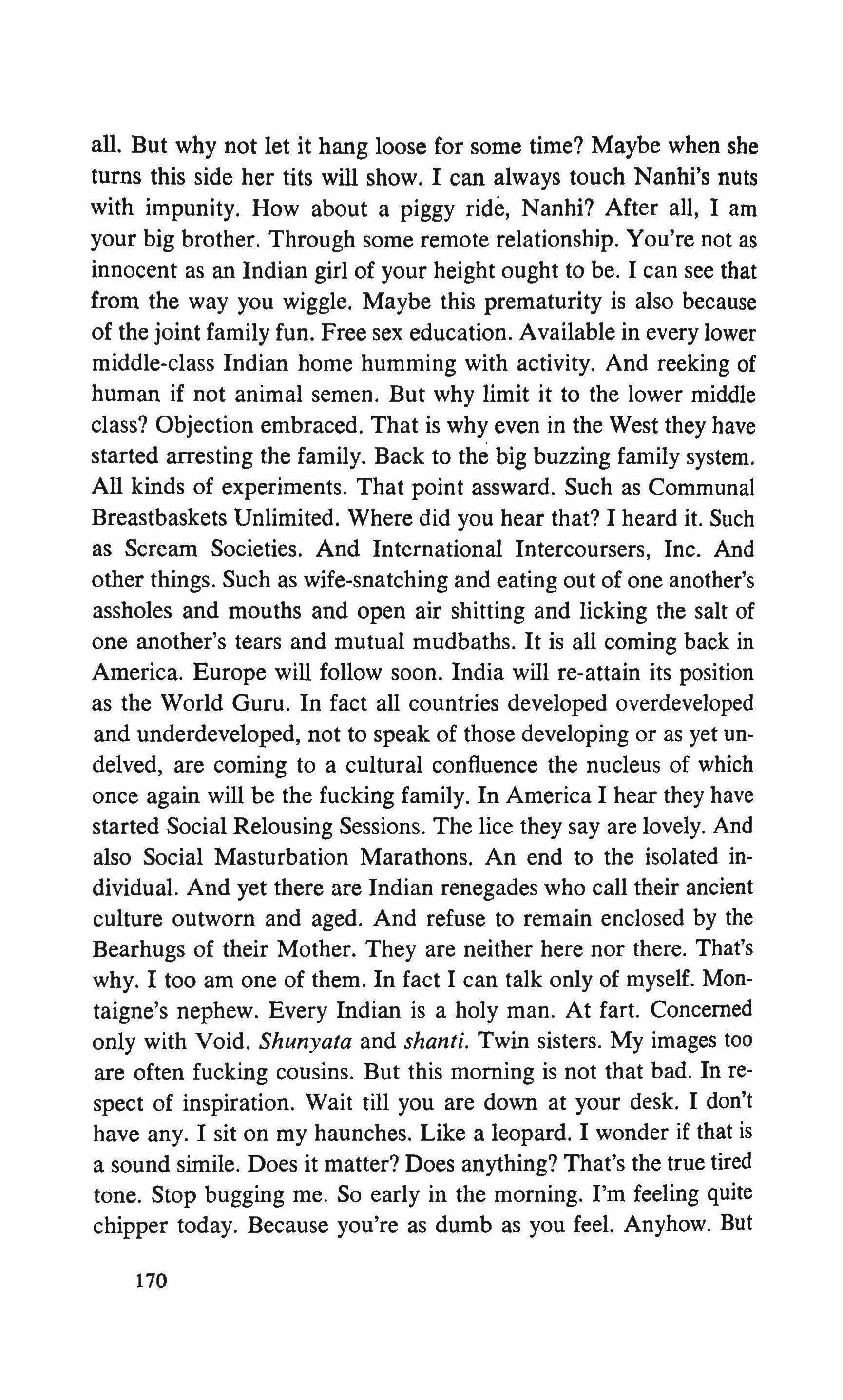
all. But why not let it hang loose for some time? Maybe when she turns this side her tits will show. I can always touch Nanhi's nuts with impunity. How about a piggy ride, Nanhi? After all, I am your big brother. Through some remote relationship. You're not as innocent as an Indian girl of your height ought to be. I can see that from the way you wiggle. Maybe this prematurity is also because of the joint family fun. Free sex education. Available in every lower middle-class Indian home humming with activity. And reeking of human if not animal semen. But why limit it to the lower middle class? Objection embraced. That is why even in the West they have started arresting the family. Back to the big buzzing family system. All kinds of experiments. That point assward. Such as Communal Breastbaskets Unlimited. Where did you hear that? I heard it. Such as Scream Societies. And International Intercoursers, Inc. And other things. Such as wife-snatching and eating out of one another's assholes and mouths and open air shitting and licking the salt of one another's tears and mutual mudbaths. It is all coming back in America. Europe will follow soon. India will re-attain its position as the World Guru. In fact all countries developed overdeveloped and underdeveloped, not to speak of those developing or as yet undelved, are coming to a cultural confluence the nucleus of which once again will be the fucking family. In America I hear they have started Social Relousing Sessions. The lice they say are lovely. And also Social Masturbation Marathons. An end to the isolated individual. And yet there are Indian renegades who call their ancient culture outworn and aged. And refuse to remain enclosed by the Bearhugs of their Mother. They are neither here nor there. That's why. I too am one of them. In fact I can talk only of myself. Montaigne's nephew. Every Indian is a holy man. At fart. Concerned only with Void. Shunyata and shanti. Twin sisters. My images too are often fucking cousins. But this morning is not that bad. In respect of inspiration. Wait till you are down at your desk. I don't have any. I sit on my haunches. Like a leopard. I wonder if that is a sound simile. Does it matter? Does anything? That's the true tired tone. Stop bugging me. So early in the morning. I'm feeling quite chipper today. Because you're as dumb as you feel. Anyhow. But
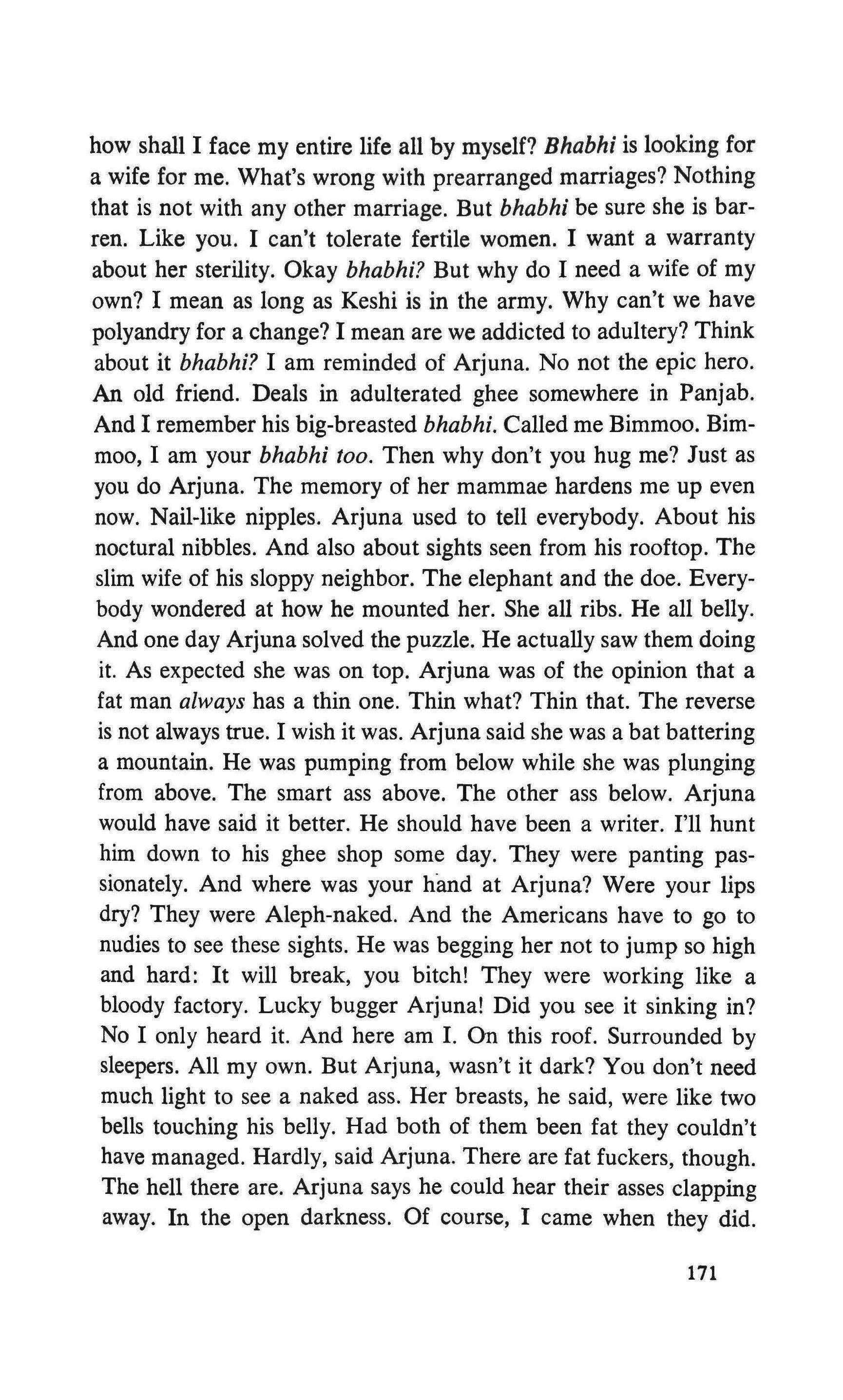
how shall I face my entire life all by myself? Bhabhi is looking for a wife for me. What's wrong with prearranged marriages? Nothing that is not with any other marriage. But bhabhi be sure she is barren. Like you. I can't tolerate fertile women. I want a warranty about her sterility. Okay bhabhi? But why do I need a wife of my own? I mean as long as Keshi is in the army. Why can't we have polyandry for a change? I mean are we addicted to adultery? Think about it bhabhi? I am reminded of Arjuna. No not the epic hero. An old friend. Deals in adulterated ghee somewhere in Panjab. And I remember his big-breasted bhabhi. Called me Bimmoo. Bimmoo, I am your bhabhi too. Then why don't you hug me? Just as you do Arjuna. The memory of her mammae hardens me up even now. Nail-like nipples. Arjuna used to tell everybody. About his noctural nibbles. And also about sights seen from his rooftop. The slim wife of his sloppy neighbor. The elephant and the doe. Everybody wondered at how he mounted her. She all ribs. He all belly. And one day Arjuna solved the puzzle. He actually saw them doing it. As expected she was on top. Arjuna was of the opinion that a fat man always has a thin one. Thin what? Thin that. The reverse is not always true. I wish it was. Arjuna said she was a bat battering a mountain. He was pumping from below while she was plunging from above. The smart ass above. The other ass below. Arjuna would have said it better. He should have been a writer. I'll hunt him down to his ghee shop some day. They were panting passionately. And where was your hand at Arjuna? Were your lips dry? They were Aleph-naked. And the Americans have to go to nudies to see these sights. He was begging her not to jump so high and hard: It will break, you bitch! They were working like a bloody factory. Lucky bugger Arjuna! Did you see it sinking in? No I only heard it. And here am I. On this roof. Surrounded by sleepers. All my own. But Arjuna, wasn't it dark? You don't need much light to see a naked ass. Her breasts, he said, were like two bells touching his belly. Had both of them been fat they couldn't have managed. Hardly, said Arjuna. There are fat fuckers, though. The hell there are. Arjuna says he could hear their asses clapping away. In the open darkness. Of course, I came when they did.
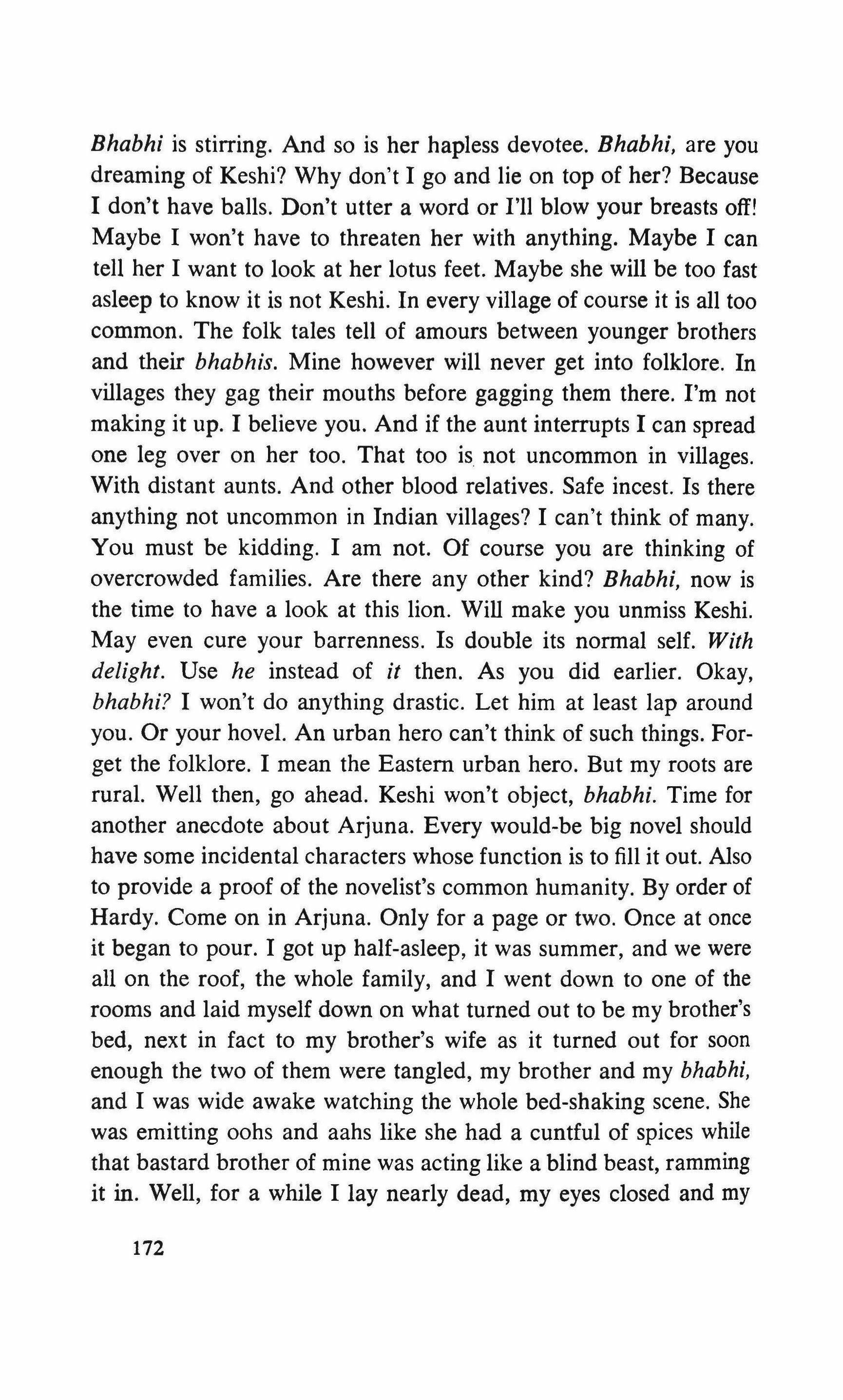
Bhabhi is stirring. And so is her hapless devotee. Bhabhi, are you dreaming of Keshi? Why don't I go and lie on top of her? Because I don't have balls. Don't utter a word or I'll blow your breasts off! Maybe I won't have to threaten her with anything. Maybe I can tell her I want to look at her lotus feet. Maybe she will be too fast asleep to know it is not Keshi. In every village of course it is all too common. The folk tales tell of amours between younger brothers and their bhabhis. Mine however will never get into folklore. In villages they gag their mouths before gagging them there. I'm not making it up. I believe you. And if the aunt interrupts I can spread one leg over on her too. That too is not uncommon in Villages. With distant aunts. And other blood relatives. Safe incest. Is there anything not uncommon in Indian villages? I can't think of many. You must be kidding. I am not. Of course you are thinking of overcrowded families. Are there any other kind? Bhabhi, now is the time to have a look at this lion. Will make you unmiss Keshi. May even cure your barrenness. Is double its normal self. With delight. Use he instead of it then. As you did earlier. Okay, bhabhi? I won't do anything drastic. Let him at least lap around you. Or your hovel. An urban hero can't think of such things. Forget the folklore. I mean the Eastern urban hero. But my roots are rural. Well then, go ahead. Keshi won't object, bhabhi. Time for another anecdote about Arjuna. Every would-be big novel should have some incidental characters whose function is to fill it out. Also to provide a proof of the novelist's common humanity. By order of Hardy. Come on in Arjuna. Only for a page or two. Once at once it began to pour. I got up half-asleep, it was summer, and we were all on the roof, the whole family, and I went down to one of the rooms and laid myself down on what turned out to be my brother's bed, next in fact to my brother's wife as it turned out for soon enough the two of them were tangled, my brother and my bhabhi, and I was wide awake watching the whole bed-shaking scene. She was emitting oohs and aahs like she had a cuntful of spices while that bastard brother of mine was acting like a blind beast, ramming it in. Well, for a while I lay nearly dead, my eyes closed and my 172
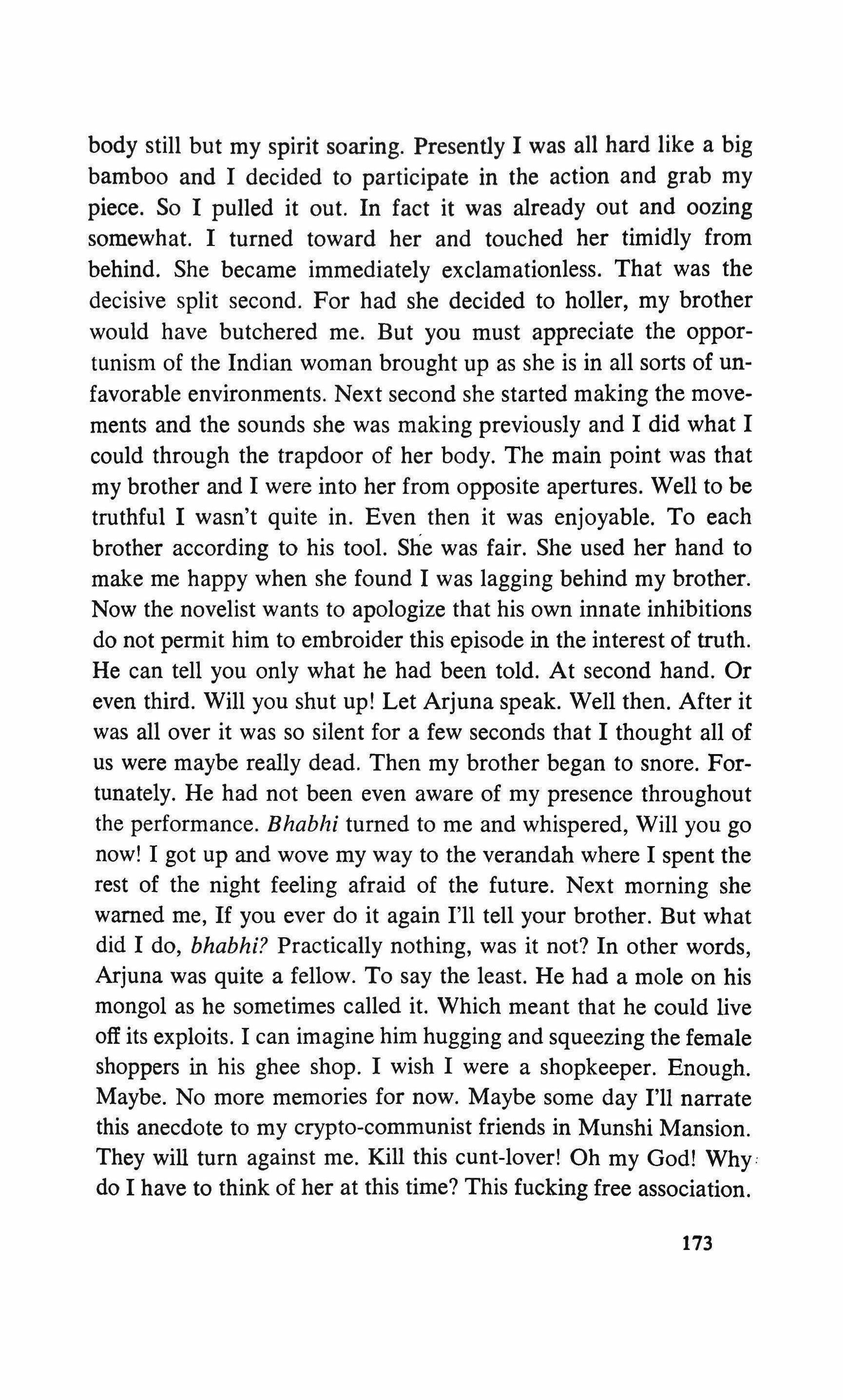
body still but my spirit soaring. Presently I was all hard like a big bamboo and I decided to participate in the action and grab my piece. So I pulled it out. In fact it was already out and oozing somewhat. I turned toward her and touched her timidly from behind. She became immediately exclamationless. That was the decisive split second. For had she decided to holler, my brother would have butchered me. But you must appreciate the opportunism of the Indian woman brought up as she is in all sorts of unfavorable environments. Next second she started making the movements and the sounds she was making previously and I did what I could through the trapdoor of her body. The main point was that my brother and I were into her from opposite apertures. Well to be truthful I wasn't quite in. Even then it was enjoyable. To each brother according to his tool. She was fair. She used her hand to make me happy when she found I was lagging behind my brother. Now the novelist wants to apologize that his own innate inhibitions do not permit him to embroider this episode in the interest of truth. He can tell you only what he had been told. At second hand. Or even third. Will you shut up! Let Arjuna speak. Well then. After it was all over it was so silent for a few seconds that I thought all of us were maybe really dead. Then my brother began to snore. Fortunately. He had not been even aware of my presence throughout the performance. Bhabhi turned to me and whispered, Will you go now! I got up and wove my way to the verandah where I spent the rest of the night feeling afraid of the future. Next morning she warned me, If you ever do it again I'll tell your brother. But what did I do, bhabhi? Practically nothing, was it not? In other words, Arjuna was quite a fellow. To say the least. He had a mole on his mongol as he sometimes called it. Which meant that he could live off its exploits. I can imagine him hugging and squeezing the female shoppers in his ghee shop. I wish I were a shopkeeper. Enough. Maybe. No more memories for now. Maybe some day I'll narrate this anecdote to my crypto-communist friends in Munshi Mansion. They will turn against me. Kill this cunt-Iover! Oh my God! Why. do I have to think of her at this time? This fucking free association.
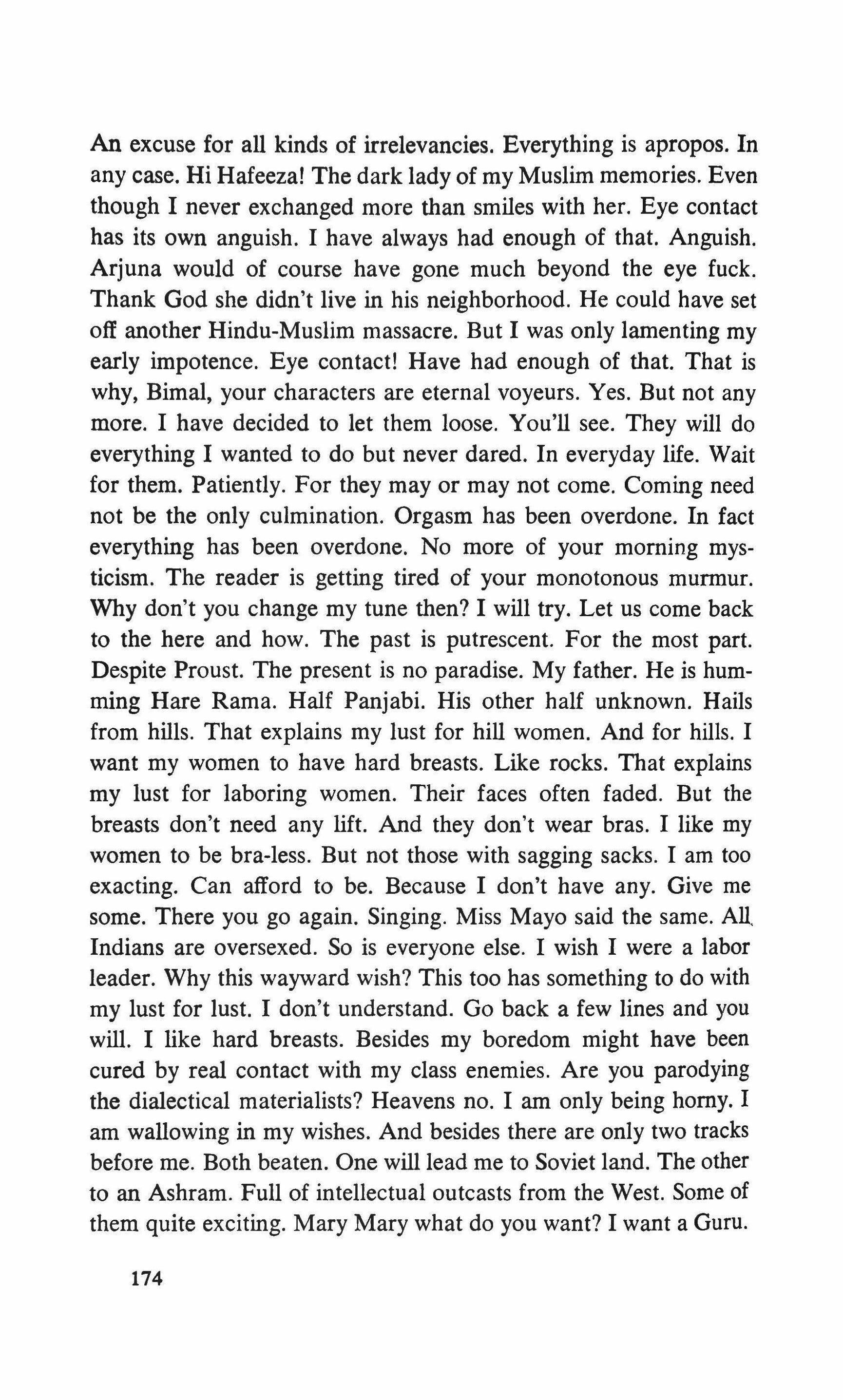
An excuse for all kinds of irrelevancies. Everything is apropos. In any case. Hi Hafeeza! The dark lady of my Muslim memories. Even though I never exchanged more than smiles with her. Eye contact has its own anguish. I have always had enough of that. Anguish. Arjuna would of course have gone much beyond the eye fuck. Thank God she didn't live in his neighborhood. He could have set off another Hindu-Muslim massacre. But I was only lamenting my early impotence. Eye contact! Have had enough of that. That is why, Bimal, your characters are eternal voyeurs. Yes. But not any more. I have decided to let them loose. You'll see. They will do everything I wanted to do but never dared. In everyday life. Wait for them. Patiently. For they mayor may not come. Coming need not be the only culmination. Orgasm has been overdone. In fact everything has been overdone. No more of your morning mysticism. The reader is getting tired of your monotonous murmur. Why don't you change my tune then? I will try. Let us come back to the here and how. The past is putrescent. For the most part. Despite Proust. The present is no paradise. My father. He is humming Hare Rama. Half Panjabi. His other half unknown. Hails from hills. That explains my lust for hill women. And for hills. I want my women to have hard breasts. Like rocks. That explains my lust for laboring women. Their faces often faded. But the breasts don't need any lift. And they don't wear bras. I like my women to be bra-less. But not those with sagging sacks. I am too exacting. Can afford to be. Because I don't have any. Give me some. There you go again. Singing. Miss Mayo said the same. All Indians are oversexed. So is everyone else. I wish I were a labor leader. Why this wayward wish? This too has something to do with my lust for lust. I don't understand. Go back a few lines and you will. I like hard breasts. Besides my boredom might have been cured by real contact with my class enemies. Are you parodying the dialectical materialists? Heavens no. I am only being horny. I am wallowing in my wishes. And besides there are only two tracks before me. Both beaten. One will lead me to Soviet land. The other to an Ashram. Full of intellectual outcasts from the West. Some of them quite exciting. Mary Mary what do you want? I want a Guru.
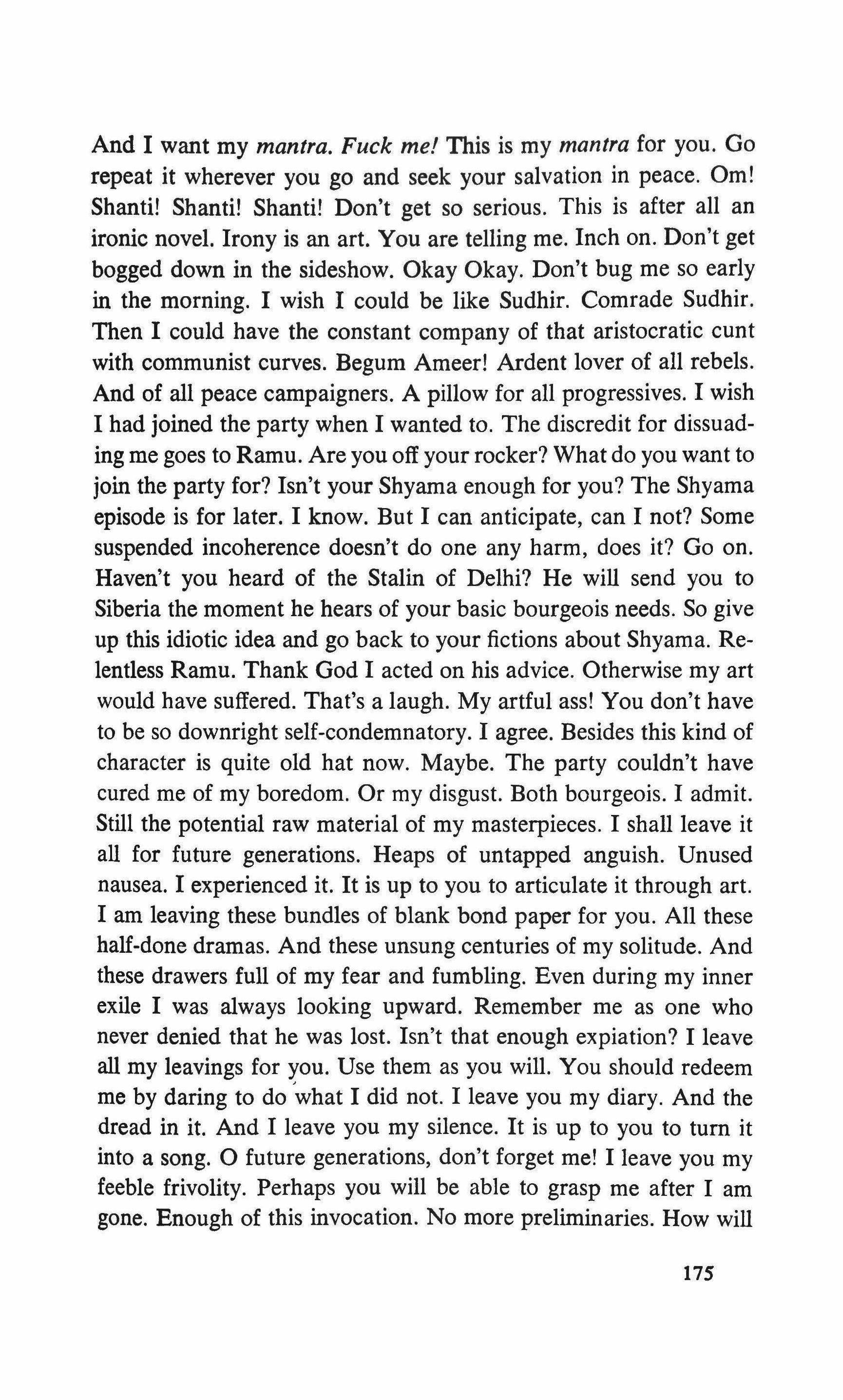
And I want my mantra. Fuck me! This is my mantra for you. Go repeat it wherever you go and seek your salvation in peace. Om! Shanti! Shanti! Shanti! Don't get so serious. This is after all an ironic novel. Irony is an art. You are telling me. Inch on. Don't get bogged down in the sideshow. Okay Okay. Don't bug me so early in the morning. I wish I could be like Sudhir. Comrade Sudhir. Then I could have the constant company of that aristocratic cunt with communist curves. Begum Ameer! Ardent lover of all rebels. And of all peace campaigners. A pillow for all progressives. I wish I had joined the party when I wanted to. The discredit for dissuading me goes to Ramu. Are you off your rocker? What do you want to join the party for? Isn't your Shyama enough for you? The Shyama episode is for later. I know. But I can anticipate, can I not? Some suspended incoherence doesn't do one any harm, does it? Go on. Haven't you heard of the Stalin of Delhi? He will send you to Siberia the moment he hears of your basic bourgeois needs. So give up this idiotic idea and go back to your fictions about Shyama. Relentless Ramu. Thank God I acted on his advice. Otherwise my art would have suffered. That's a laugh. My artful ass! You don't have to be so downright self-condemnatory. I agree. Besides this kind of character is quite old hat now. Maybe. The party couldn't have cured me of my boredom. Or my disgust. Both bourgeois. I admit. Still the potential raw material of my masterpieces. I shall leave it all for future generations. Heaps of untapped anguish. Unused nausea. I experienced it. It is up to you to articulate it through art. I am leaving these bundles of blank bond paper for you. All these half-done dramas. And these unsung centuries of my solitude. And these drawers full of my fear and fumbling. Even during my inner exile I was always looking upward. Remember me as one who never denied that he was lost. Isn't that enough expiation? I leave all my leavings for you. Use them as you will. You should redeem me by daring to do 'what I did not. I leave you my diary. And the dread in it. And I leave you my silence. It is up to you to turn it into a song. 0 future generations, don't forget me! I leave you my feeble frivolity. Perhaps you will be able to grasp me after I am gone. Enough of this invocation. No more preliminaries. How will
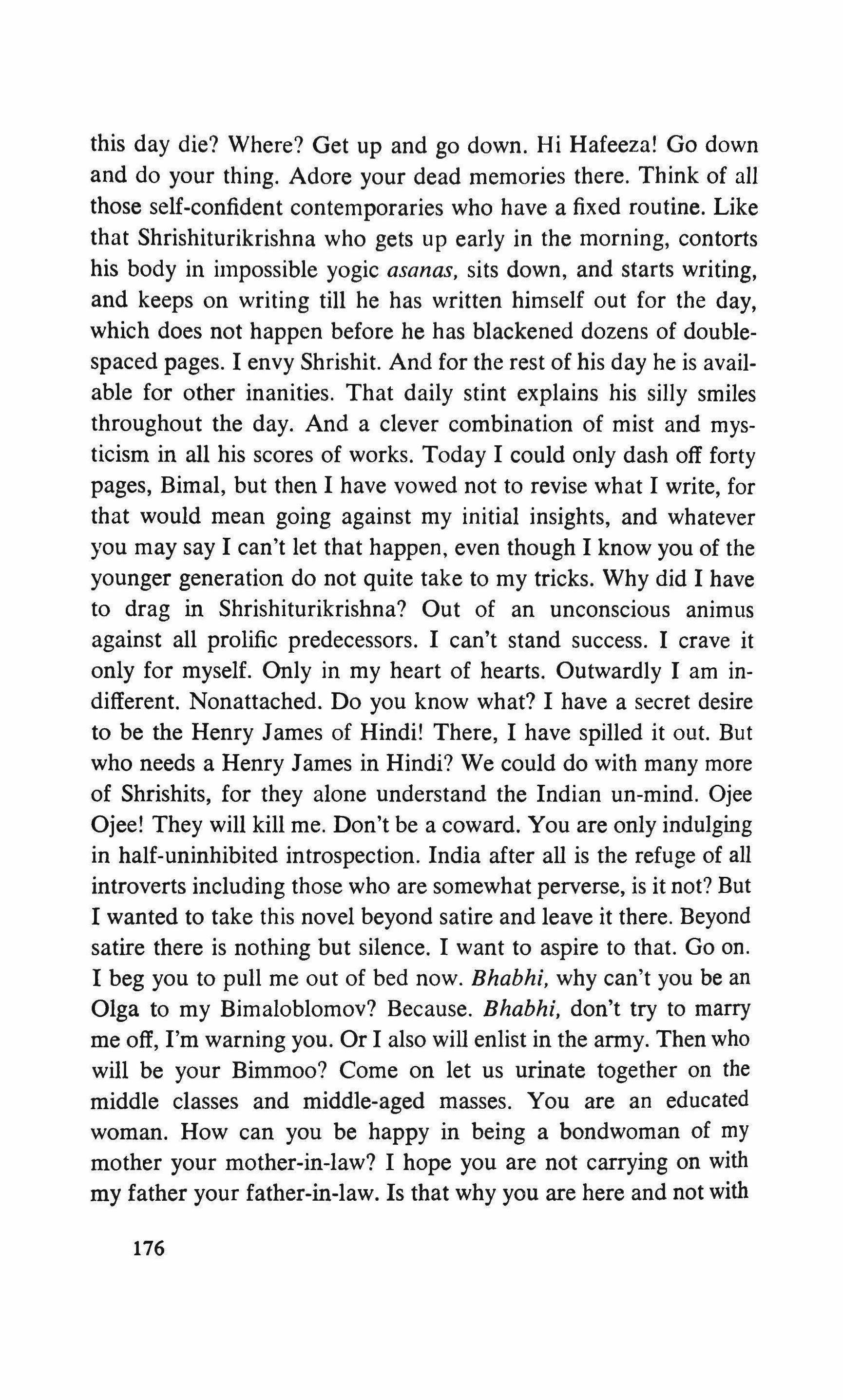
this day die? Where? Get up and go down. Hi Hafeeza! Go down and do your thing. Adore your dead memories there. Think of all those self-confident contemporaries who have a fixed routine. Like that Shrishiturikrishna who gets up early in the morning, contorts his body in impossible yogic asanas, sits down, and starts writing, and keeps on writing till he has written himself out for the day, which does not happen before he has blackened dozens of doublespaced pages. I envy Shrishit. And for the rest of his day he is available for other inanities. That daily stint explains his silly smiles throughout the day. And a clever combination of mist and mysticism in all his scores of works. Today I could only dash off forty pages, Bimal, but then I have vowed not to revise what I write, for that would mean going against my initial insights, and whatever you may say I can't let that happen, even though I know you of the younger generation do not quite take to my tricks. Why did I have to drag in Shrishiturikrishna? Out of an unconscious animus against all prolific predecessors. I can't stand success. I crave it only for myself. Only in my heart of hearts. Outwardly I am indifferent. Nonattached. Do you know what? I have a secret desire to be the Henry James of Hindi! There, I have spilled it out. But who needs a Henry James in Hindi? We could do with many more of Shrishits, for they alone understand the Indian un-mind. Ojee Ojee! They will kill me. Don't be a coward. You are only indulging in half-uninhibited introspection. India after all is the refuge of all introverts including those who are somewhat perverse, is it not? But I wanted to take this novel beyond satire and leave it there. Beyond satire there is nothing but silence. I want to aspire to that. Go on. I beg you to pull me out of bed now. Bhabhi, why can't you be an Olga to my Bimaloblomov? Because. Bhabhi, don't try to marry me off, I'm warning you. Or I also will enlist in the army. Then who will be your Bimmoo? Come on let us urinate together on the middle classes and middle-aged masses. You are an educated woman. How can you be happy in being a bondwoman of my mother your mother-in-law? I hope you are not carrying on with my father your father-in-law. Is that why you are here and not with
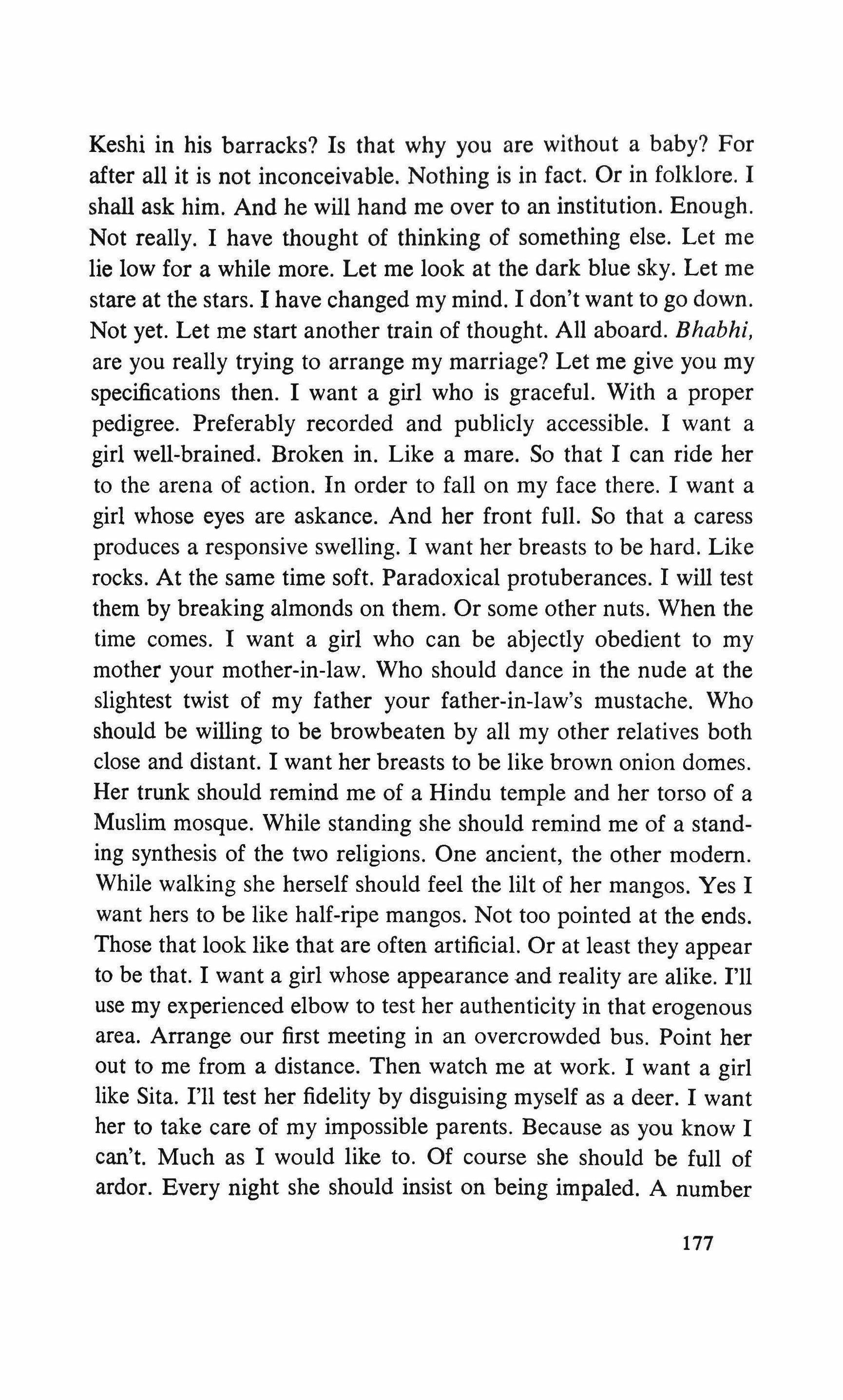
Keshi in his barracks? Is that why you are without a baby? For after all it is not inconceivable. Nothing is in fact. Or in folklore. I shall ask him. And he will hand me over to an institution. Enough. Not really. I have thought of thinking of something else. Let me lie low for a while more. Let me look at the dark blue sky. Let me stare at the stars. I have changed my mind. I don't want to go down. Not yet. Let me start another train of thought. All aboard. Bhabhi, are you really trying to arrange my marriage? Let me give you my specifications then. I want a girl who is graceful. With a proper pedigree. Preferably recorded and publicly accessible. I want a girl well-brained. Broken in. Like a mare. So that I can ride her to the arena of action. In order to fall on my face there. I want a girl whose eyes are askance. And her front full. So that a caress produces a responsive swelling. I want her breasts to be hard. Like rocks. At the same time soft. Paradoxical protuberances. I will test them by breaking almonds on them. Or some other nuts. When the time comes. I want a girl who can be abjectly obedient to my mother your mother-in-law. Who should dance in the nude at the slightest twist of my father your father-in-law's mustache. Who should be willing to be browbeaten by all my other relatives both close and distant. I want her breasts to be like brown onion domes. Her trunk should remind me of a Hindu temple and her torso of a Muslim mosque. While standing she should remind me of a standing synthesis of the two religions. One ancient, the other modern. While walking she herself should feel the lilt of her mangos. Yes I want hers to be like half-ripe mangos. Not too pointed at the ends. Those that look like that are often artificial. Or at least they appear to be that. I want a girl whose appearance and reality are alike. I'll use my experienced elbow to test her authenticity in that erogenous area. Arrange our first meeting in an overcrowded bus. Point her out to me from a distance. Then watch me at work. I want a girl like Sita. I'll test her fidelity by disguising myself as a deer. I want her to take care of my impossible parents. Because as you know I can't. Much as I would like to. Of course she should be full of ardor. Every night she should insist on being impaled. A number
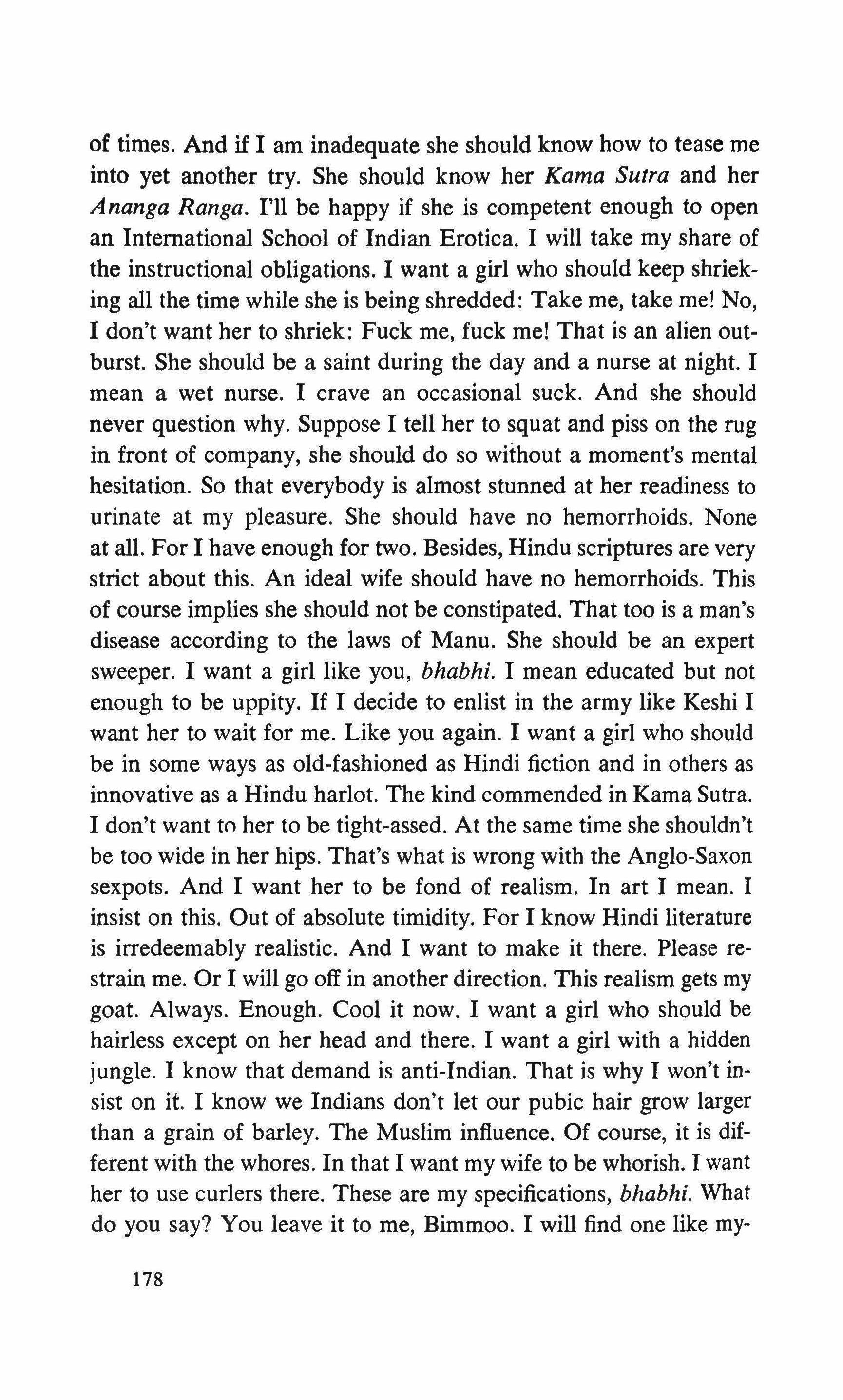
of times. And if I am inadequate she should know how to tease me into yet another try. She should know her Kama Sutra and her Ananga Ranga. I'll be happy if she is competent enough to open an International School of Indian Erotica. I will take my share of the instructional obligations. I want a girl who should keep shrieking all the time while she is being shredded: Take me, take me! No, I don't want her to shriek: Fuck me, fuck me! That is an alien outburst. She should be a saint during the day and a nurse at night. I mean a wet nurse. I crave an occasional suck. And she should never question why. Suppose I tell her to squat and piss on the rug in front of company, she should do so without a moment's mental hesitation. So that everybody is almost stunned at her readiness to urinate at my pleasure. She should have no hemorrhoids. None at all. For I have enough for two. Besides, Hindu scriptures are very strict about this. An ideal wife should have no hemorrhoids. This of course implies she should not be constipated. That too is a man's disease according to the laws of Manu. She should be an expert sweeper. I want a girl like you, bhabhi. I mean educated but not enough to be uppity. If I decide to enlist in the army like Keshi I want her to wait for me. Like you again. I want a girl who should be in some ways as old-fashioned as Hindi fiction and in others as innovative as a Hindu harlot. The kind commended in Kama Sutra. I don't want to her to be tight-assed. At the same time she shouldn't be too wide in her hips. That's what is wrong with the Anglo-Saxon sexpots. And I want her to be fond of realism. In art I mean. I insist on this. Out of absolute timidity. For I know Hindi literature is irredeemably realistic. And I want to make it there. Please restrain me. Or I will go off in another direction. This realism gets my goat. Always. Enough. Cool it now. I want a girl who should be hairless except on her head and there. I want a girl with a hidden jungle. I know that demand is anti-Indian. That is why I won't insist on it. I know we Indians don't let our pubic hair grow larger than a grain of barley. The Muslim influence. Of course, it is different with the whores. In that I want my wife to be whorish. I want her to use curlers there. These are my specifications, bhabhi. What do you say? You leave it to me, Bimmoo. I will find one like my-
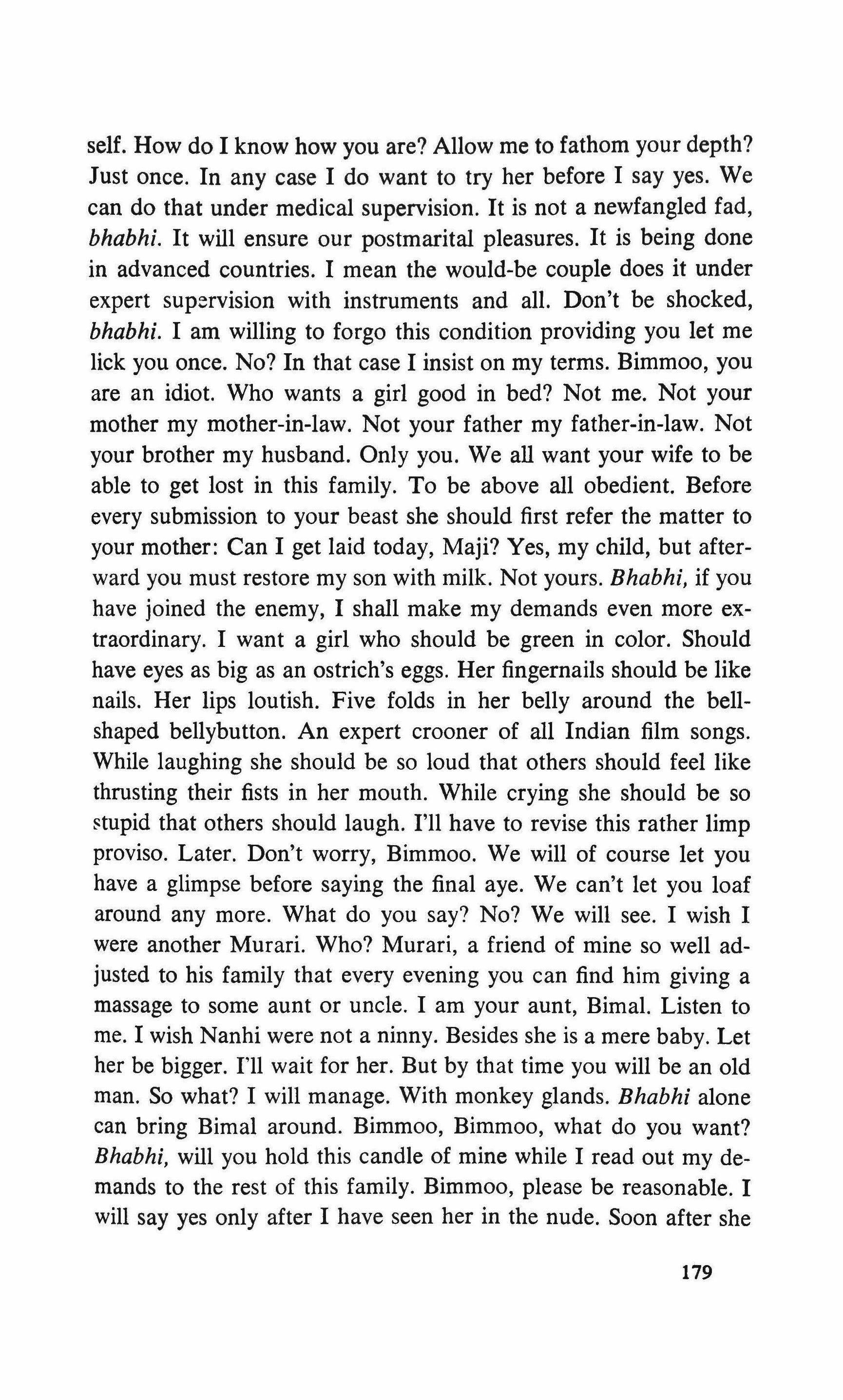
self. How do I know how you are? Allow me to fathom your depth? Just once. In any case I do want to try her before I say yes. We can do that under medical supervision. It is not a newfangled fad, bhabhi. It will ensure our postmarital pleasures. It is being done in advanced countries. I mean the would-be couple does it under expert supervision with instruments and all. Don't be shocked, bhabhi. I am willing to forgo this condition providing you let me lick you once. No? In that case I insist on my terms. Bimmoo, you are an idiot. Who wants a girl good in bed? Not me. Not your mother my mother-in-law. Not your father my father-in-law. Not your brother my husband. Only you. We all want your wife to be able to get lost in this family. To be above all obedient. Before every submission to your beast she should first refer the matter to your mother: Can I get laid today, Maji? Yes, my child, but afterward you must restore my son with milk. Not yours. Bhabhi, if you have joined the enemy, I shall make my demands even more extraordinary. I want a girl who should be green in color. Should have eyes as big as an ostrich's eggs. Her fingernails should be like nails. Her lips loutish. Five folds in her belly around the bellshaped bellybutton. An expert crooner of all Indian film songs. While laughing she should be so loud that others should feel like thrusting their fists in her mouth. While crying she should be so stupid that others should laugh. I'll have to revise this rather limp proviso. Later. Don't worry, Bimmoo. We will of course let you have a glimpse before saying the final aye. We can't let you loaf around any more. What do you say? No? We will see. I wish I were another Murari. Who? Murari, a friend of mine so well adjusted to his family that every evening you can find him giving a massage to some aunt or uncle. I am your aunt, Bimal. Listen to me. I wish Nanhi were not a ninny. Besides she is a mere baby. Let her be bigger. I'll wait for her. But by that time you will be an old man. So what? I will manage. With monkey glands. Bhabhi alone can bring Bimal around. Bimmoo, Bimmoo, what do you want? Bhabhi, will you hold this candle of mine while I read out my demands to the rest of this family. Bimmoo, please be reasonable. I will say yes only after I have seen her in the nude. Soon after she
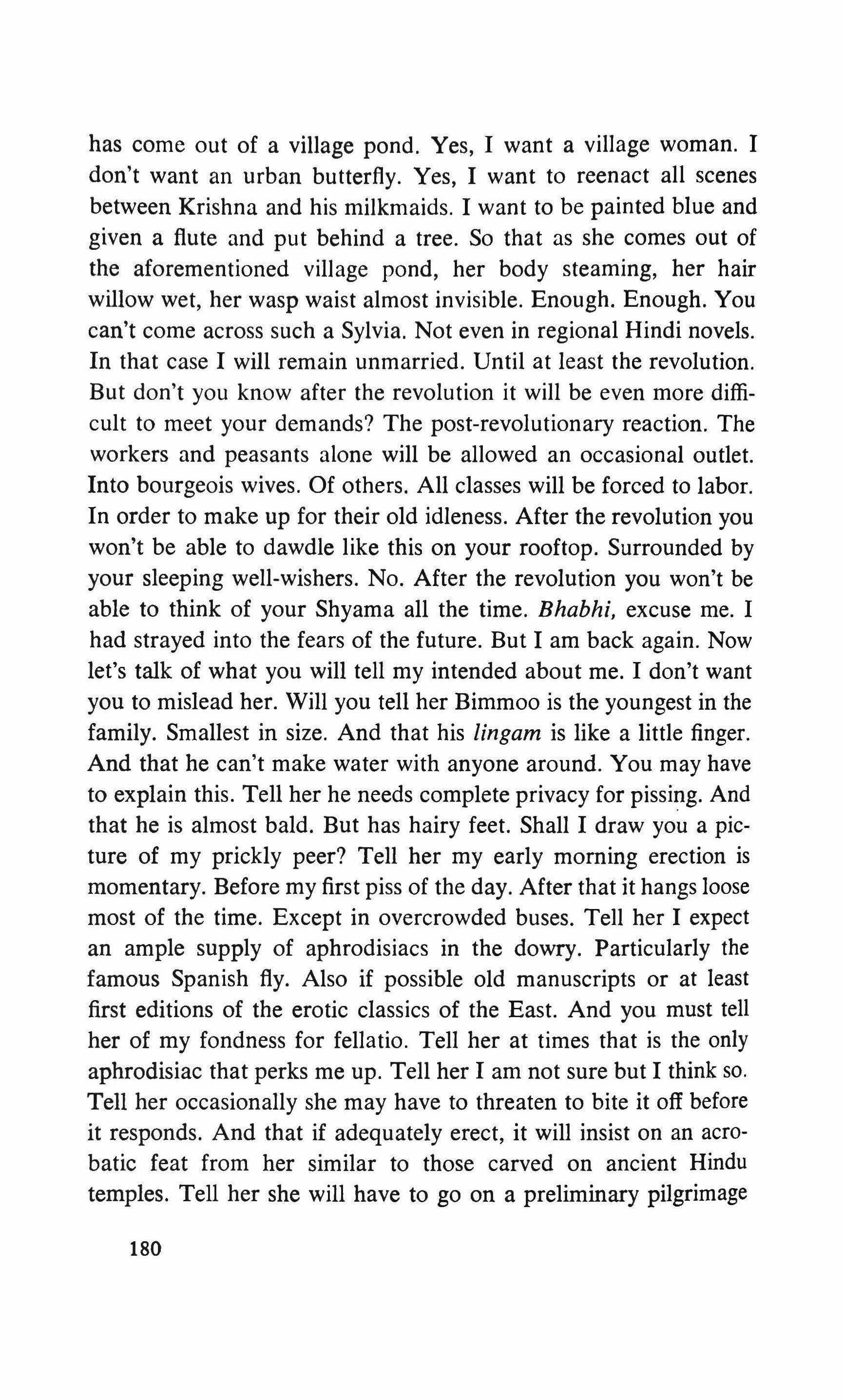
has come out of a village pond. Yes, I want a village woman. I don't want an urban butterfly. Yes, I want to reenact all scenes between Krishna and his milkmaids. I want to be painted blue and given a flute and put behind a tree. So that as she comes out of the aforementioned village pond, her body steaming, her hair willow wet, her wasp waist almost invisible. Enough. Enough. You can't come across such a Sylvia. Not even in regional Hindi novels. In that case I will remain unmarried. Until at least the revolution. But don't you know after the revolution it will be even more difficult to meet your demands? The post-revolutionary reaction. The workers and peasants alone will be allowed an occasional outlet. Into bourgeois wives. Of others. All classes will be forced to labor. In order to make up for their old idleness. After the revolution you won't be able to dawdle like this on your rooftop. Surrounded by your sleeping well-wishers. No. After the revolution you won't be able to think of your Shyama all the time. Bhabhi, excuse me. I had strayed into the fears of the future. But I am back again. Now let's talk of what you will tell my intended about me. I don't want you to mislead her. Will you tell her Bimmoo is the youngest in the family. Smallest in size. And that his lingam is like a little finger. And that he can't make water with anyone around. You may have to explain this. Tell her he needs complete privacy for pissing. And that he is almost bald. But has hairy feet. Shall I draw you a picture of my prickly peer? Tell her my early morning erection is momentary. Before my first piss of the day. After that it hangs loose most of the time. Except in overcrowded buses. Tell her I expect an ample supply of aphrodisiacs in the dowry. Particularly the famous Spanish fly. Also if possible old manuscripts or at least first editions of the erotic classics of the East. And you must tell her of my fondness for fellatio. Tell her at times that is the only aphrodisiac that perks me up. Tell her I am not sure but I think so. Tell her occasionally she may have to threaten to bite it off before it responds. And that if adequately erect, it will insist on an acrobatic feat from her similar to those carved on ancient Hindu temples. Tell her she will have to go on a preliminary pilgrimage
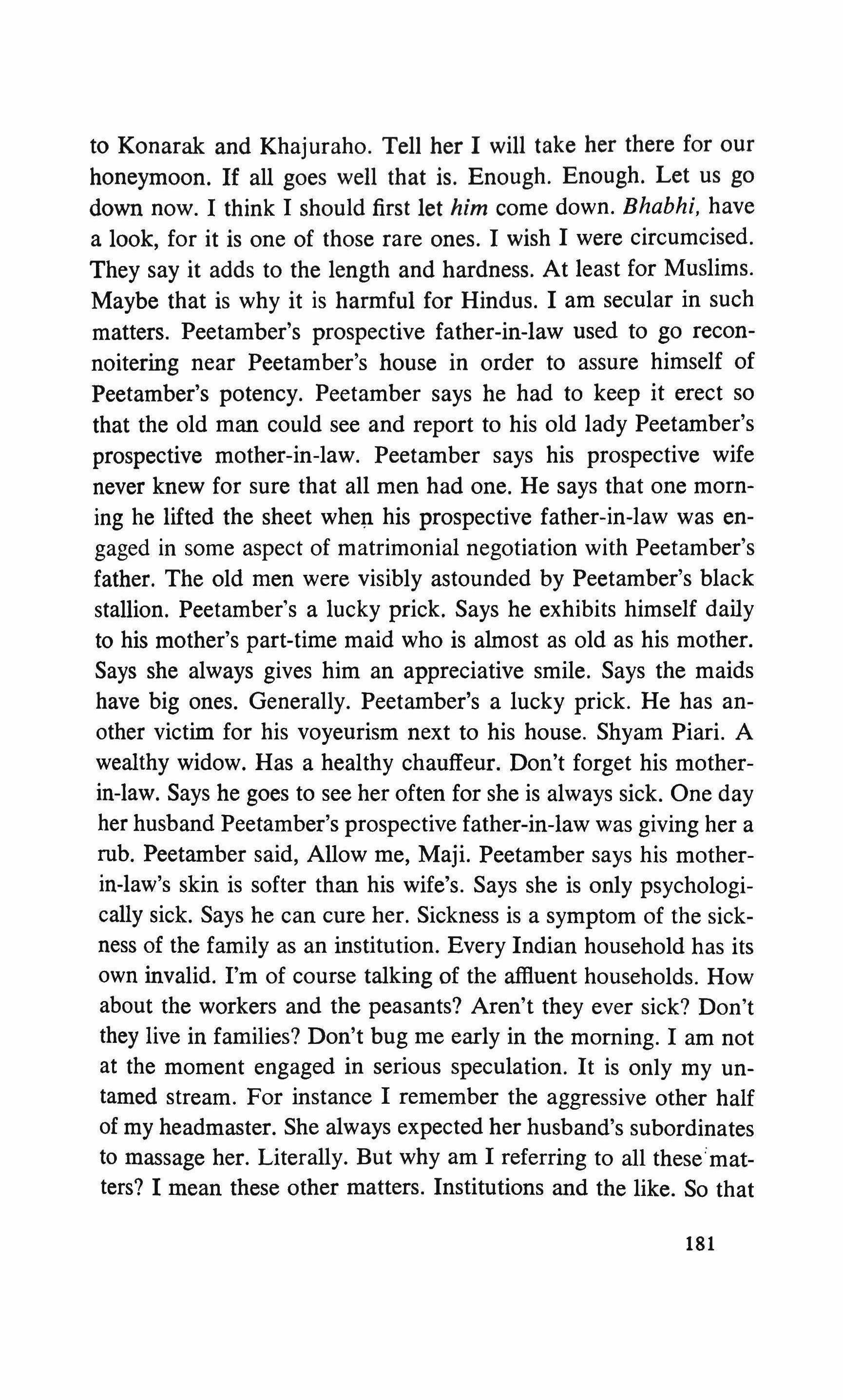
to Konarak and Khajuraho. Tell her I will take her there for our honeymoon. If all goes well that is. Enough. Enough. Let us go down now. I think I should first let him come down. Bhabhi, have a look, for it is one of those rare ones. I wish I were circumcised. They say it adds to the length and hardness. At least for Muslims. Maybe that is why it is harmful for Hindus. I am secular in such matters. Peetamber's prospective father-in-law used to go reconnoitering near Peetamber's house in order to assure himself of Peetamber's potency. Peetamber says he had to keep it erect so that the old man could see and report to his old lady Peetamber's prospective mother-in-law. Peetamber says his prospective wife never knew for sure that all men had one. He says that one morning he lifted the sheet when his prospective father-in-law was engaged in some aspect of matrimonial negotiation with Peetamber's father. The old men were visibly astounded by Peetamber's black stallion. Peetamber's a lucky prick. Says he exhibits himself daily to his mother's part-time maid who is almost as old as his mother. Says she always gives him an appreciative smile. Says the maids have big ones. Generally. Peetamber's a lucky prick. He has another victim for his voyeurism next to his house. Shyam Piari. A wealthy widow. Has a healthy chauffeur. Don't forget his motherin-law. Says he goes to see her often for she is always sick. One day her husband Peetamber's prospective father-in-law was giving her a rub. Peetamber said, Allow me, Maji. Peetamber says his motherin-law's skin is softer than his wife's. Says she is only psychologically sick. Says he can cure her. Sickness is a symptom of the sickness of the family as an institution. Every Indian household has its own invalid. I'm of course talking of the affluent households. How about the workers and the peasants? Aren't they ever sick? Don't they live in families? Don't bug me early in the morning. I am not at the moment engaged in serious speculation. It is only my untamed stream. For instance I remember the aggressive other half of my headmaster. She always expected her husband's subordinates to massage her. Literally. But why am I referring to all thesematters? I mean these other matters. Institutions and the like. So that
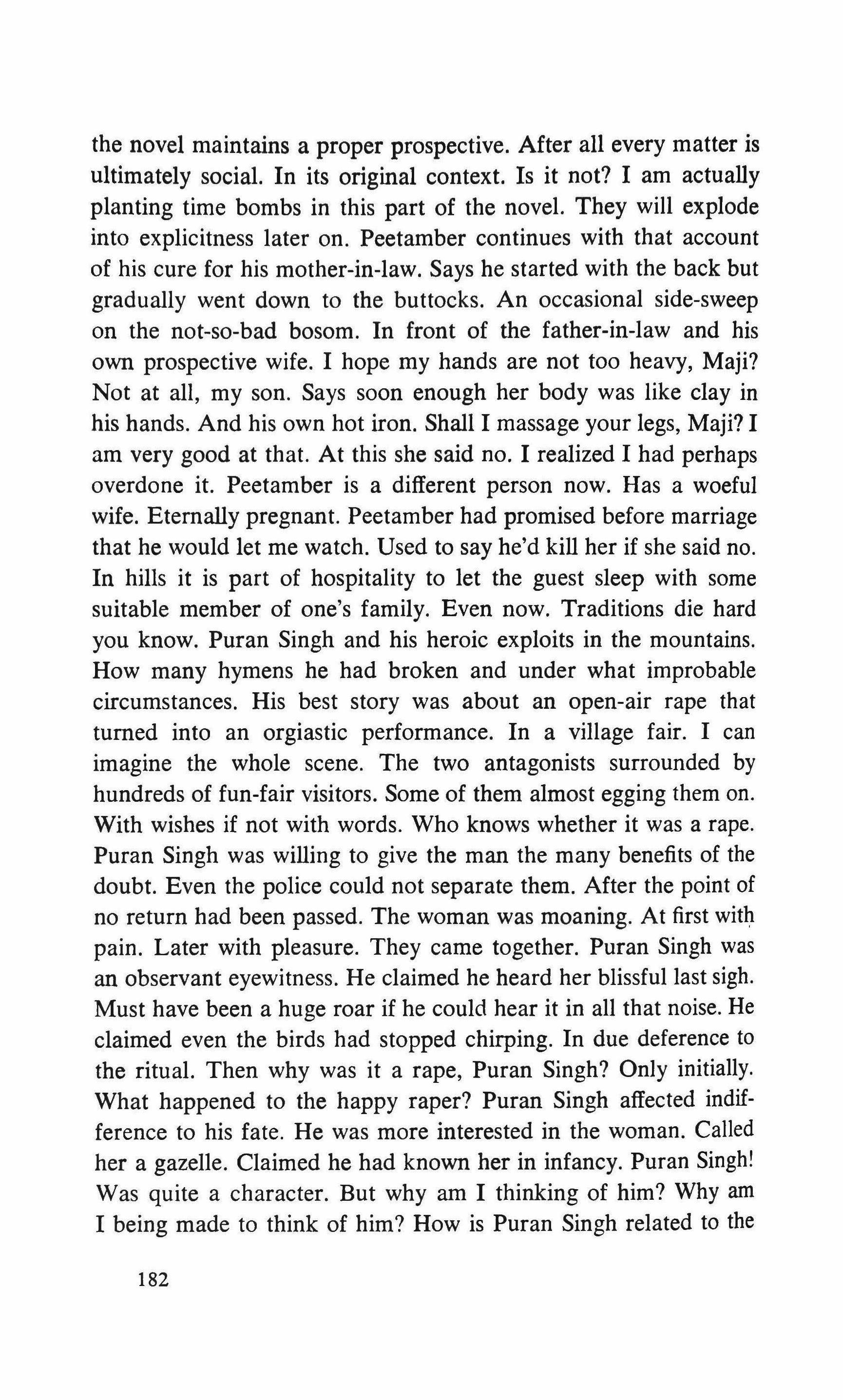
the novel maintains a proper prospective. After all every matter is ultimately social. In its original context. Is it not? I am actually planting time bombs in this part of the novel. They will explode into explicitness later on. Peetamber continues with that account of his cure for his mother-in-law. Says he started with the back but gradually went down to the buttocks. An occasional side-sweep on the not-so-bad bosom. In front of the father-in-law and his own prospective wife. I hope my hands are not too heavy, Maji? Not at all, my son. Says soon enough her body was like clay in his hands. And his own hot iron. Shall I massage your legs, Maji? I am very good at that. At this she said no. I realized I had perhaps overdone it. Peetamber is a different person now. Has a woeful wife. Eternally pregnant. Peetamber had promised before marriage that he would let me watch. Used to say he'd kill her if she said no. In hills it is part of hospitality to let the guest sleep with some suitable member of one's family. Even now. Traditions die hard you know. Puran Singh and his heroic exploits in the mountains. How many hymens he had broken and under what improbable circumstances. His best story was about an open-air rape that turned into an orgiastic performance. In a village fair. I can imagine the whole scene. The two antagonists surrounded by hundreds of fun-fair visitors. Some of them almost egging them on. With wishes if not with words. Who knows whether it was a rape. Puran Singh was willing to give the man the many benefits of the doubt. Even the police could not separate them. After the point of no return had been passed. The woman was moaning. At first with pain. Later with pleasure. They came together. Puran Singh was an observant eyewitness. He claimed he heard her blissful last sigh. Must have been a huge roar if he could hear it in all that noise. He claimed even the birds had stopped chirping. In due deference to the ritual. Then why was it a rape, Puran Singh? Only initially. What happened to the happy raper? Puran Singh affected indifference to his fate. He was more interested in the woman. Called her a gazelle. Claimed he had known her in infancy. Puran Singh! Was quite a character. But why am I thinking of him? Why am I being made to think of him? How is Puran Singh related to the
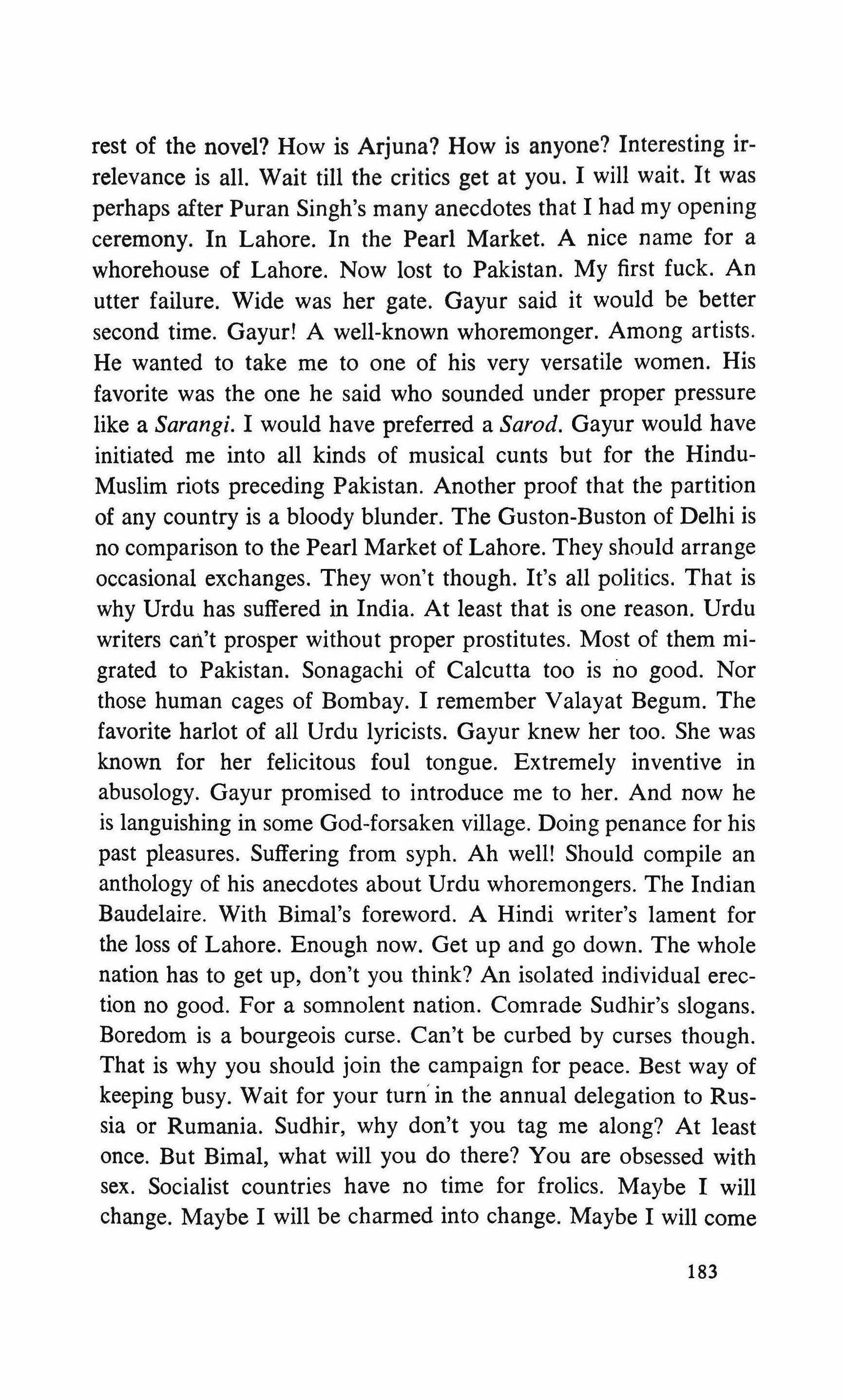
rest of the novel? How is Arjuna? How is anyone? Interesting irrelevance is all. Wait till the critics get at you. I will wait. It was perhaps after Puran Singh's many anecdotes that I had my opening ceremony. In Lahore. In the Pearl Market. A nice name for a whorehouse of Lahore. Now lost to Pakistan. My first fuck. An utter failure. Wide was her gate. Gayur said it would be better second time. Gayur! A well-known whoremonger. Among artists. He wanted to take me to one of his very versatile women. His favorite was the one he said who sounded under proper pressure like a Sarangi. I would have preferred a Sarod. Gayur would have initiated me into all kinds of musical cunts but for the HinduMuslim riots preceding Pakistan. Another proof that the partition of any country is a bloody blunder. The Guston-Buston of Delhi is no comparison to the Pearl Market of Lahore. They should arrange occasional exchanges. They won't though. It's all politics. That is why Urdu has suffered in India. At least that is one reason. Urdu writers can't prosper without proper prostitutes. Most of them migrated to Pakistan. Sonagachi of Calcutta too is no good. Nor those human cages of Bombay. I remember Valayat Begum. The favorite harlot of all Urdu lyricists. Gayur knew her too. She was known for her felicitous foul tongue. Extremely inventive in abusology. Gayur promised to introduce me to her. And now he is languishing in some God-forsaken village. Doing penance for his past pleasures. Suffering from syph. Ah well! Should compile an anthology of his anecdotes about Urdu whoremongers. The Indian Baudelaire. With Bimal's foreword. A Hindi writer's lament for the loss of Lahore. Enough now. Get up and go down. The whole nation has to get up, don't you think? An isolated individual erection no good. For a somnolent nation. Comrade Sudhir's slogans. Boredom is a bourgeois curse. Can't be curbed by curses though. That is why you should join the campaign for peace. Best way of keeping busy. Wait for your turnin the annual delegation to Russia or Rumania. Sudhir, why don't you tag me along? At least once. But Bimal, what will you do there? You are obsessed with sex. Socialist countries have no time for frolics. Maybe I will change. Maybe I will be charmed into change. Maybe I will corne
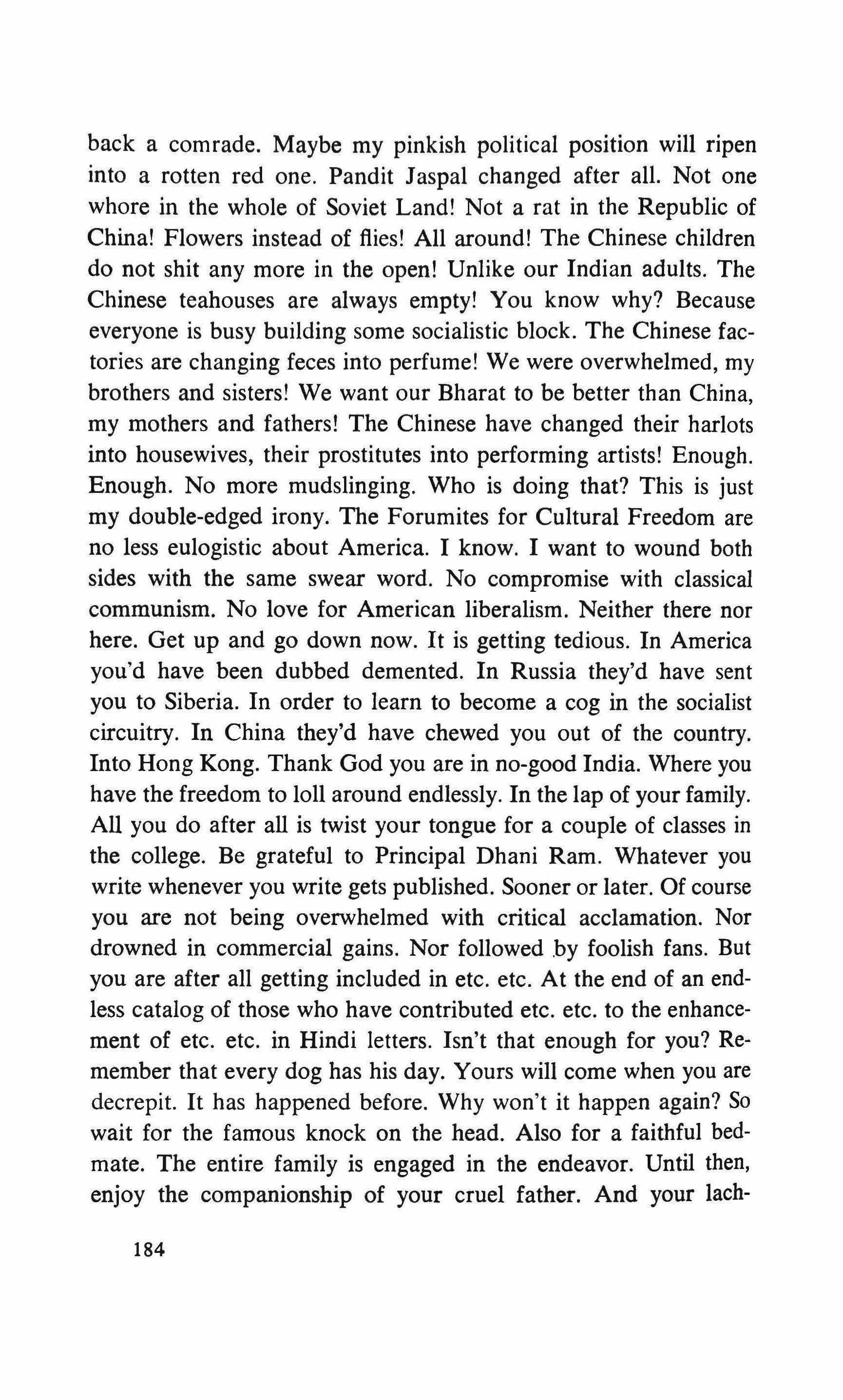
back a comrade. Maybe my pinkish political position will ripen into a rotten red one. Pandit Jaspal changed after all. Not one whore in the whole of Soviet Land! Not a rat in the Republic of China! Flowers instead of flies! All around! The Chinese children do not shit any more in the open! Unlike our Indian adults. The Chinese teahouses are always empty! You know why? Because everyone is busy building some socialistic block. The Chinese factories are changing feces into perfume! We were overwhelmed, my brothers and sisters! We want our Bharat to be better than China, my mothers and fathers! The Chinese have changed their harlots into housewives, their prostitutes into performing artists! Enough. Enough. No more mudslinging. Who is doing that? This is just my double-edged irony. The Forumites for Cultural Freedom are no less eulogistic about America. I know. I want to wound both sides with the same swear word. No compromise with classical communism. No love for American liberalism. Neither there nor here. Get up and go down now. It is getting tedious. In America you'd have been dubbed demented. In Russia they'd have sent you to Siberia. In order to learn to become a cog in the socialist circuitry. In China they'd have chewed you out of the country. Into Hong Kong. Thank God you are in no-good India. Where you have the freedom to loll around endlessly. In the lap of your family. All you do after all is twist your tongue for a couple of classes in the college. Be grateful to Principal Dhani Ram. Whatever you write whenever you write gets published. Sooner or later. Of course you are not being overwhelmed with critical acclamation. Nor drowned in commercial gains. Nor followed by foolish fans. But you are after all getting included in etc. etc. At the end of an endless catalog of those who have contributed etc. etc. to the enhancement of etc. etc. in Hindi letters. Isn't that enough for you? Remember that every dog has his day. Yours will come when you are decrepit. It has happened before. Why won't it happen again? So wait for the famous knock on the head. Also for a faithful bedmate. The entire family is engaged in the endeavor. Until then, enjoy the companionship of your cruel father. And your lach-
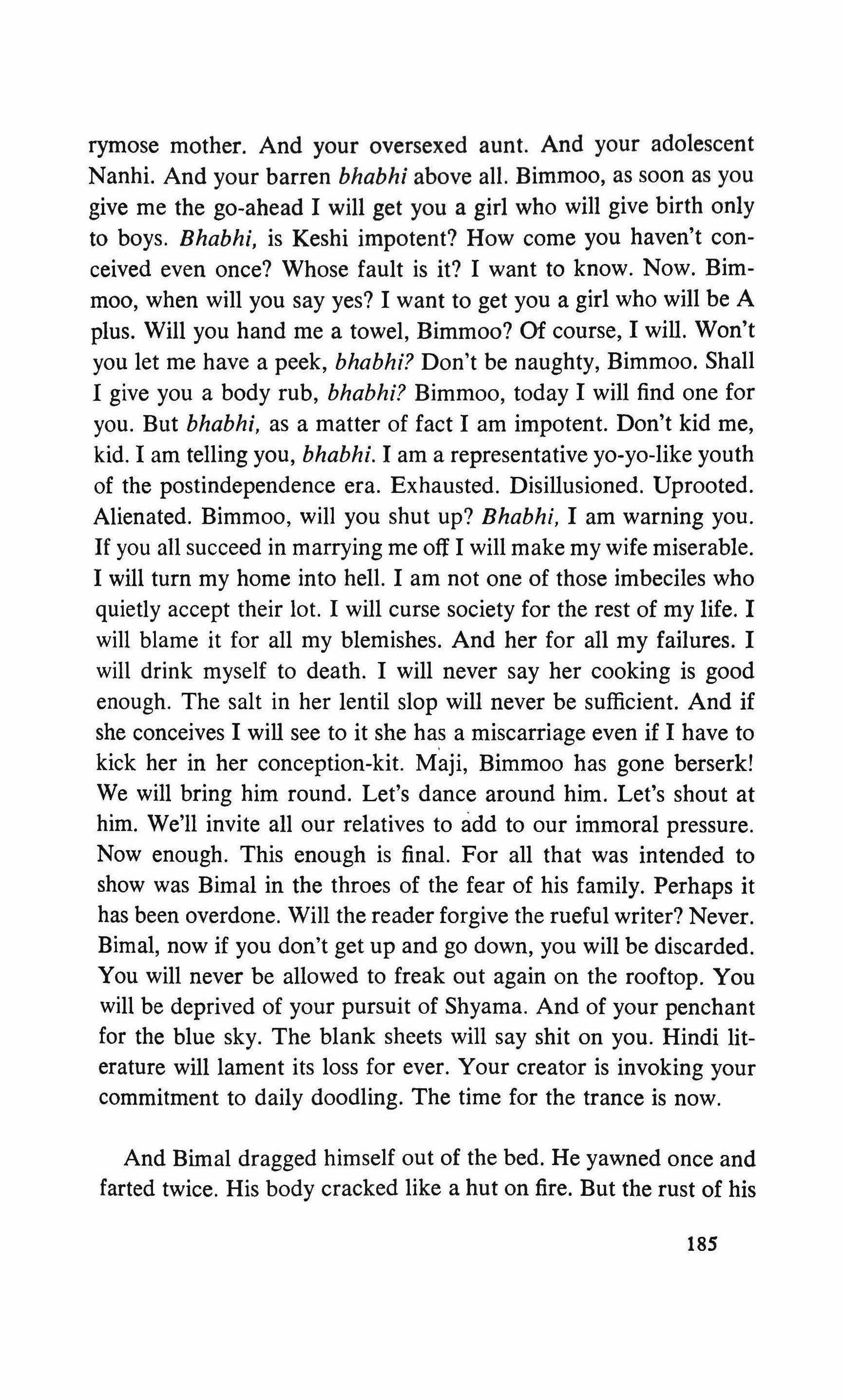
rymose mother. And your oversexed aunt. And your adolescent Nanhi. And your barren bhabhi above all. Bimmoo, as soon as you give me the go-ahead I will get you a girl who will give birth only to boys. Bhabhi, is Keshi impotent? How come you haven't conceived even once? Whose fault is it? I want to know. Now. Bimmoo, when will you say yes? I want to get you a girl who will be A plus. Will you hand me a towel, Bimmoo? Of course, I will. Won't you let me have a peek, bhabhi? Don't be naughty, Bimmoo. Shall I give you a body rub, bhabhi? Bimmoo, today I will find one for you. But bhabhi, as a matter of fact I am impotent. Don't kid me, kid. I am telling you, bhabhi. I am a representative yo-yo-like youth of the postindependence era. Exhausted. Disillusioned. Uprooted. Alienated. Bimmoo, will you shut up? Bhabhi, I am warning you. If you all succeed in marrying me off I will make my wife miserable. I will turn my home into hell. I am not one of those imbeciles who quietly accept their lot. I will curse society for the rest of my life. I will blame it for all my blemishes. And her for all my failures. I will drink myself to death. I will never say her cooking is good enough. The salt in her lentil slop will never be sufficient. And if she conceives I will see to it she has a miscarriage even if I have to kick her in her conception-kit. Maji, Bimmoo has gone berserk! We will bring him round. Let's dance around him. Let's shout at him. We'll invite all our relatives to add to our immoral pressure. Now enough. This enough is final. For all that was intended to show was Bimal in the throes of the fear of his family. Perhaps it has been overdone. Will the reader forgive the rueful writer? Never. Bimal, now if you don't get up and go down, you will be discarded. You will never be allowed to freak out again on the rooftop. You will be deprived of your pursuit of Shyama. And of your penchant for the blue sky. The blank sheets will say shit on you. Hindi literature will lament its loss for ever. Your creator is invoking your commitment to daily doodling. The time for the trance is now.
And Bimal dragged himself out of the bed. He yawned once and farted twice. His body cracked like a hut on fire. But the rust of his
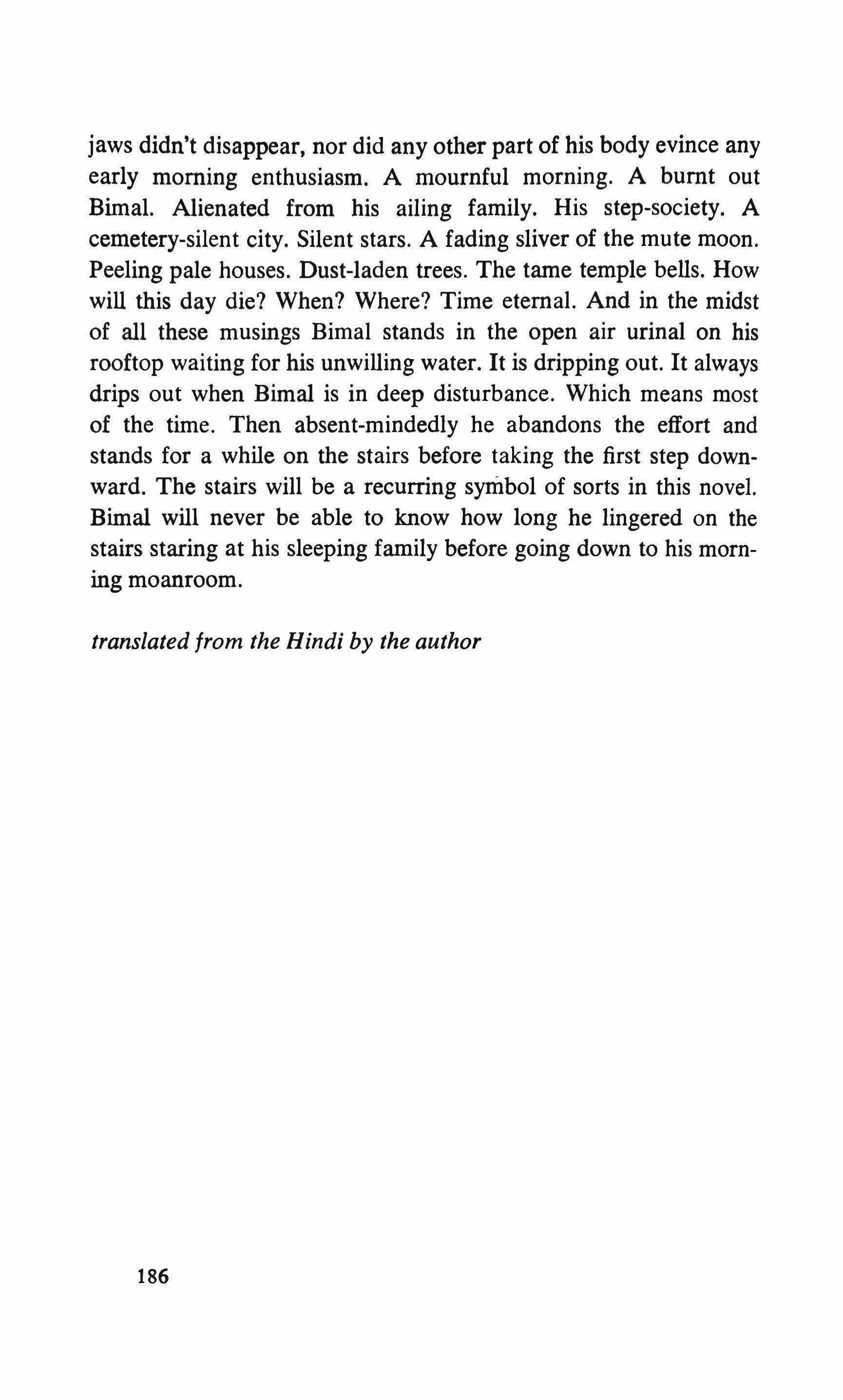
jaws didn't disappear, nor did any other part of his body evince any early morning enthusiasm. A mournful morning. A burnt out Bimal. Alienated from his ailing family. His step-society. A cemetery-silent city. Silent stars. A fading sliver of the mute moon. Peeling pale houses. Dust-laden trees. The tame temple bells. How will this day die? When? Where? Time eternal. And in the midst of all these musings Bimal stands in the open air urinal on his rooftop waiting for his unwilling water. It is dripping out. It always drips out when Bimal is in deep disturbance. Which means most of the time. Then absent-mindedly he abandons the effort and stands for a while on the stairs before taking the first step downward. The stairs will be a recurring symbol of sorts in this novel. Bimal will never be able to know how long he lingered on the stairs staring at his sleeping family before going down to his morning moanroom.
translated from the Hindi by the author
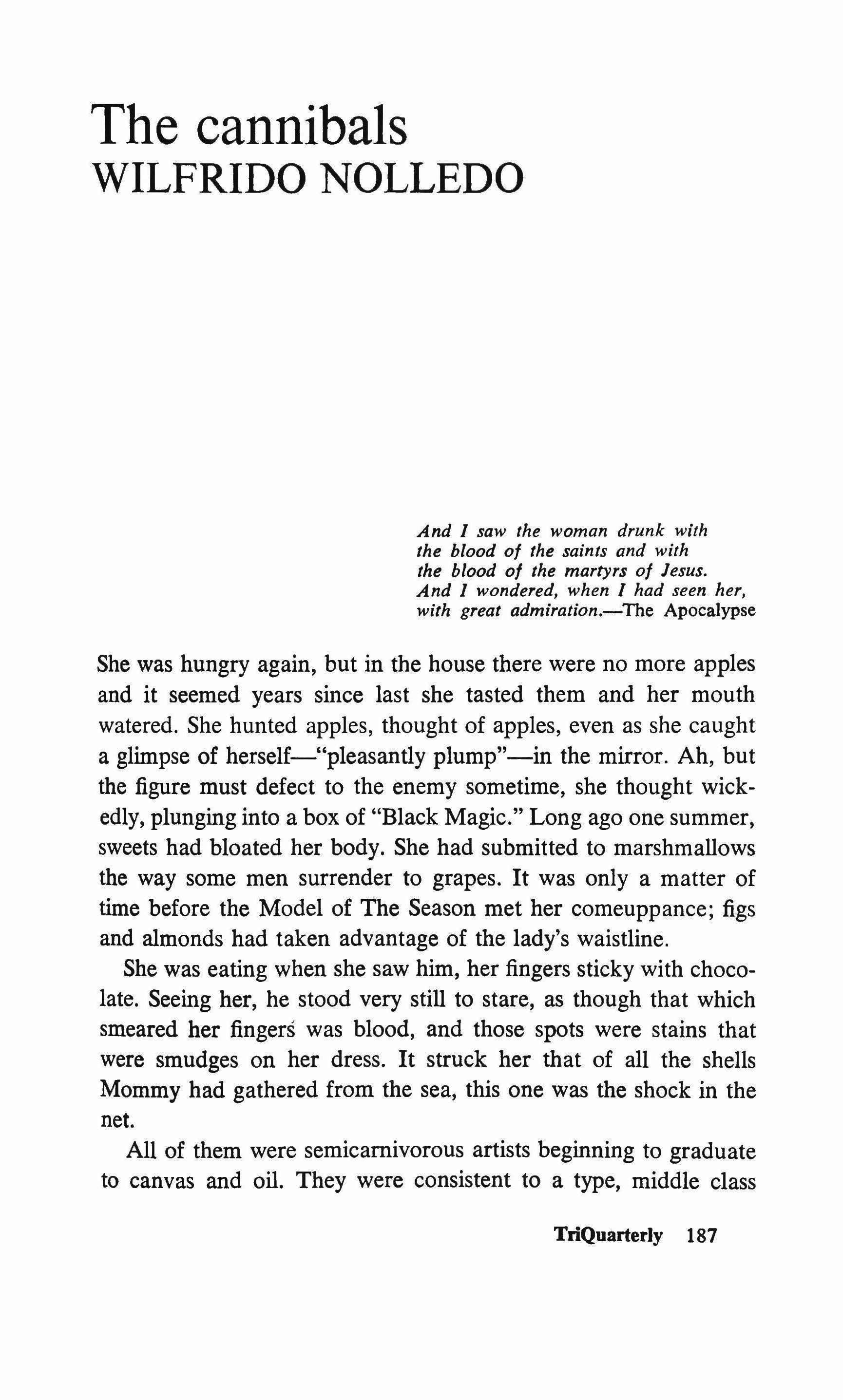
And 1 saw the woman drunk with the blood of the saints and with the blood of the martyrs of Jesus. And 1 wondered, when 1 had seen her, with great admiration.-The Apocalypse
She was hungry again, but in the house there were no more apples and it seemed years since last she tasted them and her mouth watered. She hunted apples, thought of apples, even as she caught a glimpse of herself-"pleasantly plump"-in the mirror. Ah, but the figure must defect to the enemy sometime, she thought wickedly, plunging into a box of "Black Magic." Long ago one summer, sweets had bloated her body. She had submitted to marshmallows the way some men surrender to grapes. It was only a matter of time before the Model of The Season met her comeuppance; figs and almonds had taken advantage of the lady's waistline.
She was eating when she saw him, her fingers sticky with chocolate. Seeing her, he stood very still to stare, as though that which smeared her fingers was blood, and those spots were stains that were smudges on her dress. It struck her that of all the shells Mommy had gathered from the sea, this one was the shock in the net.
All of them were semicarnivorous artists beginning to graduate to canvas and oil. They were consistent to a type, middle class
TriQuarterly 187
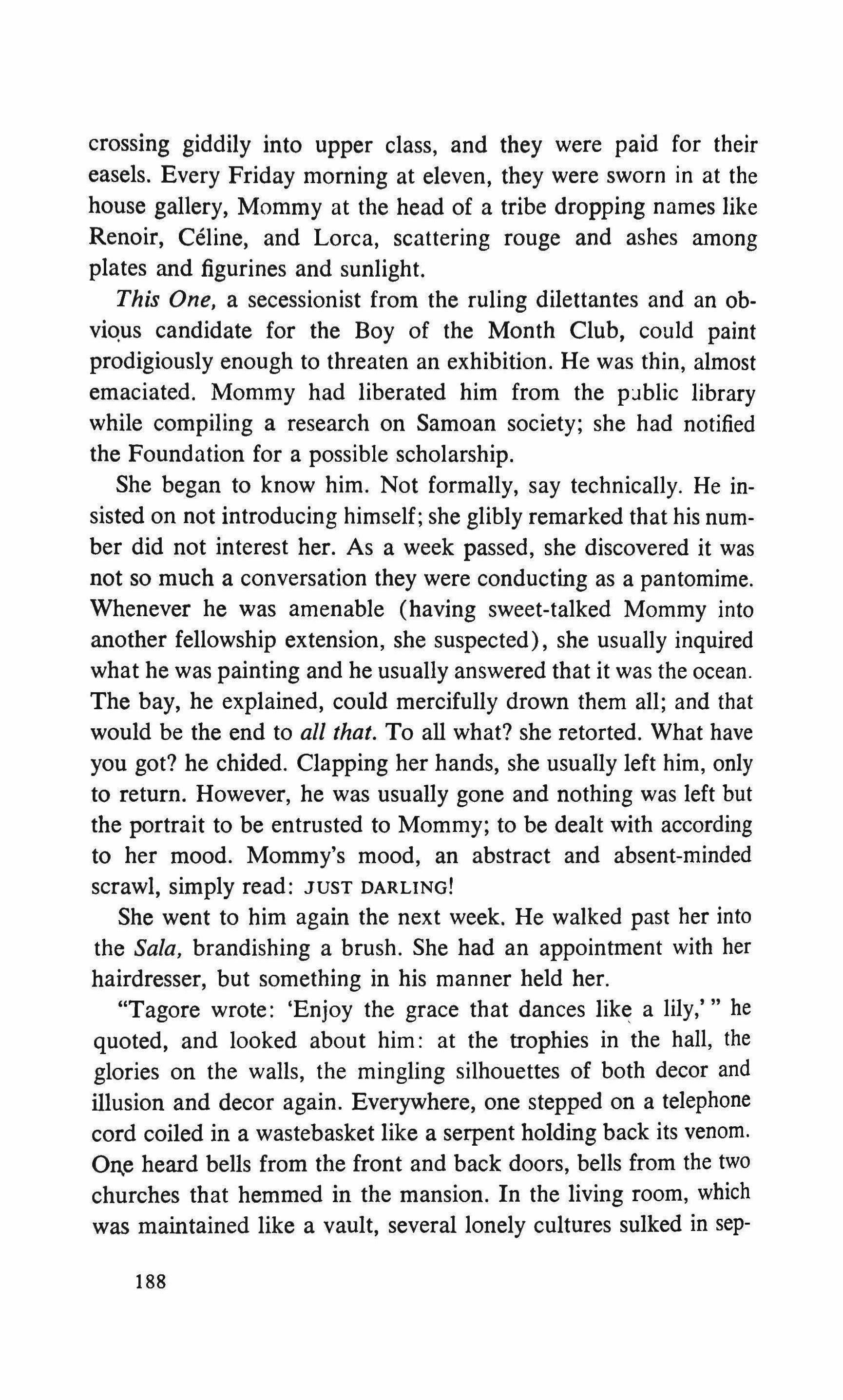
crossing giddily into upper class, and they were paid for their easels. Every Friday morning at eleven, they were sworn in at the house gallery, Mommy at the head of a tribe dropping names like Renoir, Celine, and Lorca, scattering rouge and ashes among plates and figurines and sunlight.
This One, a secessionist from the ruling dilettantes and an obvious candidate for the Boy of the Month Club, could paint prodigiously enough to threaten an exhibition. He was thin, almost emaciated. Mommy had liberated him from the public library while compiling a research on Samoan society; she had notified the Foundation for a possible scholarship.
She began to know him. Not formally, say technically. He insisted on not introducing himself; she glibly remarked that his number did not interest her. As a week passed, she discovered it was not so much a conversation they were conducting as a pantomime. Whenever he was amenable (having sweet-talked Mommy into another fellowship extension, she suspected), she usually inquired what he was painting and he usually answered that it was the ocean. The bay, he explained, could mercifully drown them all; and that would be the end to all that. To all what? she retorted. What have you got? he chided. Clapping her hands, she usually left him, only to return. However, he was usually gone and nothing was left but the portrait to be entrusted to Mommy; to be dealt with according to her mood. Mommy's mood, an abstract and absent-minded scrawl, simply read: JUST DARLING!
She went to him again the next week. He walked past her into the Sala, brandishing a brush. She had an appointment with her hairdresser, but something in his manner held her.
"Tagore wrote: 'Enjoy the grace that dances like a lily,''' he quoted, and looked about him: at the trophies in the hall, the glories on the walls, the mingling silhouettes of both decor and illusion and decor again. Everywhere, one stepped on a telephone cord coiled in a wastebasket like a serpent holding back its venom. One heard bells from the front and back doors, bells from the two churches that hemmed in the mansion. In the living room, which was maintained like a vault, several lonely cultures sulked in sep-

arate splendors, arranged according to worth or antiquity with labels memorized by the household-as in a museum or an observatory a guide might rattle out scientific names to an enchanted elite. Thus, the ivory won off the Moors was sixteenth-century Ming; this that you mistake for an ornament is really a talisman from the Crusades; and here, like a whisper, is the signet of the diva Cuzio. Over there we have the barbaric grandeurs of the feudal lords; and around you, kept as they were and as they will always be, heirlooms, headdresses, history.
They went into the dining room with its motif of dragons waiting for crumbs under the table of a Last Supper that was dining precariously on the Blue Danube.
"Now at last," he began, "we are entering the Garden of Reverses. The silk comes from the finest shops in Paris; and romping downstream in a gondola where an innocent might wish to lean against his noble narra, what do you have but the lumber of the West, as we slumber in adoration? Under the balcony, signorina, I will show the political prisoners in the dungeon how the baroque has mutilated the sampaquita into the bloom of the Caucasians with a pedigree you order from the ballyhoo beyond the gangplank. We have also bought, outbidding ten sheiks and a shah in the auction, the galleon mast, to be tacked on the bulletin board of status-symbol sophistication. Ergo: the lithograph on the wall, the stereo in the living room, the rugs on the floor, the caviar on the buffet table. Every cult is cultivated like a poppy; culture can hang in the closet. Why, if a renegade from the revolution stepped in through this peninsula, he would swear he had been expatriated to the international fair. In closing, look at the face that beholds it all. None but the cold cream can touch that monopoly. How vain of the alarm clock to sing to it when it did: Rise and reduce, Magdalena; tell Gautama you care."
Without quite knowing why, she smiled.
"Ah," he murmured. "The apparition, the Filipino flower in the rock garden: a country smile."
Beaten again, she lighted a cigarette and held it before her like a cushion.
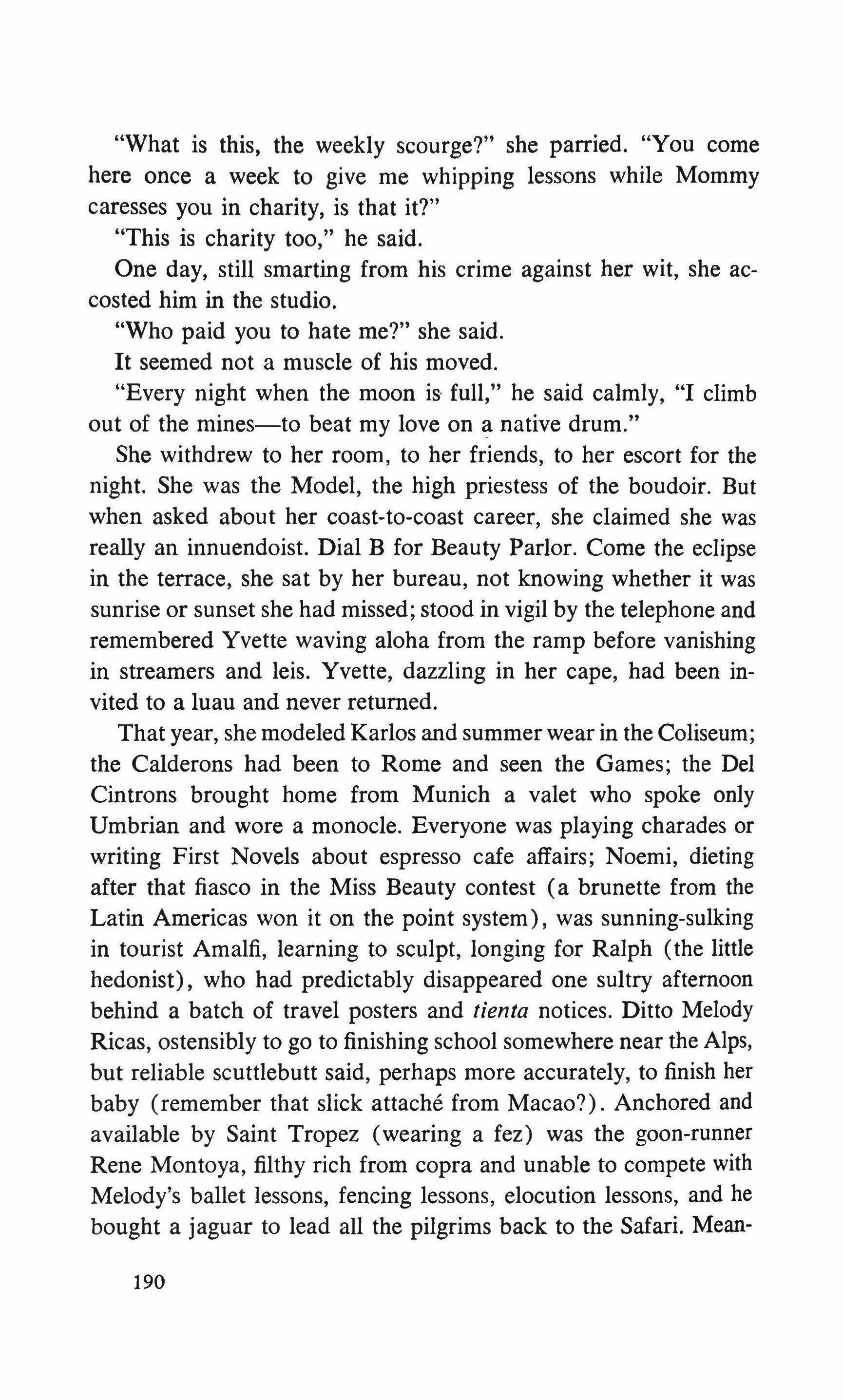
"What is this, the weekly scourge?" she parried. "You come here once a week to give me whipping lessons while Mommy caresses you in charity, is that it?"
"This is charity too," he said.
One day, still smarting from his crime against her wit, she accosted him in the studio.
"Who paid you to hate me?" she said. It seemed not a muscle of his moved.
"Every night when the moon is full," he said calmly, "I climb out of the mines-to beat my love on a native drum."
She withdrew to her room, to her friends, to her escort for the night. She was the Model, the high priestess of the boudoir. But when asked about her coast-to-coast career, she claimed she was really an innuendoist. Dial B for Beauty Parlor. Come the eclipse in the terrace, she sat by her bureau, not knowing whether it was sunrise or sunset she had missed; stood in vigil by the telephone and remembered Yvette waving aloha from the ramp before vanishing in streamers and leis. Yvette, dazzling in her cape, had been invited to a luau and never returned.
That year, she modeled Karlos and summer wear in the Coliseum; the Calderons had been to Rome and seen the Games; the Del Cintrons brought home from Munich a valet who spoke only Umbrian and wore a monocle. Everyone was playing charades or writing First Novels about espresso cafe affairs; Noemi, dieting after that fiasco in the Miss Beauty contest (a brunette from the Latin Americas won it on the point system), was sunning-sulking in tourist Amalfi, learning to sculpt, longing for Ralph (the little hedonist), who had predictably disappeared one sultry afternoon behind a batch of travel posters and tienta notices. Ditto Melody Ricas, ostensibly to go to finishing school somewhere near the Alps, but reliable scuttlebutt said, perhaps more accurately, to finish her baby (remember that slick attache from Macao? ). Anchored and available by Saint Tropez (wearing a fez) was the goon-runner Rene Montoya, filthy rich from copra and unable to compete with Melody's ballet lessons, fencing lessons, elocution lessons, and he bought a jaguar to lead all the pilgrims back to the Safari. Mean-
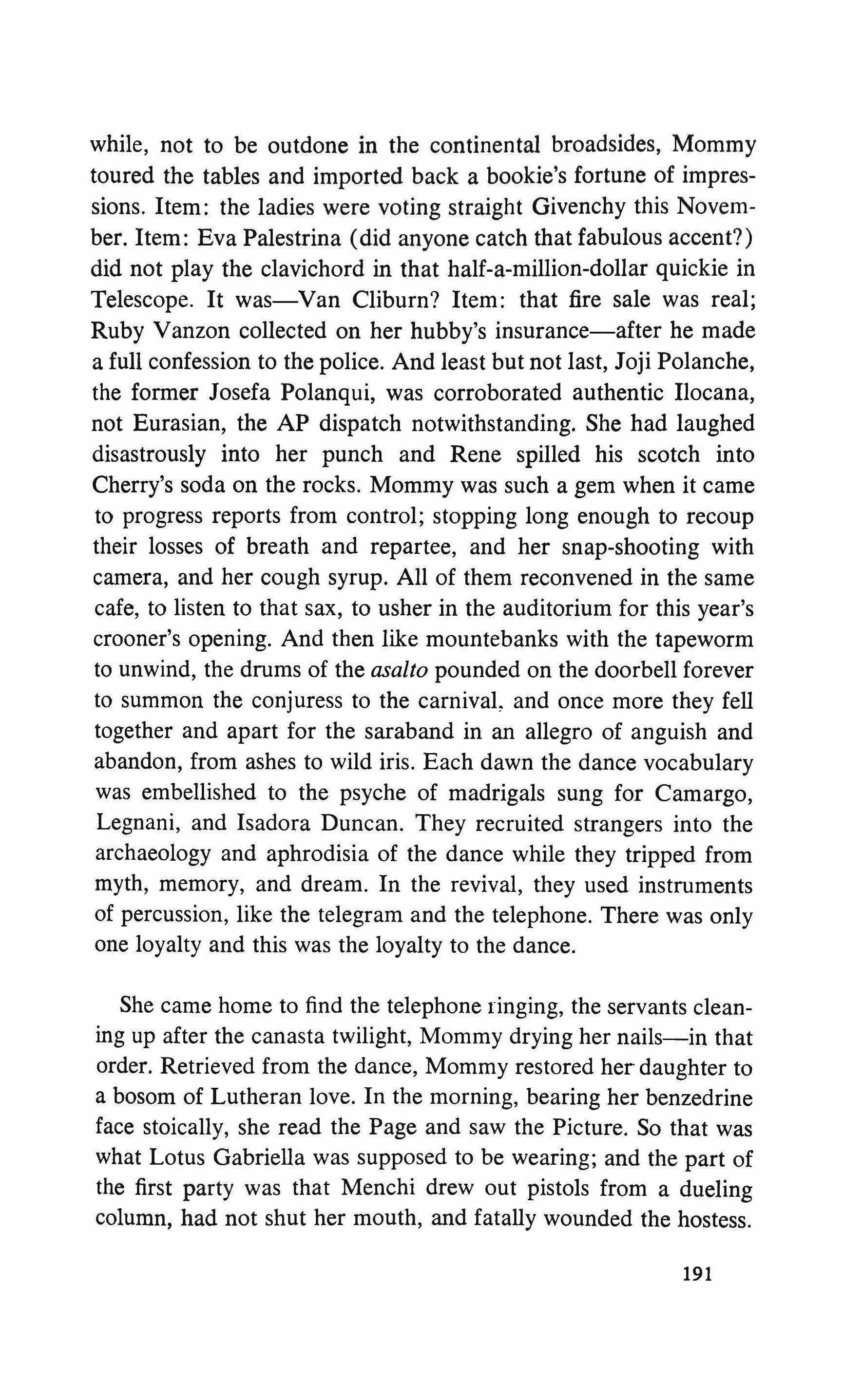
while, not to be outdone in the continental broadsides, Mommy toured the tables and imported back a bookie's fortune of impressions. Item: the ladies were voting straight Givenchy this November. Item: Eva Palestrina (did anyone catch that fabulous accent?) did not play the clavichord in that half-a-million-dollar quickie in Telescope. It was-Van Cliburn? Item: that fire sale was real; Ruby Vanzon collected on her hubby's insurance-after he made a full confession to the police. And least but not last, Joji Polanche, the former Josefa Polanqui, was corroborated authentic Ilocana, not Eurasian, the AP dispatch notwithstanding. She had laughed disastrously into her punch and Rene spilled his scotch into Cherry's soda on the rocks. Mommy was such a gem when it came to progress reports from control; stopping long enough to recoup their losses of breath and repartee, and her snap-shooting with camera, and her cough syrup. All of them reconvened in the same cafe, to listen to that sax, to usher in the auditorium for this year's crooner's opening. And then like mountebanks with the tapeworm to unwind, the drums of the asalto pounded on the doorbell forever to summon the conjuress to the carnival, and once more they fell together and apart for the saraband in an allegro of anguish and abandon, from ashes to wild iris. Each dawn the dance vocabulary was embellished to the psyche of madrigals sung for Camargo, Legnani, and Isadora Duncan. They recruited strangers into the archaeology and aphrodisia of the dance while they tripped from myth, memory, and dream. In the revival, they used instruments of percussion, like the telegram and the telephone. There was only one loyalty and this was the loyalty to the dance.
She came home to find the telephone ringing, the servants cleaning up after the canasta twilight, Mommy drying her nails-in that order. Retrieved from the dance, Mommy restored her daughter to a bosom of Lutheran love. In the morning, bearing her benzedrine face stoically, she read the Page and saw the Picture. So that was what Lotus Gabriella was supposed to be wearing; and the part of the first party was that Menchi drew out pistols from a dueling column, had not shut her mouth, and fatally wounded the hostess.
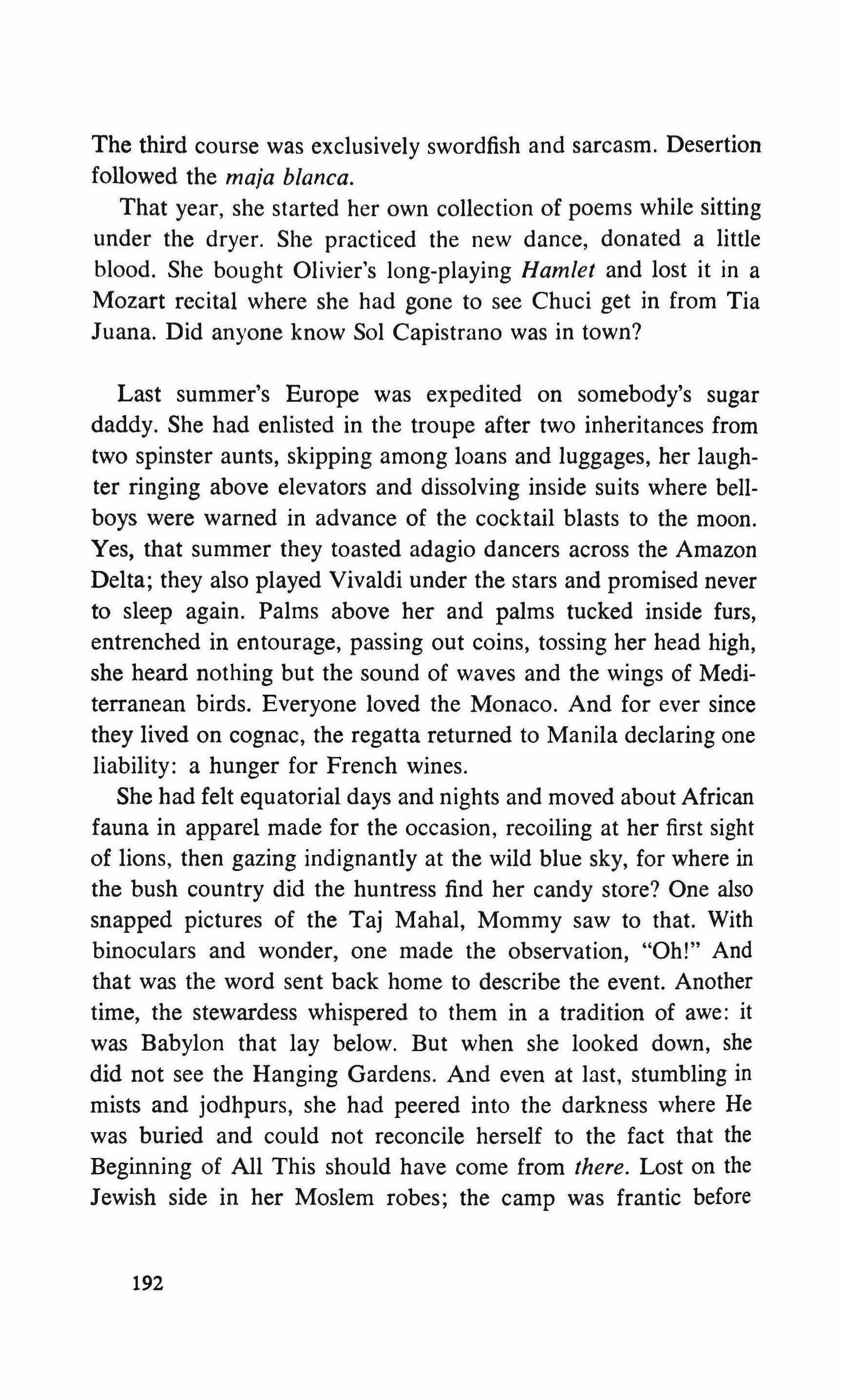
The third course was exclusively swordfish and sarcasm. Desertion followed the maja blanca.
That year, she started her own collection of poems while sitting under the dryer. She practiced the new dance, donated a little blood. She bought Olivier's long-playing Hamlet and lost it in a Mozart recital where she had gone to see Chuci get in from Tia Juana. Did anyone know Sol Capistrano was in town?
Last summer's Europe was expedited on somebody's sugar daddy. She had enlisted in the troupe after two inheritances from two spinster aunts, skipping among loans and luggages, her laughter ringing above elevators and dissolving inside suits where bellboys were warned in advance of the cocktail blasts to the moon. Yes, that summer they toasted adagio dancers across the Amazon Delta; they also played Vivaldi under the stars and promised never to sleep again. Palms above her and palms tucked inside furs, entrenched in entourage, passing out coins, tossing her head high, she heard nothing but the sound of waves and the wings of Mediterranean birds. Everyone loved the Monaco. And for ever since they lived on cognac, the regatta returned to Manila declaring one liability: a hunger for French wines.
She had felt equatorial days and nights and moved about African fauna in apparel made for the occasion, recoiling at her first sight of lions, then gazing indignantly at the wild blue sky, for where in the bush country did the huntress find her candy store? One also snapped pictures of the Taj Mahal, Mommy saw to that. With binoculars and wonder, one made the observation, "Oh!" And that was the word sent back home to describe the event. Another time, the stewardess whispered to them in a tradition of awe: it was Babylon that lay below. But when she looked down, she did not see the Hanging Gardens. And even at last, stumbling in mists and jodhpurs, she had peered into the darkness where He was buried and could not reconcile herself to the fact that the Beginning of All This should have come from there. Lost on the Jewish side in her Moslem robes; the camp was frantic before
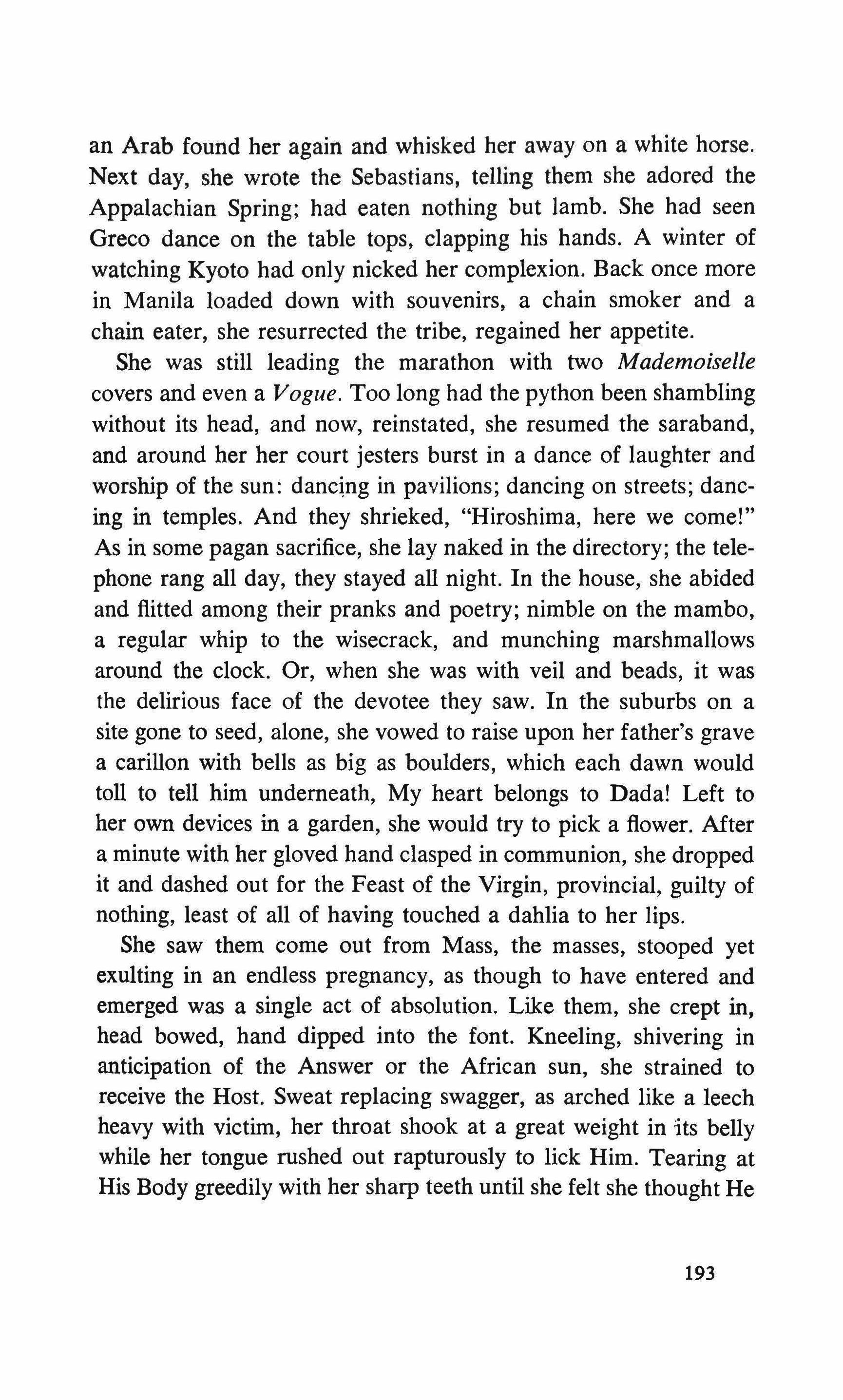
an Arab found her again and whisked her away on a white horse. Next day, she wrote the Sebastians, telling them she adored the Appalachian Spring; had eaten nothing but lamb. She had seen Greco dance on the table tops, clapping his hands. A winter of watching Kyoto had only nicked her complexion. Back once more in Manila loaded down with souvenirs, a chain smoker and a chain eater, she resurrected the tribe, regained her appetite.
She was still leading the marathon with two Mademoiselle covers and even a Vogue. Too long had the python been shambling without its head, and now, reinstated, she resumed the saraband, and around her her court jesters burst in a dance of laughter and worship of the sun: dancing in pavilions; dancing on streets; dancing in temples. And they shrieked, "Hiroshima, here we come!" As in some pagan sacrifice, she lay naked in the directory; the telephone rang all day, they stayed all night. In the house, she abided and flitted among their pranks and poetry; nimble on the mambo, a regular whip to the wisecrack, and munching marshmallows around the clock. Or, when she was with veil and beads, it was the delirious face of the devotee they saw. In the suburbs on a site gone to seed, alone, she vowed to raise upon her father's grave a carillon with bells as big as boulders, which each dawn would toll to tell him underneath, My heart belongs to Dada! Left to her own devices in a garden, she would try to pick a flower. After a minute with her gloved hand clasped in communion, she dropped it and dashed out for the Feast of the Virgin, provincial, guilty of nothing, least of all of having touched a dahlia to her lips. She saw them come out from Mass, the masses, stooped yet exulting in an endless pregnancy, as though to have entered and emerged was a single act of absolution. Like them, she crept in, head bowed, hand dipped into the font. Kneeling, shivering in anticipation of the Answer or the African sun, she strained to receive the Host. Sweat replacing swagger, as arched like a leech heavy with victim, her throat shook at a great weight in its belly while her tongue rushed out rapturously to lick Him. Tearing at His Body greedily with her sharp teeth until she felt she thought He
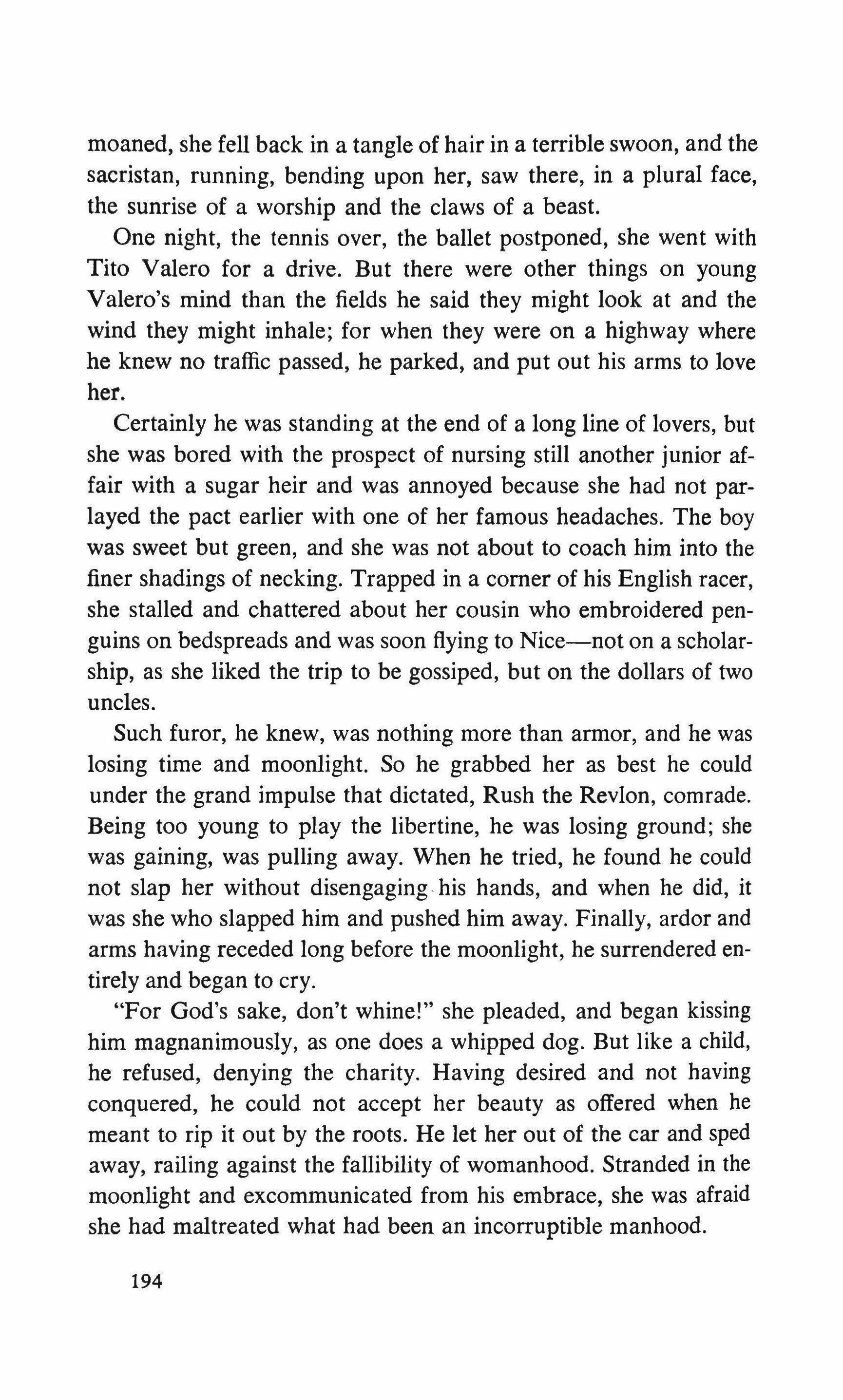
moaned, she fell back in a tangle of hair in a terrible swoon, and the sacristan, running, bending upon her, saw there, in a plural face, the sunrise of a worship and the claws of a beast.
One night, the tennis over, the ballet postponed, she went with Tito Valero for a drive. But there were other things on young Valero's mind than the fields he said they might look at and the wind they might inhale; for when they were on a highway where he knew no traffic passed, he parked, and put out his arms to love her.
Certainly he was standing at the end of a long line of lovers, but she was bored with the prospect of nursing still another junior affair with a sugar heir and was annoyed because she had not parlayed the pact earlier with one of her famous headaches. The boy was sweet but green, and she was not about to coach him into the finer shadings of necking. Trapped in a comer of his English racer, she stalled and chattered about her cousin who embroidered penguins on bedspreads and was soon flying to Nice-not on a scholarship, as she liked the trip to be gossiped, but on the dollars of two uncles.
Such furor, he knew, was nothing more than armor, and he was losing time and moonlight. So he grabbed her as best he could under the grand impulse that dictated, Rush the Revlon, comrade. Being too young to play the libertine, he was losing ground; she was gaining, was pulling away. When he tried, he found he could not slap her without disengaging. his hands, and when he did, it was she who slapped him and pushed him away. Finally, ardor and arms having receded long before the moonlight, he surrendered entirely and began to cry.
"For God's sake, don't whine!" she pleaded, and began kissing him magnanimously, as one does a whipped dog. But like a child, he refused, denying the charity. Having desired and not having conquered, he could not accept her beauty as offered when he meant to rip it out by the roots. He let her out of the car and sped away, railing against the fallibility of womanhood. Stranded in the moonlight and excommunicated from his embrace, she was afraid she had maltreated what had been an incorruptible manhood.
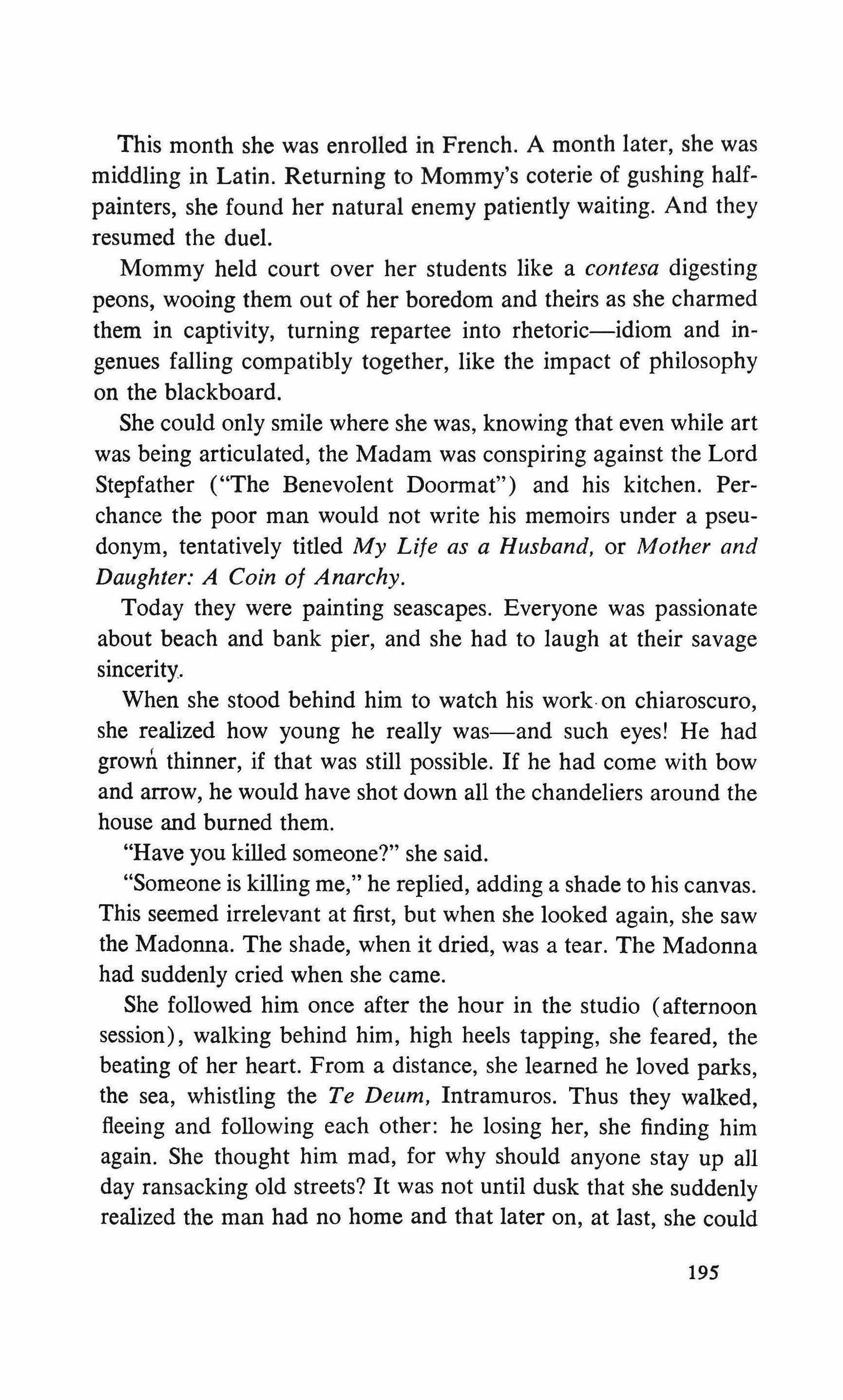
This month she was enrolled in French. A month later, she was middling in Latin. Returning to Mommy's coterie of gushing halfpainters, she found her natural enemy patiently waiting. And they resumed the duel.
Mommy held court over her students like a contesa digesting peons, wooing them out of her boredom and theirs as she charmed them in captivity, turning repartee into rhetoric-idiom and ingenues falling compatibly together, like the impact of philosophy on the blackboard.
She could only smile where she was, knowing that even while art was being articulated, the Madam was conspiring against the Lord Stepfather ("The Benevolent Doormat") and his kitchen. Perchance the poor man would not write his memoirs under a pseudonym, tentatively titled My Life as a Husband, or Mother and Daughter: A Coin of Anarchy.
Today they were painting seascapes. Everyone was passionate about beach and bank pier, and she had to laugh at their savage sincerity.
When she stood behind him to watch his work on chiaroscuro, she realized how young he really was-and such eyes! He had grown thinner, if that was still possible. If he had come with bow and arrow, he would have shot down all the chandeliers around the house and burned them.
"Have you killed someone?" she said.
"Someone is killing me," he replied, adding a shade to his canvas. This seemed irrelevant at first, but when she looked again, she saw the Madonna. The shade, when it dried, was a tear. The Madonna had suddenly cried when she came.
She followed him once after the hour in the studio (afternoon session), walking behind him, high heels tapping, she feared, the beating of her heart. From a distance, she learned he loved parks, the sea, whistling the Te Deum, Intramuros. Thus they walked, fleeing and following each other: he losing her, she finding him again. She thought him mad, for why should anyone stay up all day ransacking old streets? It was not until dusk that she suddenly realized the man had no home and that later on, at last, she could
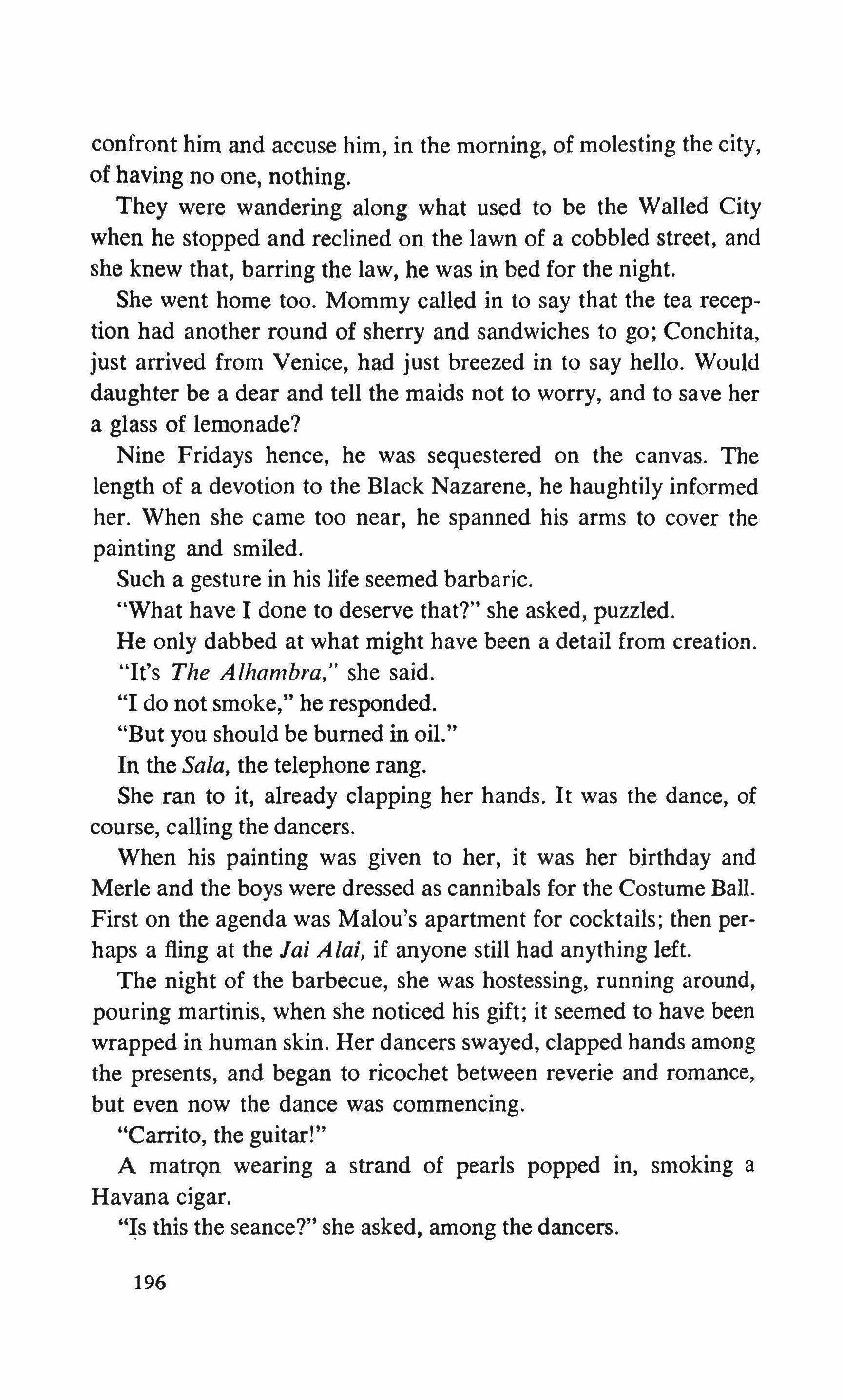
confront him and accuse him, in the morning, of molesting the city, of having no one, nothing.
They were wandering along what used to be the Walled City when he stopped and reclined on the lawn of a cobbled street, and she knew that, barring the law, he was in bed for the night.
She went home too. Mommy called in to say that the tea reception had another round of sherry and sandwiches to go; Conchita, just arrived from Venice, had just breezed in to say hello. Would daughter be a dear and tell the maids not to worry, and to save her a glass of lemonade?
Nine Fridays hence, he was sequestered on the canvas. The length of a devotion to the Black Nazarene, he haughtily informed her. When she came too near, he spanned his arms to cover the painting and smiled.
Such a gesture in his life seemed barbaric.
"What have I done to deserve that?" she asked, puzzled.
He only dabbed at what might have been a detail from creation.
"It's The Alhambra," she said.
"I do not smoke," he responded.
"But you should be burned in oil."
In the Sala, the telephone rang.
She ran to it, already clapping her hands. It was the dance, of course, calling the dancers.
When his painting was given to her, it was her birthday and Merle and the boys were dressed as cannibals for the Costume Ball. First on the agenda was Malou's apartment for cocktails; then perhaps a fling at the Jai Alai, if anyone still had anything left.
The night of the barbecue, she was hostessing, running around, pouring martinis, when she noticed his gift; it seemed to have been wrapped in human skin. Her dancers swayed, clapped hands among the presents, and began to ricochet between reverie and romance, but even now the dance was commencing.
"Carrito, the guitar!"
A matron wearing a strand of pearls popped in, smoking a Havana cigar.
"Is this the seance?" she asked, among the dancers.
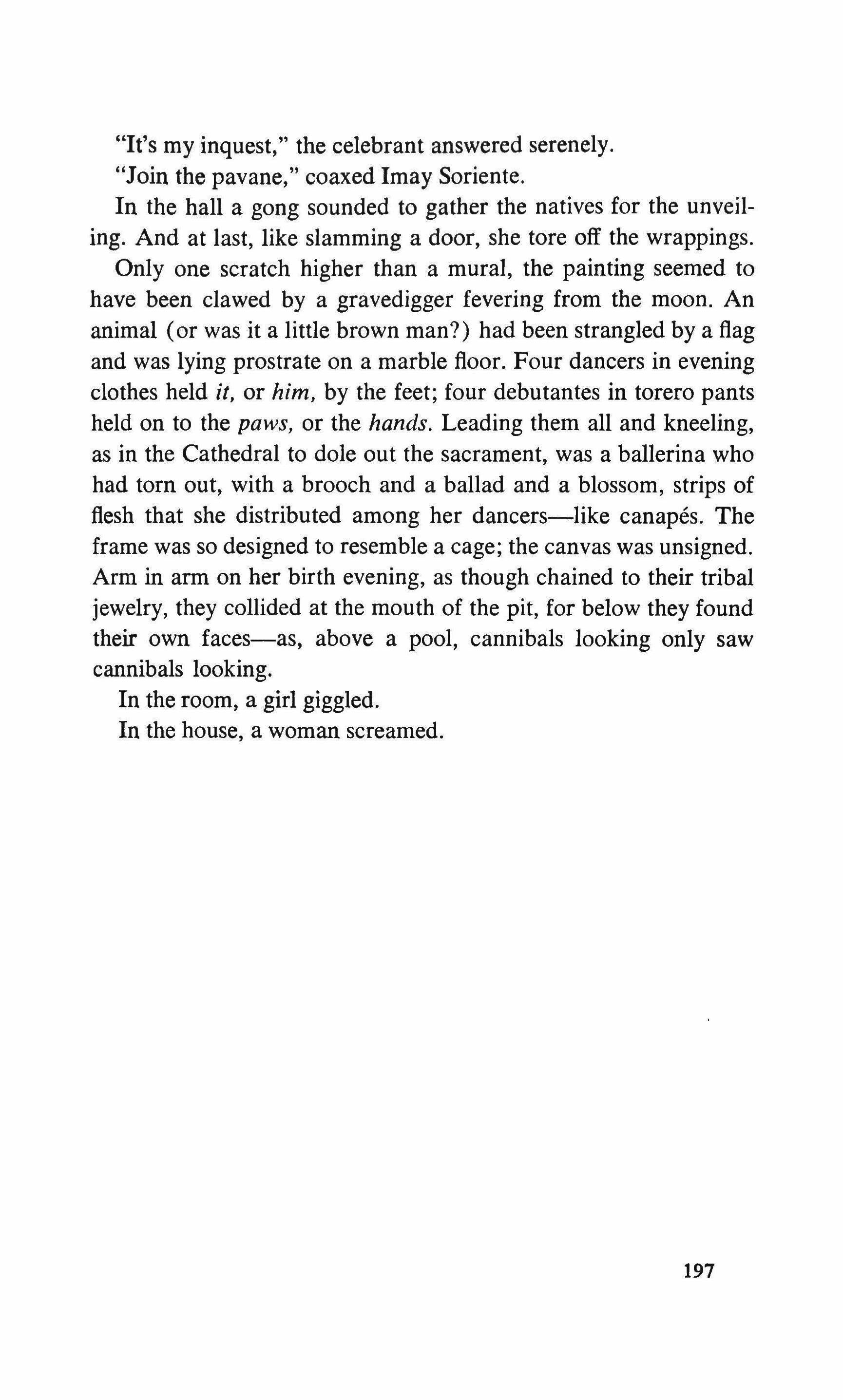
"It's my inquest," the celebrant answered serenely.
"Join the pavane," coaxed Imay Soriente.
In the hall a gong sounded to gather the natives for the unveiling. And at last, like slamming a door, she tore off the wrappings. Only one scratch higher than a mural, the painting seemed to have been clawed by a gravedigger fevering from the moon. An animal (or was it a little brown man?) had been strangled by a flag and was lying prostrate on a marble floor. Four dancers in evening clothes held it, or him, by the feet; four debutantes in torero pants held on to the paws, or the hands. Leading them all and kneeling, as in the Cathedral to dole out the sacrament, was a ballerina who had torn out, with a brooch and a ballad and a blossom, strips of flesh that she distributed among her dancers-like canapes. The frame was so designed to resemble a cage; the canvas was unsigned. Arm in arm on her birth evening, as though chained to their tribal jewelry, they collided at the mouth of the pit, for below they found their own faces-as, above a pool, cannibals looking only saw cannibals looking.
In the room, a girl giggled. In the house, a woman screamed.
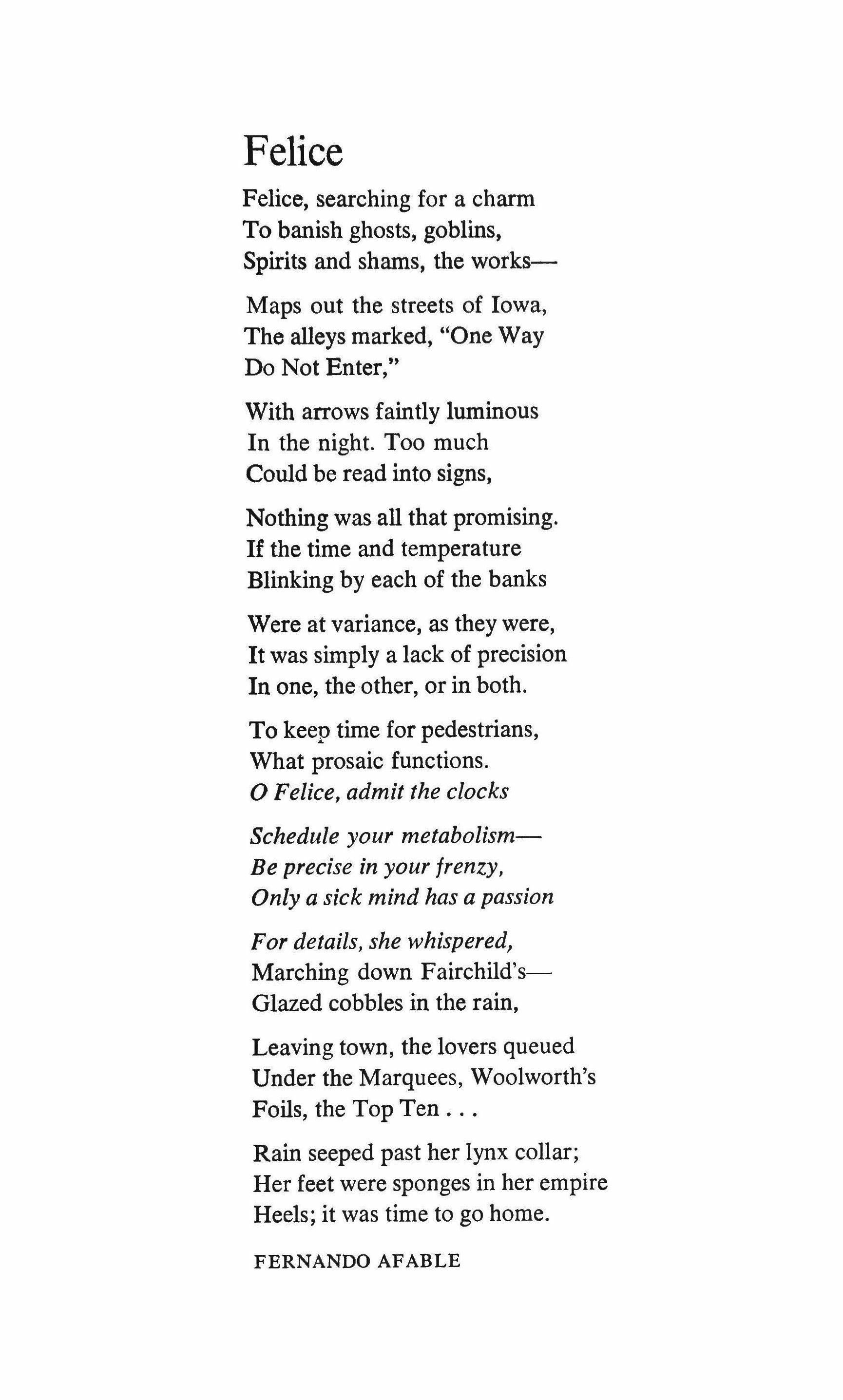
Felice, searching for a charm
To banish ghosts, goblins, Spirits and shams, the works-
Maps out the streets of Iowa, The alleys marked, "One Way Do Not Enter,"
With arrows faintly luminous In the night. Too much Could be read into signs,
Nothing was all that promising. If the time and temperature Blinking by each of the banks
Were at variance, as they were, It was simply a lack of precision In one, the other, or in both.
To keep time for pedestrians, What prosaic functions.
o Felice, admit the clocks
Schedule your metabolismBe precise in your frenzy, Only a sick mind has a passion For details, she whispered, Marching down Fairchild'sGlazed cobbles in the rain, Leaving town, the lovers queued Under the Marquees, Woolworth's Foils, the Top Ten
Rain seeped past her lynx collar; Her feet were sponges in her empire Heels; it was time to go home.
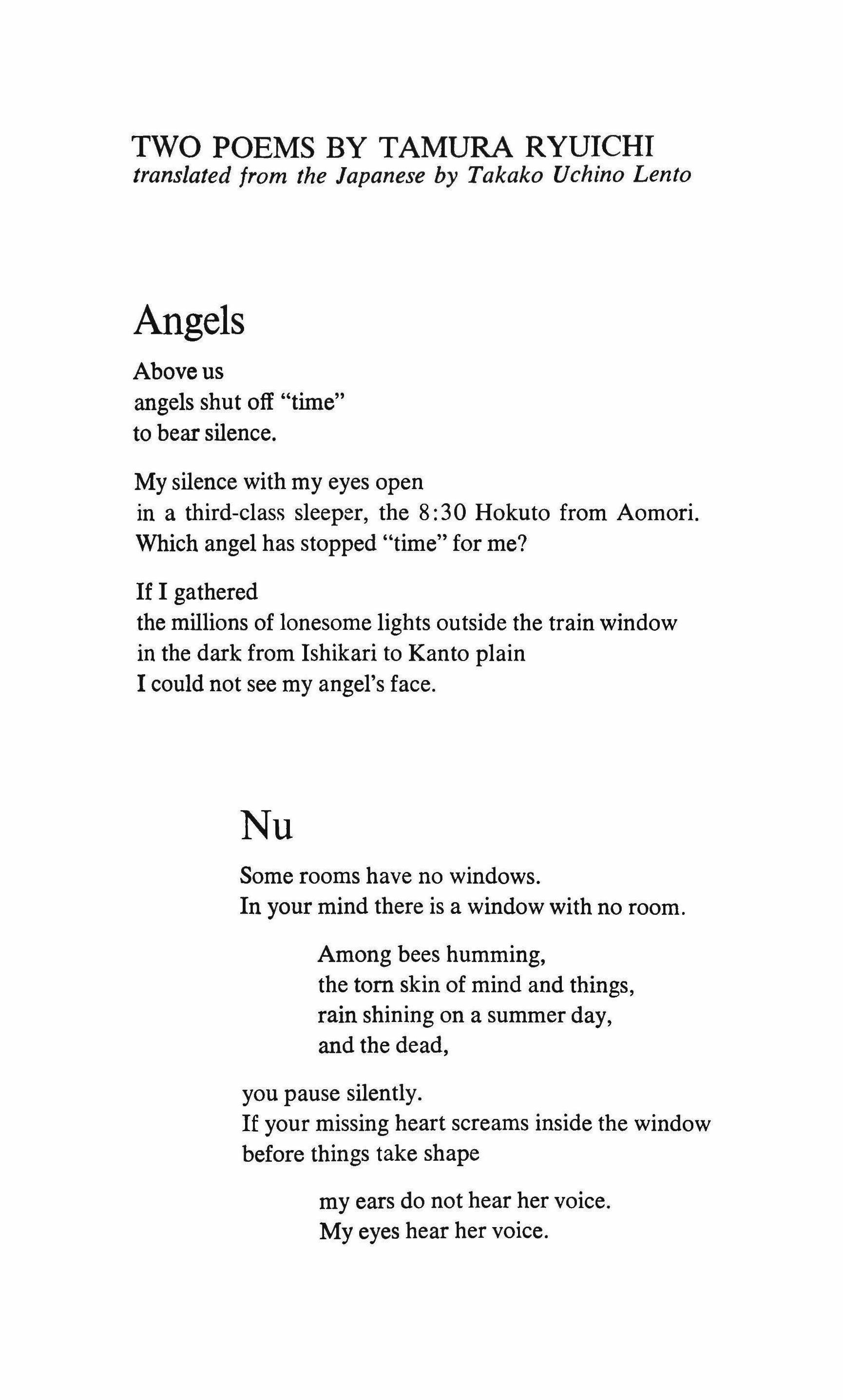
translated from the Japanese by Takaka Uchino Lento
Above us
angels shut off "time" to bear silence.
My silence with my eyes open in a third-class sleeper, the 8:30 Hokuto from Aomori. Which angel has stopped "time" for me?
If I gathered the millions of lonesome lights outside the train window in the dark from Ishikari to Kanto plain I could not see my angel's face.
Some rooms have no windows. In your mind there is a window with no room.
Among bees humming, the tom skin of mind and things, rain shining on a summer day, and the dead,
you pause silently. If your missing heart screams inside the window before things take shape my ears do not hear her voice. My eyes hear her voice.
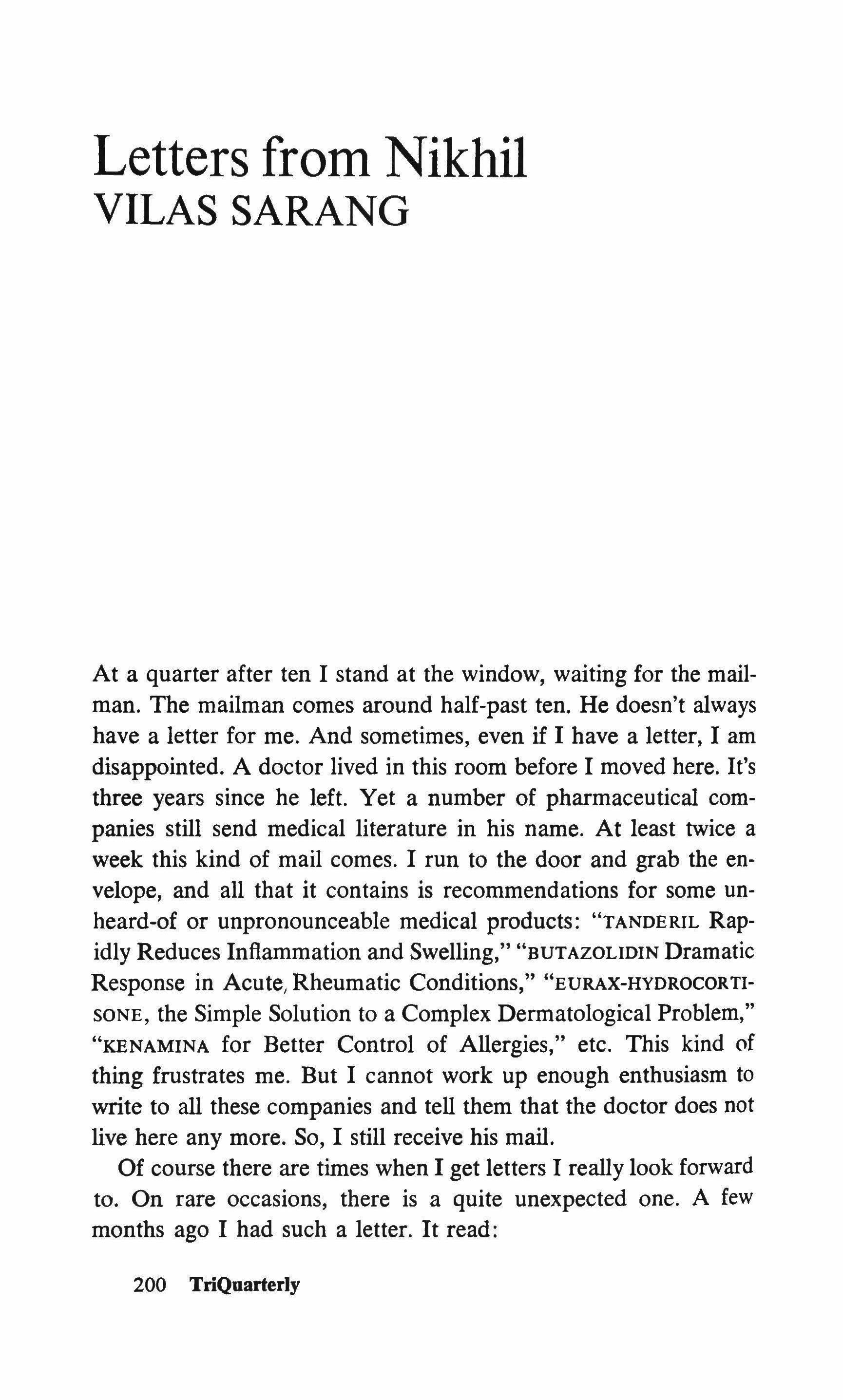
At a quarter after ten I stand at the window, waiting for the mailman. The mailman comes around half-past ten. He doesn't always have a letter for me. And sometimes, even if I have a letter, I am disappointed. A doctor lived in this room before I moved here. It's three years since he left. Yet a number of pharmaceutical companies still send medical literature in his name. At least twice a week this kind of mail comes. I run to the door and grab the envelope, and all that it contains is recommendations for some unheard-of or unpronounceable medical products: "TANDERIL Rapidly Reduces Inflammation and Swelling," "BUTAZOLIDIN Dramatic Response in Acute, Rheumatic Conditions," "EURAX-HYDROCORTISONE, the Simple Solution to a Complex Dermatological Problem," "KENAMINA for Better Control of Allergies," etc. This kind of thing frustrates me. But I cannot work up enough enthusiasm to write to all these companies and tell them that the doctor does not live here any more. So, I still receive his mail.
Of course there are times when I get letters I really look forward to. On rare occasions, there is a quite unexpected one. A few months ago I had such a letter. It read:
200 TriQuarterly
My dear Babi Pilankar,
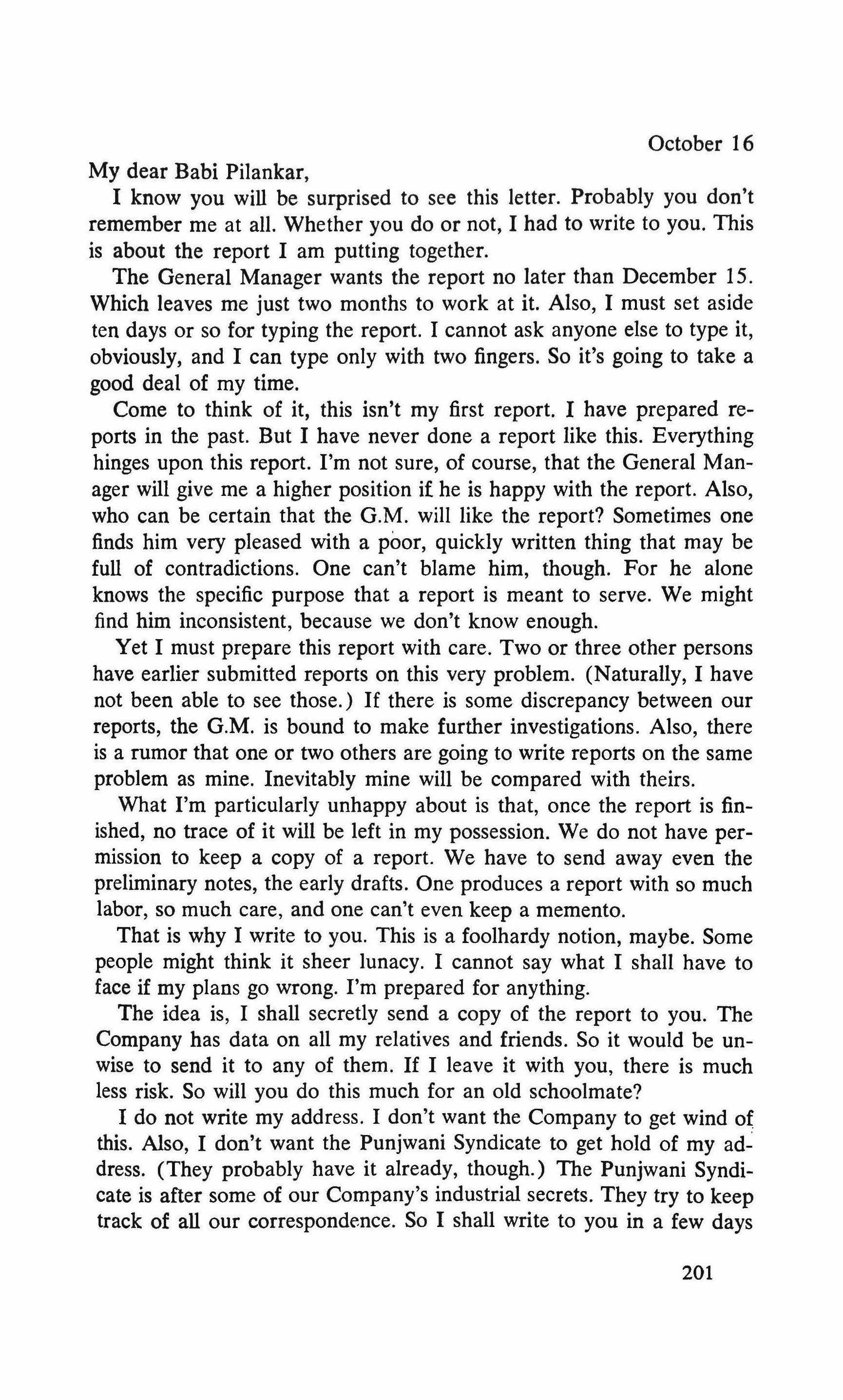
October 16
I know you will be surprised to see this letter. Probably you don't remember me at all. Whether you do or not, I had to write to you. This is about the report I am putting together.
The General Manager wants the report no later than December 15. Which leaves me just two months to work at it. Also, I must set aside ten days or so for typing the report. I cannot ask anyone else to type it, obviously, and I can type only with two fingers. So it's going to take a good deal of my time.
Come to think of it, this isn't my first report. I have prepared reports in the past. But I have never done a report like this. Everything hinges upon this report. I'm not sure, of course, that the General Manager will give me a higher position if he is happy with the report. Also, who can be certain that the G.M. will like the report? Sometimes one finds him very pleased with a poor, quickly written thing that may be full of contradictions. One can't blame him, though. For he alone knows the specific purpose that a report is meant to serve. We might find him inconsistent, because we don't know enough.
Yet I must prepare this report with care. Two or three other persons have earlier submitted reports on this very problem. (Naturally, I have not been able to see those.) If there is some discrepancy between our reports, the G.M. is bound to make further investigations. Also, there is a rumor that one or two others are going to write reports on the same problem as mine. Inevitably mine will be compared with theirs.
What I'm particularly unhappy about is that, once the report is finished, no trace of it will be left in my possession. We do not have permission to keep a copy of a report. We have to send away even the preliminary notes, the early drafts. One produces a report with so much labor, so much care, and one can't even keep a memento.
That is why I write to you. This is a foolhardy notion, maybe. Some people might think it sheer lunacy. I cannot say what I shall have to face if my plans go wrong. I'm prepared for anything.
The idea is, I shall secretly send a copy of the report to you. The Company has data on all my relatives and friends. So it would be unwise to send it to any of them. If I leave it with you, there is much less risk. So will you do this much for an old schoolmate?
I do not write my address. I don't want the Company to get wind of this. Also, I don't want the Punjwani Syndicate to get hold of my address. (They probably have it already, though.) The Punjwani Syndicate is after some of our Company's industrial secrets. They try to keep track of all our correspondence. So I shall write to you in a few days
and let you know at what address you could write to me. That's all for the moment.
Yours,
Nikhil BoseNikhil Bose: at first the name mystified me. But the words "an old schoolmate" rang a bell. Bose was my classmate for two years in elementary school at Jamshedpur. I wasn't very close to him really. I have now forgotten even my close friends of those days, so how could I instantly remember Bose? Straining my memory, I faintly recalled a thin boy wearing glasses. He was the only boy in the class with glasses. That's what fixed him in my memory.
It was a typewritten letter. Even the signature was typed. I tried to read the postmark, but it was very faint. So I couldn't figure out where the letter was mailed.
What do you do if you receive such a letter? I read it three or four times and then put it away in the desk drawer.
About two weeks later, I had another letter. It read:
Dear Babi Pilankar,
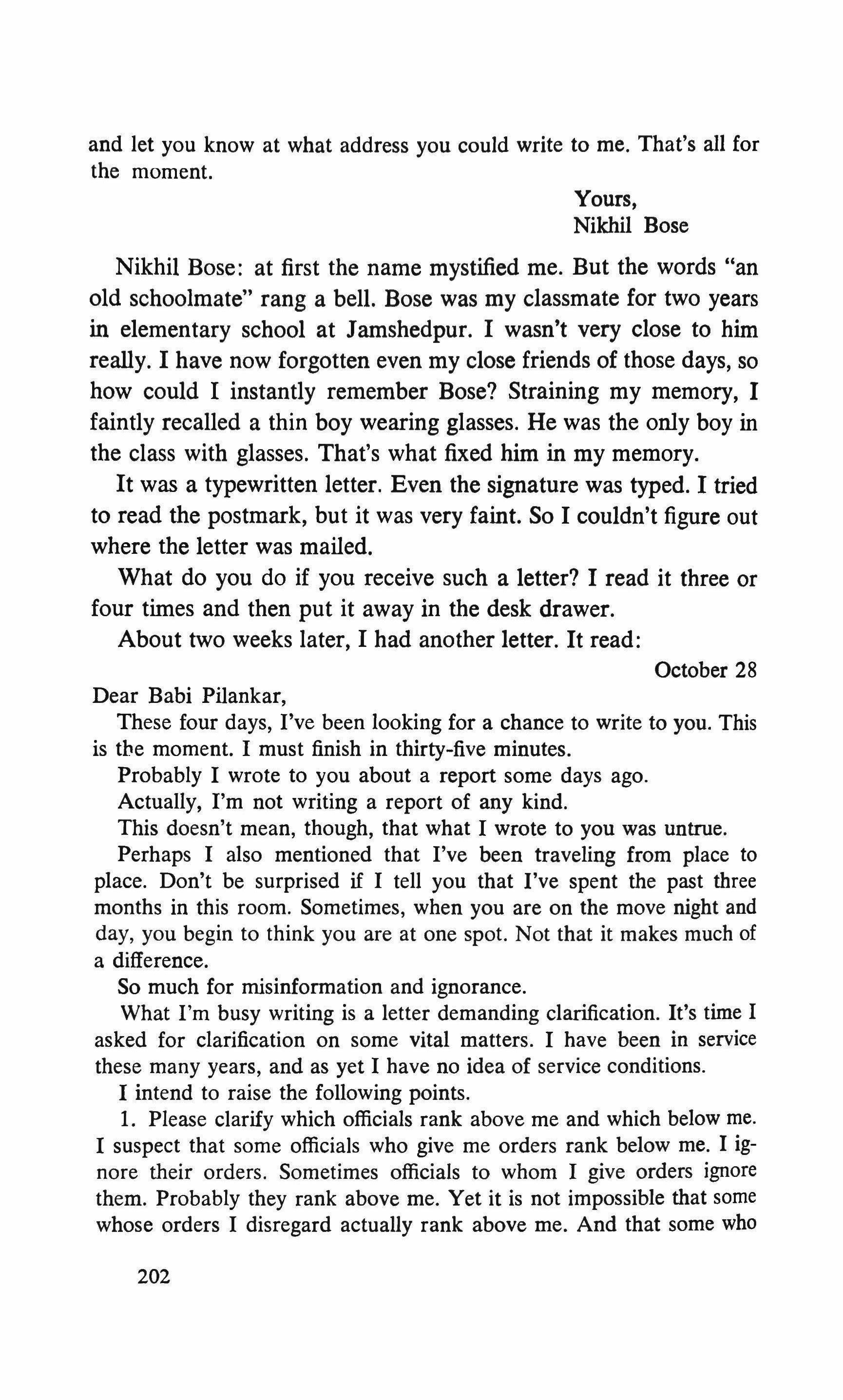
October 28
These four days, I've been looking for a chance to write to you. This is the moment. I must finish in thirty-five minutes.
Probably I wrote to you about a report some days ago.
Actually, I'm not writing a report of any kind.
This doesn't mean, though, that what I wrote to you was untrue. Perhaps I also mentioned that I've been traveling from place to place. Don't be surprised if I tell you that I've spent the past three months in this room. Sometimes, when you are on the move night and day, you begin to think you are at one spot. Not that it makes much of a difference.
So much for misinformation and ignorance.
What I'm busy writing is a letter demanding clarification. It's time I asked for clarification on some vital matters. I have been in service these many years, and as yet I have no idea of service conditions.
I intend to raise the following points.
1. Please clarify which officials rank above me and which below me. I suspect that some officials who give me orders rank below me. I ignore their orders. Sometimes officials to whom I give orders ignore them. Probably they rank above me. Yet it is not impossible that some whose orders I disregard actually rank above me. And that some who 202
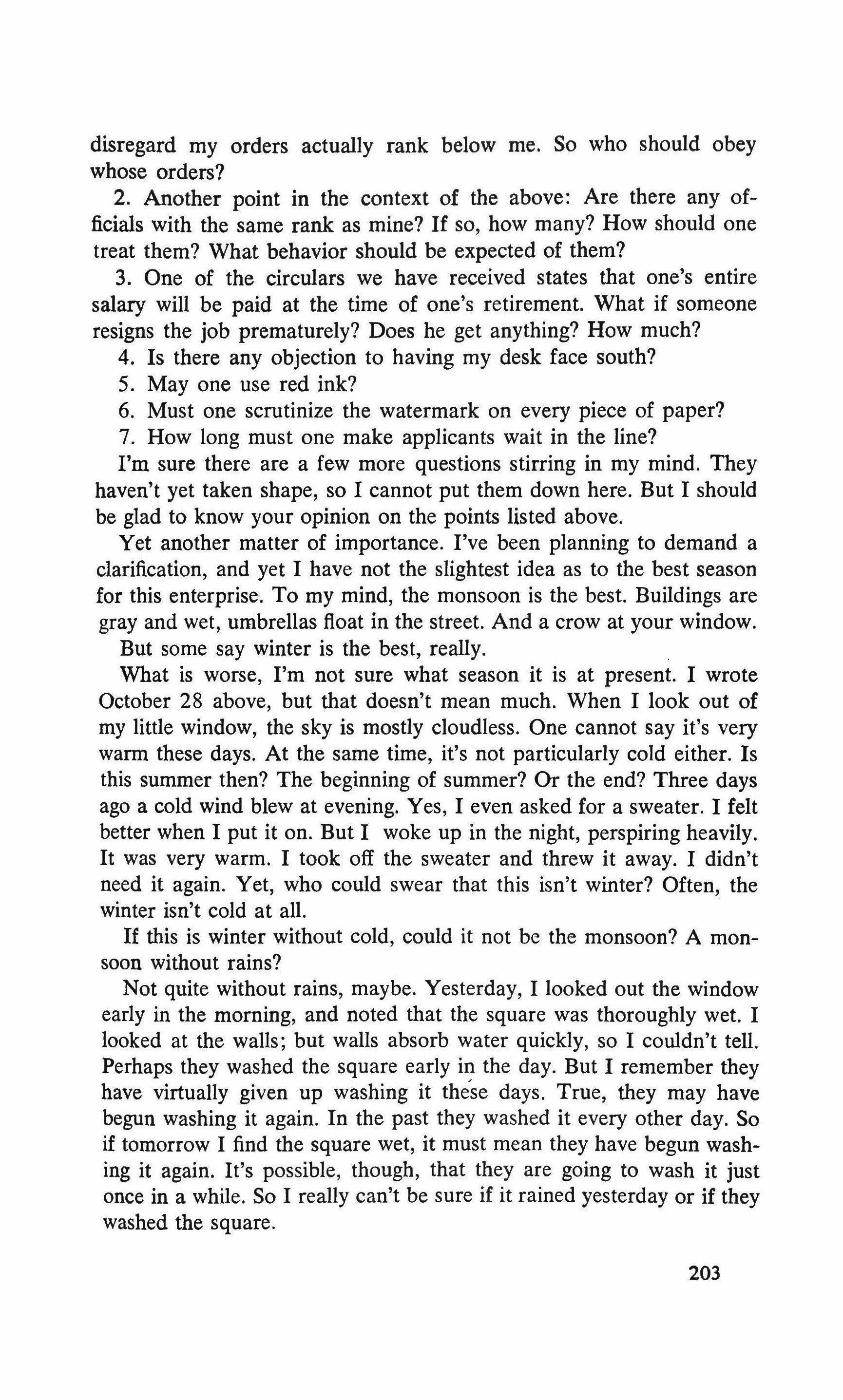
disregard my orders actually rank below me. So who should obey whose orders?
2. Another point in the context of the above: Are there any officials with the same rank as mine? If so, how many? How should one treat them? What behavior should be expected of them?
3. One of the circulars we have received states that one's entire salary will be paid at the time of one's retirement. What if someone resigns the job prematurely? Does he get anything? How much?
4. Is there any objection to having my desk face south?
5. May one use red ink?
6. Must one scrutinize the watermark on every piece of paper?
7. How long must one make applicants wait in the line?
I'm sure there are a few more questions stirring in my mind. They haven't yet taken shape, so I cannot put them down here. But I should be glad to know your opinion on the points listed above.
Yet another matter of importance. I've been planning to demand a clarification, and yet I have not the slightest idea as to the best season for this enterprise. To my mind, the monsoon is the best. Buildings are gray and wet, umbrellas float in the street. And a crow at your window.
But some say winter is the best, really.
What is worse, I'm not sure what season it is at present. I wrote October 28 above, but that doesn't mean much. When I look out of my little window, the sky is mostly cloudless. One cannot say it's very warm these days. At the same time, it's not particularly cold either. Is this summer then? The beginning of summer? Or the end? Three days ago a cold wind blew at evening. Yes, I even asked for a sweater. I felt better when I put it on. But I woke up in the night, perspiring heavily. It was very warm. I took off the sweater and threw it away. I didn't need it again. Yet, who could swear that this isn't winter? Often, the winter isn't cold at all.
If this is winter without cold, could it not be the monsoon? A monsoon without rains?
Not quite without rains, maybe. Yesterday, I looked out the window early in the morning, and noted that the square was thoroughly wet. I looked at the walls; but walls absorb water quickly, so I couldn't tell. Perhaps they washed the square early in the day. But I remember they have virtually given up washing it these days. True, they may have begun washing it again. In the past they washed it every other day. So if tomorrow I find the square wet, it must mean they have begun washing it again. It's possible, though, that they are going to wash it just once in a while. So I really can't be sure if it rained yesterday or if they washed the square.
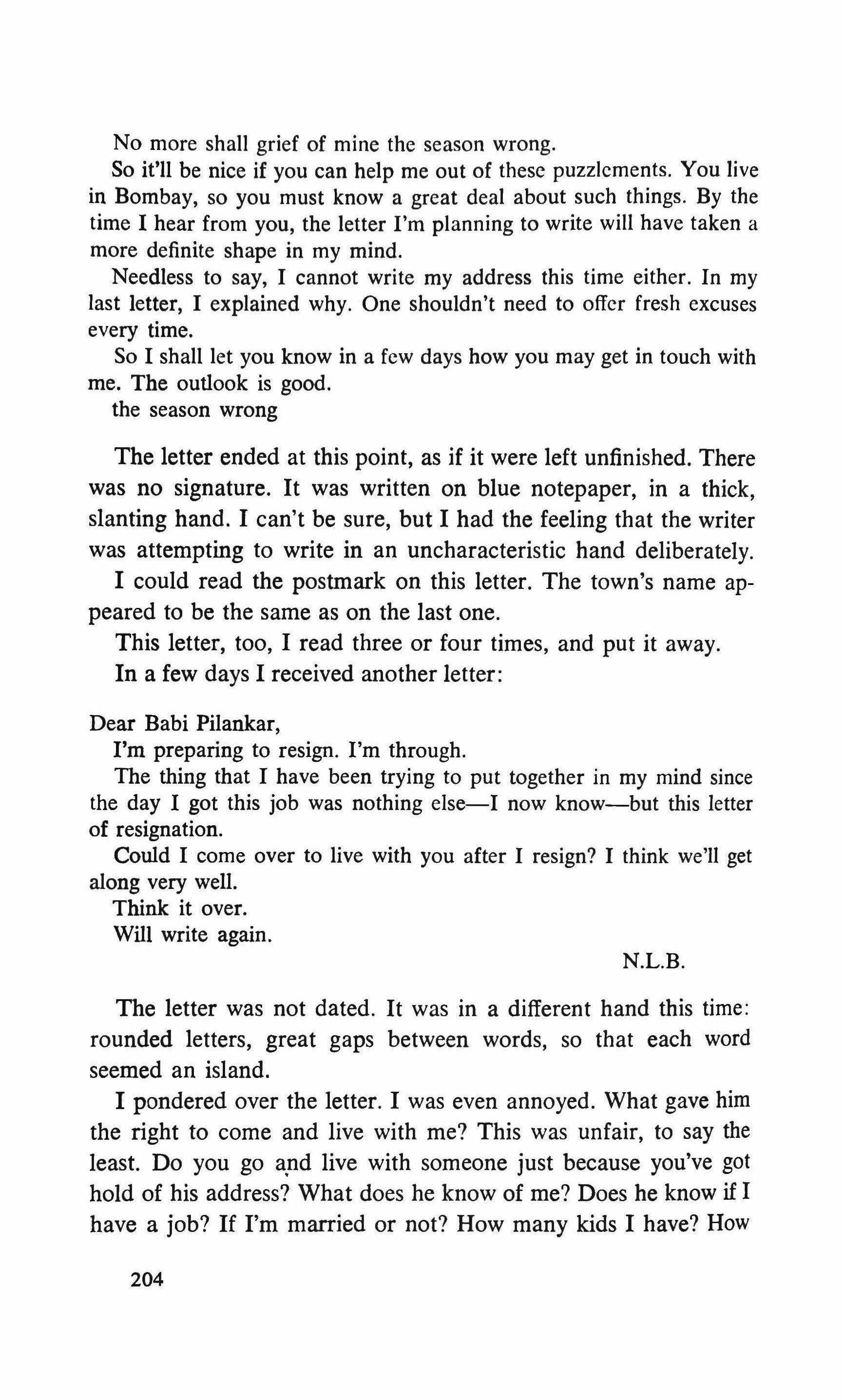
No more shall grief of mine the season wrong.
So it'll be nice if you can help me out of these puzzlements. You live in Bombay, so you must know a great deal about such things. By the time I hear from you, the letter I'm planning to write will have taken a more definite shape in my mind.
Needless to say, I cannot write my address this time either. In my last letter, I explained why. One shouldn't need to offer fresh excuses every time.
So I shall let you know in a few days how you may get in touch with me. The outlook is good.
the season wrong
The letter ended at this point, as if it were left unfinished. There was no signature. It was written on blue notepaper, in a thick, slanting hand. I can't be sure, but I had the feeling that the writer was attempting to write in an uncharacteristic hand deliberately. I could read the postmark on this letter. The town's name appeared to be the same as on the last one.
This letter, too, I read three or four times, and put it away. In a few days I received another letter:
Dear Babi Pilankar,
I'm preparing to resign. I'm through.
The thing that I have been trying to put together in my mind since the day I got this job was nothing else-I now know-but this letter of resignation.
Could I come over to live with you after I resign? I think we'll get along very well. Think it over. Will write again.
N.L.B.The letter was not dated. It was in a different hand this time: rounded letters, great gaps between words, so that each word seemed an island.
I pondered over the letter. I was even annoyed. What gave him the right to come and live with me? This was unfair, to say the least. Do you go and live with someone just because you've got hold of his address? What does he know of me? Does he know if I have a job? If I'm married or not? How many kids I have? How 204
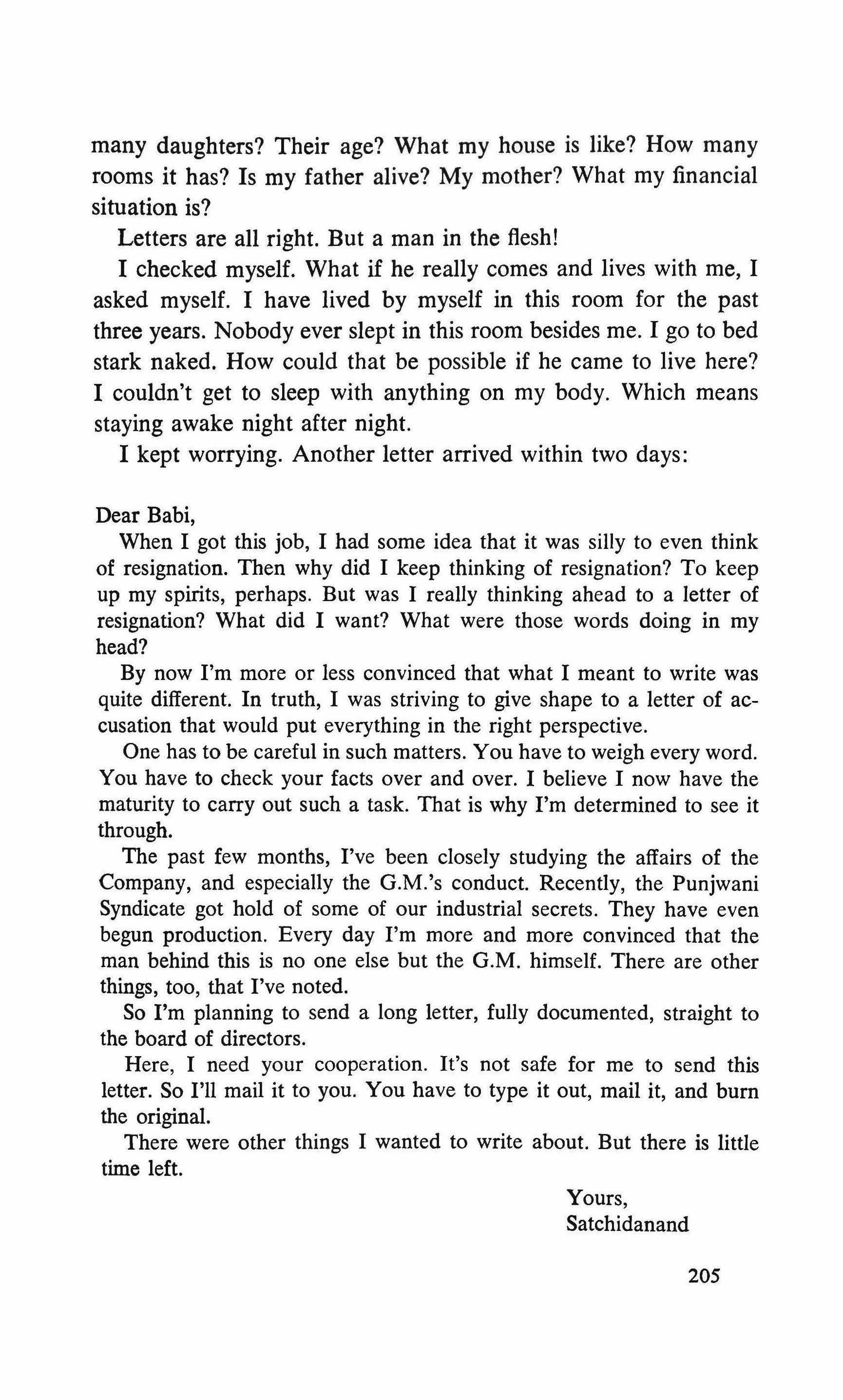
many daughters? Their age? What my house is like? How many rooms it has? Is my father alive? My mother? What my financial situation is?
Letters are all right. But a man in the flesh!
I checked myself. What if he really comes and lives with me, I asked myself. I have lived by myself in this room for the past three years. Nobody ever slept in this room besides me. I go to bed stark naked. How could that be possible if he came to live here? I couldn't get to sleep with anything on my body. Which means staying awake night after night.
I kept worrying. Another letter arrived within two days:
Dear Babi,
When I got this job, I had some idea that it was silly to even think of resignation. Then why did I keep thinking of resignation? To keep up my spirits, perhaps. But was I really thinking ahead to a letter of resignation? What did I want? What were those words doing in my head?
By now I'm more or less convinced that what I meant to write was quite different. In truth, I was striving to give shape to a letter of accusation that would put everything in the right perspective.
One has to be careful in such matters. You have to weigh every word. You have to check your facts over and over. I believe I now have the maturity to carry out such a task. That is why I'm determined to see it through.
The past few months, I've been closely studying the affairs of the Company, and especially the a.M.'s conduct. Recently, the Punjwani Syndicate got hold of some of our industrial secrets. They have even begun production. Every day I'm more and more convinced that the man behind this is no one else but the a.M. himself. There are other things, too, that I've noted.
So I'm planning to send a long letter, fully documented, straight to the board of directors.
Here, I need your cooperation. It's not safe for me to send this letter. So I'll mail it to you. You have to type it out, mail it, and burn the original.
There were other things I wanted to write about. But there is little time left.
Yours, Satchidanand
The letter was typed, except the signature. It's strange, but now I felt sad that he wouldn't come and live with me! I would have gone to the railroad station to receive him. I would have carried his suitcase. I would have hung his jacket on the only clothes hanger in my room. If he hadn't remembered to bring a toothbrush, I would have rushed downstairs and bought him one. I would have taken him to the movies. I was so eager to ask him questions, to exchange views with him!
For two and a half months I had no letter from him. I decided I had better forget him. Then, one day, there was a letter:
February 2, 1967
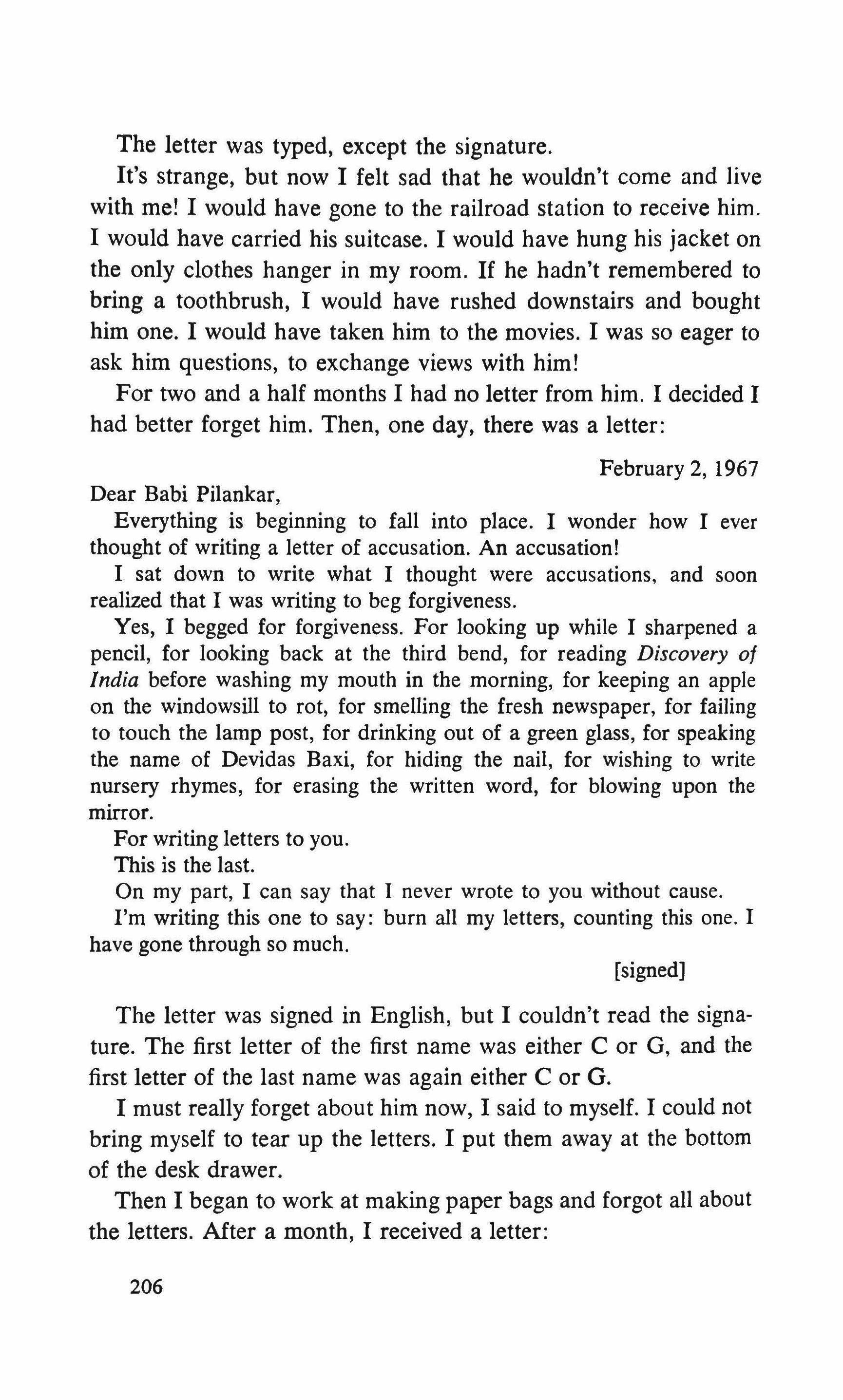
Dear Babi Pilankar,
Everything is beginning to fall into place. I wonder how I ever thought of writing a letter of accusation. An accusation! I sat down to write what I thought were accusations, and soon realized that I was writing to beg forgiveness. Yes, I begged for forgiveness. For looking up while I sharpened a pencil, for looking back at the third bend, for reading Discovery of India before washing my mouth in the morning, for keeping an apple on the windowsill to rot, for smelling the fresh newspaper, for failing to touch the lamp post, for drinking out of a green glass, for speaking the name of Devidas Baxi, for hiding the nail, for wishing to write nursery rhymes, for erasing the written word, for blowing upon the mirror.
For writing letters to you.
This is the last.
On my part, I can say that I never wrote to you without cause. I'm writing this one to say: burn all my letters, counting this one. I have gone through so much.
[signed]
The letter was signed in English, but I couldn't read the signature. The first letter of the first name was either C or G, and the first letter of the last name was again either C or G.
I must really forget about him now, I said to myself. I could not bring myself to tear up the letters. I put them away at the bottom of the desk drawer.
Then I began to work at making paper bags and forgot all about the letters. After a month, I received a letter:
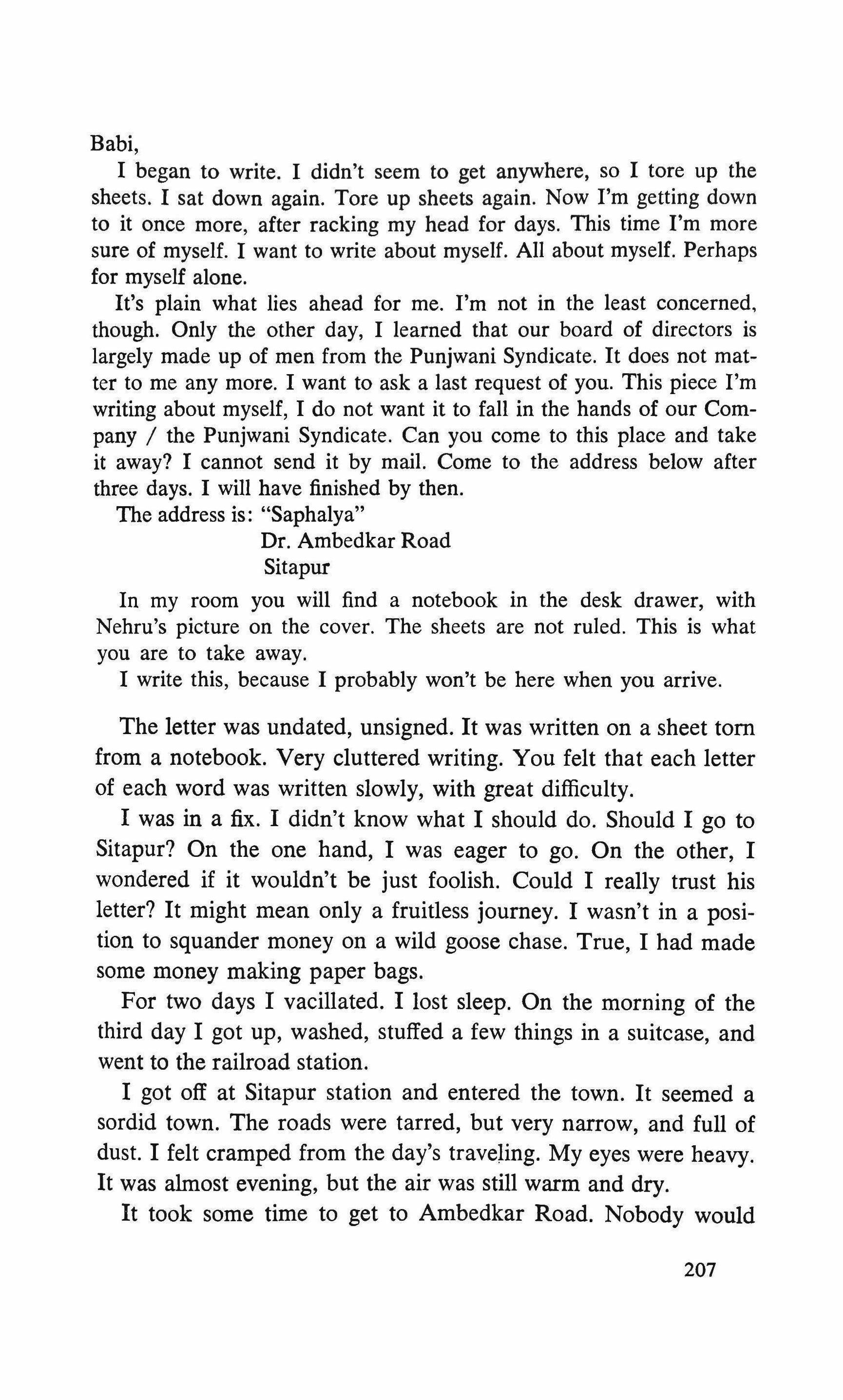
Babi,
I began to write. I didn't seem to get anywhere, so I tore up the sheets. I sat down again. Tore up sheets again. Now I'm getting down to it once more, after racking my head for days. This time I'm more sure of myself. I want to write about myself. All about myself. Perhaps for myself alone.
It's plain what lies ahead for me. I'm not in the least concerned, though. Only the other day, I learned that our board of directors is largely made up of men from the Punjwani Syndicate. It does not matter to me any more. I want to ask a last request of you. This piece I'm writing about myself, I do not want it to fall in the hands of our Company / the Punjwani Syndicate. Can you come to this place and take it away? I cannot send it by mail. Come to the address below after three days. I will have finished by then.
The address is: "Saphalya"
Dr. Ambedkar RoadIn my room you will find a notebook in the desk drawer, with Nehru's picture on the cover. The sheets are not ruled. This is what you are to take away.
I write this, because I probably won't be here when you arrive.
The letter was undated, unsigned. It was written on a sheet tom from a notebook. Very cluttered writing. You felt that each letter of each word was written slowly, with great difficulty.
I was in a fix. I didn't know what I should do. Should I go to Sitapur? On the one hand, I was eager to go. On the other, I wondered if it wouldn't be just foolish. Could I really trust his letter? It might mean only a fruitless journey. I wasn't in a position to squander money on a wild goose chase. True, I had made some money making paper bags.
For two days I vacillated. I lost sleep. On the morning of the third day I got up, washed, stuffed a few things in a suitcase, and went to the railroad station.
I got off at Sitapur station and entered the town. It seemed a sordid town. The roads were tarred, but very narrow, and full of dust. I felt cramped from the day's traveling. My eyes were heavy. It was almost evening, but the air was still warm and dry.
It took some time to get to Ambedkar Road. Nobody would
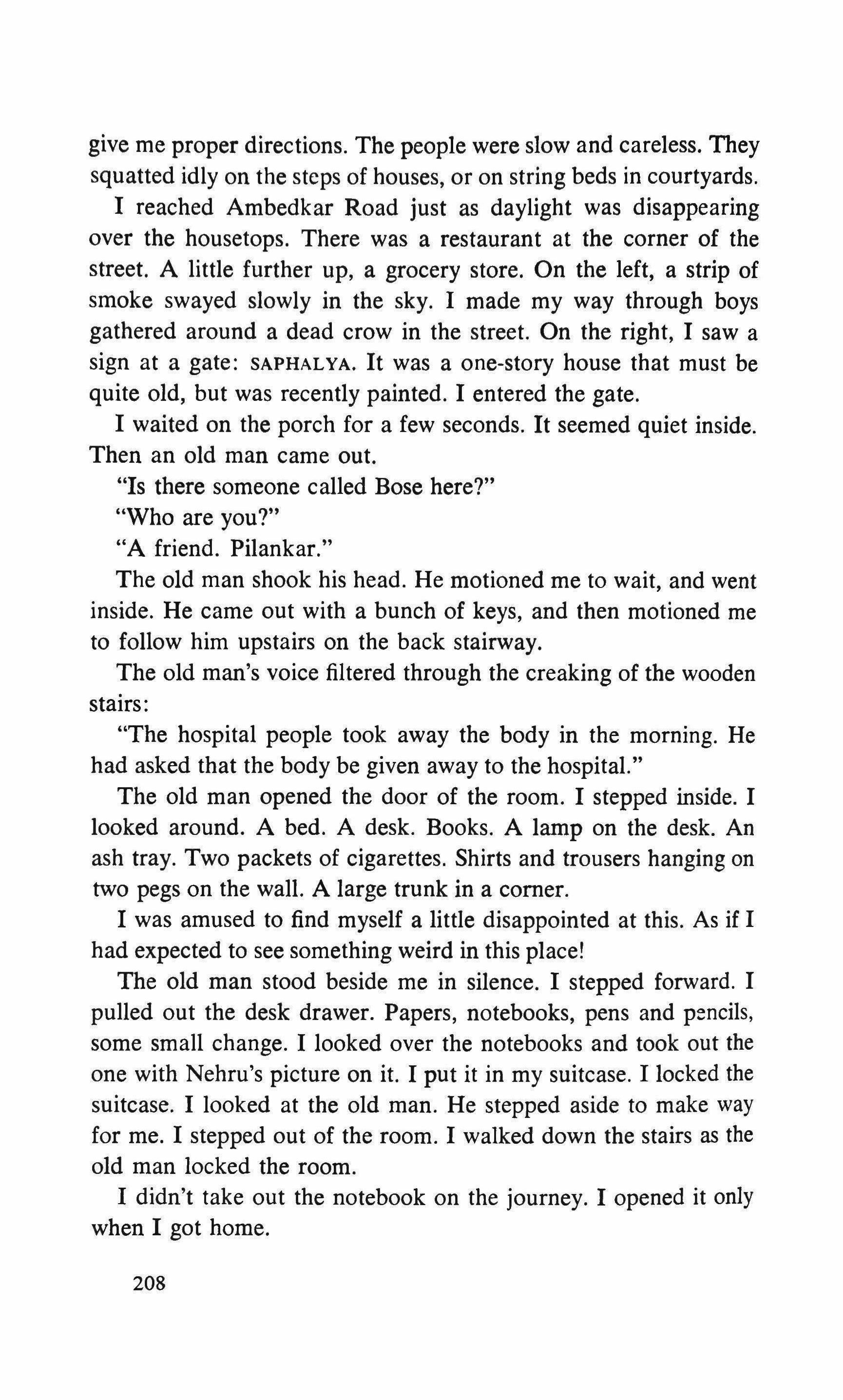
give me proper directions. The people were slow and careless. They squatted idly on the steps of houses, or on string beds in courtyards. I reached Ambedkar Road just as daylight was disappearing over the housetops. There was a restaurant at the corner of the street. A little further up, a grocery store. On the left, a strip of smoke swayed slowly in the sky. I made my way through boys gathered around a dead crow in the street. On the right, I saw a sign at a gate: SAPHALYA. It was a one-story house that must be quite old, but was recently painted. I entered the gate.
I waited on the porch for a few seconds. It seemed quiet inside. Then an old man came out.
"Is there someone called Bose here?"
"Who are you?"
"A friend. Pilankar."
The old man shook his head. He motioned me to wait, and went inside. He came out with a bunch of keys, and then motioned me to follow him upstairs on the back stairway.
The old man's voice filtered through the creaking of the wooden stairs:
"The hospital people took away the body in the morning. He had asked that the body be given away to the hospital."
The old man opened the door of the room. I stepped inside. I looked around. A bed. A desk. Books. A lamp on the desk. An ash tray. Two packets of cigarettes. Shirts and trousers hanging on two pegs on the wall. A large trunk in a corner.
I was amused to find myself a little disappointed at this. As if I had expected to see something weird in this place!
The old man stood beside me in silence. I stepped forward. I pulled out the desk drawer. Papers, notebooks, pens and pencils, some small change. I looked over the notebooks and took out the one with Nehru's picture on it. I put it in my suitcase. I locked the suitcase. I looked at the old man. He stepped aside to make way for me. I stepped out of the room. I walked down the stairs as the old man locked the room.
I didn't take out the notebook on the journey. I opened it only when I got home.
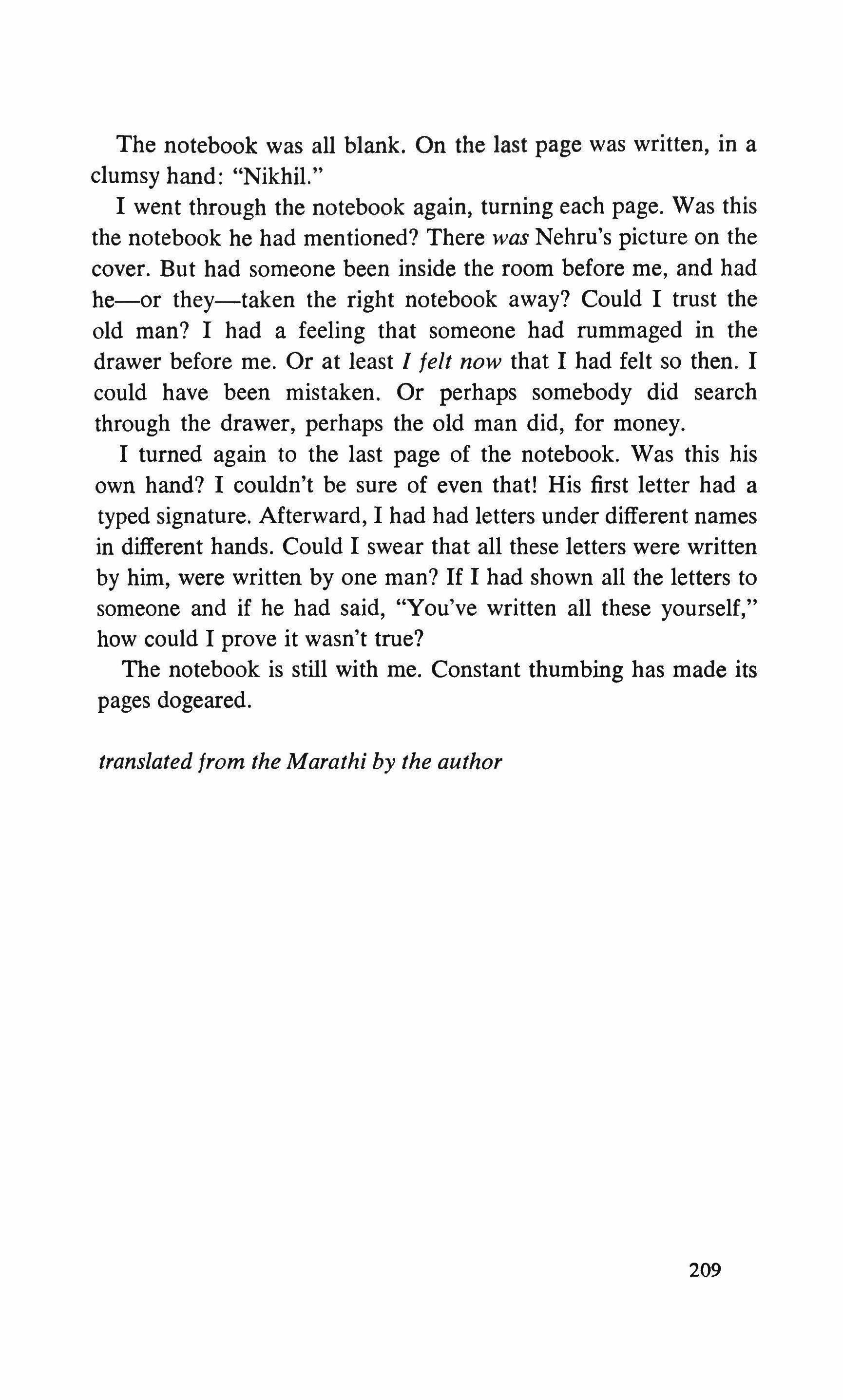
The notebook was all blank. On the last page was written, in a clumsy hand: "Nikhil."
I went through the notebook again, turning each page. Was this the notebook he had mentioned? There was Nehru's picture on the cover. But had someone been inside the room before me, and had he-or they-taken the right notebook away? Could I trust the old man? I had a feeling that someone had rummaged in the drawer before me. Or at least I felt now that I had felt so then. I could have been mistaken. Or perhaps somebody did search through the drawer, perhaps the old man did, for money.
I turned again to the last page of the notebook. Was this his own hand? I couldn't be sure of even that! His first letter had a typed signature. Afterward, I had had letters under different names in different hands. Could I swear that all these letters were written by him, were written by one man? If I had shown all the letters to someone and if he had said, "You've written all these yourself," how could I prove it wasn't true?
The notebook is still with me. Constant thumbing has made its pages dogeared.
translated from the Marathi by the author
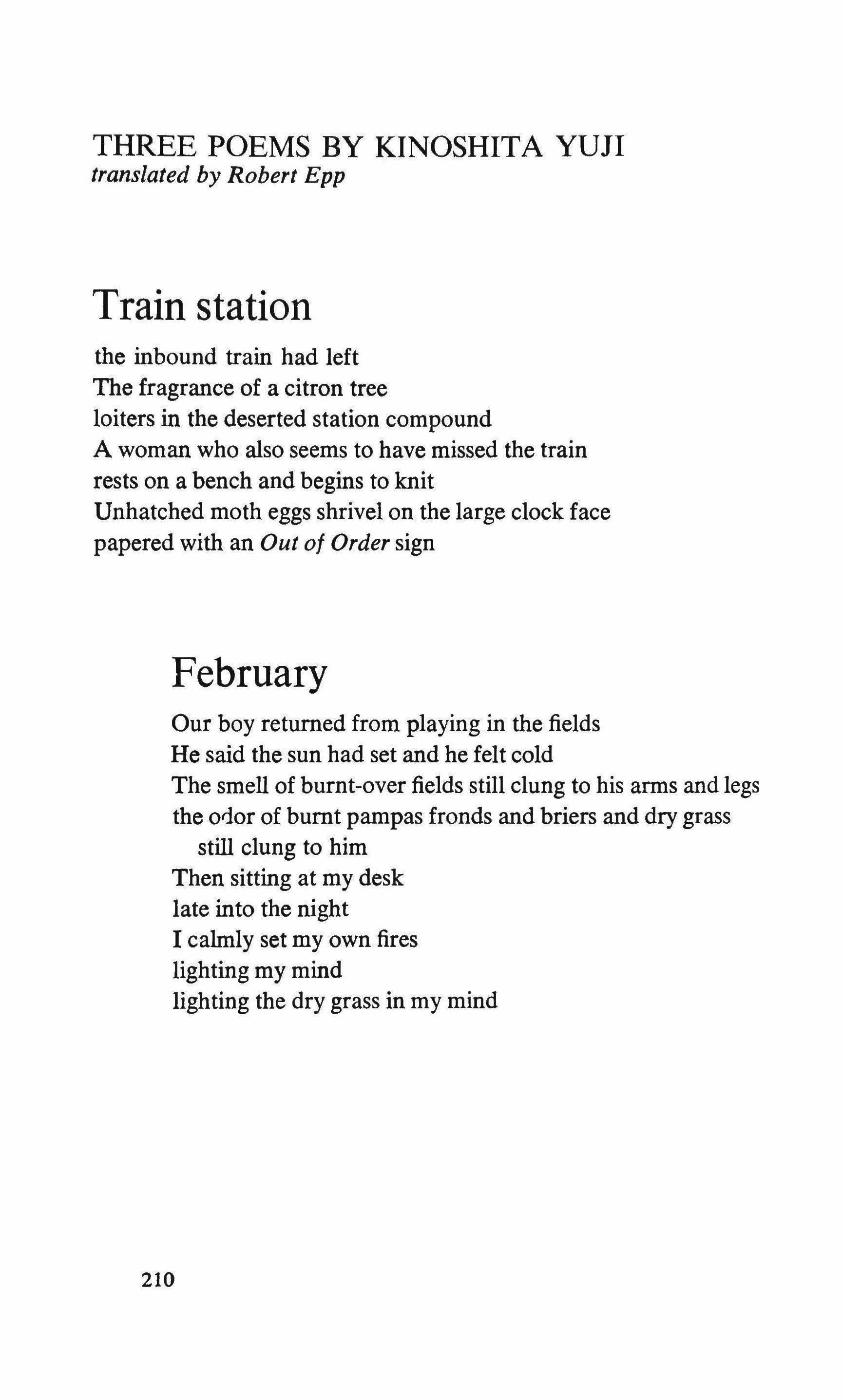
the inbound train had left
The fragrance of a citron tree loiters in the deserted station compound
A woman who also seems to have missed the train rests on a bench and begins to knit
Unhatched moth eggs shrivel on the large clock face papered with an Out 0/ Order sign
Our boy returned from playing in the fields
He said the sun had set and he felt cold
The smell of burnt-over fields still clung to his arms and legs the odor of burnt pampas fronds and briers and dry grass still clung to him
Then sitting at my desk late into the night
I calmly set my own fires lighting my mind lighting the dry grass in my mind
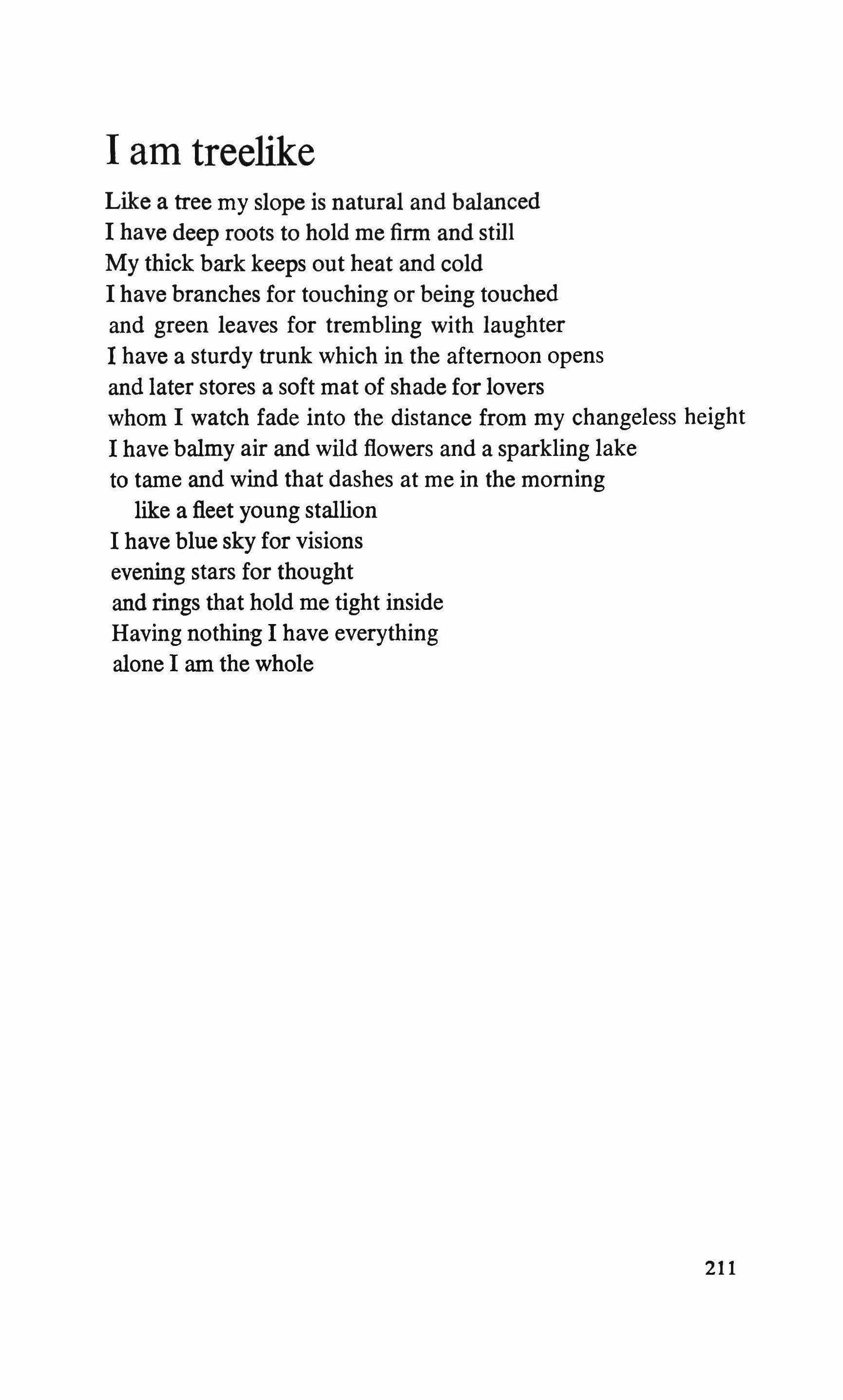
Like a tree my slope is natural and balanced
I have deep roots to hold me firm and still My thick bark keeps out heat and cold
I have branches for touching or being touched and green leaves for trembling with laughter
I have a sturdy trunk which in the afternoon opens and later stores a soft mat of shade for lovers whom I watch fade into the distance from my changeless height
I have balmy air and wild flowers and a sparkling lake to tame and wind that dashes at me in the morning like a fleet young stallion
I have blue sky for visions evening stars for thought and rings that hold me tight inside Having nothing I have everything alone I am the whole
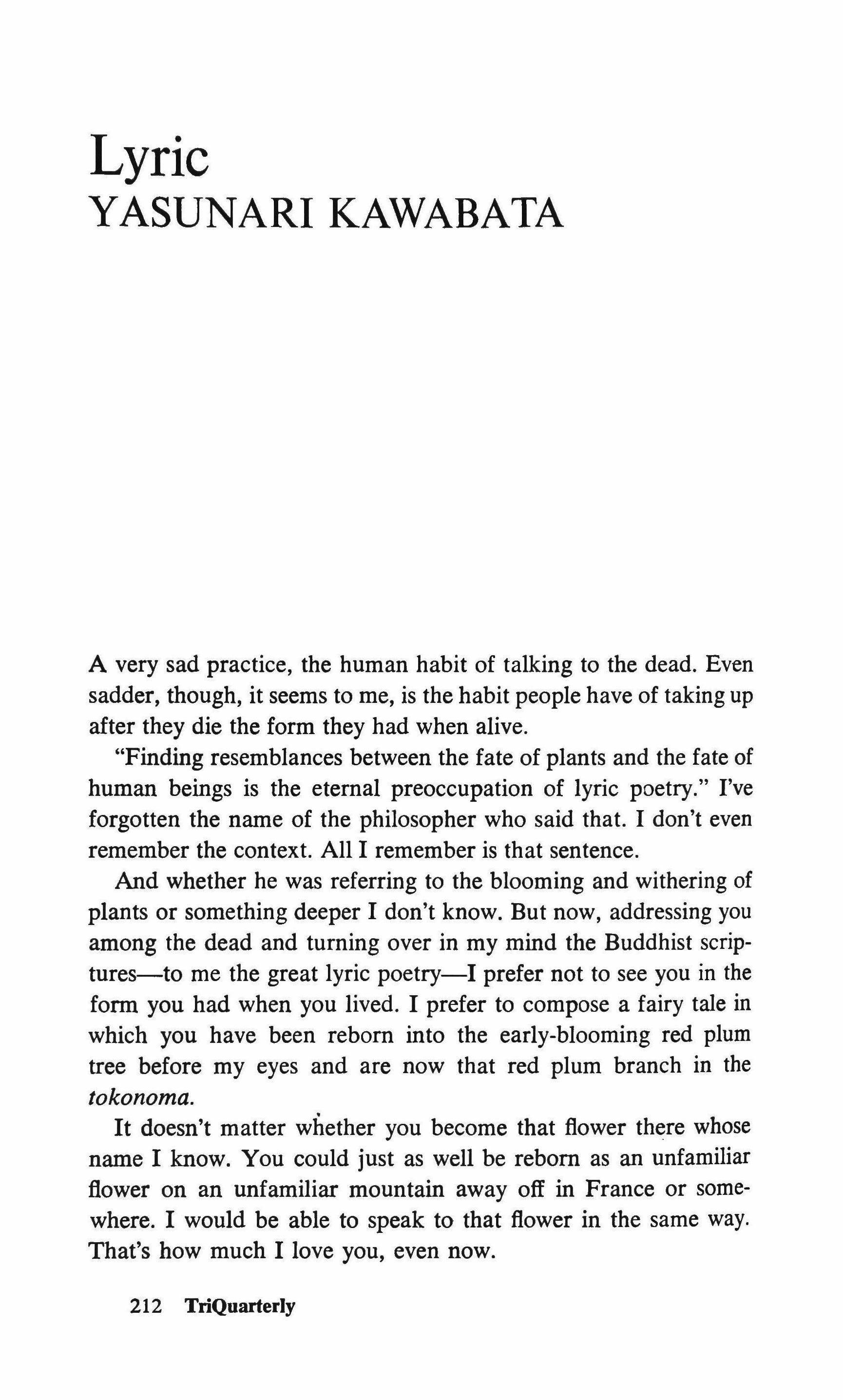
A very sad practice, the human habit of talking to the dead. Even sadder, though, it seems to me, is the habit people have of taking up after they die the form they had when alive.
"Finding resemblances between the fate of plants and the fate of human beings is the eternal preoccupation of lyric poetry." I've forgotten the name of the philosopher who said that. I don't even remember the context. All I remember is that sentence.
And whether he was referring to the blooming and withering of plants or something deeper I don't know. But now, addressing you among the dead and turning over in my mind the Buddhist scriptures-to me the great lyric poetry-I prefer not to see you in the form you had when you lived. I prefer to compose a fairy tale in which you have been reborn into the early-blooming red plum tree before my eyes and are now that red plum branch in the tokonoma.
It doesn't matter whether you become that flower there whose name I know. You could just as well be reborn as an unfamiliar flower on an unfamiliar mountain away off in France or somewhere. I would be able to speak to that flower in the same way. That's how much I love you, even now.
212 TriQuarterJy
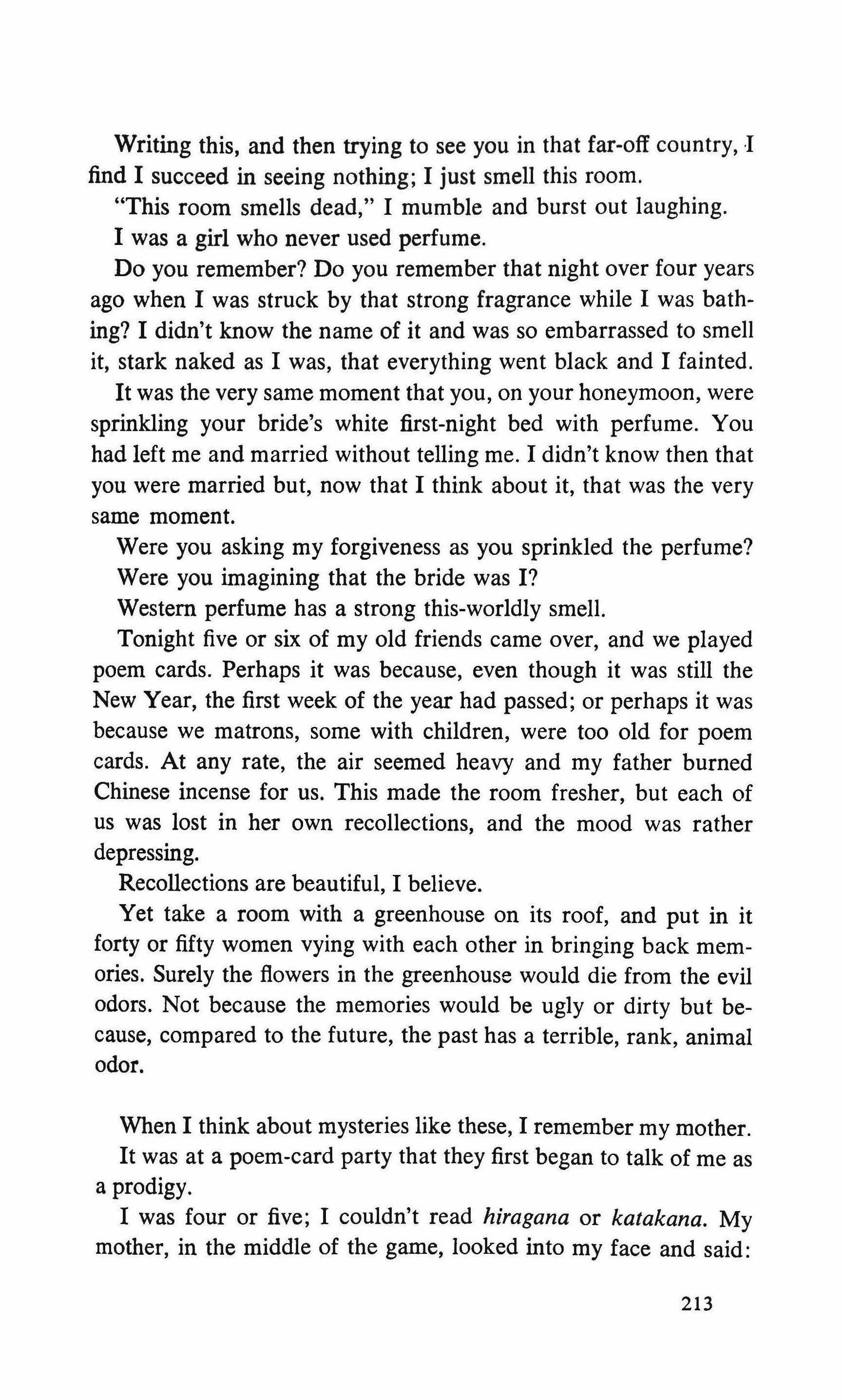
Writing this, and then trying to see you in that far-off country, I find I succeed in seeing nothing; 1 just smell this room.
"This room smells dead," 1 mumble and burst out laughing. I was a girl who never used perfume.
Do you remember? Do you remember that night over four years ago when 1 was struck by that strong fragrance while I was bathing? I didn't know the name of it and was so embarrassed to smell it, stark naked as 1 was, that everything went black and 1 fainted. It was the very same moment that you, on your honeymoon, were sprinkling your bride's white first-night bed with perfume. You had left me and married without telling me. 1 didn't know then that you were married but, now that I think about it, that was the very same moment.
Were you asking my forgiveness as you sprinkled the perfume? Were you imagining that the bride was I?
Western perfume has a strong this-worldly smell. Tonight five or six of my old friends came over, and we played poem cards. Perhaps it was because, even though it was still the New Year, the first week of the year had passed; or perhaps it was because we matrons, some with children, were too old for poem cards. At any rate, the air seemed heavy and my father burned Chinese incense for us. This made the room fresher, but each of us was lost in her own recollections, and the mood was rather depressing.
Recollections are beautiful, 1 believe.
Yet take a room with a greenhouse on its roof, and put in it forty or fifty women vying with each other in bringing back memories. Surely the flowers in the greenhouse would die from the evil odors. Not because the memories would be ugly or dirty but because, compared to the future, the past has a terrible, rank, animal odor.
When I think about mysteries like these, 1 remember my mother. It was at a poem-card party that they first began to talk of me as a prodigy.
1 was four or five; 1 couldn't read hiragana or katakana. My mother, in the middle of the game, looked into my face and said:
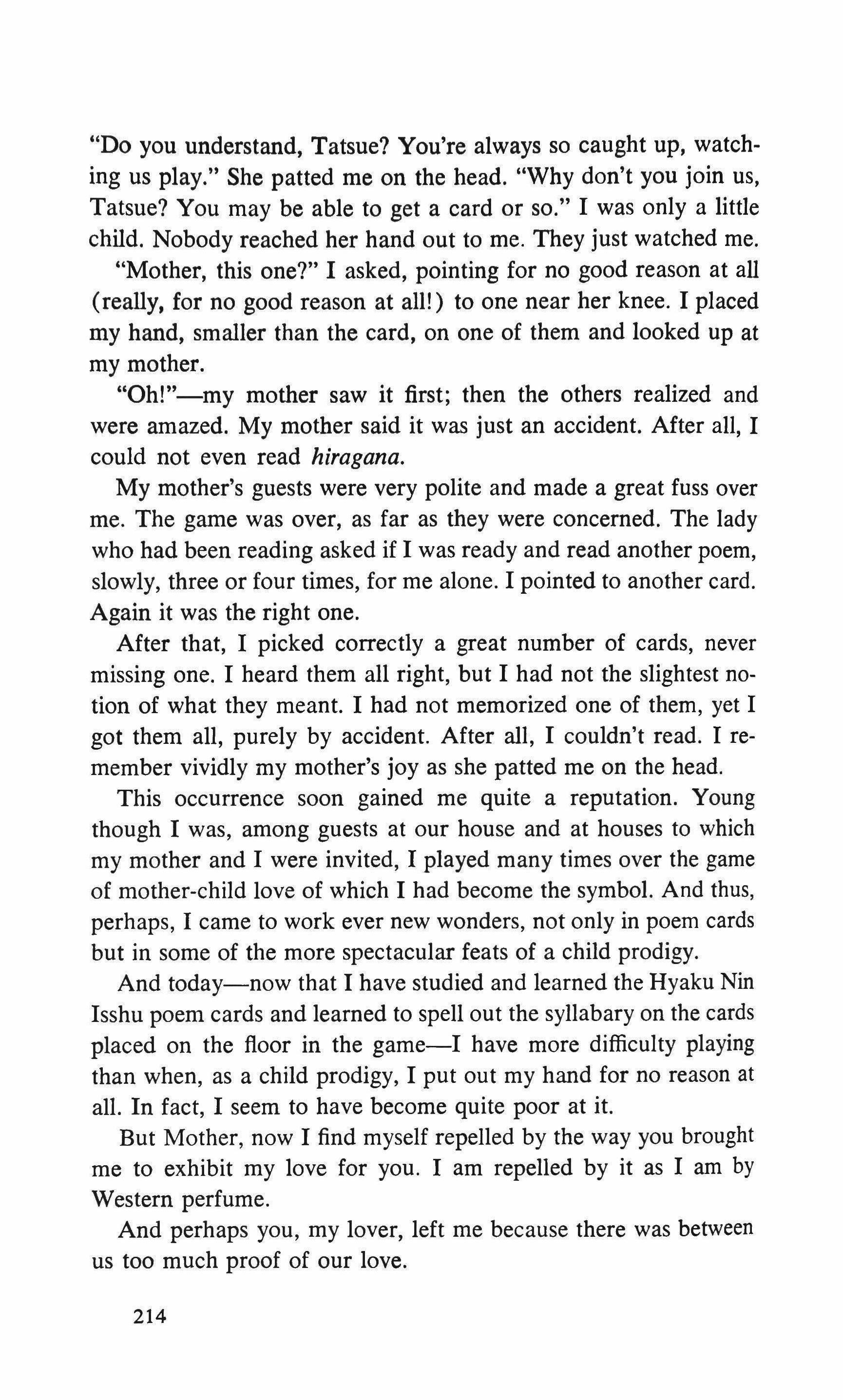
"Do you understand, Tatsue? You're always so caught up, watching us play." She patted me on the head. "Why don't you join us, Tatsue? You may be able to get a card or so." I was only a little child. Nobody reached her hand out to me. They just watched me.
"Mother, this one?" I asked, pointing for no good reason at all (really, for no good reason at all!) to one near her knee. I placed my hand, smaller than the card, on one of them and looked up at my mother.
"Oh!"-my mother saw it first; then the others realized and were amazed. My mother said it was just an accident. After all, I could not even read hiragana.
My mother's guests were very polite and made a great fuss over me. The game was over, as far as they were concerned. The lady who had been reading asked if I was ready and read another poem, slowly, three or four times, for me alone. I pointed to another card.
Again it was the right one.
After that, I picked correctly a great number of cards, never missing one. I heard them all right, but I had not the slightest notion of what they meant. I had not memorized one of them, yet I got them all, purely by accident. After all, I couldn't read. I remember vividly my mother's joy as she patted me on the head.
This occurrence soon gained me quite a reputation. Young though I was, among guests at our house and at houses to which my mother and I were invited, I played many times over the game of mother-child love of which I had become the symbol. And thus, perhaps, I came to work ever new wonders, not only in poem cards but in some of the more spectacular feats of a child prodigy.
And today-now that I have studied and learned the Hyaku Nin Isshu poem cards and learned to spell out the syllabary on the cards placed on the fioor in the game-I have more difficulty playing than when, as a child prodigy, I put out my hand for no reason at all. In fact, I seem to have become quite poor at it.
But Mother, now I find myself repelled by the way you brought me to exhibit my love for you. I am repelled by it as I am by Western perfume.
And perhaps you, my lover, left me because there was between us too much proof of our love.
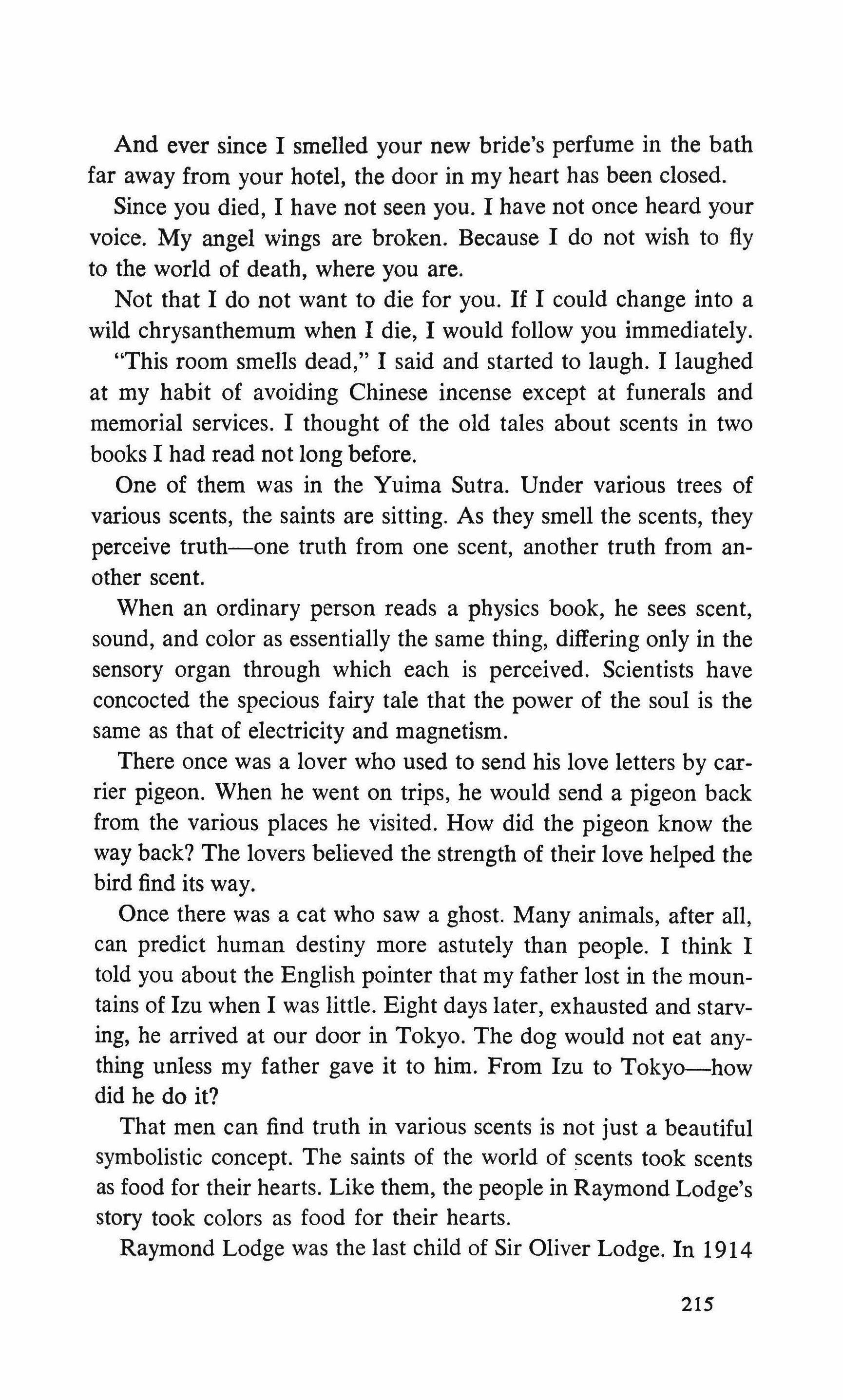
And ever since I smelled your new bride's perfume in the bath far away from your hotel, the door in my heart has been closed.
Since you died, I have not seen you. I have not once heard your voice. My angel wings are broken. Because I do not wish to fly to the world of death, where you are.
Not that I do not want to die for you. If I could change into a wild chrysanthemum when I die, I would follow you immediately.
"This room smells dead," I said and started to laugh. I laughed at my habit of avoiding Chinese incense except at funerals and memorial services. I thought of the old tales about scents in two books I had read not long before.
One of them was in the Yuima Sutra. Under various trees of various scents, the saints are sitting. As they smell the scents, they perceive truth-one truth from one scent, another truth from another scent.
When an ordinary person reads a physics book, he sees scent, sound, and color as essentially the same thing, differing only in the sensory organ through which each is perceived. Scientists have concocted the specious fairy tale that the power of the soul is the same as that of electricity and magnetism.
There once was a lover who used to send his love letters by carrier pigeon. When he went on trips, he would send a pigeon back from the various places he visited. How did the pigeon know the way back? The lovers believed the strength of their love helped the bird find its way.
Once there was a cat who saw a ghost. Many animals, after all, can predict human destiny more astutely than people. I think I told you about the English pointer that my father lost in the mountains of Izu when I was little. Eight days later, exhausted and starving, he arrived at our door in Tokyo. The dog would not eat anything unless my father gave it to him. From Izu to Tokyo-how did he do it?
That men can find truth in various scents is not just a beautiful symbolistic concept. The saints of the world of scents took scents as food for their hearts. Like them, the people in Raymond Lodge's story took colors as food for their hearts.
Raymond Lodge was the last child of Sir Oliver Lodge. In 1914
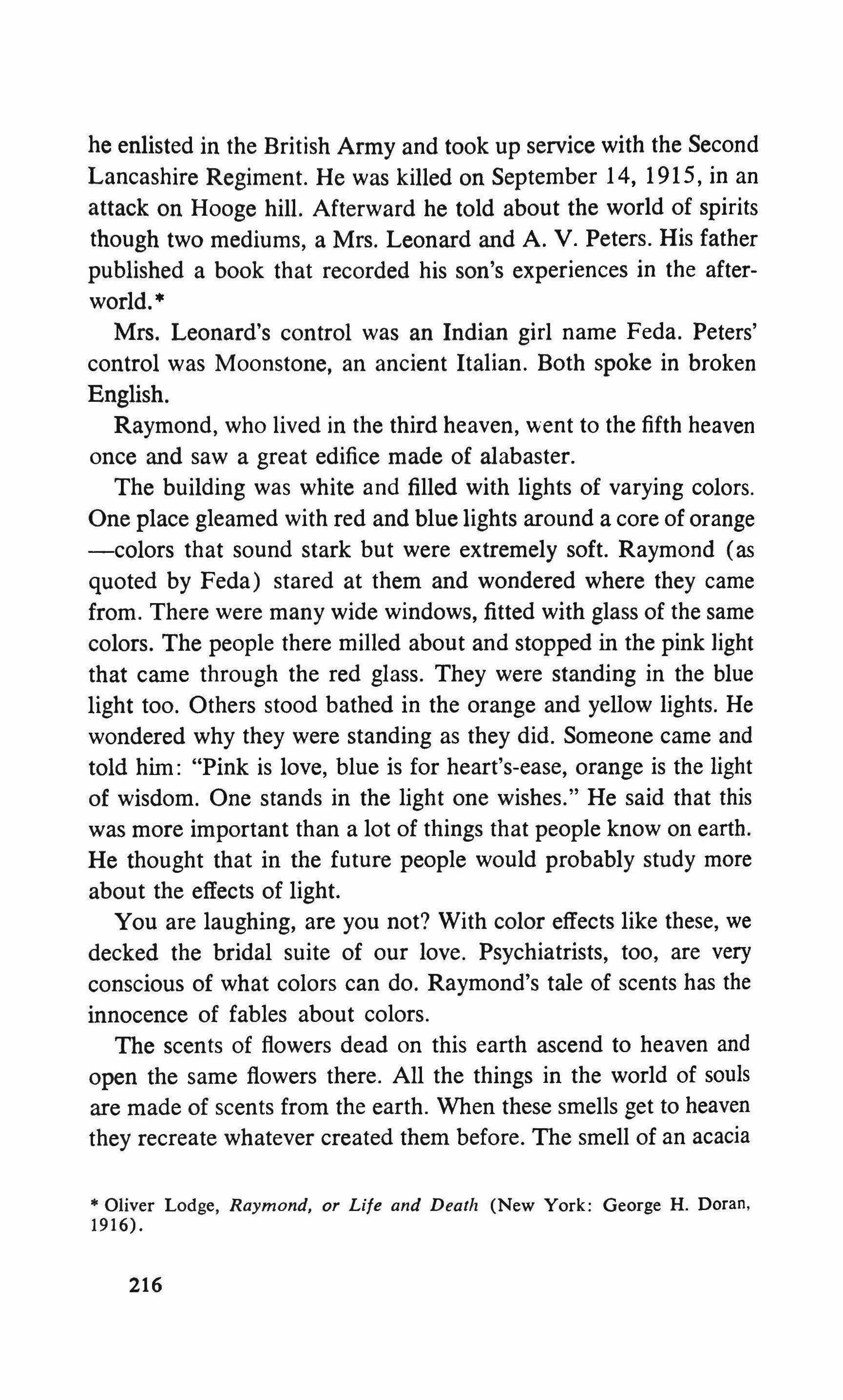
he enlisted in the British Army and took up service with the Second Lancashire Regiment. He was killed on September 14, 1915, in an attack on Hooge hill. Afterward he told about the world of spirits though two mediums, a Mrs. Leonard and A. V. Peters. His father published a book that recorded his son's experiences in the afterworld."
Mrs. Leonard's control was an Indian girl name Feda. Peters' control was Moonstone, an ancient Italian. Both spoke in broken English.
Raymond, who lived in the third heaven, went to the fifth heaven once and saw a great edifice made of alabaster.
The building was white and filled with lights of varying colors. One place gleamed with red and blue lights around a core of orange -colors that sound stark but were extremely soft. Raymond (as quoted by Feda) stared at them and wondered where they came from. There were many wide windows, fitted with glass of the same colors. The people there milled about and stopped in the pink light that came through the red glass. They were standing in the blue light too. Others stood bathed in the orange and yellow lights. He wondered why they were standing as they did. Someone came and told him: "Pink is love, blue is for heart's-ease, orange is the light of wisdom. One stands in the light one wishes." He said that this was more important than a lot of things that people know on earth. He thought that in the future people would probably study more about the effects of light.
You are laughing, are you not? With color effects like these, we decked the bridal suite of our love. Psychiatrists, too, are very conscious of what colors can do. Raymond's tale of scents has the innocence of fables about colors.
The scents of flowers dead on this earth ascend to heaven and open the same flowers there. All the things in the world of souls are made of scents from the earth. When these smells get to heaven they recreate whatever created them before. The smell of an acacia
• Oliver Lodge, Raymond, or Life and Death (New York: George H. Doran, 1916). 216

is different from the smell of a bamboo; the smell of rotten hemp differs from that of rotten wool.
The soul of one who has died does not leave the body all at once like the disembodied fire of a ghost, but ascends in stages like a braid of incense. Then it gathers itself in one place in heaven and creates a body resembling that left on earth. Thus the shades of the other world resemble closely the forms of this world. Raymond's every part, from his eyebrows to his fingerprints, is the same as it was before. The teeth that were decayed before, however, have been made new.
The blind have sight now. The crippled have new legs. There are horses, cats, and birds as on earth. There are houses built of bricks. To warm the heart even more, there are cigarettes, and whiskey, and soda made from odors emanating from the earth or similar ethereal essences. Babies who die young grow up in heaven. Raymond has met his sister, who died as a child. She knows little about this world, innocent and spiritually beautiful as she is in her clothes of light, and carries a lily in her hand. Her name is Lily. How the poets would sing her praises!
Compared with the heaven and hell of Swedenborg and Dante's Divine Comedy, Raymond's story from the other world is childish and simple. But it has in it the true quality of the fairy tale. I like the fairy tale pages of this long collection better than the factual passages. After all, Lodge had no reason to believe everything that the medium was saying. He simply wanted to report that he had talked to his dead son and thus that the world is imperishable-his gift to thousands of mothers and lovers who had lost their loved ones in World War I. Among all the occult books I have read, none describes the afterlife so realistically as Raymond's. After your death, I had to turn to this book for comfort (though perhaps I sound as if I had found nothing but a few fairy tales)
When the otherworldly visions of Dante, Swedenborg, and Westerners in general are compared with those of Hinduism, how realistic, how vulgar, and weak the visionary world of the Western gods comes out! And here I am, in the East, where Confucius can neatly dispose of both worlds in a statement like: "How can you know
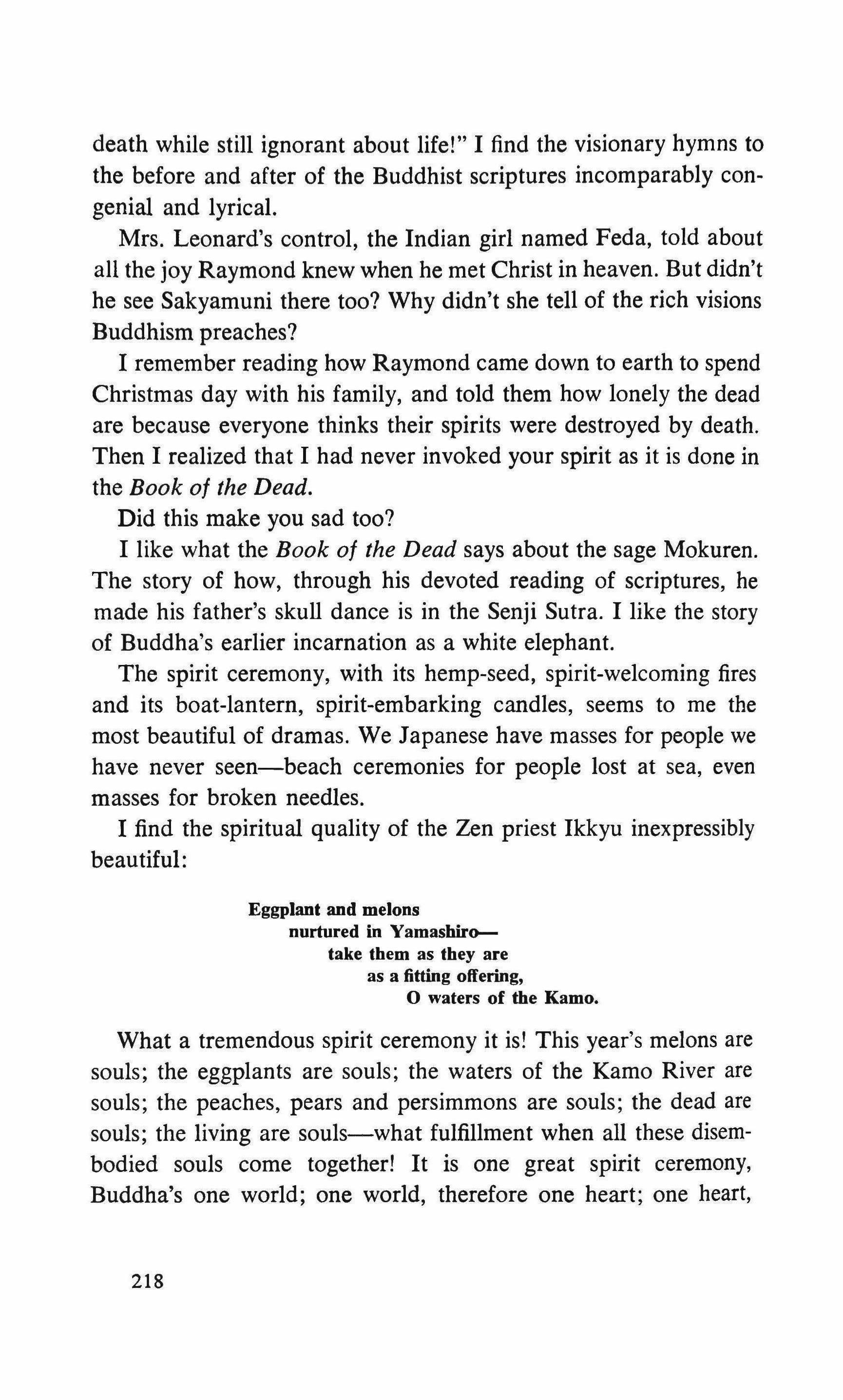
death while still ignorant about life!" I find the visionary hymns to the before and after of the Buddhist scriptures incomparably congenial and lyrical.
Mrs. Leonard's control, the Indian girl named Feda, told about all the joy Raymond knew when he met Christ in heaven. But didn't he see Sakyamuni there too? Why didn't she tell of the rich visions Buddhism preaches?
I remember reading how Raymond came down to earth to spend Christmas day with his family, and told them how lonely the dead are because everyone thinks their spirits were destroyed by death. Then I realized that I had never invoked your spirit as it is done in the Book 0/ the Dead.
Did this make you sad too?
I like what the Book 0/ the Dead says about the sage Mokuren. The story of how, through his devoted reading of scriptures, he made his father's skull dance is in the Senji Sutra. I like the story of Buddha's earlier incarnation as a white elephant.
The spirit ceremony, with its hemp-seed, spirit-welcoming fires and its boat-lantern, spirit-embarking candles, seems to me the most beautiful of dramas. We Japanese have masses for people we have never seen-beach ceremonies for people lost at sea, even masses for broken needles.
I find the spiritual quality of the Zen priest Ikkyu inexpressibly beautiful:
Eggplant and melons nurtured in Yamashiro-take them as they are as a fitting offering, o waters of the Kamo.
What a tremendous spirit ceremony it is! This year's melons are souls; the eggplants are souls; the waters of the Kamo River are souls; the peaches, pears and persimmons are souls; the dead are souls; the living are souls-what fulfillment when all these disembodied souls come together! It is one great spirit ceremony, Buddha's one world; one world, therefore one heart; one heart,
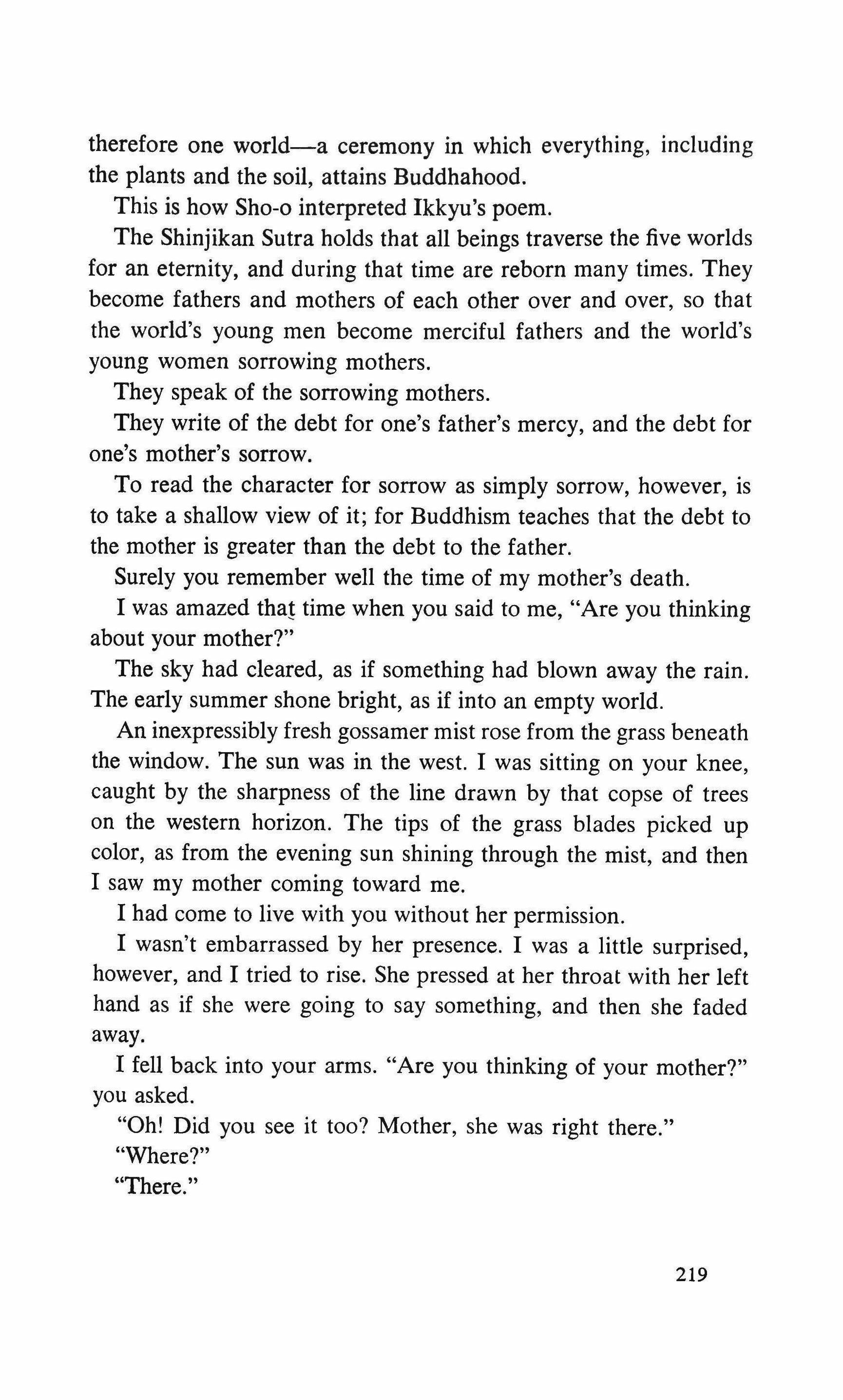
therefore one world-a ceremony in which everything, including the plants and the soil, attains Buddhahood.
This is how Sho-o interpreted Ikkyu's poem.
The Shinjikan Sutra holds that all beings traverse the five worlds for an eternity, and during that time are reborn many times. They become fathers and mothers of each other over and over, so that the world's young men become merciful fathers and the world's young women sorrowing mothers.
They speak of the sorrowing mothers.
They write of the debt for one's father's mercy, and the debt for one's mother's sorrow.
To read the character for sorrow as simply sorrow, however, is to take a shallow view of it; for Buddhism teaches that the debt to the mother is greater than the debt to the father.
Surely you remember well the time of my mother's death.
I was amazed that time when you said to me, "Are you thinking about your mother?"
The sky had cleared, as if something had blown away the rain. The early summer shone bright, as if into an empty world.
An inexpressibly fresh gossamer mist rose from the grass beneath the window. The sun was in the west. I was sitting on your knee, caught by the sharpness of the line drawn by that copse of trees on the western horizon. The tips of the grass blades picked up color, as from the evening sun shining through the mist, and then I saw my mother coming toward me.
I had come to live with you without her permission.
I wasn't embarrassed by her presence. I was a little surprised, however, and I tried to rise. She pressed at her throat with her left hand as if she were going to say something, and then she faded away.
I fell back into your arms. "Are you thinking of your mother?" you asked.
"Oh! Did you see it too? Mother, she was right there."
"Where?"
"There."
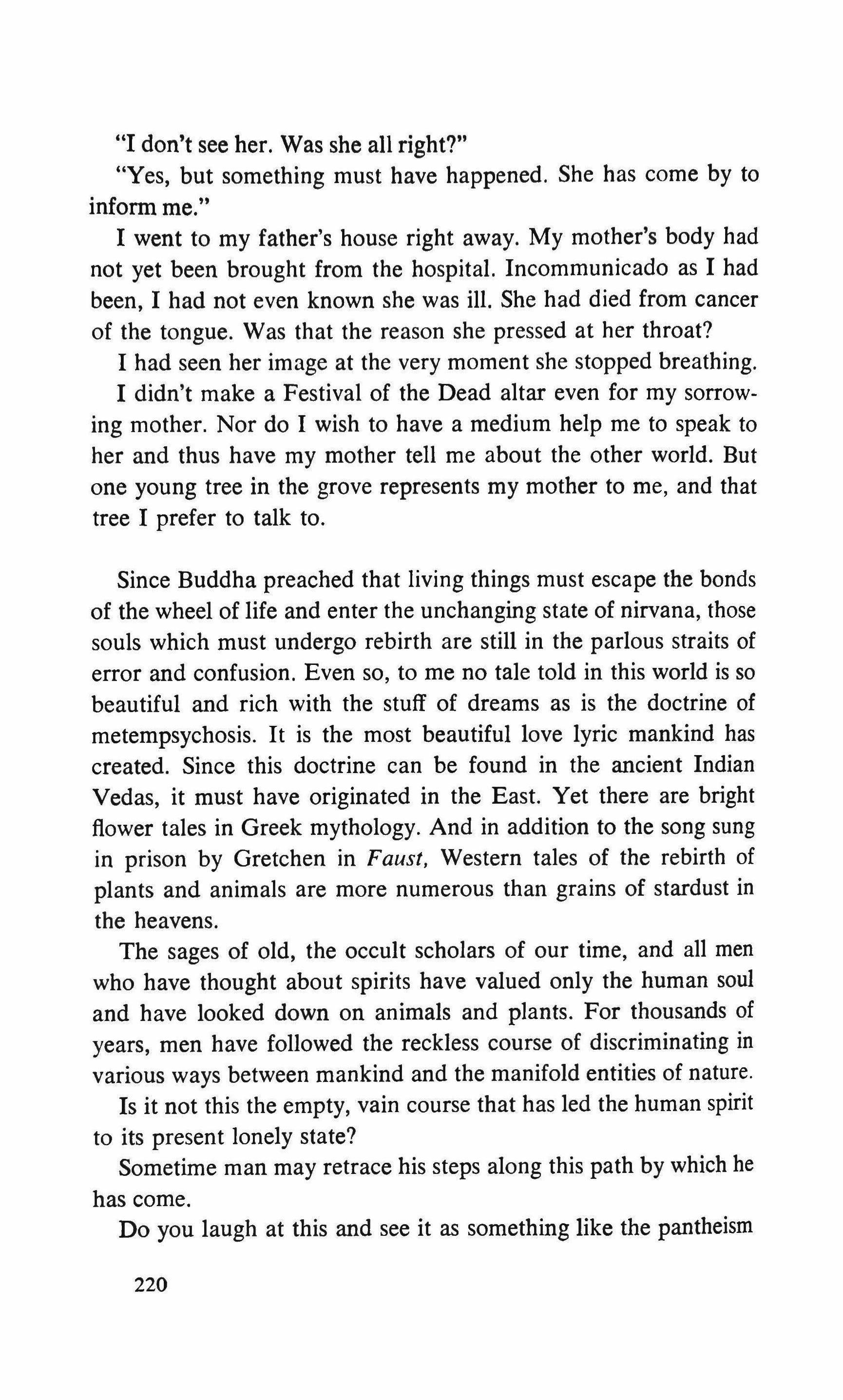
"I don't see her. Was she all right?"
"Yes, but something must have happened. She has come by to inform me."
I went to my father's house right away. My mother's body had not yet been brought from the hospital. Incommunicado as I had been, I had not even known she was ill. She had died from cancer of the tongue. Was that the reason she pressed at her throat?
I had seen her image at the very moment she stopped breathing. I didn't make a Festival of the Dead altar even for my sorrowing mother. Nor do I wish to have a medium help me to speak to her and thus have my mother tell me about the other world. But one young tree in the grove represents my mother to me, and that tree I prefer to talk to.
Since Buddha preached that living things must escape the bonds of the wheel of life and enter the unchanging state of nirvana, those souls which must undergo rebirth are still in the parlous straits of error and confusion. Even so, to me no tale told in this world is so beautiful and rich with the stuff of dreams as is the doctrine of metempsychosis. It is the most beautiful love lyric mankind has created. Since this doctrine can be found in the ancient Indian Vedas, it must have originated in the East. Yet there are bright flower tales in Greek mythology. And in addition to the song sung in prison by Gretchen in Faust, Western tales of the rebirth of plants and animals are more numerous than grains of stardust in the heavens.
The sages of old, the occult scholars of our time, and all men who have thought about spirits have valued only the human soul and have looked down on animals and plants. For thousands of years, men have followed the reckless course of discriminating in various ways between mankind and the manifold entities of nature. Is it not this the empty, vain course that has led the human spirit to its present lonely state?
Sometime man may retrace his steps along this path by which he has come.
Do you laugh at this and see it as something like the pantheism
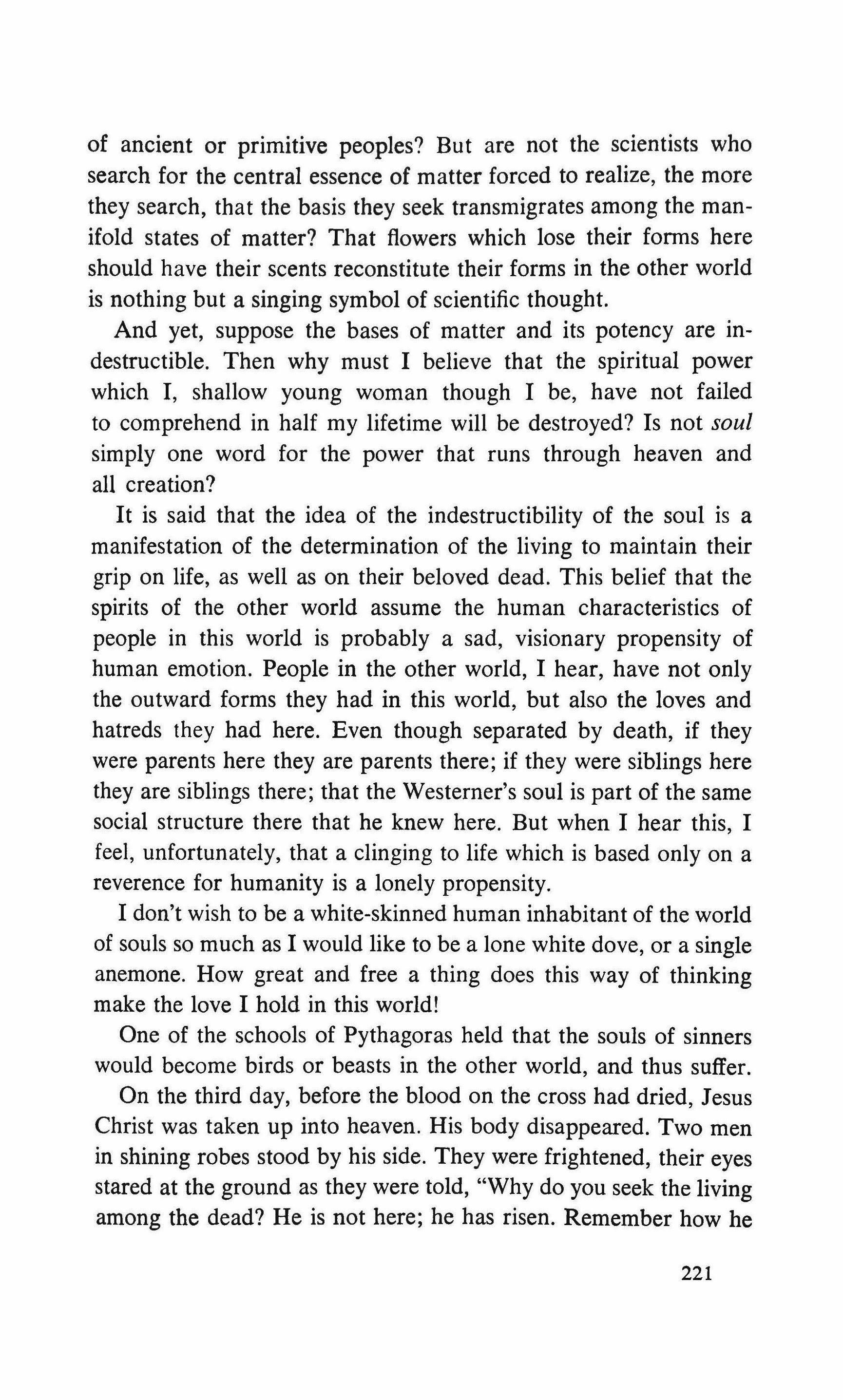
of ancient or primitive peoples? But are not the scientists who search for the central essence of matter forced to realize, the more they search, that the basis they seek transmigrates among the manifold states of matter? That flowers which lose their forms here should have their scents reconstitute their forms in the other world is nothing but a singing symbol of scientific thought.
And yet, suppose the bases of matter and its potency are indestructible. Then why must I believe that the spiritual power which I, shallow young woman though I be, have not failed to comprehend in half my lifetime will be destroyed? Is not soul simply one word for the power that runs through heaven and all creation?
It is said that the idea of the indestructibility of the soul is a manifestation of the determination of the living to maintain their grip on life, as well as on their beloved dead. This belief that the spirits of the other world assume the human characteristics of people in this world is probably a sad, visionary propensity of human emotion. People in the other world, I hear, have not only the outward forms they had in this world, but also the loves and hatreds they had here. Even though separated by death, if they were parents here they are parents there; if they were siblings here they are siblings there; that the Westerner's soul is part of the same social structure there that he knew here. But when I hear this, I feel, unfortunately, that a clinging to life which is based only on a reverence for humanity is a lonely propensity.
I don't wish to be a white-skinned human inhabitant of the world of souls so much as I would like to be a lone white dove, or a single anemone. How great and free a thing does this way of thinking make the love I hold in this world!
One of the schools of Pythagoras held that the souls of sinners would become birds or beasts in the other world, and thus suffer.
On the third day, before the blood on the cross had dried, Jesus Christ was taken up into heaven. His body disappeared. Two men in shining robes stood by his side. They were frightened, their eyes stared at the ground as they were told, "Why do you seek the living among the dead? He is not here; he has risen. Remember how he
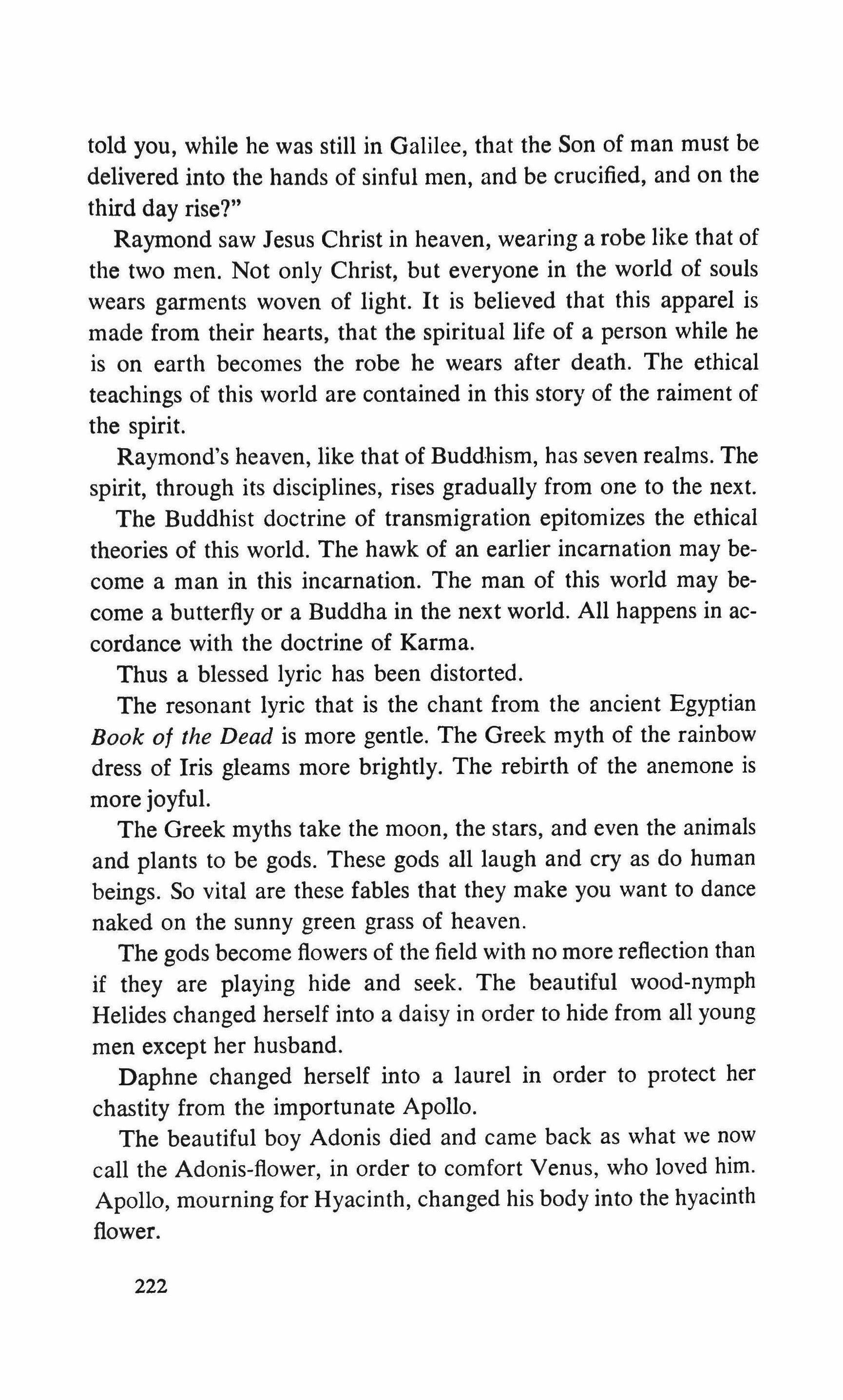
told you, while he was still in Galilee, that the Son of man must be delivered into the hands of sinful men, and be crucified, and on the third day rise?"
Raymond saw Jesus Christ in heaven, wearing a robe like that of the two men. Not only Christ, but everyone in the world of souls wears garments woven of light. It is believed that this apparel is made from their hearts, that the spiritual life of a person while he is on earth becomes the robe he wears after death. The ethical teachings of this world are contained in this story of the raiment of the spirit.
Raymond's heaven, like that of Buddhism, has seven realms. The spirit, through its disciplines, rises gradually from one to the next.
The Buddhist doctrine of transmigration epitomizes the ethical theories of this world. The hawk of an earlier incarnation may become a man in this incarnation. The man of this world may become a butterfly or a Buddha in the next world. All happens in accordance with the doctrine of Karma.
Thus a blessed lyric has been distorted.
The resonant lyric that is the chant from the ancient Egyptian Book of the Dead is more gentle. The Greek myth of the rainbow dress of Iris gleams more brightly. The rebirth of the anemone is more joyful.
The Greek myths take the moon, the stars, and even the animals and plants to be gods. These gods all laugh and cry as do human beings. So vital are these fables that they make you want to dance naked on the sunny green grass of heaven.
The gods become flowers of the field with no more reflection than if they are playing hide and seek. The beautiful wood-nymph Helides changed herself into a daisy in order to hide from all young men except her husband.
Daphne changed herself into a laurel in order to protect her chastity from the importunate Apollo.
The beautiful boy Adonis died and came back as what we now call the Adonis-flower, in order to comfort Venus, who loved him. Apollo, mourning for Hyacinth, changed his body into the hyacinth flower. 222
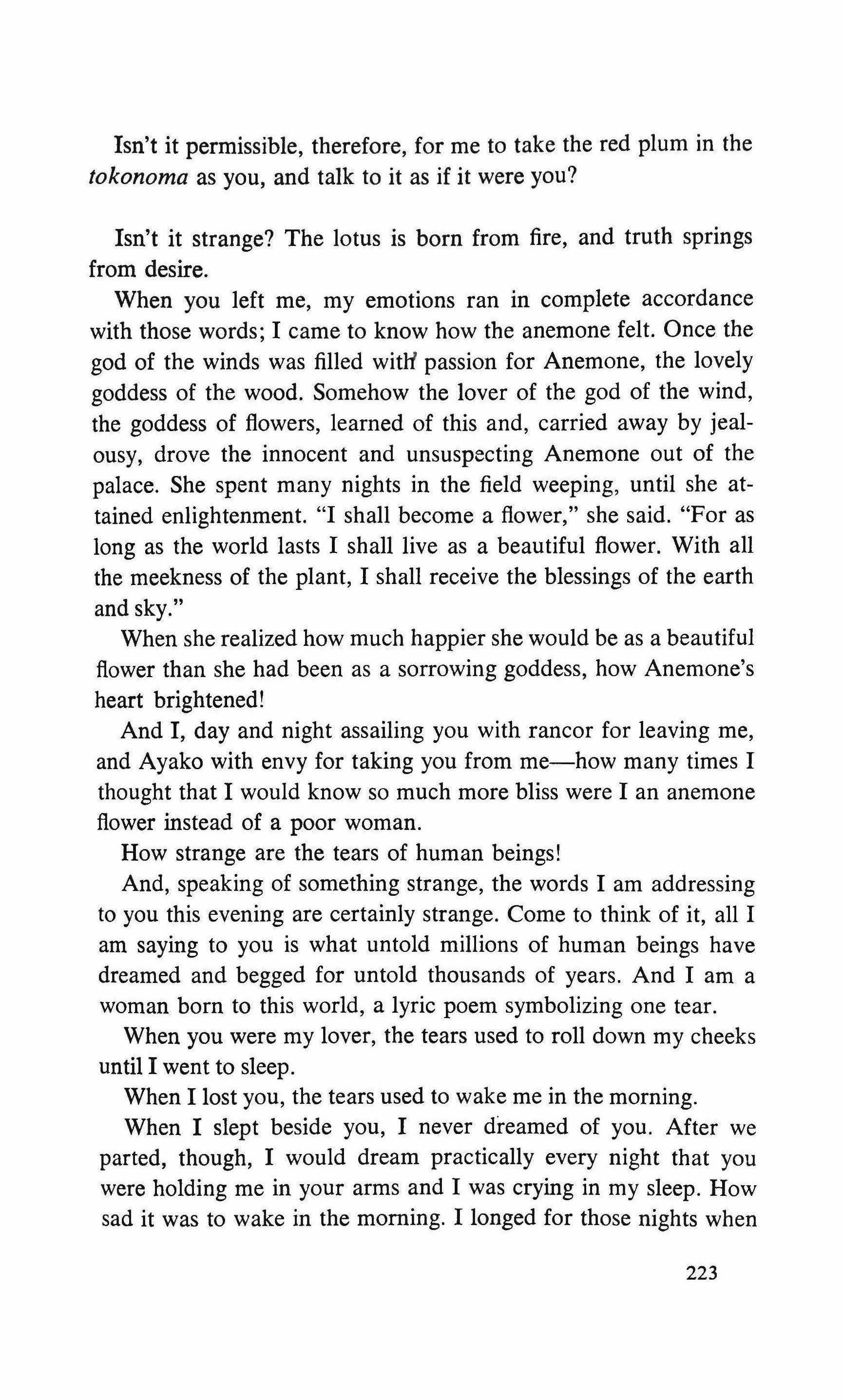
Isn't it permissible, therefore, for me to take the red plum in the tokonoma as you, and talk to it as if it were you?
Isn't it strange? The lotus is born from fire, and truth springs from desire.
When you left me, my emotions ran in complete accordance with those words; I came to know how the anemone felt. Once the god of the winds was filled with passion for Anemone, the lovely goddess of the wood. Somehow the lover of the god of the wind, the goddess of flowers, learned of this and, carried away by jealousy, drove the innocent and unsuspecting Anemone out of the palace. She spent many nights in the field weeping, until she attained enlightenment. "I shall become a flower," she said. "For as long as the world lasts I shall live as a beautiful flower. With all the meekness of the plant, I shall receive the blessings of the earth and sky."
When she realized how much happier she would be as a beautiful flower than she had been as a sorrowing goddess, how Anemone's heart brightened!
And I, day and night assailing you with rancor for leaving me, and Ayako with envy for taking you from me-how many times I thought that I would know so much more bliss were I an anemone flower instead of a poor woman.
How strange are the tears of human beings!
And, speaking of something strange, the words I am addressing to you this evening are certainly strange. Come to think of it, all I am saying to you is what untold millions of human beings have dreamed and begged for untold thousands of years. And I am a woman born to this world, a lyric poem symbolizing one tear.
When you were my lover, the tears used to roll down my cheeks until I went to sleep.
When I lost you, the tears used to wake me in the morning. When I slept beside you, I never dreamed of you. After we parted, though, I would dream practically every night that you were holding me in your arms and I was crying in my sleep. How sad it was to wake in the morning. I longed for those nights when
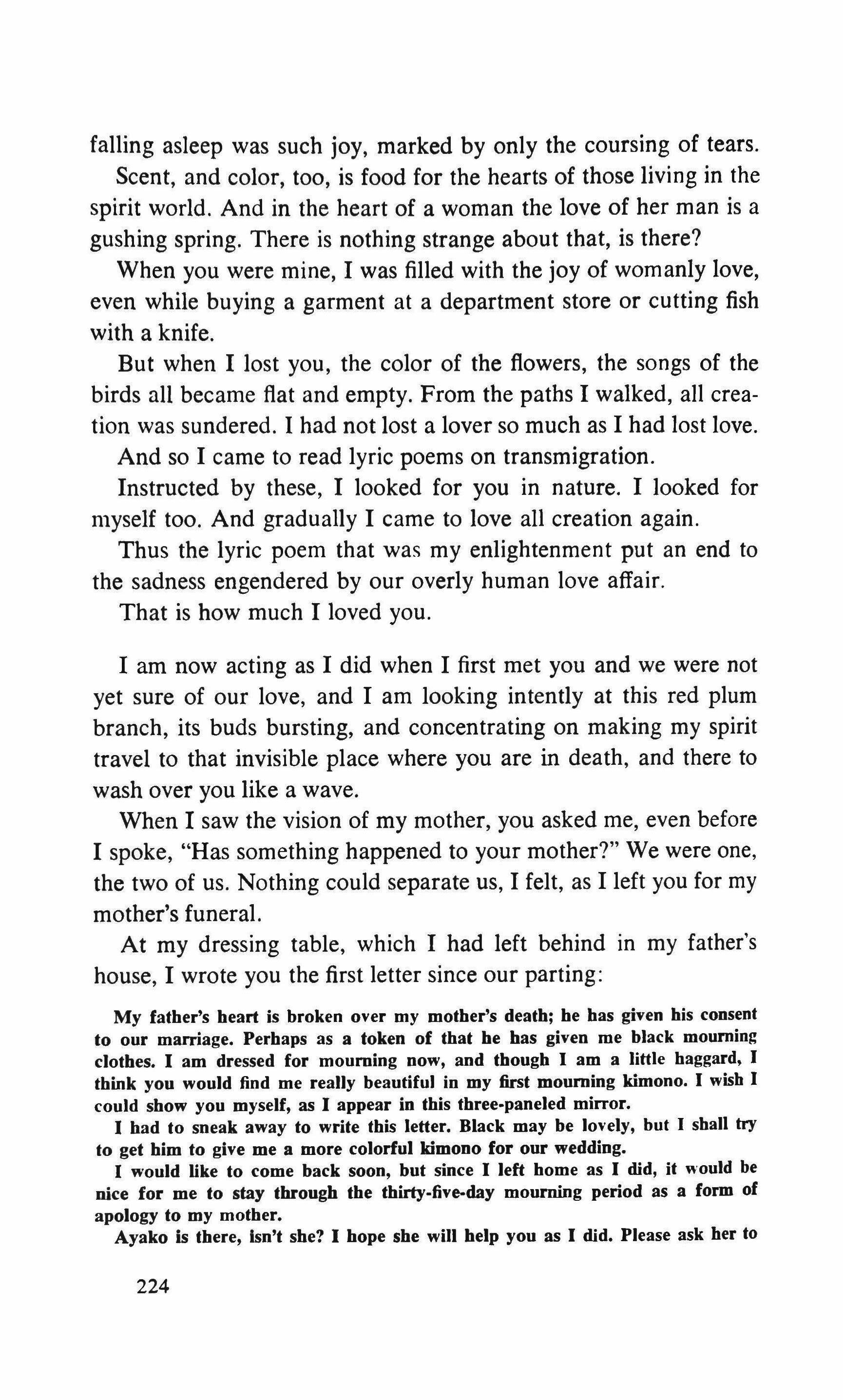
falling asleep was such joy, marked by only the coursing of tears.
Scent, and color, too, is food for the hearts of those living in the spirit world. And in the heart of a woman the love of her man is a gushing spring. There is nothing strange about that, is there?
When you were mine, I was filled with the joy of womanly love, even while buying a garment at a department store or cutting fish with a knife.
But when I lost you, the color of the flowers, the songs of the birds all became flat and empty. From the paths I walked, all creation was sundered. I had not lost a lover so much as I had lost love.
And so I came to read lyric poems on transmigration. Instructed by these, I looked for you in nature. I looked for myself too. And gradually I came to love all creation again. Thus the lyric poem that was my enlightenment put an end to the sadness engendered by our overly human love affair.
That is how much I loved you.
I am now acting as I did when I first met you and we were not yet sure of our love, and I am looking intently at this red plum branch, its buds bursting, and concentrating on making my spirit travel to that invisible place where you are in death, and there to wash over you like a wave.
When I saw the vision of my mother, you asked me, even before I spoke, "Has something happened to your mother?" We were one, the two of us. Nothing could separate us, I felt, as I left you for my mother's funeral.
At my dressing table, which I had left behind in my father's house, I wrote you the first letter since our parting:
My father's heart is broken over my mother's death; he has given his consent to our marriage. Perhaps as a token of that he has given me black mourning clothes. I am dressed for mourning now, and though I am a little haggard, I think you would find me really beautiful in my first mourning kimono. I wish I could show you myself, as I appear in this three-paneled mirror.
I had to sneak away to write this letter. Black may be lovely, but I shall try to get him to give me a more colorful kimono for our wedding.
I would like to come back soon, but since I left home as I did, it would be nice for me to stay through the thirty-five-day mourning period as a form of apology to my mother.
Ayako is there, Isn't she? I hope she will help you as I did. Please ask her to
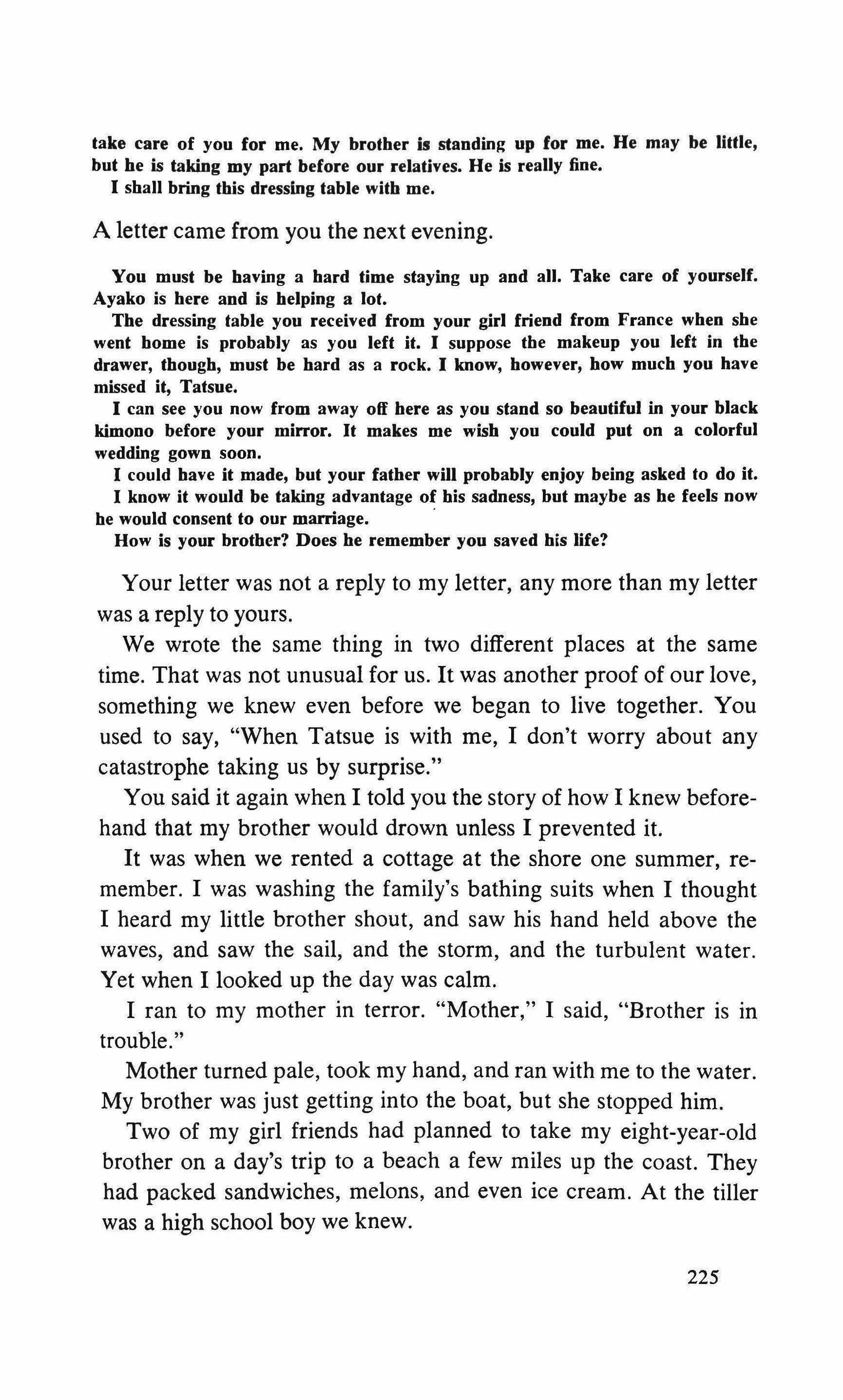
take care of you for me. My brother is standing up for me. He may be little, but he is taking my part before our relatives. He is really fine.
I shall bring this dressing table with me.
A letter came from you the next evening.
You must be having a hard time staying up and all. Take care of yourself. Ayako is here and is helping a lot.
The dressing table you received from your girl friend from France when she went home is probably as you left it. I suppose the makeup you left in the drawer, though, must be hard as a rock. I know, however, how much you have missed it, Tatsue.
I can see you now from away off here as you stand so beautiful in your black kimono before your mirror. It makes me wish you could put on a colorful wedding gown soon.
I could have it made, but your father will probably enjoy being asked to do it.
I know it would be taking advantage of his sadness, but maybe as he feels now he would consent to our marriage.
How is your brother? Does he remember you saved his life?
Your letter was not a reply to my letter, any more than my letter was a reply to yours.
We wrote the same thing in two different places at the same time. That was not unusual for us. It was another proof of our love, something we knew even before we began to live together. You used to say, "When Tatsue is with me, I don't worry about any catastrophe taking us by surprise."
You said it again when I told you the story of how I knew beforehand that my brother would drown unless I prevented it.
It was when we rented a cottage at the shore one summer, remember. I was washing the family's bathing suits when I thought I heard my little brother shout, and saw his hand held above the waves, and saw the sail, and the storm, and the turbulent water. Yet when I looked up the day was calm.
I ran to my mother in terror. "Mother," I said, "Brother is in trouble."
Mother turned pale, took my hand, and ran with me to the water. My brother was just getting into the boat, but she stopped him. Two of my girl friends had planned to take my eight-year-old brother on a day's trip to a beach a few miles up the coast. They had packed sandwiches, melons, and even ice cream. At the tiller was a high school boy we knew.
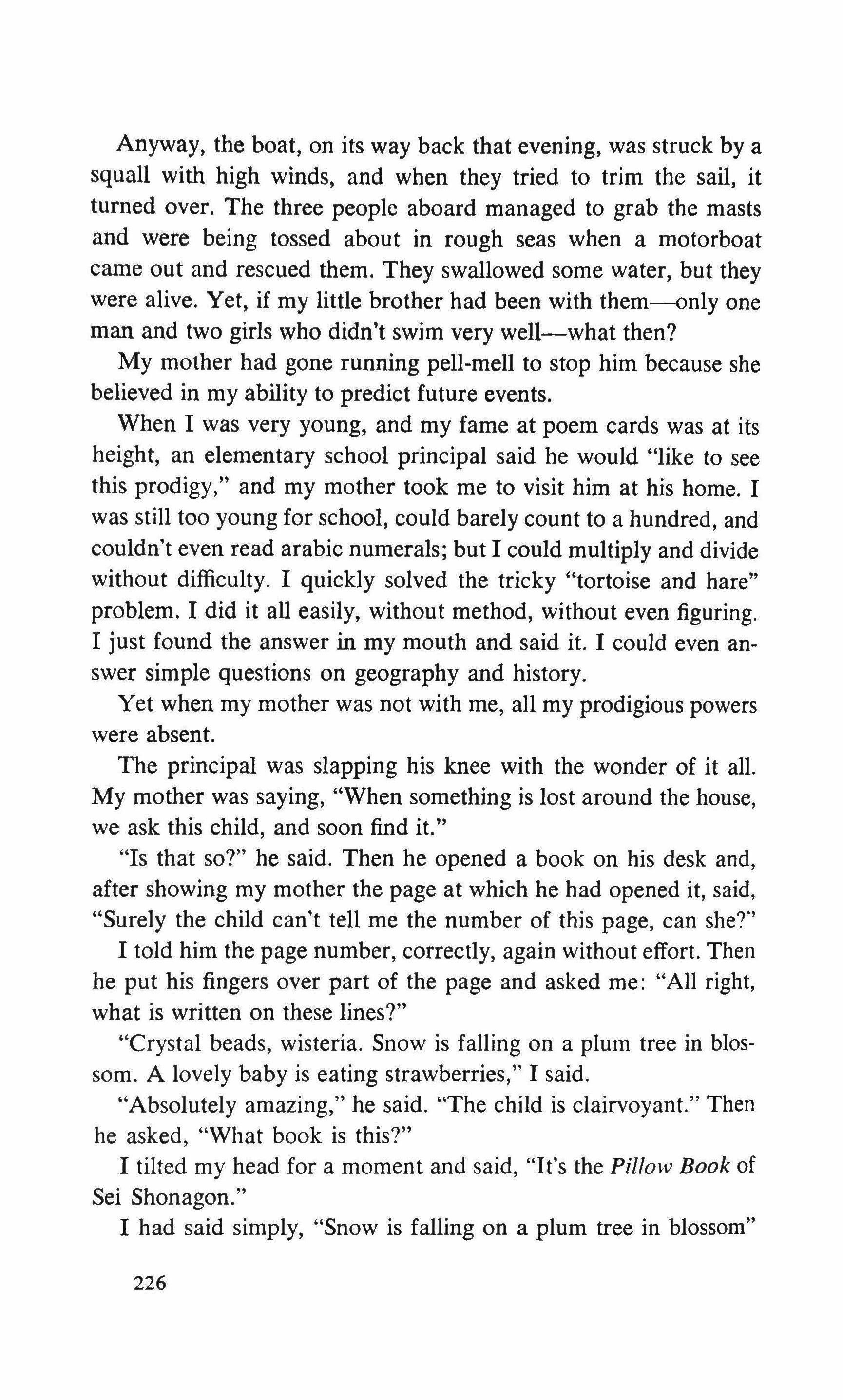
Anyway, the boat, on its way back that evening, was struck by a squall with high winds, and when they tried to trim the sail, it turned over. The three people aboard managed to grab the masts and were being tossed about in rough seas when a motorboat came out and rescued them. They swallowed some water, but they were alive. Yet, if my little brother had been with them--only one man and two girls who didn't swim very well-what then?
My mother had gone running pell-mell to stop him because she believed in my ability to predict future events.
When I was very young, and my fame at poem cards was at its height, an elementary school principal said he would "like to see this prodigy," and my mother took me to visit him at his home. I was still too young for school, could barely count to a hundred, and couldn't even read arabic numerals; but I could multiply and divide without difficulty. I quickly solved the tricky "tortoise and hare" problem. I did it all easily, without method, without even figuring. I just found the answer in my mouth and said it. I could even answer simple questions on geography and history.
Yet when my mother was not with me, all my prodigious powers were absent.
The principal was slapping his knee with the wonder of it all. My mother was saying, "When something is lost around the house, we ask this child, and soon find it."
"Is that so?" he said. Then he opened a book on his desk and, after showing my mother the page at which he had opened it, said, "Surely the child can't tell me the number of this page, can she?"
I told him the page number, correctly, again without effort. Then he put his fingers over part of the page and asked me: "All right, what is written on these lines?"
"Crystal beads, wisteria. Snow is falling on a plum tree in blossom. A lovely baby is eating strawberries," I said.
"Absolutely amazing," he said. "The child is clairvoyant." Then he asked, "What book is this?"
I tilted my head for a moment and said, "It's the Pillow Book of Sei Shonagon."
I had said simply, "Snow is falling on a plum tree in blossom"
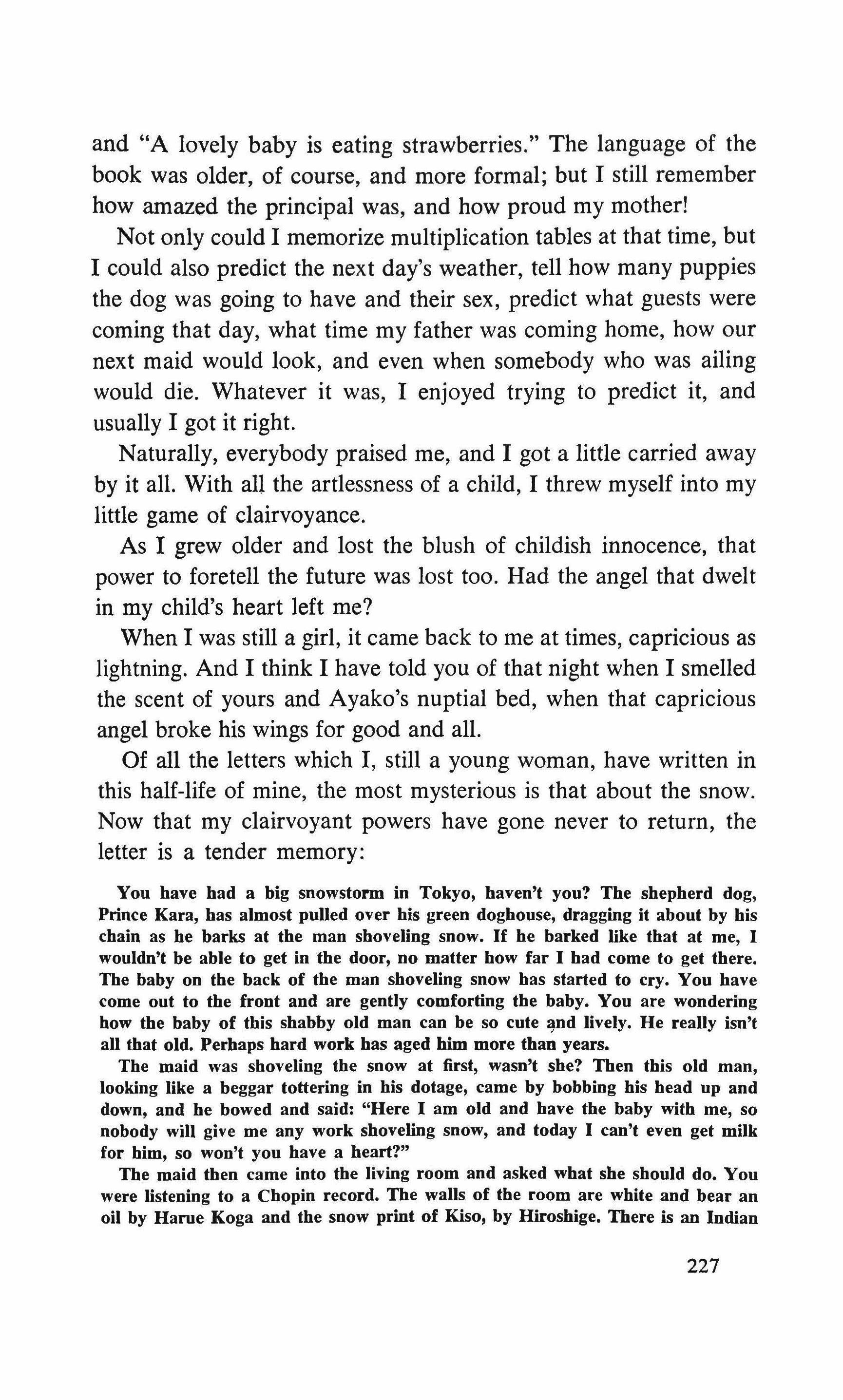
and "A lovely baby is eating strawberries." The language of the book was older, of course, and more formal; but I still remember how amazed the principal was, and how proud my mother!
Not only could I memorize multiplication tables at that time, but I could also predict the next day's weather, tell how many puppies the dog was going to have and their sex, predict what guests were coming that day, what time my father was coming home, how our next maid would look, and even when somebody who was ailing would die. Whatever it was, I enjoyed trying to predict it, and usually I got it right.
Naturally, everybody praised me, and I got a little carried away by it all. With all the artlessness of a child, I threw myself into my little game of clairvoyance.
As I grew older and lost the blush of childish innocence, that power to foretell the future was lost too. Had the angel that dwelt in my child's heart left me?
When I was still a girl, it came back to me at times, capricious as lightning. And I think I have told you of that night when I smelled the scent of yours and Ayako's nuptial bed, when that capricious angel broke his wings for good and all.
Of all the letters which I, still a young woman, have written in this half-life of mine, the most mysterious is that about the snow. Now that my clairvoyant powers have gone never to return, the letter is a tender memory:
You have had a big snowstorm in Tokyo, haven't you? The shepherd dog, Prince Kara, has almost pulled over his green doghouse, dragging it about by his chain as he barks at the man shoveling snow. If he barked like that at me, I wouldn't be able to get in the door, no matter how far I had come to get there. The baby on the back of the man shoveling snow has started to cry. You have come out to the front and are gently comforting the baby. You are wondering how the baby of this shabby old man can be so cute and lively. He really isn't all that old. Perhaps hard work has aged him more than years.
The maid was shoveling the snow at first, wasn't she? Then this old man, looking like a beggar tottering in his dotage, came by bobbing his head up and down, and he bowed and said: "Here I am old and have the baby with me, so nobody will give me any work shoveling snow, and today I can't even get milk for him, so won't you have a heart?"
The maid then came into the living room and asked what she should do. You were listening to a Chopin record. The walls of the room are white and bear an oil by Harne Koga and the snow print of Kiso, by Hiroshige. There is an Indian
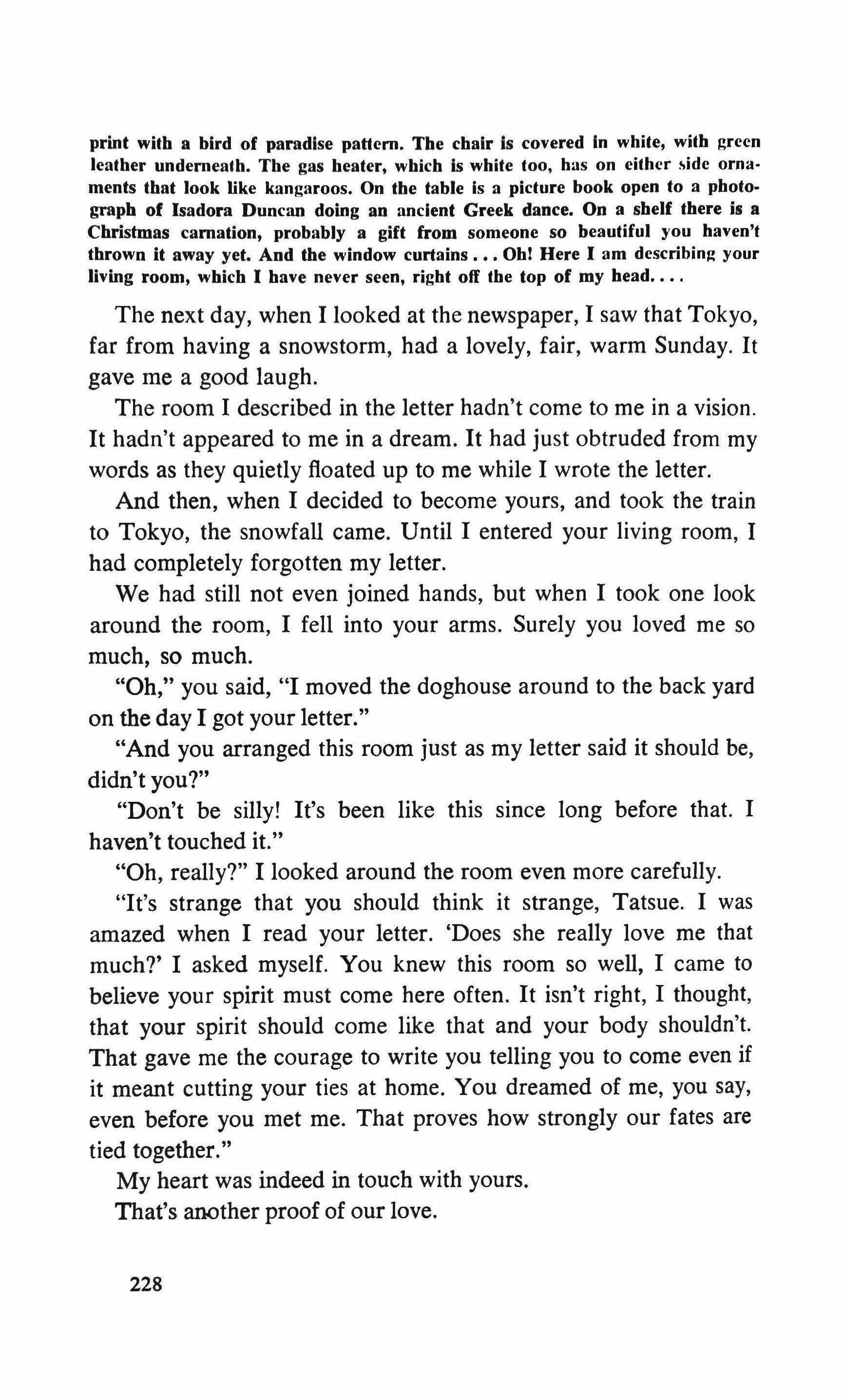
print with a bird of paradise pattern. The chair is covered In white, with green leather underneath. The gas heater, which is white too, has on either side ornaments that look like kangaroos. On tbe table is a picture book open to a photograph of Isadora Duncan doing an ancient Greek dance. On a sbelf tbere is a Christmas carnation, probably a gift from someone so beautiful you haven't thrown it away yet. And the window curtains Ohl Here I am describing your living room, which I have never seen, right off the top of my head
The next day, when I looked at the newspaper, I saw that Tokyo, far from having a snowstorm, had a lovely, fair, warm Sunday. It gave me a good laugh.
The room I described in the letter hadn't come to me in a vision. It hadn't appeared to me in a dream. It had just obtruded from my words as they quietly floated up to me while I wrote the letter.
And then, when I decided to become yours, and took the train to Tokyo, the snowfall came. Until I entered your living room, I had completely forgotten my letter.
We had still not even joined hands, but when I took one look around the room, I fell into your arms. Surely you loved me so much, so much.
"Oh," you said, "I moved the doghouse around to the back yard on the day I got your letter."
"And you arranged this room just as my letter said it should be, didn't you?"
"Don't be silly! It's been like this since long before that. I haven't touched it."
"Oh, really?" I looked around the room even more carefully.
"It's strange that you should think it strange, Tatsue. I was amazed when I read your letter. 'Does she really love me that much?' I asked myself. You knew this room so well, I came to believe your spirit must come here often. It isn't right, I thought, that your spirit should come like that and your body shouldn't. That gave me the courage to write you telling you to come even if it meant cutting your ties at home. You dreamed of me, you say, even before you met me. That proves how strongly our fates are tied together."
My heart was indeed in touch with yours. That's another proof of our love.
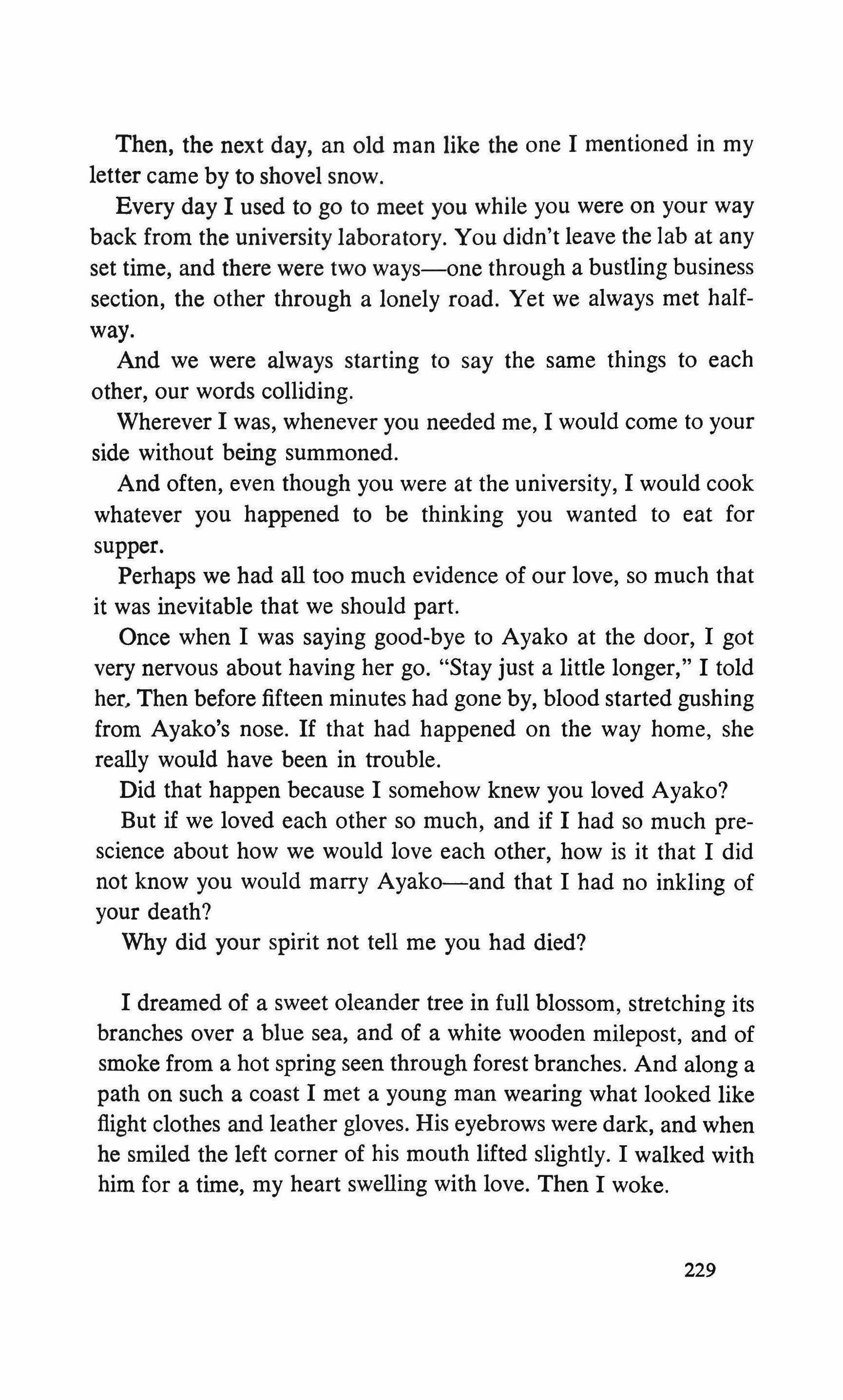
Then, the next day, an old man like the one I mentioned in my letter came by to shovel snow.
Every day I used to go to meet you while you were on your way back from the university laboratory. You didn't leave the lab at any set time, and there were two ways-one through a bustling business section, the other through a lonely road. Yet we always met halfway.
And we were always starting to say the same things to each other, our words colliding.
Wherever I was, whenever you needed me, I would come to your side without being summoned.
And often, even though you were at the university, I would cook whatever you happened to be thinking you wanted to eat for supper.
Perhaps we had all too much evidence of our love, so much that it was inevitable that we should part.
Once when I was saying good-bye to Ayako at the door, I got very nervous about having her go. "Stay just a little longer," I told her. Then before fifteen minutes had gone by, blood started gushing from Ayako's nose. If that had happened on the way home, she really would have been in trouble.
Did that happen because I somehow knew you loved Ayako?
But if we loved each other so much, and if I had so much prescience about how we would love each other, how is it that I did not know you would marry Ayako-and that I had no inkling of your death?
Why did your spirit not tell me you had died?
I dreamed of a sweet oleander tree in full blossom, stretching its branches over a blue sea, and of a white wooden milepost, and of smoke from a hot spring seen through forest branches. And along a path on such a coast I met a young man wearing what looked like flight clothes and leather gloves. His eyebrows were dark, and when he smiled the left corner of his mouth lifted slightly. I walked with him for a time, my heart swelling with love. Then I woke.
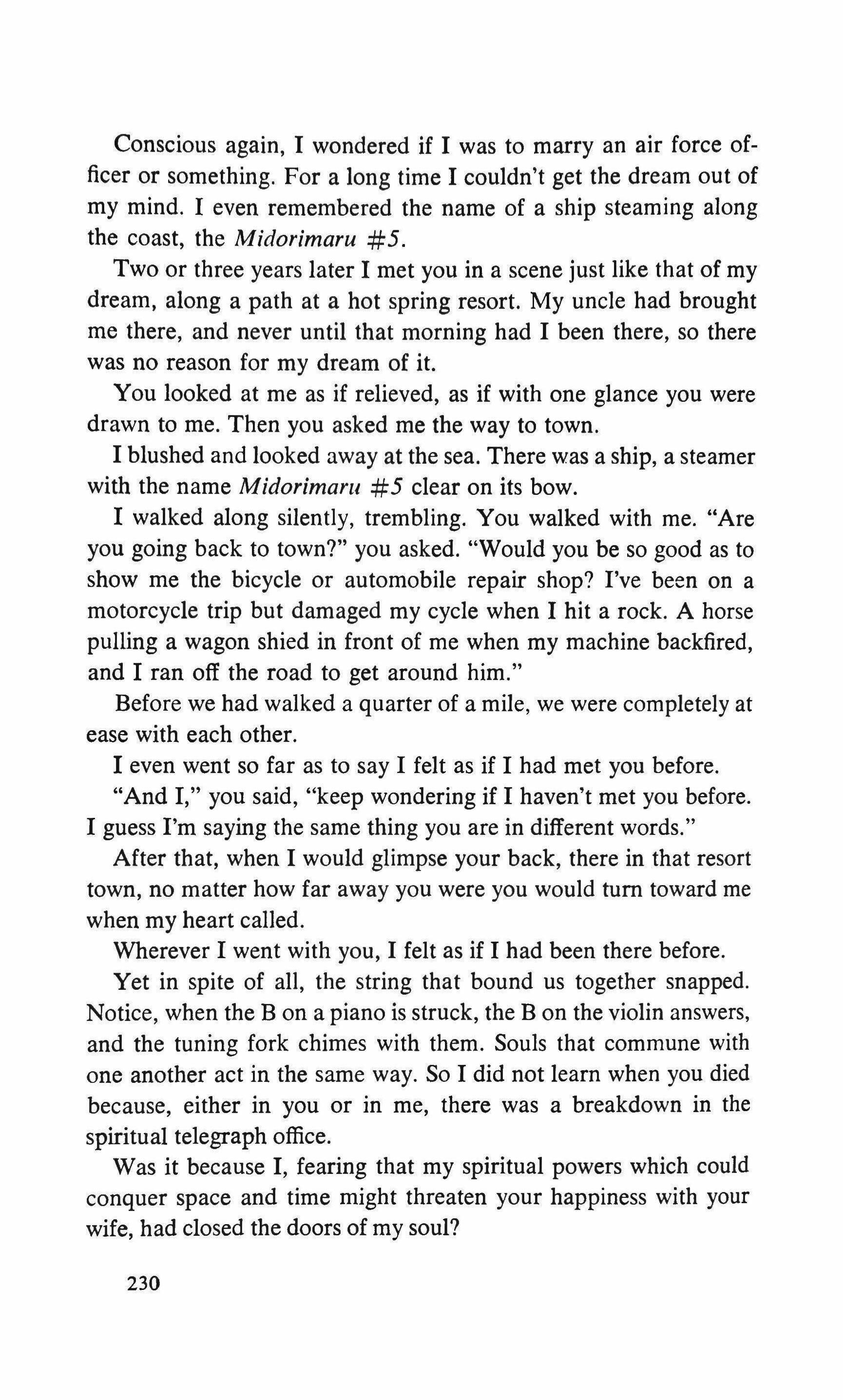
Conscious again, I wondered if I was to marry an air force officer or something. For a long time I couldn't get the dream out of my mind. I even remembered the name of a ship steaming along the coast, the Midorimaru #5.
Two or three years later I met you in a scene just like that of my dream, along a path at a hot spring resort. My uncle had brought me there, and never until that morning had I been there, so there was no reason for my dream of it.
You looked at me as if relieved, as if with one glance you were drawn to me. Then you asked me the way to town.
I blushed and looked away at the sea. There was a ship, a steamer with the name Midorimaru #5 clear on its bow.
I walked along silently, trembling. You walked with me. "Are you going back to town?" you asked. "Would you be so good as to show me the bicycle or automobile repair shop? I've been on a motorcycle trip but damaged my cycle when I hit a rock. A horse pulling a wagon shied in front of me when my machine backfired, and I ran off the road to get around him."
Before we had walked a quarter of a mile, we were completely at ease with each other.
I even went so far as to say I felt as if I had met you before.
"And 1," you said, "keep wondering if I haven't met you before. I guess I'm saying the same thing you are in different words."
After that, when I would glimpse your back, there in that resort town, no matter how far away you were you would tum toward me when my heart called.
Wherever I went with you, I felt as if I had been there before.
Yet in spite of all, the string that bound us together snapped. Notice, when the B on a piano is struck, the B on the violin answers, and the tuning fork chimes with them. Souls that commune with one another act in the same way. So I did not learn when you died because, either in you or in me, there was a breakdown in the spiritual telegraph office.
Was it because I, fearing that my spiritual powers which could conquer space and time might threaten your happiness with your wife, had closed the doors of my soul?
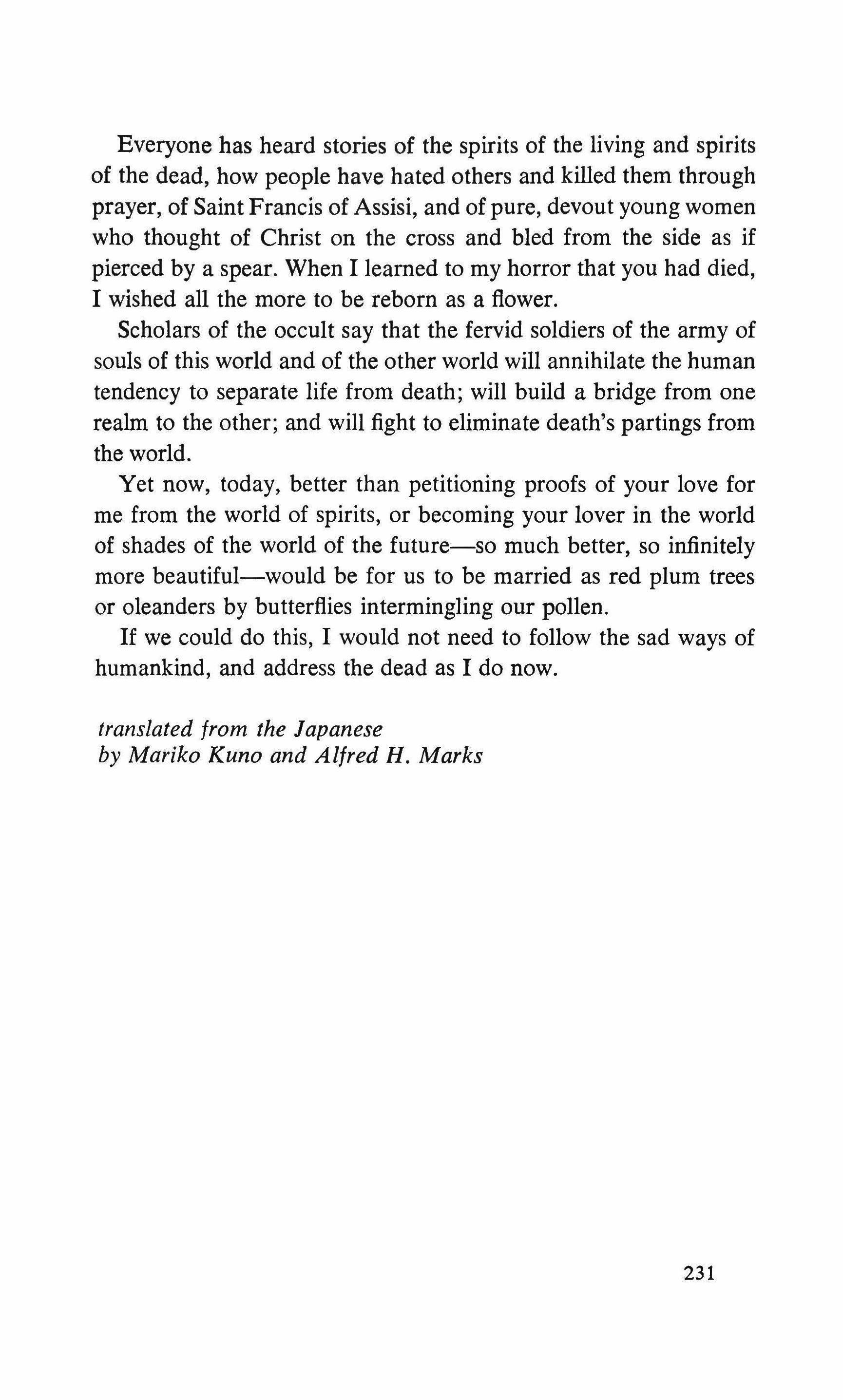
Everyone has heard stories of the spirits of the living and spirits of the dead, how people have hated others and killed them through prayer, of Saint Francis of Assisi, and of pure, devout young women who thought of Christ on the cross and bled from the side as if pierced by a spear. When I learned to my horror that you had died, I wished all the more to be reborn as a flower.
Scholars of the occult say that the fervid soldiers of the army of souls of this world and of the other world will annihilate the human tendency to separate life from death; will build a bridge from one realm to the other; and will fight to eliminate death's partings from the world.
Yet now, today, better than petitioning proofs of your love for me from the world of spirits, or becoming your lover in the world of shades of the world of the future-so much better, so infinitely more beautiful-would be for us to be married as red plum trees or oleanders by butterflies intermingling our pollen.
If we could do this, I would not need to follow the sad ways of humankind, and address the dead as I do now.
translated from the Japanese by
Mariko Kuno and Alfred H. Marks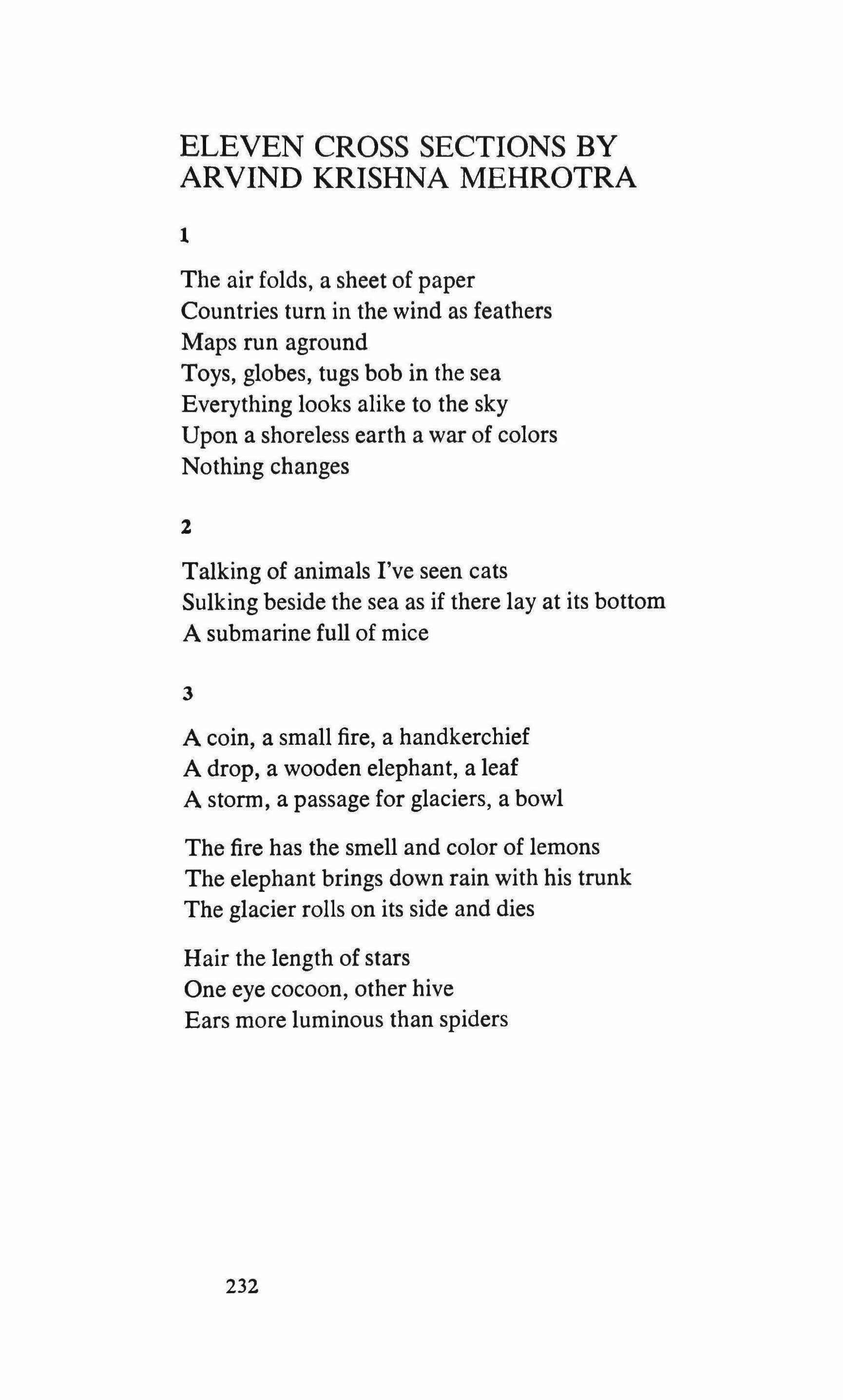
1
The air folds, a sheet of paper
Countries turn in the wind as feathers
Maps run aground
Toys, globes, tugs bob in the sea
Everything looks alike to the sky
Upon a shoreless earth a war of colors
Nothing changes
2
Talking of animals I've seen cats
Sulking beside the sea as if there lay at its bottom
A submarine full of mice
3
A coin, a small fire, a handkerchief
A drop, a wooden elephant, a leaf
A storm, a passage for glaciers, a bowl
The fire has the smell and color of lemons
The elephant brings down rain with his trunk
The glacier rolls on its side and dies
Hair the length of stars
One eye cocoon, other hive
Ears more luminous than spiders
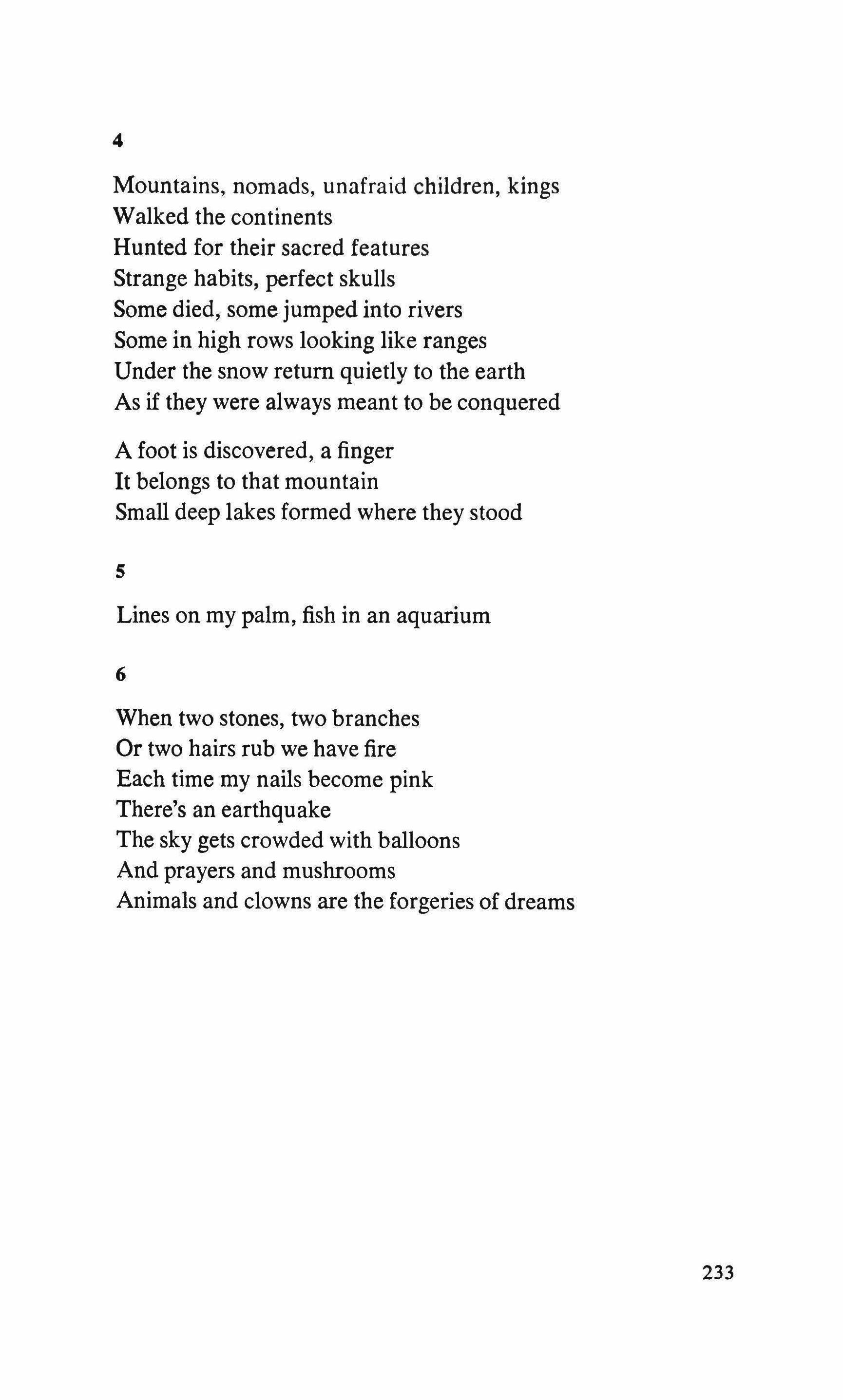
Mountains, nomads, unafraid children, kings
Walked the continents
Hunted for their sacred features
Strange habits, perfect skulls
Some died, some jumped into rivers
Some in high rows looking like ranges
Under the snow return quietly to the earth
As if they were always meant to be conquered
A foot is discovered, a finger
It belongs to that mountain
Small deep lakes formed where they stood
5
Lines on my palm, fish in an aquarium
6
When two stones, two branches
Or two hairs rub we have fire
Each time my nails become pink
There's an earthquake
The sky gets crowded with balloons
And prayers and mushrooms
Animals and clowns are the forgeries of dreams
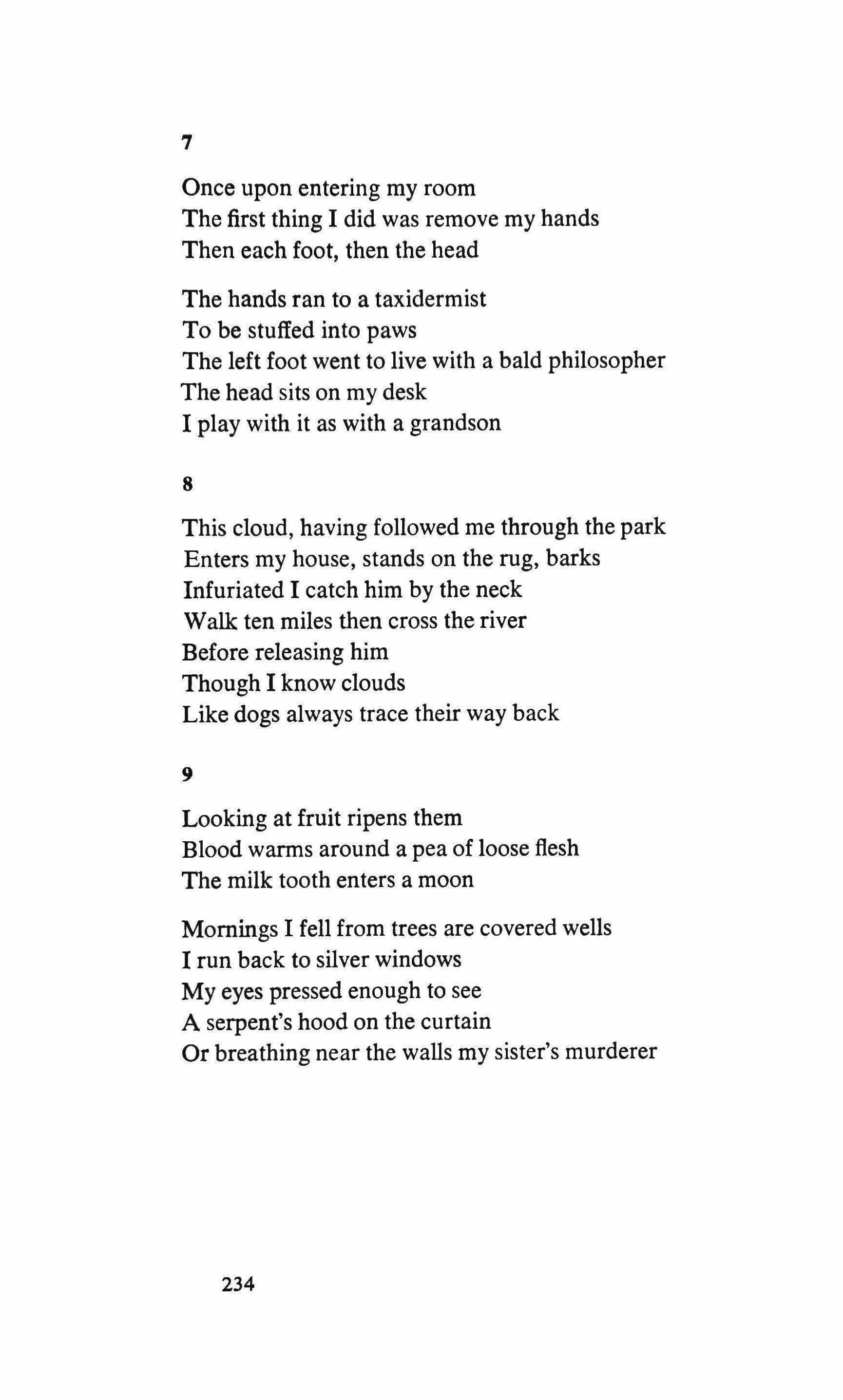
7
Once upon entering my room
The first thing I did was remove my hands
Then each foot, then the head
The hands ran to a taxidermist
To be stuffed into paws
The left foot went to live with a bald philosopher
The head sits on my desk
I play with it as with a grandson
8
This cloud, having followed me through the park
Enters my house, stands on the rug, barks
Infuriated I catch him by the neck
Walk: ten miles then cross the river
Before releasing him
Though I know clouds
Like dogs always trace their way back
9
Looking at fruit ripens them
Blood warms around a pea of loose flesh
The milk tooth enters a moon
Mornings I fell from trees are covered wells
I run back to silver windows
My eyes pressed enough to see
A serpent's hood on the curtain
Or breathing near the walls my sister's murderer
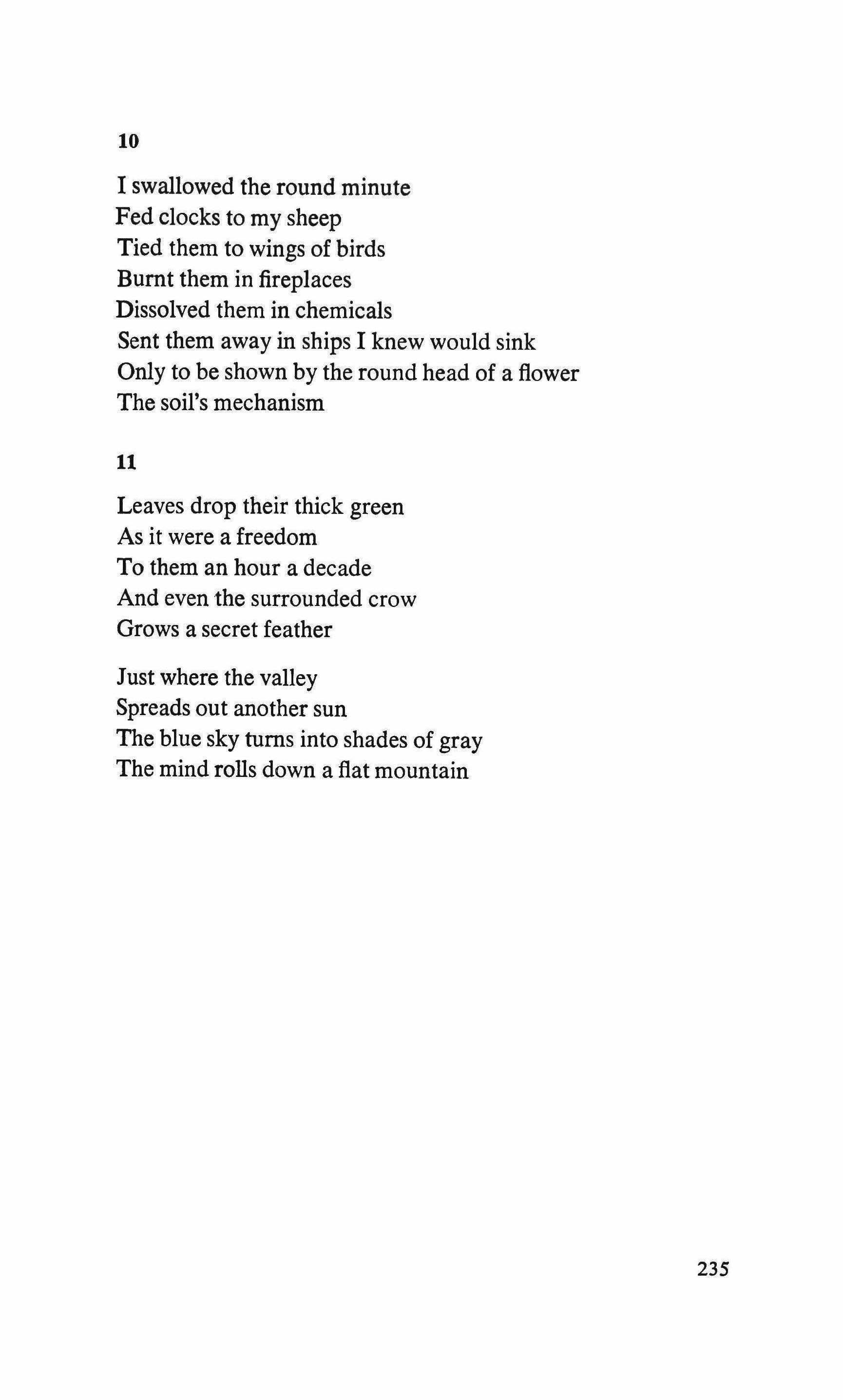
I swallowed the round minute
Fed clocks to my sheep
Tied them to wings of birds
Burnt them in fireplaces
Dissolved them in chemicals
Sent them away in ships I knew would sink
Only to be shown by the round head of a flower
The soil's mechanism
11
Leaves drop their thick green
As it were a freedom
To them an hour a decade
And even the surrounded crow
Grows a secret feather
Just where the valley
Spreads out another sun
The blue sky turns into shades of gray
The mind rolls down a flat mountain
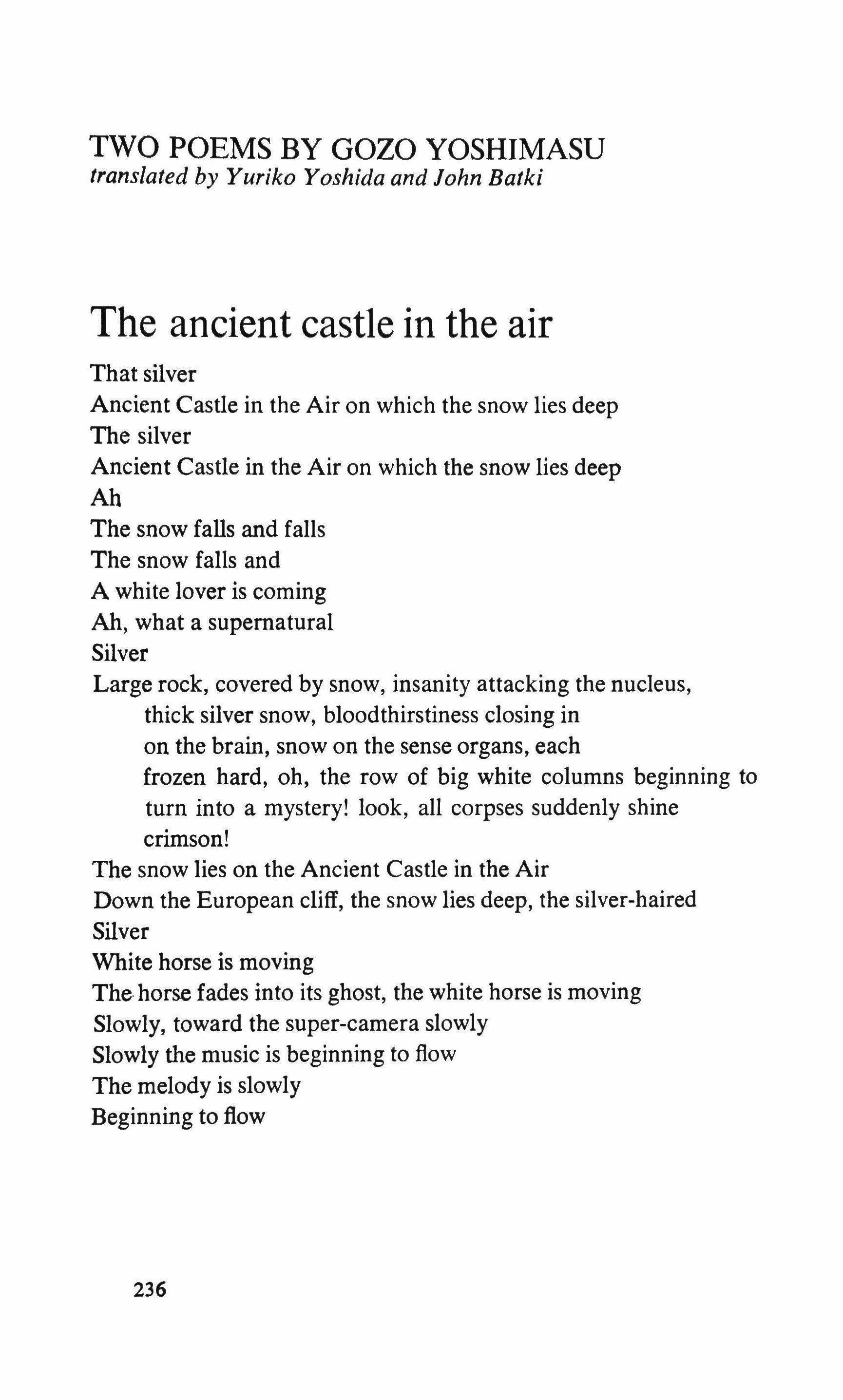
That silver
Ancient Castle in the Air on which the snow lies deep
The silver
Ancient Castle in the Air on which the snow lies deep
Ah
The snow falls and falls
The snow falls and A white lover is coming
Ah, what a supernatural Silver
Large rock, covered by snow, insanity attacking the nucleus, thick silver snow, bloodthirstiness closing in on the brain, snow on the sense organs, each frozen hard, oh, the row of big white columns beginning to turn into a mystery! look, all corpses suddenly shine crimson!
The snow lies on the Ancient Castle in the Air
Down the European cliff, the snow lies deep, the silver-haired Silver
White horse is moving
The horse fades into its ghost, the white horse is moving Slowly, toward the super-camera slowly
Slowly the music is beginning to flow
The melody is slowly
Beginning to flow
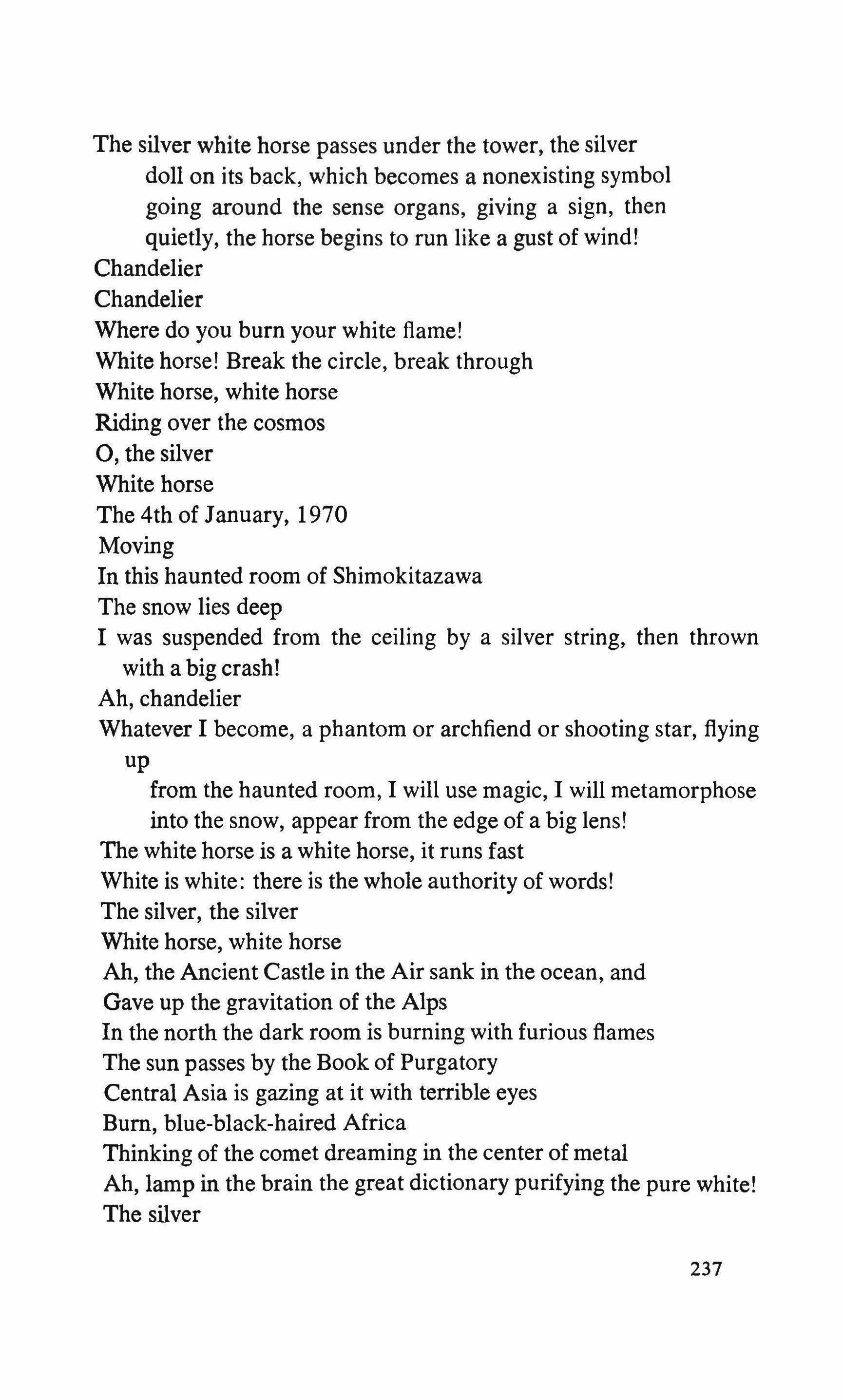
The silver white horse passes under the tower, the silver doll on its back, which becomes a nonexisting symbol going around the sense organs, giving a sign, then quietly, the horse begins to run like a gust of wind!
Chandelier
Chandelier
Where do you burn your white flame!
White horse! Break the circle, break through
White horse, white horse
Riding over the cosmos
0, the silver
White horse
The 4th of January, 1970
Moving
In this haunted room of Shimokitazawa
The snow lies deep
I was suspended from the ceiling by a silver string, then thrown with a big crash!
Ah, chandelier
Whatever I become, a phantom or archfiend or shooting star, flying up
from the haunted room, I will use magic, I will metamorphose into the snow, appear from the edge of a big lens!
The white horse is a white horse, it runs fast
White is white: there is the whole authority of words!
The silver, the silver
White horse, white horse
Ah, the Ancient Castle in the Air sank in the ocean, and
Gave up the gravitation of the Alps
In the north the dark room is burning with furious flames
The sun passes by the Book of Purgatory
Central Asia is gazing at it with terrible eyes
Bum, blue-black-haired Africa
Thinking of the comet dreaming in the center of metal
Ah, lamp in the brain the great dictionary purifying the pure white!
The silver
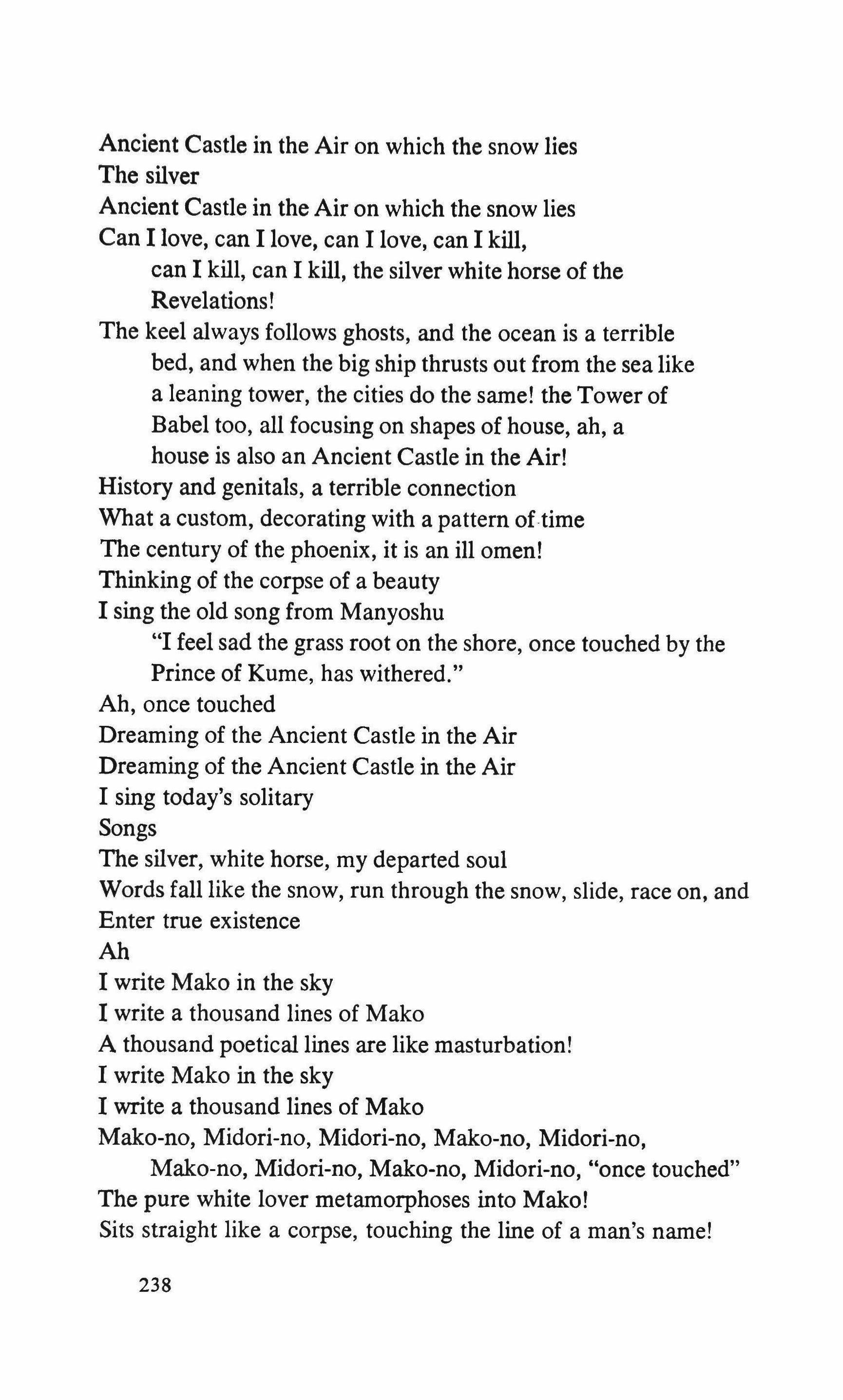
Ancient Castle in the Air on which the snow lies
The silver
Ancient Castle in the Air on which the snow lies
Can I love, can I love, can I love, can I kill, can I kill, can I kill, the silver white horse of the Revelations!
The keel always follows ghosts, and the ocean is a terrible bed, and when the big ship thrusts out from the sea like a leaning tower, the cities do the same! the Tower of Babel too, all focusing on shapes of house, ah, a house is also an Ancient Castle in the Air!
History and genitals, a terrible connection
What a custom, decorating with a pattern oftime
The century of the phoenix, it is an ill omen!
Thinking of the corpse of a beauty
1 sing the old song from Manyoshu
"I feel sad the grass root on the shore, once touched by the Prince of Kume, has withered."
Ah, once touched
Dreaming of the Ancient Castle in the Air
Dreaming of the Ancient Castle in the Air
1 sing today's solitary Songs
The silver, white horse, my departed soul
Words fall like the snow, run through the snow, slide, race on, and Enter true existence
Ah
I write Mako in the sky
I write a thousand lines of Mako
A thousand poetical lines are like masturbation!
I write Mako in the sky
1 write a thousand lines of Mako
Mako-no, Midori-no, Midori-no, Mako-no, Midori-no, Mako-no, Midori-no, Mako-no, Midori-no, "once touched"
The pure white lover metamorphoses into Mako!
Sits straight like a corpse, touching the line of a man's name!
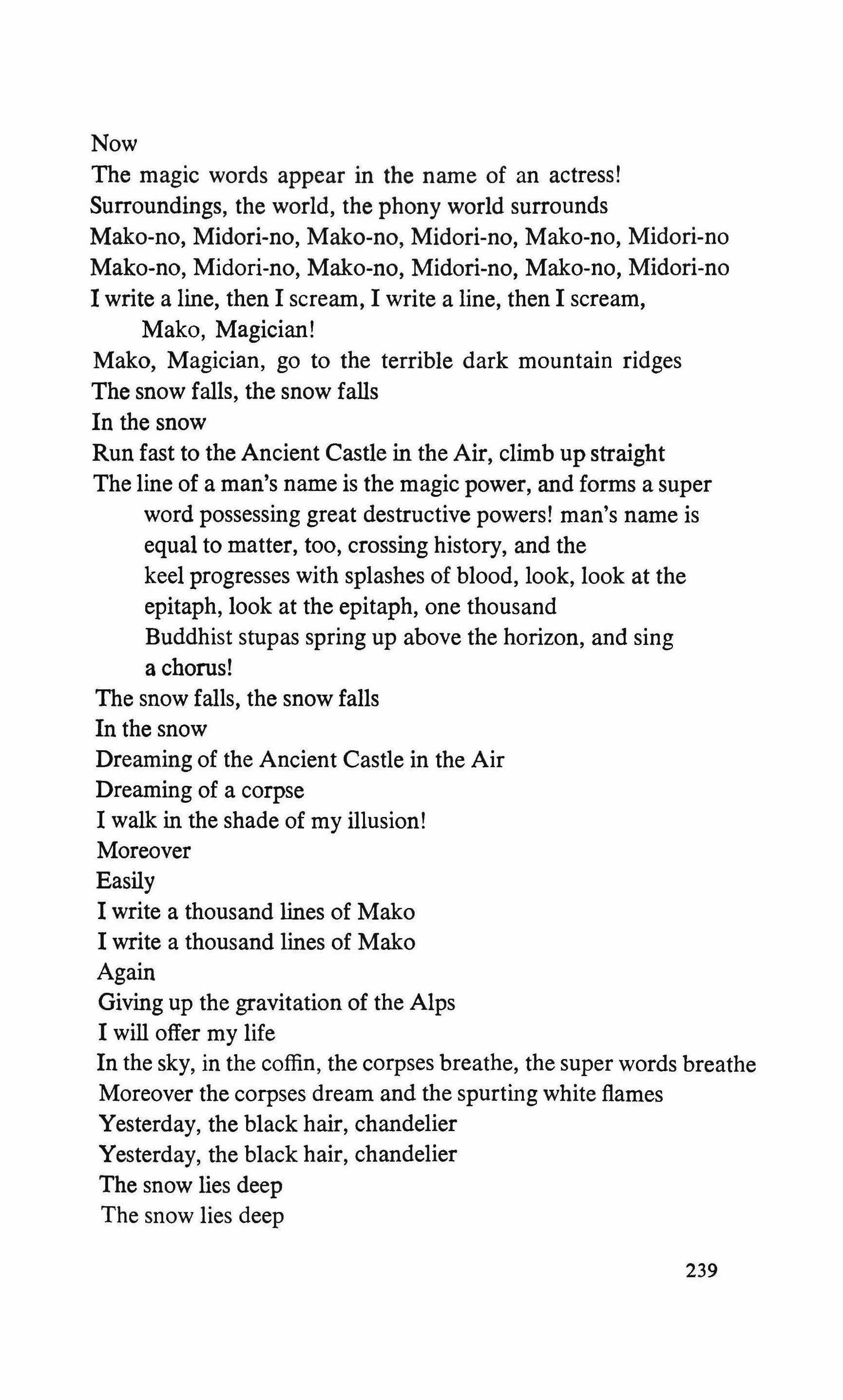
The magic words appear in the name of an actress!
Surroundings, the world, the phony world surrounds Mako-no, Midori-no, Mako-no, Midori-no, Mako-no, Midori-no Mako-no, Midori-no, Mako-no, Midori-no, Mako-no, Midori-no
I write a line, then I scream, I write a line, then I scream, Mako, Magician!
Mako, Magician, go to the terrible dark mountain ridges
The snow falls, the snow falls
In the snow
Run fast to the Ancient Castle in the Air, climb up straight
The line of a man's name is the magic power, and forms a super word possessing great destructive powers! man's name is equal to matter, too, crossing history, and the keel progresses with splashes of blood, look, look at the epitaph, look at the epitaph, one thousand Buddhist stupas spring up above the horizon, and sing a chorus!
The snow falls, the snow falls
In the snow
Dreaming of the Ancient Castle in the Air
Dreaming of a corpse
I walk in the shade of my illusion!
Moreover
I write a thousand lines of Mako
I write a thousand lines of Mako
Again
Giving up the gravitation of the Alps
I will offer my life
In the sky, in the coffin, the corpses breathe, the super words breathe
Moreover the corpses dream and the spurting white flames
Yesterday, the black hair, chandelier
Yesterday, the black hair, chandelier
The snow lies deep
The snow lies deep

The silver
Ancient Castle in the Air
The snow lies deep
The snow lies deep
The silver
Ancient Castle in the Air
Seeking for a phantom, my love, a fire, seeking for the corpse, then becoming a huge structural power! you, the tree, witness with your eyes this shadow freezing on the horse and running fast, you, the tree, your collapse is equal to the destruction of the world, defend the line of a man's name, commit murder! the terrible flood of swords!
The vast forest with white eyes!
Moreover
The snow lies deep
The snow lies deep
The Ancient Castle in the Air
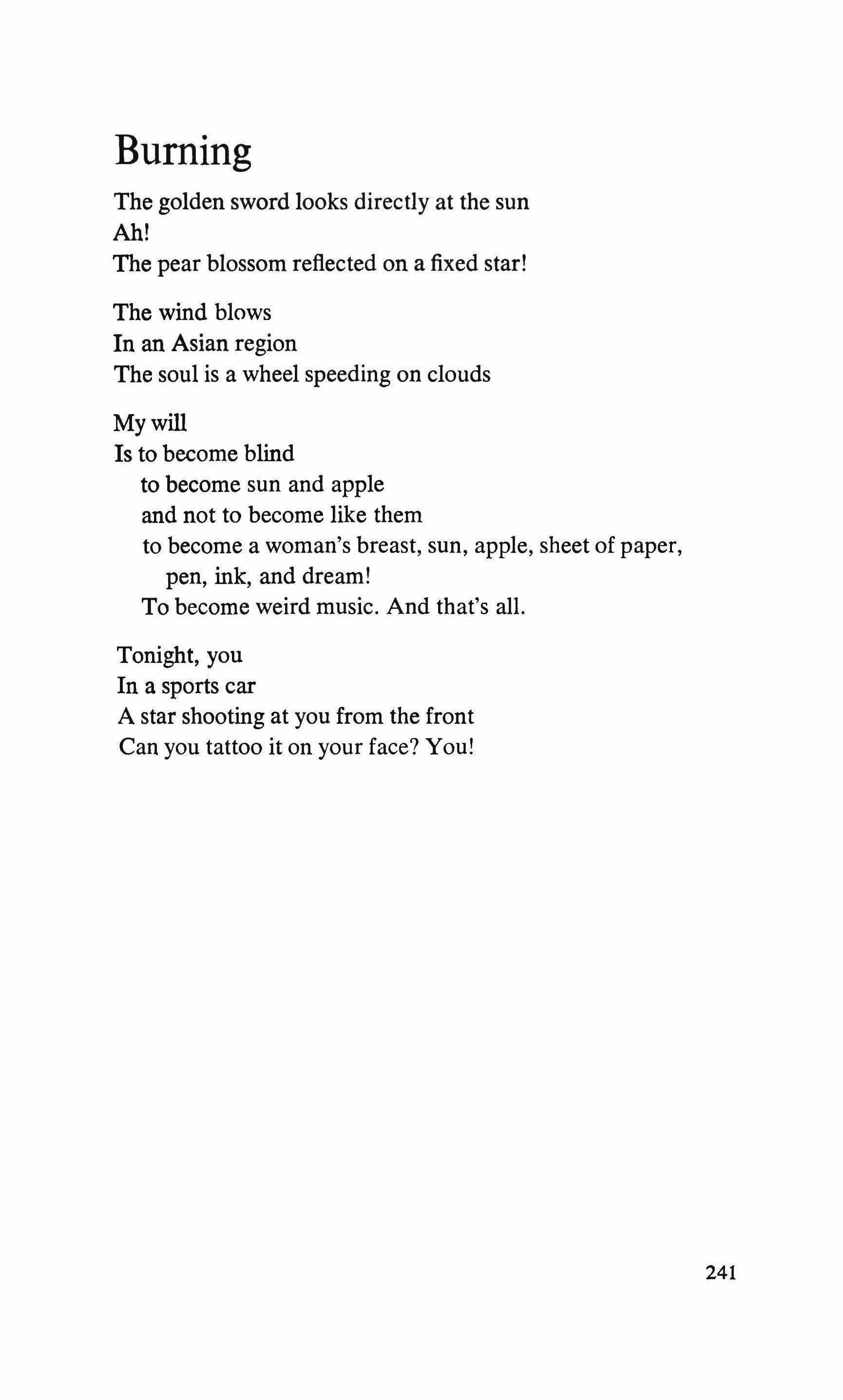
The golden sword looks directly at the sun Ah!
The pear blossom reflected on a fixed star!
The wind blows
In an Asian region
The soul is a wheel speeding on clouds
My will Is to become blind to become sun and apple and not to become like them to become a woman's breast, sun, apple, sheet of paper, pen, ink, and dream! To become weird music. And that's all.
Tonight, you In a sports car
A star shooting at you from the front Can you tattoo it on your face? You!
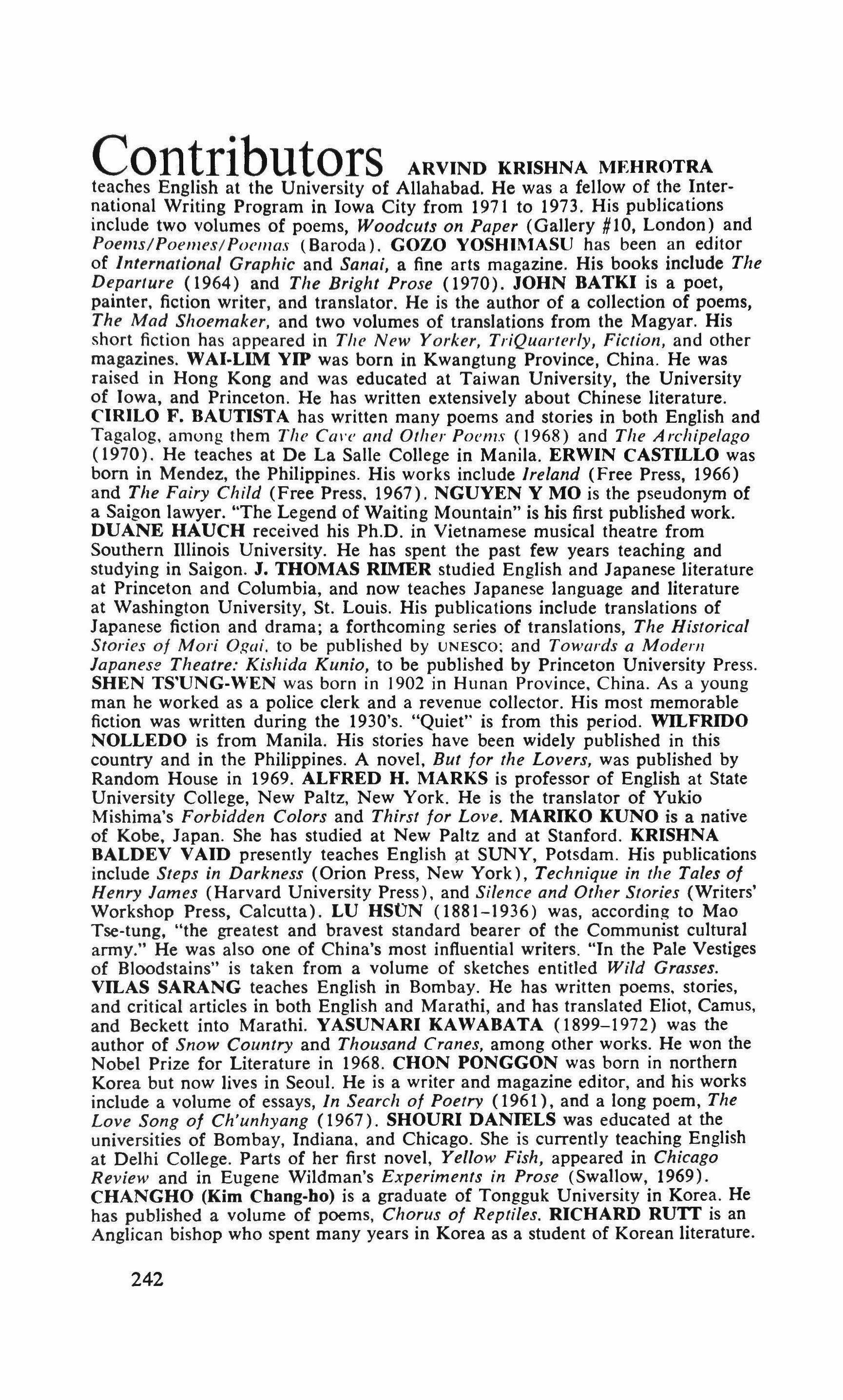
ARVIND KRISHNA MEHROTRA teaches English at the University of Allahabad. He was a fellow of the International Writing Program in Iowa City from 1971 to 1973. His publications include two volumes of poems, Woodcuts on Paper (Gallery #10, London) and Poems/Poemes/Pocmas (Baroda). GOZO YOSHIl\1ASU has been an editor of International Graphic and Sanai, a fine arts magazine. His books include The Departure (1964) and The Bright Prose (1970). JOHN BATKI is a poet, painter, fiction writer, and translator. He is the author of a collection of poems, The Mad Shoemaker. and two volumes of translations from the Magyar. His short fiction has appeared in The New Yorker. TriQuar/l'/,ly, Fiction. and other magazines. WAI-LIM YIP was born in Kwangtung Province, China. He was raised in Hong Kong and was educated at Taiwan University, the University of Iowa, and Princeton. He has written extensively about Chinese literature. ('IRILO F. BAUTISTA has written many poems and stories in both English and Tagalog, among them The Cal'(' and Other Poems (1968) and The Archipelago (1970). He teaches at De La Salle College in Manila. ERWIN CASTILLO was born in Mendez, the Philippines. His works include Ireland (Free Press, 1966) and The Fairy Child (Free Press. 1967). NGUYEN Y MO is the pseudonym of a Saigon lawyer. "The Legend of Waiting Mountain" is his first published work. DUANE HAUCH received his Ph.D. in Vietnamese musical theatre from Southern Illinois University. He has spent the past few years teaching and studying in Saigon. J. THOMAS RIMER studied English and Japanese literature at Princeton and Columbia, and now teaches Japanese language and literature at Washington University, st. Louis. His publications include translations of Japanese fiction and drama; a forthcoming series of translations, The Historical Stories of Mori Ogai, to be published by UNESCO; and Towards a Modem Japanese Theatre: Kishida Kunio, to be published by Princeton University Press. SHEN TS'UNG-WEN was born in 1902 in Hunan Province, China. As a young man he worked as a police clerk and a revenue collector. His most memorable fiction was written during the 1930's. "Quiet" is from this period. WILFRIDO NOLLEDO is from Manila. His stories have been widely published in this country and in the Philippines. A novel, But for the Lovers, was published by Random House in 1969. ALFRED H. MARKS is professor of English at State University College, New Paltz, New York. He is the translator of Yukio Mishirna's Forbidden Colors and Thirst for Love. MARIKO KUNO is a native of Kobe, Japan. She has studied at New Paltz and at Stanford. KRISHNA BALDEV VAID presently teaches English at SUNY, Potsdam. His publications include Steps in Darkness (Orion Press, New York), Technique in the Tales of Henry James (Harvard University Press), and Silence and Other Stories (Writers' Workshop Press, Calcutta). LU HSON (1881-1936) was, according to Mao Tse-tung, "the greatest and bravest standard bearer of the Communist cultural army." He was also one of China's most influential writers. "In the Pale Vestiges of Bloodstains" is taken from a volume of sketches entitled Wild Grasses. VILAS SARANG teaches English in Bombay. He has written poems, stories, and critical articles in both English and Marathi, and has translated Eliot, Camus, and Beckett into Marathi. YASUNARI KAWABATA (1899-1972) was the author of Snow Country and Thousand Cranes, among other works. He won the Nobel Prize for Literature in 1968. CHON PONGGON was born in northern Korea but now lives in Seoul. He is a writer and magazine editor, and his works include a volume of essays, In Search of Poetry (1961), and a long poem, The Love Song of Ch'unhyang (1967). SHOURI DANIELS was educated at the universities of Bombay, Indiana. and Chicago. She is currently teaching English at Delhi College. Parts of her first novel, Yellow Fish, appeared in Chicago Review and in Eugene Wildman's Experiments in Prose (Swallow, 1969). CHANGHO (Kim Chang-he) is a graduate of Tongguk University in Korea. He has published a volume of poems, Chorus of Reptiles. RICHARD RUTT is an Anglican bishop who spent many years in Korea as a student of Korean literature.
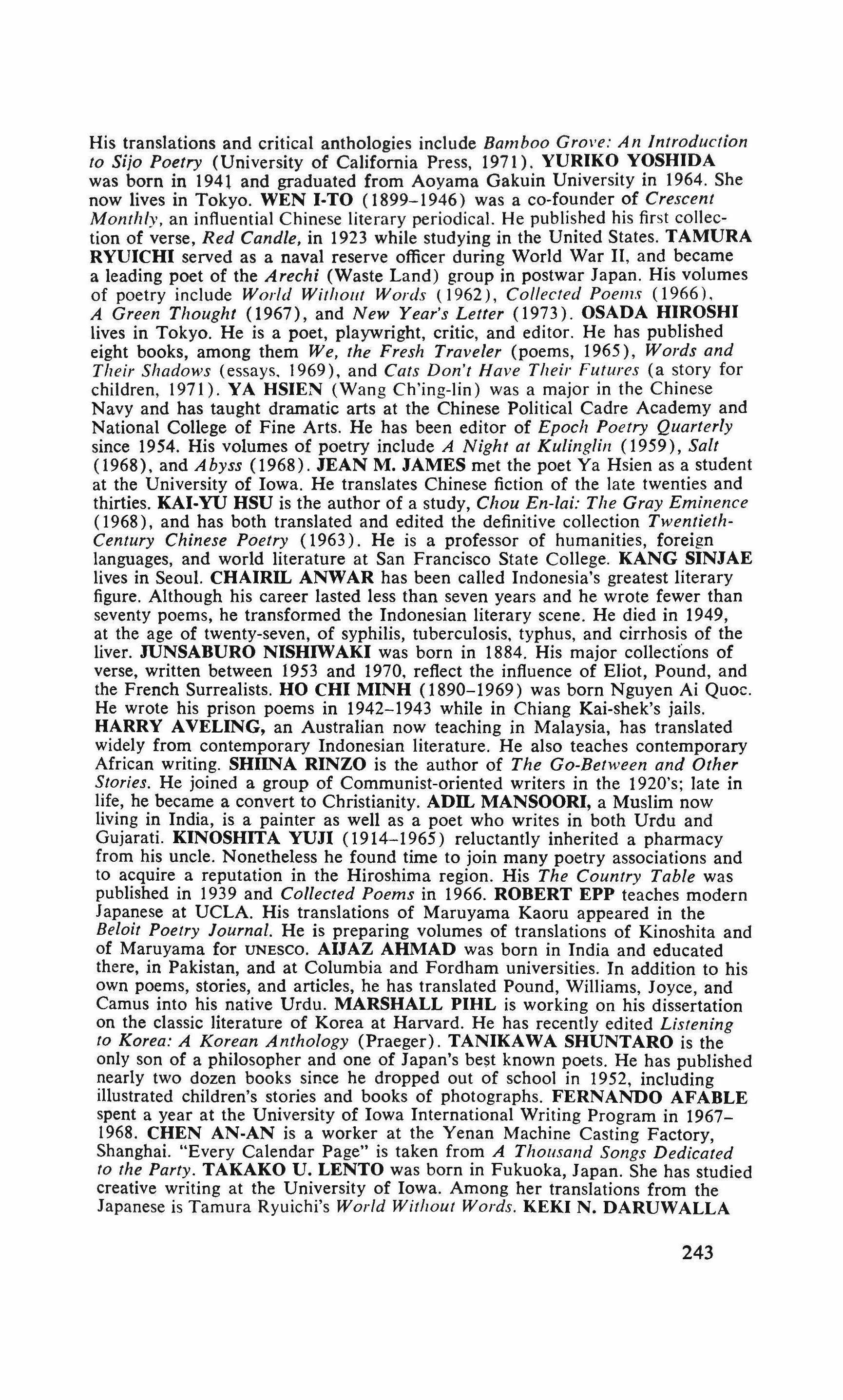
His translations and critical anthologies include Bamboo Grove: An Introduction to Silo Poetry (University of California Press, 1971). YURIKO YOSHIDA was born in 1941 and graduated from Aoyarna Gakuin University in 1964. She now lives in Tokyo. WEN I·TO (1899-1946) was a co-founder of Crescent Monthly, an influential Chinese literary periodical. He published his first collection of verse, Red Candle, in 1923 while studying in the United States. TAMURA RYUICHI served as a naval reserve officer during World War II, and became a leading poet of the Arechi (Waste Land) group in postwar Japan. His volumes of poetry include World Without Words (1962), Collected Poems (1966), A Green Thought (1967), and New Year's Letter (1973). OSADA HIROSHI lives in Tokyo. He is a poet, playwright, critic, and editor. He has published eight books, among them We, the Fresh Traveler (poems, 1965), Words and Their Shadows (essays. 1969), and Cats Don't Have Their Futures (a story for children, 1971). YA HSIEN (Wang Ch'ing-lin) was a major in the Chinese Navy and has taught dramatic arts at the Chinese Political Cadre Academy and National College of Fine Arts. He has been editor of Epoch Poetry Quarterly since 1954. His volumes of poetry include A Night at Kulinglin (1959), Salt (1968), and Abyss (1968). JEAN M. JAMES met the poet Ya Hsien as a student at the University of Iowa. He translates Chinese fiction of the late twenties and thirties. KAI·YU HSU is the author of a study, Chou En-lai: The Gray Eminence (1968), and has both translated and edited the definitive collection TwentiethCentury Chinese Poetry (1963). He is a professor of humanities, foreign languages, and world literature at San Francisco State College. KANG SINJAE lives in Seoul. CHAIRIL ANWAR has been called Indonesia's greatest literary figure. Although his career lasted less than seven years and he wrote fewer than seventy poems, he transformed the Indonesian literary scene. He died in 1949, at the age of twenty-seven, of syphilis, tuberculosis, typhus, and cirrhosis of the liver. JUNSABURO NISHIWAKI was born in 1884. His major collections of verse, written between 1953 and 1970. reflect the influence of Eliot, Pound, and the French Surrealists. HO CHI MINH (1890-1969) was born Nguyen Ai Quoc. He wrote his prison poems in 1942-1943 while in Chiang Kai-shek's jails. HARRY AVELlNG, an Australian now teaching in Malaysia, has translated widely from contemporary Indonesian literature. He also teaches contemporary African writing. SHIINA RINZO is the author of The Go-Between and Other Stories. He joined a group of Communist-oriented writers in the 1920's; late in life, he became a convert to Christianity. ADIL MANSOORI, a Muslim now living in India, is a painter as well as a poet who writes in both Urdu and Gujarati. KINOSHITA YUH (1914-1965) reluctantly inherited a pharmacy from his uncle. Nonetheless he found time to join many poetry associations and to acquire a reputation in the Hiroshima region. His The Country Table was published in 1939 and Collected Poems in 1966. ROBERT EPP teaches modern Japanese at UCLA. His translations of Maruyama Kaoru appeared in the Beloit Poetry Journal. He is preparing volumes of translations of Kinoshita and of Maruyama for UNESCO. AIJAZ AHMAD was born in India and educated there, in Pakistan, and at Columbia and Fordham universities. In addition to his own poems, stories, and articles, he has translated Pound, Williams, Joyce, and Camus into his native Urdu. MARSHALL PIHL is working on his dissertation on the classic literature of Korea at Harvard. He has recently edited Listening to Korea: A Korean Anthology (Praeger). TANIKAWA SHUNTARO is the only son of a philosopher and one of Japan's best known poets. He has published nearly two dozen books since he dropped out of school in 1952, including illustrated children's stories and books of photographs. FERNANDO AFABLE spent a year at the University of Iowa International Writing Program in 19671968. CHEN AN-AN is a worker at the Yenan Machine Casting Factory, Shanghai. "Every Calendar Page" is taken from A Thousand Songs Dedicated to the Party. TAKAKO U. LENTO was born in Fukuoka, Japan. She has studied creative writing at the University of Iowa. Among her translations from the Japanese is Tamura Ryuichi's World Without Words. KEKI N. DARUWALLA
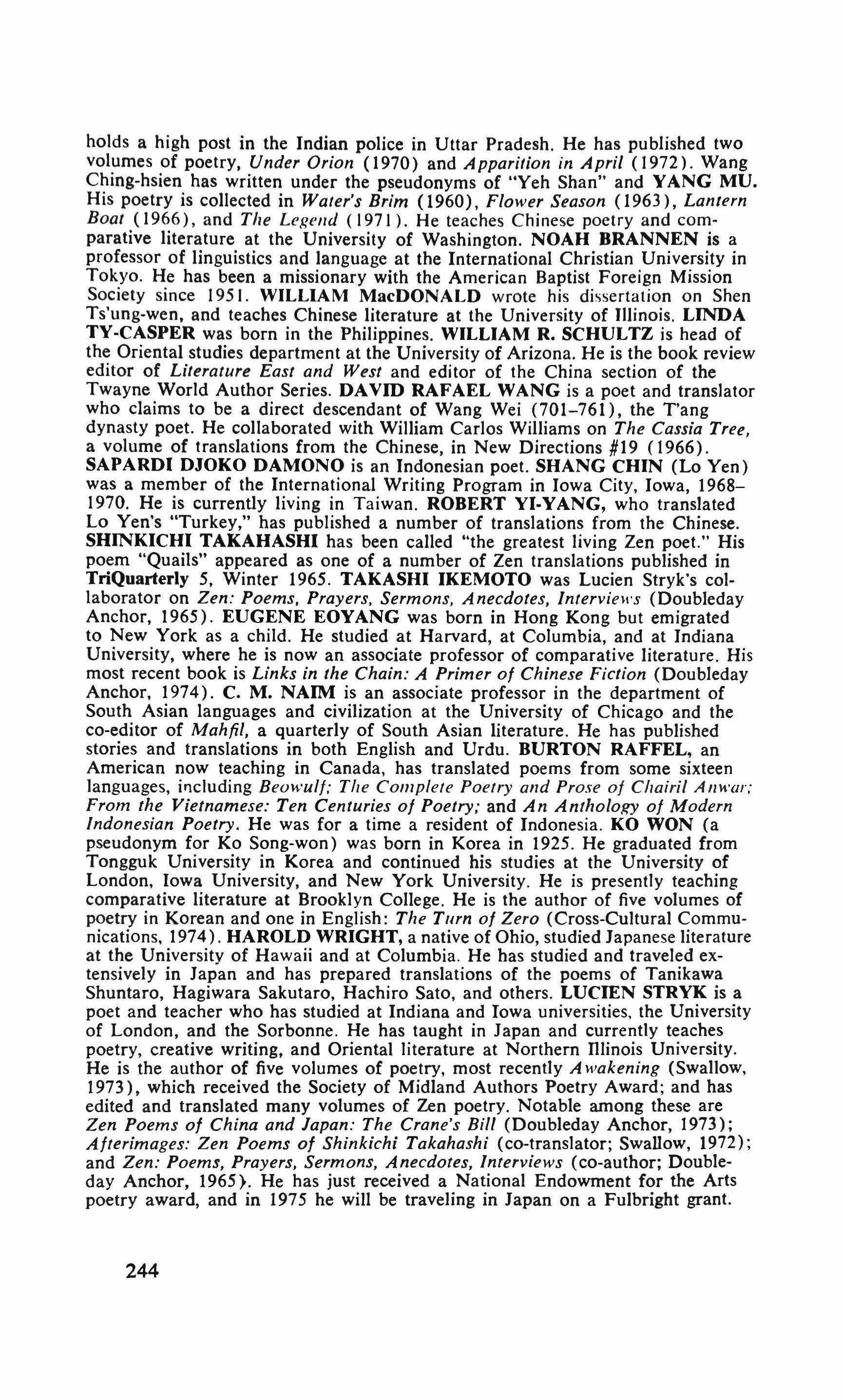
holds a high post in the Indian police in Uttar Pradesh. He has published two volumes of poetry, Under Orion (1970) and Apparition in April (1972). Wang Ching-hsien has written under the pseudonyms of "Yeh Shan" and YANG MU. His poetry is collected in Water's Brim (1960), Flower Season (1963), Lantern Boat (1966), and The Legend ( 1971 ). He teaches Chinese poetry and comparative literature at the University of Washington. NOAH BRANNEN is a professor of linguistics and language at the International Christian University in Tokyo. He has been a missionary with the American Baptist Foreign Mission Society since 1951. WILLIAM MacDONALD wrote his dissertation on Shen Ts'ung-wen, and teaches Chinese literature at the University of Illinois. LINDA TY-CASPER was born in the Philippines. WILLIAM R. SCHULTZ is head of the Oriental studies department at the University of Arizona. He is the book review editor of Literature East and West and editor of the China section of the Twayne World Author Series. DAVID RAFAEL WANG is a poet and translator who claims to be a direct descendant of Wang Wei (701-761), the Tang dynasty poet. He collaborated with William Carlos Williams on The Cassia Tree, a volume of translations from the Chinese, in New Directions #19 (1966).
SAPARDI DJOKO DAMONO is an Indonesian poet. SHANG CHIN (Lo Yen) was a member of the International Writing Program in Iowa City, Iowa, 19681970. He is currently living in Taiwan. ROBERT YI-YANG, who translated Lo Yen's "Turkey," has published a number of translations from the Chinese. SHINKICHI TAKAHASHI has been called "the greatest living Zen poet." His poem "Quails" appeared as one of a number of Zen translations published in TriQuarterly 5, Winter 1965. TAKASHI IKEMOTO was Lucien Stryk's collaborator on Zen: Poems, Prayers, Sermons, Anecdotes, Interviews (Doubleday Anchor, 1965). EUGENE EOYANG was born in Hong Kong but emigrated to New York as a child. He studied at Harvard, at Columbia, and at Indiana University, where he is now an associate professor of comparative literature. His most recent book is Links in the Chain: A Primer of Chinese Fiction (Doubleday Anchor, 1974). C. M. NAIM is an associate professor in the department of South Asian languages and civilization at the University of Chicago and the co-editor of Mahfil, a quarterly of South Asian literature. He has published stories and translations in both English and Urdu. BURTON RAFFEL, an American now teaching in Canada, has translated poems from some sixteen languages, including Beowulf; The Complete Poetry and Prose of Chairil Allwar; From the Vietnamese: Ten Centuries of Poetry; and An Anthology of Modern Indonesian Poetry. He was for a time a resident of Indonesia. KO WON (a pseudonym for Ko Song-won) was born in Korea in 1925. He graduated from Tongguk University in Korea and continued his studies at the University of London, Iowa University, and New York University. He is presently teaching comparative literature at Brooklyn College. He is the author of five volumes of poetry in Korean and one in English: The Turn of Zero (Cross-Cultural Communications, 1974). HAROLD WRIGHT, a native of Ohio, studied Japanese literature at the University of Hawaii and at Columbia. He has studied and traveled extensively in Japan and has prepared translations of the poems of Tanikawa Shuntaro, Hagiwara Sakutaro, Hachiro Sato, and others. LUCIEN STRYK is a poet and teacher who has studied at Indiana and Iowa universities, the University of London, and the Sorbonne. He has taught in Japan and currently teaches poetry, creative writing, and Oriental literature at Northern lllinois University. He is the author of five volumes of poetry, most recently Awakening (Swallow, 1973), which received the Society of Midland Authors Poetry Award; and has edited and translated many volumes of Zen poetry. Notable among these are Zen Poems of China and Japan: The Crane's Bill (Doubleday Anchor, 1973); Afterimages: Zen Poems of Shinkichi Takahashi (co-translator; Swallow, 1972); and Zen: Poems, Prayers, Sermons, Anecdotes, Interviews (co-author; Doubleday Anchor, 1965). He has just received a National Endowment for the Arts poetry award, and in 1975 he will be traveling in Japan on a Fulbright grant.

cien Stryk
il Mansoori
-n Ts'ung-wen
nng Hagyong
mshu Yashaschandra
.ardi Djoko Damono
lyenYMo
inaRinzo
nkichi Takahashi
m Ponggon
Yen
Hsun
�n An-an
Chi Minh
iiril Anwar
un Van Ky
19Mu
nI-To
.da Hiroshi
tikawa Shuntaro
Changho
Shouri Daniels
Junsaburo Nishiwaki
Cirilo F Bautista
Erwin E. Castillo
Keki N. Daruwalla
Linda Ty-Casper
KangSinjae
Wai-lim Yip
YaHsien
Krishna Baldev Vaid
Wilfrido Nolledo
Fernando Afable
Tamura Ryuichi
Vilas Sarang
Kinoshita Yuji
Yasunari Kawabata
Arvind Krishna Mehrotr�
Gozo Yoshimasu
